



Fall 1985

Editor
Executive Editor
Managing Editor
Fiction Editor
Special Projects
Design Director
TriQuarterly Fellow
Editorial Assistants
Advisory Editors





Fall 1985

Editor
Executive Editor
Managing Editor
Fiction Editor
Special Projects
Design Director
TriQuarterly Fellow
Editorial Assistants
Advisory Editors
Reginald Gibbons
Bob Perlongo
Joseph LaRusso
Susan Hahn
Fred Shafer, Anne Calcagno
Gini Kondziolka
Doug Clayton
Brian Bouldrey, James Bryant, T.R. Johnson, Sheelagh McCaughey
Robert Alter, Michael Anania, Elliott Anderson, Terrence Des Pres, Gloria Emerson, Richard Ford, George Garrett, Gerald Graff, Francine du Plessix Gray, Michael S. Harper, David Hayman, Bill Henderson, Maxine Kumin, Elizabeth Pochoda, Michael Ryan
TRIQUARTERLY IS AN INTERNATIONAL JOURNAL OF ART, WRITING AND CULTURAL INQUIRY PUBLISHED IN THE FALL, WINTER AND SPRING AT NORTHWESTERN UNIVERSITY, EVANSTON, ILLINOIS 60201.
Subscription rates-Individuals: one year $16; two years $28; life $100. Institutions: one year $22; cwo years $40; life $200. Foreign subscriptions $4 per year additional. Single copies usually $6.95. Sample copies $3. Correspondence and subscriptions should be addressed to TriQuarterlv, NORTHWESTERN UNIVERSITY, 1735 Benson Avenue, Evanston, Illinois 60201. Phone: (312) 491-3490. The editors invite submissions of fiction, poetry and literary essays. No manuscripts will be returned unless accompanied by a stamped, self-addressed envelope. All manuscripts accepted for publication become the property of TriQuarterlv, unless otherwise indicated. Copyright © 1985 by TriQuarterlv. All rights reserved. The views expressed in this magazine are to be attributed to the writers, not the editors or sponsors. Printed in the United States of America.
National distributor to retail trade: B. DeBoer, 113 East Central Street-Rear, Nutley, New Jersey 07110. Distributor for West Coast trade: Bookpeople, 2929 Fifth Street, Berkeley, California 94710. Midwest: Bookslinger, 213 East Fourth Street, St. Paul, Minnesota 55101 and Prairie News Agency, 2404 West Hirsch Street, Chicago, Illinois 60622.
Reprints of issues #1-15 of TriQuarterlv are available in full format from Kraus Reprint Company, Route 100, Millwood. New York 10546. and all issues in microfilm from University Microfilms International, 300 North Zeeb Road. Ann Arbor, Michigan 48106. ISSN: 0041-3097.
Publication of this issue of TriQuarterly has been made possible in part by generous aid from the Joyce Foundation and the Atlantic Richfield Foundation, as well as the Illinois Arts Council and the National Endowment for the Arts.
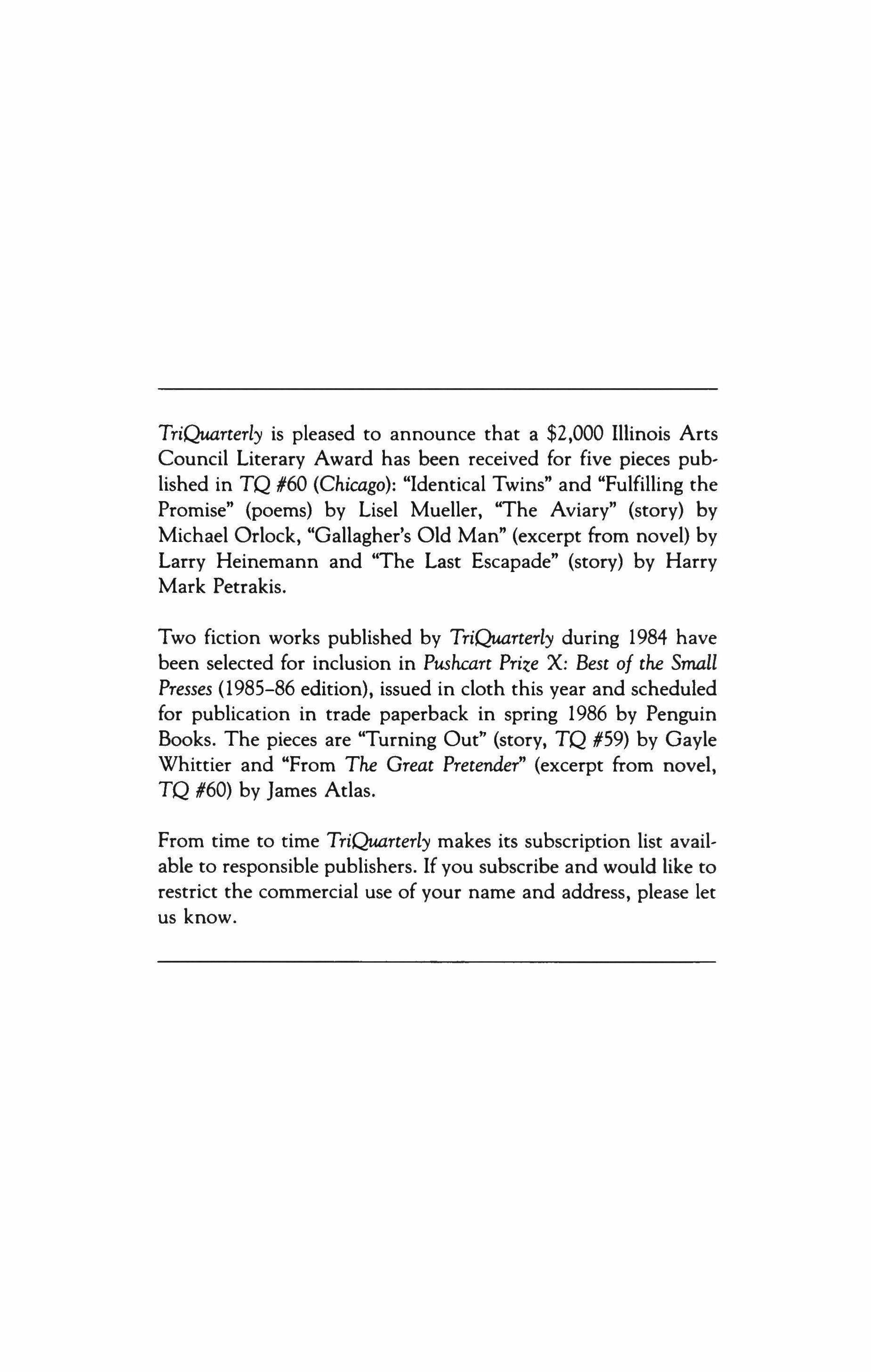
TriQuarterly is pleased to announce that a $2,000 Illinois Arts Council Literary Award has been received for five pieces published in TQ #60 (Chicago): "Identical Twins" and "Fulfilling the Promise" (poems) by Lisel Mueller, "The Aviary" (story) by Michael Orlock, "Gallagher's Old Man" (excerpt from novel) by Larry Heinemann and "The Last Escapade" (story) by Harry Mark Petrakis.
Two fiction works published by TriQuarterly during 1984 have been selected for inclusion in Pushcart Prize X: Best of the Small Presses (1985-86 edition), issued in cloth this year and scheduled for publication in trade paperback in spring 1986 by Penguin Books. The pieces are "Turning Out" (story, TQ #59) by Gayle Whittier and "From The Great Pretender" (excerpt from novel, TQ #60) by James Atlas.
From time to time TriQuarterly makes its subscription list available to responsible publishers. If you subscribe and would like to restrict the commercial use of your name and address, please let us know.
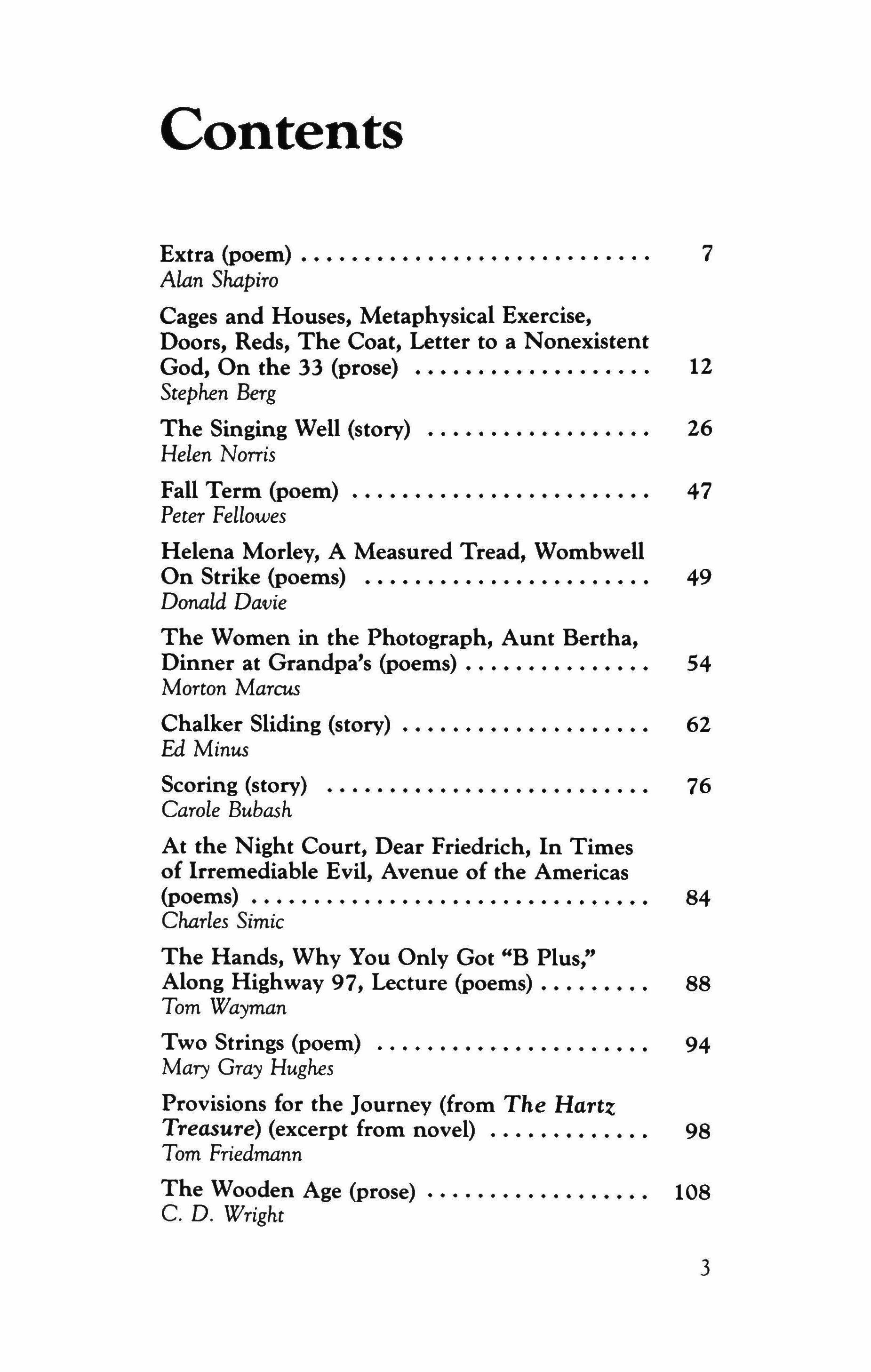
Richard Hugo, The Flying Dutchman (poems)
Lawn Fertilizer, Male Grief, My Mother Writes in the Snow (poems)
Hawkins

Reviews: Letter to an Imaginary Friend, Parts Three and Four, Thomas McGrath, and A Slow Fuse, Theodore Weiss (reviewed by Reginald Gibbons); The Lonely Voice, Frank O'Connor (Fred Shafer); The Roundhouse Voices, Selected and New Poems, Dave Smith (Bruce Weigl); Late Settings, James Merrill (William Logan)..
Cover design by Gini Kondziolka
The following individuals and institutions are life subscribers to TriQuarterly. The editors gratefully acknowledge their support.
Anonymous (7)
David C. Abercrombie
Sandy Anderson
Richard H. Anderson
Tom G. Bell
Robert Boruch
Timothy Browne
Erie O. Cahn
Mark W. DeBree
Alan Distler
Carol Erickson
David R. Fine
Paul Fjelstad
Torrence Fossland
Dr. Scott C. Fraser
Lawrence J. Gorman
Maxine Groffsky
Rev. Dr. Elliott Hagle
Ross B. Heath
Charles Hedde
Donald A. Hillel
Irwin T. Holtzman
P. Hosier
Dr. Alfred D. Klinger
Loy E. Knapp
Sydney Knowlton
Conrad A. Langenberg
Patricia W. Linton
Kevin McCanna
Robert D. McChesney
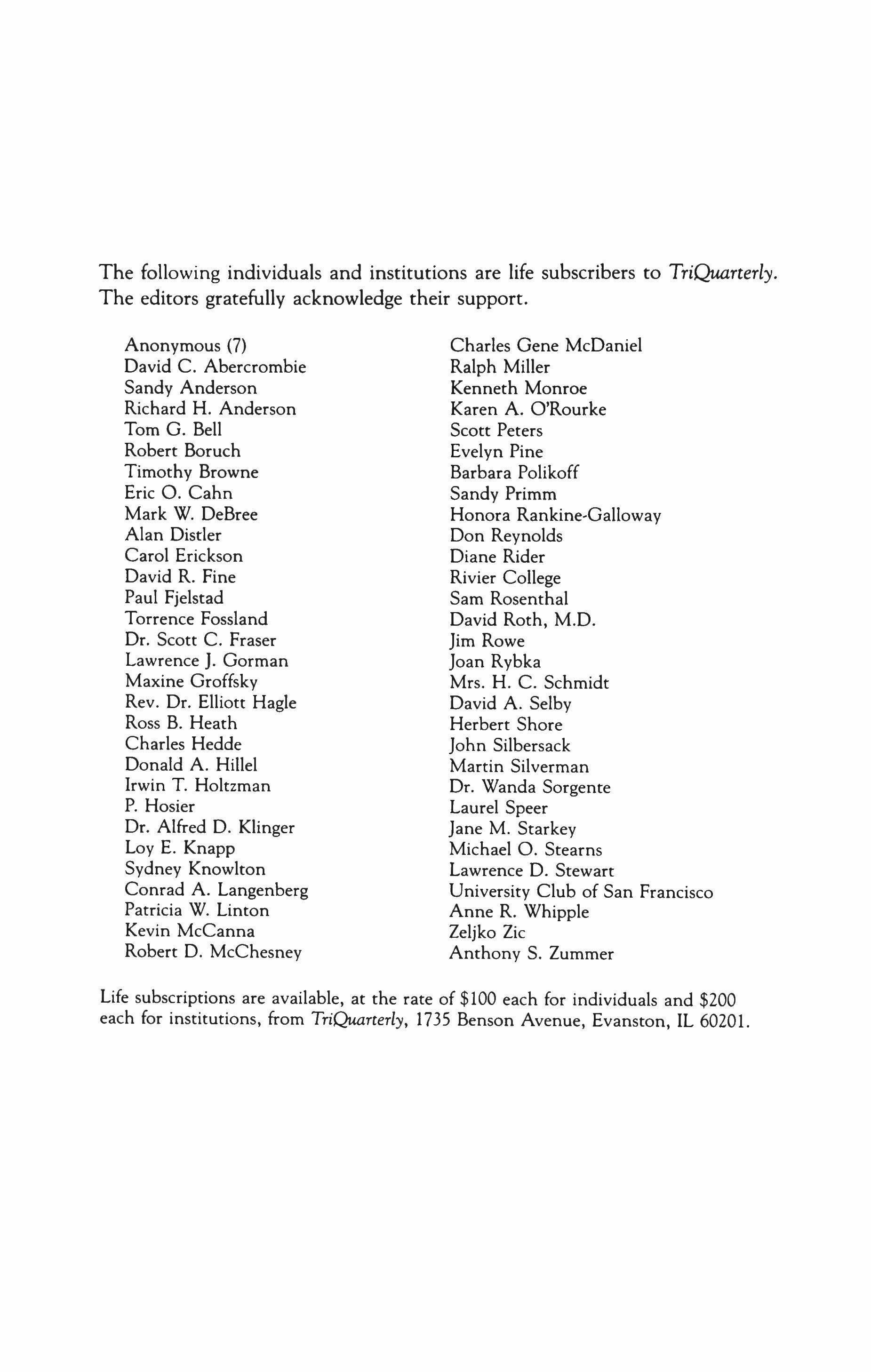
Charles Gene McDaniel
Ralph Miller
Kenneth Monroe
Karen A. O'Rourke
Scott Peters
Evelyn Pine
Barbara Polikoff
Sandy Primm
Honora Rankine-Galloway
Don Reynolds
Diane Rider
Rivier College
Sam Rosenthal David Roth, M.D.
Jim Rowe
Joan Rybka
Mrs. H. C. Schmidt
David A. Selby
Herbert Shore
John Silbersack
Martin Silverman
Dr. Wanda Sorgente
Laurel Speer
Jane M. Starkey
Michael O. Stearns
Lawrence D. Stewart
University Club of San Francisco
Anne R. Whipple
leljko lie
Anthony S. lummer
Life subscriptions are available, at the rate of $100 each for individuals and $200 each for institutions, from TriQuarterly, 1735 Benson Avenue, Evanston, IL 60201.

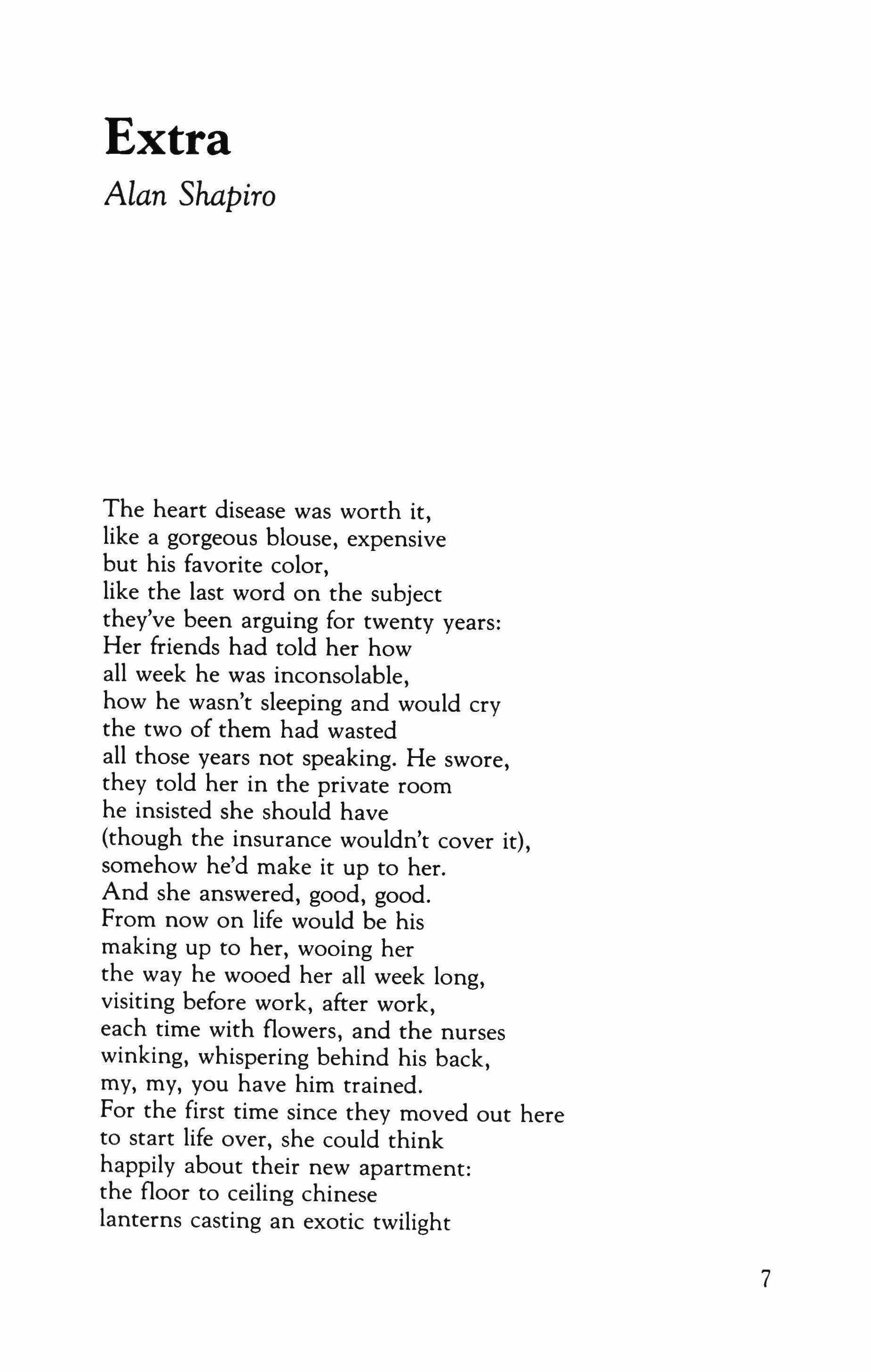
The heart disease was worth it, like a gorgeous blouse, expensive but his favorite color, like the last word on the subject they've been arguing for twenty years: Her friends had told her how all week he was inconsolable, how he wasn't sleeping and would cry the two of them had wasted all those years not speaking. He swore, they told her in the private room he insisted she should have (though the insurance wouldn't cover it), somehow he'd make it up to her. And she answered, good, good. From now on life would be his making up to her, wooing her the way he wooed her all week long, visiting before work, after work, each time with flowers, and the nurses winking, whispering behind his back, my, my, you have him trained. For the first time since they moved out here to start life over, she could think happily about their new apartment: the floor to ceiling chinese lanterns casting an exotic twilight
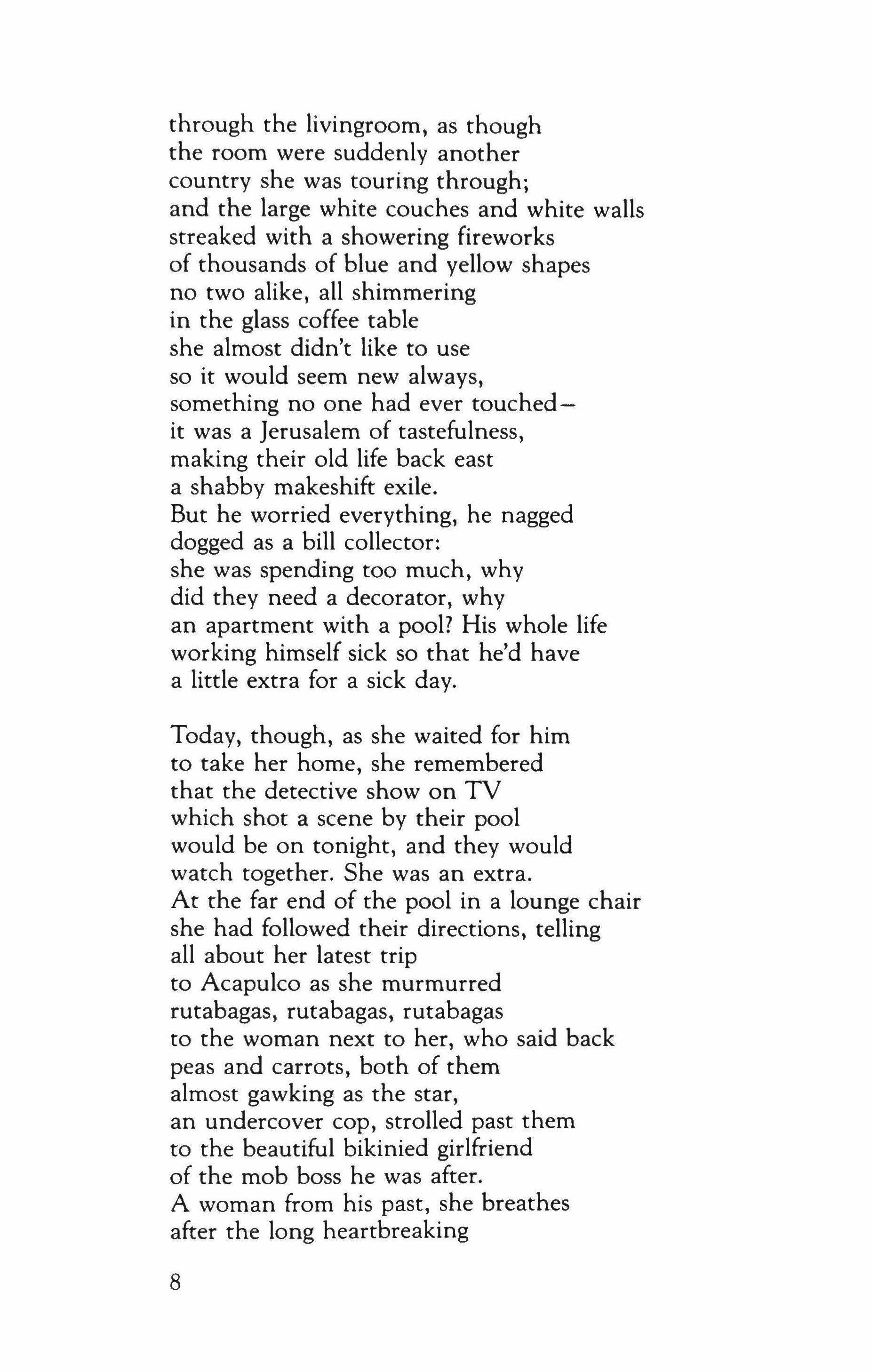
through the livingroom, as though the room were suddenly another country she was touring through; and the large white couches and white walls streaked with a showering fireworks of thousands of blue and yellow shapes no two alike, all shimmering in the glass coffee table she almost didn't like to use so it would seem new always, something no one had ever touchedit was a Jerusalem of tastefulness, making their old life back east a shabby makeshift exile. But he worried everything, he nagged dogged as a bill collector: she was spending too much, why did they need a decorator, why an apartment with a pool? His whole life working himself sick so that he'd have a little extra for a sick day.
Today, though, as she waited for him to take her home, she remembered that the detective show on TV which shot a scene by their pool would be on tonight, and they would watch together. She was an extra. At the far end of the pool in a lounge chair she had followed their directions, telling all about her latest trip to Acapulco as she murmurred rutabagas, rutabagas, rutabagas to the woman next to her, who said back peas and carrots, both of them almost gawking as the star, an undercover cop, strolled past them to the beautiful bikinied girlfriend of the mob boss he was after. A woman from his past, she breathes after the long heartbreaking 8

look of recognition, "It's been a long time since EI Paso," and the scene was over.
Back up in the apartment, life was no longer something that happened somewhere else, to others. She was near its rich stunning heart, she was someone who belonged, the kind of person the apartment promised she could be. But then when he came home and sat down on his side of the bed, his back to her, and started to polish his golf shoes because, he said, he had an early date tomorrow on his day off, and he was beat, and didn't want dinnerwhen she stood there, hearing the lavish wingbeat of the cloth against the one shoe in his lap, and staring at the other on the bed beside him, facing the little mud-streaked spikes, the large dumb back that never turned, not even when she walked out, she realized, she thought for good, that to tell him anything, anything at all that had to do with her, would be to tell him rutabagas, peas and carrots.
Yet here he was now carrying her bags down to the car, opening the door for her, and asking almost shyly, like a newlywed, if she were comfortable, could he do anything, just name it honey.
Later that day, since he was snoring, she got up for a cup of coffee. She was thinking, though the doctors

warned her not to do too much, that maybe she'd fix him a little something, when she found a slum of dishes in the sink, the refrigerator empty, no coffee, no milk - in the dull refrigerator glare nothing had ever seemed so desolate, and yet fulfilling in a way as she rushed back breathless, yelling why the hell hadn't he shopped, or cleaned up? What was he doing all week? And he bit back, making a goddamned living. It was fulfillment of a kind, the closest she could ever really get to pleasure, as she got dressed saying nothing while he stood there, saying nothing though he followed her out to the car and pleaded, honey, make a list and I'll go shopping, please, honey, let me go
She could still hear him as she drove off. In the rearview mirror he grew smaller and smaller, as though seen through the wrong end of a telescope, through the sharpening lense of spite that made him smaller, the clearer he became. And she was almost sorry, sorry for them both because she knew she would never again give up this clarity. It was easier, she knew now, to forget his brief vagrant lapses into care than to resist ever again the hard current of their long past which carried her now up and down the aisles of the supermarket, remembering all of the old complaints, how if it shines, she'd buy it, how she's never learned to live within their means - she remembered all of it and pulled down only
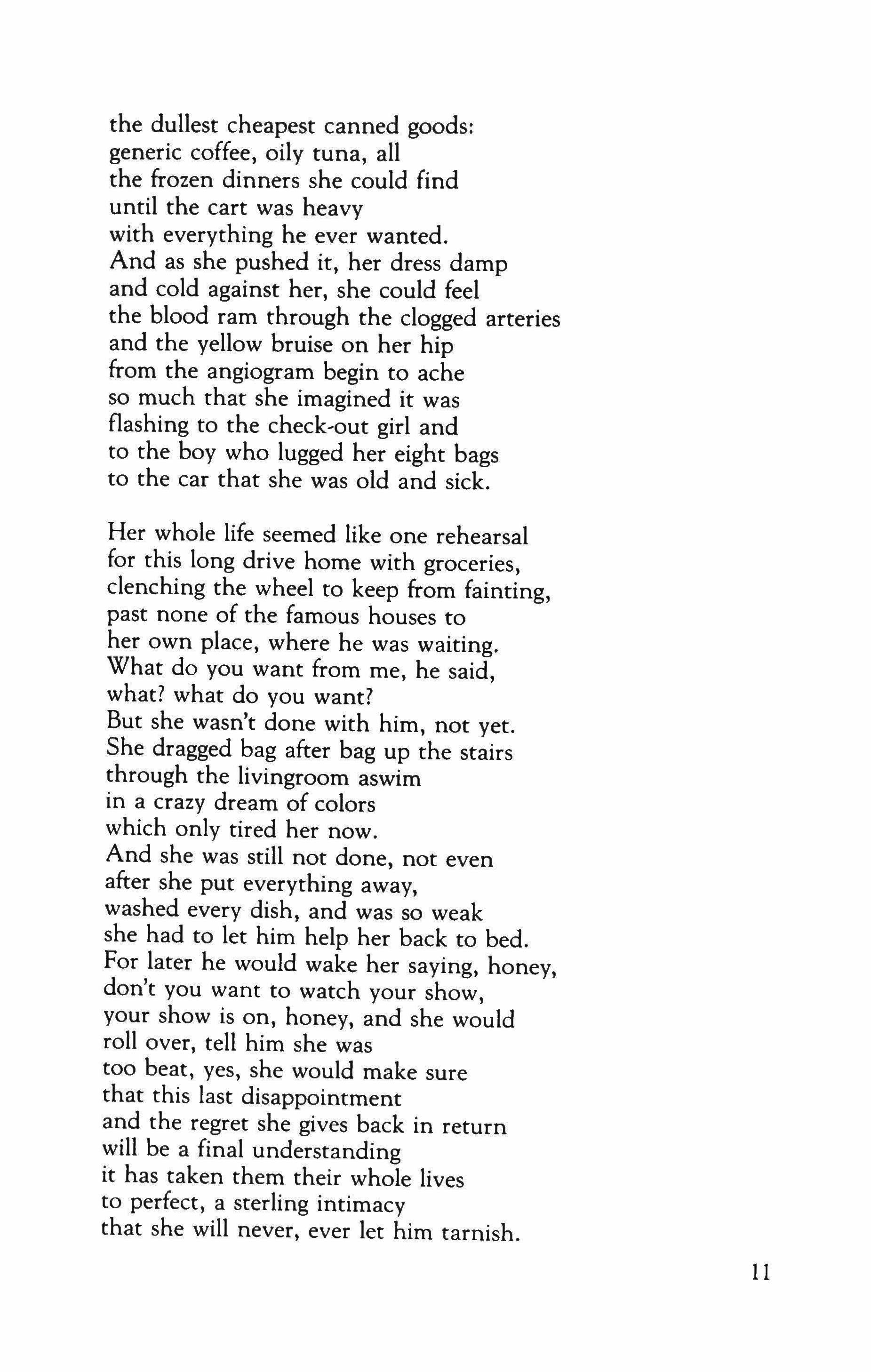
the dullest cheapest canned goods: generic coffee, oily tuna, all the frozen dinners she could find until the cart was heavy with everything he ever wanted. And as she pushed it, her dress damp and cold against her, she could feel the blood ram through the clogged arteries and the yellow bruise on her hip from the angiogram begin to ache so much that she imagined it was flashing to the check-out girl and to the boy who lugged her eight bags to the car that she was old and sick.
Her whole life seemed like one rehearsal for this long drive home with groceries, clenching the wheel to keep from fainting, past none of the famous houses to her own place, where he was waiting. What do you want from me, he said, what? what do you want? But she wasn't done with him, not yet. She dragged bag after bag up the stairs through the livingroom aswim in a crazy dream of colors which only tired her now. And she was still not done, not even after she put everything away, washed every dish, and was so weak she had to let him help her back to bed. For later he would wake her saying, honey, don't you want to watch your show, your show is on, honey, and she would roll over, tell him she was too beat, yes, she would make sure that this last disappointment and the regret she gives back in return will be a final understanding it has taken them their whole lives to perfect, a sterling intimacy that she will never, ever let him tarnish.
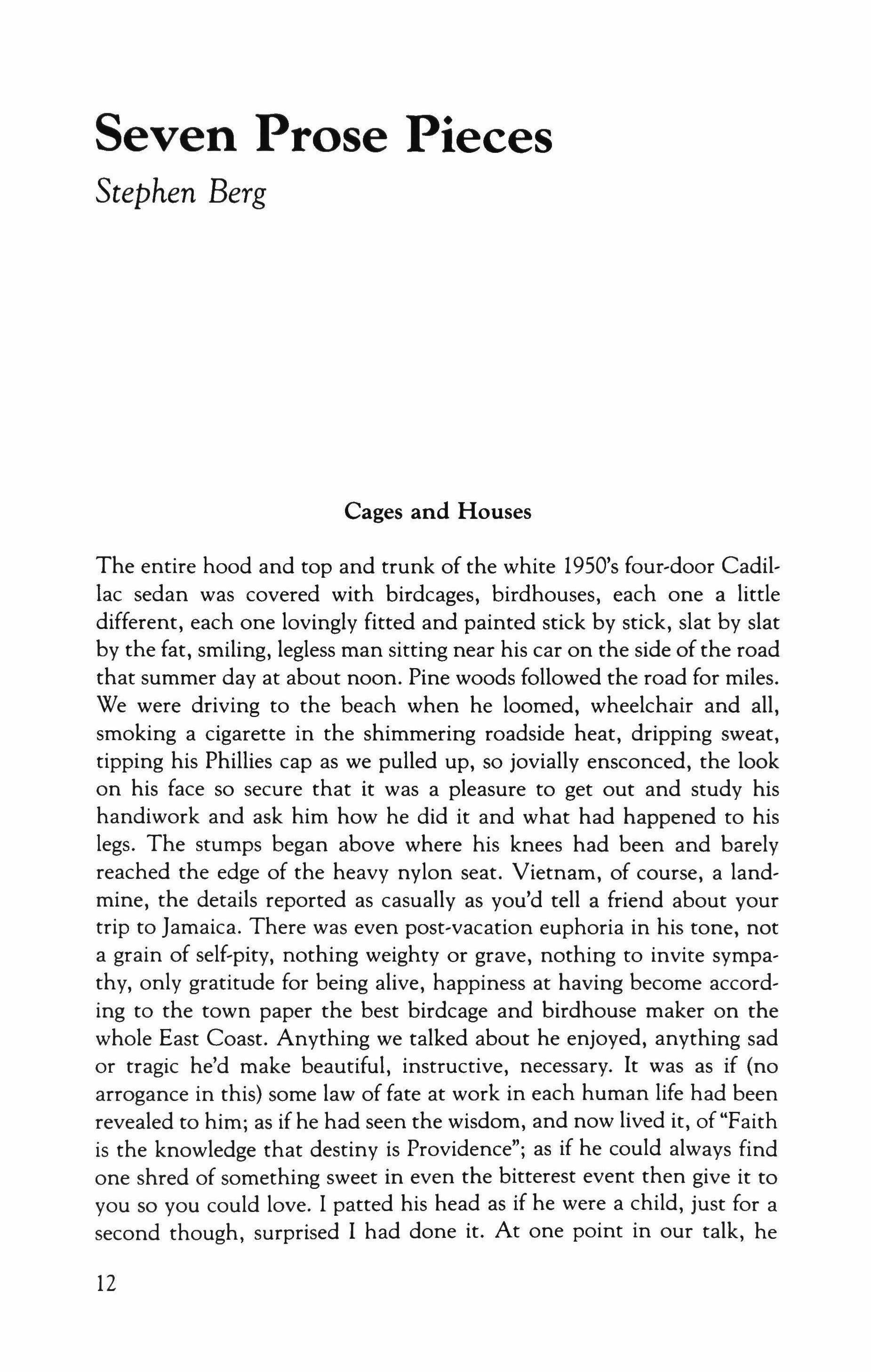
The entire hood and top and trunk of the white 1950's four-door Cadillac sedan was covered with birdcages, birdhouses, each one a little different, each one lovingly fitted and painted stick by stick, slat by slat by the fat, smiling, legless man sitting near his car on the side ofthe road that summer day at about noon. Pine woods followed the road for miles. We were driving to the beach when he loomed, wheelchair and all, smoking a cigarette in the shimmering roadside heat, dripping sweat, tipping his Phillies cap as we pulled up, so jovially ensconced, the look on his face so secure that it was a pleasure to get out and study his handiwork and ask him how he did it and what had happened to his legs. The stumps began above where his knees had been and barely reached the edge of the heavy nylon seat. Vietnam, of course, a landmine, the details reported as casually as you'd tell a friend about your trip to Jamaica. There was even post-vacation euphoria in his tone, not a grain of self-pity, nothing weighty or grave, nothing to invite sympathy, only gratitude for being alive, happiness at having become according to the town paper the best birdcage and birdhouse maker on the whole East Coast. Anything we talked about he enjoyed, anything sad or tragic he'd make beautiful, instructive, necessary. It was as if (no arrogance in this) some law of fate at work in each human life had been revealed to him; as if he had seen the wisdom, and now lived it, of"Faith is the knowledge that destiny is Providence"; as if he could always find one shred of something sweet in even the bitterest event then give it to you so you could love. I patted his head as if he were a child, just for a second though, surprised I had done it. At one point in our talk, he

reached through the back window of his car and fished out a local tabloid, snapped it open to pages three and four where a two-page spread on his war experience and his recovery and his little, flourishing business showed him with legs, then: before the war, posing in front of his barracks; and now: just as he was, selling his wares, sitting beside me, the huge endless south Jersey pines hissing and swaying behind us. There were also shots of him at home at his workbench, sawing dowels for the cages, cutting up short slats for the houses, coping a special burst of filigree or carving a decorative relief, "depending on his mood," the story said. It was his lack of arrogance I liked, the pleasure he got from direct talk, as if we had been friends for years, the matter-of-fact way he took me through the article in the paper, how glad he looked standing at attention in his uniform the year he enlisted, then his delight the first day sitting in his electric stainless-steel wheelchair, its thick fat rubber tires and rims gleaming. Just below the armrests his hands drooped on the white tires. In both shots he was smiling: his eyes said "Christ, good to see you, whoever you are, good to be here!" He had that same smile now, sitting there, looking up as we talked, the hill of red, yellow and blue cages and houses behind him on the car, a crude, handmade rainbow in the July sun. I know a man, Dan Gottleib, friend of a friend of mine, who smiled like that after his car went out of control and crashed one night when a truck tire flew off its axle from the other side of the highway and smashed through his windshield. The night after the accident, Jeff and I drove to see him in the hospital in Ephrata. He was in full body traction; part of the rig was a triangular brace fixed by three screws-the top half of their shafts stuck out-to his shaved skull at three points so he couldn't move his head. The damage to his spine was so severe he'd never walk again. He could still move his lips, eyes and arms, but not his fingers. We stood there talking. Suddenly one of us, I don't remember who, started joking about sex, foreplay especially, about how you'd better be able to keep it going forever, use your tongue, etc., etc., you know, the kind of macho shit men love because it magnifies everything so they can detach and feel for a few glorious moments like sexual giants. I remember telling him the "iron tongue" joke, hearing Dan's feeble laugh, shocked whenever I looked down at him in the criblike bed and saw how helpless he was. Soon we subsided, soon it was time for him to sleep. Before his eyes closed one last time that night he looked at both of us, smiled, and said, in a dull flat distant shell of a voice, muffled by drugs, "God, I'm glad you're here!" The hospital room glistening with equipment, its atmosphere of tragedy a relief from the boredom of the ordinary in our lives, one sweet young nurse tending the
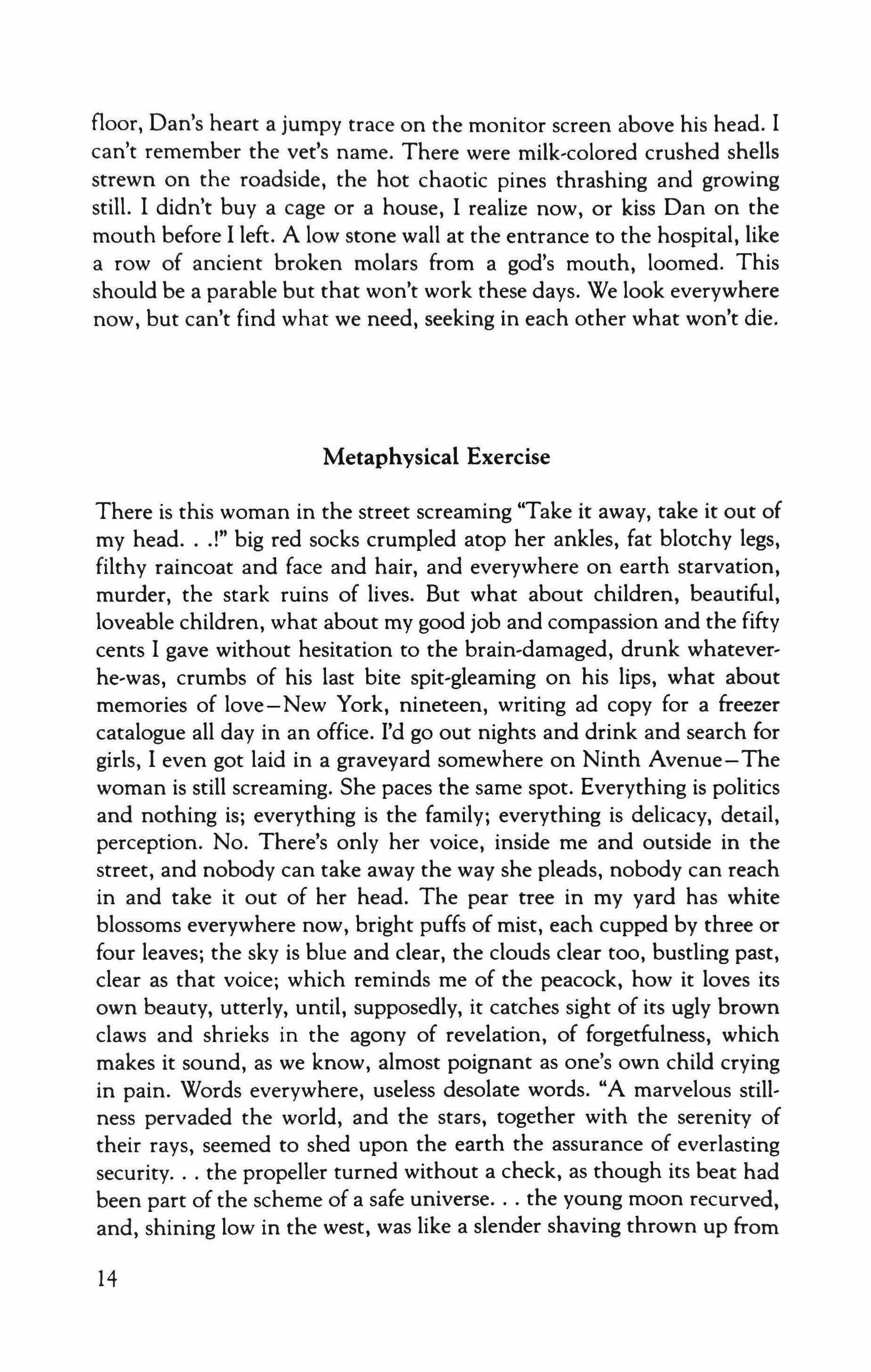
floor, Dan's heart a jumpy trace on the monitor screen above his head. I can't remember the vet's name. There were milk-colored crushed shells strewn on the roadside, the hot chaotic pines thrashing and growing still. I didn't buy a cage or a house, I realize now, or kiss Dan on the mouth before I left. A low stone wall at the entrance to the hospital, like a row of ancient broken molars from a god's mouth, loomed. This should be a parable but that won't work these days. We look everywhere now, but can't find what we need, seeking in each other what won't die.
There is this woman in the street screaming "Take it away, take it out of my head !" big red socks crumpled atop her ankles, fat blotchy legs, filthy raincoat and face and hair, and everywhere on earth starvation, murder, the stark ruins of lives. But what about children, beautiful, loveable children, what about my good job and compassion and the fifty cents I gave without hesitation to the brain-damaged, drunk whatever, he-was, crumbs of his last bite spit-gleaming on his lips, what about memories of love-New York, nineteen, writing ad copy for a freezer catalogue all day in an office. I'd go out nights and drink and search for girls, I even got laid in a graveyard somewhere on Ninth Avenue-The woman is still screaming. She paces the same spot. Everything is politics and nothing is; everything is the family; everything is delicacy, detail, perception. No. There's only her voice, inside me and outside in the street, and nobody can take away the way she pleads, nobody can reach in and take it out of her head. The pear tree in my yard has white blossoms everywhere now, bright puffs of mist, each cupped by three or four leaves; the sky is blue and clear, the clouds clear too, bustling past, clear as that voice; which reminds me of the peacock, how it loves its own beauty, utterly, until, supposedly, it catches sight of its ugly brown claws and shrieks in the agony of revelation, of forgetfulness, which makes it sound, as we know, almost poignant as one's own child crying in pain. Words everywhere, useless desolate words. "A marvelous still, ness pervaded the world, and the stars, together with the serenity of their rays, seemed to shed upon the earth the assurance of everlasting security the propeller turned without a check, as though its beat had been part of the scheme of a safe universe the young moon recurved, and, shining low in the west, was like a slender shaving thrown up from

a bar of gold -Conrad. That's how we want the world to be, but the woman goes on, inside, outside, and the street just lets her, and the store windows show her groping by, then she's gone, then she's back in them. It could be spring, summer, fall, winter. Spring would be most symbolic, with its hint of afterlife. As I see it this happens early on a bright balmy late April day, full of promise, in one of those run-down good neighborhoods inhabited once by merchants, in an eastern city. 1860 houses, mostly rehabilitated now, a few still owned by Puerto Ricans and blacks. Everywhere the pavements are stained with old tar and car oil, everyone looks bent on accomplishing errands, the air is so mild and clear. There's a strange tinge to the weather, a bleakness spoiling the edges of brightness, like the first points of rust on galvanized tin. From where I sit in my third-floor study I can see it all. A couple of small flies climb the wobbly portable screen to the top, then poP! gone. The world seen through the human eye is so clear, so understandable-joy of not needing wordsbut the chatter from the street is half blur by the time it floats up here, as if to say some portion of our lives will always be missing, always be unknown "Oh I worry don't be time it's only a " Once, when I was asleep, my three-year-old daughter, Margot, stood by my bed, talking to wake me, her face an inch or so from my face. I could feel her breath. Dawn's first blue everywhere. Still not really awake. That sweet warmth. I slitted my eyes and saw her, her face level with mine, no taller than I was, lying in bed. She'll die one day. Nothing I can do. Little blue ducks rode little pink waves on her pajamas. Her eyes. Her clear pale skin.
I walk in unzipping my fly and go into a stall, let my pants drop, sit on the cool black plastic horseshoe-shaped toilet seat, pants at my ankles, elbows on knees, head down, and leave the gray steel door open when this guy about sixty comes in and I look up just as he pops out his dick to piss in one of the urinals, glancing back at me over his shoulder. I think my bare crotch hair must offend him the way his eyes skid over me, I think he thinks "Why doesn't that creep close his door?" so I jerk my knees out of the way, swing it around, blank gray, flip up the chrome latch tongue into its keeper, and hear-"You were probably too young to remember but seeing you like that reminded me ofwhat it was like in the

Ford plant in Chester in the early thirties-unions, you know, people don't understand why they exist-they had rows of toilets and Ford ordered all the doors taken off so you could see if the man in the stall was really taking a shit or just goofing off. At the head of each row they stationed some asshole to watch and clock in and out every single worker from the second his ass hit the seat to the second he left the stall." My blank gray door. Shoes across stone. The closing men's-room door's wsss wsss wsss.
Isolated, old, face down, Reds is stretched across his bed on the second floor, wheezing, terrified, mumbling to Charlie about death, so drained by flu and asthma he can't even jack himself up an inch on his arms. I go downstairs. Wood's everywhere-shelves, kitchen utensils, pegs, notched sticks to prop up ropes, chairs, boxes. Everything glows, swept clean, mysteriously lovely, some deep irrational force ordering it the way coasts and rocks simply are and are beautiful. The two-story suburban house set hundreds of feet back from the street is eggshell white inside except for the stripped walnut moulding on windows and doors, the floor, a few raw Oriental rugs. There's also, I start to notice, biker's gear hooked on pegs-black skintight shorts that stop at the knee, black heelless cleated perforated leather shoes, a gauzy tutti-frutti cap, Cinelli stamped on the peak. A glow bleeds from everything, like a spirit. Maybe it's how light pours across the wide, unobstructed lawn, but it must be the essence of this place, how Reds has put it together out of his own mind. A few years ago his asthma almost killed him; allergic to himself, he could barely breathe. I saw him in the hospital, suffocating, steroids dripped into his arm. Day after day talking with him, watching, some hours in silence, I'd wait for the words I thought he needed, I needed. None. Then slowly he came back, but not completely, ever. Some circulatory thing had killed nerves in his toes and fingertips. On disability now, whatever he makes takes months of awkward work. The jazz guitar he'd play some days until his fingers bled sleeps in its case. Instead he bikes like mad at least sixteen miles daily twice around "The Loop" on the Schuylkill River past the Art Museum, past rock hillsides and cherry trees, rowers, sunbathers, statues, long green banks. To build his lungs and legs, his wind; to survive. When we walked into his house

it struck me: Master Carpenter Reds had done finish work for big law offices and such in Philly, but this is purely for himself, everything here Reds has put together out of hi� lonely mind. No women; nothing; nothing but this. Charlie is still upstairs, I can hear the hum of his talking. A toolchest, 3 X 3 X 3, unvarnished sanded elm, lapped edges deliberately left raw, black iron pins holding it together sits against a wall. Beside it's a short, wide ladder, too delicate to stand on, three whimsical rungs, an "idea ladder" draped with gloves, wet socks, shirts, useless except to dry belongings. The light: luminous haze as in a chapel. Now I tiptoe back upstairs and stand near the bedroom door and hear Charlie, sitting with his back to me, talking. Facing away from Charlie, on his belly, Reds has on Wigwam rag socks, his feet point down over the bedside, his grayish red-flecked beard, as always, I'm sure, stubbling his cheeks and chin. I step back and slip into the garret a few feet away where three bike rims 0 0 0 hang on pegs on a white wall and a length of clothesline running from the window frame on the far wall to the door sags over a stick. Dishrags, a riding shirt and socks touch in a cluster. A rim is locked in a wooden workshop vise; tools are laid out in a row. A bike frame, periwinkle blue, floats out on two fine wires from the ceiling, an icon, the key to a lost religion. Everything in his house seems sacred, burnished with wax and oil, everything is needed, everything comes from one source. I rest my hand on the cool metal circle in the vise. Snow veils the grass, a pale scruffy brightness. All this time, over an hour, the light hasn't changed. I imagine it never changes here. I pick up a pair ofpliers from the bench and squeeze the handles hard and feel the little give they have and let go. For a time I believe this feeling I am in is a peace that I must hold forever at the heart of my life, of all our lives, but it goes. I still stand here quieted by what I have entered. Bits of difficult breathing drift into the room. Hacking. Rags of talk. A scooped-out gray lightness like not being here or anywhere, and, off and on, something unbearable, a glimpse of another human hell I'm afraid might never stop, will increase, will trap me-like being, always, here, like this. Nobody else has a house like this. Nothing else is like this, this trio, us. I tiptoe past their two figures-one hunched forward over the other prostrate, facing away - and go downstairs. Hopelessness seeps from the wood and cleanly plastered walls, an inexplicable comfort. Out on the lawn a dark something darts by. Not one sound. The world, a disappearance, this house, these last things one man wants, are. No wonder God keeps pounding at our brains, awake, asleep, no wonder the misery of His silence is so much a part of who we are we can't recognize it. No wonder Reds used black iron nails to make that box for
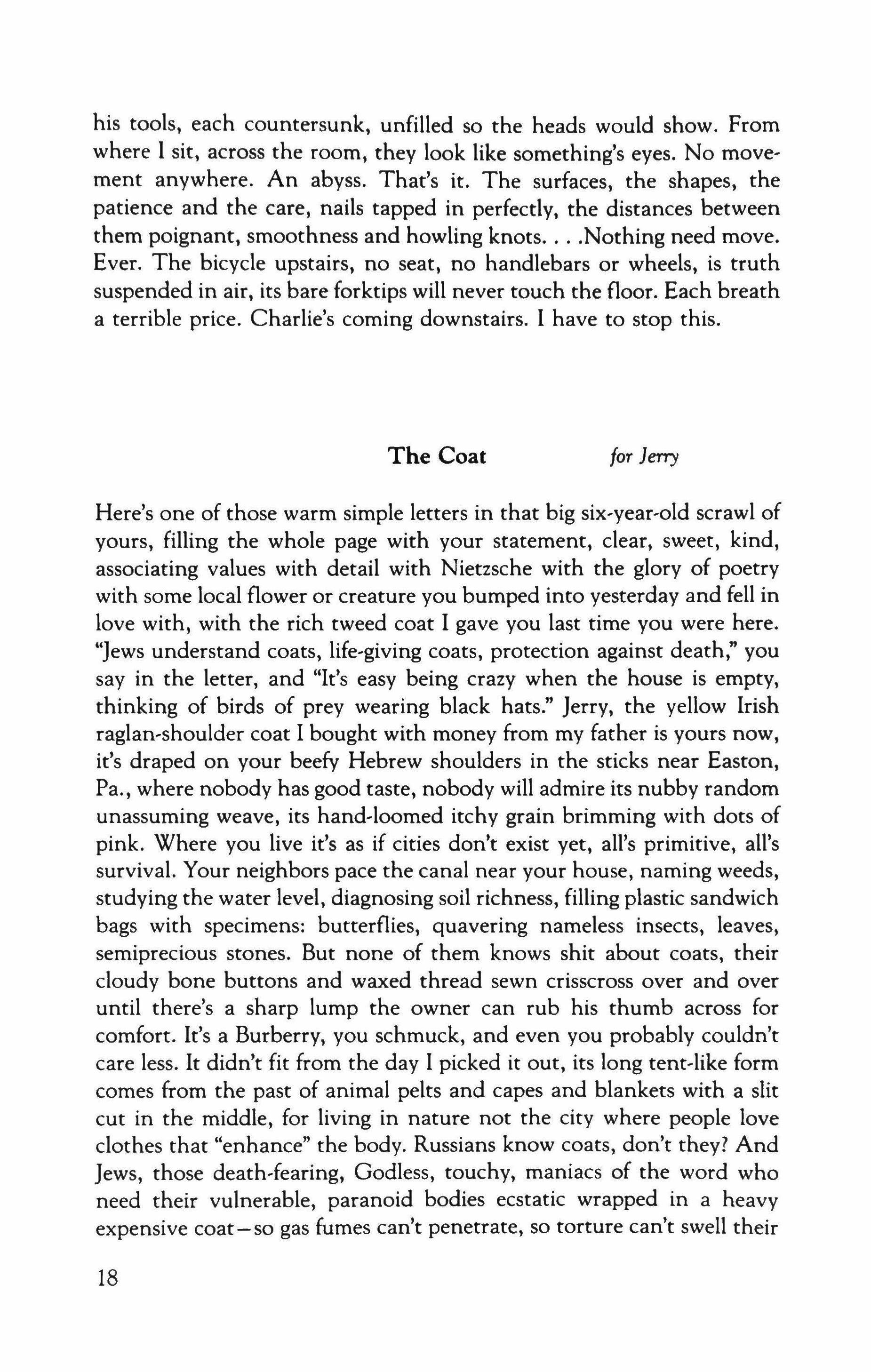
his tools, each countersunk, unfilled so the heads would show. From where I sit, across the room, they look like something's eyes. No movement anywhere. An abyss. That's it. The surfaces, the shapes, the patience and the care, nails tapped in perfectly, the distances between them poignant, smoothness and howling knots Nothing need move. Ever. The bicycle upstairs, no seat, no handlebars or wheels, is truth suspended in air, its bare forktips will never touch the floor. Each breath a terrible price. Charlie's coming downstairs. I have to stop this.
Here's one of those warm simple letters in that big six-year-old scrawl of yours, filling the whole page with your statement, clear, sweet, kind, associating values with detail with Nietzsche with the glory of poetry with some local flower or creature you bumped into yesterday and fell in love with, with the rich tweed coat I gave you last time you were here. "Jews understand coats, life-giving coats, protection against death," you say in the letter, and "It's easy being crazy when the house is empty, thinking of birds of prey wearing black hats." Jerry, the yellow Irish raglan-shoulder coat I bought with money from my father is yours now, it's draped on your beefy Hebrew shoulders in the sticks near Easton, Pa., where nobody has good taste, nobody will admire its nubby random unassuming weave, its hand-loomed itchy grain brimming with dots of pink. Where you live it's as if cities don't exist yet, all's primitive, all's survival. Your neighbors pace the canal near your house, naming weeds, studying the water level, diagnosing soil richness, filling plastic sandwich bags with specimens: butterflies, quavering nameless insects, leaves, semiprecious stones. But none of them knows shit about coats, their cloudy bone buttons and waxed thread sewn crisscross over and over until there's a sharp lump the owner can rub his thumb across for comfort. It's a Burberry, you schmuck, and even you probably couldn't care less. It didn't fit from the day I picked it out, its long tent-like form comes from the past of animal pelts and capes and blankets with a slit cut in the middle, for living in nature not the city where people love clothes that "enhance" the body. Russians know coats, don't they? And Jews, those death-fearing, Godless, touchy, maniacs of the word who need their vulnerable, paranoid bodies ecstatic wrapped in a heavy expensive coat-so gas fumes can't penetrate, so torture can't swell their

ankles and wrists, so the ideas of clean rigid Gentiles who believe in social justice, in eliminating obstructions to justice, can't get in, so the hands of strangers on a bus or in a street crowd can't reach their delicate skin, so even the hands of a tender love can't change their mood. Eliot, Pound and Joyce bought themselves coats, showed off gorgeous Isle of Skves, Meltons, Sheared Camel Hairs, hoping it would drop below zero just to test how absolute their coats were, whether they were true mortal coats that could give life, define life, save life. What a Jewish idea! But I believe it. A coat so well-made, so thick and fine it could actually prevent death: an immortality coat! Right now I want my coat back, Jerry, even though it's late May; it's the only coat I know that might help me live forever. But I blow myself a stupid effeminate kiss in the long bathroom mirror instead, down to my crotch, I begin to lather and shave, a kiss instead of a coat, and feel the just sadness of how much I'll miss that sack of stitched woven hair come December. Naked, I shave, an hour before leaving to teach, zipping a blue plastic Good News across cheek over chin up to the lip under a nostril, and it strikes me that I should lecture on coats today not poetry, inspired by the coat I gave you, which has probably fallen off its cheap wire hanger by now, a blurred heap among gashed rubber boots, the vacuum cleaner, outgrown ice skates, twisted felt hats and whatever else you've chucked down there to be sold at a yard sale. My lecture should explain the coat's power to stop death and somehow should, I think, represent divine coats by an act that uses a real coat somehow. I'll wear one of my coats to class. I walk in. Take out my note cards, still wearing my coat. I keep it on. Suddenly they're quiet. I'm talking about the coat, your coat, the coat. Brilliant. Euphoric. Letting my mind speak, wandering in all its honest blindness. And I add "Lusting for a hundred things this morning, I'd rather have a coat than anything, deep, unassailable wool to shield a back and chest on a cold night so securely that the man who wears it feels he can stand anything, do anything, survive even his own death, grateful for the feel of it, for the weight, the reassuring dense goodness against his bare hands, for the shiny trace of oil it leaves in a film on his palms and fingers." Then I call one student up and draw her inside my coat by opening it like Dracula, still lecturing, and button us in and feel her jump when my crazy stiff dick springs and pulses against her belly, still lecturing about coats, whispering, declaiming, gesturing, making scholarly digressions, invoking history, origins, fashions, cloth, hissing out of the side of my mouth to her-"Stay calm, don't let anybody know" as her hand slips it in a little and I sway a little, finishing, asking questions, answering questions, blithely in touch with their faces

as she comes, three or four muffled tremors. All this time both our faces turned toward the class, and she's tittering as if the whole thing is merely a lecture on coats. "What a beautiful coat you have," she says, "so roomy, warm," and I thank her for the compliment, say "But you should see the one I gave Jerry," unable to recall one thing I've said to the class during the last few minutes. Ah, this life, which even the best coat can't protect us from; this death, too strong for the warmest coat there is. Nevertheless, there are coats that will never let us die-I know it. Every time I step into the hall closet and sniff its musty dark and rove my hands over the coats-first shoulders, then the long drape of the body-awed by their dark softness, and caress mine, I pray it's one of those coats, the holy ones. I close the door and stay in there as long as I can blindly nuzzling and singing.
You have to be a genius to cure yourself of the wounds of childhood, family, you name it, whatever comes back near thirty to stop you, change you, sear you, turn you into a person you almost can't recognize anymore, can't bear, so that existence itself-a once familiar unattractive chair, rug fraying, paint chipping, shadows passing across the sun, a wayward random look on a known face, are all threats, murderous differences between your ability to control reality so you can have it, hold it, lean on it, and the freedom of the world to be itself, to change, to always change. Each of us is a sleeper in this, The Principle. No one is fully awake in it, fully with it, of it, until it isn't even a thought, it isn't even capable of being abstracted because that old animal we are is free now, the ego shattered and back in place but all at once what it was, is, and could be. Something like that may have happened to me in my parent's bedroom in Longport, N.J., a few years back, eight years to be exact-summer, early dawn, before the mind has a chance to let its own light merge with the world's, before dreams have resolved their bright, true disconnected pieces into a few streaks, a trace, a little nonexistence, haze of moodiness, worry, interpretation, understanding. My father's dead body. That sentence: as if my father and his body were two separate things, and always had been. The way we think of ourselves, like that. You have to be a genius, that's for sure. And even if we are, you think books-Kant, Melville, Cervantes, Freud (biggies)-you think if

only I had read this by so-and-so, that by so-and-so then I'd really know, then I'd be smart enough, deep enough, real enough, strong enough, so I better go out and chew that book, sniff that one, etc., I can't really make up my mind until I finish Aristotle's Metaphysics, fathom The Criro, learn Greek, whatever. What a schmuck! as my father used to say when he heard me say or saw me do something stupid. The fact of the dead body of my father. What about that fact? Not much of a book. No words. Not a fart or a tune or a single droolv tear, not a peep, not that ordinary-when-he-lived now-50-wonderful "How are you son?" just this very very heavy, 0 immovable thing with bluish gray-green patches on its free arm and its cheek, lying on its side-Dad, you look asleep! Hey! You really look only asleep-the poor thing's eyes lightless behind halfopen lids, a brown bottle on the floor, tiny white pills scattered like seeds, as I grab your shoulder, Dad, knowing you are dead, and shake you and feel what dead weight really means; you barely can be moved as I try to shake you because maybe you are asleep and if it weren't for the bedsprings you'd be a statue made of plaster or wood and only a kick in the ass could move you. I go over and close the door and drag a chair up to the bed and sit and look at you. Way off behind me the sea pushes and slides, as always. There's a black sack, somewhere, in a book, in my mind, with a man in it, waiting. It flashes up. It flashes past me then. He will be in it. But there's no boundary to consciousness, so deep in every direction it extends. Mind like smoke, as Heraclitus says, less mass than anything, always in motion, and only movement can know movement. Gloomy, ugly and rough, the Sybil's voice, and mad, but true for a thousand years because a god speaks through her. Corpse. The authority of the dead though they can't give orders, or see, or pay bills, or fuck. o no more fucking and eating! No more love! Each sleeper in a world of his own, each sharing this world when awake. Dawn glazing the room. Pale grainy blue, unconsolingly tenacious as it takes in ashtray, wallet, mirror, rug, face, doorknob, ring of keys, even the blind eyes of the dead man. Us. Light. Nothing. His face still pointing on its side toward the window and the sea, seeing nothing, not seeing, not, not not, a spiny dot of blood inches from his lips on the pillow. I bend over, touch his cheek. Real. Really dead. I clutch his shoulder again to see what he weighs, to move him. I know I stroke his forehead-God forgive me, I am thinking of patting a dog-stroke it as if to tell him I understand what it is to have gone through this, to have achieved such unrewardable dignity. Which is of course nonsense. To help my helplessness. But to attempt to love someone after his death in the belief-it can only be belief-that love penetrates death, and is stronger, as it is in life when we

love and feel time snag itself on a faucet, chair, cup, as in those moments of love when we are so fully here that the "I" flares into nonexistence, we are dead enough to be dead, live enough to be alive, time-whatever that terrorizing flood really is-forced to disappear into others and objects. I touch his pajama sleeve, I know I do. I know it. Something is happening to knowing, to being conscious. It is daylight. It is the real. I know it: yes. One must talk about everything according to its nature, how it comes to be and how it grows. I am trying. Men have talked about the world without paying attention to the world or to their own minds as if they were asleep or absentminded. A quote. Of course I'm referring to myself, and so I want to talk about this, but I'm not even sure what this is. I know - back there now again - that I sat there for a time, though I can't remember saying one word except for a sentence (which must have been the first before all the others)-I know I spoke for awhile, but it's as if it happened in sleep or not at all, no evidence to prove it, not a shred of it within reach. Talking to a corpse is, I know, ridiculous, if not insane. And the room, I remember this much, the corpse, my not-so-very-old, old Dad, men, the room, simply disappeared for a time. A time which began with a dreadful, accusatory breach of courtesy - so much a sign of the music of broken love - "Oh you goddam sonofabitch!" If all this happened beyond my consciousness imagine a dimension of awareness in which self-consciousness as an image of your body and hearing and sight doesn't exist, but you sense instead a silent discourse of such truth and urgency that the everyday form of knowing must be withdrawn to tolerate its coming so that it can occur at all; when it is happening you are conscious but consciousness, in this case, is like the edge of a burning forest ringing some bleak coastline, the outermost heart of that edge: you know that something rage-like and fluid has been born and is spending its entire life in a moment, a long, full, infinitely nonlinear moment, and that you have been pushed into the background of yourself, like a drawer being shut tight, and that the furniture also has been cleared from the face of sight, and that what is everything now is only what's between you and it, no more you, no more it, simply the between, a darkness and a wind and a distant howling rim of a mouth on the edge of the fire roar, the coming apart of solids, a taste of that other possible physical actuality-no name for itwhich makes us possible. So. This is the threshold of not knowing and of having to know: what I said sitting beside his body-merely one blast, one introductory soulful blast, after which it's a blank, but a blank I'll recreate someday. Meanwhile I think I must have become some kind of purely intuitive cosmic voice, so transparent, so fully responsive to him,

to it, so unselfconscious behind the closed bedroom door that it doesn't matter who I was, what I was, whether I was, or even what I really did say. Let me get back to touch. How can I define the body of my dead father? What metaphysical implications can I say I saw there, felt there? That he had fallen across a path, time's path, like a tree, and that from the moment I saw his body time changed for me from a smooth-flowing element like breath into something like the mind itself, aware from then on that every instant is the possibility of interruption by death? That now the butterfly, i.e., the soul, constructed of thing-stripped, transparent words, was free to ascend? No. "The terrifying material being that is the corpse" was unable to change position. For the first time my father (except when he was unconscious, during an operation or asleep) was a thing. No. Things don't die like people, don't simply stop. He was like stone, gold, wood, what things get changed into in myths and fairy tales. Now I was watching him in that shameful transition on our trek to the invisible when we are still here, infinitely stubborn in death at the beginning of death, insultingly absolute-on his way to that path which runs between the head and the heart where our best-loved ghosts are doomed to run, back and forth, up and down, between intellect and feeling: memory: a link between time and an absence that holds only after enough deaths, loves, losses, confusions, desires have given the road its texture, a character all its own, inside each of us. The night before he died I was lying in bed watching TV in the motel room my wife and daughters had taken at the beach half a block away from where he and my mother vacationed in the summer. At about ten a knock. My father, walking the dog, my mother's peewee black poodle. He wanted to say goodnight. I was too lazy, too worn out from the months of his dying, to get up and go to the door and say goodnight. Maybe I thought "He's lived this long, what's one more night?" But he didn't live one more night. He died in his sleep. I see that room and his body, me leaning toward him, and everything is a white blank. And in between the speech of nobody-knows-who, the flank of the blank sea glittering, in a silence. Then the door buzzer's whine and in walks the country corpsecarrier with his thick brown canvas sack, and in he goes to the bedroom ("I've stepped out") where he stays for a minute or two, then out he comes shouldering my father's body inside the sack, closed at one end by a thick glistening grin of steel zipper teeth, walks out the door as I go back into the bedroom close the door and sit there, God knows how long, in the echo of soliloquy. I remember at one point when he was still in the bed I placed my ear very slowly against his chest after I undid one button on his pajama shirt and stayed there and heard absolutely noth-
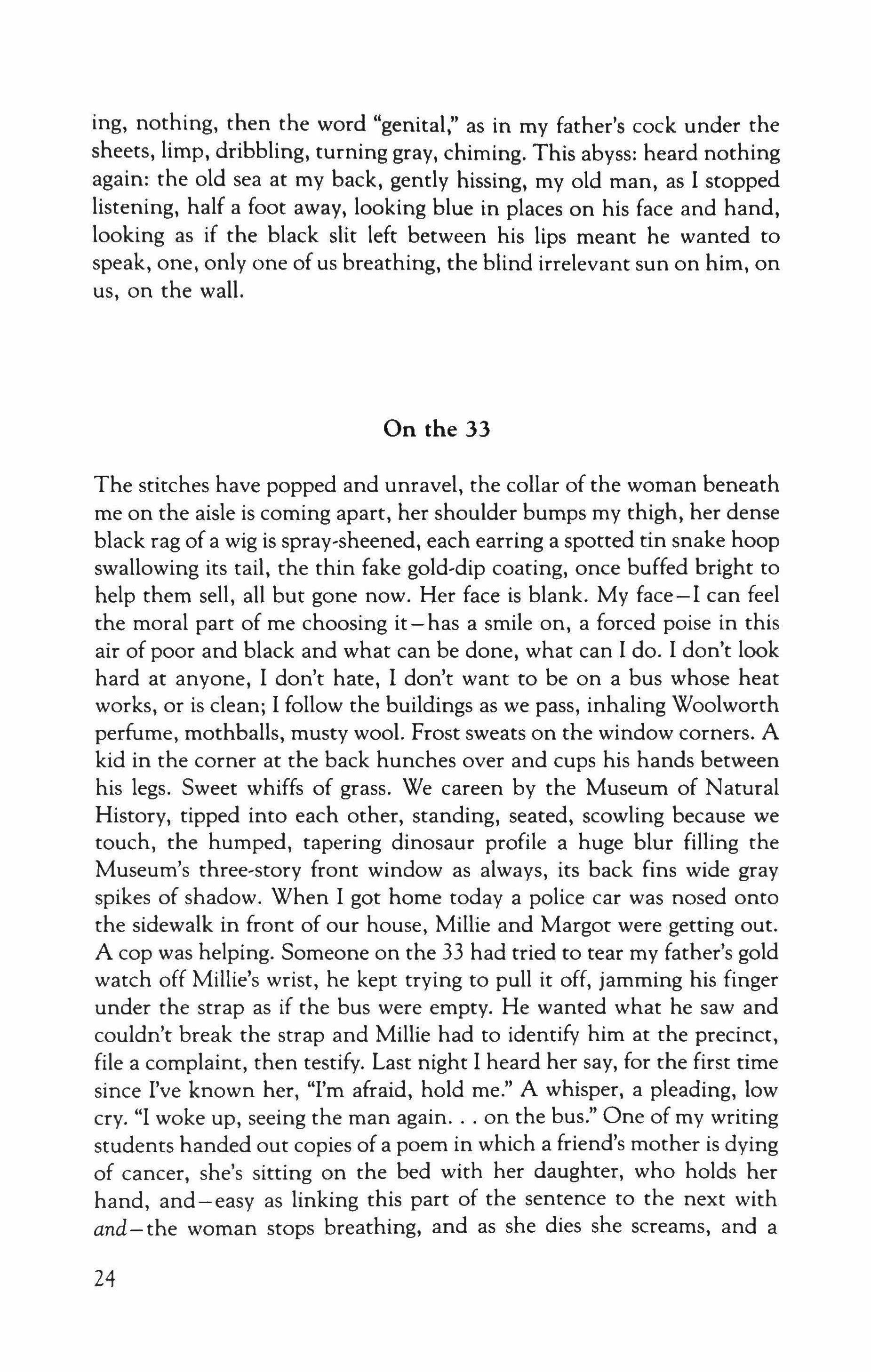
ing, nothing, then the word "genital," as in my father's cock under the sheets, limp, dribbling, turning gray, chiming. This abyss: heard nothing again: the old sea at my back, gently hissing, myoid man, as I stopped listening, half a foot away, looking blue in places on his face and hand, looking as if the black slit left between his lips meant he wanted to speak, one, only one of us breathing, the blind irrelevant sun on him, on us, on the wall.
The stitches have popped and unravel, the collar of the woman beneath me on the aisle is coming apart, her shoulder bumps my thigh, her dense black rag of a wig is spray-sheened, each earring a spotted tin snake hoop swallowing its tail, the thin fake gold-dip coating, once buffed bright to help them sell, all but gone now. Her face is blank. My face-I can feel the moral part of me choosing it - has a smile on, a forced poise in this air of poor and black and what can be done, what can I do. I don't look hard at anyone, I don't hate, I don't want to be on a bus whose heat works, or is clean; I follow the buildings as we pass, inhaling Woolworth perfume, mothballs, musty wool. Frost sweats on the window corners. A kid in the corner at the back hunches over and cups his hands between his legs. Sweet whiffs of grass. We careen by the Museum of Natural History, tipped into each other, standing, seated, scowling because we touch, the humped, tapering dinosaur profile a huge blur filling the Museum's three-story front window as always, its back fins wide gray spikes of shadow. When I got home today a police car was nosed onto the sidewalk in front of our house, Millie and Margot were getting out. A cop was helping. Someone on the 33 had tried to tear my father's gold watch off Millie's wrist, he kept trying to pull it off, jamming his finger under the strap as if the bus were empty. He wanted what he saw and couldn't break the strap and Millie had to identify him at the precinct, file a complaint, then testify. Last night I heard her say, for the first time since I've known her, "I'm afraid, hold me." A whisper, a pleading, low cry. "I woke up, seeing the man again on the bus." One of my writing students handed out copies of a poem in which a friend's mother is dying of cancer, she's sitting on the bed with her daughter, who holds her hand, and-easy as linking this part of the sentence to the next with and-the woman stops breathing, and as she dies she screams, and a
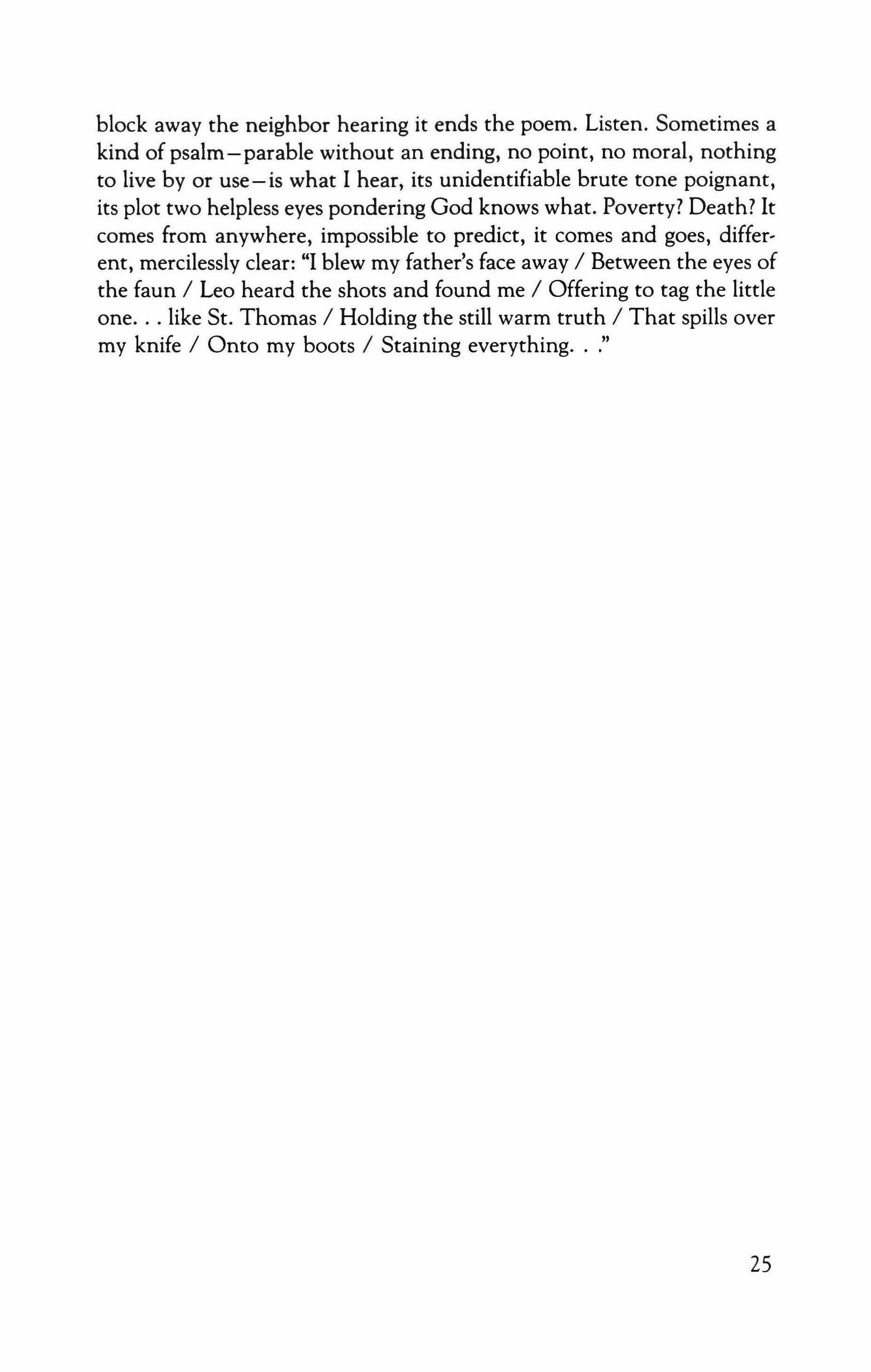
block away the neighbor hearing it ends the poem. Listen. Sometimes a kind of psalm-parable without an ending, no point, no moral, nothing to live by or use-is what I hear, its unidentifiable brute tone poignant, its plot two helpless eyes pondering God knows what. Poverty? Death? It comes from anywhere, impossible to predict, it comes and goes, different, mercilessly clear: "I blew my father's face away / Between the eyes of the faun / Leo heard the shots and found me / Offering to tag the little one like St. Thomas / Holding the still warm truth / That spills over my knife / Onto my boots / Staining everything
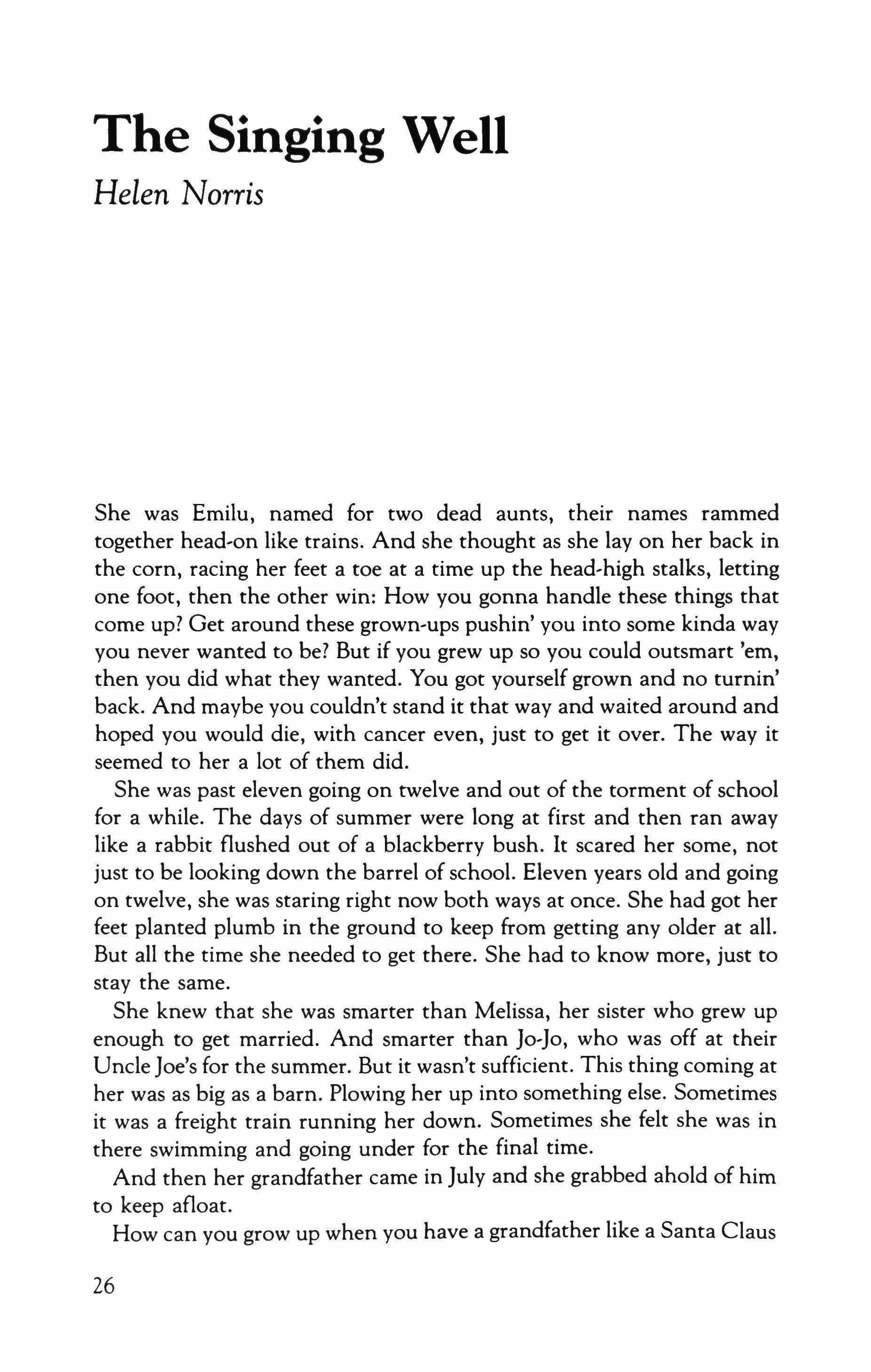
She was Emilu, named for two dead aunts, their names rammed together head-on like trains. And she thought as she lay on her back in the corn, racing her feet a toe at a time up the head-high stalks, letting one foot, then the other win: How you gonna handle these things that come up? Get around these grown-ups pushin' you into some kinda way you never wanted to be? But if you grew up so you could outsmart 'em, then you did what they wanted. You got yourself grown and no turnin' back. And maybe you couldn't stand it that way and waited around and hoped you would die, with cancer even, just to get it over. The way it seemed to her a lot of them did.
She was past eleven going on twelve and out of the torment of school for a while. The days of summer were long at first and then ran away like a rabbit flushed out of a blackberry bush. It scared her some, not just to be looking down the barrel of school. Eleven years old and going on twelve, she was staring right now both ways at once. She had got her feet planted plumb in the ground to keep from getting any older at all. But all the time she needed to get there. She had to know more, just to stay the same.
She knew that she was smarter than Melissa, her sister who grew up enough to get married. And smarter than jo-]o, who was off at their Uncle Joe's for the summer. But it wasn't sufficient. This thing coming at her was as big as a barn. Plowing her up into something else. Sometimes it was a freight train running her down. Sometimes she felt she was in there swimming and going under for the final time.
And then her grandfather came in July and she grabbed ahold of him to keep afloat.
How can you grow up when you have a grandfather like a Santa Claus
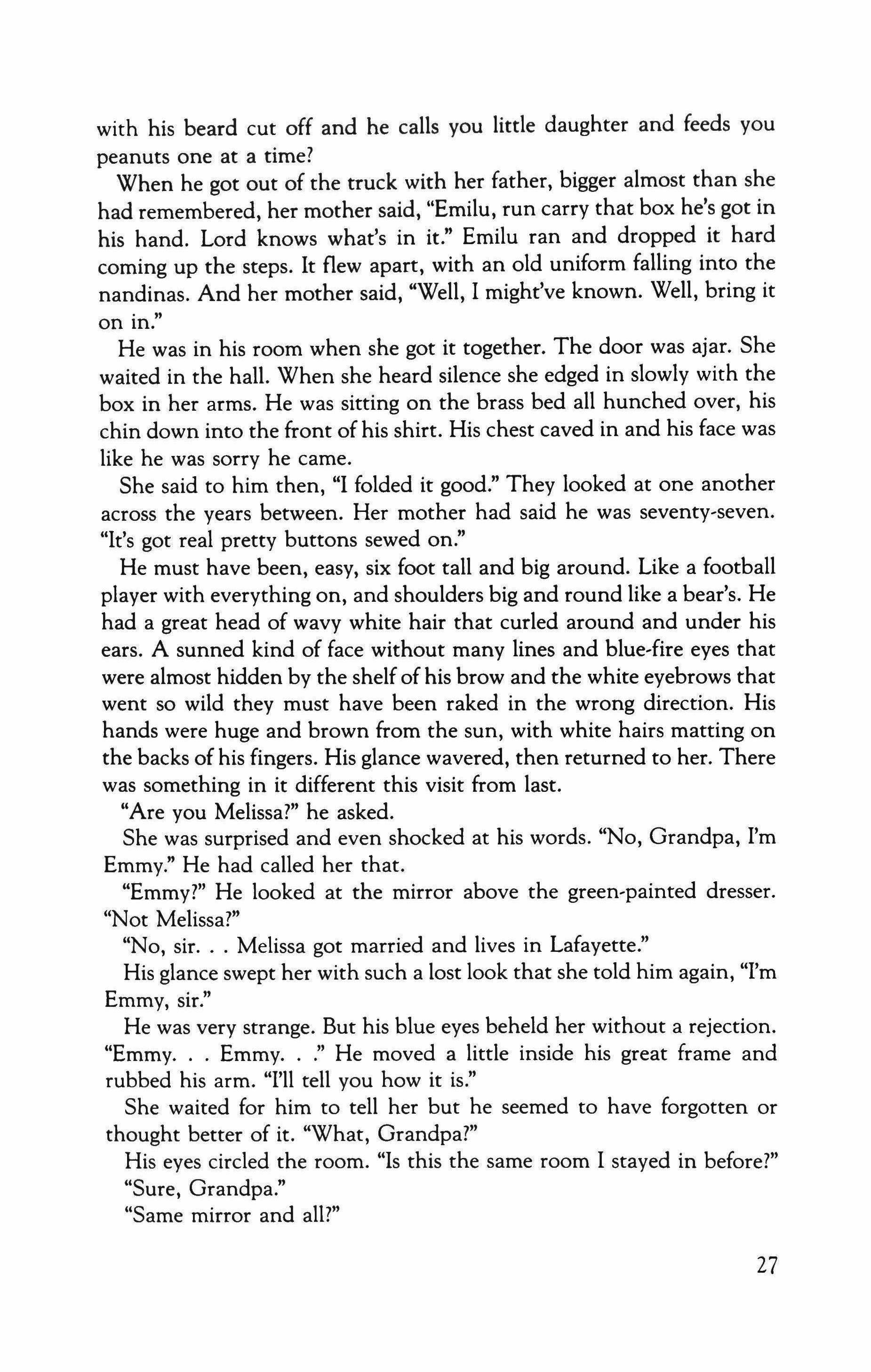
with his beard cut off and he calls you little daughter and feeds you peanuts one at a time?
When he got out of the truck with her father, bigger almost than she had remembered, her mother said, "Emilu, run carry that box he's got in his hand. Lord knows what's in it." Emilu ran and dropped it hard coming up the steps. It flew apart, with an old uniform falling into the nandinas. And her mother said, "Well, I might've known. Well, bring it on m.
He was in his room when she got it together. The door was ajar. She waited in the hall. When she heard silence she edged in slowly with the box in her arms. He was sitting on the brass bed all hunched over, his chin down into the front of his shirt. His chest caved in and his face was like he was sorry he came.
She said to him then, "I folded it good." They looked at one another across the years between. Her mother had said he was seventy-seven. "It's got real pretty buttons sewed on."
He must have been, easy, six foot tall and big around. Like a football player with everything on, and shoulders big and round like a bear's. He had a great head of wavy white hair that curled around and under his ears. A sunned kind of face without many lines and blue-fire eyes that were almost hidden by the shelf of his brow and the white eyebrows that went so wild they must have been raked in the wrong direction. His hands were huge and brown from the sun, with white hairs matting on the backs of his fingers. His glance wavered, then returned to her. There was something in it different this visit from last.
"Are you Melissa?" he asked.
She was surprised and even shocked at his words. "No, Grandpa, I'm Emmy." He had called her that.
"Emmy?" He looked at the mirror above the green-painted dresser. "Not Melissa?"
"No, sir Melissa got married and lives in Lafayette."
His glance swept her with such a lost look that she told him again, "I'm Emmy, sir."
He was very strange. But his blue eyes beheld her without a rejection. "Emmy. Emmy. ." He moved a little inside his great frame and rubbed his arm. "I'll tell you how it is."
She waited for him to tell her but he seemed to have forgotten or thought better of it. "What, Grandpa?"
His eyes circled the room. "Is this the same room I stayed in before?"
"Sure, Grandpa."
"Same mirror and all?"
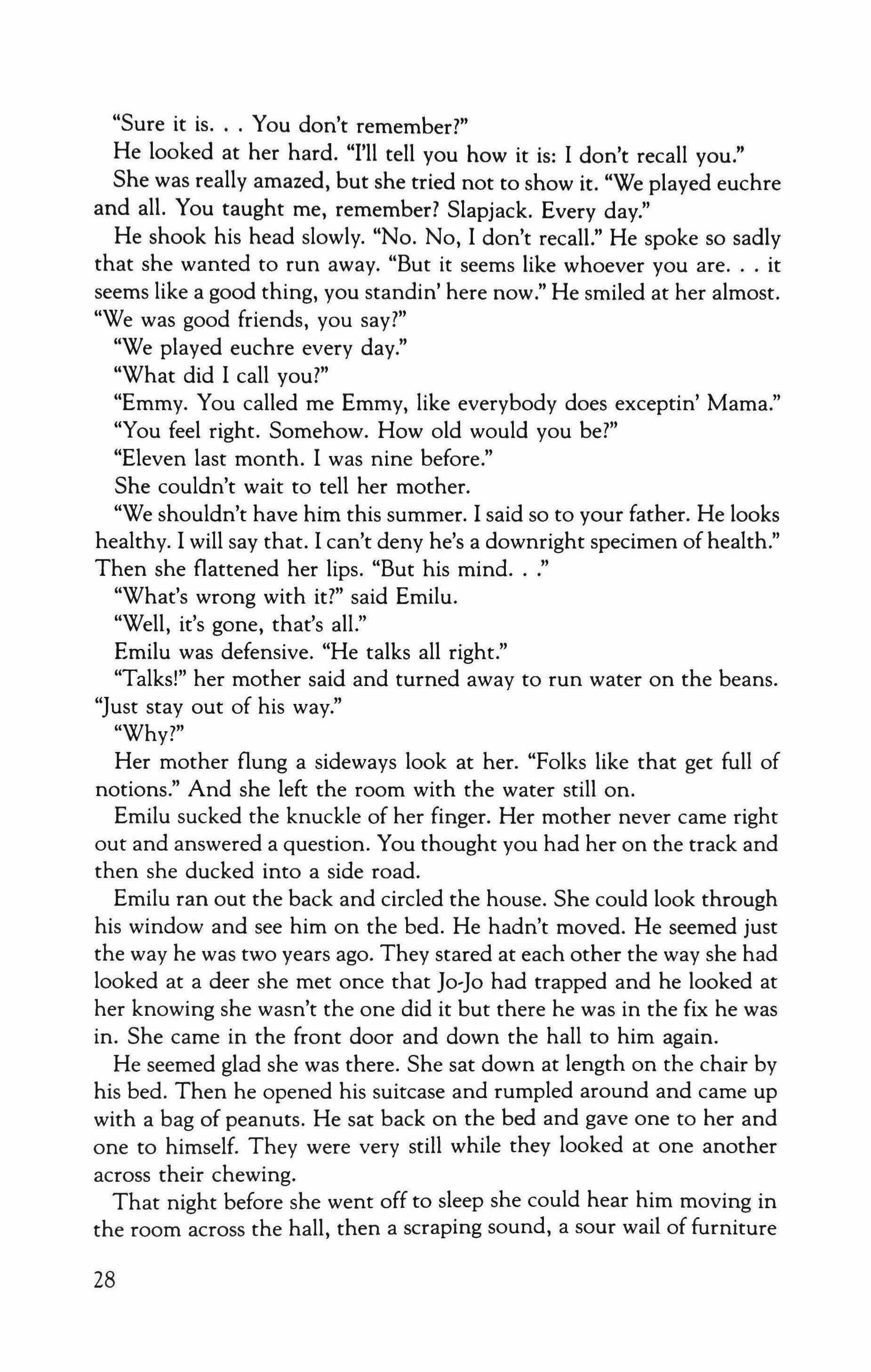
"Sure it is You don't remember?"
He looked at her hard. "I'll tell you how it is: I don't recall you."
She was really amazed, but she tried not to show it. "We played euchre and all. You taught me, remember? Slapjack. Every day."
He shook his head slowly. "No. No, I don't recall." He spoke so sadly that she wanted to run away. "But it seems like whoever you are it seems like a good thing, you standin' here now." He smiled at her almost. "We was good friends, you say?"
"We played euchre every day."
"What did I call you?"
"Emmy. You called me Emmy, like everybody does exceptin' Marna."
"You feel right. Somehow. How old would you be?"
"Eleven last month. I was nine before."
She couldn't wait to tell her mother.
"We shouldn't have him this summer. I said so to your father. He looks healthy. I will say that. I can't deny he's a downright specimen of health." Then she flattened her lips. "But his mind
"What's wrong with it?" said Emilu.
"Well, it's gone, that's all."
Emilu was defensive. "He talks all right."
"Talks!" her mother said and turned away to run water on the beans. "Just stay out of his way."
"Why?"
Her mother flung a sideways look at her. "Folks like that get full of notions." And she left the room with the water still on.
Emilu sucked the knuckle of her finger. Her mother never carne right out and answered a question. You thought you had her on the track and then she ducked into a side road.
Emilu ran out the back and circled the house. She could look through his window and see him on the bed. He hadn't moved. He seemed just the way he was two years ago. They stared at each other the way she had looked at a deer she met once that jo-]o had trapped and he looked at her knowing she wasn't the one did it but there he was in the fix he was in. She carne in the front door and down the hall to him again.
He seemed glad she was there. She sat down at length on the chair by his bed. Then he opened his suitcase and rumpled around and carne up with a bag of peanuts. He sat back on the bed and gave one to her and one to himself. They were very still while they looked at one another across their chewing.
That night before she went off to sleep she could hear him moving in the room across the hall, then a scraping sound, a sour wail of furniture
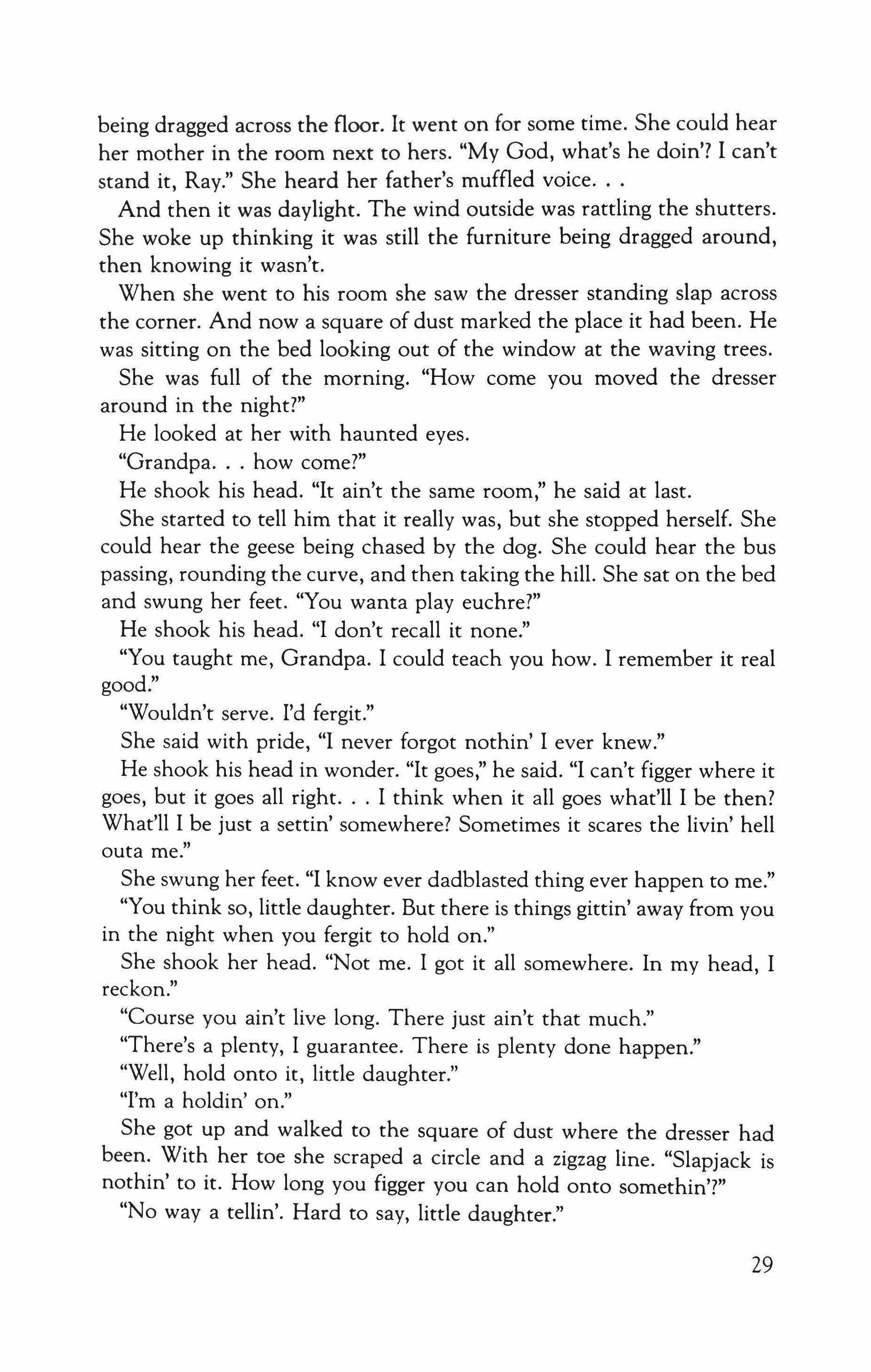
being dragged across the floor. It went on for some time. She could hear her mother in the room next to hers. "My God, what's he doin'? I can't stand it, Ray." She heard her father's muffled voice
And then it was daylight. The wind outside was rattling the shutters. She woke up thinking it was still the furniture being dragged around, then knowing it wasn't.
When she went to his room she saw the dresser standing slap across the corner. And now a square of dust marked the place it had been. He was sitting on the bed looking out of the window at the waving trees.
She was full of the morning. "How come you moved the dresser around in the night?"
He looked at her with haunted eyes.
"Grandpa how come?"
He shook his head. "It ain't the same room," he said at last.
She started to tell him that it really was, but she stopped herself. She could hear the geese being chased by the dog. She could hear the bus passing, rounding the curve, and then taking the hill. She sat on the bed and swung her feet. "You wanta play euchre?"
He shook his head. "I don't recall it none."
"You taught me, Grandpa. I could teach you how. I remember it real good!'
"Wouldn't serve. I'd fergit."
She said with pride, "I never forgot nothin' I ever knew."
He shook his head in wonder. "It goes," he said. "I can't figger where it goes, but it goes all right I think when it all goes what'll I be then? What'll I be just a settin' somewhere? Sometimes it scares the livin' hell outa me."
She swung her feet. "I know ever dadblasted thing ever happen to me."
"You think so, little daughter. But there is things gittin' away from you in the night when you fergit to hold on."
She shook her head. "Not me. I got it all somewhere. In my head, I reckon."
"Course you ain't live long. There just ain't that much."
"There's a plenty, I guarantee. There is plenty done happen."
"Well, hold onto it, little daughter."
"I'm a holdin' on."
She got up and walked to the square of dust where the dresser had been. With her toe she scraped a circle and a zigzag line. "Slapjack is nothin' to it. How long you figger you can hold onto somethin'?"
"No way a tellin'. Hard to say, little daughter."
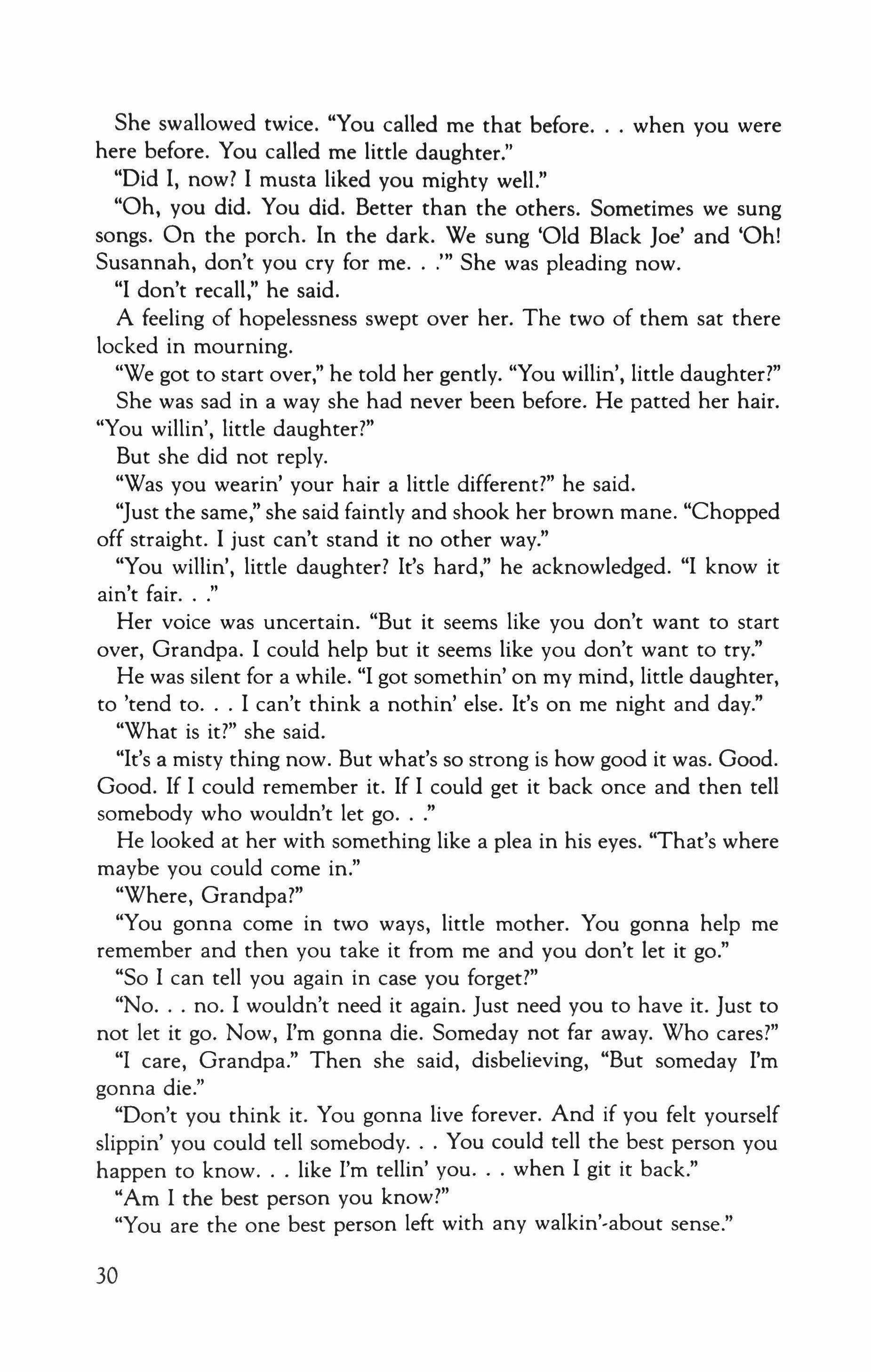
She swallowed twice. "You called me that before when you were here before. You called me little daughter."
"Did I, now? I musta liked you mighty well."
"Oh, you did. You did. Better than the others. Sometimes we sung songs. On the porch. In the dark. We sung 'Old Black Joe' and 'Oh! Susannah, don't you cry for me '" She was pleading now.
"I don't recall," he said.
A feeling of hopelessness swept over her. The two of them sat there locked in mourning.
"We got to start over," he told her gently. "You willin', little daughter?"
She was sad in a way she had never been before. He patted her hair. "You willin', little daughter?"
But she did not reply.
"Was you wearin' your hair a little different?" he said.
"Just the same," she said faintly and shook her brown mane. "Chopped off straight. I just can't stand it no other way."
"You willin', little daughter? It's hard," he acknowledged. "I know it ain't fair
Her voice was uncertain. "But it seems like you don't want to start over, Grandpa. I could help but it seems like you don't want to try."
He was silent for a while. "I got somethin' on my mind, little daughter, to 'tend to I can't think a nothin' else. It's on me night and day."
"What is it?" she said.
"It's a misty thing now. But what's so strong is how good it was. Good. Good. If I could remember it. If I could get it back once and then tell somebody who wouldn't let go
He looked at her with something like a plea in his eyes. "That's where maybe you could come in."
"Where, Grandpa?"
"You gonna come in two ways, little mother. You gonna help me remember and then you take it from me and you don't let it go."
"So I can tell you again in case you forget?"
"No no. I wouldn't need it again. Just need you to have it. Just to not let it go. Now, I'm gonna die. Someday not far away. Who cares?"
"I care, Grandpa." Then she said, disbelieving, "But someday I'm gonna die."
"Don't you think it. You gonna live forever. And if you felt yourself slippin' you could tell somebody You could tell the best person you happen to know like I'm tellin' you when I git it back."
"Am I the best person you know?"
"You are the one best person left with any walkin'-about sense."

She swung her feet. "That ain't the general opinion around here."
"It's mine," he said.
"What about Grandma?"
"Best woman I ever knew. But she's gone, you know."
He stared out the window. "There was a thing that happen to me once. Best thing ever happen. I never told nobody, it was that good."
"You gonna tell me?"
"I'm gonna tell you if I can recall it. If I can recall it. If if."
"If it was that good, how come you forgot it?" She was sorry she'd said it, for his face clouded over.
"I ain't entirely done that, little daughter. There's somethin' still there. But it don't come together. I hold onto one thing and somethin' else goes It's gotta be the right kinda weather for holdin'. Today is no good. There's a wind a blowin'. We could work on it maybe we could tomorrow."
She listened to the sucking of wind in the eaves and beyond it the murmur of wind in the corn.
"When it blows I can't recollect one damn thing."
He did not seem to want to talk anymore. She studied a stain on the papered ceiling and decided it looked like a crow or a buzzard. After a while she got up. His eyes had gone into the cave of his brows. "Grandpa," she said, "you gonna recollect it. I double-dog guarantee it you will."
She went outside and raced up the bank that surrounded the yard. The house was built in a wooded hollow that held a fall of rain like a bowl. She walked barefoot through the rim of corn her father had planted to hold the bank. The silk was bronzed and hung from the ears in tassels that seemed to beckon the wind. She pulled away some and stuffed it into her own two ears. She closed her eyes and between the rows wandered deaf and blind, groping for stalks, plunging, weaving one row with another. But still she could hear a bird mournfully chirping. She followed its cry. "I hear you, little bird I'm comin', little bird You need me, little bird." She stepped on a rock and opened her eyes. Standing on one foot, she spat on her toe and rubbed it up and down and sideways.
His door, when she passed it again, was still open and she looked inside. He was sitting in the chair. The box for the uniform was in his lap. He looked at her as if she had never left the room. "I see a well But it's blowin' too hard. Too hard to tell."
At last she said, "Grandpa? What happened had a well?"
He moved his head slowly from side to side. "Hold onto it," he said.
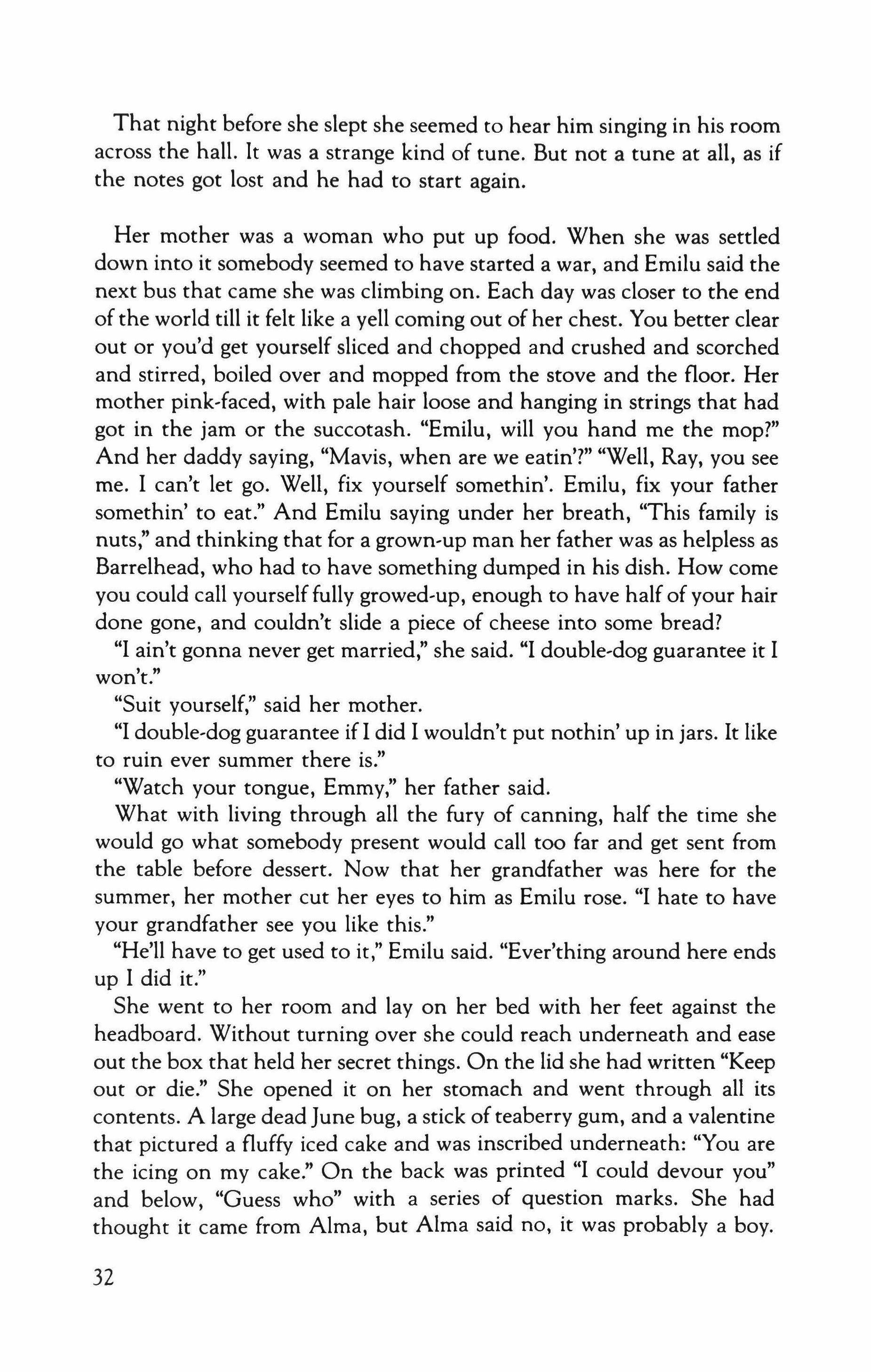
That night before she slept she seemed to hear him singing in his room across the hall. It was a strange kind of tune. But not a tune at all, as if the notes got lost and he had to start again.
Her mother was a woman who put up food. When she was settled down into it somebody seemed to have started a war, and Emilu said the next bus that came she was climbing on. Each day was closer to the end of the world till it felt like a yell coming out of her chest. You better clear out or you'd get yourself sliced and chopped and crushed and scorched and stirred, boiled over and mopped from the stove and the floor. Her mother pink-faced, with pale hair loose and hanging in strings that had got in the jam or the succotash. "Emilu, will you hand me the mop?" And her daddy saying, "Mavis, when are we eatin'?" "Well, Ray, you see me. I can't let go. Well, fix yourself somethin'. Emilu, fix your father somethin' to eat." And Emilu saying under her breath, "This family is nuts," and thinking that for a grown-up man her father was as helpless as Barrelhead, who had to have something dumped in his dish. How come you could call yourselffully growed-up, enough to have half of your hair done gone, and couldn't slide a piece of cheese into some bread?
"I ain't gonna never get married," she said. "I double-dog guarantee it I won't."
"Suit yourself," said her mother.
"I double-dog guarantee if I did I wouldn't put nothin' up in jars. It like to ruin ever summer there is."
"Watch your tongue, Emmy," her father said.
What with living through all the fury of canning, half the time she would go what somebody present would call too far and get sent from the table before dessert. Now that her grandfather was here for the summer, her mother cut her eyes to him as Emilu rose. "I hate to have your grandfather see you like this."
"He'll have to get used to it," Emilu said. "Ever'rhing around here ends up I did it."
She went to her room and lay on her bed with her feet against the headboard. Without turning over she could reach underneath and ease out the box that held her secret things. On the lid she had written "Keep out or die." She opened it on her stomach and went through all its contents. A large dead June bug, a stick of teaberry gum, and a valentine that pictured a fluffy iced cake and was inscribed underneath: "You are the icing on my cake." On the back was printed "I could devour you" and below, "Guess who" with a series of question marks. She had thought it came from Alma, but Alma said no, it was probably a boy.
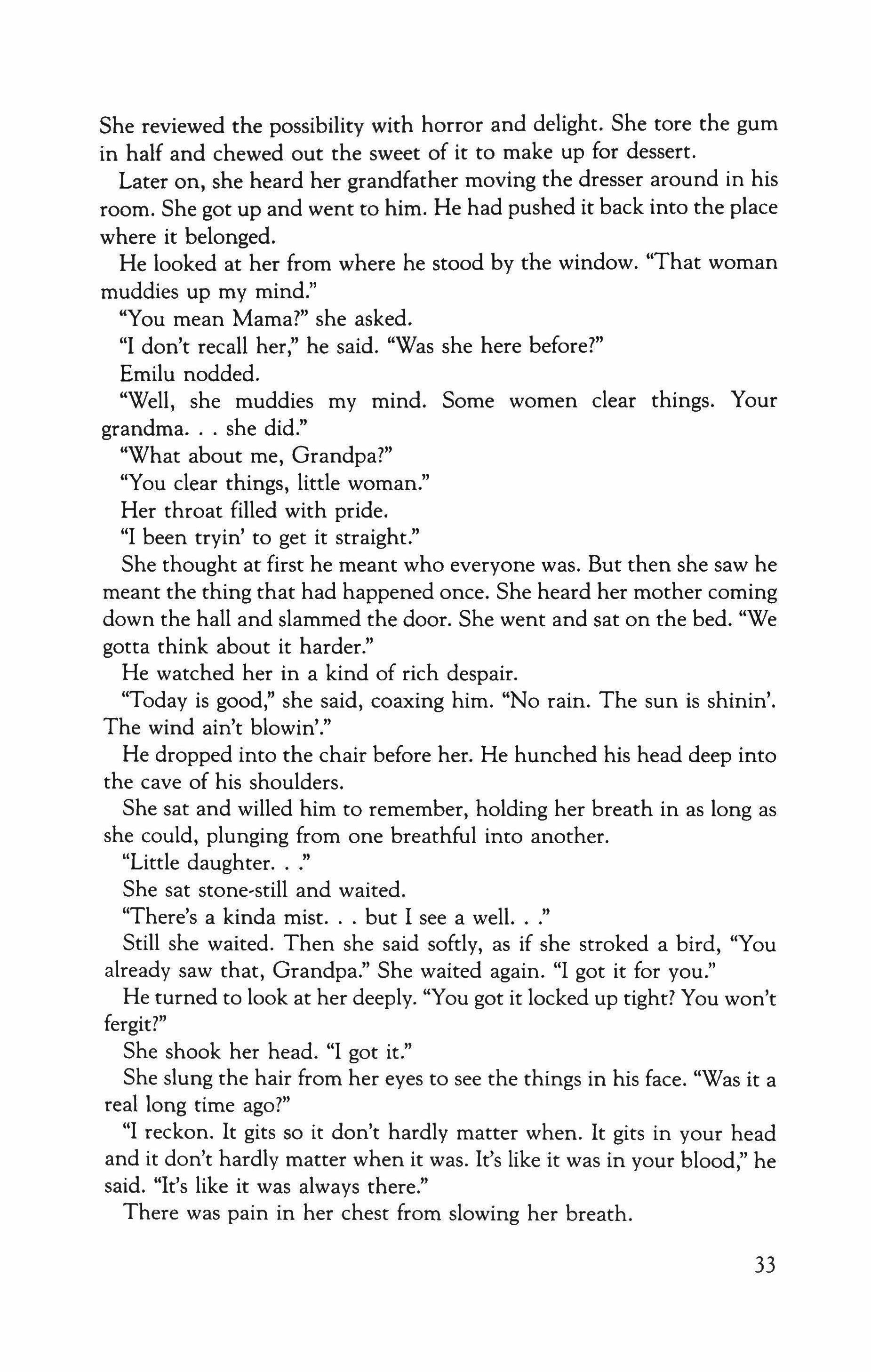
She reviewed the possibility with horror and delight. She tore the gum in half and chewed out the sweet of it to make up for dessert.
Later on, she heard her grandfather moving the dresser around in his room. She got up and went to him. He had pushed it back into the place where it belonged.
He looked at her from where he stood by the window. "That woman muddies up my mind."
"You mean Mama?" she asked.
"I don't recall her," he said. "Was she here before?"
Emilu nodded.
"Well, she muddies my mind. Some women clear things. Your grandma. she did."
"What about me, Grandpa?"
"You clear things, little woman."
Her throat filled with pride.
"I been tryin' to get it straight."
She thought at first he meant who everyone was. But then she saw he meant the thing that had happened once. She heard her mother coming down the hall and slammed the door. She went and sat on the bed. "We gotta think about it harder."
He watched her in a kind of rich despair.
"Today is good," she said, coaxing him. "No rain. The sun is shinin'. The wind ain't blowin'."
He dropped into the chair before her. He hunched his head deep into the cave of his shoulders.
She sat and willed him to remember, holding her breath in as long as she could, plunging from one breathful into another.
"Little daughter
She sat stone-still and waited.
"There's a kinda mist but I see a well
Still she waited. Then she said softly, as if she stroked a bird, "You already saw that, Grandpa." She waited again. "I got it for you."
He turned to look at her deeply. "You got it locked up tight? You won't fergit?"
She shook her head. "I got it."
She slung the hair from her eyes to see the things in his face. "Was it a real long time ago?"
"I reckon. It gits so it don't hardly matter when. It gits in your head and it don't hardly matter when it was. It's like it was in your blood," he said. "It's like it was always there."
There was pain in her chest from slowing her breath.
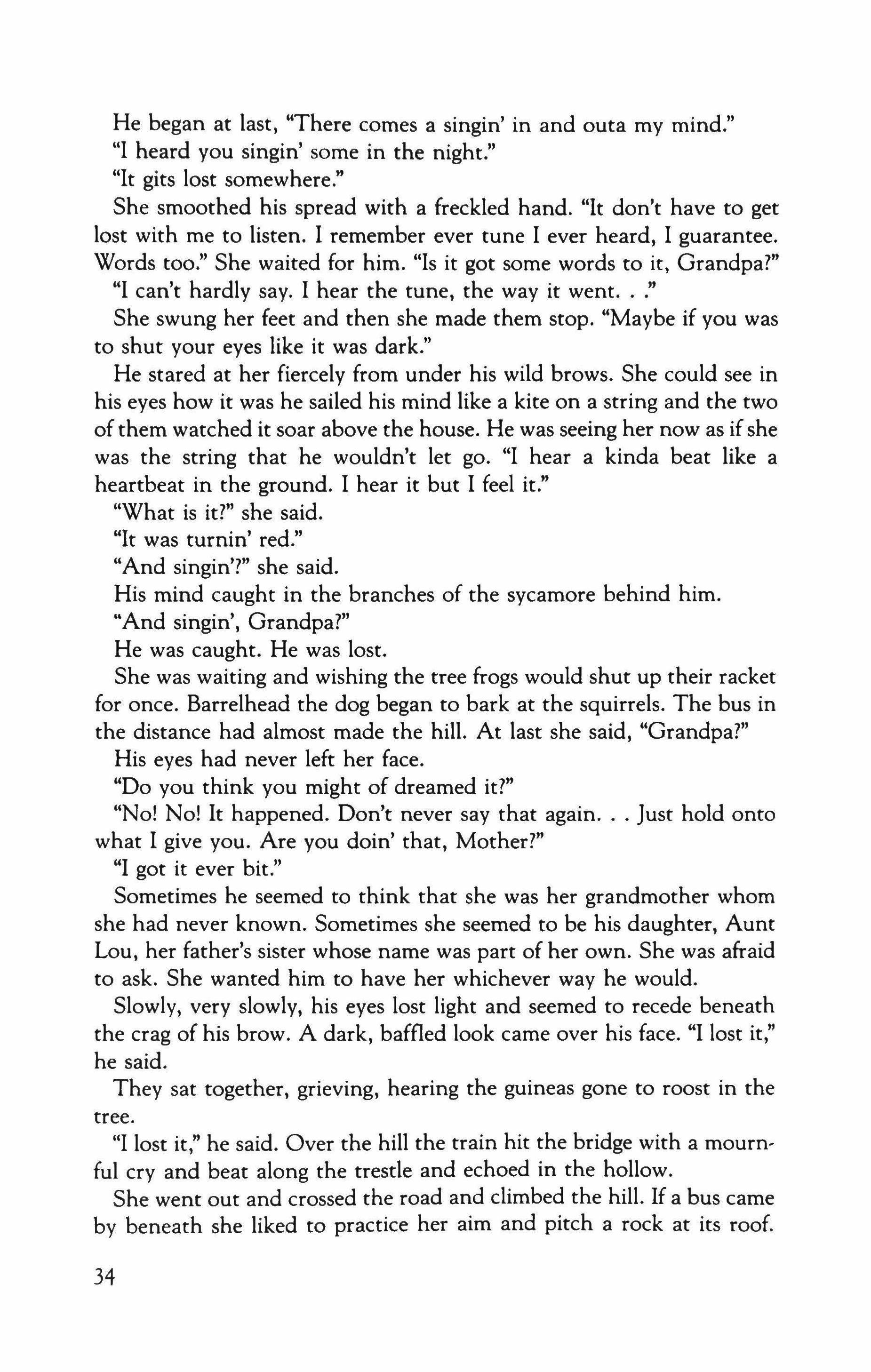
He began at last, "There comes a singin' in and outa my mind."
"I heard you singin' some in the night."
"It gits lost somewhere."
She smoothed his spread with a freckled hand. "It don't have to get lost with me to listen. I remember ever tune I ever heard, I guarantee. Words too." She waited for him. "Is it got some words to it, Grandpa?"
"I can't hardly say. I hear the tune, the way it went
She swung her feet and then she made them stop. "Maybe if you was to shut your eyes like it was dark."
He stared at her fiercely from under his wild brows. She could see in his eyes how it was he sailed his mind like a kite on a string and the two of them watched it soar above the house. He was seeing her now as if she was the string that he wouldn't let go. "I hear a kinda beat like a heartbeat in the ground. I hear it but I feel it."
"What is it?" she said.
"It was turnin' red."
"And singin'?" she said.
His mind caught in the branches of the sycamore behind him.
"And singin', Grandpa?"
He was caught. He was lost.
She was waiting and wishing the tree frogs would shut up their racket for once. Barrelhead the dog began to bark at the squirrels. The bus in the distance had almost made the hill. At last she said, "Grandpa?"
His eyes had never left her face.
"Do you think you might of dreamed it?"
"No! No! It happened. Don't never say that again Just hold onto what I give you. Are you doin' that, Mother?"
"I got it ever bit."
Sometimes he seemed to think that she was her grandmother whom she had never known. Sometimes she seemed to be his daughter, Aunt Lou, her father's sister whose name was part of her own. She was afraid to ask. She wanted him to have her whichever way he would.
Slowly, very slowly, his eyes lost light and seemed to recede beneath the crag of his brow. A dark, baffled look came over his face. "I lost it," he said.
They sat together, grieving, hearing the guineas gone to roost in the tree.
"I lost it," he said. Over the hill the train hit the bridge with a mournful cry and beat along the trestle and echoed in the hollow.
She went out and crossed the road and climbed the hill. If a bus came by beneath she liked to practice her aim and pitch a rock at its roof.
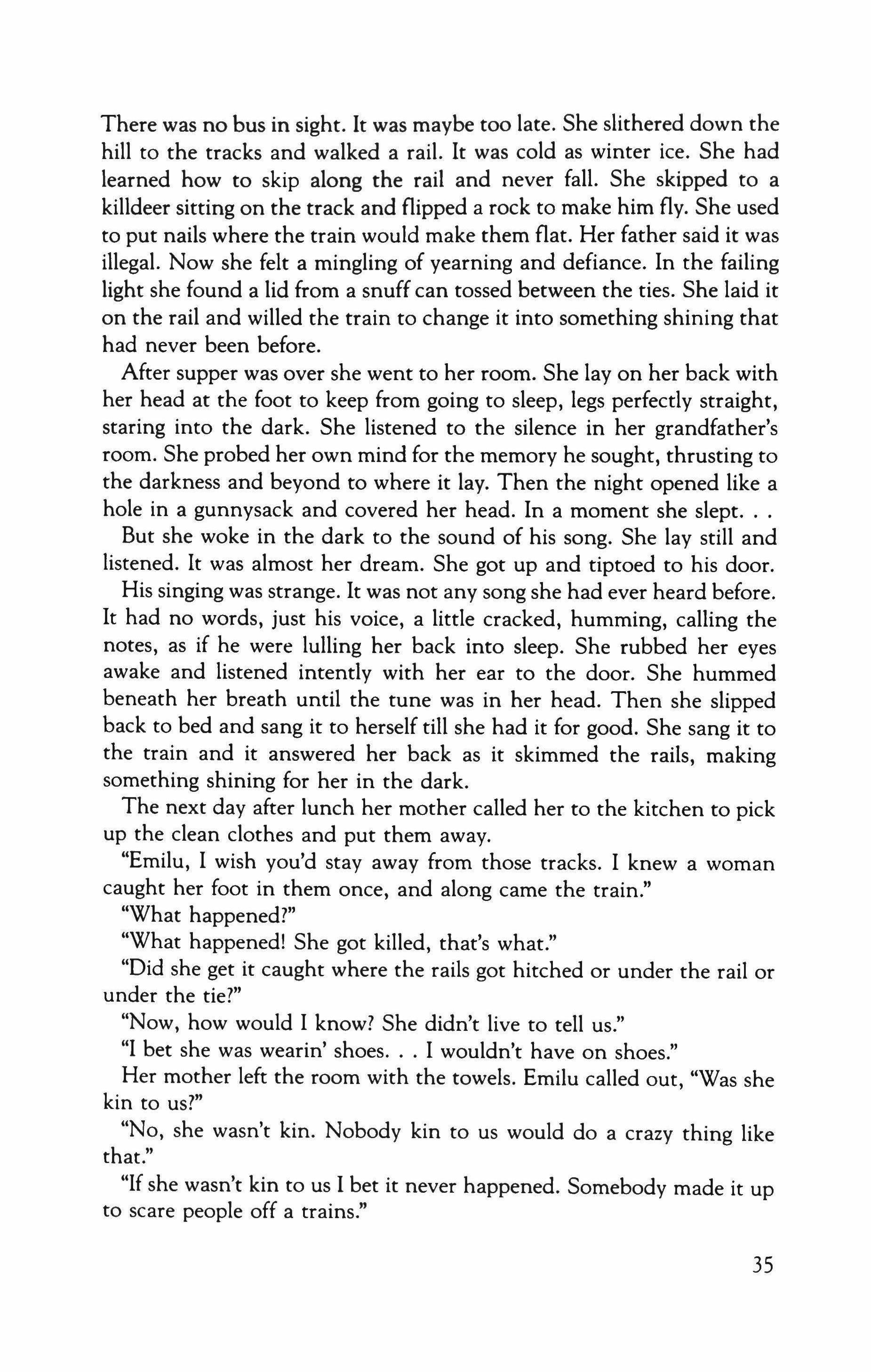
There was no bus in sight. It was maybe too late. She slithered down the hill to the tracks and walked a rail. It was cold as winter ice. She had learned how to skip along the rail and never fall. She skipped to a killdeer sitting on the track and flipped a rock to make him fly. She used to put nails where the train would make them flat. Her father said it was illegal. Now she felt a mingling of yearning and defiance. In the failing light she found a lid from a snuff can tossed between the ties. She laid it on the rail and willed the train to change it into something shining that had never been before.
After supper was over she went to her room. She lay on her back with her head at the foot to keep from going to sleep, legs perfectly straight, staring into the dark. She listened to the silence in her grandfather's room. She probed her own mind for the memory he sought, thrusting to the darkness and beyond to where it lay. Then the night opened like a hole in a gunnysack and covered her head. In a moment she slept
But she woke in the dark to the sound of his song. She lay still and listened. It was almost her dream. She got up and tiptoed to his door.
His singing was strange. It was not any song she had ever heard before. It had no words, just his voice, a little cracked, humming, calling the notes, as if he were lulling her back into sleep. She rubbed her eyes awake and listened intently with her ear to the door. She hummed beneath her breath until the tune was in her head. Then she slipped back to bed and sang it to herself till she had it for good. She sang it to the train and it answered her back as it skimmed the rails, making something shining for her in the dark.
The next day after lunch her mother called her to the kitchen to pick up the clean clothes and put them away.
"Emilu, I wish you'd stay away from those tracks. I knew a woman caught her foot in them once, and along came the train."
"What happened?"
"What happened! She got killed, that's what."
"Did she get it caught where the rails got hitched or under the rail or under the tie?"
"Now, how would I know? She didn't live to tell us."
"I bet she was wearin' shoes I wouldn't have on shoes."
Her mother left the room with the towels. Emilu called out, "Was she kin to us?"
"No, she wasn't kin. Nobody kin to us would do a crazy thing like that."
"If she wasn't kin to us I bet it never happened. Somebody made it up to scare people off a trains."

Her mother appeared in the doorway. "Emilu, it's time you grew up to your age."
"I ain't got the slightest idea what that means." She looked at her toes and the bottoms of her feet.
She went out to the barn and stared a hen in the eye and shooed the red one off her nest. She took one of the three tan-colored eggs and put it in her pocket and whistled from the doorway. After a while she walked behind the sycamore tree and pulled a leaf and laid it on the ground and broke the egg into it neatly. She knelt and touched the sulfur half-moon with the tip of her tongue. Then she called to Barrelhead to come and get it.
She went looking for her grandfather and found him asleep beneath the sugarberry tree. She sat down beside him.
She watched him sleep, his white hair stirring in the breeze. Crickets were jumping from the grass to brush his great brown hand that hung from the arm of the wicker chair. He was the oldest person she had ever known, and at the same time he was like a little baby that needed a mother. Nobody but herself would pay him any mind. Her mother seemed to think he was too much trouble just to have at the table, and now she let Emilu take his breakfast to his room. And her father never talked to him hardly at all. They talked around him at the table like he wasn't there. She began to sing softly the song she had heard him making in the night. She sang it over and over again till after a while it seemed to be her song for singing him asleep. He woke up and listened with his eyes half closed. Then he shut them again and she thought he'd drifted off. But in a moment he said, "It was a woman done the singin'. It was like I was dreamin'. But when I come to she was singin' for real."
She listened in wonder. "Was it Grandma done the singin'?"
"No no. But the moon was the brightest I ever seen."
He went to sleep again.
Her mother came to look at him and shake her head. "If it starts to rain I want that wicker chair inside."
"Mama," said Emilu, "can't you see he's asleep!"
"Well, I see that, Emilu. I don't need to be told. But if he's here for the summer we'll have to have things understood."
"I ain't got the slightest idea what that means."
"Never mind what it means. But I wish you wouldn't hang around him all the time."
"First it's the tracks and now it's Grandpa. There is more things around that I ain't got permission than there is I can do."
"Watch your tongue, Emilu."
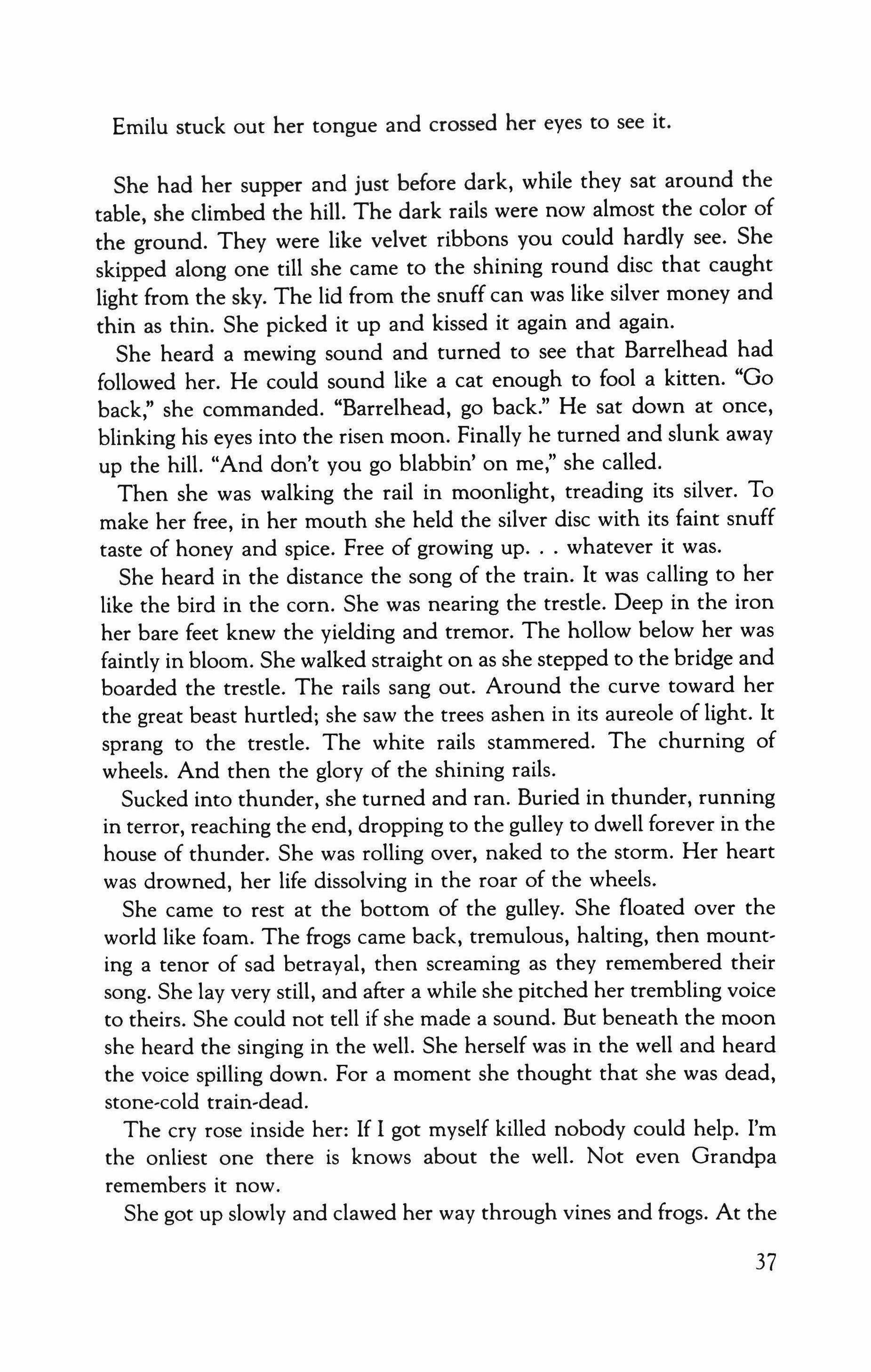
Emilu stuck out her tongue and crossed her eyes to see it.
She had her supper and just before dark, while they sat around the table, she climbed the hill. The dark rails were now almost the color of the ground. They were like velvet ribbons you could hardly see. She skipped along one till she came to the shining round disc that caught light from the sky. The lid from the snuff can was like silver money and thin as thin. She picked it up and kissed it again and again.
She heard a mewing sound and turned to see that Barrelhead had followed her. He could sound like a cat enough to fool a kitten. "Go back," she commanded. "Barrelhead, go back." He sat down at once, blinking his eyes into the risen moon. Finally he turned and slunk away up the hill. "And don't you go blabbin' on me," she called.
Then she was walking the rail in moonlight, treading its silver. To make her free, in her mouth she held the silver disc with its faint snuff taste of honey and spice. Free of growing up whatever it was.
She heard in the distance the song of the train. It was calling to her like the bird in the corn. She was nearing the trestle. Deep in the iron her bare feet knew the yielding and tremor. The hollow below her was faintly in bloom. She walked straight on as she stepped to the bridge and boarded the trestle. The rails sang out. Around the curve toward her the great beast hurtled; she saw the trees ashen in its aureole of light. It sprang to the trestle. The white rails stammered. The churning of wheels. And then the glory of the shining rails.
Sucked into thunder, she turned and ran. Buried in thunder, running in terror, reaching the end, dropping to the gulley to dwell forever in the house of thunder. She was rolling over, naked to the storm. Her heart was drowned, her life dissolving in the roar of the wheels.
She came to rest at the bottom of the gulley. She floated over the world like foam. The frogs came back, tremulous, halting, then mounting a tenor of sad betrayal, then screaming as they remembered their song. She lay very still, and after a while she pitched her trembling voice to theirs. She could not tell if she made a sound. But beneath the moon she heard the singing in the well. She herself was in the well and heard the voice spilling down. For a moment she thought that she was dead, stone-cold train-dead.
The cry rose inside her: If I got myself killed nobody could help. I'm the onliest one there is knows about the well. Not even Grandpa remembers it now.
She got up slowly and clawed her way through vines and frogs. At the
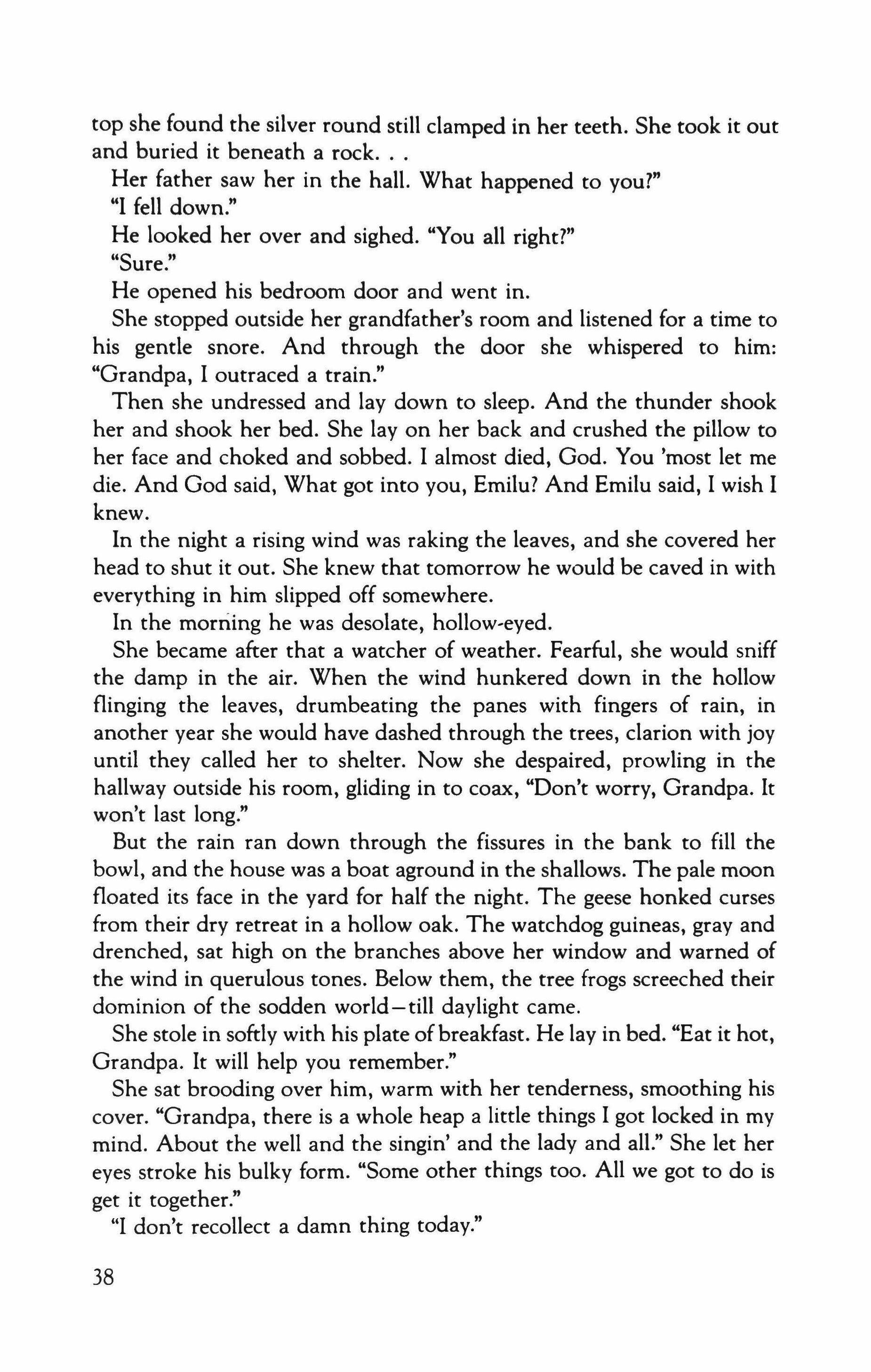
top she found the silver round still clamped in her teeth. She took it out and buried it beneath a rock
Her father saw her in the hall. What happened to you?" "I fell down."
He looked her over and sighed. "You all right?" "Sure."
He opened his bedroom door and went in.
She stopped outside her grandfather's room and listened for a time to his gende snore. And through the door she whispered to him: "Grandpa, I outraced a train."
Then she undressed and lay down to sleep. And the thunder shook her and shook her bed. She lay on her back and crushed the pillow to her face and choked and sobbed. I almost died, God. You 'most let me die. And God said, What got into you, Emilu? And Emilu said, I wish I knew.
In the night a rising wind was raking the leaves, and she covered her head to shut it out. She knew that tomorrow he would be caved in with everything in him slipped off somewhere.
In the morning he was desolate, hollow-eyed.
She became after that a watcher of weather. Fearful, she would sniff the damp in the air. When the wind hunkered down in the hollow flinging the leaves, drumbeating the panes with fingers of rain, in another year she would have dashed through the trees, clarion with joy until they called her to shelter. Now she despaired, prowling in the hallway outside his room, gliding in to coax, "Don't worry, Grandpa. It won't last long."
But the rain ran down through the fissures in the bank to fill the bowl, and the house was a boat aground in the shallows. The pale moon floated its face in the yard for half the night. The geese honked curses from their dry retreat in a hollow oak. The watchdog guineas, gray and drenched, sat high on the branches above her window and warned of the wind in querulous tones. Below them, the tree frogs screeched their dominion of the sodden world-till daylight came.
She stole in softly with his plate ofbreakfast. He lay in bed. "Eat it hot, Grandpa. It will help you remember."
She sat brooding over him, warm with her tenderness, smoothing his cover. "Grandpa, there is a whole heap a little things I got locked in my mind. About the well and the singin' and the lady and all." She let her eyes stroke his bulky form. "Some other things too. All we got to do is get it together."
"I don't recollect a damn thing today."
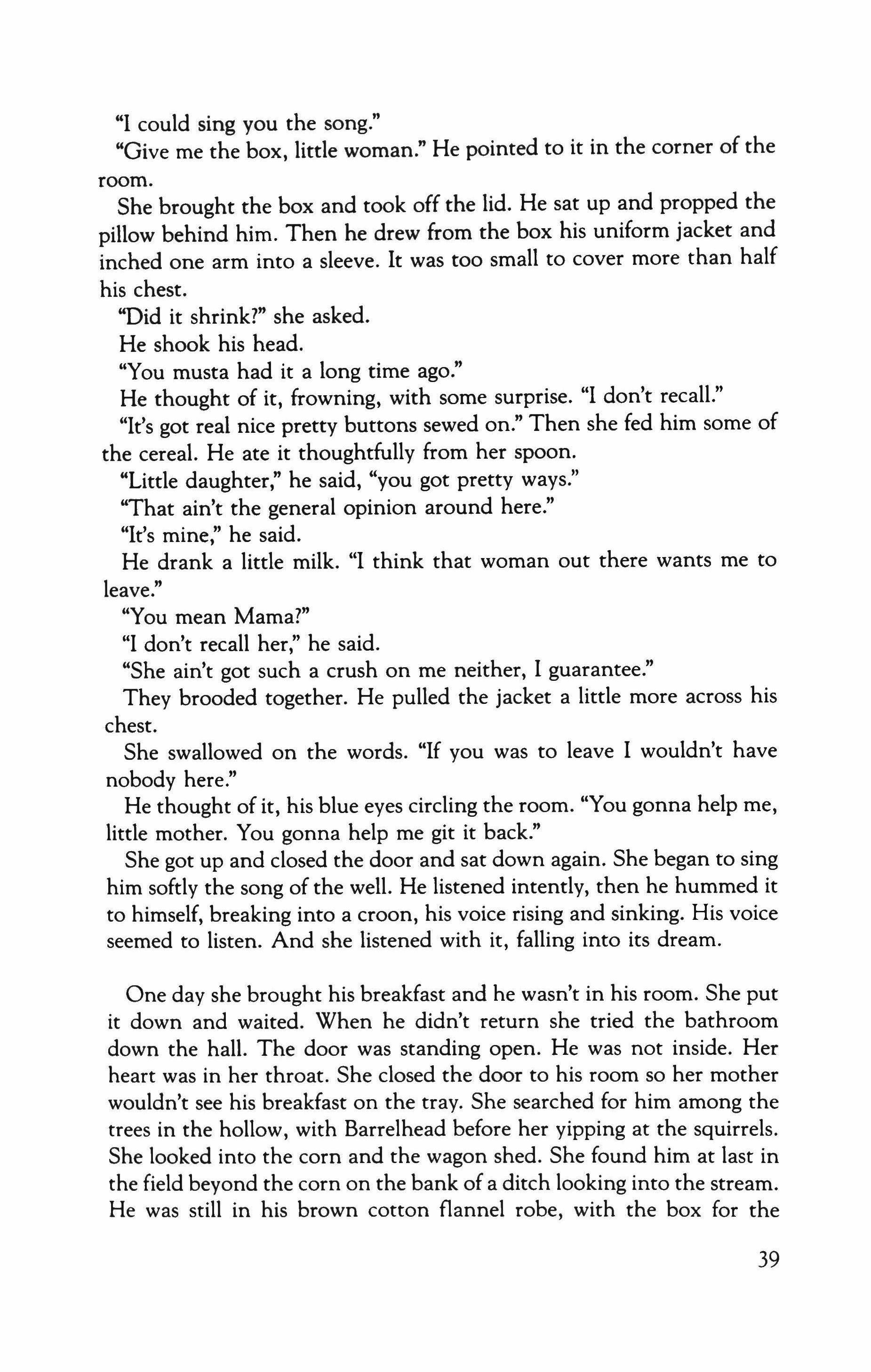
"I could sing you the song."
"Give me the box, little woman." He pointed to it in the corner of the room.
She brought the box and took off the lid. He sat up and propped the pillow behind him. Then he drew from the box his uniform jacket and inched one arm into a sleeve. It was too small to cover more than half his chest.
"Did it shrink?" she asked. He shook his head.
"You musta had it a long time ago."
He thought of it, frowning, with some surprise. "I don't recall."
"It's got real nice pretty buttons sewed on." Then she fed him some of the cereal. He ate it thoughtfully from her spoon.
"Little daughter," he said, "you got pretty ways."
"That ain't the general opinion around here."
"It's mine," he said.
He drank a little milk. "I think that woman out there wants me to leave."
"You mean Mama?"
"I don't recall her," he said.
"She ain't got such a crush on me neither, I guarantee."
They brooded together. He pulled the jacket a little more across his chest.
She swallowed on the words. "If you was to leave I wouldn't have nobody here."
He thought of it, his blue eyes circling the room. "You gonna help me, little mother. You gonna help me git it back."
She got up and closed the door and sat down again. She began to sing him softly the song of the well. He listened intently, then he hummed it to himself, breaking into a croon, his voice rising and sinking. His voice seemed to listen. And she listened with it, falling into its dream.
One day she brought his breakfast and he wasn't in his room. She put it down and waited. When he didn't return she tried the bathroom down the hall. The door was standing open. He was not inside. Her heart was in her throat. She closed the door to his room so her mother wouldn't see his breakfast on the tray. She searched for him among the trees in the hollow, with Barrelhead before her yipping at the squirrels. She looked into the corn and the wagon shed. She found him at last in the field beyond the corn on the bank of a ditch looking into the stream. He was still in his brown cotton flannel robe, with the box for the
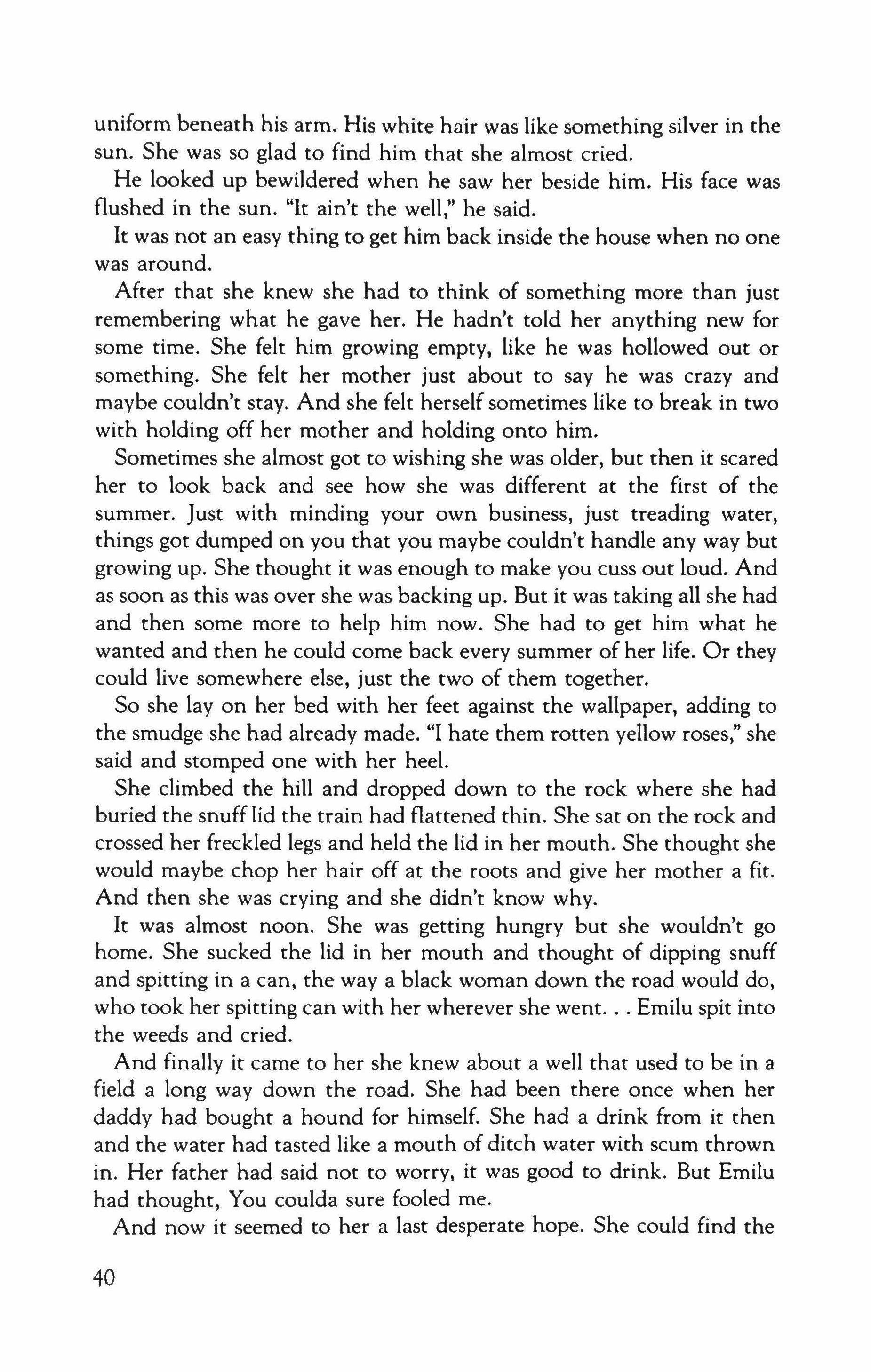
uniform beneath his arm. His white hair was like something silver in the sun. She was so glad to find him that she almost cried. He looked up bewildered when he saw her beside him. His face was flushed in the sun. "It ain't the well," he said. It was not an easy thing to get him back inside the house when no one was around.
After that she knew she had to think of something more than just remembering what he gave her. He hadn't told her anything new for some time. She felt him growing empty, like he was hollowed out or something. She felt her mother just about to say he was crazy and maybe couldn't stay. And she felt herself sometimes like to break in two with holding off her mother and holding onto him.
Sometimes she almost got to wishing she was older, but then it scared her to look back and see how she was different at the first of the summer. Just with minding your own business, just treading water, things got dumped on you that you maybe couldn't handle any way but growing up. She thought it was enough to make you cuss out loud. And as soon as this was over she was backing up. But it was taking all she had and then some more to help him now. She had to get him what he wanted and then he could come back every summer of her life. Or they could live somewhere else, just the two of them together.
So she lay on her bed with her feet against the wallpaper, adding to the smudge she had already made. "I hate them rotten yellow roses," she said and stomped one with her heel.
She climbed the hill and dropped down to the rock where she had buried the snuff lid the train had flattened thin. She sat on the rock and crossed her freckled legs and held the lid in her mouth. She thought she would maybe chop her hair off at the roots and give her mother a fit. And then she was crying and she didn't know why.
It was almost noon. She was getting hungry but she wouldn't go home. She sucked the lid in her mouth and thought of dipping snuff and spitting in a can, the way a black woman down the road would do, who took her spitting can with her wherever she went Emilu spit into the weeds and cried.
And finally it came to her she knew about a well that used to be in a field a long way down the road. She had been there once when her daddy had bought a hound for himself. She had a drink from it then and the water had tasted like a mouth of ditch water with scum thrown in. Her father had said not to worry, it was good to drink. But Emilu had thought, You coulda sure fooled me.
And now it seemed to her a last desperate hope. She could find the

place. She could head straight back to any place she'd ever been. Like a cat, her father said. "We could put Emilu in a sack and dump her off down the road. She'd turn up the next day. Melissa you can turn around once and she's lost. Not Emilu."
I got to use everything I got, which ain't all that much. She wiped her eyes on her shirt and hid the snuff lid again.
It was hard work telling him about the well. He didn't seem to listen to what she said. She seemed to be telling it all to herself. When she had finished he sat leaning over with his head in his hands.
"Grandpa, I guarantee it wouldn't hurt none to look."
He got up and went to the corner for the box and put it under his arm. "I'm ready, little daughter."
At first she was too surprised to speak. Then she said, "We gotta take that bus and we ain't got time to make it today. We gotta wait till tomorrow."
Tears sprang to his eyes.
She went to him and pulled him down into the chair. She smoothed and patted his hair like silk. "Grandpa, you got real pretty hair. It's real, real pretty, I'm tellin' you. It ain't no time at all till tomorrow gets here Don't go mentionin' the bus. There is some folks around like to mess up your plans."
She found his peanuts on the dresser and they ate some together.
She had a little money for the bus. There was her grandmother on her mother's side who sent her a five-dollar bill every birthday came around. That way you could get it figured into your affairs. It had come in June and she hadn't busted into it yet. It would be enough for one way but not for coming back too. She slipped into her father's drawer and got some from the box in the corner at the back. She knew it would be the whole thing come down upon her if he found it out. Like she had robbed a train.
The bus would come by a little after two, but she got him ready early after lunch was over. She brushed and combed his hair and aimed his eyebrows in the right direction. He wanted to take along the box with his uniform, but she brought him around to taking just the jacket instead.
She put on her black leather sandals and her Easter dress that had the jacket with the braid. She thought to pack corn muffins left from lunch and stuff them into the pockets of her dress. And when her father left in the truck and her mother was sitting out in back in the swing the way she did after lunch, she took his hand and led him out to the road. She
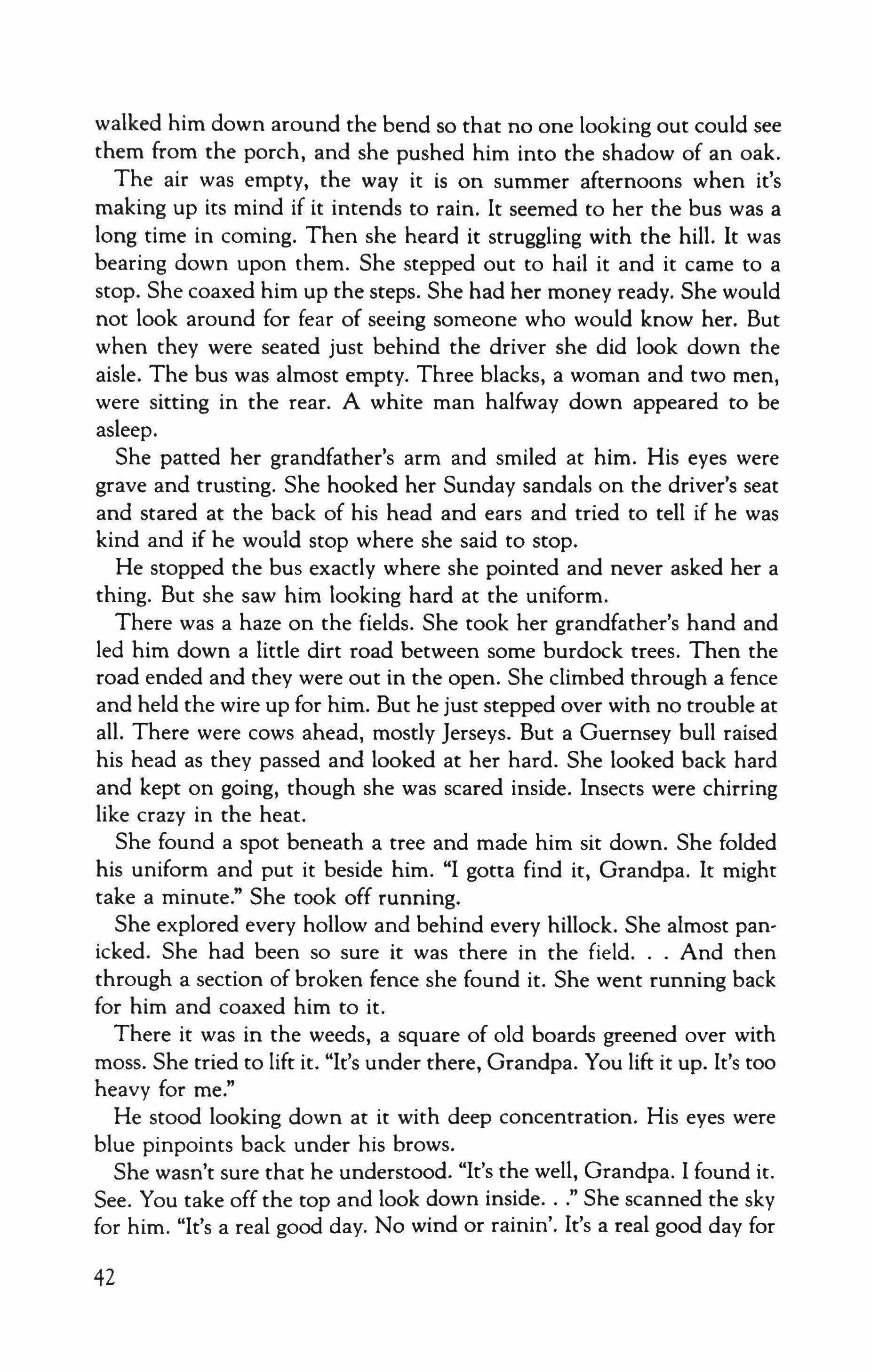
walked him down around the bend so that no one looking out could see them from the porch, and she pushed him into the shadow of an oak.
The air was empty, the way it is on summer afternoons when it's making up its mind if it intends to rain. It seemed to her the bus was a long time in coming. Then she heard it struggling with the hill. It was bearing down upon them. She stepped out to hail it and it came to a stop. She coaxed him up the steps. She had her money ready. She would not look around for fear of seeing someone who would know her. But when they were seated just behind the driver she did look down the aisle. The bus was almost empty. Three blacks, a woman and two men, were sitting in the rear. A white man halfway down appeared to be asleep.
She patted her grandfather's arm and smiled at him. His eyes were grave and trusting. She hooked her Sunday sandals on the driver's seat and stared at the back of his head and ears and tried to tell if he was kind and if he would stop where she said to stop.
He stopped the bus exactly where she pointed and never asked her a thing. But she saw him looking hard at the uniform.
There was a haze on the fields. She took her grandfather's hand and led him down a little dirt road between some burdock trees. Then the road ended and they were out in the open. She climbed through a fence and held the wire up for him. But he just stepped over with no trouble at all. There were cows ahead, mostly Jerseys. But a Guernsey bull raised his head as they passed and looked at her hard. She looked back hard and kept on going, though she was scared inside. Insects were chirring like crazy in the heat.
She found a spot beneath a tree and made him sit down. She folded his uniform and put it beside him. "I gotta find it, Grandpa. It might take a minute." She took off running.
She explored every hollow and behind every hillock. She almost panicked. She had been so sure it was there in the field. And then through a section of broken fence she found it. She went running back for him and coaxed him to it.
There it was in the weeds, a square of old boards greened over with moss. She tried to lift it. "It's under there, Grandpa. You lift it up. It's too heavy for me."
He stood looking down at it with deep concentration. His eyes were blue pinpoints back under his brows.
She wasn't sure that he understood. "It's the well, Grandpa. I found it. See. You take off the top and look down inside " She scanned the sky for him. "It's a real good day. No wind or rainin'. It's a real good day for
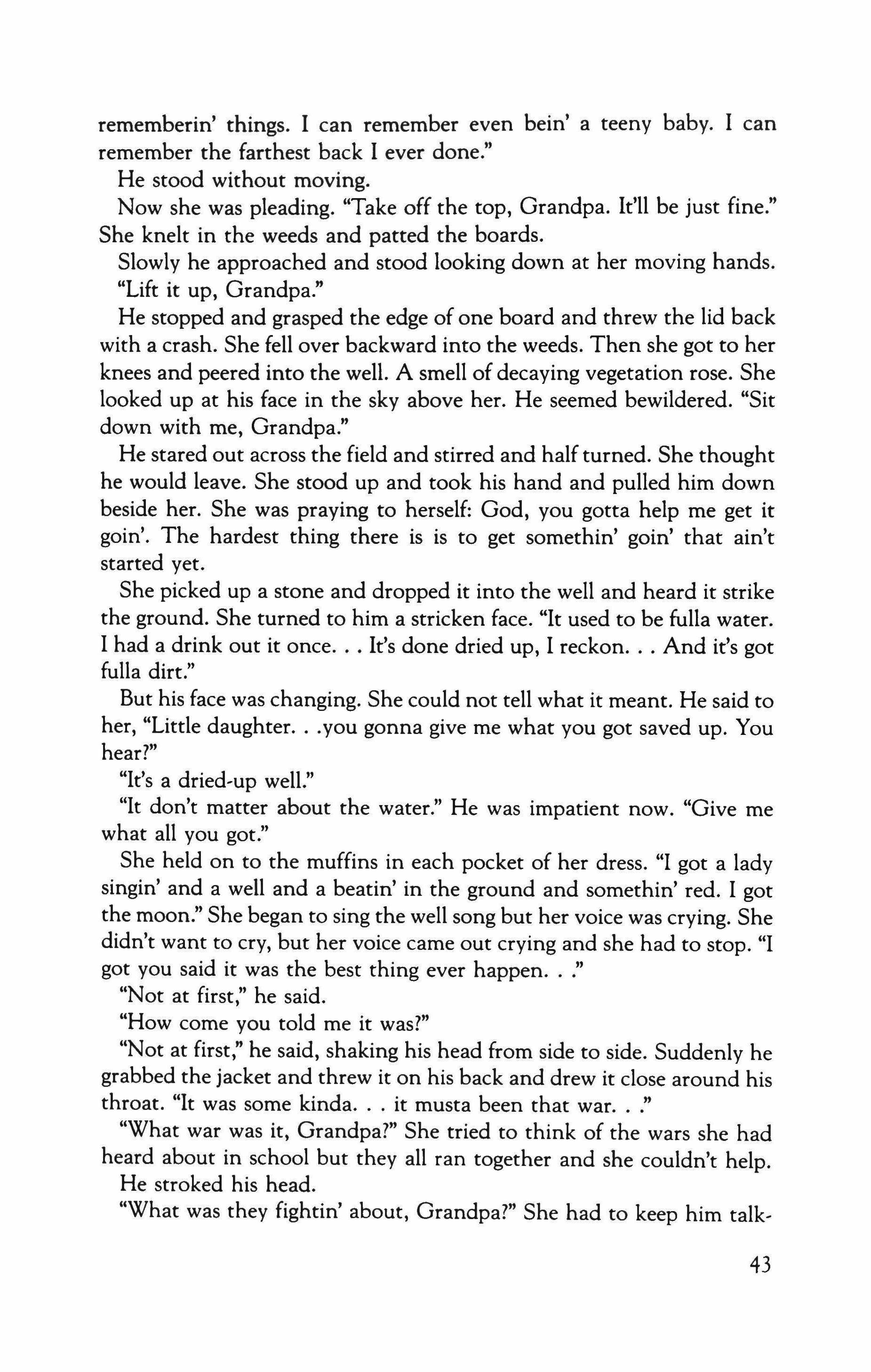
rememberin' things. I can remember even bein' a teeny baby. I can remember the farthest back I ever done."
He stood without moving.
Now she was pleading. "Take off the top, Grandpa. It'll be just fine." She knelt in the weeds and patted the boards.
Slowly he approached and stood looking down at her moving hands. "Lift it up, Grandpa."
He stopped and grasped the edge of one board and threw the lid back with a crash. She fell over backward into the weeds. Then she got to her knees and peered into the well. A smell of decaying vegetation rose. She looked up at his face in the sky above her. He seemed bewildered. "Sit down with me, Grandpa."
He stared out across the field and stirred and half turned. She thought he would leave. She stood up and took his hand and pulled him down beside her. She was praying to herself: God, you gotta help me get it goin'. The hardest thing there is is to get somethin' goin' that ain't started yet.
She picked up a stone and dropped it into the well and heard it strike the ground. She turned to him a stricken face. "It used to be fulla water. I had a drink out it once It's done dried up, I reckon And it's got fulla dirt."
But his face was changing. She could not tell what it meant. He said to her, "Little daughter you gonna give me what you got saved up. You hear?"
"It's a dried,up well."
"It don't matter about the water." He was impatient now. "Give me what all you got."
She held on to the muffins in each pocket of her dress. "I got a lady singin' and a well and a beatin' in the ground and somethin' red. I got the moon." She began to sing the well song but her voice was crying. She didn't want to cry, but her voice came out crying and she had to stop. "I got you said it was the best thing ever happen "
"Not at first," he said.
"How come you told me it was?"
"Not at first," he said, shaking his head from side to side. Suddenly he grabbed the jacket and threw it on his back and drew it close around his throat. "It was some kinda it musta been that war
"What war was it, Grandpa?" She tried to think of the wars she had heard about in school but they all ran together and she couldn't help.
He stroked his head.
"What was they fightin' about, Grandpa?" She had to keep him talk,
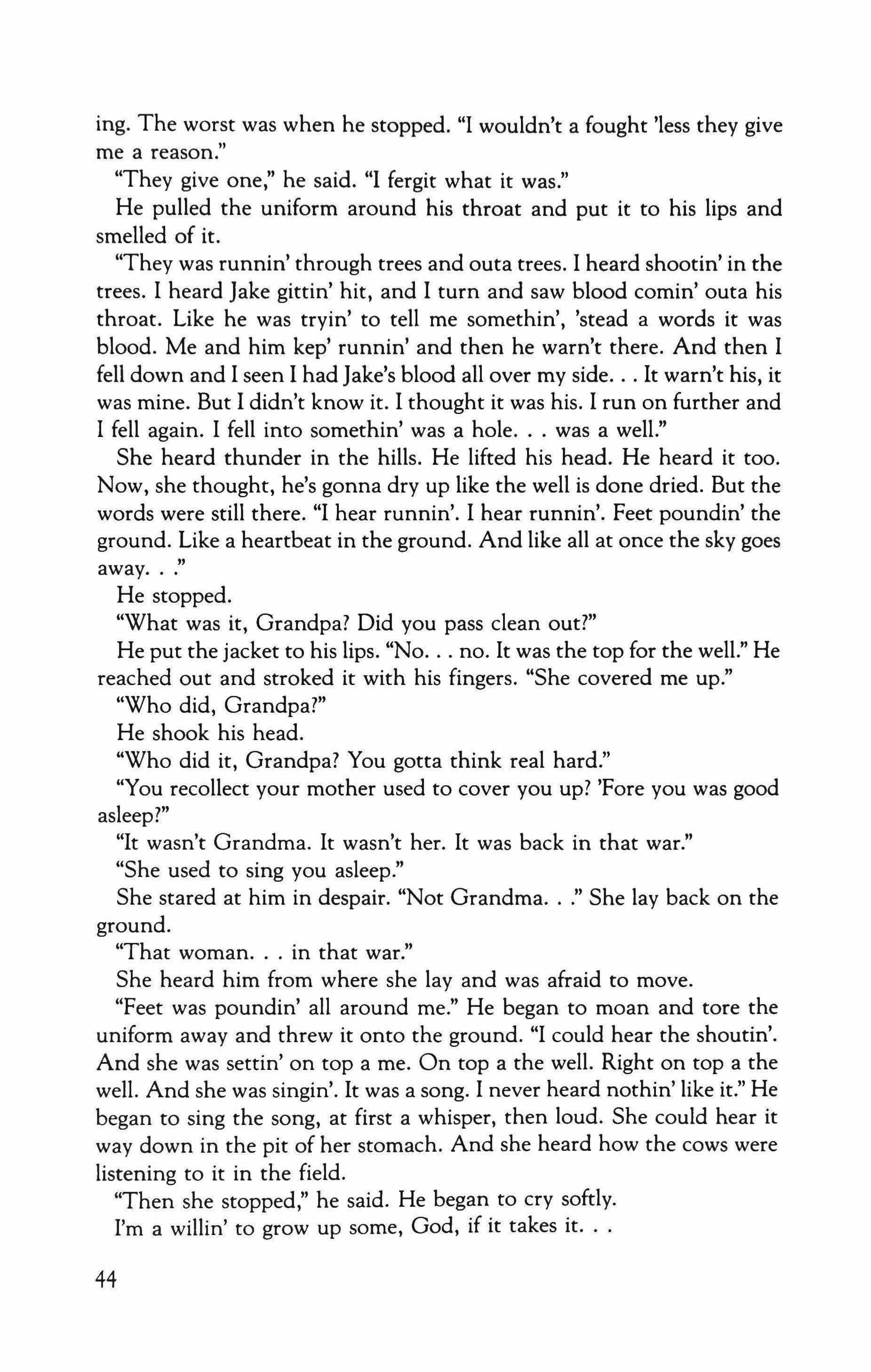
ing. The worst was when he stopped. "I wouldn't a fought 'less they give me a reason."
"They give one," he said. "I fergit what it was."
He pulled the uniform around his throat and put it to his lips and smelled of it.
"They was runnin' through trees and outa trees. I heard shootin' in the trees. I heard Jake gittin' hit, and I turn and saw blood comin' outa his throat. Like he was tryin' to tell me somethin', 'stead a words it was blood. Me and him kep' runnin' and then he warn't there. And then I fell down and I seen I had Jake's blood all over my side It warn't his, it was mine. But I didn't know it. I thought it was his. I run on further and I fell again. I fell into somethin' was a hole was a well."
She heard thunder in the hills. He lifted his head. He heard it too. Now, she thought, he's gonna dry up like the well is done dried. But the words were still there. "I hear runnin'. I hear runnin'. Feet poundin' the ground. Like a heartbeat in the ground. And like all at once the sky goes away
He stopped.
"What was it, Grandpa? Did you pass clean out?"
He put the jacket to his lips. "No no. It was the top for the well." He reached out and stroked it with his fingers. "She covered me up."
"Who did, Grandpa?"
He shook his head.
"Who did it, Grandpa? You gotta think real hard."
"You recollect your mother used to cover you up? 'Fore you was good asleep?"
"It wasn't Grandma. It wasn't her. It was back in that war."
"She used to sing you asleep."
She stared at him in despair. "Not Grandma " She lay back on the ground.
"That woman in that war."
She heard him from where she lay and was afraid to move.
"Feet was poundin' all around me." He began to moan and tore the uniform away and threw it onto the ground. "I could hear the shoutin'. And she was settin' on top a me. On top a the well. Right on top a the well. And she was singin'. It was a song. I never heard nothin' like it." He began to sing the song, at first a whisper, then loud. She could hear it way down in the pit of her stomach. And she heard how the cows were listening to it in the field.
"Then she stopped," he said. He began to cry softly. I'm a willin' to grow up some, God, if it takes it
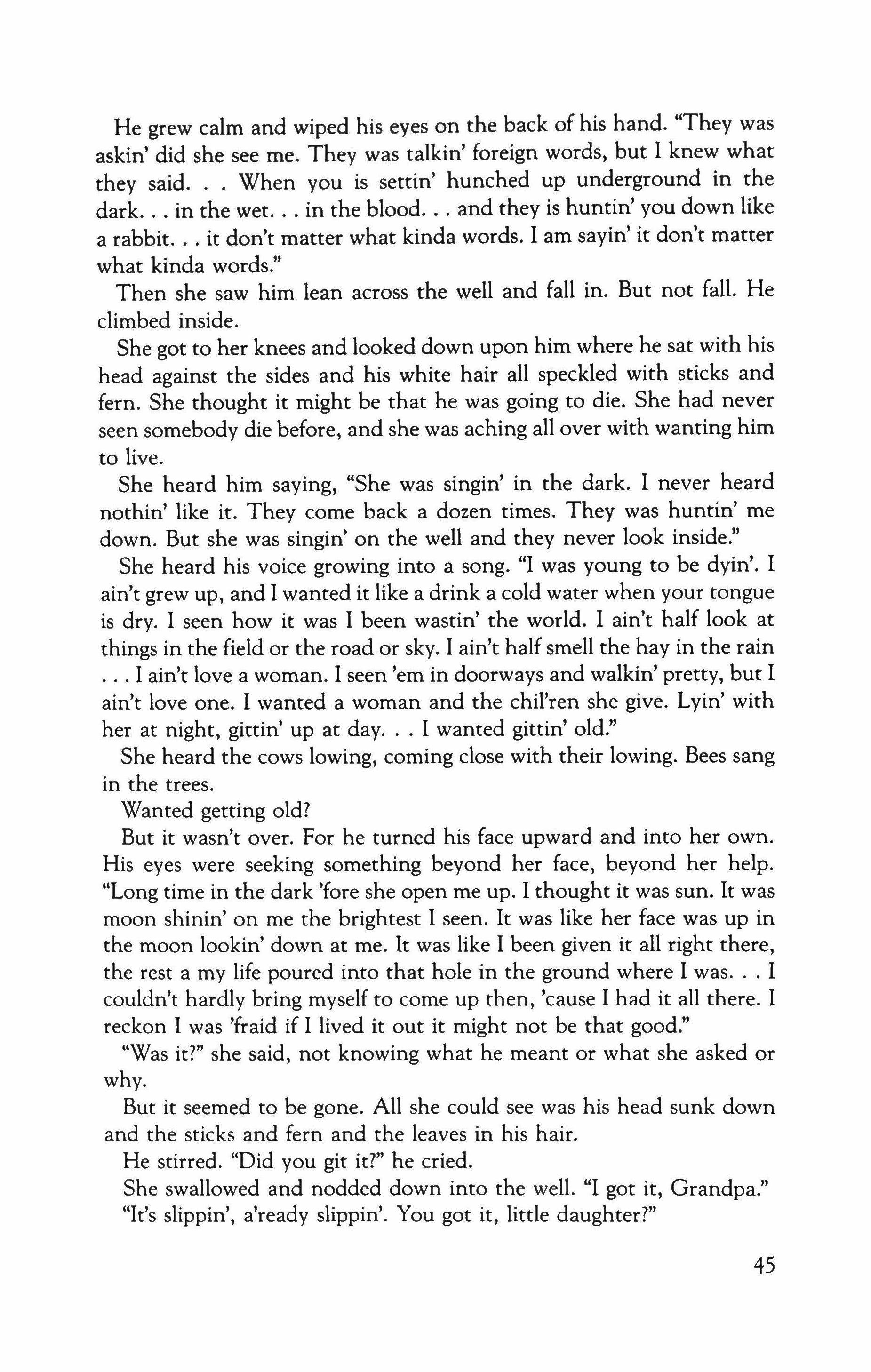
He grew calm and wiped his eyes on the back of his hand. "They was askin' did she see me. They was talkin' foreign words, but 1 knew what they said. When you is settin' hunched up underground in the dark in the wet in the blood and they is huntin' you down like a rabbit it don't matter what kinda words. I am sayin' it don't matter what kinda words."
Then she saw him lean across the well and fall in. But not fall. He climbed inside.
She got to her knees and looked down upon him where he sat with his head against the sides and his white hair all speckled with sticks and fern. She thought it might be that he was going to die. She had never seen somebody die before, and she was aching all over with wanting him to live.
She heard him saying, "She was singin' in the dark. I never heard nothin' like it. They come back a dozen times. They was huntin' me down. But she was singin' on the well and they never look inside."
She heard his voice growing into a song. "1 was young to be dyin'. 1 ain't grew up, and 1 wanted it like a drink a cold water when your tongue is dry. I seen how it was I been wastin' the world. I ain't half look at things in the field or the road or sky. I ain't half smell the hay in the rain 1 ain't love a woman. I seen 'em in doorways and walkin' pretty, but I ain't love one. I wanted a woman and the chil'ren she give. Lyin' with her at night, gittin' up at day I wanted gittin' old."
She heard the cows lowing, coming close with their lowing. Bees sang in the trees.
Wanted getting old?
But it wasn't over. For he turned his face upward and into her own. His eyes were seeking something beyond her face, beyond her help. "Long time in the dark 'fore she open me up. I thought it was sun. It was moon shinin' on me the brightest 1 seen. It was like her face was up in the moon lookin' down at me. It was like I been given it all right there, the rest a my life poured into that hole in the ground where 1 was I couldn't hardly bring myself to come up then, 'cause 1 had it all there. I reckon I was 'fraid if I lived it out it might not be that good." "Was it?" she said, not knowing what he meant or what she asked or why.
But it seemed to be gone. All she could see was his head sunk down and the sticks and fern and the leaves in his hair.
He stirred. "Did you git it?" he cried.
She swallowed and nodded down into the well. "I got it, Grandpa."
"It's slippin', a'readv slippin'. You got it, little daughter?"
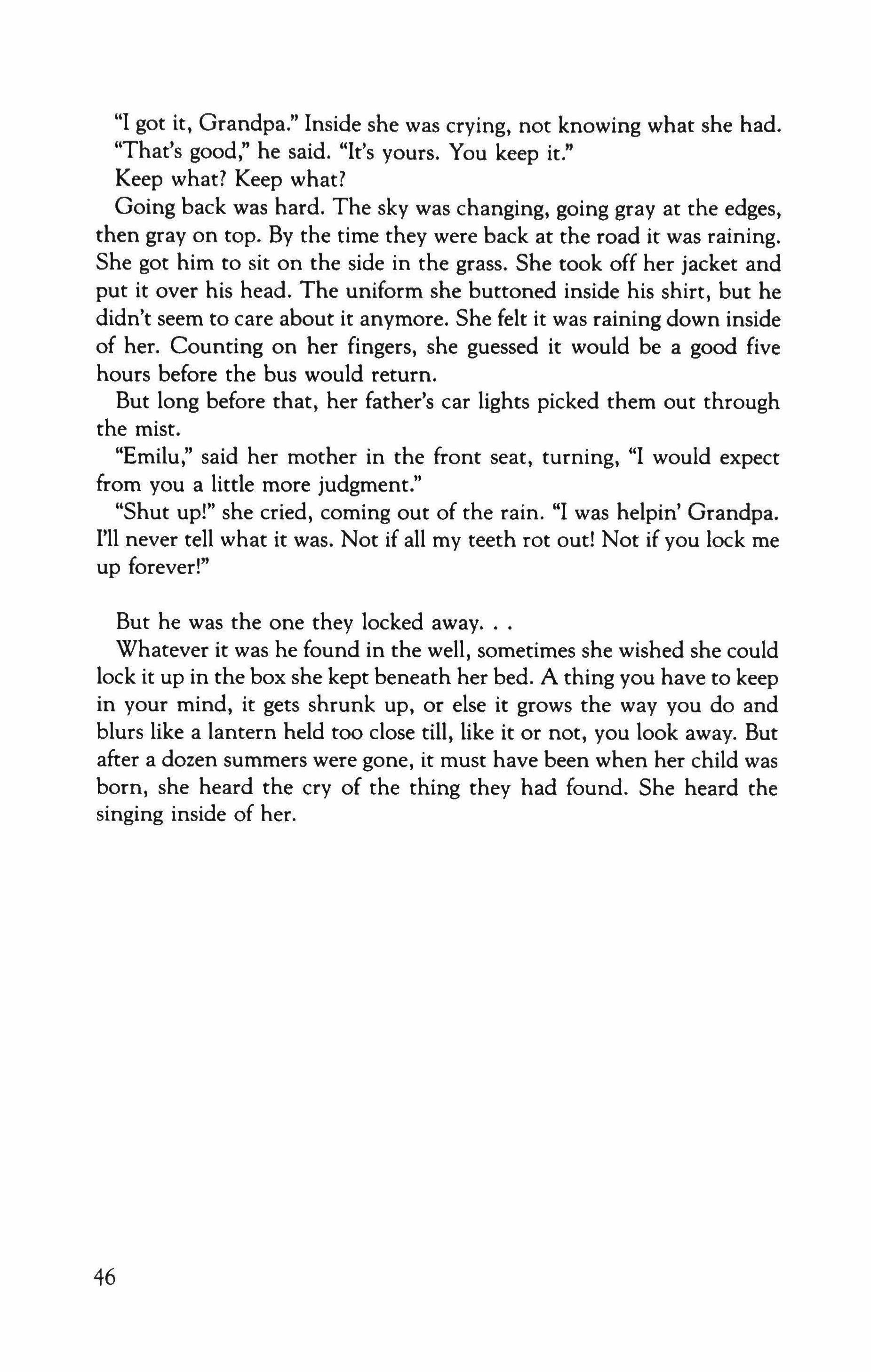
"I got it, Grandpa." Inside she was crying, not knowing what she had. "That's good," he said. "It's yours. You keep it."
Keep what? Keep what?
Going back was hard. The sky was changing, going gray at the edges, then gray on top. By the time they were back at the road it was raining. She got him to sit on the side in the grass. She took off her jacket and put it over his head. The uniform she buttoned inside his shirt, but he didn't seem to care about it anymore. She felt it was raining down inside of her. Counting on her fingers, she guessed it would be a good five hours before the bus would return.
But long before that, her father's car lights picked them out through the mist.
"Emilu," said her mother in the front seat, turning, "I would expect from you a little more judgment."
"Shut up!" she cried, coming out of the rain. "I was helpin' Grandpa. I'll never tell what it was. Not if all my teeth rot out! Not if you lock me up forever!"
But he was the one they locked away
Whatever it was he found in the well, sometimes she wished she could lock it up in the box she kept beneath her bed. A thing you have to keep in your mind, it gets shrunk up, or else it grows the way you do and blurs like a lantern held too close till, like it or not, you look away. But after a dozen summers were gone, it must have been when her child was born, she heard the cry of the thing they had found. She heard the singing inside of her.
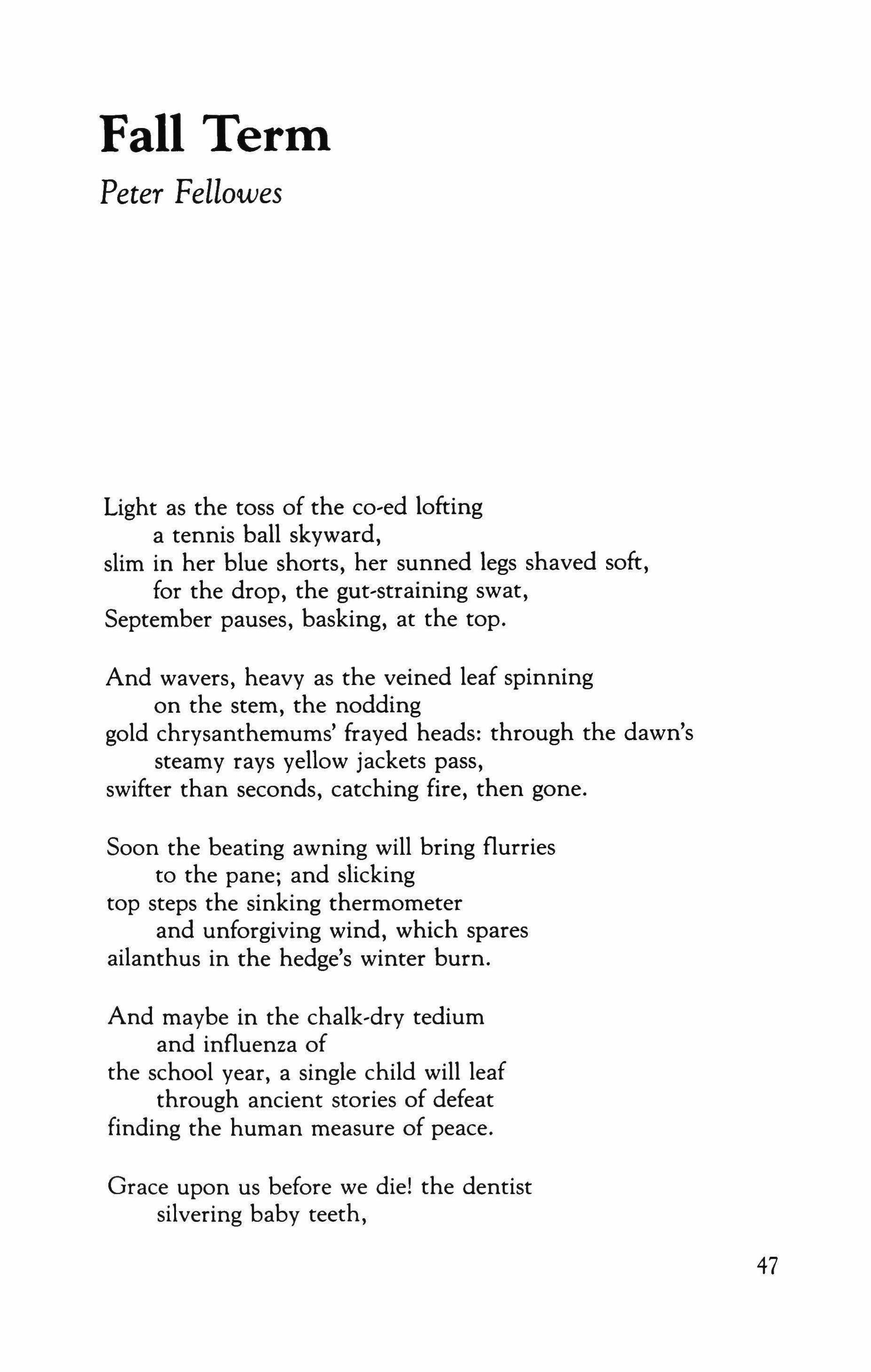
Light as the toss of the co-ed lofting a tennis ball skyward, slim in her blue shorts, her sunned legs shaved soft, for the drop, the gut-straining swat, September pauses, basking, at the top.
And wavers, heavy as the veined leaf spinning on the stem, the nodding gold chrysanthemums' frayed heads: through the dawn's steamy rays yellow jackets pass, swifter than seconds, catching fire, then gone.
Soon the beating awning will bring flurries to the pane; and slicking top steps the sinking thermometer and unforgiving wind, which spares ailanthus in the hedge's winter burn.
And maybe in the chalk-dry tedium and influenza of the school year, a single child will leaf through ancient stories of defeat finding the human measure of peace.
Grace upon us before we die! the dentist silvering baby teeth,
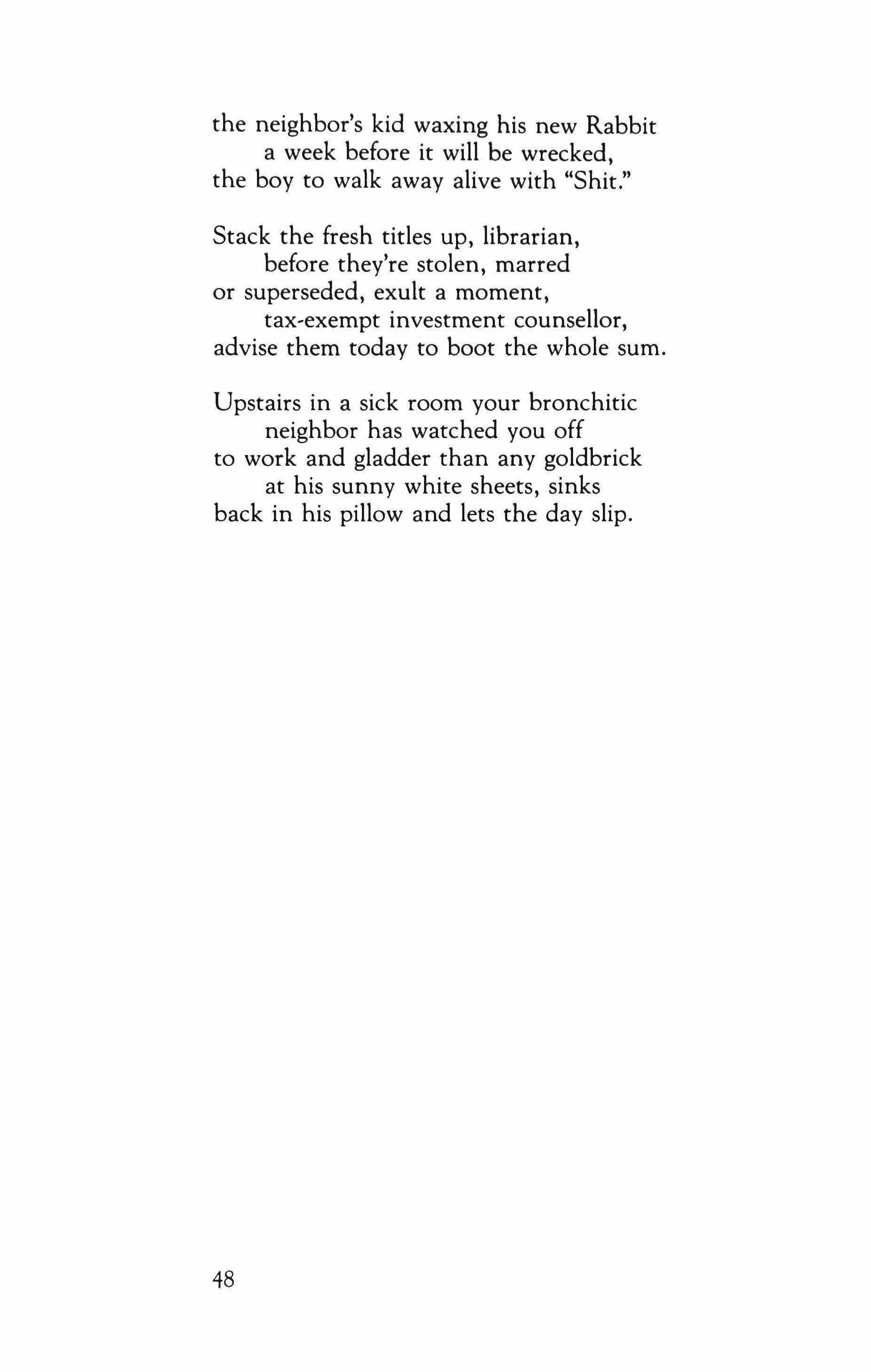
the neighbor's kid waxing his new Rabbit a week before it will be wrecked, the boy to walk away alive with "Shit."
Stack the fresh titles up, librarian, before they're stolen, marred or superseded, exult a moment, tax-exempt investment counsellor, advise them today to boot the whole sum.
Upstairs in a sick room your bronchitic neighbor has watched you off to work and gladder than any goldbrick at his sunny white sheets, sinks back in his pillow and lets the day slip.
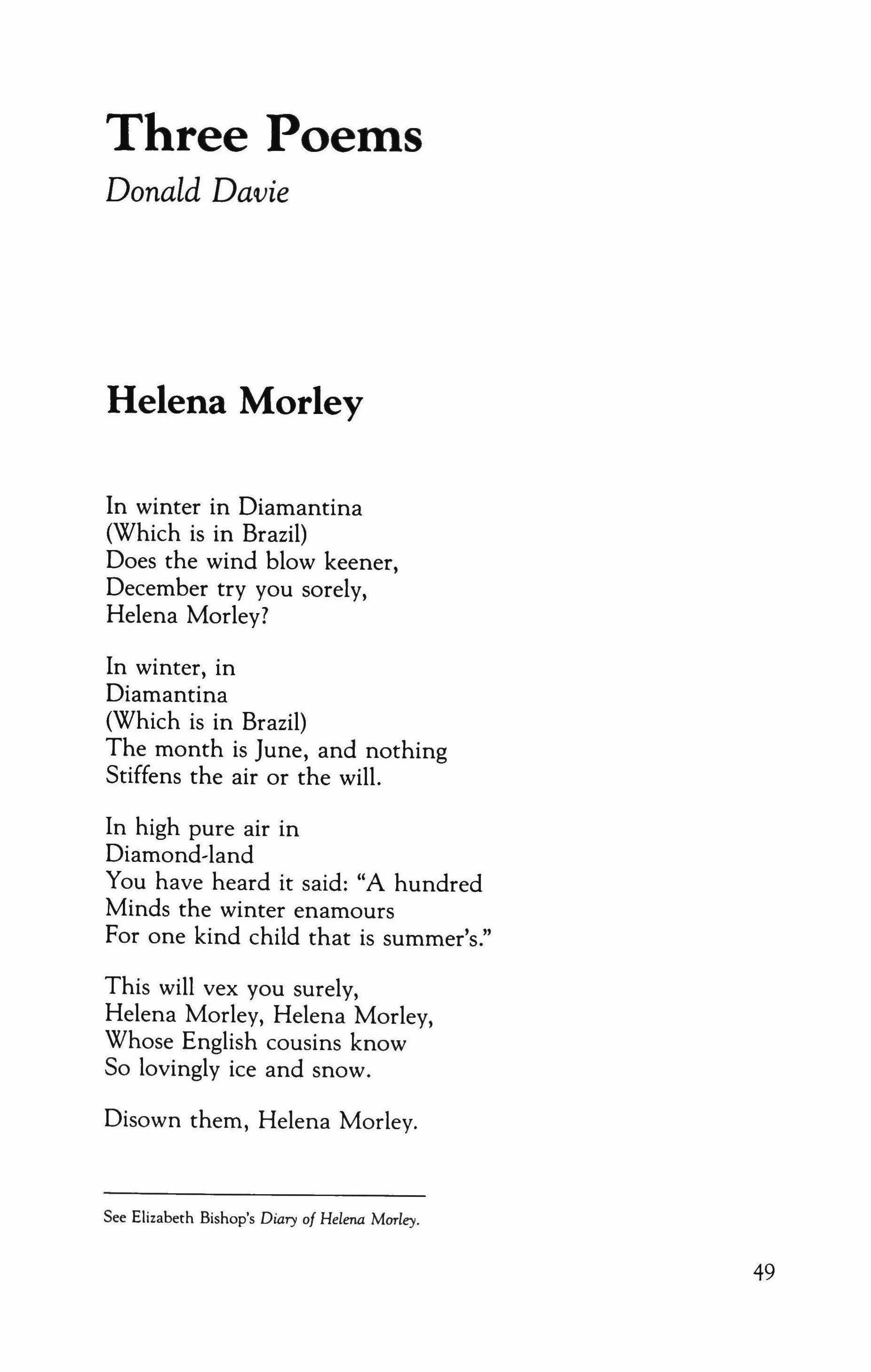
In winter in Diarnantina
(Which is in Brazil) Does the wind blow keener, December try you sorely, Helena Morley?
In winter, in Diamantina
(Which is in Brazil)
The month is June, and nothing Stiffens the air or the will.
In high pure air in Diamond-land
You have heard it said: "A hundred Minds the winter enamours For one kind child that is summer's."
This will vex you surely, Helena Morley, Helena Morley, Whose English cousins know So lovingly ice and snow.
Disown them, Helena Morley.
See Elizabeth Bishop's Diary of Helena MOTley.
Be sorry for those English Cousins of Helena's dreams:
Their Daddies built the railways, Their Daddies built the ships, Their Daddies made their daughters Their Ladyships.
Their gossamer wings whirr fast At onset of winter weather. Now they are summer's children, Through the Green Park together, Crying, through or without Tears: "Here we are, we are dying."
Pity those foreign cousins Whom Helena could not know, Accorded such esteem
So long ago.
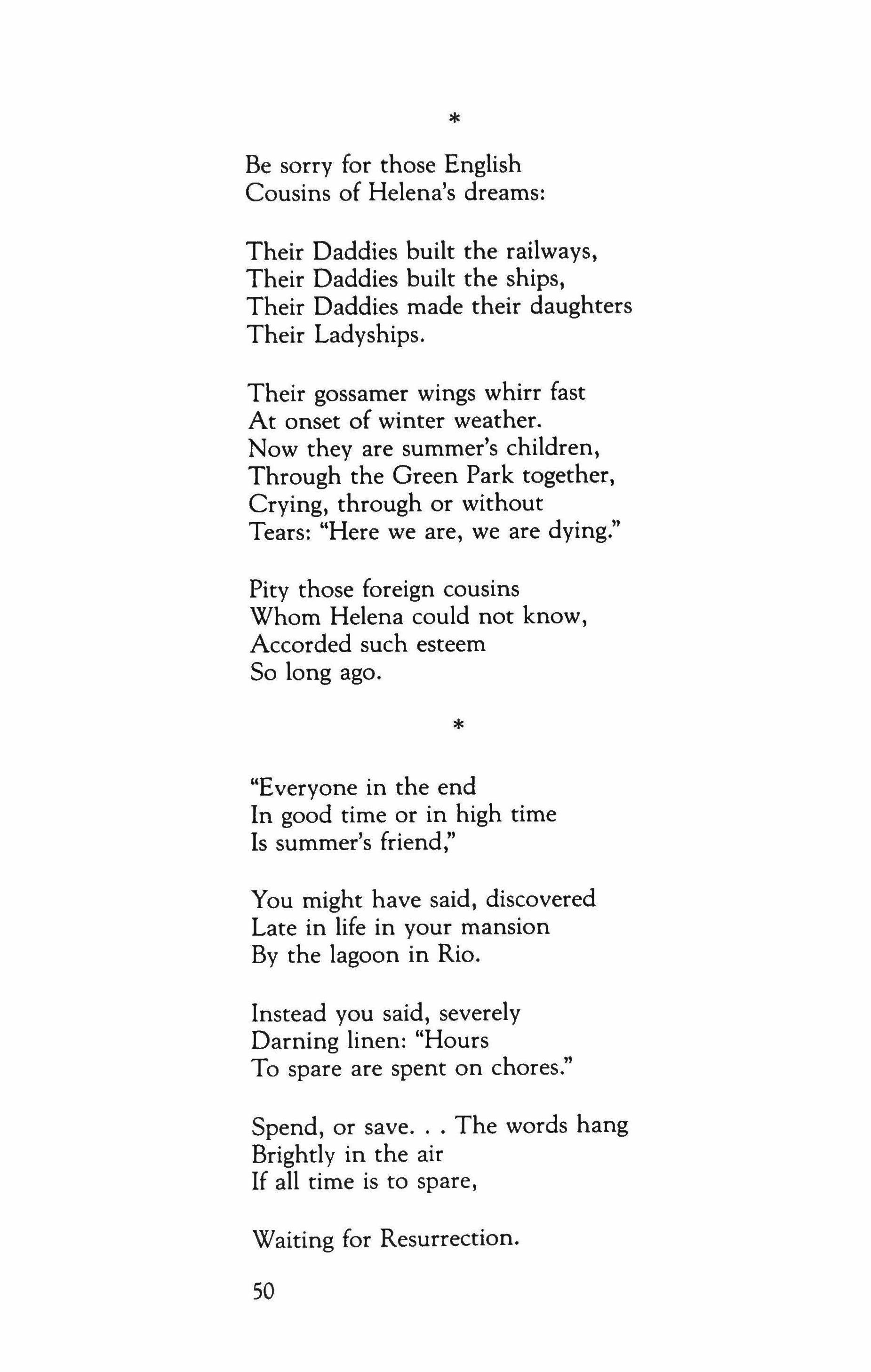
*
"Everyone in the end In good time or in high time Is summer's friend,"
You might have said, discovered Late in life in your mansion By the lagoon in Rio.
Instead you said, severely Darning linen: "Hours To spare are spent on chores."
Spend, or save The words hang Brightly in the air If all time is to spare,
Waiting for Resurrection.

Walking alone about the emptied house I jangle softly at each heavyish step, an old plough,horse, some parts of his harness upon him, who strays, tired out but happy with that, through musky honey-shot glooms of a barn where, though he strays only idly towards it, sweet hay will be found in a crib.
Hello, Ken I imagine, as everyone has, the impossible: my living and my dead looking in on the mote-shot Elysium they have emptied, hearing the ictus, the chink of pocketed coins, the household meter that my father once, he from among my dead, both was himself and moved to.
I tread at my disoriented will with a chime or a ding that, now I have emptied my pockets, I if no other still hear and will attend to. The hay in the bin will not be so sweet, after all? No matter for that, it is sweet as I stumble towards it. Such pacing of things seems all there is, sometimes, of wisdom.
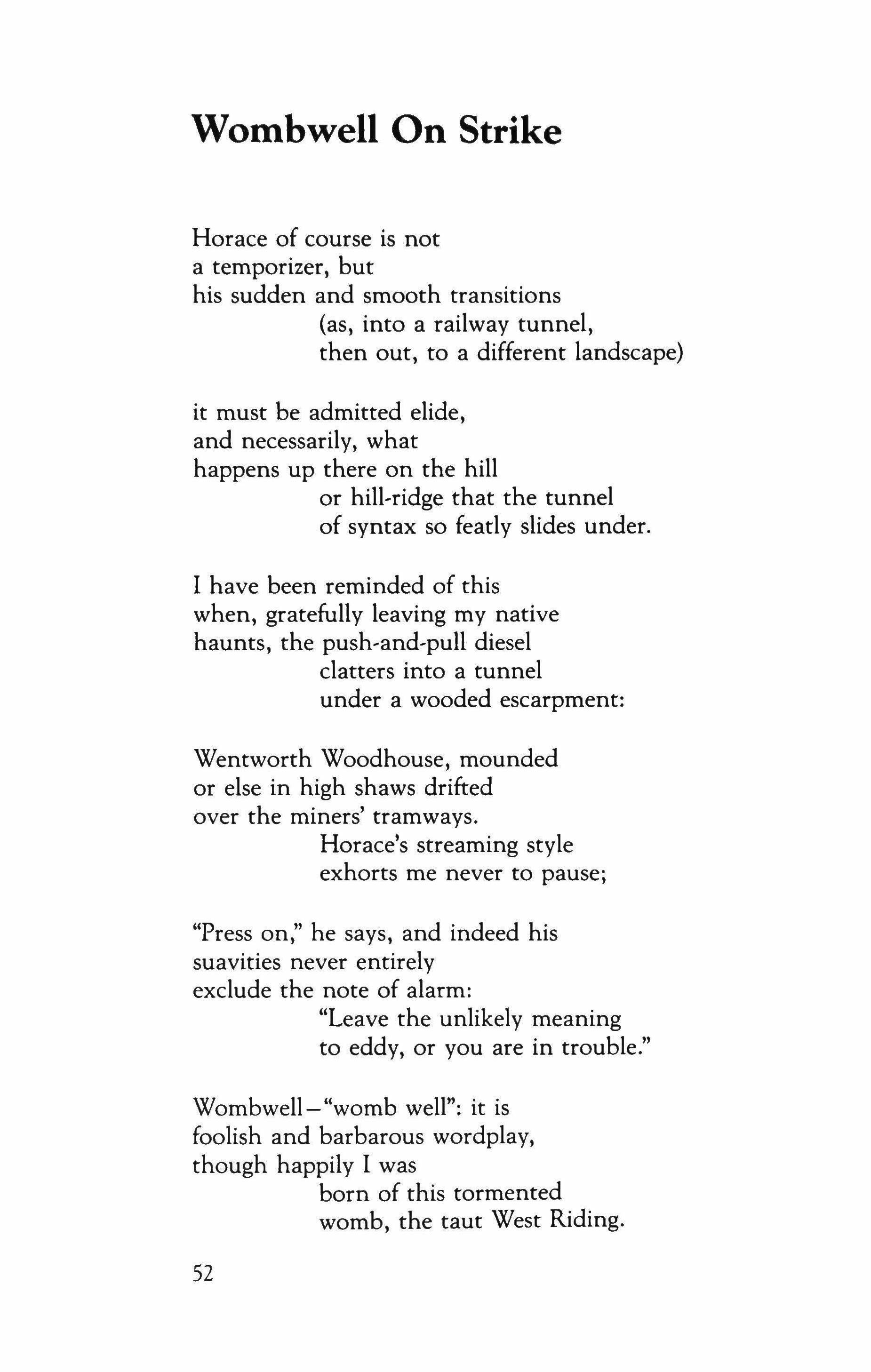
Horace of course is not a temporizer, but his sudden and smooth transitions (as, into a railway tunnel, then out, to a different landscape)
it must be admitted elide, and necessarily, what happens up there on the hill or hill-ridge that the tunnel of syntax so featly slides under.
I have been reminded of this when, gratefully leaving my native haunts, the push-and-pull diesel clatters into a tunnel under a wooded escarpment:
Wentworth Woodhouse, mounded or else in high shaws drifted over the miners' tramways.
Horace's streaming style exhorts me never to pause;
"Press on," he says, and indeed his suavities never entirely exclude the note of alarm: "Leave the unlikely meaning to eddy, or you are in trouble."
Wombwell-"womb well": it is foolish and barbarous wordplay, though happily I was born of this tormented womb, the taut West Riding.
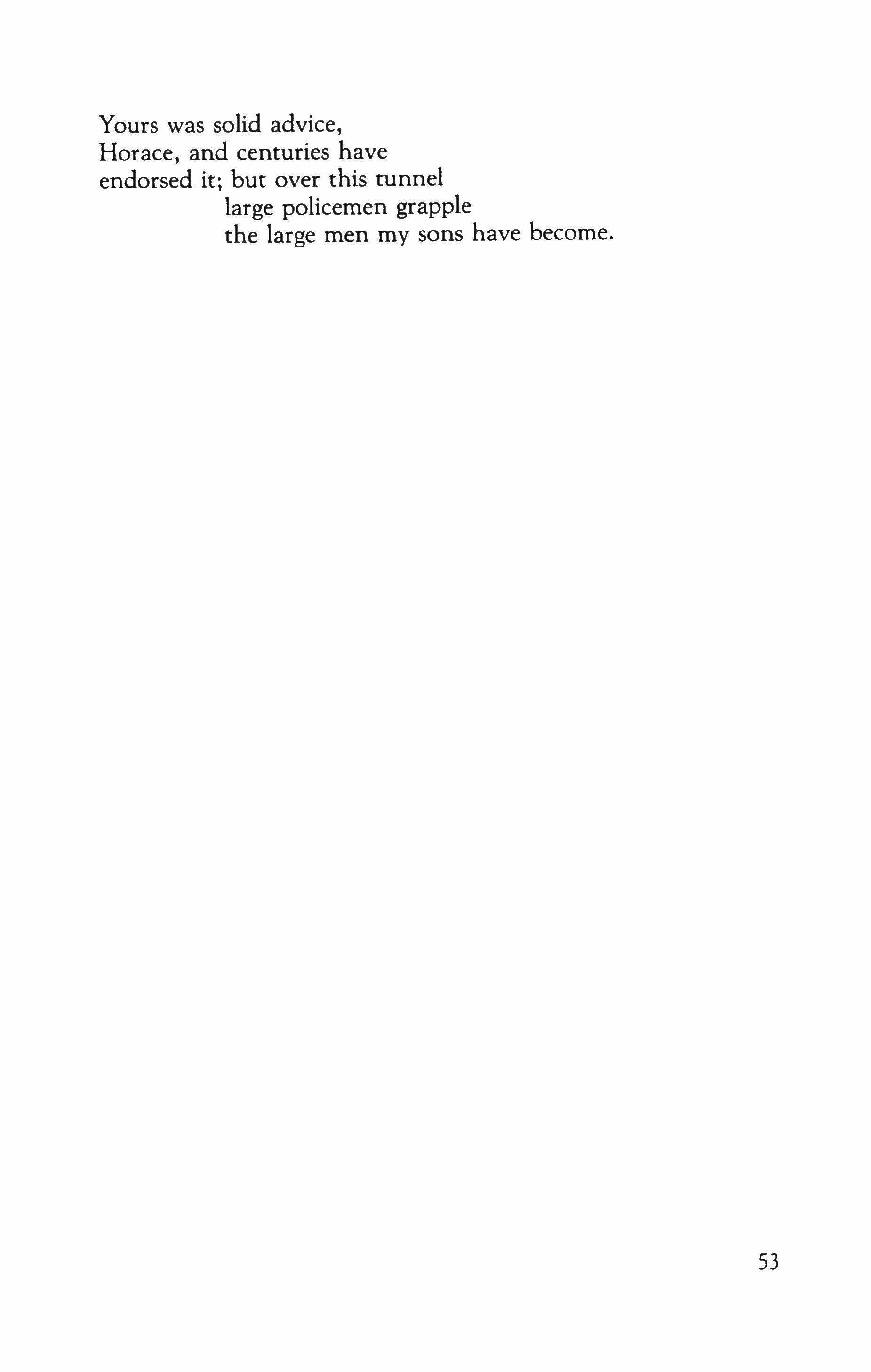
Yours was solid advice, Horace, and centuries have endorsed it; but over this tunnel large policemen grapple the large men my sons have become.

The women are like onions: layers of wool, linen and lace surround an inner self they are unable to imagine. Are they only an enclosed dampness, a skinny sob robed in sour breath? Mothers, aunts, full-grown sisters: they sit inside their clothes, as in this photographcorseted, tied, and strapped; collared to the chin, cuffed to the wrist, hemmed to the heel; aware of prodding hoops and pinching stays, and the tightening grip of high-buttoned shoes.
Each day they sit and swell, each day a little wider: swell around the vague core none of them can comprehend. Each day: waiting, waiting for they can't imagine what; the taste in their mouths bitter, bitter. They sigh, groan, shift in their chairs, even weep. Aches settle in their backs, S4

in their elbows, emerge as cramps in their insteps, tremors in their teeth.
Who are the other women then, the ones who chop cabbage, simmer soup, polish furniture until the furniture glows, unearthly, like guardian effigies in sacred tombs? Who are they, then, who bear children, scold weather, spank sickness from every cobwebbed corner; hold on through pillage and rape, through night after night of drunken weight upon their breasts? Can the women in the photograph be these women, toowomen who hold on, hold on, and will not let go?
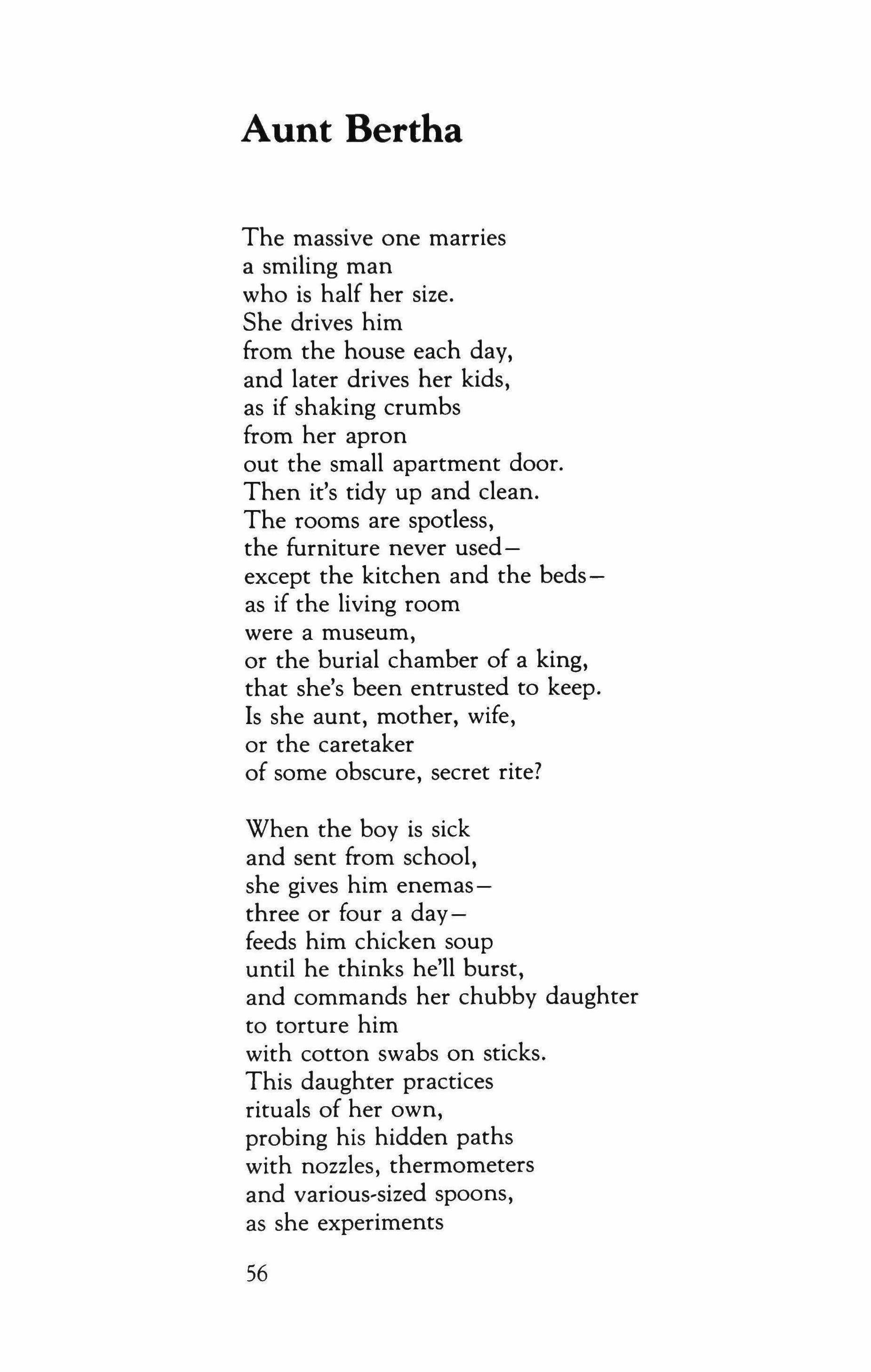
The massive one marries a smiling man who is half her size. She drives him from the house each day, and later drives her kids, as if shaking crumbs from her apron out the small apartment door. Then it's tidy up and clean. The rooms are spotless, the furniture never usedexcept the kitchen and the bedsas if the living room were a museum, or the burial chamber of a king, that she's been entrusted to keep. Is she aunt, mother, wife, or the caretaker of some obscure, secret rite?
When the boy is sick and sent from school, she gives him enemasthree or four a dayfeeds him chicken soup until he thinks he'll burst, and commands her chubby daughter to torture him with cotton swabs on sticks. This daughter practices rituals of her own, probing his hidden paths with nozzles, thermometers and various-sized spoons, as she experiments

with different methods to make him scream.
"Mommy, mommy," he cries, but mommy isn't there. She's vacationing in Hot Springs or Miami, and he's been left in these grim-faced women's care. By this time, the smiling man has been driven out for good, and the only son has run away to Europe and the War. The boy's the only male these women have to torture now, and they turn him slowly in their hands, poking his ribs to feel if he has fattened up.
Outside, it's Brooklyn, Spring, 1944. But he is trapped here in a room with soap operas and game shows on the radio, his only companions those faraway imprisoned voices that seem to flutter through furry bands of tin, whispering to him of war and marriage in a world of toothpastes and cigarettes and different-flavored chewing gums. "Mottle, Mottle: how we gonna make you well, you listen to such things?" It is his aunt. She fills the doorway in her faded purple robe, hands on hips, smelling

of onions and menthol, and wags her head like a metronome. Then she plucks him from the radio, and bears him underneath her arm to the bathroom's glinting tiles and chrome for another enema. Her daughter grins and pokes his buttocks when he screams. "We got to clean you out, should you still be full of germs:' his aunt announces as she holds him down but lets him shriek. Then to her daughter, or to no one in the room: "What kind of woman goes off and leaves a boy l" and shakes her head. Her daughter grins again, sticks out her tongue, and pinches him.
By the time his mother comes, he's well. In the living room, his aunt, defiantly triumphant, stands with feet apart in the faded robe, and shows him off. His mother reaches out a bangled hand from wild gardenias, jewels and furs. It strokes his cheek. She nods and thanks her sister, and the pudgy girl who hides behind her back,
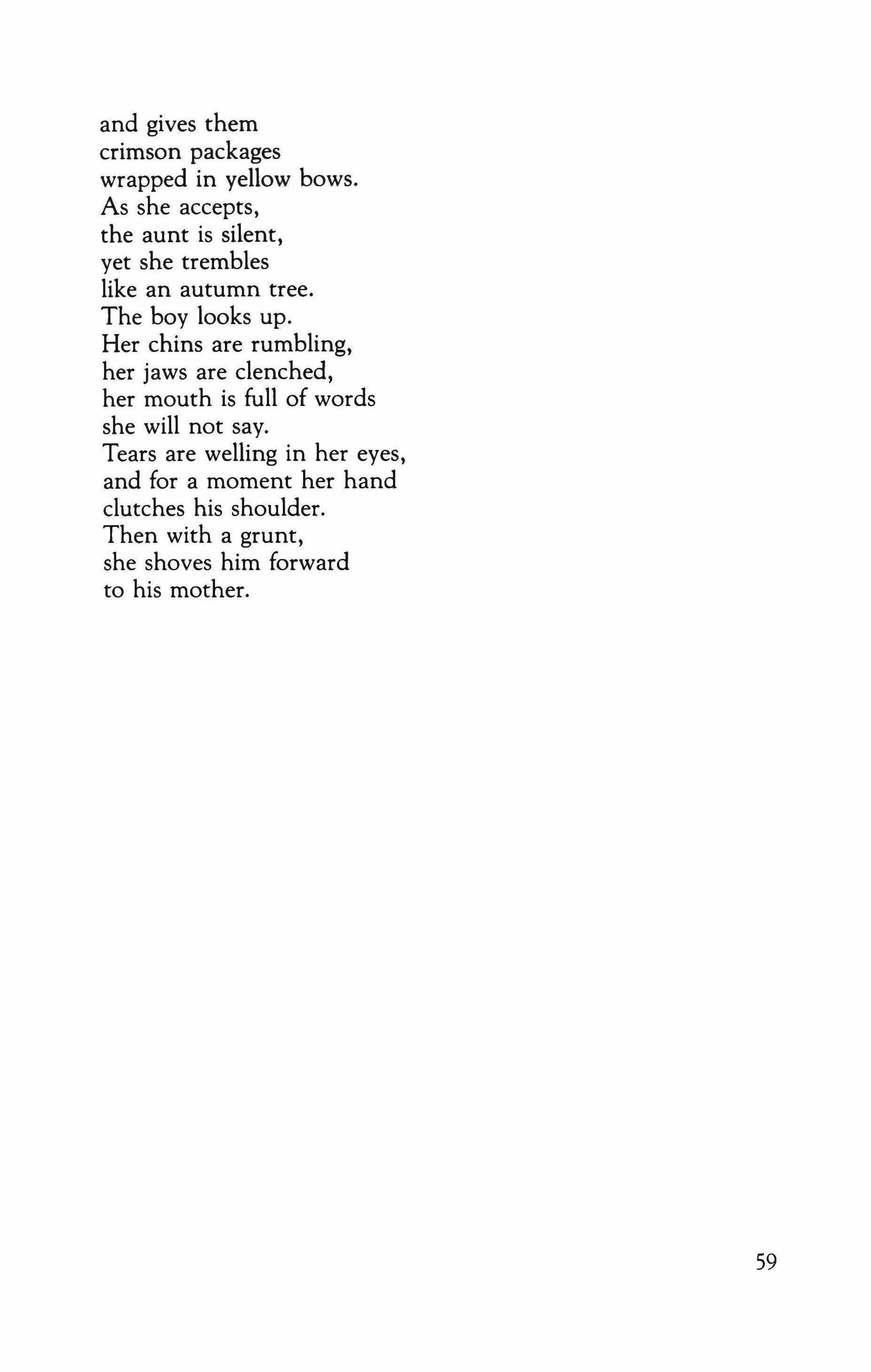
and gives them crimson packages wrapped in yellow bows. As she accepts, the aunt is silent, yet she trembles like an autumn tree. The boy looks up. Her chins are rumbling, her jaws are clenched, her mouth is full of words she will not say. Tears are welling in her eyes, and for a moment her hand clutches his shoulder. Then with a grunt, she shoves him forward to his mother.
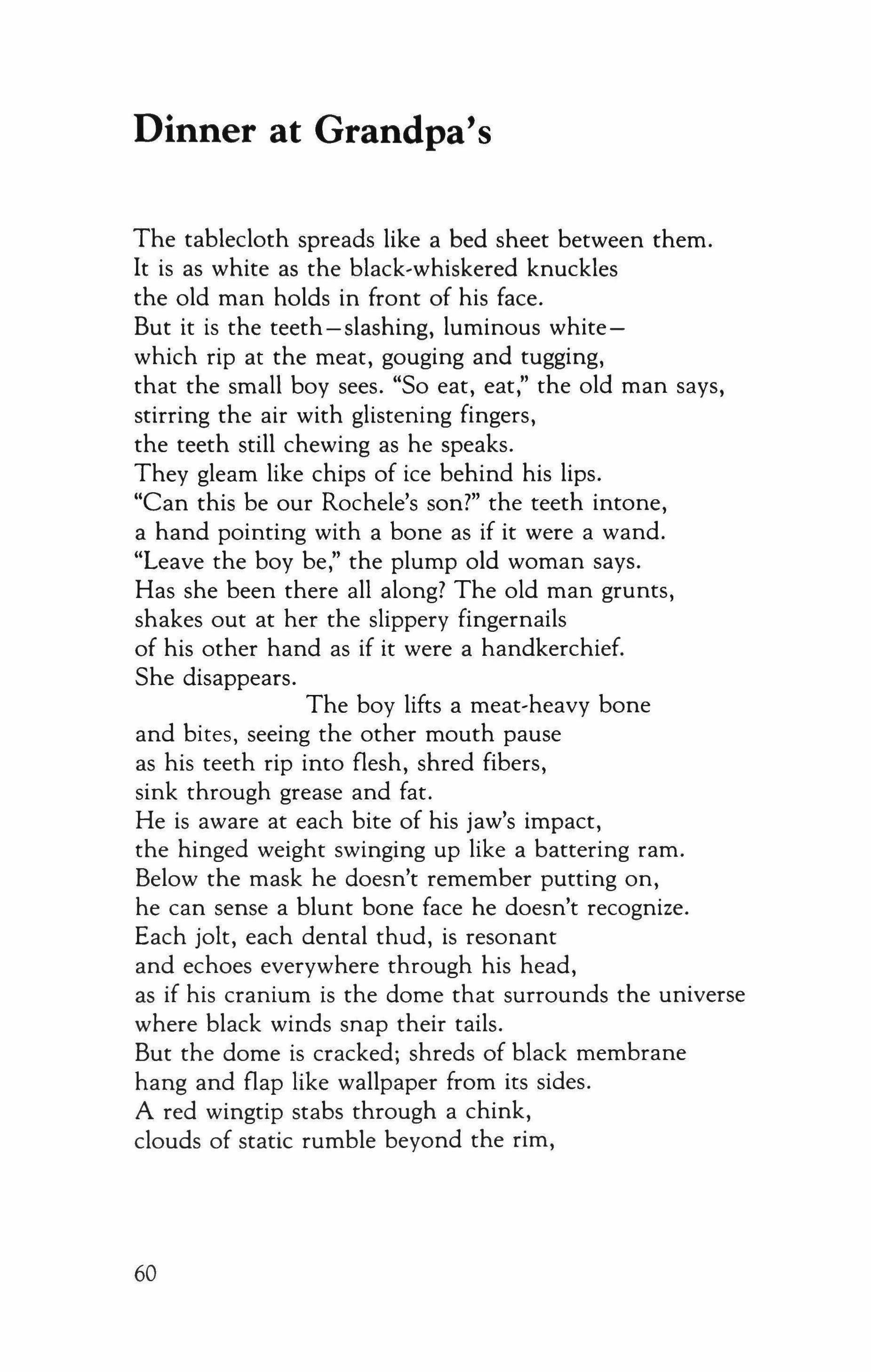
The tablecloth spreads like a bed sheet between them. It is as white as the black-whiskered knuckles the old man holds in front of his face. But it is the teeth-slashing, luminous whitewhich rip at the meat, gouging and tugging, that the small boy sees. "So eat, eat," the old man says, stirring the air with glistening fingers, the teeth still chewing as he speaks. They gleam like chips of ice behind his lips.
"Can this be our Rochele's son?" the teeth intone, a hand pointing with a bone as if it were a wand.
"Leave the boy be," the plump old woman says. Has she been there all along? The old man grunts, shakes out at her the slippery fingernails of his other hand as if it were a handkerchief. She disappears.
The boy lifts a meat-heavy bone and bites, seeing the other mouth pause as his teeth rip into flesh, shred fibers, sink through grease and fat. He is aware at each bite of his jaw's impact, the hinged weight swinging up like a battering ram. Below the mask he doesn't remember putting on, he can sense a blunt bone face he doesn't recognize. Each jolt, each dental thud, is resonant and echoes everywhere through his head, as if his cranium is the dome that surrounds the universe where black winds snap their tails. But the dome is cracked; shreds of black membrane hang and flap like wallpaper from its sides. A red wingtip stabs through a chink, clouds of static rumble beyond the rim,
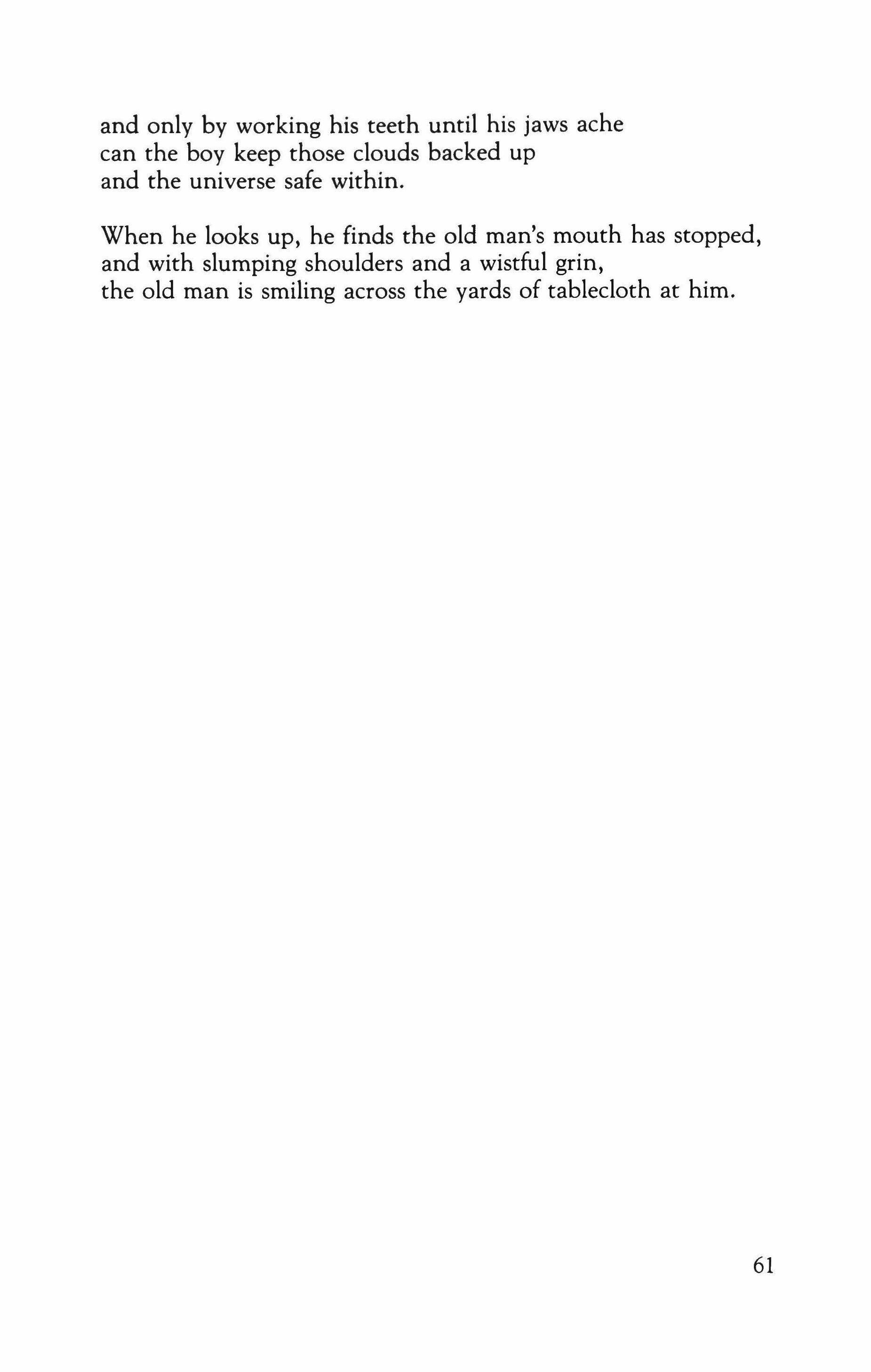
and only by working his teeth until his jaws ache can the boy keep those clouds backed up and the universe safe within.
When he looks up, he finds the old man's mouth has stopped, and with slumping shoulders and a wistful grin, the old man is smiling across the yards of tablecloth at him.
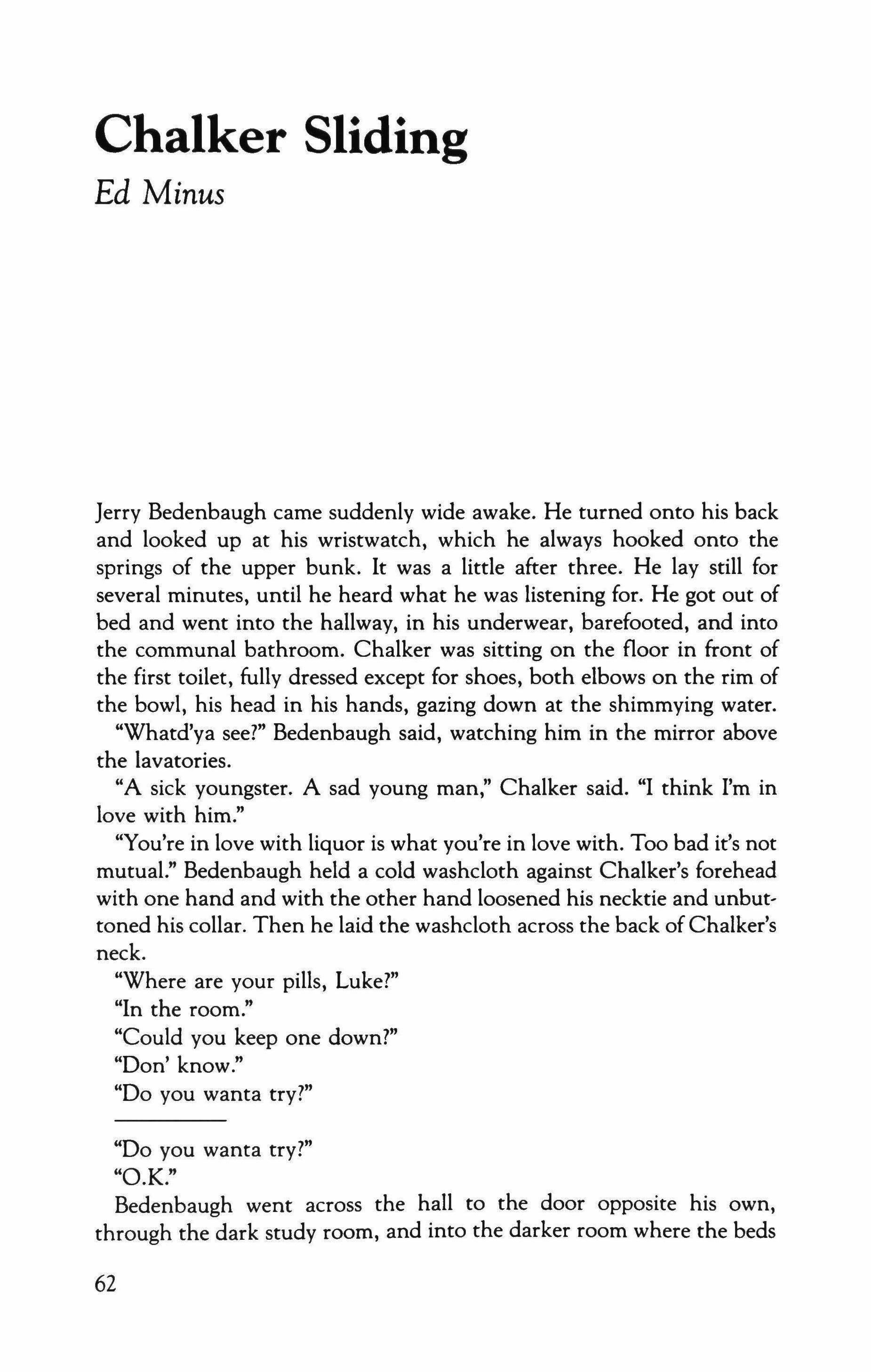
Jerry Bedenbaugh came suddenly wide awake. He turned onto his back and looked up at his wristwatch, which he always hooked onto the springs of the upper bunk. It was a little after three. He lay still for several minutes, until he heard what he was listening for. He got out of bed and went into the hallway, in his underwear, barefooted, and into the communal bathroom. Chalker was sitting on the floor in front of the first toilet, fully dressed except for shoes, both elbows on the rim of the bowl, his head in his hands, gazing down at the shimmying water.
"Whatd'ya see?" Bedenbaugh said, watching him in the mirror above the lavatories.
"A sick youngster. A sad young man," Chalker said. "I think I'm in love with him."
"You're in love with liquor is what you're in love with. Too bad it's not mutual." Bedenbaugh held a cold washcloth against Chalker's forehead with one hand and with the other hand loosened his necktie and unbuttoned his collar. Then he laid the washcloth across the back of Chalker's neck.
"Where are your pills, Luke?"
"In the room."
"Could you keep one down?"
"Don' know."
"Do you wanta try?"
"Do you wanta try?"
"O.K."
Bedenbaugh went across the hall to the door opposite his own, through the dark study room, and into the darker room where the beds

were. He began to pass his hands blindly, gingerly, over the top of the chest of drawers at the foot of Chalker's bed. He nudged a can of foot powder over the edge and it struck the iron bedstead.
Douglas' voice was slow and sleepy and muffled. "For chrissake," he said. "Turn the goddamn light on."
"You know where Luke's pills are?"
"Sock drawer. Top left."
"He looks worse off than usual."
"Hell with him," Douglas said.
"I thought you were gonna watch him tonight. Make him take it easy. Get him home early."
"Look, dammit: anytime you wanta go along in my place: ration it out to him: preach him little temperance sermons-he's all yours. I'll be glad to clean up the pukin' and fetch his pills and feel sorry for him when you get him back."
"I'm sorry, Jimmy. I didn't mean it that way."
"It's not as easy as you think, Bo. Once he's had half a dozen beers he's slick as semen. And happy!? My God! I never knew anybody but niggers got so happy. He's a goddamn dancin' Christmas tree."
"Look, if you want me to-" Bedenbaugh paused; and for a moment, holding still in the small cold room, they listened to the familiar sound of Chalker retching.
"His pajamas are under his pillow," Douglas said.
"I'm sorry I woke you up, Jimmy."
Bedenbaugh went back into his own room, picked up his French book, and took Anderson's Old Spice after-shave off the shelf in the metal wardrobe. Back in the bathroom the dancing Christmas tree was lying flat on the floor, biting his lower lip and stroking his throat. Bedenbaugh bent down and poked a pill into the corner of his mouth. Then, to cut the sour stink of vomit, he dribbled and dashed the after, shave on the floor and onto the walls. He smeared a fingerful above Chalker's upper lip and above his own. Then he went to the far end of the long narrow room and raised the window about an inch. Because the panes were offrosted glass and the window ledge deep, he did not see that it was snowing.
"Second time this week, right, Luke?"
"You know you're drinkin' yourselfright outa school. You realize that, don't you?"
"You got a French quiz tomorrow, right? You got about a forty-five
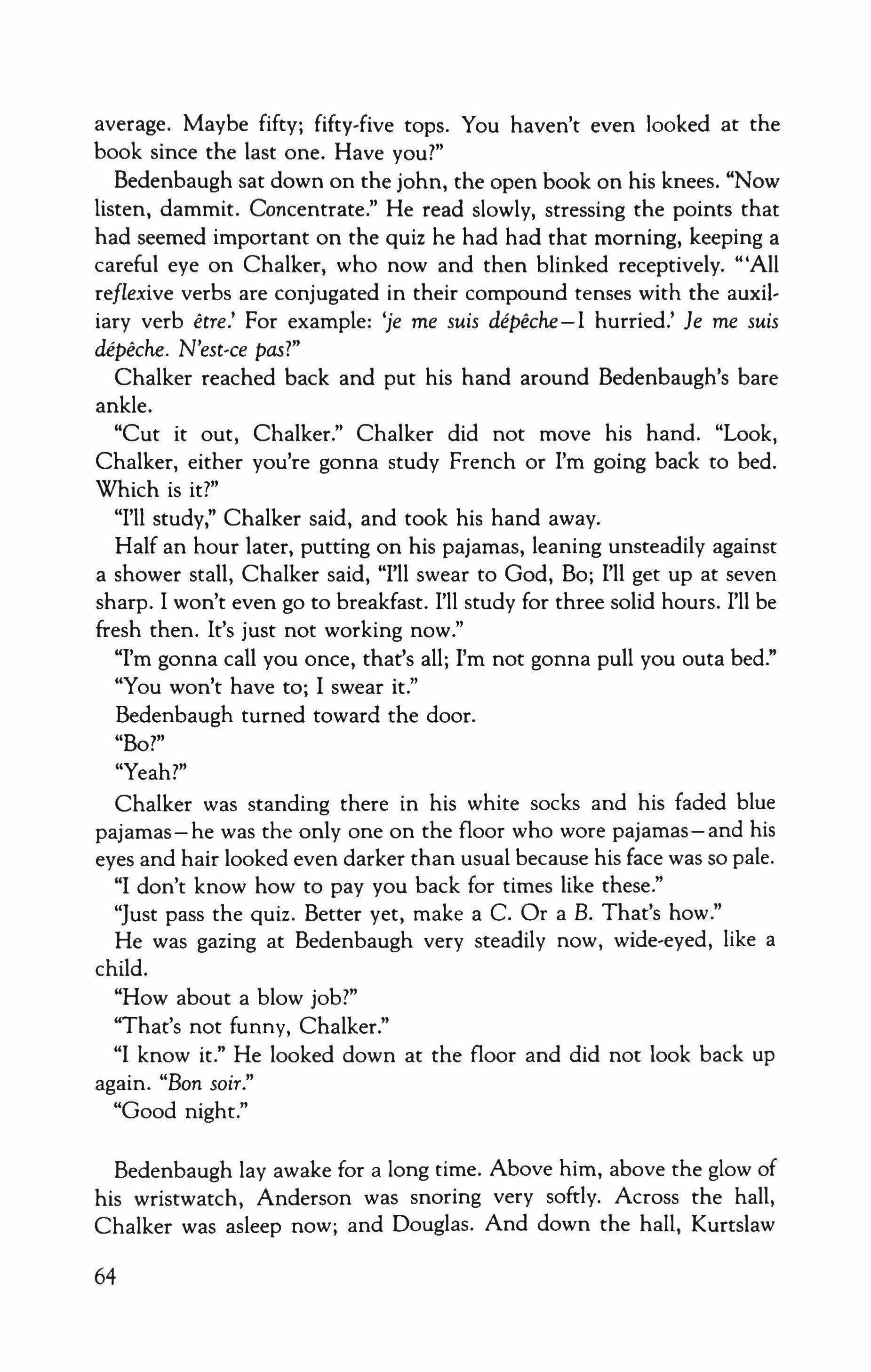
average. Maybe fifty; fifty-five tops. You haven't even looked at the book since the last one. Have you?"
Bedenbaugh sat down on the john, the open book on his knees. "Now listen, dammit. Concentrate." He read slowly, stressing the points that had seemed important on the quiz he had had that morning, keeping a careful eye on Chalker, who now and then blinked receptively. '''All reflexive verbs are conjugated in their compound tenses with the auxiliary verb eire' For example: 'je me suis depeche-l hurried.' le me suis depeche. N'est-ce pas?"
Chalker reached back and put his hand around Bedenbaugh's bare ankle.
"Cut it out, Chalker." Chalker did not move his hand. "Look, Chalker, either you're gonna study French or I'm going back to bed. Which is it?"
"I'll study," Chalker said, and took his hand away.
Half an hour later, putting on his pajamas, leaning unsteadily against a shower stall, Chalker said, "I'll swear to God, Bo; I'll get up at seven sharp. I won't even go to breakfast. I'll study for three solid hours. I'll be fresh then. It's just not working now."
"I'm gonna call you once, that's all; I'm not gonna pull you outa bed."
"You won't have to; I swear it."
Bedenbaugh turned toward the door.
"Bo?"
"Yeah?"
Chalker was standing there in his white socks and his faded blue pajamas-he was the only one on the floor who wore pajamas-and his eyes and hair looked even darker than usual because his face was so pale.
"I don't know how to pay you back for times like these."
"Just pass the quiz. Better yet, make a C. Or a B. That's how."
He was gazing at Bedenbaugh very steadily now, wide-eyed, like a child.
"How about a blow job?"
"That's not funny, Chalker."
"I know it." He looked down at the floor and did not look back up again. "Bon soir."
"Good night."
Bedenbaugh lay awake for a long time. Above him, above the glow of his wristwatch, Anderson was snoring very softly. Across the hall, Chalker was asleep now; and Douglas. And down the hall, Kurtslaw

and Singer; Fleming and Whitehead. It was very quiet. Outside, it was still snowing.
From the very first, from the moment he had given his life to Jesus, Bedenbaugh had known that he would be challenged and tested. And he knew that the rest of his life depended on how he met the challenges he was facing right now. He was absolutely certain that he wanted to become a minister. But perhaps that was not what God wanted for him. How could he imagine that he would be able to understand and help people whose lives were completely different from his own if he could not even help somebody his own age, somebody who was living next door to him? Chalker, of course, had never asked for his help. Not in words. Not his help. When he had made that decision he had been guilty ofjudging. Guilty of pride. Maybe he was the last person Chalker needed help from. That was what he had begun to fear. But how could he have known that? He had not pushed himself on Chalker, they had just become friends just from living side by side; just from seeing each other every day. At first, when Chalker first learned that he was a preministerial student, he had looked askance; had kidded him; had taken pleasure in trying to shock or offend him. But Bedenbaugh had seen through that; most of that was just a front. He was sure of it. But he had not seen far enough. He had not even guessed. Chalker had seemed, and still seemed, much like one of his own younger brothers, both of whom were younger than Chalker. And maybe, in a way, Chalker saw him as an older brother. But he saw him in another way, too. Sometimes he even looked at him in another way. A way no other friend of his ever had. And not many girls. Maybe Chalker was still just kidding him, though; maybe it was just a joke. But he knew that it wasn't. He was the joke. He was trying too hard, the way he sometimes did when he studied for a test, trying to learn so much, trying to keep so many details in mind, that the main result was confusion. The difference was, that on a test he was only hurting himself.
Please, God. Please just let me help Chalker.
"What time is it?" Chalker said, without opening his eyes. For a long time he had heard pigeons flying hard against the window screen. Then he had heard Kurtslaw and Fleming yelling his name over and over again. He had imagined the dorm was on fire, and he lay still and waited for someone to come save him.
"It's ten-thirty," Douglas said. He was draping his wet socks on the radiator. His hair was damp and his face was brightly flushed.

"Oh Lord," Chalker sighed. And then, more urgently: "Where is Bo?"
"It snowed last night," Douglas said. "No classes."
Chalker smiled and stepped out above the snow-white circle held by firemen and faculty, and a parachute opened and he floated and floated and floated down.
Langston Fleming sat down softly on the edge of Chalker's bed; he leaned against and across Chalker's chest and wedged his elbow between Chalker's arm and the wall. Then he rubbed a handful of snow all over Chalker's face. Chalker gasped and choked and spit and twisted; tears came to his eyes and a hard, broken pain moved in his head. Fleming sprang away and fell onto Douglas' bed, looking half-apprehensive, half, ecstatic, wondering if Chalker was really going to be pissed off. Bedenbaugh, Kurtslaw and Singer were standing in the doorway. Bedenbaugh took a towel from the shelf in Chalker's wardrobe and tossed it to him.
Chalker opened his eyes again and saw the funny look on Fleming's face. "You goddamn son of a bitch," he said. Fleming saw that he was not dangerously angry.
"You're missin' the whole show," Kurtslaw said. "You can't lay around in bed all day when there's snow on the ground."
"Watch me," Chalker said.
"We only get a good snow every five, six years," Bedenbaugh told him.
"Man, we been out in it all morning," Singer said. "We built a god, damn fort. A goddamn snowman. A snow woman. We been havin' snowball battles with McIntyre. Kurtslaw here broke out a window in Bull's room."
"Like hell I did," Kurtslaw said. "That was Crawford I keep tellin' you."
"Come on, Chalker," Singer said. "Get your lazy hungover ass up."
"Anybody got any coffee?" Chalker said.
"Charlie," Singer said, "run get Luke some coffee."
"Lemme borrow your shades," Chalker said, now that he had both feet on the floor. He put on Singer's dark glasses before he went into the bathroom, where the walls, the floor, the ceiling, the fixtures, were all painfully white and bright (however grimy). He took three aspirins, splashed handfuls of cold water against his face, brushed his teeth and combed his hair. When he bent over, the pain in his head made him feel sick. On his way back to the room, Kurtslaw gave him the coffee. Once he had his underwear on, he walked over to the window and looked out at the snow for the first time. After the first dull ache, there was some'

thing almost soothing about the expanse of whiteness - it was like a smooth cool white bed. Or a huge bandage. Or blindfold.
Vinson had wandered in. "Why so pale and wan, Chalker?"
"He just needs a little fresh air," Bedenbaugh said.
"You got any boots?" Singer said. "Charlie, run get that pair of old huntin' boots outa the back of our closet. You got any gloves?"
"United States Army's," Chalker said.
"They'll do," Singer said. "You can always say you lost 'ern."
As they started down the stairs, Chalker said, "Looks like I lucked up again, huh, Bo?"
"That depends," Bedenbaugh said.
By midafternoon, Chalker, Douglas, and Fleming had corne back inside, soaked to the skin, gleaming, glowing. They took hot showers, put on dry clothes, made coffee and settled down in Fleming's room to play bridge. Anderson made a reluctant fourth. He put on a Miles Davis album.
Bedenbaugh carne in about an hour later.
"I thought you said you were corning in to study, Chalker."
"I studied for a while," Chalker said. "Didn't I, Jay?"
"I don't know," Anderson said, "did you? Oh yeah. Now I remember: you did, didn't you?"
"He studied," Douglas said. "Say something in flawless French, Chalker."
"Hell, Bo, I got till Monday now, anyway," Chalker said. "I can't study good when I got a headache."
Bedenbaugh went into Kurtslaw's room and fixed himself a cup of coffee, and then went into the bathroom to shower.
After supper that night Chalker talked them into making snow ice cream and recruited a contingent to hike into town for the ingredients. They went out the main gate and headed down Brantley Street, through the residential section. Their voices and footsteps seemed unnaturally loud; and the snow made the night brighter than usual, almost like moonlight. The wind had died down, so it was not as cold as it had been during the day. Lights were on in almost all the houses, and the houses looked warm, peaceful and comfortable. Chalker felt a twinge of homesickness. But not so much for his own horne as for these homes, the ones they were passing. All of them. Any of them.
Singer and Douglas had jogged on ahead and were playing pitch with
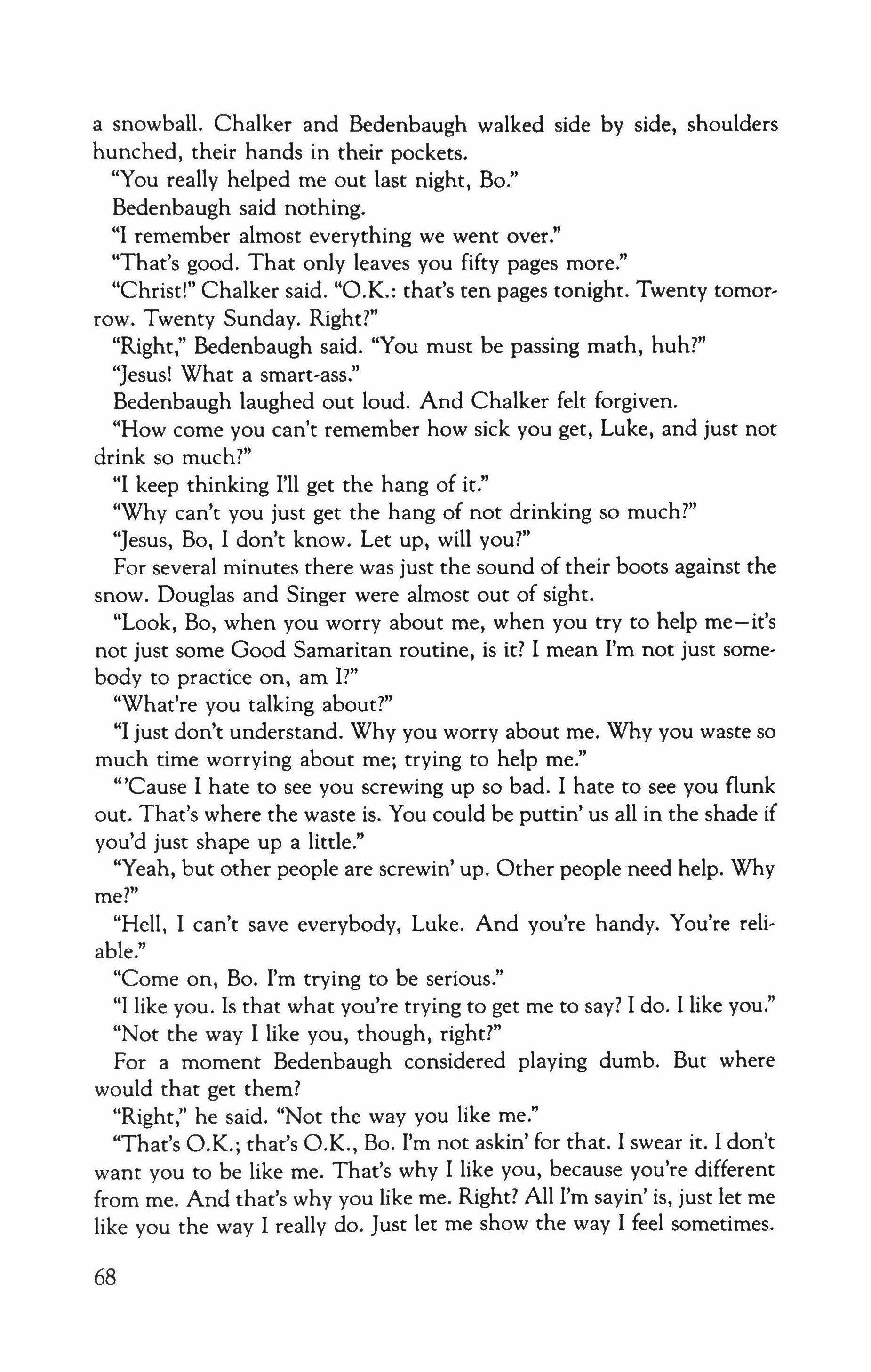
a snowball. Chalker and Bedenbaugh walked side by side, shoulders hunched, their hands in their pockets.
"You really helped me out last night, Bo,"
Bedenbaugh said nothing.
"I remember almost everything we went over."
"That's good. That only leaves you fifty pages more."
"Christ!" Chalker said. "O.K.: that's ten pages tonight. Twenty tomorrow. Twenty Sunday. Right?"
"Right," Bedenbaugh said. "You must be passing math, huh?"
"Jesus! What a smart-ass."
Bedenbaugh laughed out loud. And Chalker felt forgiven.
"How come you can't remember how sick you get, Luke, and just not drink so much?"
"I keep thinking I'll get the hang of it."
"Why can't you just get the hang of not drinking so much?"
"Jesus, Bo, 1 don't know. Let up, will you?"
For several minutes there was just the sound of their boots against the snow. Douglas and Singer were almost out of sight.
"Look, Bo, when you worry about me, when you try to help me-it's not just some Good Samaritan routine, is it? I mean I'm not just somebody to practice on, am I?"
"What're you talking about?"
"I just don't understand. Why you worry about me. Why you waste so much time worrying about me; trying to help me."
'''Cause 1 hate to see you screwing up so bad. I hate to see you flunk out. That's where the waste is. You could be puttin' us all in the shade if you'd just shape up a little."
"Yeah, but other people are screwin' up. Other people need help. Why me?"
"Hell, I can't save everybody, Luke. And you're handy. You're reliable."
"Come on, Bo. I'm trying to be serious."
"I like you. Is that what you're trying to get me to say? I do. I like you."
"Not the way 1 like you, though, right?"
For a moment Bedenbaugh considered playing dumb. But where would that get them?
"Right," he said. "Not the way you like me."
"That's O.K.; that's O.K., Bo. I'm not askin' for that. I swear it. I don't want you to be like me. That's why I like you, because you're different from me. And that's why you like me. Right? All I'm sayin' is, just let me like you the way 1 really do. Just let me show the way I feel sometimes.

Even if it's just touching. Just let me say it sometimes. Just don't act like it's a crime. O.K.?"
"I don't mean to act like it's a crime, Luke. I try to understand how you feel. I don't mean to seem like I'm judging you. I'm just talking about me: for me it just feels wrong. And I can't help that, I can't help the way I feel any more than you can. I just don't think you should even talk about it. Maybe you could up at Staunton. Maybe with the crowd you ran with up there. But not down here."
"Jesus! You make it sound like I go around comin' on to everybody I see. You're the only one I feel that way about. You're the only one who lets me talk about it at all. If I said something like that to any of the others, they'd bash my goddamn face in. I know that. Sure, I know they like me. But that's just because I'm a funny drunk. They don't care what happens to me."
"But you gotta understand that just because I care what happens to you, it doesn't mean I can have sex with you. I'm not like that."
"I know it; I know that, Bo. I understand that. I'm not even talking about sex. I just want to be with you more. Just the two of us. If we could go off somewhere one weekend Couldn't we do that?"
"But sex is what you'd want, isn't it? Sooner or later? That's what you'd be hoping for. Right?"
"I don't know. Maybe not. Maybe you could help me get over that."
"You know better than that, Luke. I can't even keep you sober three days in a row. I can't even get you to pass two quizzes in a row. You're dreaming, Luke; you know you are. You gotta wake up."
They were coming to the small business section of town. The Christ, mas lights were already up, strung across the streets and wound around the light posts; and the store windows were decorated. In the center of the square a large Christmas tree, a cedar, laden now with snow, was leaning precariously.
At the sidewalk market large sheets of plastic-clear plastic, though now heavily frosted - had been hung along the open front of the shed. Suspended from the front beam, just behind the plastic, stalks of yellow, green bananas alternated with small pink Christmas trees. Below these were bins of tangerines, lemons, oranges and coconuts; and on the ground under the bins were bushel baskets of apples and pecans. Behind this display, in several short rows, there were shelves of canned goods and staples, and at the back of the shed stood two small coolers for meats and dairy products and beer. In the front corner, near the counter where the cash register was and where Mr. Campbell, the owner, stood most of the time, a small electric heater glowed bright red. Mr. Camp,
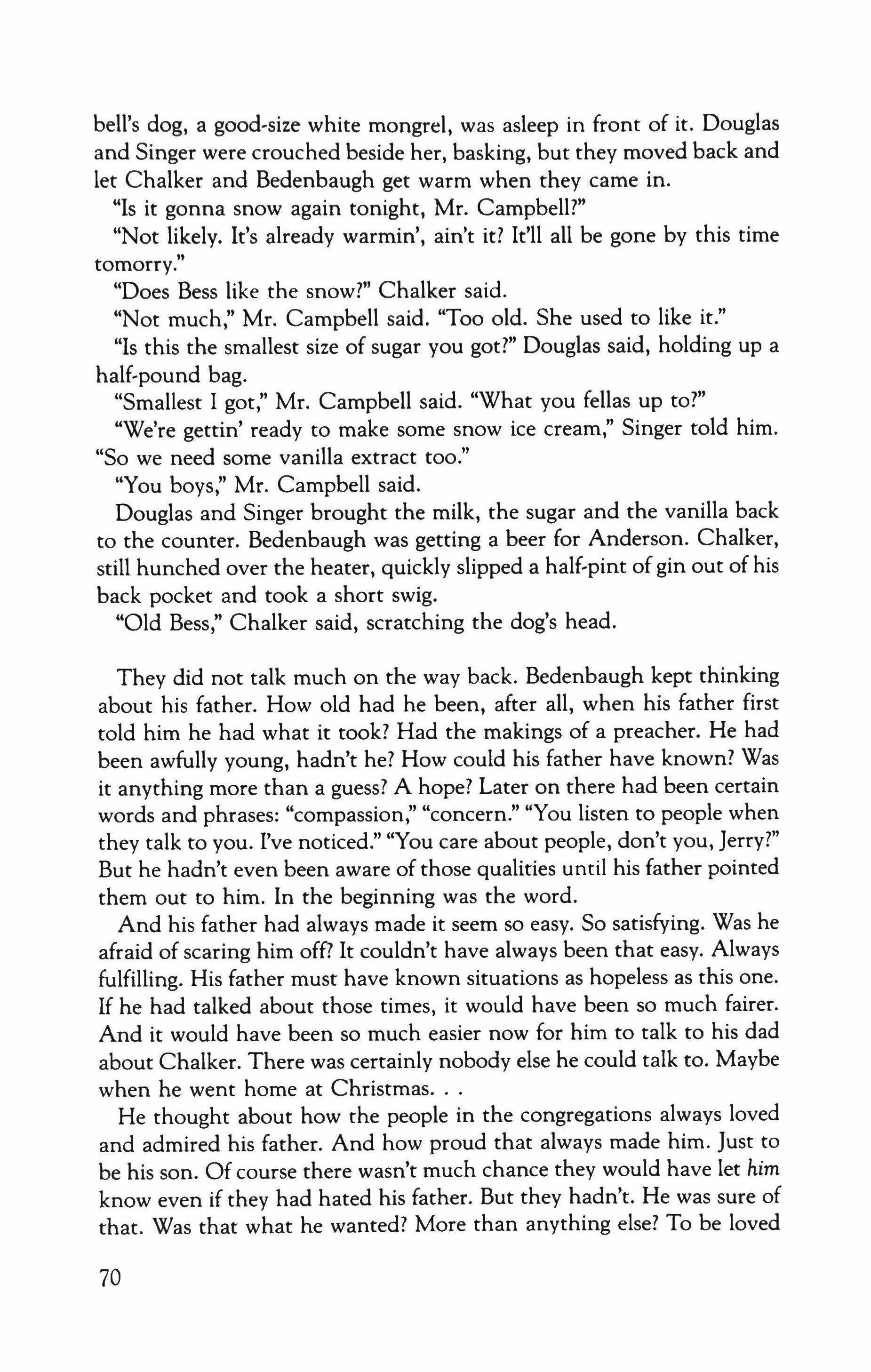
bell's dog, a good-size white mongrel, was asleep in front of it. Douglas and Singer were crouched beside her, basking, but they moved back and let Chalker and Bedenbaugh get warm when they came in.
"Is it gonna snow again tonight, Mr. Campbell?"
"Not likely. It's already warmin', ain't it? It'll all be gone by this time tomorry."
"Does Bess like the snow?" Chalker said.
"Not much," Mr. Campbell said. "Too old. She used to like it."
"Is this the smallest size of sugar you got?" Douglas said, holding up a half-pound bag.
"Smallest I got," Mr. Campbell said. "What you fellas up to?"
"We're gettin' ready to make some snow ice cream," Singer told him. "So we need some vanilla extract too."
"You boys," Mr. Campbell said.
Douglas and Singer brought the milk, the sugar and the vanilla back to the counter. Bedenbaugh was getting a beer for Anderson. Chalker, still hunched over the heater, quickly slipped a half-pint ofgin out of his back pocket and took a short swig.
"Old Bess," Chalker said, scratching the dog's head.
They did not talk much on the way back. Bedenbaugh kept thinking about his father. How old had he been, after all, when his father first told him he had what it took? Had the makings of a preacher. He had been awfully young, hadn't he? How could his father have known? Was it anything more than a guess? A hope? Later on there had been certain words and phrases: "compassion," "concern." "You listen to people when they talk to you. I've noticed." "You care about people, don't you, Jerry?" But he hadn't even been aware of those qualities until his father pointed them out to him. In the beginning was the word.
And his father had always made it seem so easy. So satisfying. Was he afraid of scaring him off? It couldn't have always been that easy. Always fulfilling. His father must have known situations as hopeless as this one. If he had talked about those times, it would have been so much fairer. And it would have been so much easier now for him to talk to his dad about Chalker. There was certainly nobody else he could talk to. Maybe when he went home at Christmas
He thought about how the people in the congregations always loved and admired his father. And how proud that always made him. Just to be his son. Of course there wasn't much chance they would have let him know even if they had hated his father. But they hadn't. He was sure of that. Was that what he wanted? More than anything else? To be loved
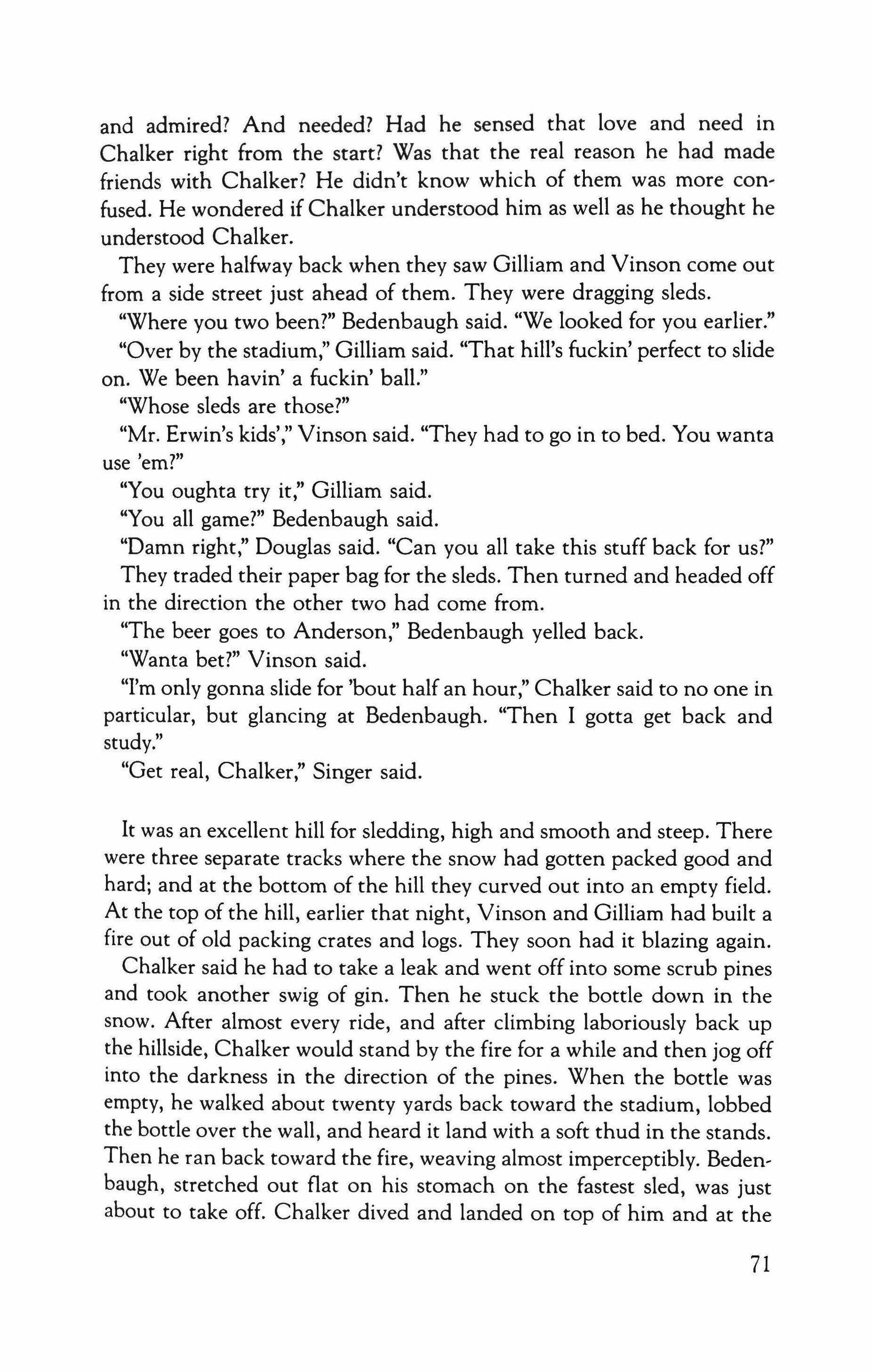
and admired? And needed? Had he sensed that love and need in Chalker right from the start? Was that the real reason he had made friends with Chalker? He didn't know which of them was more can' fused. He wondered if Chalker understood him as well as he thought he understood Chalker.
They were halfway back when they saw Gilliam and Vinson come out from a side street just ahead of them. They were dragging sleds.
"Where you two been?" Bedenbaugh said. "We looked for you earlier."
"Over by the stadium," Gilliam said. "That hill's fuckin' perfect to slide on. We been havin' a fuckin' ball."
"Whose sleds are those?"
"Mr. Erwin's kids'," Vinson said. "They had to go in to bed. You wanta use 'em?"
"You oughta try it," Gilliam said.
"You all game?" Bedenbaugh said.
"Damn right," Douglas said. "Can you all take this stuff back for us?"
They traded their paper bag for the sleds. Then turned and headed off in the direction the other two had come from.
"The beer goes to Anderson," Bedenbaugh yelled back.
"Wanta bet?" Vinson said.
"I'm only gonna slide for 'bout half an hour," Chalker said to no one in particular, but glancing at Bedenbaugh. "Then I gotta get back and study."
"Get real, Chalker," Singer said.
It was an excellent hill for sledding, high and smooth and steep. There were three separate tracks where the snow had gotten packed good and hard; and at the bottom of the hill they curved out into an empty field. At the top of the hill, earlier that night, Vinson and Gilliam had built a fire out of old packing crates and logs. They soon had it blazing again.
Chalker said he had to take a leak and went off into some scrub pines and took another swig of gin. Then he stuck the bottle down in the snow. After almost every ride, and after climbing laboriously back up the hillside, Chalker would stand by the fire for a while and then jog off into the darkness in the direction of the pines. When the bottle was empty, he walked about twenty yards back toward the stadium, lobbed the bottle over the wall, and heard it land with a soft thud in the stands. Then he ran back toward the fire, weaving almost imperceptibly. Bedenbaugh, stretched out flat on his stomach on the fastest sled, was just about to take off. Chalker dived and landed on top of him and at the

same instant pushed off hard with his left foot and they shot into the darkness.
"You bastard!" Bedenbaugh yelled. "Is that you, Chalker?"
"You O.K., Bo?" Chalker shouted. "I didn't mean to hurt you." Chalker felt extremely happy; the wind in his face was as good as the gin; they were floating. He was holding onto Bedenbaugh's shoulders, but near the bottom of the hill he turned loose and grabbed Bedenbaugh's hands and steered the sled off the center track to the right. The sled hit a sudden rise and left the ground; Chalker twisted and came down on his back, still sliding, and Bedenbaugh came down on top of him; the sled was in the air, but landed beyond them. Chalker felt the snow sift down his back.
"You O.K., Bo? I didn't hurt you, did I?"
"Don't do that again," Bedenbaugh said. Chalker could tell that he was angry.
They lay still for a minute. The voices at the top of the hill seemed as far away as the stars. Bedenbaugh could smell the gin on Chalker's breath.
"You know what time it is?" Bedenbaugh said.
"Study time," Chalker said.
"God."
"What time is it?"
"It's almost twelve-thirty."
"Jesus!" Chalker said. "No kiddin', Bo, I thought it was about tenthirty. Why didn't you tell me?"
"Why didn't I tell you. Why do I have to tell you everything?" He was on his feet now. "Look, dammit, just stop trying to make me feel guilty, Luke. I'm sick of feelin' responsible for you. I wish to God you could hear yourself. You sound like a six-year-old kid. When are you gonna grow up?" He turned and walked away along the bottom of the hill, in the direction of the campus.
Chalker was still sitting in the snow. "You go to hell," he yelled at Bedenbaugh's back. Then he got slowly to his feet and dragged the sled back up the hill. He stood beside the fire for several minutes, staring into the flames until his eyes watered. Then he headed for the pines. He was in the midst of them before he remembered that the gin was gone. He was thinking of Bo back at the dorm getting undressed standing in the shower. He thought of his smooth ivory-colored chest and back and the scattering of freckles across his shoulders. He could see the shape of his face, the line of his jaw. He knew that Bo had really only wanted to help him. But why the hell did he need so much help? Why did he have
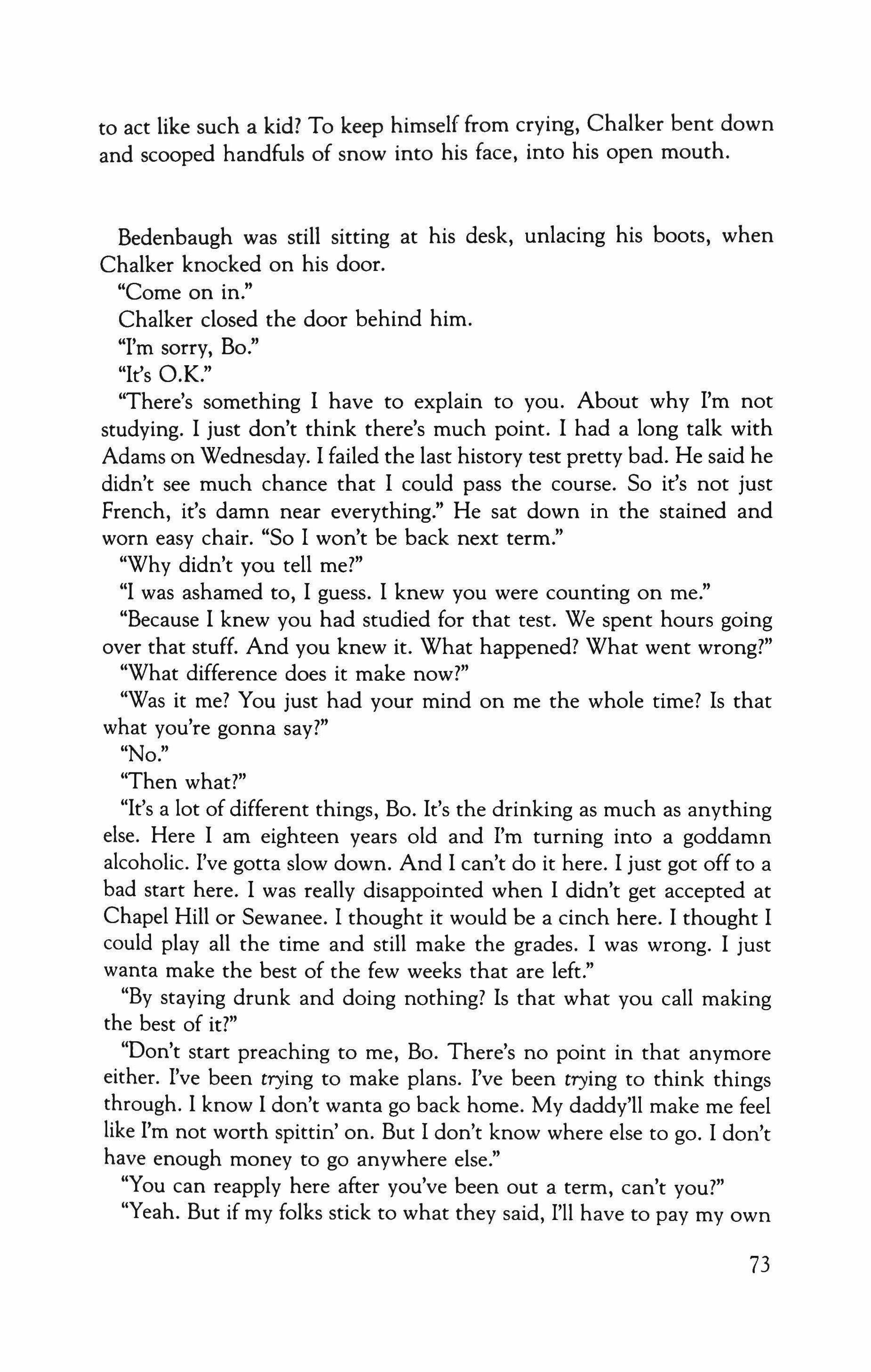
to act like such a kid? To keep himself from crying, Chalker bent down and scooped handfuls of snow into his face, into his open mouth.
Bedenbaugh was still sitting at his desk, unlacing his boots, when Chalker knocked on his door.
"Come on in."
Chalker closed the door behind him.
"I'm sorry, Bo."
"It's O.K."
"There's something I have to explain to you. About why I'm not studying. I just don't think there's much point. I had a long talk with Adams on Wednesday. I failed the last history test pretty bad. He said he didn't see much chance that I could pass the course. So it's not just French, it's damn near everything." He sat down in the stained and worn easy chair. "So I won't be back next term."
"Why didn't you tell me?"
"I was ashamed to, I guess. I knew you were counting on me."
"Because I knew you had studied for that test. We spent hours going over that stuff. And you knew it. What happened? What went wrong?"
"What difference does it make now?"
"Was it me? You just had your mind on me the whole time? Is that what you're gonna say?"
"No."
"Then what?"
"It's a lot of different things, Bo. It's the drinking as much as anything else. Here I am eighteen years old and I'm turning into a goddamn alcoholic. I've gotta slow down. And I can't do it here. I just got off to a bad start here. I was really disappointed when I didn't get accepted at Chapel Hill or Sewanee. I thought it would be a cinch here. I thought I could play all the time and still make the grades. I was wrong. I just wanta make the best of the few weeks that are left."
"By staying drunk and doing nothing? Is that what you call making the best of it?"
"Don't start preaching to me, Bo. There's no point in that anymore either. I've been trying to make plans. I've been trying to think things through. I know I don't wanta go back home. My daddy'll make me feel like I'm not worth spittin' on. But I don't know where else to go. I don't have enough money to go anywhere else."
"You can reapply here after you've been out a term, can't you?"
"Yeah. But if my folks stick to what they said, I'll have to pay my own
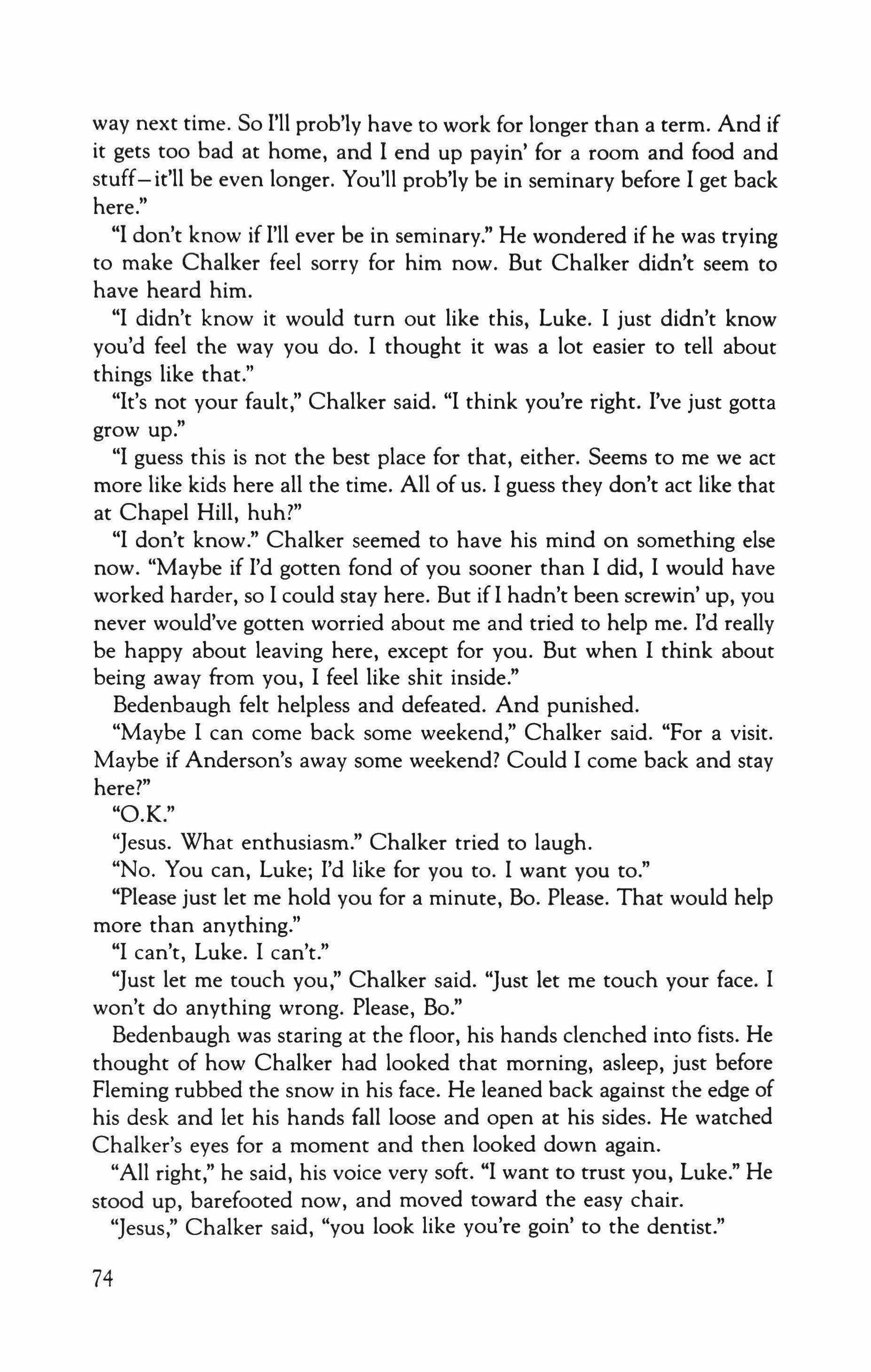
way next time. So I'll prob'ly have to work for longer than a term. And if it gets too bad at home, and I end up payin' for a room and food and stuff-it'll be even longer. You'll prob'ly be in seminary before I get back here."
"I don't know if I'll ever be in seminary." He wondered if he was trying to make Chalker feel sorry for him now. But Chalker didn't seem to have heard him.
"I didn't know it would turn out like this, Luke. I just didn't know you'd feel the way you do. I thought it was a lot easier to tell about things like that."
"It's not your fault," Chalker said. "I think you're right. I've just gotta grow up."
"I guess this is not the best place for that, either. Seems to me we act more like kids here all the time. All of us. I guess they don't act like that at Chapel Hill, huh?"
"I don't know." Chalker seemed to have his mind on something else now. "Maybe if I'd gotten fond of you sooner than I did, I would have worked harder, so I could stay here. But if I hadn't been screwin' up, you never would've gotten worried about me and tried to help me. I'd really be happy about leaving here, except for you. But when I think about being away from you, 1 feel like shit inside."
Bedenbaugh felt helpless and defeated. And punished.
"Maybe 1 can come back some weekend," Chalker said. "For a visit. Maybe if Anderson's away some weekend? Could I come back and stay here?"
"O.K."
"Jesus. What enthusiasm." Chalker tried to laugh.
"No. You can, Luke; I'd like for you to. I want you to."
"Please just let me hold you for a minute, Bo. Please. That would help more than anything."
"I can't, Luke. 1 can't."
"Just let me touch you," Chalker said. "Just let me touch your face. 1 won't do anything wrong. Please, Bo."
Bedenbaugh was staring at the floor, his hands clenched into fists. He thought of how Chalker had looked that morning, asleep, just before Fleming rubbed the snow in his face. He leaned back against the edge of his desk and let his hands fall loose and open at his sides. He watched Chalker's eyes for a moment and then looked down again.
"All right," he said, his voice very soft. "I want to trust you, Luke." He stood up, barefooted now, and moved toward the easy chair.
"Jesus," Chalker said, "you look like you're goin' to the dentist."

"Sorry," Bedenbaugh said, not smiling at all.
Chalker was standing now, too, and he reached out and put his cold hand against Bedenbaugh's handsome face, his thumb across Bedenbaugh's lips, his palm against his cheek, his fingers along his temple, touching his hair.
Chalker's face was so full of love and sadness and need that Bedenbaugh looked beyond him, at the cold black window. Chalker did not take his hand away for almost a minute, even though his hand and arm and body had begun to tremble. And when he started crying, Bedenbaugh put his arms around him and held him tight and told him not to cry.
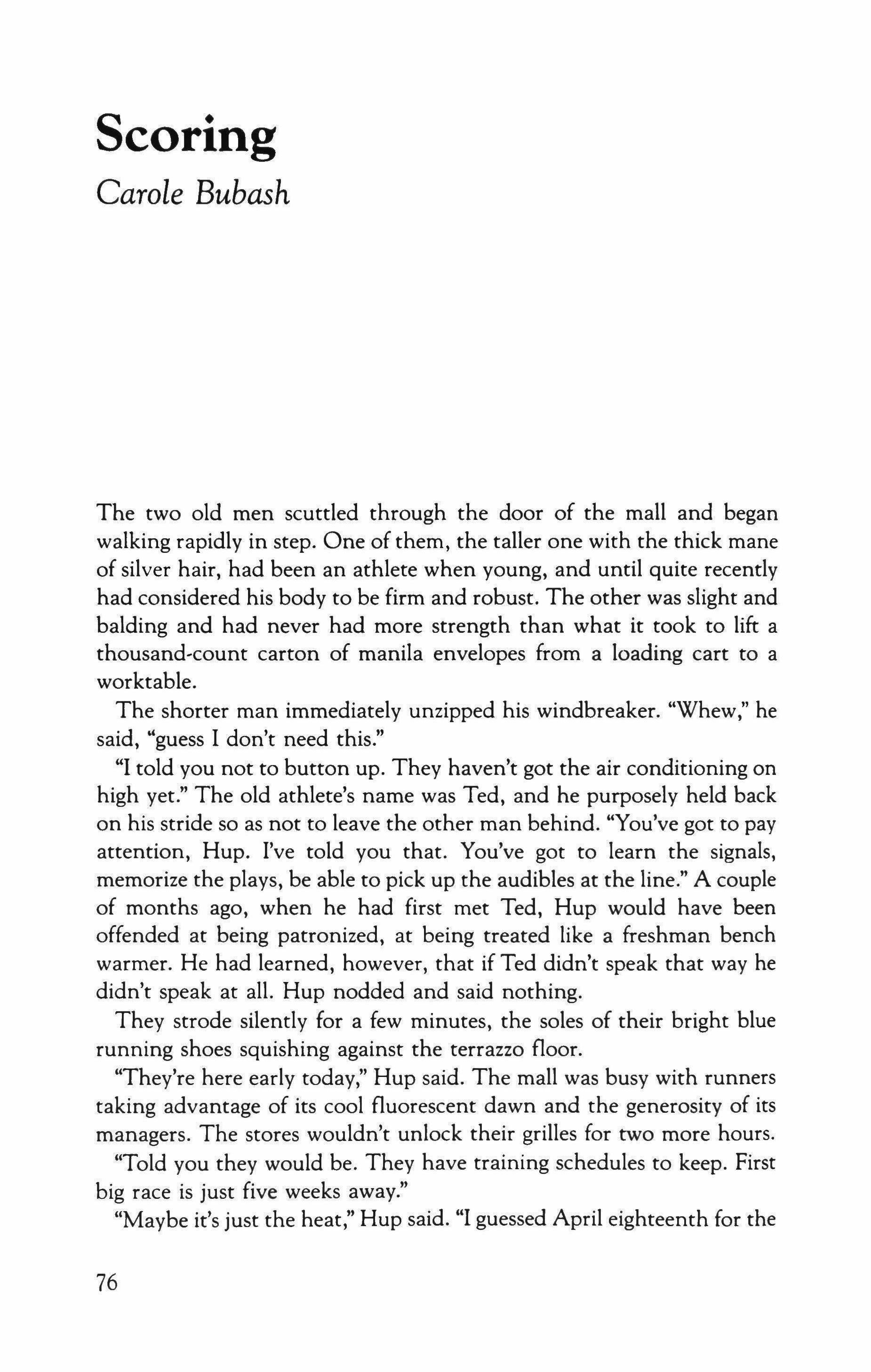
The two old men scuttled through the door of the mall and began walking rapidly in step. One of them, the taller one with the thick mane of silver hair, had been an athlete when young, and until quite recently had considered his body to be firm and robust. The other was slight and balding and had never had more strength than what it took to lift a thousand-count carton of manila envelopes from a loading cart to a worktable.
The shorter man immediately unzipped his windbreaker. "Whew," he said, "guess I don't need this."
"I told you not to button up. They haven't got the air conditioning on high yet." The old athlete's name was Ted, and he purposely held back on his stride so as not to leave the other man behind. "You've got to pay attention, Hup. I've told you that. You've got to learn the signals, memorize the plays, be able to pick up the audibles at the line." A couple of months ago, when he had first met Ted, Hup would have been offended at being patronized, at being treated like a freshman bench warmer. He had learned, however, that if Ted didn't speak that way he didn't speak at all. Hup nodded and said nothing.
They strode silently for a few minutes, the soles of their bright blue running shoes squishing against the terrazzo floor.
"They're here early today," Hup said. The mall was busy with runners taking advantage of its cool fluorescent dawn and the generosity of its managers. The stores wouldn't unlock their grilles for two more hours.
"Told you they would be. They have training schedules to keep. First big race is just five weeks away."
"Maybe it's just the heat," Hup said. "I guessed April eighteenth for the
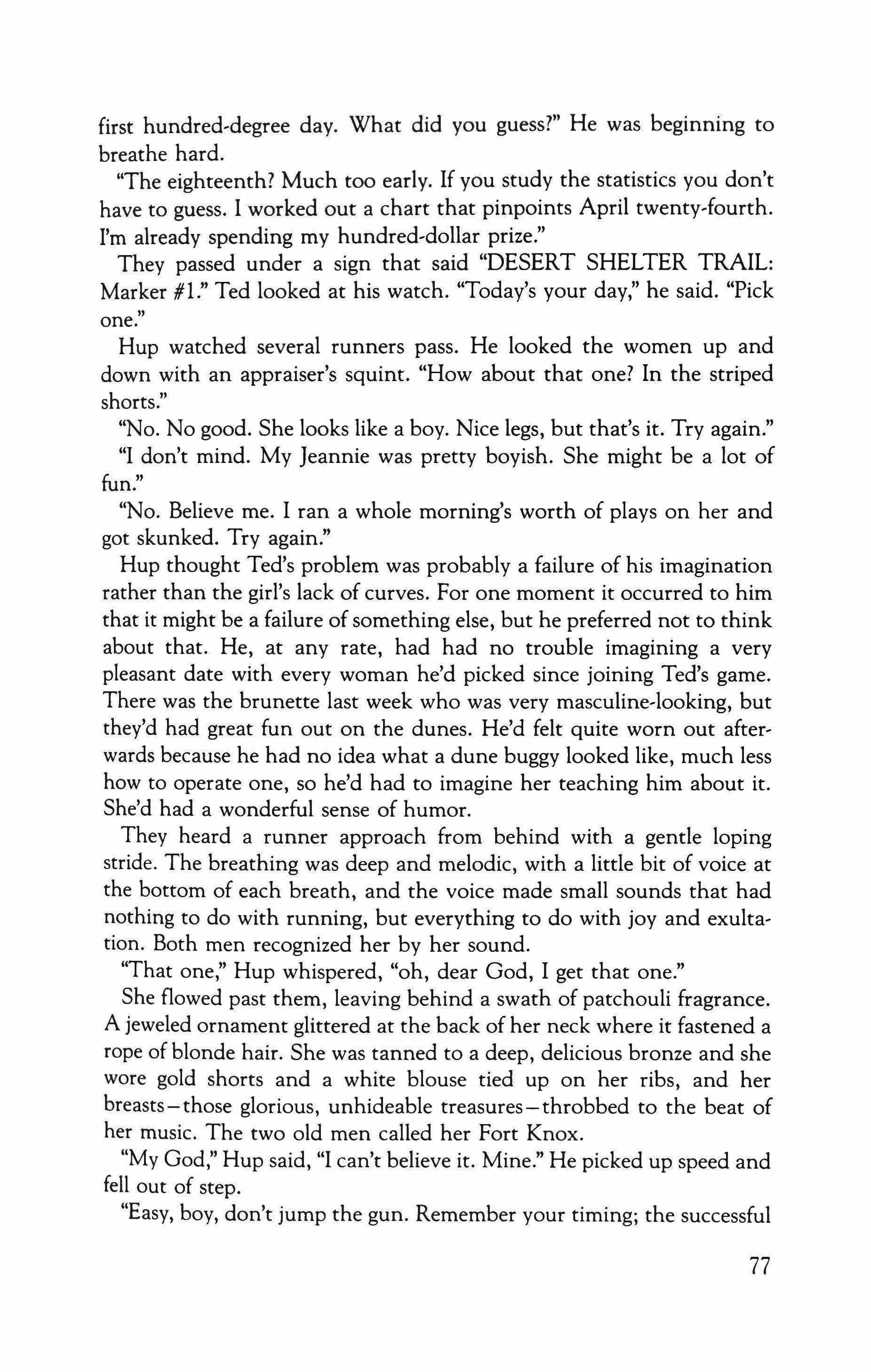
first hundred-degree day. What did you guess?" He was beginning to breathe hard.
"The eighteenth? Much too early. If you study the statistics you don't have to guess. 1 worked out a chart that pinpoints April twenty-fourth. I'm already spending my hundred-dollar prize."
They passed under a sign that said "DESERT SHELTER TRAIL: Marker #1." Ted looked at his watch. "Today's your day," he said. "Pick one.
Hup watched several runners pass. He looked the women up and down with an appraiser's squint. "How about that one? In the striped shorts."
"No. No good. She looks like a boy. Nice legs, but that's it. Try again."
"1 don't mind. My Jeannie was pretty boyish. She might be a lot of fun."
"No. Believe me. I ran a whole morning's worth of plays on her and got skunked. Try again."
Hup thought Ted's problem was probably a failure of his imagination rather than the girl's lack of curves. For one moment it occurred to him that it might be a failure of something else, but he preferred not to think about that. He, at any rate, had had no trouble imagining a very pleasant date with every woman he'd picked since joining Ted's game. There was the brunette last week who was very masculine-looking, but they'd had great fun out on the dunes. He'd felt quite worn out afterwards because he had no idea what a dune buggy looked like, much less how to operate one, so he'd had to imagine her teaching him about it. She'd had a wonderful sense of humor.
They heard a runner approach from behind with a gentle loping stride. The breathing was deep and melodic, with a little bit of voice at the bottom of each breath, and the voice made small sounds that had nothing to do with running, but everything to do with joy and exultation. Both men recognized her by her sound.
"That one," Hup whispered, "oh, dear God, I get that one."
She flowed past them, leaving behind a swath of patchouli fragrance. A jeweled ornament glittered at the back of her neck where it fastened a rope of blonde hair. She was tanned to a deep, delicious bronze and she wore gold shorts and a white blouse tied up on her ribs, and her breasts-those glorious, unhideable treasures-throbbed to the beat of her music. The two old men called her Fort Knox.
"My God," Hup said, "I can't believe it. Mine." He picked up speed and fell out of step.
"Easy, boy, don't jump the gun. Remember your timing; the successful
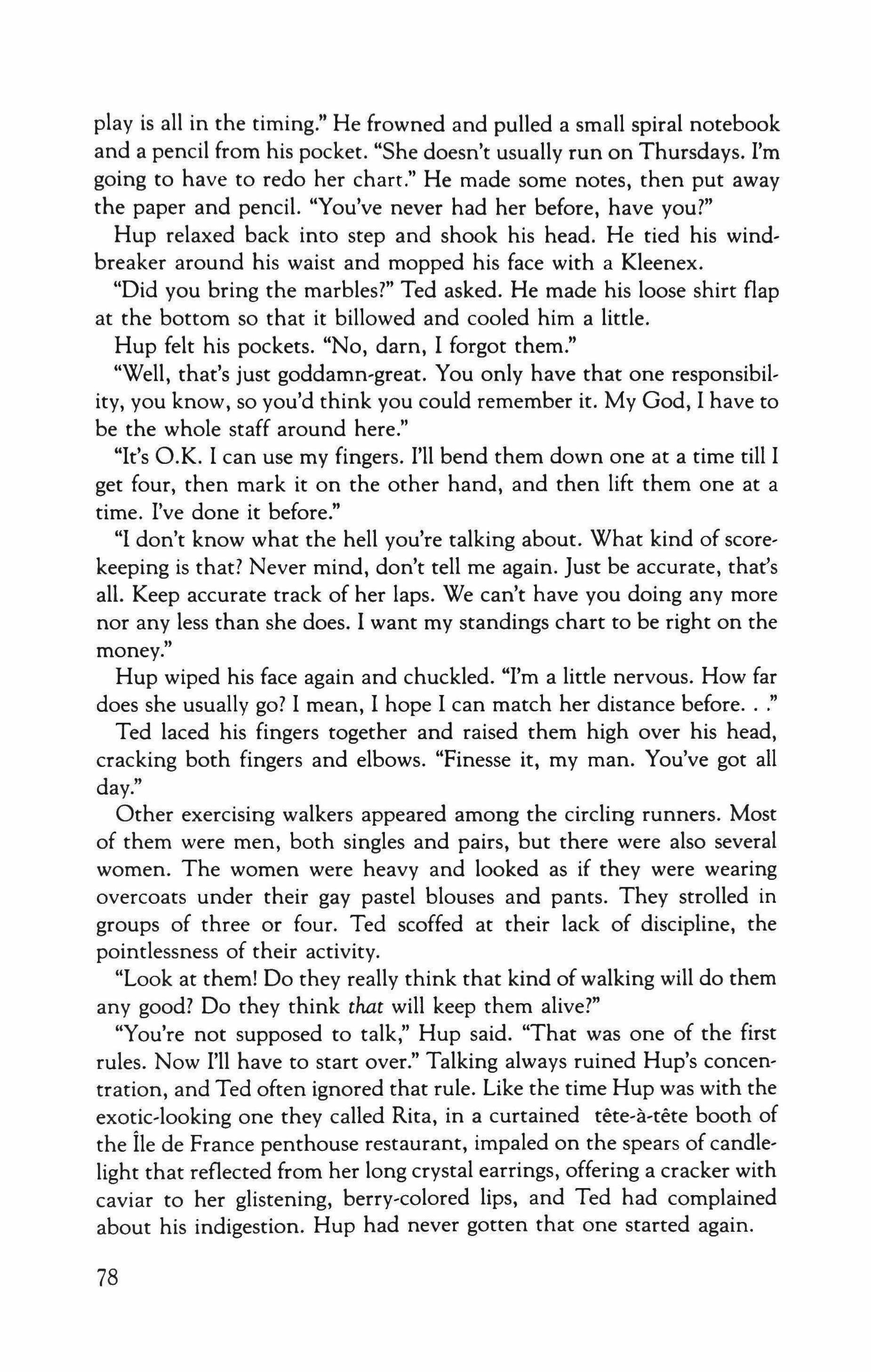
play is all in the timing." He frowned and pulled a small spiral notebook and a pencil from his pocket. "She doesn't usually run on Thursdays. I'm going to have to redo her chart." He made some notes, then put away the paper and pencil. "You've never had her before, have you?"
Hup relaxed back into step and shook his head. He tied his windbreaker around his waist and mopped his face with a Kleenex.
"Did you bring the marbles?" Ted asked. He made his loose shirt flap at the bottom so that it billowed and cooled him a little.
Hup felt his pockets. "No, darn, I forgot them."
"Well, that's just goddamn-great, You only have that one responsibility, you know, so you'd think you could remember it. My God, I have to be the whole staff around here."
"It's O.K. 1 can use my fingers. I'll bend them down one at a time till I get four, then mark it on the other hand, and then lift them one at a time. I've done it before."
"I don't know what the hell you're talking about. What kind of scorekeeping is that? Never mind, don't tell me again. Just be accurate, that's all. Keep accurate track of her laps. We can't have you doing any more nor any less than she does. I want my standings chart to be right on the money."
Hup wiped his face again and chuckled. "I'm a little nervous. How far does she usually go? 1 mean, I hope 1 can match her distance before Ted laced his fingers together and raised them high over his head, cracking both fingers and elbows. "Finesse it, my man. You've got all day."
Other exercising walkers appeared among the circling runners. Most of them were men, both singles and pairs, but there were also several women. The women were heavy and looked as if they were wearing overcoats under their gay pastel blouses and pants. They strolled in groups of three or four. Ted scoffed at their lack of discipline, the pointlessness of their activity.
"Look at them! Do they really think that kind of walking will do them any good? Do they think that will keep them alive?"
"You're not supposed to talk," Hup said. "That was one of the first rules. Now I'll have to start over." Talking always ruined Hup's concentration, and Ted often ignored that rule. Like the time Hup was with the exotic-looking one they called Rita, in a curtained tete-a-tete booth of the he de France penthouse restaurant, impaled on the spears of candlelight that reflected from her long crystal earrings, offering a cracker with caviar to her glistening, berry-colored lips, and Ted had complained about his indigestion. Hup had never gotten that one started again.

"Oh, for Christ's sake," Ted snorted. He moved ahead to catch up with another gray-haired man who had just begun his session. Ted made a great show of looking at his watch and flapping his damp shirt. Then he hopped into step and the two of them strode away.
Hup pinched his mouth sideways and shook his head. "You're just jealous," he said so that only he could hear. He rubbed his temples and put himself back on Fort Knox's front porch, just ringing the bell. The building was run-down, with lots of peeling paint and chipped stucco and sort of a general sag to it, but he could see enough of the original lines and flourishes to know that it had been a real showpiece when it was new.
When she opened the door her fragrance transported his senses so that he went inside without realizing it and by the time his head had cleared and his eyes had accomodated to the romantically dim light, she had disappeared through a bead curtain. He stood looking at a print of a woman in a velvet gown reclining on a divan guarded by a huge black panther, and then she was returning with tall amber drinks, the ice playing her rhythm and the glasses beginning to sweat.
He took a sip. "Very nice," he said, swallowing the mellow old Scotch slowly, savoring the heat that infused his extremities. She folded herself onto a lavishly pillowed sofa and ran her finger through the wet pearls coating her glass. "Fantastic decorating," he said. "You do it yourself?"
On his eighth lap, Hup saw Ted sitting at the blood-pressure booth, first in line as usual. Fort Knox was doing so many laps that he'd had to scoop a handful of bark chips out of a planter in order to keep count. Each lap was worth an hour of date-time; he hoped she could go a full twenty-four. He transferred a chip from his left to his right pocket each time she passed under the number-one marker. She was easier to keep track of than anyone he'd ever had because she seemed to glow, to light up a little space wherever she was in the half-lit mall. It pleased him to think of her as iridescent, like Cinderella when her fairy godmother touched her, but he guessed that Ted would call him an idiot if he mentioned it.
Hup walked slower alone, and he usually felt guilty about it. Today, however, he was glad to stretch the time out. He and Fort Knox were having a wonderful time. When she quit after sixteen laps, he began to miss her immediately, and he constructed the remaining hours of their date with consummate detail as he walked his matching sixteen.
Ted was on a bench near the blood-pressure booth, looking annoyed. "Well, well, look who's here. The playboy of the western world. Do you
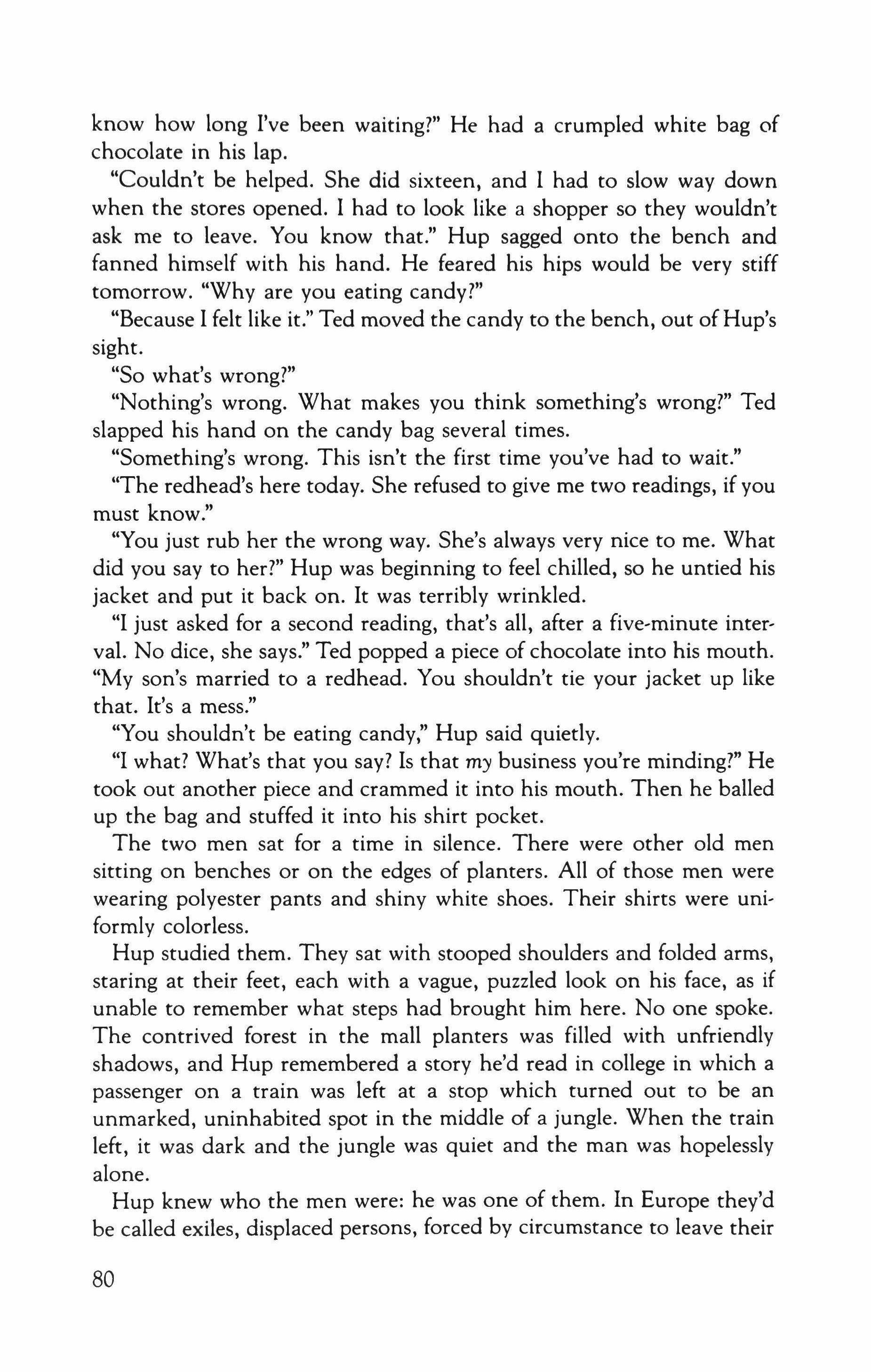
know how long I've been waiting?" He had a crumpled white bag of chocolate in his lap.
"Couldn't be helped. She did sixteen, and I had to slow way down when the stores opened. I had to look like a shopper so they wouldn't ask me to leave. You know that." Hup sagged onto the bench and fanned himself with his hand. He feared his hips would be very stiff tomorrow. "Why are you eating candy?"
"Because I felt like it." Ted moved the candy to the bench, out of Hup's sight.
"So what's wrong?"
"Nothing's wrong. What makes you think something's wrong?" Ted slapped his hand on the candy bag several times.
"Something's wrong. This isn't the first time you've had to wait."
"The redhead's here today. She refused to give me two readings, if you must know."
"You just rub her the wrong way. She's always very nice to me. What did you say to her?" Hup was beginning to feel chilled, so he untied his jacket and put it back on. It was terribly wrinkled.
"I just asked for a second reading, that's all, after a five-minute inter' val. No dice, she says." Ted popped a piece of chocolate into his mouth. "My son's married to a redhead. You shouldn't tie your jacket up like that. It's a mess."
"You shouldn't be eating candy," Hup said quietly.
"I what? What's that you say? Is that my business you're minding?" He took out another piece and crammed it into his mouth. Then he balled up the bag and stuffed it into his shirt pocket.
The two men sat for a time in silence. There were other old men sitting on benches or on the edges of planters. All of those men were wearing polyester pants and shiny white shoes. Their shirts were uniformly colorless.
Hup studied them. They sat with stooped shoulders and folded arms, staring at their feet, each with a vague, puzzled look on his face, as if unable to remember what steps had brought him here. No one spoke. The contrived forest in the mall planters was filled with unfriendly shadows, and Hup remembered a story he'd read in college in which a passenger on a train was left at a stop which turned out to be an unmarked, uninhabited spot in the middle of a jungle. When the train left, it was dark and the jungle was quiet and the man was hopelessly alone.
Hup knew who the men were: he was one of them. In Europe they'd be called exiles, displaced persons, forced by circumstance to leave their

homes. Here they were called retirees, and they had moved by choice. Hup knew, too, what the men were doing: they were waiting for their wives to shop. He recognized the posture. If he strained he thought he could hear the screech-screech of hangers on racks as the women flicked through blouse after blouse, only to settle on yet another flowered print.
"Well, where did you take her?" Ted asked.
"What? Who?"
"Come to the party, Hup. Where'd you take Fort Knox?"
"Oh. To the zoo."
"The zoo, for chrissake. Couldn't you do better than that? I took her dining and dancing last month."
"It was the San Diego Zoo, which happens to be one of my favorite places."
"That's out of bounds, Huppie old boy. I'm going to have to penalize you."
"I don't think so. She happens to be very fond of zoos, and she's always wanted to go to San Diego. Besides, she gave us plenty of time with her sixteen laps."
"How'd you get there?"
"Plane. We stopped in Yuma for breakfast. She had an omelette, I had-"
"Never mind. Did you rent a car in San Diego? You know your bill for this one is going to be pretty high."
"Yes, we rented a car, did a little sightseeing through Old Town and Mission Hills. Then at the zoo we caught a tour bus that had no one else on it."
"Points?"
"Give me three."
Ted raised his eyebrows. "Not bad for an amateur."
"After the tour we went to the Asian Forest. Hardly anyone goes there because it's dark and chilly. I had a cashmere cardigan that I let her wear. We stayed in there for quite a while."
"Points?"
Hup was silent, looking at his hands folded in his lap. He leaned forward and let them hang between his knees. "I'd rather not say."
"C'mon, c'mon, why play if we don't keep score?"
Hup cleared his throat. "O.K." He paused again. "Seven."
"Seven! You old dog! Seven! Touchdown and point after-wow! Want to tell me about it?" Ted reached over and punched Hup's shoulder.
"No. I don't want to. And keep your voice down."
"Hey, c'mon, share and share alike. How'd you run the play?"
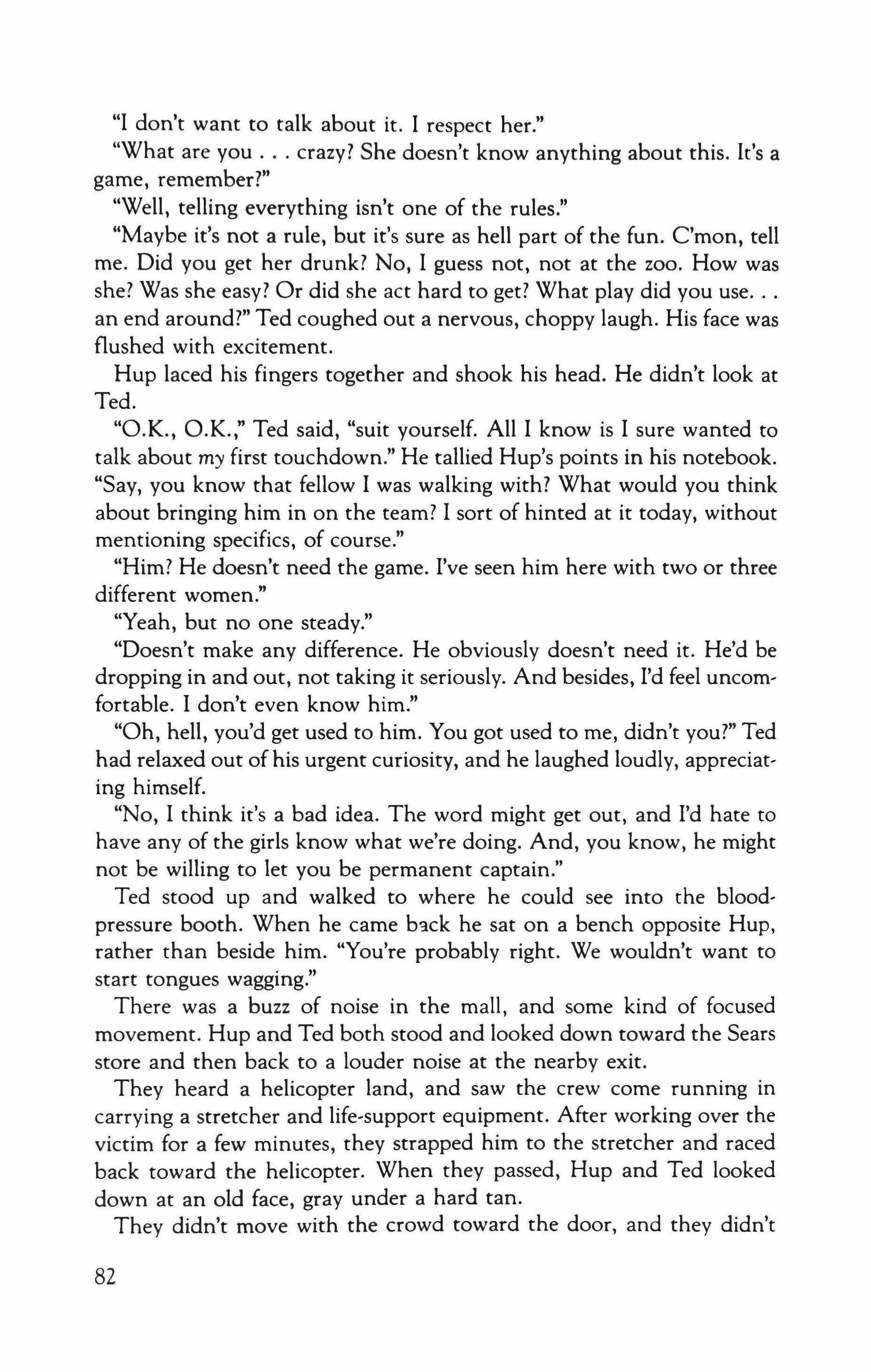
"I don't want to talk about it. I respect her."
"What are you crazy? She doesn't know anything about this. It's a game, remember?"
"Well, telling everything isn't one of the rules."
"Maybe it's not a rule, but it's sure as hell part of the fun. C'mon, tell me. Did you get her drunk? No, I guess not, not at the zoo. How was she? Was she easy? Or did she act hard to get? What play did you use an end around?" Ted coughed out a nervous, choppy laugh. His face was flushed with excitement.
Hup laced his fingers together and shook his head. He didn't look at Ted.
"O.K., O.K.," Ted said, "suit yourself. AliI know is I sure wanted to talk about my first touchdown." He tallied Hup's points in his notebook. "Say, you know that fellow I was walking with? What would you think about bringing him in on the team? I sort of hinted at it today, without mentioning specifics, of course."
"Him? He doesn't need the game. I've seen him here with two or three different women."
"Yeah, but no one steady."
"Doesn't make any difference. He obviously doesn't need it. He'd be dropping in and out, not taking it seriously. And besides, I'd feel uncomfortable. I don't even know him."
"Oh, hell, you'd get used to him. You got used to me, didn't you?" Ted had relaxed out of his urgent curiosity, and he laughed loudly, appreciating himself.
"No, I think it's a bad idea. The word might get out, and I'd hate to have any of the girls know what we're doing. And, you know, he might not be willing to let you be permanent captain."
Ted stood up and walked to where he could see into the blood, pressure booth. When he came back he sat on a bench opposite Hup, rather than beside him. "You're probably right. We wouldn't want to start tongues wagging."
There was a buzz of noise in the mall, and some kind of focused movement. Hup and Ted both stood and looked down toward the Sears store and then back to a louder noise at the nearby exit.
They heard a helicopter land, and saw the crew come running in carrying a stretcher and life-support equipment. After working over the victim for a few minutes, they strapped him to the stretcher and raced back toward the helicopter. When they passed, Hup and Ted looked down at an old face, gray under a hard tan.
They didn't move with the crowd toward the door, and they didn't
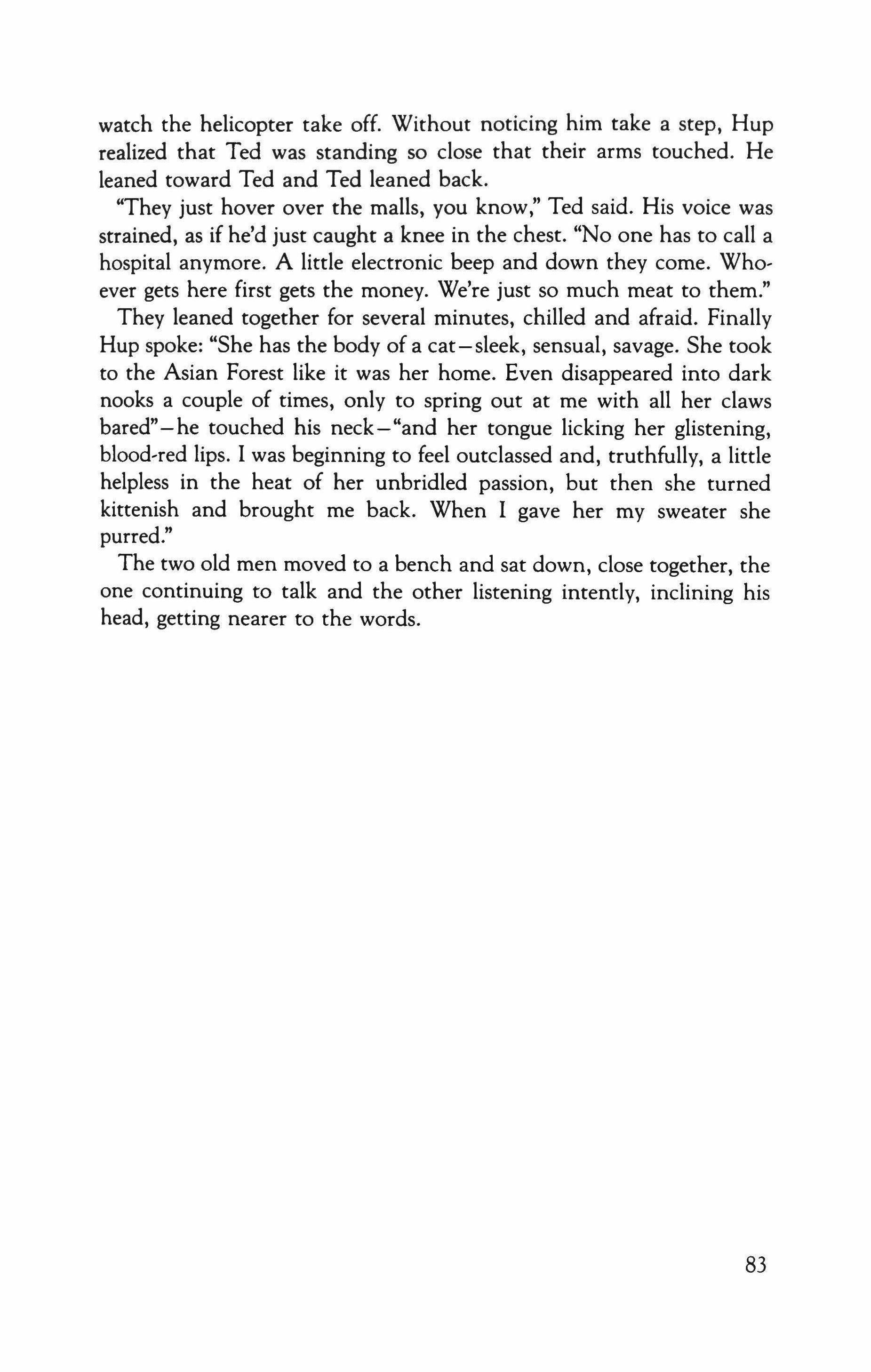
watch the helicopter take off. Without noticing him take a step, Hup realized that Ted was standing so close that their arms touched. He leaned toward Ted and Ted leaned back.
"They just hover over the malls, you know," Ted said. His voice was strained, as if he'd just caught a knee in the chest. "No one has to call a hospital anymore. A little electronic beep and down they come. Whoever gets here first gets the money. We're just so much meat to them."
They leaned together for several minutes, chilled and afraid. Finally Hup spoke: "She has the body of a cat-sleek, sensual, savage. She took to the Asian Forest like it was her home. Even disappeared into dark nooks a couple of times, only to spring out at me with all her claws bared" - he touched his neck - "and her tongue licking her glistening, blood-red lips. I was beginning to feel outclassed and, truthfully, a little helpless in the heat of her unbridled passion, but then she turned kittenish and brought me back. When I gave her my sweater she purred."
The two old men moved to a bench and sat down, close together, the one continuing to talk and the other listening intently, inclining his head, getting nearer to the words.

You've combed yourself carefully, Your Honor, with a small fine-toothed comb You then cleverly concealed Before making your entrance In the splendor of your black robe.
The comb tucked inside a handkerchief Scented with extract of dead rosesWhile you took your high seat Sternly eyeing each of the accused In the hush of the empty courtroom.
The dark curly hairs in the comb Did not come from your graying head. One of the cleaning women used it on herself While you dozed off in your chamber Half-undressed because of the heat.
The black comb in the pocket over the heart, You feel it tremble just as ours do When they ready themselves to make music Lacking only the paper you're signing, By the looks of it with eyes closed.
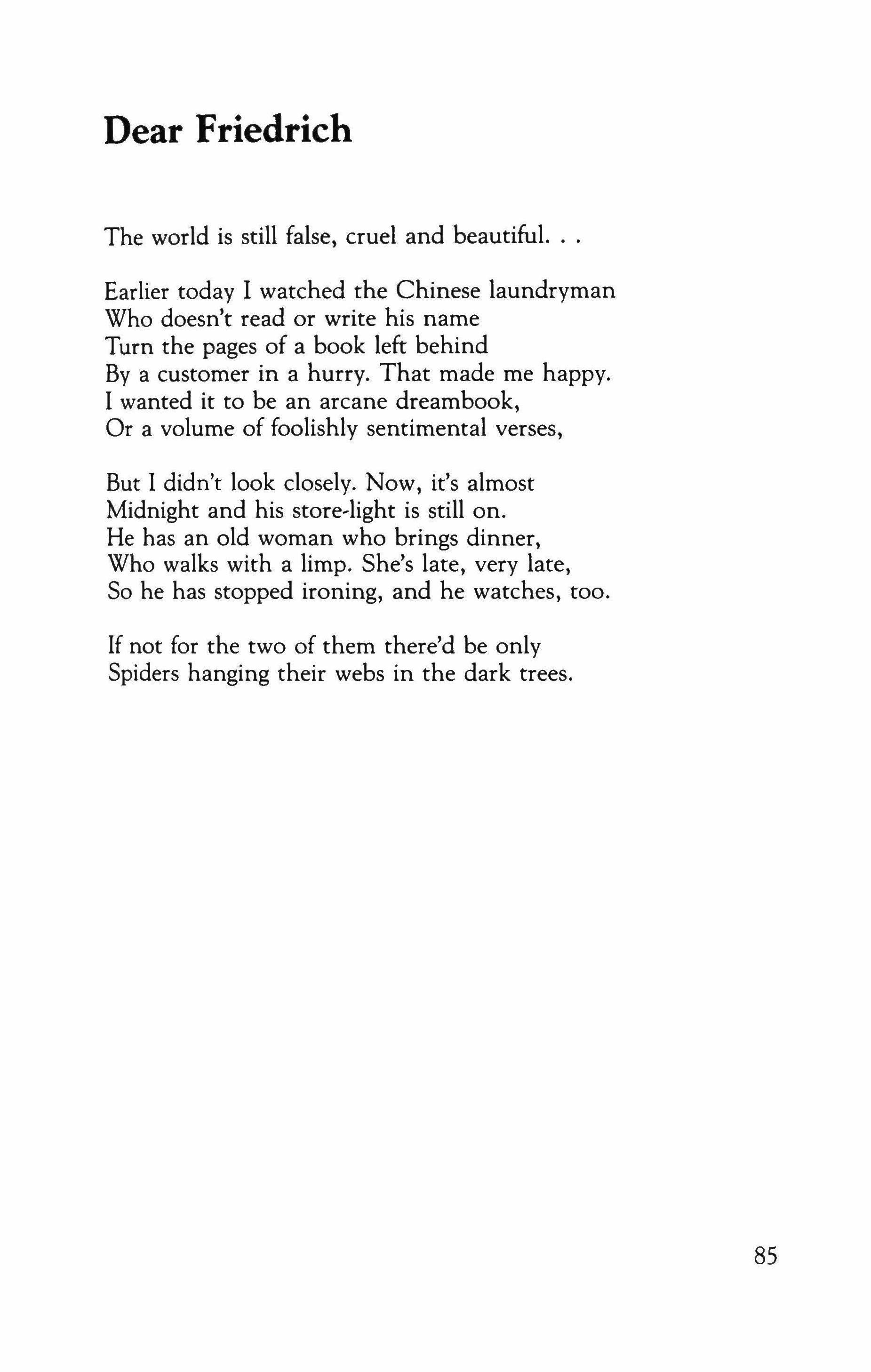
The world is still false, cruel and beautiful.
Earlier today I watched the Chinese laundryman Who doesn't read or write his name Turn the pages of a book left behind By a customer in a hurry. That made me happy. I wanted it to be an arcane dreambook, Or a volume of foolishly sentimental verses,
But I didn't look closely. Now, it's almost Midnight and his store-light is still on. He has an old woman who brings dinner, Who walks with a limp. She's late, very late, So he has stopped ironing, and he watches, too.
If not for the two of them there'd be only Spiders hanging their webs in the dark trees.
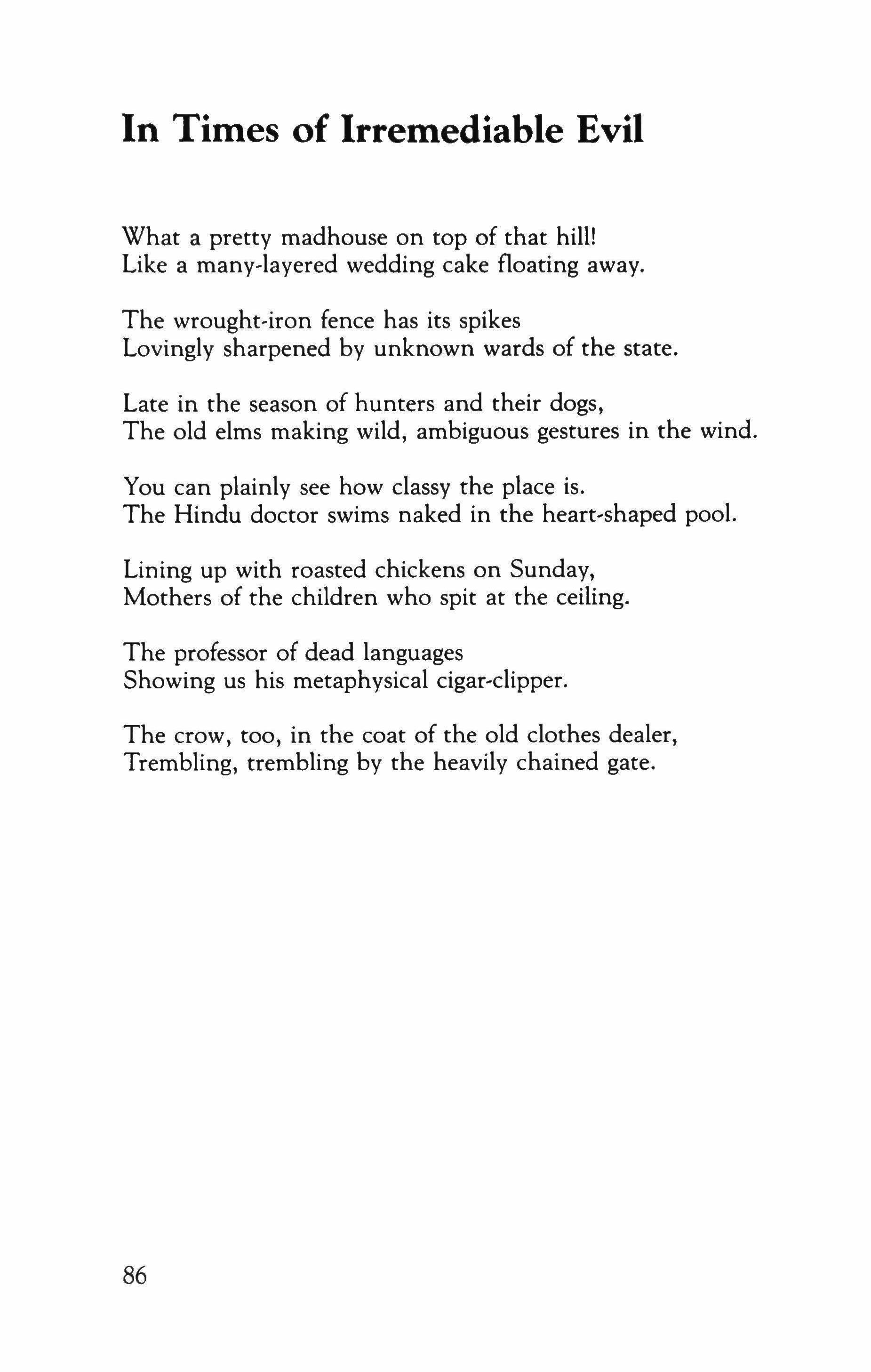
What a pretty madhouse on top of that hill!
Like a manv-layered wedding cake floating away.
The wrought-iron fence has its spikes
Lovingly sharpened by unknown wards of the state.
Late in the season of hunters and their dogs, The old elms making wild, ambiguous gestures in the wind.
You can plainly see how classy the place is. The Hindu doctor swims naked in the heart-shaped pool.
Lining up with roasted chickens on Sunday, Mothers of the children who spit at the ceiling.
The professor of dead languages
Showing us his metaphysical cigar-clipper.
The crow, too, in the coat of the old clothes dealer, Trembling, trembling by the heavily chained gate.

A cat and a mouse were lapping milk
From the same saucer
For the benefit of the lunch-hour crowd.
The owner of the pair
Had a tucked sleeve in place of right arm, And no teeth despite his youth.
He kept smiling and bowing deeply In the manner of a servant Of a haughty and severe master.

While the person at the podium speaks the hands of the audience lift to touch chins, lips, the undersides of the nose. Fingers thus lie across mouths as if to stifle a shriek of boredom, or some comment on the words being ceaselessly launched into the air. Perhaps the hands want to bar the words from entering the body. Yet sounds do not enter through the face but through our ears.
As the voice continues bodies begin to slump in their seats as if pressed by an invisible force of custom or obligation. Or they sag because despite these hands the words find their way inside and settle, dragging us down.

During the 1950's, we believed the world's supply of "A"s was inexhaustible. If a student satisfactorily completed - the argument wenteverything asked of her or him that was worth an "N'. Wasn't this the utmost requested of the student, so didn't they deserve the highest grade?
But a few people foresaw difficulties. From time to time a journalist or educational theoretician or mining engineer warned in Reader's Digest or at a PTA meeting that this practice courted disaster, that we really didn't know enough about proven reserves of the letter. And as the Earth's available stock of "N's finally was understood to be limited our attitudes changed.
Yet there is no agreement on how to cope with the problem. The government maintains imports should be controlled while lessening domestic use. Some observers counter, however, the international shortfall is artificial, designed to increase the power of those who govern the supply. They speak of boatloads of "N's deliberately kept offshore. Other experts think the government's program is good, as it reduces people's dependence on external vicissitudes while encouraging self-reliance. But different commentators declare the wealthy can always obtain "N's

while the majority suffer. Others state the restrictions on this grade will help the battle against inflation.
Despite the controversy various stopgap measures have been introduced. Besides the cancellation of delivery of "A"s to arbitrary areas -for example, classes that meet between eight and nine a.m., the bell curve scheme has been widely adopted. Here, a sort of Procrustean graph is lowered onto the pages of a mark-book ensuring only a minimum of precious"A"s need to be released.
Long-term solutions? Certain educators are confident technology will provide the answer. Then there are terrorists who say they hope a system without "A"s will create a climate for not having "B"s and eventually for eliminating grades completely. In any case, the best estimates of the planet's "A" resources are greater than was recently thought though definitely finite. So it doesn't appear we will escape shortages and rationing. But we do have many years to solve our dilemma before the world's last"N' in China or someplace flows out of somebody's marking pen.
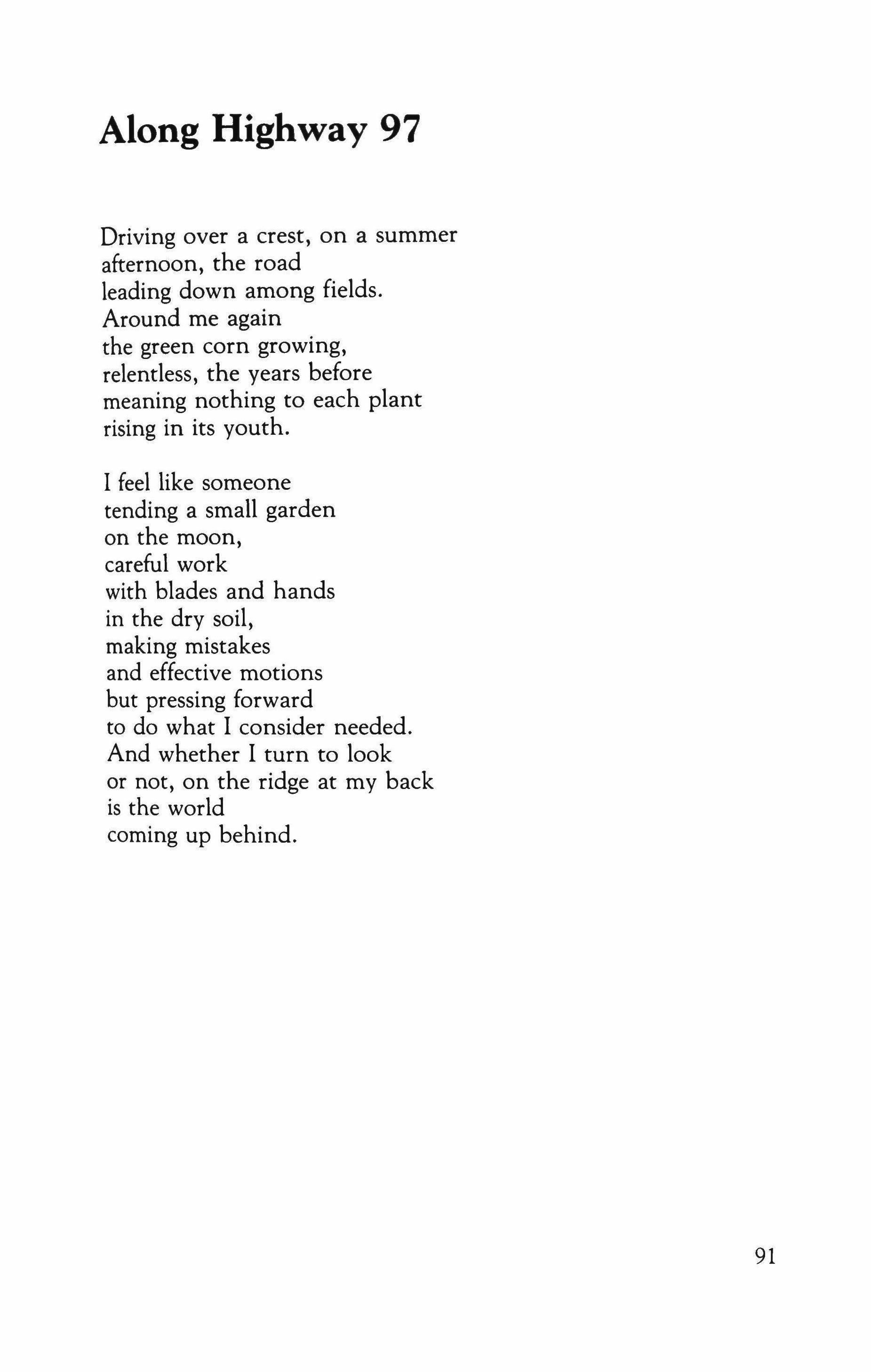
Driving over a crest, on a summer afternoon, the road leading down among fields. Around me again the green corn growing, relentless, the years before meaning nothing to each plant rising in its youth.
I feel like someone tending a small garden on the moon, careful work with blades and hands in the dry soil, making mistakes and effective motions but pressing forward to do what I consider needed. And whether I turn to look or not, on the ridge at my back is the world coming up behind.
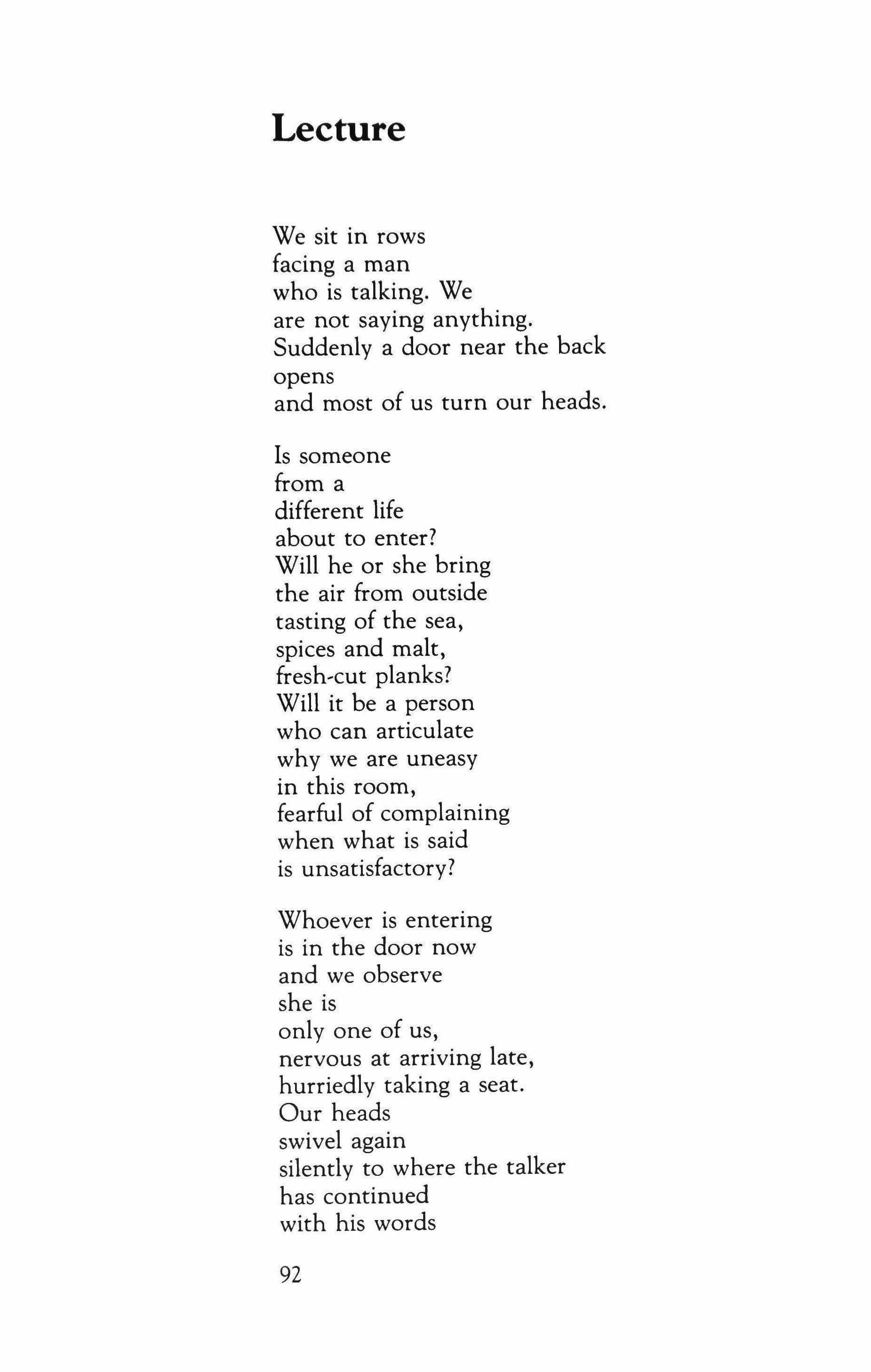
We sit in rows facing a man who is talking. We are not saying anything. Suddenly a door near the back opens and most of us turn our heads.
Is someone from a different life about to enter?
Will he or she bring the air from outside tasting of the sea, spices and malt, fresh-cut planks? Will it be a person who can articulate why we are uneasy in this room, fearful of complaining when what is said is unsatisfactory?
Whoever is entering is in the door now and we observe she is only one of us, nervous at arriving late, hurriedly taking a seat. Our heads swivel again silently to where the talker has continued with his words
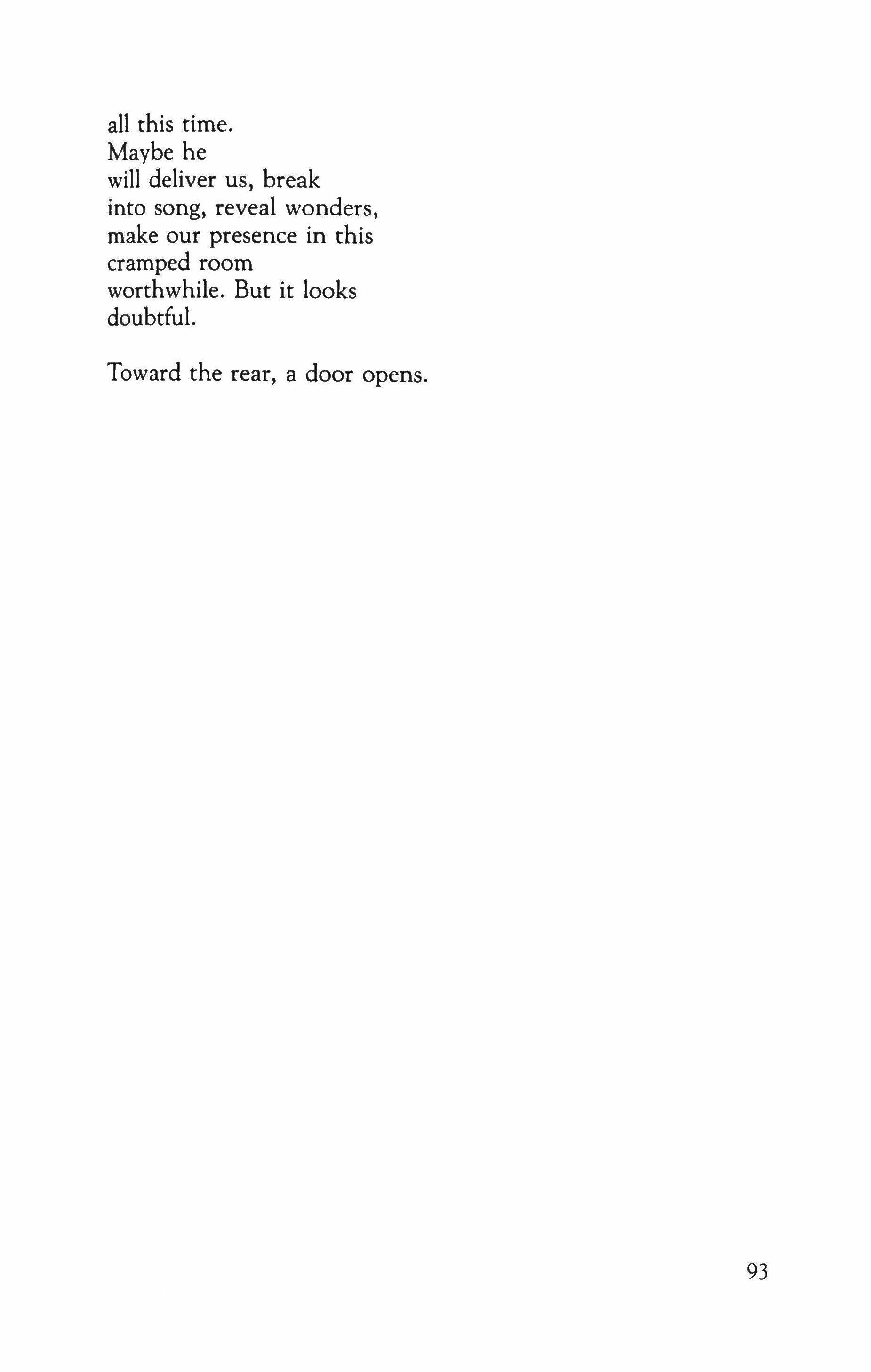
all this time. Maybe he will deliver us, break into song, reveal wonders, make our presence in this cramped room worthwhile. But it looks doubtful.
Toward the rear, a door opens.
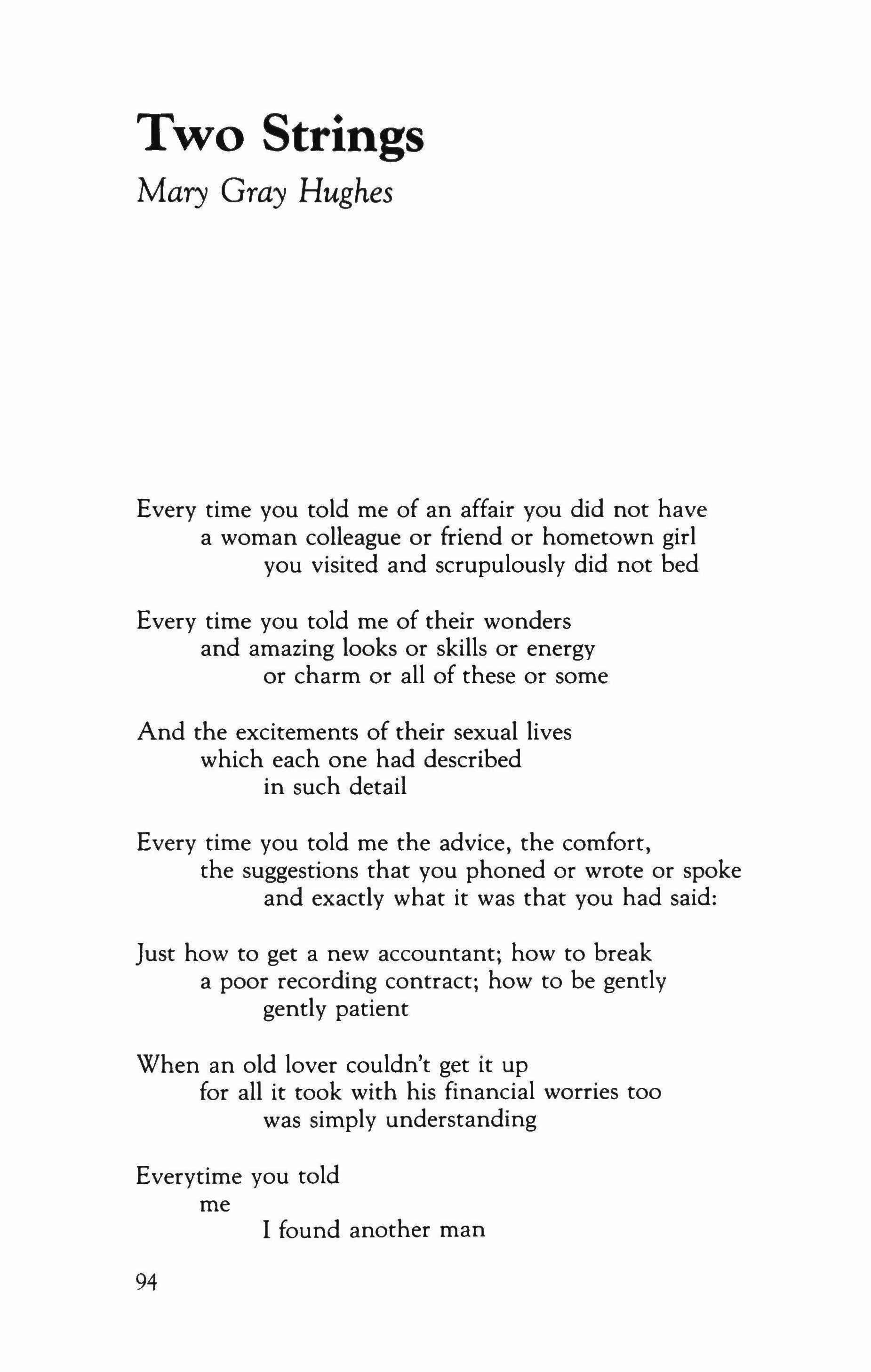
Every time you told me of an affair you did not have a woman colleague or friend or hometown girl you visited and scrupulously did not bed
Every time you told me of their wonders and amazing looks or skills or energy or charm or all of these or some
And the excitements of their sexual lives which each one had described in such detail
Every time you told me the advice, the comfort, the suggestions that you phoned or wrote or spoke and exactly what it was that you had said:
Just how to get a new accountant; how to break a poor recording contract; how to be gently gently patient
When an old lover couldn't get it up for all it took with his financial worries too was simply understanding
Everytime you told me I found another man
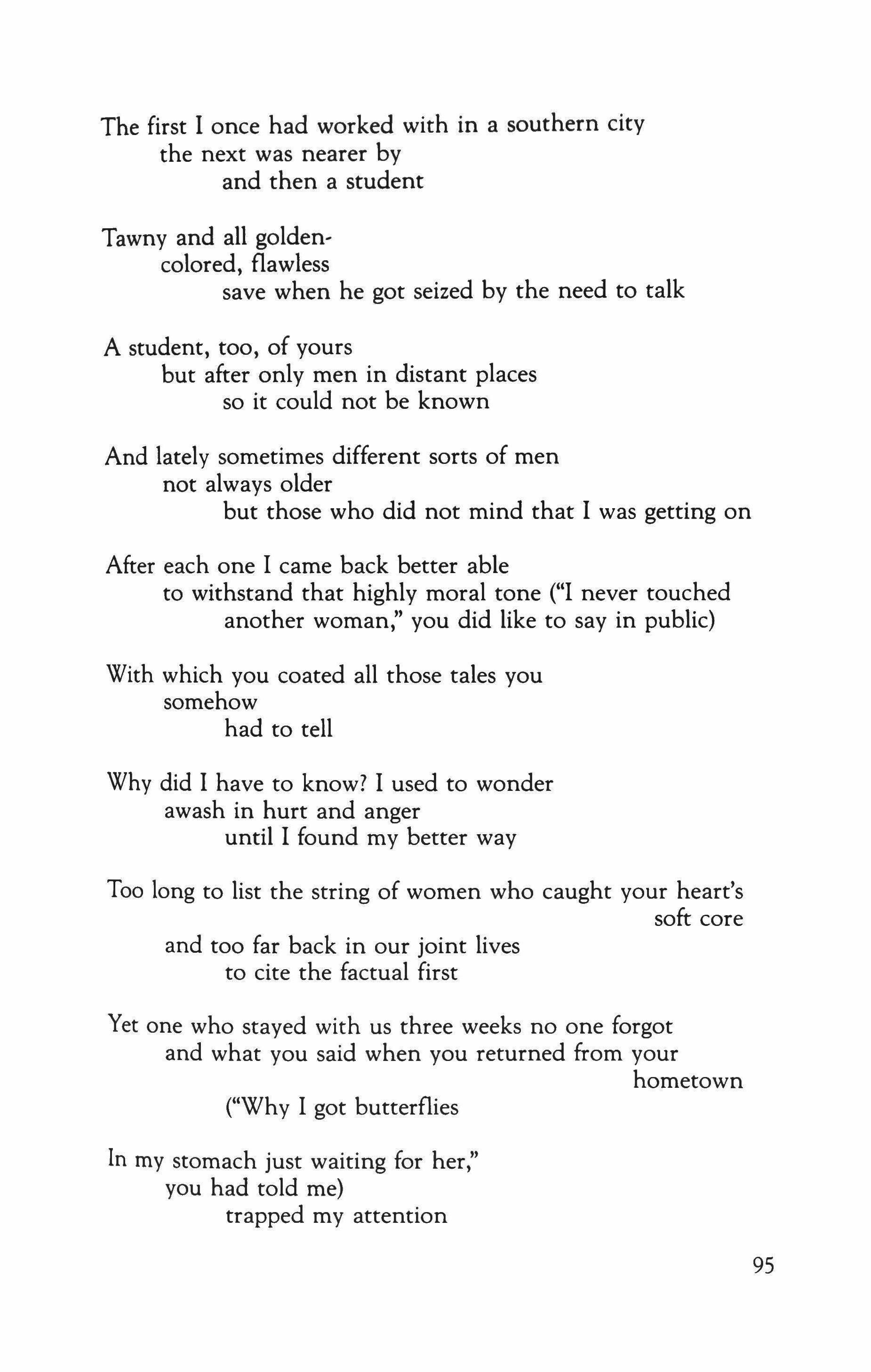
The first I once had worked with in a southern city the next was nearer by and then a student
Tawny and all goldencolored, flawless save when he got seized by the need to talk
A student, too, of yours but after only men in distant places so it could not be known
And lately sometimes different sorts of men not always older but those who did not mind that I was getting on
After each one I came back better able to withstand that highly moral tone ("I never touched another woman," you did like to say in public)
With which you coated all those tales you somehow had to tell
Why did I have to know? I used to wonder awash in hurt and anger until I found my better way
Too long to list the string of women who caught your heart's soft core and too far back in our joint lives to cite the factual first
Yet one who stayed with us three weeks no one forgot and what you said when you returned from your hometown
("Why I got butterflies
In my stomach just waiting for her," you had told me) trapped my attention
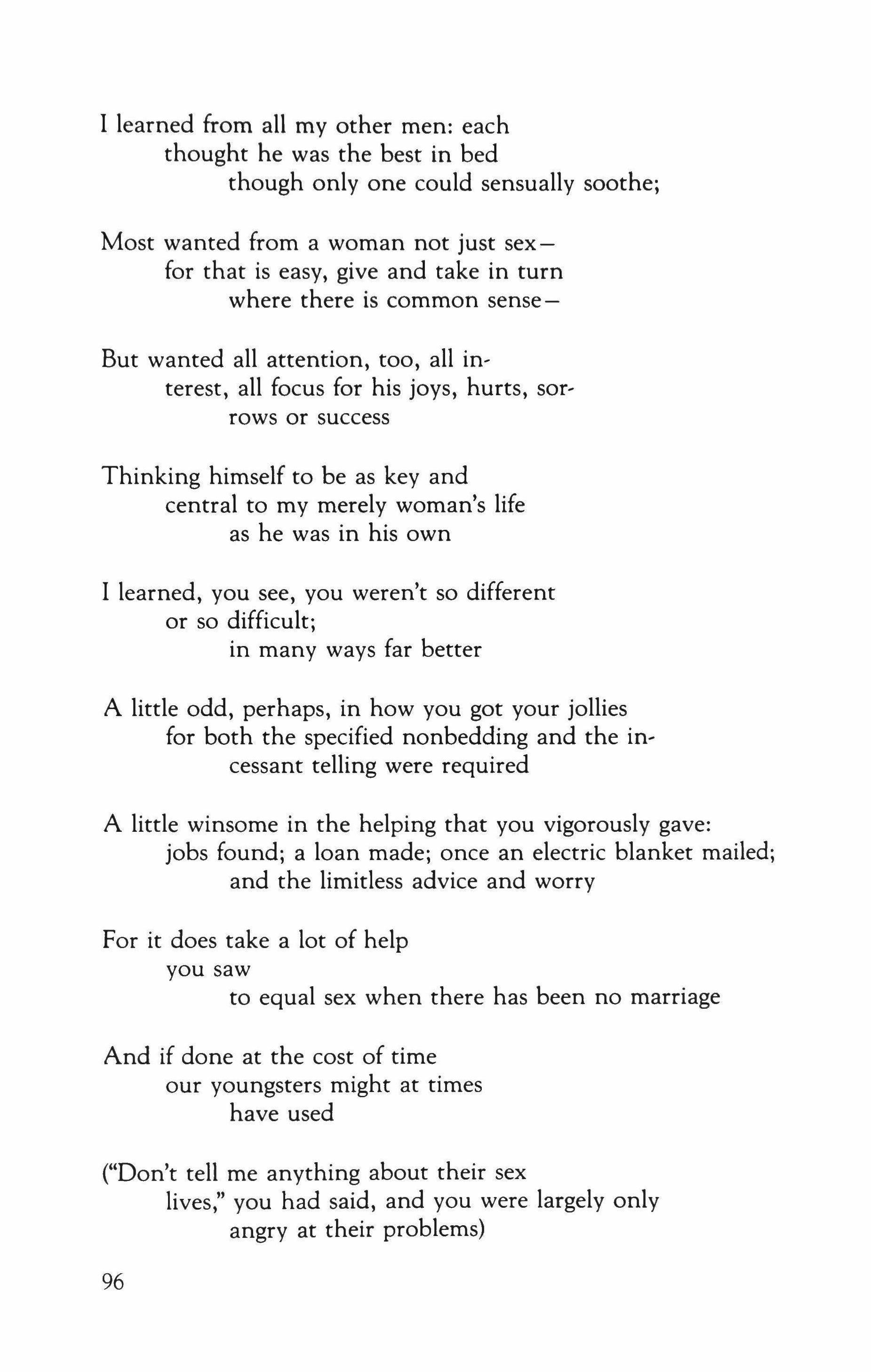
I learned from all my other men: each thought he was the best in bed though only one could sensually soothe;
Most wanted from a woman not just sexfor that is easy, give and take in turn where there is common sense-
But wanted all attention, too, all in, terest, all focus for his joys, hurts, sorrows or success
Thinking himself to be as key and central to my merely woman's life as he was in his own
I learned, you see, you weren't so different or so difficult; in many ways far better
A little odd, perhaps, in how you got your jollies for both the specified nonbedding and the in, cessant telling were required
A little winsome in the helping that you vigorously gave: jobs found; a loan made; once an electric blanket mailed; and the limitless advice and worry
For it does take a lot of help you saw to equal sex when there has been no marriage
And if done at the cost of time our youngsters might at times have used
("Don't tell me anything about their sex lives," you had said, and you were largely only angry at their problems)
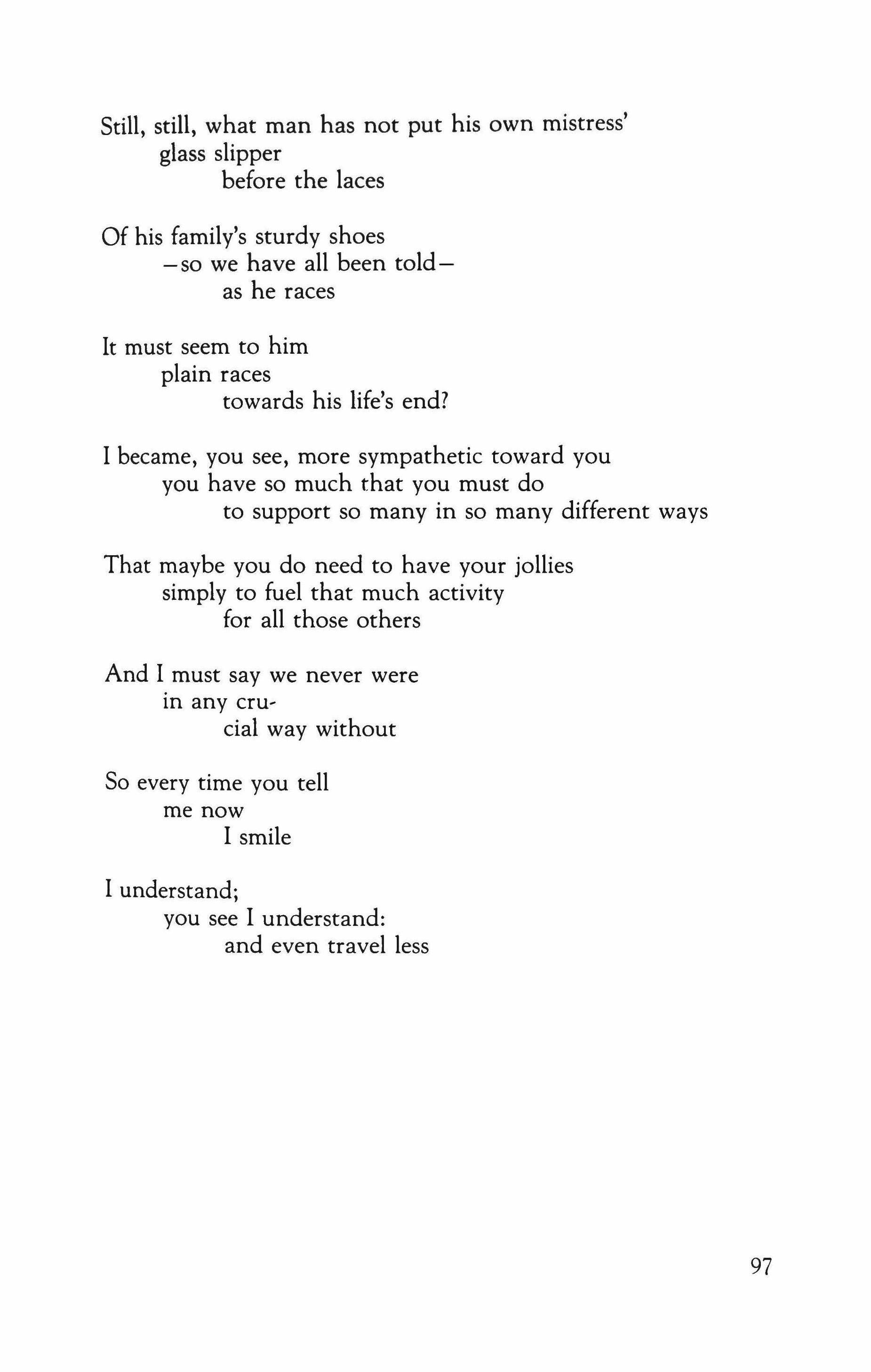
Still, still, what man has not put his own mistress' glass slipper before the laces
Of his family's sturdy shoes - so we have all been toldas he races
It must seem to him plain races towards his life's end?
I became, you see, more sympathetic toward you you have so much that you must do to support so many in so many different ways
That maybe you do need to have your jollies simply to fuel that much activity for all those others
And I must say we never were in any crucial way without
So every time you tell me now I smile
I understand; you see I understand: and even travel less

Just before the High Holy Days, the first Hartz in Hartz and Hartz Books received the usual letter from Hungary. There always was a letter from Hungary before the High Holy Days. I remember when I recognized them by their large, bright stamps, selected, I am sure with me in mind. Why else the exotic birds in flight, the blocks of Olympic competitors, the glowing pastoral scenes? Cheap but eye-catching pictures, for the child, not the collector father. My father yearned for those aluminum stamps that only Hungary produced, but they never came. I was just as pleased with the ones that did. Impatient to cut the stamps from the envelopes and soak them clear of the paper, I would be busy at the sink while my father read the letter aloud in Hungarian, translating as he went along. As for me, the content would be less interesting than the sound. It seemed musical, somehow balanced, each word beginning softly and barely touching the last sound before bouncing to a new word. Over the years, as I slowly understood more and more of the letter, I no longer needed my father's translation but also lost that sense of Hungarian as ascending birdcalls, always ending unresolved, in questions.
Dear Young Hartz, The monuments are crumbling. Weeds are everywhere. Hooligans deface the inscriptions. The Collective lusts after the land. Outside the cemetery I am the last Jew in Ujfalu. Freed Antal

lmre Hartz (now Emery), handed me cash from a gray metal box in his desk and sent me off to convert it to a money order and a #2 package by IKKA, the international gift-package company. Tins of coffee, Hershey's cocoa, powdered soup, Tang, buttons, in payment for the upkeep of my grandfather's gravesite. The accompanying note he would write himself, though I could have managed that too since its language was as unwavering as Emery Hartz's devotion.
Freed Ur, kiisz6n6m, Isten aldja.
"My thanks, Freed, sir, God bless you." The one time I offered him my own composition, eager to demonstrate my proficiency in Hungarian, Father refused it, insisting on the familiar greeting. "When I read your words, I don't read thanks and I don't read affection. Leave Anti be. Write poetry if you must write in Hungarian."
By return mail, once a year, Freed would send a single photograph of a headstone. Taken from a distance, always in shadow, inscription never clear, it was accepted by my father without question as confirmation of the Hartz name and the Freed upkeep.
Over the years, as the section on Hungary in Fodor's guide shrank to just a few pages in its chapter on Eastern Europe, I demanded that my father accompany with narration the map he would pull out of the book's jacket pocket. But Emery Hartz (no longer the Young Hartz), dealer in old books, in rare manuscripts, above all, in other people's stories, hated to tell his own. I settled for the story of Ujfalu, the town, and of Freed, its caretaker:
Freed Anti [my father's English, when telling Hungarian stories, fell into the singsong of his mother tongue and added the many rhetorical words that can make a command sound friendly and an insult a kindness] always knew everything a little better than anyone else, and don't think he didn't let you know about it more than it was absolutely necessary. Do you understand? He didn't know the acceptable limits to bragging. Of course, he was a lefty. Now that may be of interest today only to psychiatrists, but in those days it meant that he could shoot off the trigger finger of his right hand and stay out ofthe army. Now for a lefty the loss of a finger on the other hand is no great loss, except, as usual, Anti made too sure and somehow his whole hand was infected, and even for a lefty, that was difficult, I don't need to tell you. In any case, Anti ended up with a wooden stump for a fist. He would wear a glove on top of that, winter and summer, and hold his drink twisted into those frozen fingers. Naturally, he would get into fights. Don't think it would be with just anybody. He stayed away from beer and wine drinkers, preferred the peasants already sloshed with schnapps. A careful man, Freed Anti, even then, at least when he thought of it. Anyway, he usually brought the fight to a quick close by whacking some hayseed on the temple with his stump.

Apparently Freed was already a husband when he made a phantom out of his trigger finger. He had married a distant cousin of the Hartz family, a match my grandfather had welcomed because it had made Anti, his learning partner, kin. But the infected hand and subsequent amputation estranged Anti and Grandfather. Benjamin Hartz (he had been Mihaly only to Gentiles) had begged Anti not to use a gun on himself. The missing finger, the maimed hand, would forever disqualify Anti from performing priestly duties at the synagogue. Grandfather had urged Anti to try other remedies. An old woman in town swore she could mix a poultice that would cover Anti with sores during the examination but disappear without a trace the moment the draft exemption came through. Grandfather himself had used his Talmudic learning to escape the Emperor's Army. Studying for the rabbinate, he had marveled in a class on dietary laws at the ability of fowl to fill their gizzards with pebbles and nails. He discovered in himself the knack ofswallowing metal. The blunt pieces would distend his belly but emerge naturally, leaving him unfit for military service but hale for all else. He tried to teach Anti this method, practicing with whole small potatoes and finger cucumbers, but Anti, already in doubt of his faith, offered to clean the village gendarme's rifle.
After his stump was fully healed with pink, baby-like skin, Anti would occasionally strap on the wooden hand that menaced the air with stiff, curved fingers. He let his hair and mustache grow. Soon he stopped covering his head. Abandoning the study bench, he became a peddler, specializing in eyelet embroidery for dowry chests. He took to traveling on the Sabbath, selling his wife's handiwork further and further from home. His first business principle was to sell more cheaply to girls than to their mothers and thus always surrounded himself with young women of marriageable age. Perhaps because his name had been struck from the Army rolls, he was left behind in Ujfalu when all other ablebodied Jewish men were drafted into forced labor brigades and sent to the Eastern Front. In 1944, the first Sunday after Passover, two roosterfeathered gendarmes rounded up the remaining Jews in Ujfalu. All except Antal Freed. Anti had left the night before, to peddle, he claimed, and to find fresh bread after the unleavened dough of the holiday, but actually he had spent the night with Magda Komaromi, in her father's barn, just a few kilometers out of town. The girl had buried his peddler's cart deep in a haystack and then hidden Anti in the barn for a year, becoming pregnant in late '45. By then Anti knew his wife would not be returning. He had waited until he was sure. Magda had reported that as his wife was being nudged into the wagon, she had been
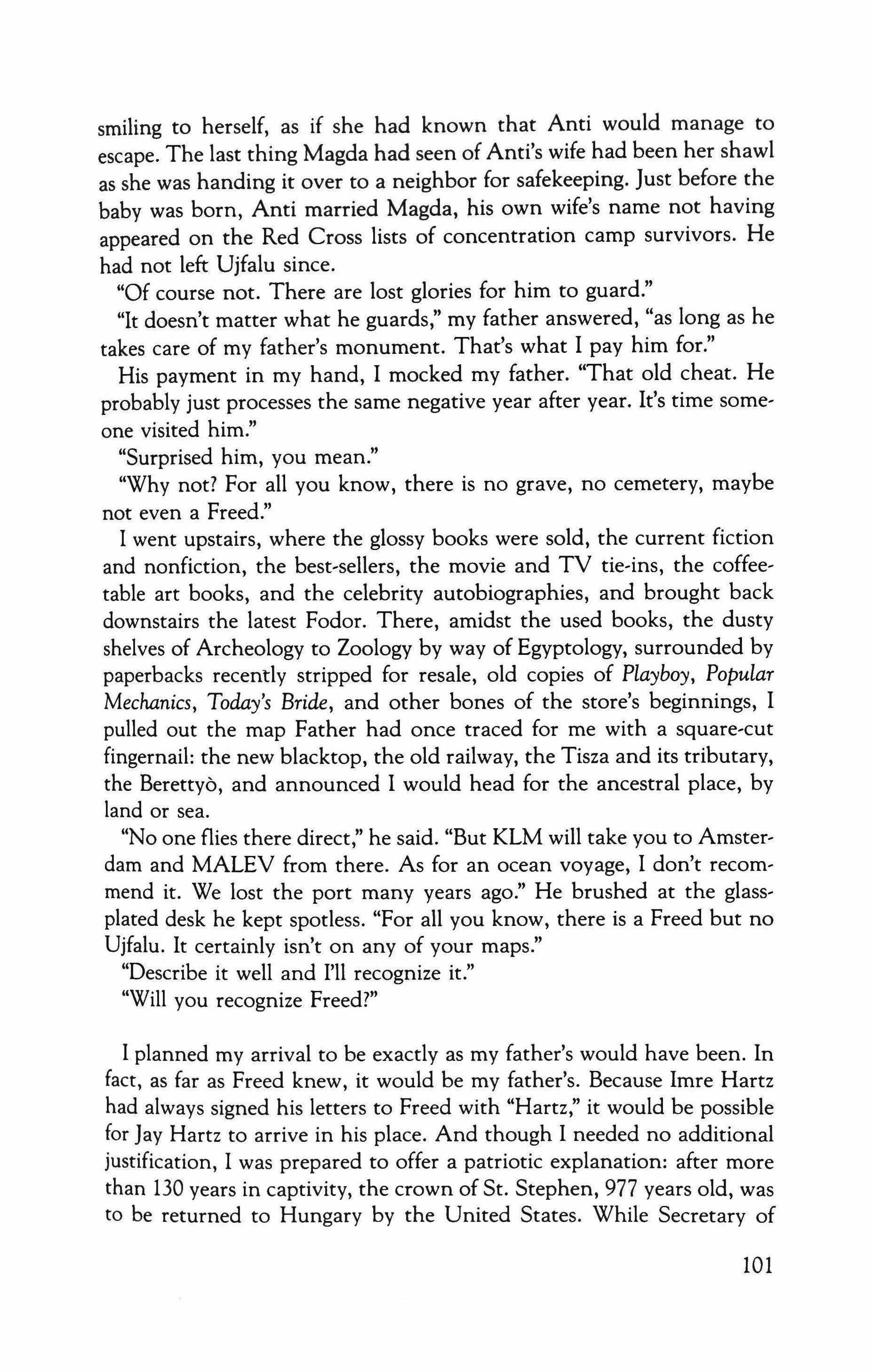
smiling to herself, as if she had known that Anti would manage to escape. The last thing Magda had seen of Anti's wife had been her shawl as she was handing it over to a neighbor for safekeeping. Just before the baby was born, Anti married Magda, his own wife's name not having appeared on the Red Cross lists of concentration camp survivors. He had not left Ujfalu since.
"Of course not. There are lost glories for him to guard."
"It doesn't matter what he guards," my father answered, "as long as he takes care of my father's monument. That's what I pay him for."
His payment in my hand, I mocked my father. "That old cheat. He probably just processes the same negative year after year. It's time someone visited him."
"Surprised him, you mean."
"Why not? For all you know, there is no grave, no cemetery, maybe not even a Freed."
I went upstairs, where the glossy books were sold, the current fiction and nonfiction, the best-sellers, the movie and TV tie-ins, the coffeetable art books, and the celebrity autobiographies, and brought back downstairs the latest Fodor. There, amidst the used books, the dusty shelves of Archeology to Zoology by way of Egyptology, surrounded by paperbacks recently stripped for resale, old copies of Playboy, Popular Mechanics, Today's Bride, and other bones of the store's beginnings, I pulled out the map Father had once traced for me with a square-cut fingernail: the new blacktop, the old railway, the Tisza and its tributary, the Beretryo, and announced I would head for the ancestral place, by land or sea.
"No one flies there direct," he said. "But KLM will take you to Amsterdam and MALEY from there. As for an ocean voyage, I don't recommend it. We lost the port many years ago." He brushed at the glassplated desk he kept spotless. "For all you know, there is a Freed but no Ujfalu. It certainly isn't on any of your maps."
"Describe it well and I'll recognize it."
"Will you recognize Freed?"
I planned my arrival to be exactly as my father's would have been. In fact, as far as Freed knew, it would be my father's. Because Imre Hartz had always signed his letters to Freed with "Hartz," it would be possible for Jay Hartz to arrive in his place. And though I needed no additional justification, I was prepared to offer a patriotic explanation: after more than 130 years in captivity, the crown of St. Stephen, 977 years old, was to be returned to Hungary by the United States. While Secretary of
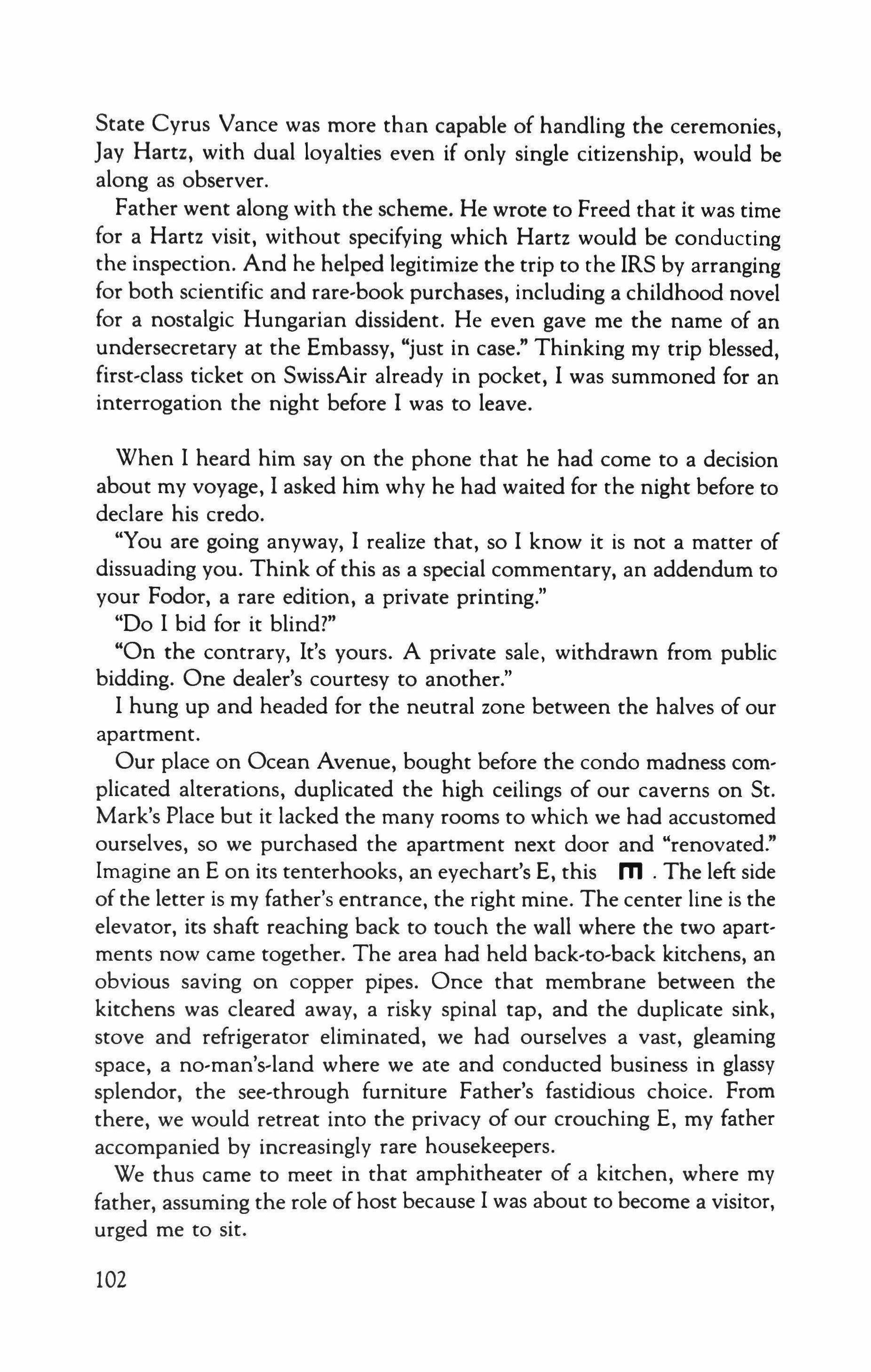
State Cyrus Vance was more than capable of handling the ceremonies, Jay Hartz, with dual loyalties even if only single citizenship, would be along as observer.
Father went along with the scheme. He wrote to Freed that it was time for a Hartz visit, without specifying which Hartz would be conducting the inspection. And he helped legitimize the trip to the IRS by arranging for both scientific and rare-book purchases, including a childhood novel for a nostalgic Hungarian dissident. He even gave me the name of an undersecretary at the Embassy, "just in case." Thinking my trip blessed, first-class ticket on SwissAir already in pocket, I was summoned for an interrogation the night before I was to leave.
When I heard him say on the phone that he had come to a decision about my voyage, I asked him why he had waited for the night before to declare his credo.
"You are going anyway, I realize that, so I know it is not a matter of dissuading you. Think of this as a special commentary, an addendum to your Fodor, a rare edition, a private printing."
"Do I bid for it blind?"
"On the contrary, It's yours. A private sale, withdrawn from public bidding. One dealer's courtesy to another."
I hung up and headed for the neutral zone between the halves of our apartment.
Our place on Ocean Avenue, bought before the condo madness complicated alterations, duplicated the high ceilings of our caverns on St. Mark's Place but it lacked the many rooms to which we had accustomed ourselves, so we purchased the apartment next door and "renovated."
Imagine an E on its tenterhooks, an eyechart's E, this m. The left side of the letter is my father's entrance, the right mine. The center line is the elevator, its shaft reaching back to touch the wall where the two apartments now came together. The area had held back-to-back kitchens, an obvious saving on copper pipes. Once that membrane between the kitchens was cleared away, a risky spinal tap, and the duplicate sink, stove and refrigerator eliminated, we had ourselves a vast, gleaming space, a no-man's-land where we ate and conducted business in glassy splendor, the see-through furniture Father's fastidious choice. From there, we would retreat into the privacy of our crouching E, my father accompanied by increasingly rare housekeepers.
We thus came to meet in that amphitheater of a kitchen, where my father, assuming the role of host because I was about to become a visitor, urged me to sit.

Since I could never stay upright in my father's chairs, somehow unable to keep from sliding lower and lower into the arms of seats that grabbed ineffectually above my waist, this invitation was calculated to add to my discomfort. I sat anyway, sentimental about the upcoming trip which would be our first extended separation since I had gone off to Cleveland State. It might have a portentous night. It would be nice to use the weather as point or counterpoint-heavy drops of summer rain or a calm New York night or an evening of suppressed heat - but within our climate-controlled castle we were immune to heavenly signs.
From his formal tone I had expected evening clothes and bows, but he entered in a maroon robe and leather slippers, the white flowers of his pajamas a crisp edge on the purple ground. Rosy-cheeked from his bath, he had tied his hair down with one of Madeline's kerchiefs. He despised blow-dryers, preferring his hair flat, not fluffy. He once thought the slick look too European but influential Serena had convinced him it would be the look of the eighties and had him start in the sixties. Madeline was pleased to lend him her kerchiefs, not realizing that his wearing them was ongoing tribute to her predecessor. Waiting for him to speak, I could hear Madeline somewhere in the background, perhaps rinsing the tub, perhaps preparing drinks, possibly prepping herself. There was much privacy in our apartment but no secrets. I used a blow-dryer but my father knew full well who it was that put the curl into my hair.
Having just corne from his bath, he would not shake hands. I did not have the heart to tell him how much those baths marked him. Americans shower, Pop, I wanted to say, but then there would have been something else that would have revealed his origins. As far as he is concerned, a shower wastes. Talk to him about conservation! He remembers the fire his father had to build in a stove that was attached to a water tank in the bathroom. Water had to be brought in from the well, wood from the shed. Once that water was heated, one bathed, one submerged, one did not allow the precious heat to gurgle down a drain. While the water warmed, my father and Uncle Zoli waited, two naked kids under a large sheet. They would share the final tub. Today, a bath for one, in near-scalding water, is his greatest luxury. As for shaking hands, that was for my sake. My father does not trust the purity of bathroom conduits. He shudders at the thought of the same water in the washbowl and the toilet bowl. I have tried to reassure him that the bathroom tap runs as clear and as cold as the kitchen faucet and that the water in the toilet bowl is sanitary enough to clean wounds and is the trough for the most finicky of cats, but he does not believe me. As

far as he is concerned, the aura of washroom clings to him and he would spare me from it.
From the pocket of his robe he pulled a sheet of paper and slid it across the glass top. "A list of relatives."
I did not recognize any of the names. "Whose relatives?" "Mine. Yours."
"You would like me to look them up? Exchange photographs?"
"They're for you to use, if you care to. Introduce yourself as your grandfather's grandson and leave me out of it. I've been written out but it was a mutual cancellation."
"Are they close relatives?"
He smiled faintly. "Kissing cousins all, but there is blood on the teeth." He smoothed the sheet, reading it upside down from his side of the table. "A cousin of mine from Budapest, from my mother's side. He was a yeshiva boy before the war, then an actor, then a survivor. The wardrobe girl hid him in a trunk filled with eighteenth-century gowns for a whole year. Imagine, he could hear the actresses dressing and undressing, smell their perfume, hear their most intimate conversations. Came out at night, briefly, to stretch his legs." His finger moved. "His sister, Ildiko. I don't know her married name. She was taken to Vienna. One transport continued to Auschwitz, hers stayed. Next. Your Uncle Zoli's brother-in-law, the son of the Sugar Baron. He has two children. He converted. I don't know his new name or his new religion. This one is Zsuzsa, my father's favorite niece. She is my age. When the roosterfeathers were marching her to Hegyeshalom, they stopped in a village overnight and herded the Jews into the synagogue's courtyard, letting the locals guard them. The townspeople maintained a sense of loyalty toward their own Jews, insisting that they get the choice spaces against the sides of the building. For the other Jews they had different plans. They picked out some of the prettier girls and stripped them to the waist. Then they made them sit on the laps of some of the selected villagers who were blindfolded. After being fondled, the girls were shuffled and deposited on different laps. The still blindfolded player had to guess if the girl now on his lap was the one who had been there earlier. Zsuzsa's first partner tweaked her right nipple so painfully, that when she was returned to his lap and he touched her, her gasp informed him he had the same bird in hand as before. For his reward, he had the rest of her, not that any of the participants were denied that night."
I was beginning to choke. He was trying to drown me. This was not the past I was returning to claim and this was not the past that he knew. He had no right to do this to me.
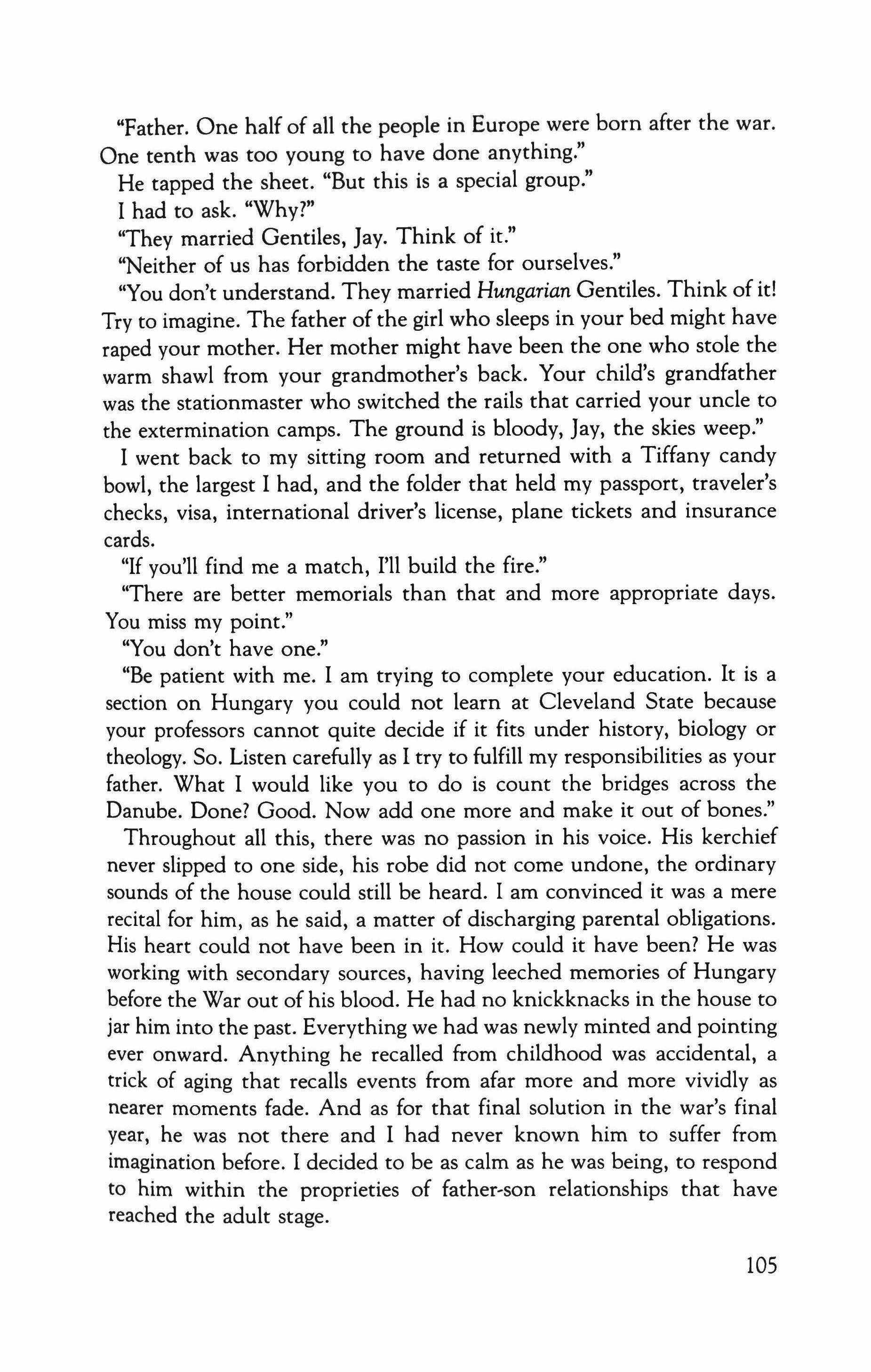
"Father. One half of all the people in Europe were born after the war. One tenth was too young to have done anything."
He tapped the sheet. "But this is a special group."
1 had to ask. "Why?"
"They married Gentiles, Jay. Think of it."
"Neither of us has forbidden the taste for ourselves."
"You don't understand. They married Hungarian Gentiles. Think of it! Try to imagine. The father of the girl who sleeps in your bed might have raped your mother. Her mother might have been the one who stole the warm shawl from your grandmother's back. Your child's grandfather was the stationmaster who switched the rails that carried your uncle to the extermination camps. The ground is bloody, Jay, the skies weep."
1 went back to my sitting room and returned with a Tiffany candy bowl, the largest I had, and the folder that held my passport, traveler's checks, visa, international driver's license, plane tickets and insurance cards.
"If you'll find me a match, I'll build the fire."
"There are better memorials than that and more appropriate days. You miss my point."
"You don't have one."
"Be patient with me. I am trying to complete your education. It is a section on Hungary you could not learn at Cleveland State because your professors cannot quite decide if it fits under history, biology or theology. So. Listen carefully as I try to fulfill my responsibilities as your father. What I would like you to do is count the bridges across the Danube. Done? Good. Now add one more and make it out of bones."
Throughout all this, there was no passion in his voice. His kerchief never slipped to one side, his robe did not come undone, the ordinary sounds of the house could still be heard. I am convinced it was a mere recital for him, as he said, a matter of discharging parental obligations. His heart could not have been in it. How could it have been? He was working with secondary sources, having leeched memories of Hungary before the War out of his blood. He had no knickknacks in the house to jar him into the past. Everything we had was newly minted and pointing ever onward. Anything he recalled from childhood was accidental, a trick of aging that recalls events from afar more and more vividly as nearer moments fade. And as for that final solution in the war's final year, he was not there and I had never known him to suffer from imagination before. I decided to be as calm as he was being, to respond to him within the proprieties of father-son relationships that have reached the adult stage.
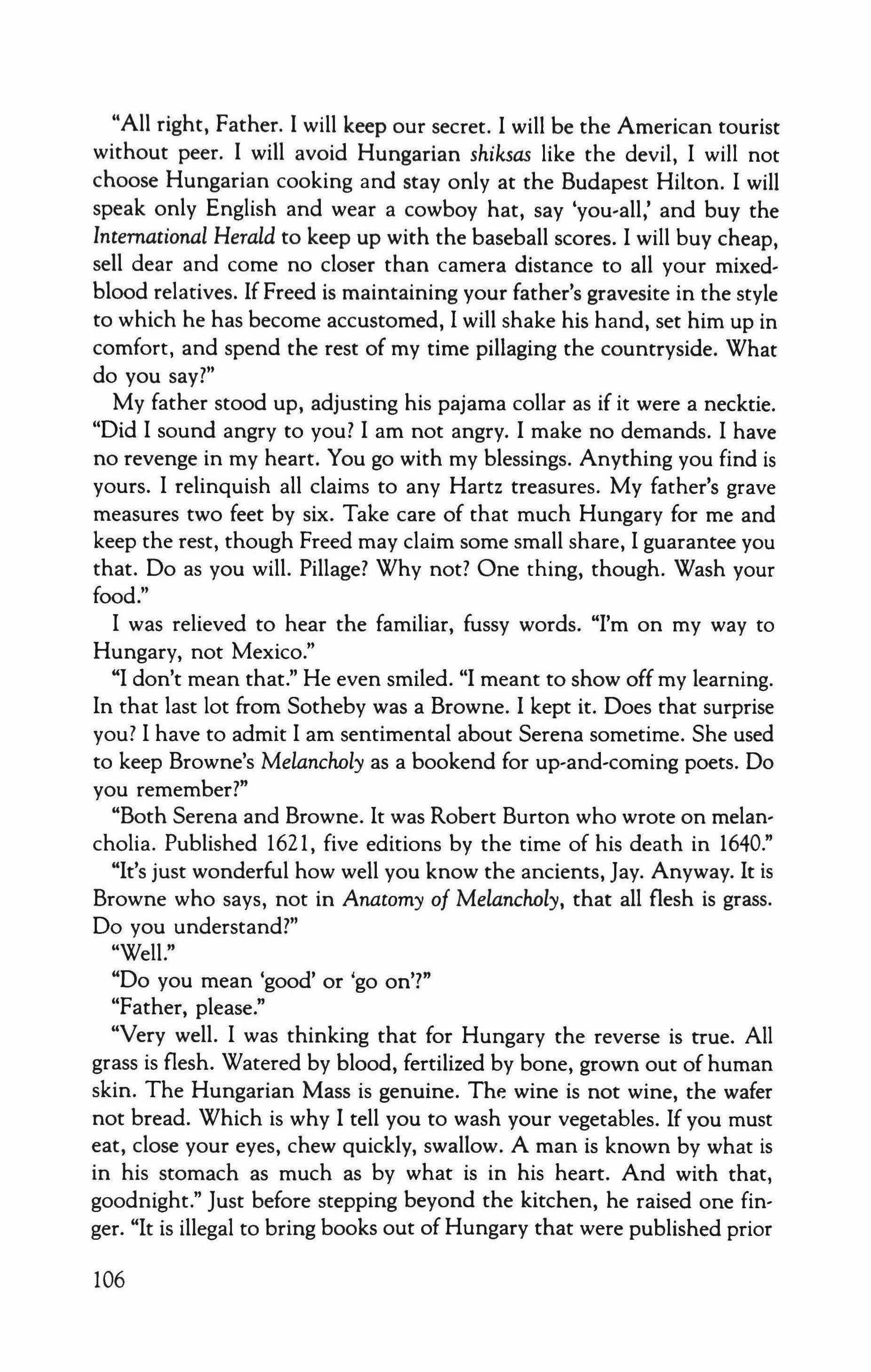
"All right, Father. I will keep our secret. I will be the American tourist without peer. I will avoid Hungarian shiksas like the devil, I will not choose Hungarian cooking and stay only at the Budapest Hilton. I will speak only English and wear a cowboy hat, say 'you-all,' and buy the International Herald to keep up with the baseball scores. I will buy cheap, sell dear and come no closer than camera distance to all your mixed, blood relatives. If Freed is maintaining your father's gravesite in the style to which he has become accustomed, I will shake his hand, set him up in comfort, and spend the rest of my time pillaging the countryside. What do you say?"
My father stood up, adjusting his pajama collar as if it were a necktie. "Did I sound angry to you? I am not angry. I make no demands. I have no revenge in my heart. You go with my blessings. Anything you find is yours. I relinquish all claims to any Hartz treasures. My father's grave measures two feet by six. Take care of that much Hungary for me and keep the rest, though Freed may claim some small share, I guarantee you that. Do as you will. Pillage? Why not? One thing, though. Wash your food."
I was relieved to hear the familiar, fussy words. "I'm on my way to Hungary, not Mexico."
"I don't mean that." He even smiled. "I meant to show off my learning. In that last lot from Sotheby was a Browne. I kept it. Does that surprise you? I have to admit I am sentimental about Serena sometime. She used to keep Browne's Melancholy as a bookend for up-and-corning poets. Do you remember?"
"Both Serena and Browne. It was Robert Burton who wrote on melancholia. Published 1621, five editions by the time of his death in 1640."
"It's just wonderful how well you know the ancients, Jay. Anyway. It is Browne who says, not in Anatomy of Melancholy, that all flesh is grass. Do you understand?"
"Well."
"Do you mean 'good' or 'go on'?"
"Father, please."
"Very well. I was thinking that for Hungary the reverse is true. All grass is flesh. Watered by blood, fertilized by bone, grown out of human skin. The Hungarian Mass is genuine. The wine is not wine, the wafer not bread. Which is why I tell you to wash your vegetables. If you must eat, close your eyes, chew quickly, swallow. A man is known by what is in his stomach as much as by what is in his heart. And with that, goodnight." Just before stepping beyond the kitchen, he raised one fin, ger. "It is illegal to bring books out of Hungary that were published prior
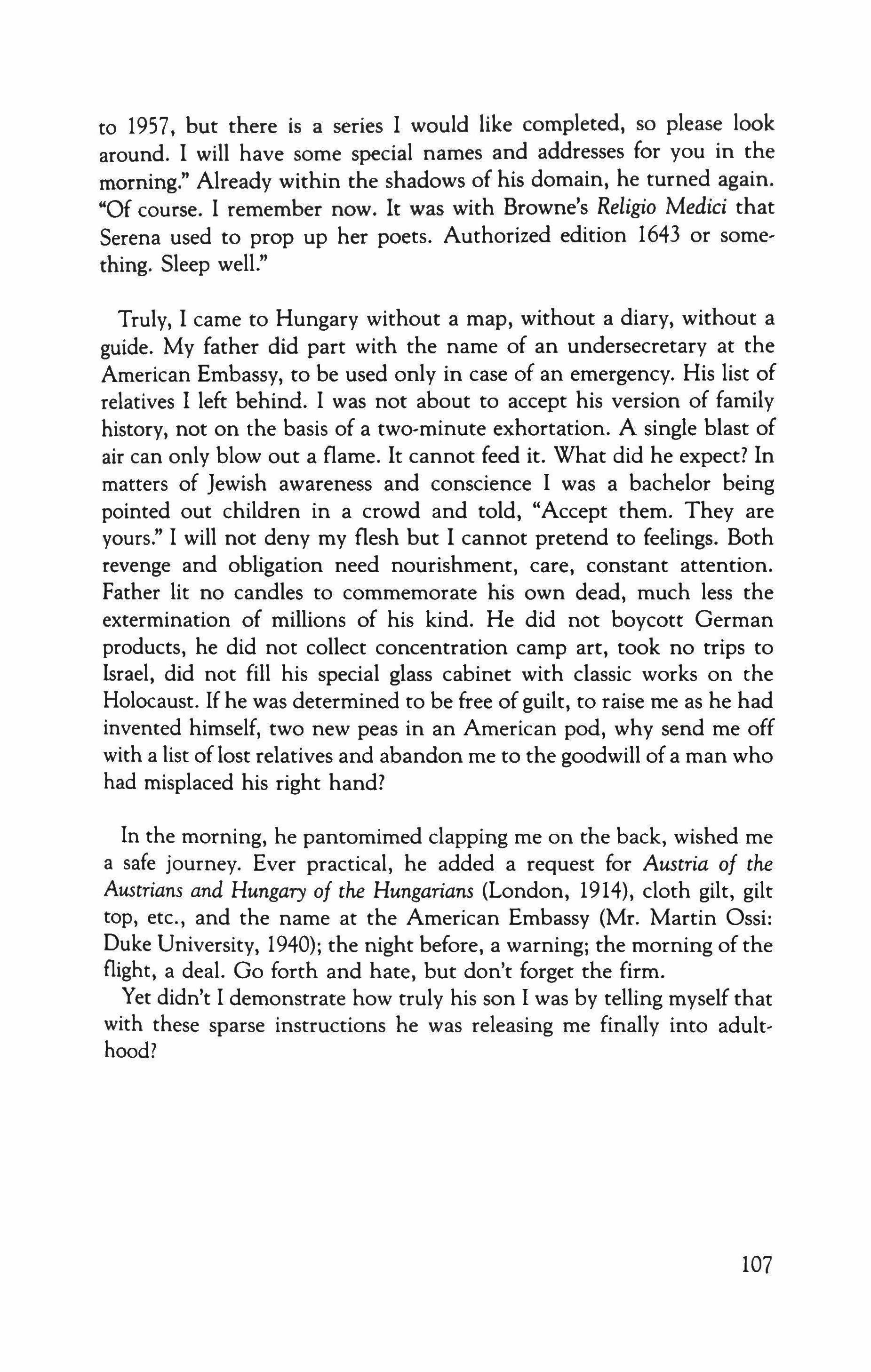
to 1957, but there is a series I would like completed, so please look around. I will have some special names and addresses for you in the morning." Already within the shadows of his domain, he turned again. "Of course. I remember now. It was with Browne's Religio Medici that Serena used to prop up her poets. Authorized edition 1643 or some' thing. Sleep well."
Truly, I came to Hungary without a map, without a diary, without a guide. My father did part with the name of an undersecretary at the American Embassy, to be used only in case of an emergency. His list of relatives I left behind. I was not about to accept his version of family history, not on the basis of a two-minute exhortation. A single blast of air can only blowout a flame. It cannot feed it. What did he expect? In matters of Jewish awareness and conscience I was a bachelor being pointed out children in a crowd and told, "Accept them. They are yours." I will not deny my flesh but I cannot pretend to feelings. Both revenge and obligation need nourishment, care, constant attention. Father lit no candles to commemorate his own dead, much less the extermination of millions of his kind. He did not boycott German products, he did not collect concentration camp art, took no trips to Israel, did not fill his special glass cabinet with classic works on the Holocaust. If he was determined to be free of guilt, to raise me as he had invented himself, two new peas in an American pod, why send me off with a list oflost relatives and abandon me to the goodwill of a man who had misplaced his right hand?
In the morning, he pantomimed clapping me on the back, wished me a safe journey. Ever practical, he added a request for Austria of the Austrians and Hungary 0/ the Hungarians (London, 1914), cloth gilt, gilt top, etc., and the name at the American Embassy (Mr. Martin Ossi: Duke University, 1940); the night before, a warning; the morning of the flight, a deal. Go forth and hate, but don't forget the firm.
Yet didn't I demonstrate how truly his son I was by telling myself that with these sparse instructions he was releasing me finally into adult, hood?
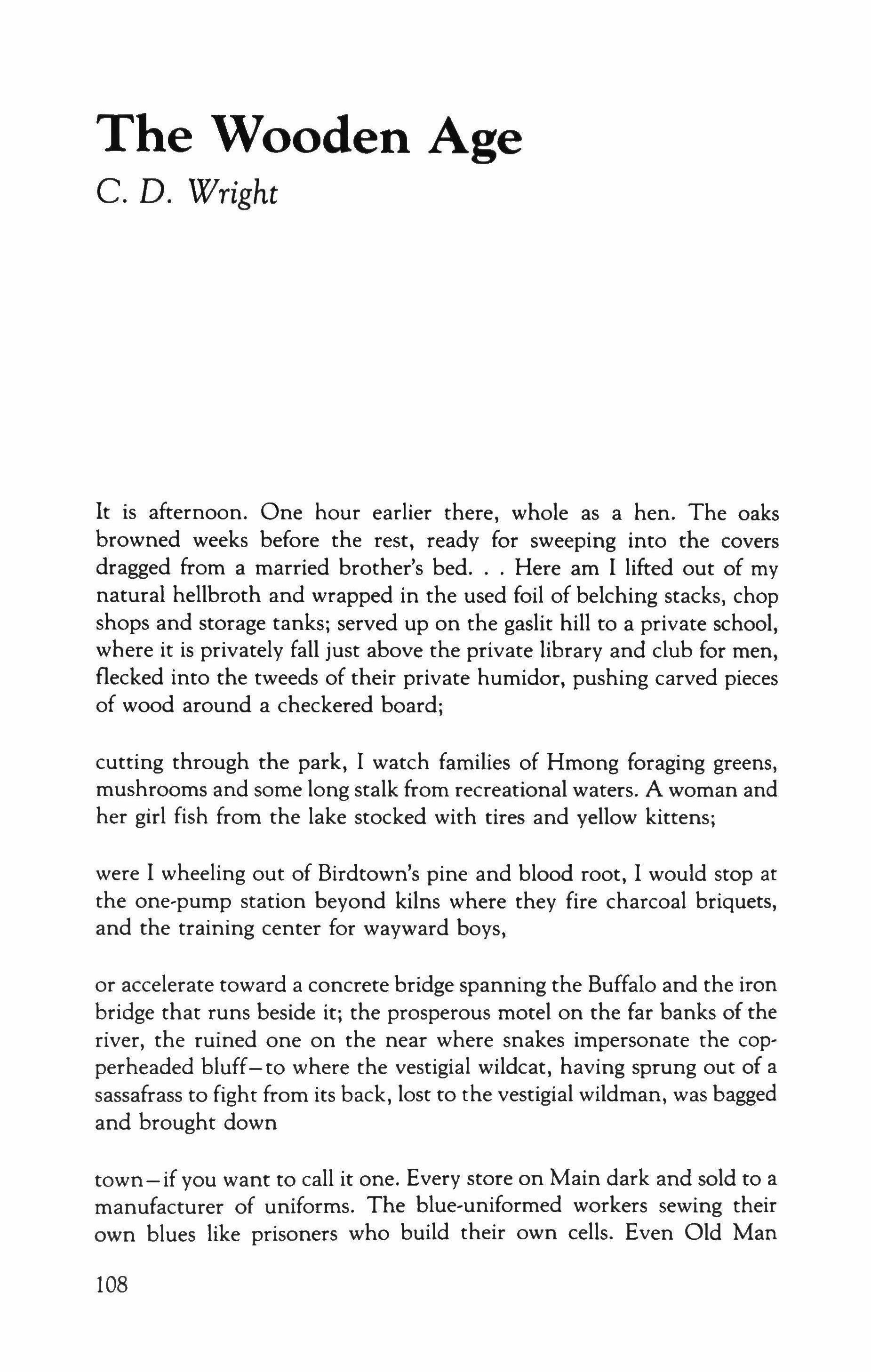
It is afternoon. One hour earlier there, whole as a hen. The oaks browned weeks before the rest, ready for sweeping into the covers dragged from a married brother's bed. Here am I lifted out of my natural hellbroth and wrapped in the used foil of belching stacks, chop shops and storage tanks; served up on the gaslit hill to a private school, where it is privately fall just above the private library and club for men, flecked into the tweeds of their private humidor, pushing carved pieces of wood around a checkered board;
cutting through the park, I watch families of Hmong foraging greens, mushrooms and some long stalk from recreational waters. A woman and her girl fish from the lake stocked with tires and yellow kittens;
were I wheeling out of Birdtown's pine and blood root, I would stop at the one-pump station beyond kilns where they fire charcoal briquets, and the training center for wayward boys,
or accelerate toward a concrete bridge spanning the Buffalo and the iron bridge that runs beside it; the prosperous motel on the far banks of the river, the ruined one on the near where snakes impersonate the cop' perheaded bluff-to where the vestigial wildcat, having sprung out of a sassafrass to fight from its back, lost to the vestigial wildman, was bagged and brought down
town-if you want to call it one. Every store on Main dark and sold to a manufacturer of uniforms. The blue-uniformed workers sewing their own blues like prisoners who build their own cells. Even Old Man

Reuther had to die and his widow to wither and be bought out, and that was the last horehound stick; that was when the cowbells came down from the two-story doors of Reuther's House of Three Wonders: you wonder if we have it, we wonder if we don't, we both wonder if we can find it.
Living in the autumn afternoon: a woman might set up a table in the shade, the pastor call on someone tied to their bed, impatiens blooming yet in black iron washpots; a man tell his spouse for anyone in earshot that when her mother went to the hospital, the fleas lost their host. 0 my rotting trout dock, Old Capital Theater, taxidermy and beauty school, Sunday immersions. 0 Gazo's Bait Shop, Cady St. Cafe, biscuits and gravy, furniture barns, lightning-split elm, 0 bookmobile, notions, rocks, light bread, cigarettes and pop
Eleven miles west, in the commercial center, they are dreaming about having their face lifted, their soft butt tucked; the men are losing their hair and cleaning out their desk to make themselves feel better. They don't hear paint peel and the garden overgrowing. In one of those lives I was a mimosa shooting up unplanted by the tracks. Either that or a yard chicken, more of a pet than something for the pot. Or was I learning lipreading at home, in case I needed it
in the city: just when you start in on that southern bird, the buzzard, in a land of uncertain springs, the shift whistle sounds. This is where we get up and go piss on the bricks; drive off throwing chain-food wrappers out the window
This is where we lug our burning brains to feed the tree.
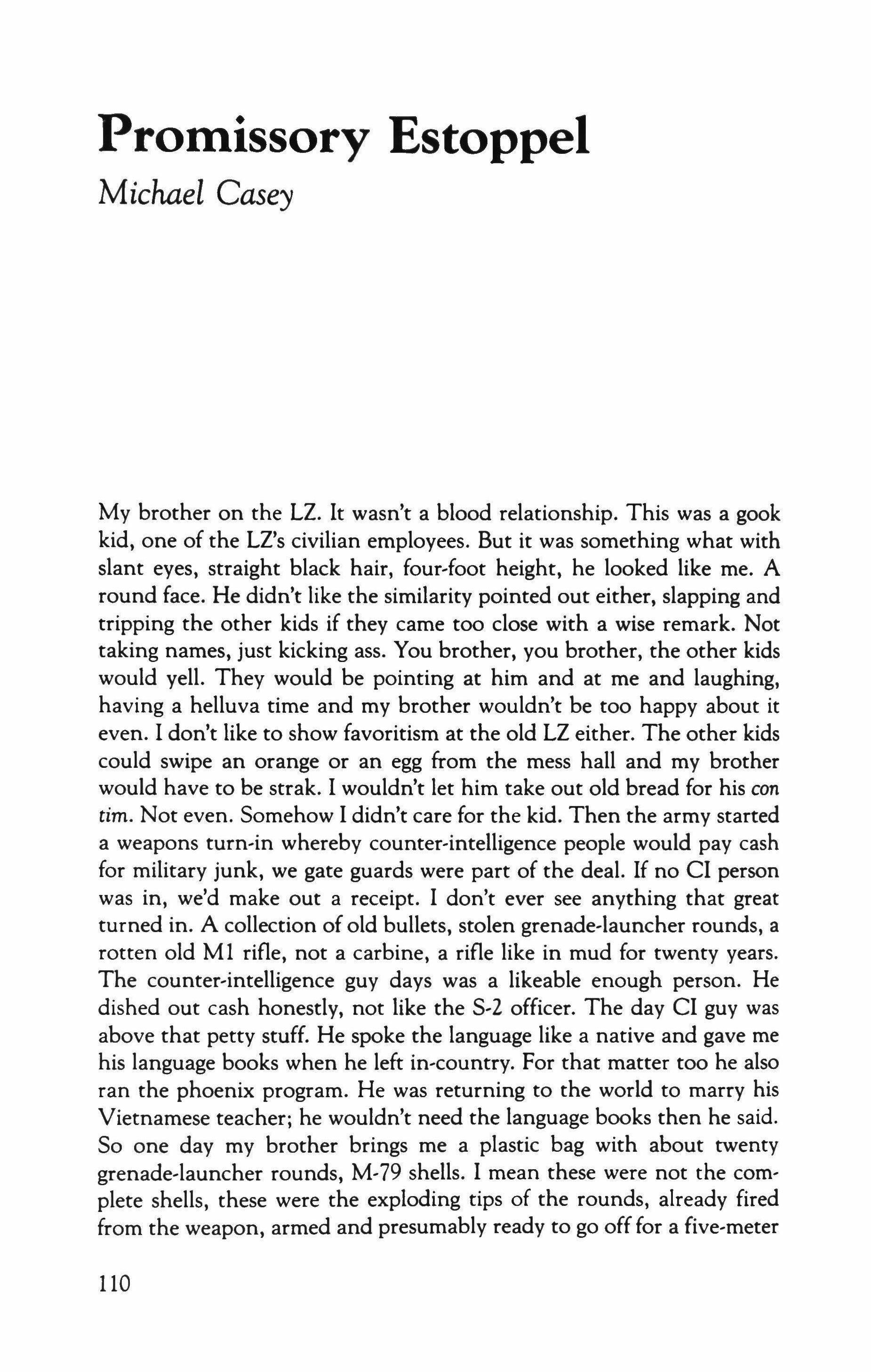
My brother on the LZ. It wasn't a blood relationship. This was a gook kid, one of the LZ's civilian employees. But it was something what with slant eyes, straight black hair, four-foot height, he looked like me. A round face. He didn't like the similarity pointed out either, slapping and tripping the other kids if they came too close with a wise remark. Not taking names, just kicking ass. You brother, you brother, the other kids would yell. They would be pointing at him and at me and laughing, having a helluva time and my brother wouldn't be too happy about it even. I don't like to show favoritism at the old LZ either. The other kids could swipe an orange or an egg from the mess hall and my brother would have to be strak. I wouldn't let him take out old bread for his con tim. Not even. Somehow I didn't care for the kid. Then the army started a weapons turn-in whereby counter-intelligence people would pay cash for military junk, we gate guards were part of the deal. If no CI person was in, we'd make out a receipt. I don't ever see anything that great turned in. A collection of old bullets, stolen grenade-launcher rounds, a rotten old Ml rifle, not a carbine, a rifle like in mud for twenty years. The counter-intelligence guy days was a likeable enough person. He dished out cash honestly, not like the S�2 officer. The day CI guy was above that petty stuff. He spoke the language like a native and gave me his language books when he left in-country. For that matter too he also ran the phoenix program. He was returning to the world to marry his Vietnamese teacher; he wouldn't need the language books then he said. So one day my brother brings me a plastic bag with about twenty grenade-launcher rounds, M�79 shells. I mean these were not the complete shells, these were the exploding tips of the rounds, already fired from the weapon, armed and presumably ready to go off for a five-meter

kill radius. The kid had been sifting dirt at a range for the duds. I bring the bag to the demolition pit with my arm outstretched. I am writing out his receipt when I begin shaking and my brother says brother you give me ask Captain give me beaucoups money. The counter-intelligence agent was not a captain anyway but that was who he meant. From then on I give the kid twenty-five a month not to bring in stuff to counterintelligence. I did this for ten months but made no continuation arrangement after leaving in-country. Like only what I could see in front of me could bother me.
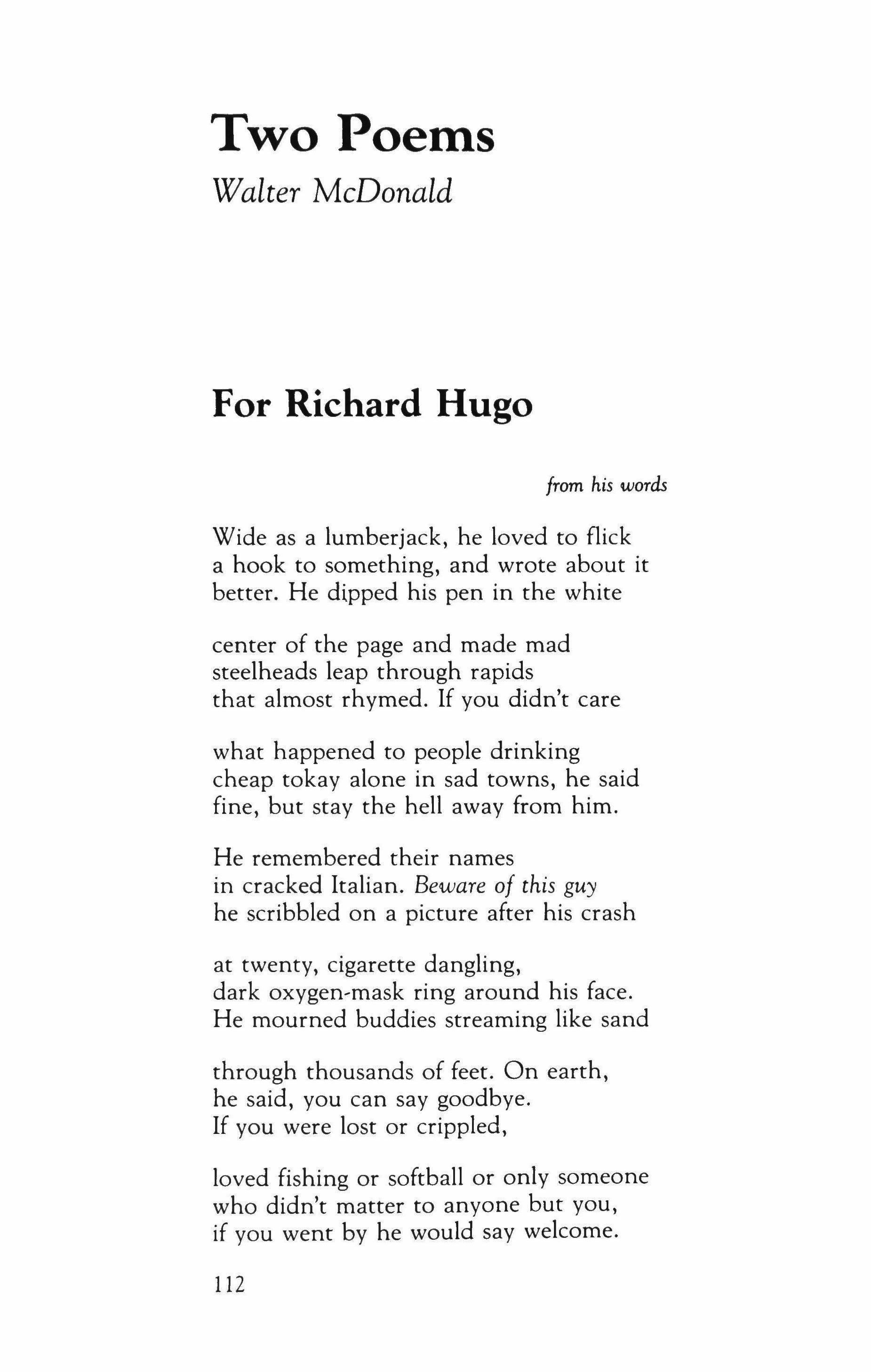
from his words
Wide as a lumberjack, he loved to flick a hook to something, and wrote about it better. He dipped his pen in the white
center of the page and made mad steelheads leap through rapids that almost rhymed. If you didn't care
what happened to people drinking cheap tokay alone in sad towns, he said fine, but stay the hell away from him.
He remembered their names in cracked Italian. Beware of this guy he scribbled on a picture after his crash
at twenty, cigarette dangling, dark oxygen-mask ring around his face. He mourned buddies streaming like sand
through thousands of feet. On earth, he said, you can say goodbye. If you were lost or crippled,
loved fishing or softball or only someone who didn't matter to anyone but you, if you went by he would say welcome.

Someone I flew with has gone to the moon and back. I haven't touched a rudder in ten years, my only cockpit the family wagon with a cracked windshield. Still, I'm up there in famous make-believe,
but I'm dreaming of Stuart, straight-in from 20,000', Dave who scooped a sand crane in the engine but steered away from Waco where he crashed, Keith vaporized when a bomb exploded in midair near Hanoi.
I might have died like Karnes in Georgia, his first night solo. He pitched too steep, and the wings kept rolling. When the controller called Pull up Karnes jerked the stick back tight to his groin, trying to obey at two hundred knots, a thousand feet, wings level by now, but inverted, nose coming down, diving, someone screaming Pull up in his headset.
Chandelles and loops, snap rolls, tight Immelmanns with a twist on topeach turn was to get behind somebody else, nothing beat being second, a touch, a touch on the button to bring him down. The fun meant war. The last aerobatic trick we were taught was the victory roll.

Sometimes, squirting a thin jet to water Texas grass trying to survive another drought, I feel flames in my fingertips and squeeze to strafe begonias like a practice run. At dawn, driving to work, I keep feeling a tingling in my hands and the weight on my backbone in a turn.
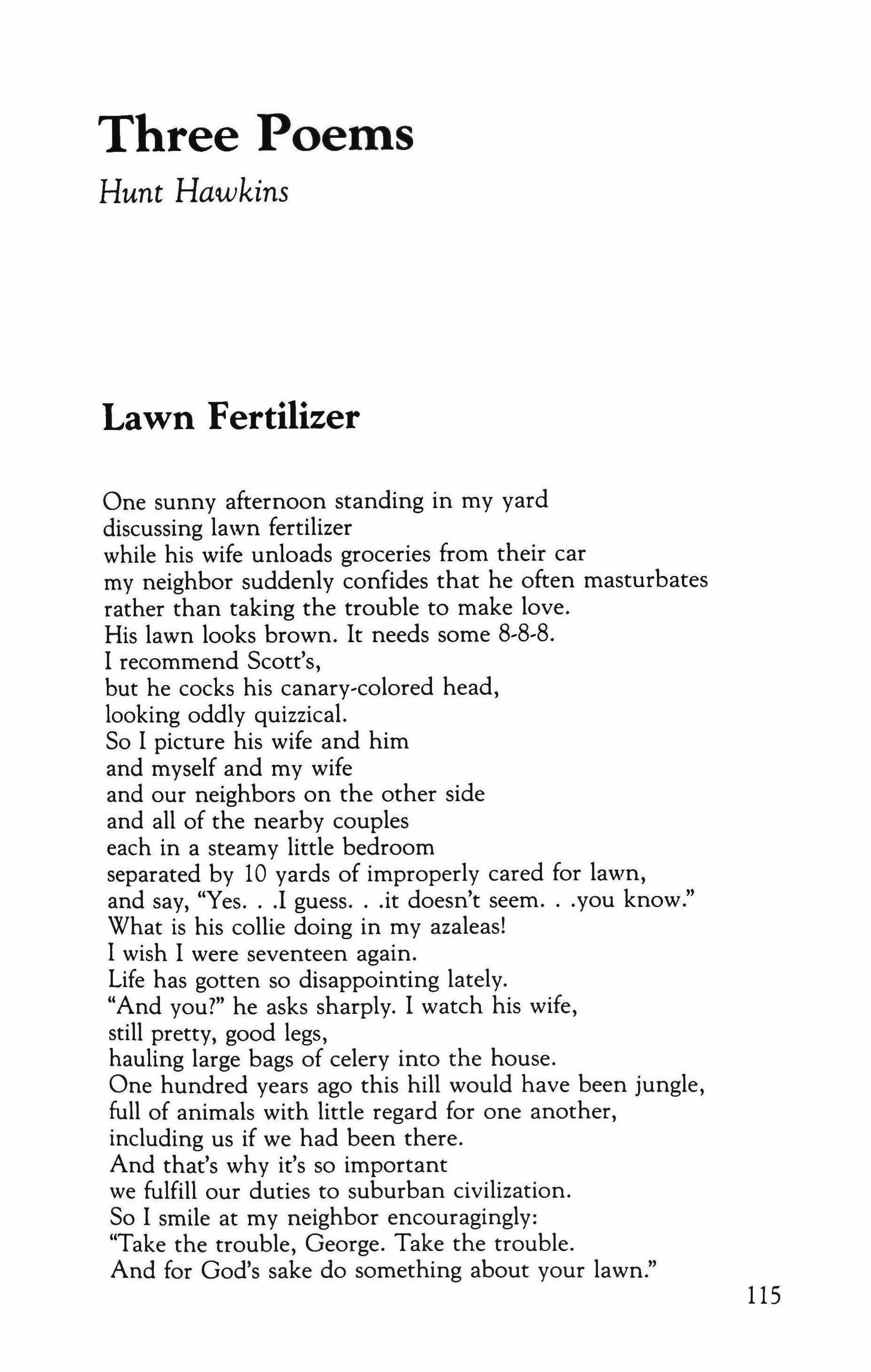
One sunny afternoon standing in my yard discussing lawn fertilizer while his wife unloads groceries from their car my neighbor suddenly confides that he often masturbates rather than taking the trouble to make love. His lawn looks brown. It needs some 8,8,8. I recommend Scott's, but he cocks his canary-colored head, looking oddly quizzical. So I picture his wife and him and myself and my wife and our neighbors on the other side and all of the nearby couples each in a steamy little bedroom separated by 10 yards of improperly cared for lawn, and say, "Yes .1 guess .it doesn't seem you know." What is his collie doing in my azaleas! I wish I were seventeen again. Life has gotten so disappointing lately. "And you?" he asks sharply. I watch his wife, still pretty, good legs, hauling large bags of celery into the house. One hundred years ago this hill would have been jungle, full of animals with little regard for one another, including us if we had been there. And that's why it's so important we fulfill our duties to suburban civilization. So I smile at my neighbor encouragingly: "Take the trouble, George. Take the trouble. And for God's sake do something about your lawn."
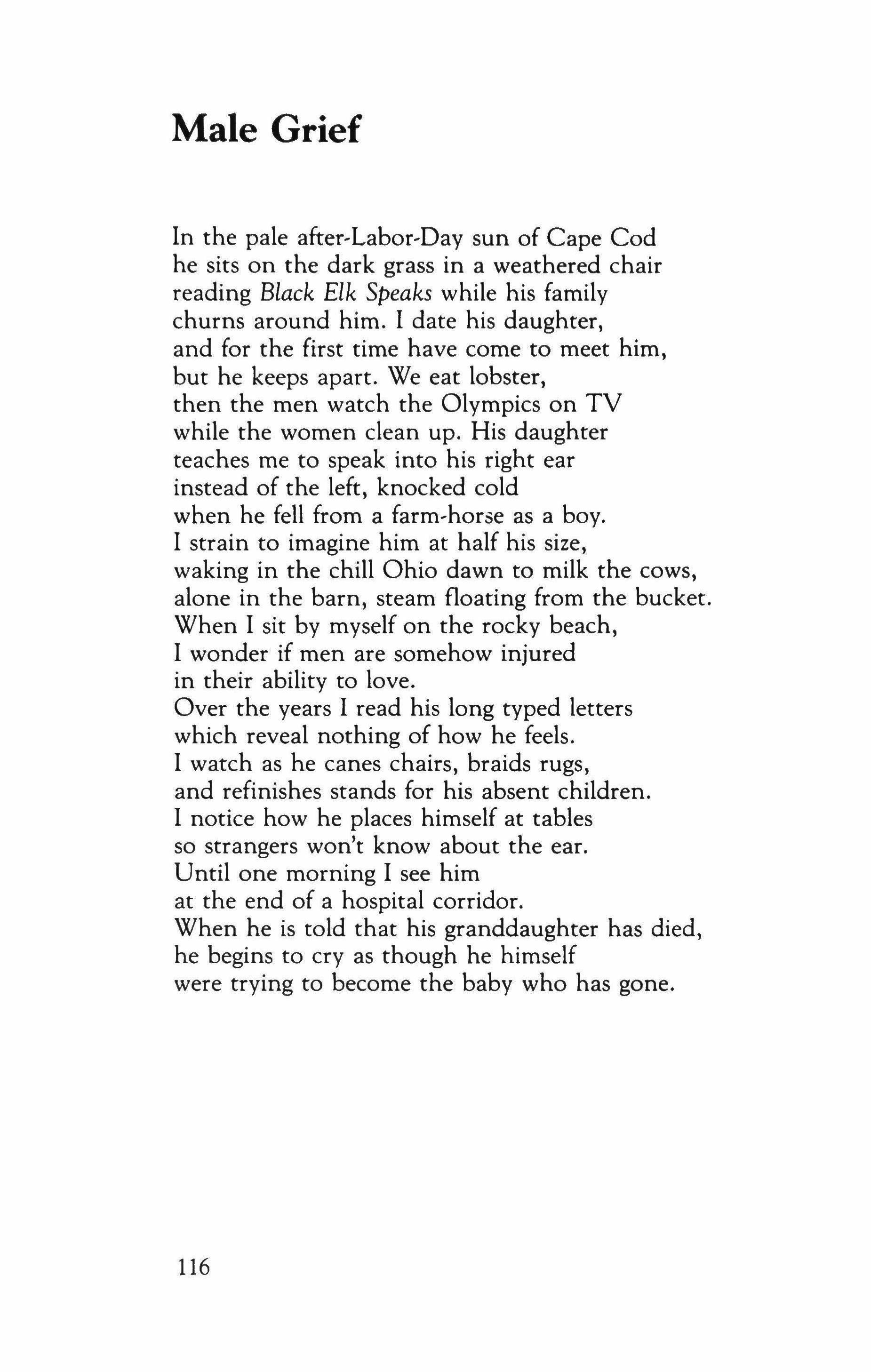
In the pale after-Labor-Day sun of Cape Cod he sits on the dark grass in a weathered chair reading Black Elk Speaks while his family churns around him. I date his daughter, and for the first time have come to meet him, but he keeps apart. We eat lobster, then the men watch the Olympics on TV while the women clean up. His daughter teaches me to speak into his right ear instead of the left, knocked cold when he fell from a farm-horse as a boy. I strain to imagine him at half his size, waking in the chill Ohio dawn to milk the cows, alone in the barn, steam floating from the bucket. When I sit by myself on the rocky beach, I wonder if men are somehow injured in their ability to love.
Over the years I read his long typed letters which reveal nothing of how he feels. I watch as he canes chairs, braids rugs, and refinishes stands for his absent children. I notice how he places himself at tables so strangers won't know about the ear. Until one morning I see him at the end of a hospital corridor. When he is told that his granddaughter has died, he begins to cry as though he himself were trying to become the baby who has gone.
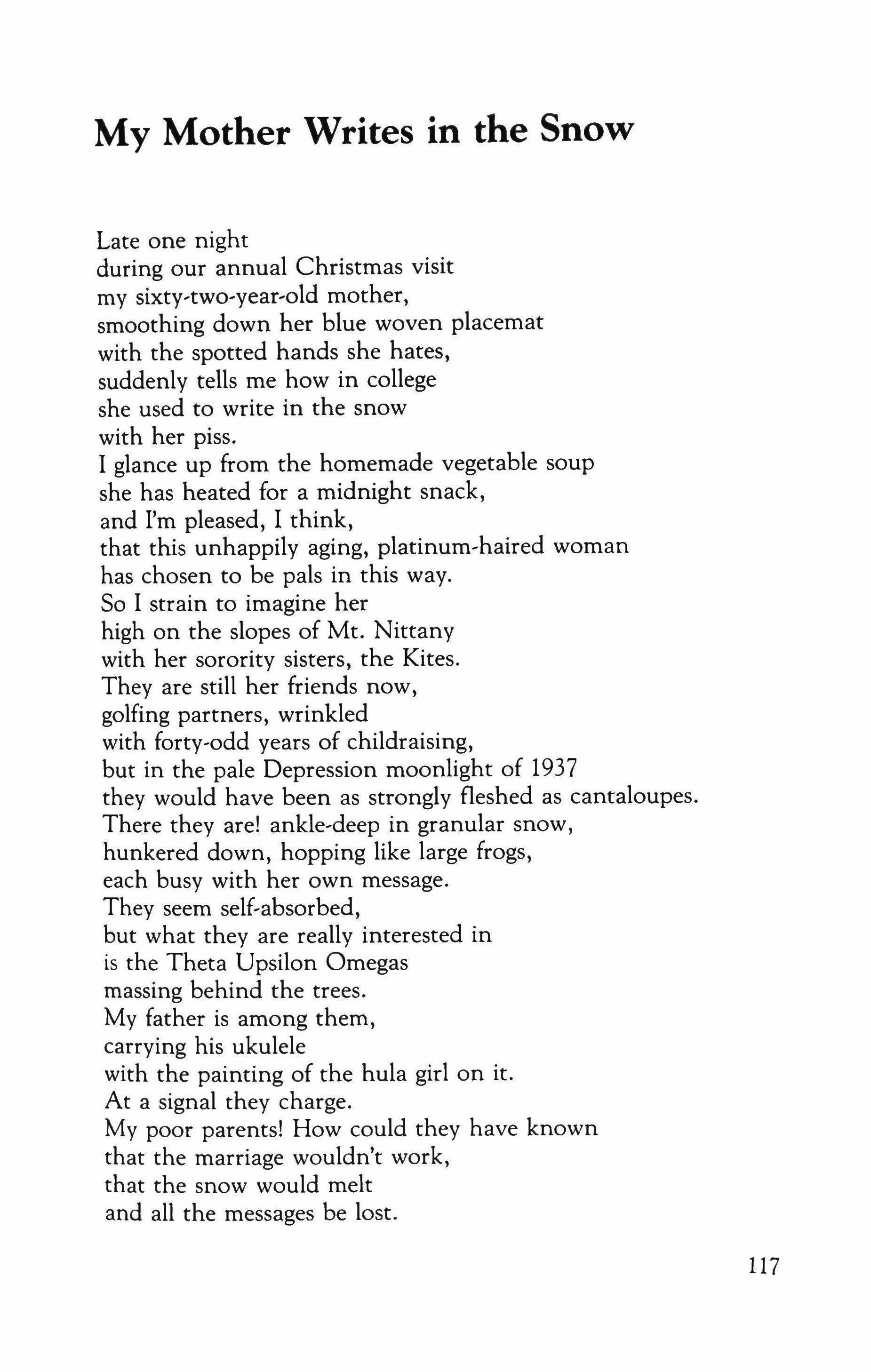
Late one night during our annual Christmas visit my sixty-two-year-old mother, smoothing down her blue woven placemat with the spotted hands she hates, suddenly tells me how in college she used to write in the snow with her piss. I glance up from the homemade vegetable soup she has heated for a midnight snack, and I'm pleased, I think, that this unhappily aging, platinum-haired woman has chosen to be pals in this way. So I strain to imagine her high on the slopes of Mt. Nittany with her sorority sisters, the Kites. They are still her friends now, golfing partners, wrinkled with forty-odd years of childraising, but in the pale Depression moonlight of 1937 they would have been as strongly fleshed as cantaloupes. There they are! ankle-deep in granular snow, hunkered down, hopping like large frogs, each busy with her own message. They seem self-absorbed, but what they are really interested in is the Theta Upsilon Omegas massing behind the trees. My father is among them, carrying his ukulele with the painting of the hula girl on it. At a signal they charge. My poor parents! How could they have known that the marriage wouldn't work, that the snow would melt and all the messages be lost.
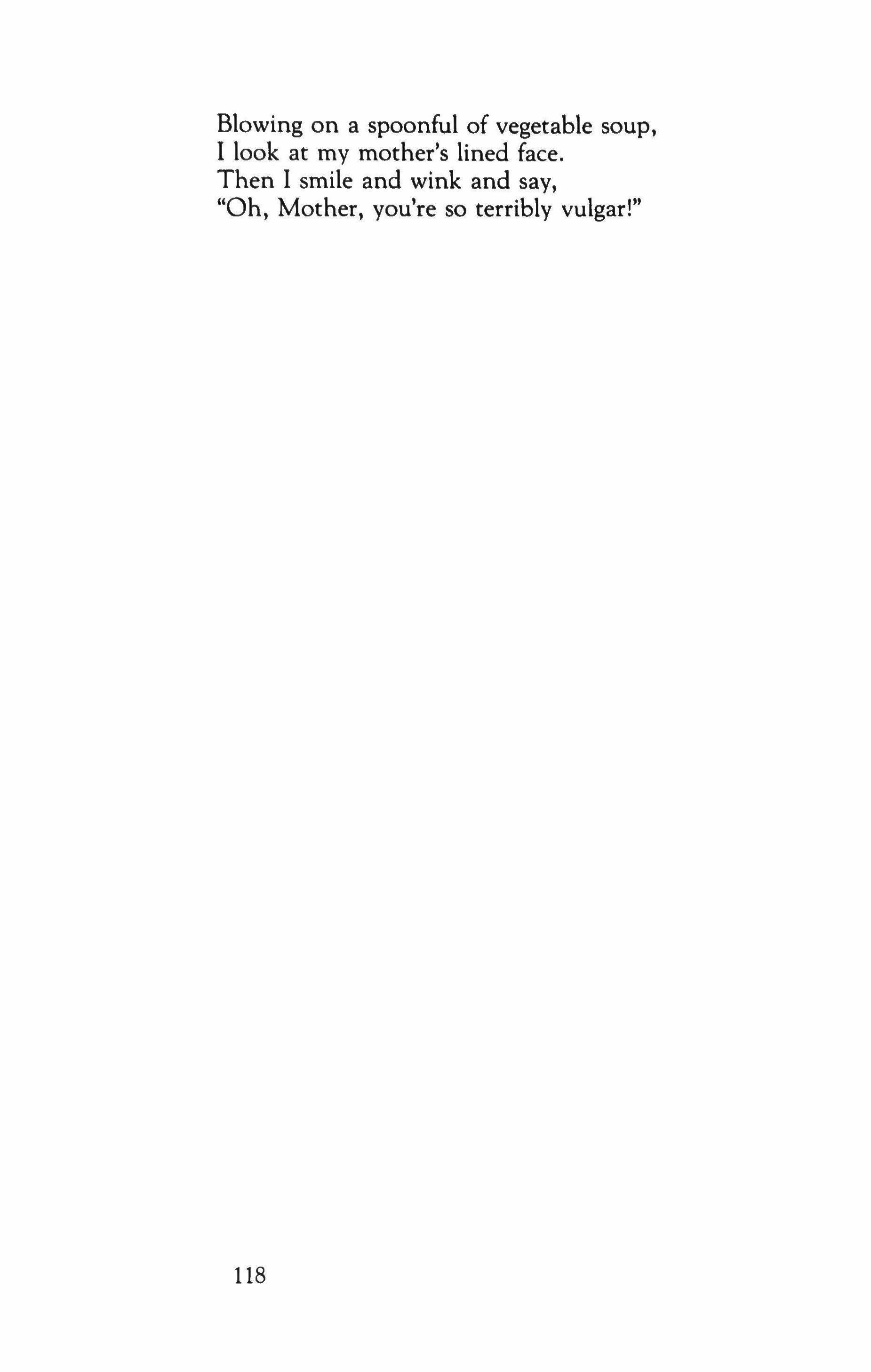
Blowing on a spoonful of vegetable soup, I look at my mother's lined face. Then I smile and wink and say, "Oh, Mother, you're so terribly vulgar!"
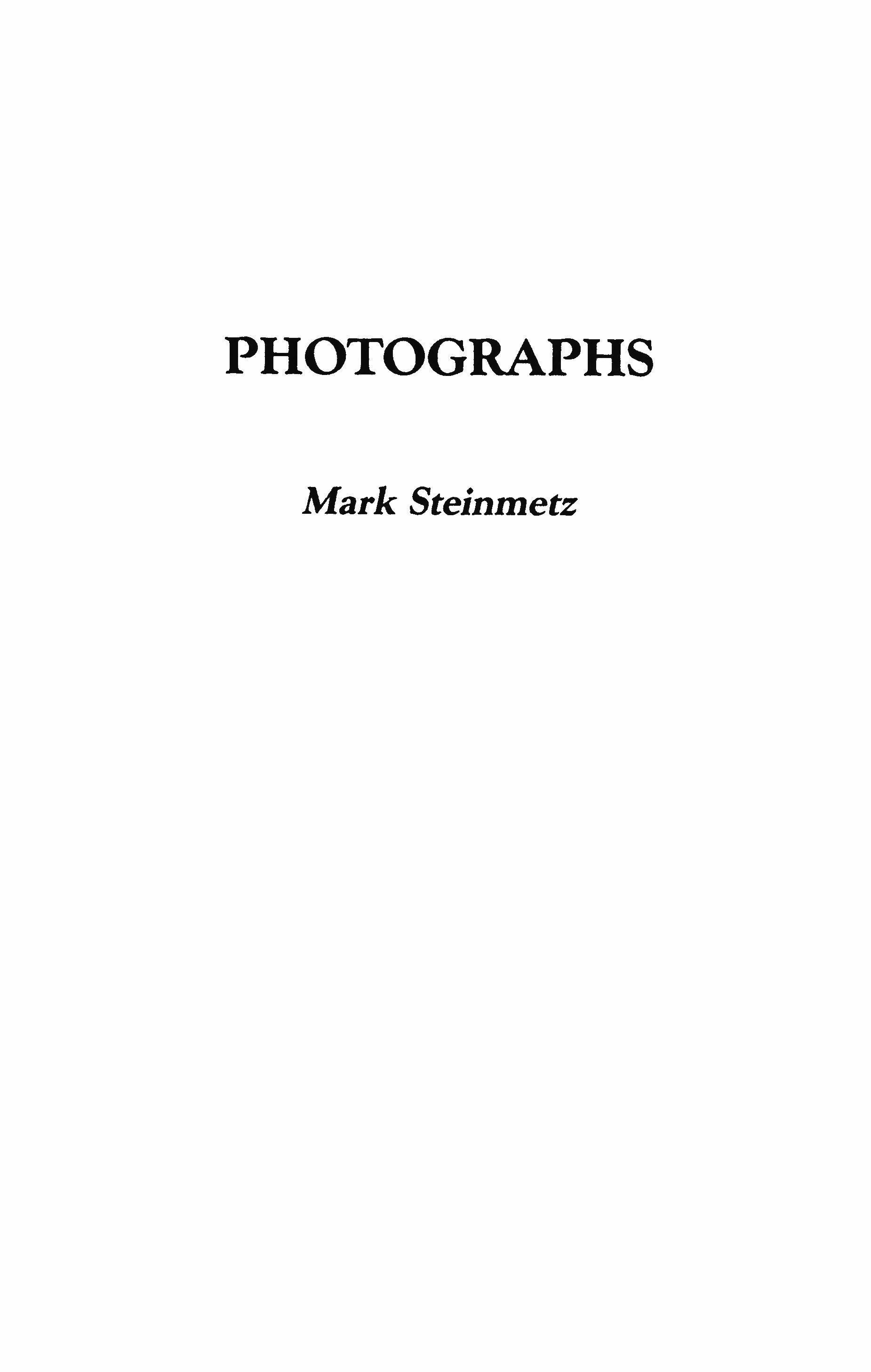


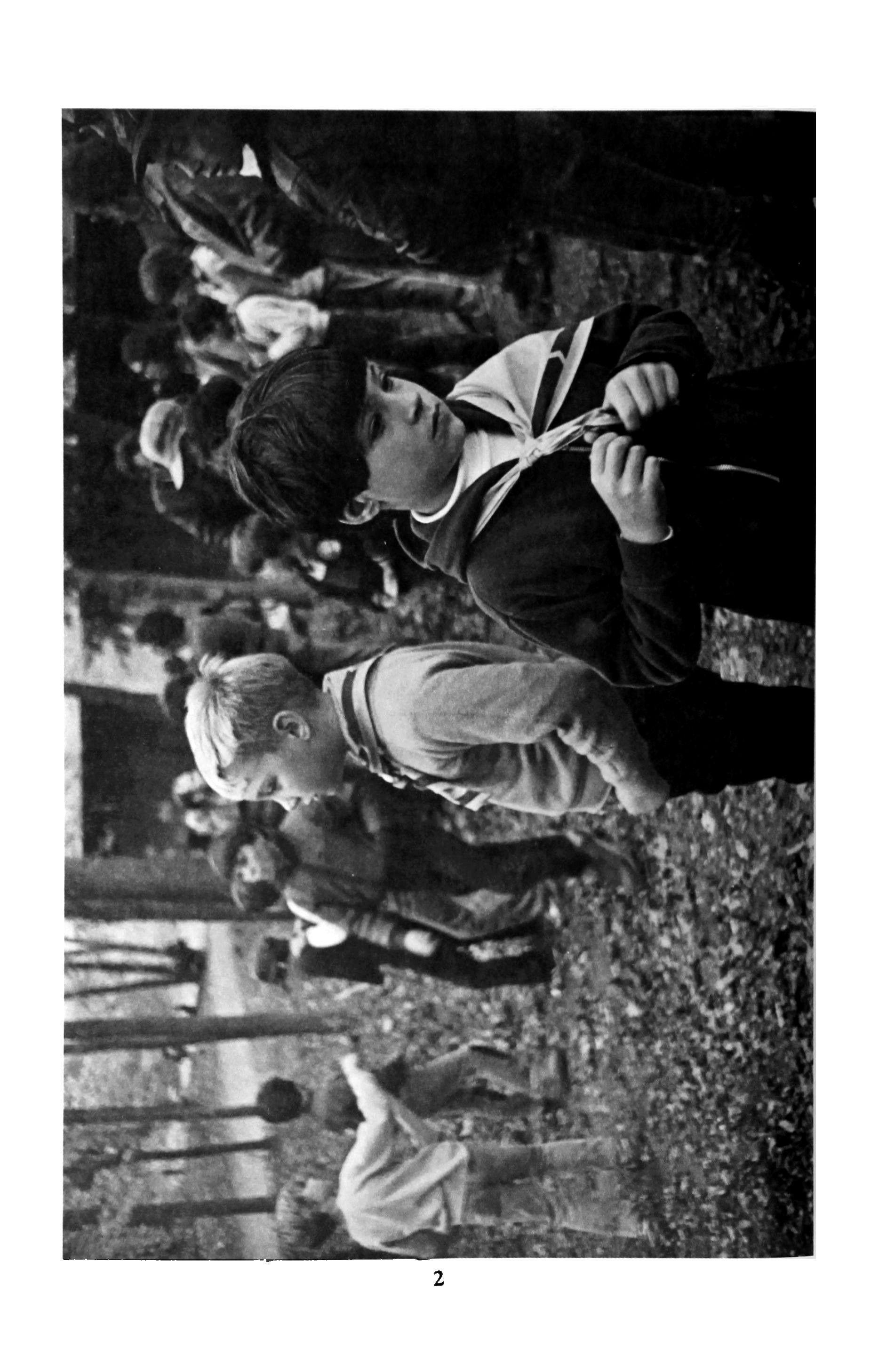




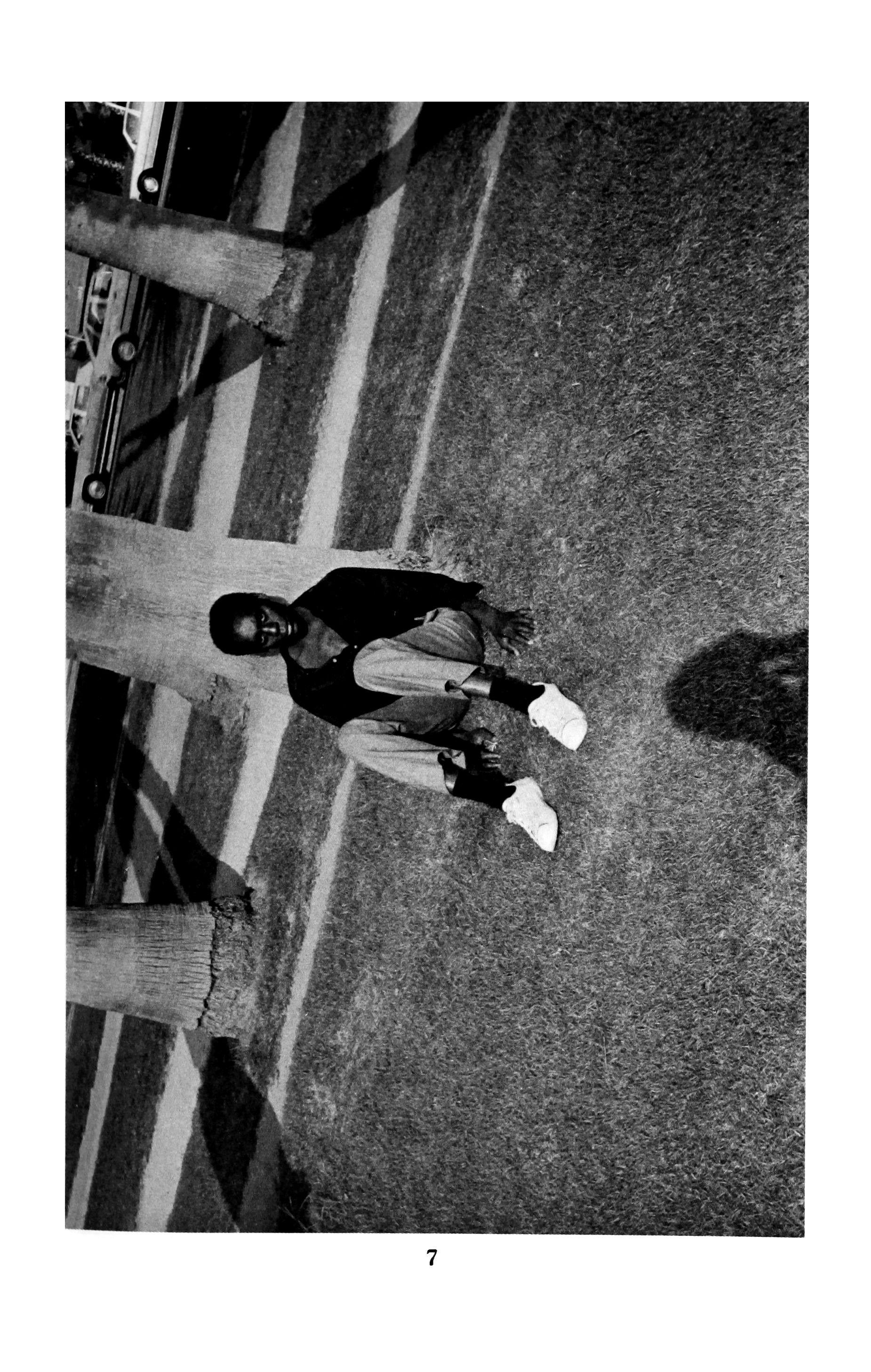

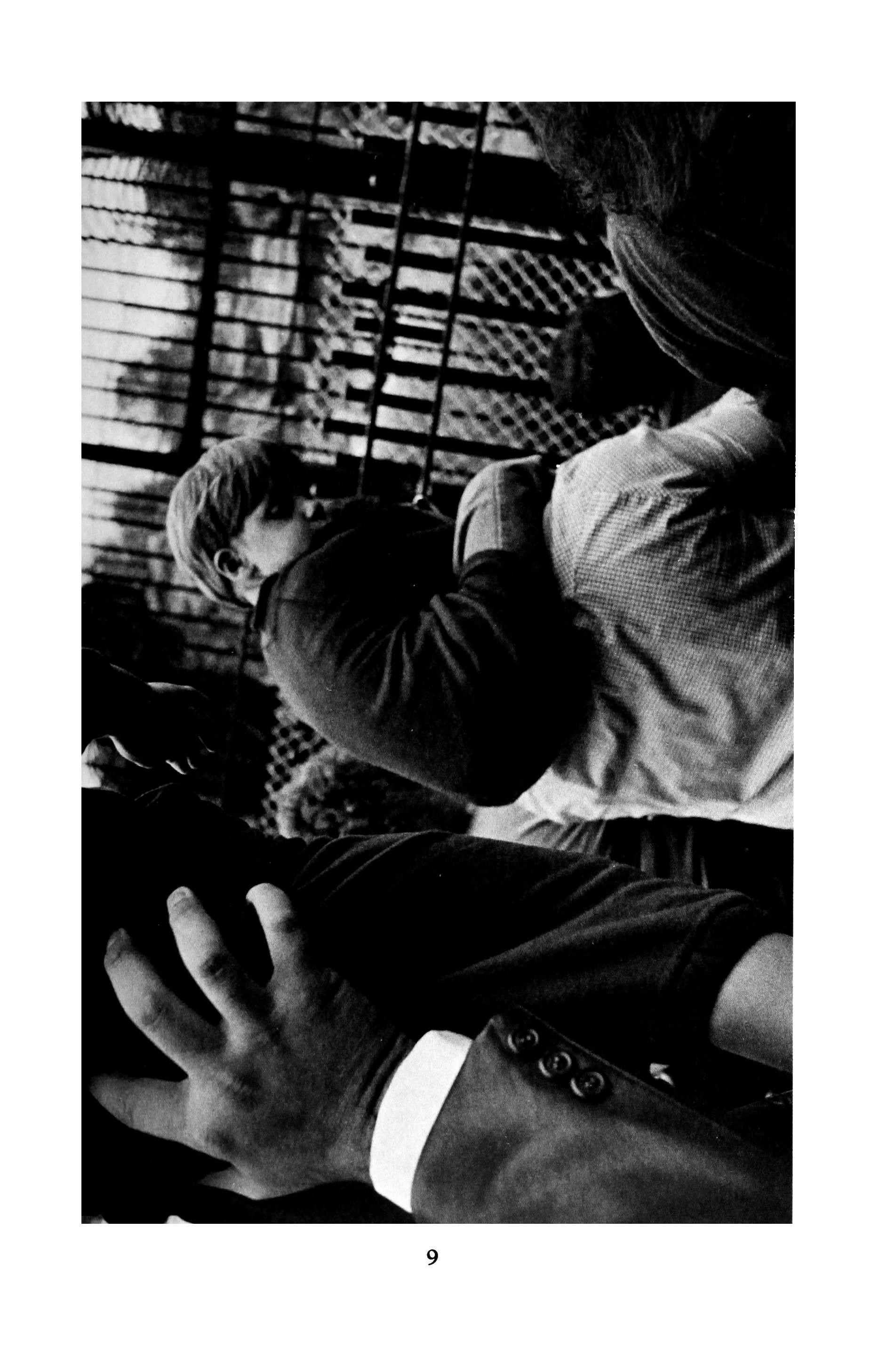

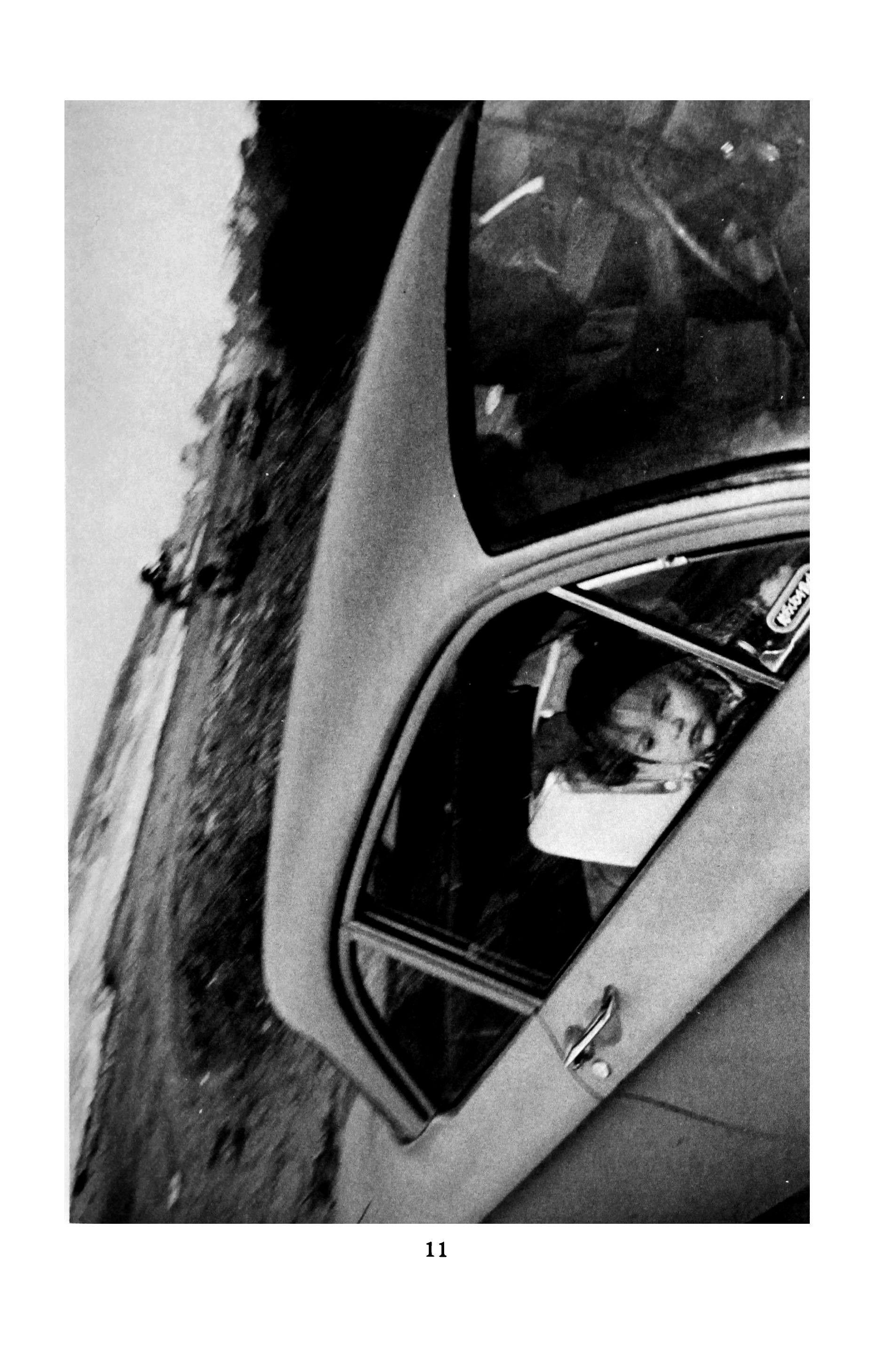
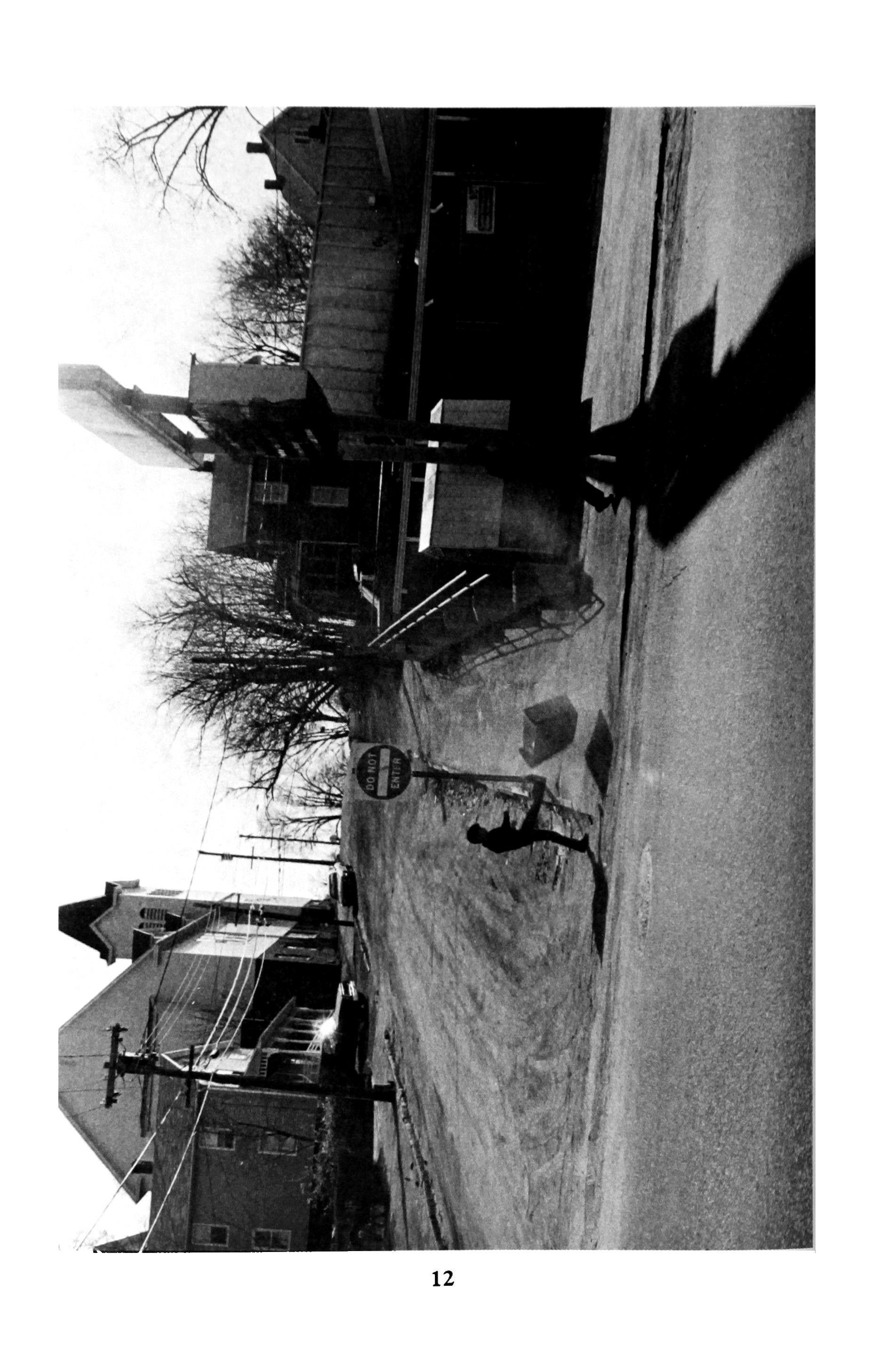

1. Derby, Connecticut, 1982.
2. Connecticut, 1982.
3. Long Beach, California, 1983.
-to Durham Fair, Connecticut, 1982.
5. Eastern States Exposition, West Springfield, Massachusetts, 1984.
6. Eastern States Exposition, West Springfield, Massachusetts, 1"".
7. Santa Monica, California, 1983.
8. Los Angeles, California, 1983.
9. Central Park Zoo, New York City, 1982.
10. France, 1980.
11. Off California Coast Highway, 1983.
12. Shelton, Connecticut, 1985.


When Ruzi told her about Bola, Miss Christina said that ugly English word she never explained in class, and turned bright as hibiscus. Miss was always wet around the mouth and where her hair met her forehead, wet so the strands which didn't reach the knot behind fell like tiny snakes on her cheeks. When angry she was like hibiscus after rain.
"Miss Tomato," the students would say to each other, but Ruzi never saw her that color. Ruzi saw the skin so transparent that blue veins laced the hands, climbed the arms. Veins zigzagged across Miss's feet too, swelling, then flattening with each step as she passed Ruzi's desk. Back in tenth-grade biology, Citizen Emolo had said everyone's blood was blue inside and came out red, yet Ruzi still imagined Miss bleeding blue, like ink.
The first day of school, the new teacher had walked into the senior class trembling on thin spider legs. "Christina James," she wrote on the board, and then, "Benton, New Jersey, U.S.A." The letters were loopy, the lines slanted. Her French was funny but no one laughed; a teacher could punish. Missionaries hit and Africans made you kneel in the sun.
Mrs. Baxter, Ruzi's second-grade teacher at the church school, had taught silence. Noisy people had their knuckles pounded with a ruler. One girl's finger broke.
Miss Christina wasn't with a mission, though. "Volunteer" appeared on the board as she explained the one-year contract. Ruzi understood then that this white was a one-year missionary without a church. Run by the state, Kundu Girls' School had no religion.
Even more puzzling, this woman was single. Old Mrs. Baxter's husband had died, but Miss, with skin smooth as clay, was too young to be alone.

And why would anyone leave rich America?
"Why not?" was the answer, when Nzuzi up front asked. "Africa might have something better than money."
Not in the bush, not at Kundu. The town was so quiet teachers refused to come, they all worked in Bossiville. The principal still hadn't found a math and physics teacher for this year. What was there to do?no music, no bars, no cinemas, no life. Nothing but school.
"I like quiet," said Miss Christina. "It's clean."
Ruzi agreed, whites needed to slow down. The arm jerked across the blackboard, squeaking chalk. Pins were slipping from the knot of hair that looked crazy as a forest, with things hanging everywhere. If the hair were separated into eight parts, each knotted tightly to the scalp, Miss might be pretty. If she ate yams her face might get round, her nose less narrow. If she smiled.
Ruzi could braid beautifully. She'd learned on her mother and sisters, then her mother's friends and their daughters, fitting designs to each head's shape. She would memorize the newest Bossi styles on strangers in buses. Then, when Ruzi left the city for secondary school, her mother began going to the chic salons herself. Ruzi's technique became professional; each time she returned from Kundu for a holiday she could unravel the thread and pull apart the intricately woven tufts of her mother's stiff hair to redo the same style immediately on Mbengi, her sister. Mbengi strutted each experiment for days, refusing to carry anything on her head, until her mother yelled, "Lazy! Get away from the mirror and help Ruzi with the clothes. You're too pretty for your age."
Ruzi, though, would point to an empty stool on the patio and tell Mbengi about Kundu while the sister sat watching. Laundry was Mbengi's chore now but Ruzi was happy with her arms wet to the elbows, dipping cloth after cloth into pails of sudsy water. Her two smaller sisters always squeezed into Mbengi's patch of shade and listened too, eyes wide at Ruzi's stories of dormitory rats, or of the red, sticky, rainy-season mud.
"Is it like the village?" asked the youngest once.
"No. All the buildings are cement, and there's electricity. It's school, I spend every morning in a classroom reading and writing, just like you will next year, except you'll come home every day. I wish I still did."
"Simon and Tuli like their school."
Her brothers were both smart. Even during vacations they read books, traded and then offered them to Ruzi, who laughed.
"They're boys:' she said.
When her mother had told her she was going away to school, Ruzi
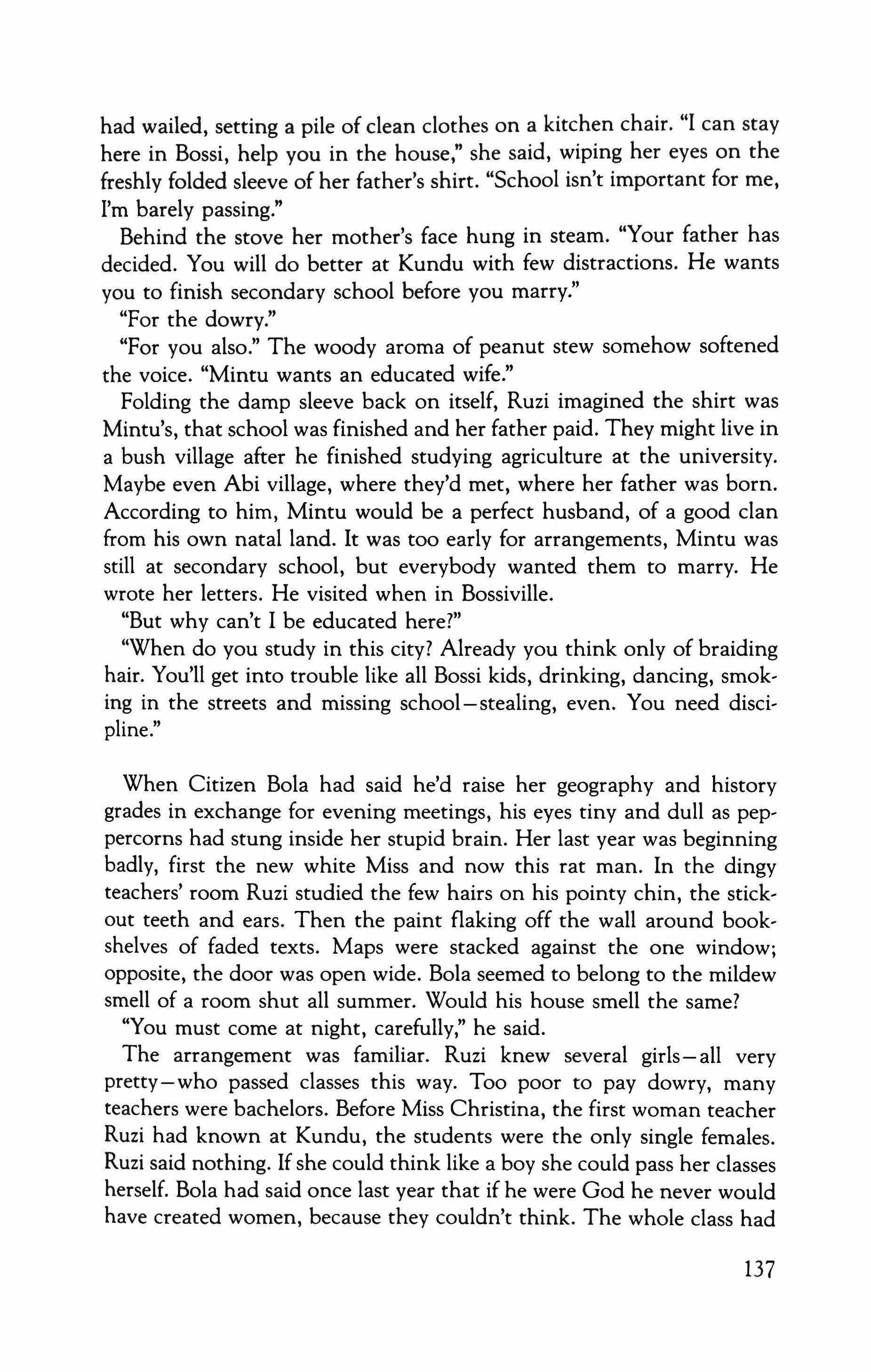
had wailed, setting a pile of clean clothes on a kitchen chair. "I can stay here in Bossi, help you in the house," she said, wiping her eyes on the freshly folded sleeve of her father's shirt. "School isn't important for me, I'm barely passing."
Behind the stove her mother's face hung in steam. "Your father has decided. You will do better at Kundu with few distractions. He wants you to finish secondary school before you marry."
"For the dowry."
"For you also." The woody aroma of peanut stew somehow softened the voice. "Mintu wants an educated wife."
Folding the damp sleeve back on itself, Ruzi imagined the shirt was Mintu's, that school was finished and her father paid. They might live in a bush village after he finished studying agriculture at the university. Maybe even Abi village, where they'd met, where her father was born. According to him, Mintu would be a perfect husband, of a good clan from his own natal land. It was too early for arrangements, Mintu was still at secondary school, but everybody wanted them to marry. He wrote her letters. He visited when in Bossiville.
"But why can't I be educated here?"
"When do you study in this city? Already you think only of braiding hair. You'll get into trouble like all Bossi kids, drinking, dancing, smoking in the streets and missing school-stealing, even. You need discipline."
When Citizen Bola had said he'd raise her geography and history grades in exchange for evening meetings, his eyes tiny and dull as peppercorns had stung inside her stupid brain. Her last year was beginning badly, first the new white Miss and now this rat man. In the dingy teachers' room Ruzi studied the few hairs on his pointy chin, the stickout teeth and ears. Then the paint flaking off the wall around bookshelves of faded texts. Maps were stacked against the one window; opposite, the door was open wide. Bola seemed to belong to the mildew smell of a room shut all summer. Would his house smell the same?
"You must come at night, carefully," he said.
The arrangement was familiar. Ruzi knew several girls-all very pretty-who passed classes this way. Too poor to pay dowry, many teachers were bachelors. Before Miss Christina, the first woman teacher Ruzi had known at Kundu, the students were the only single females. Ruzi said nothing. If she could think like a boy she could pass her classes herself. Bola had said once last year that if he were God he never would have created women, because they couldn't think. The whole class had
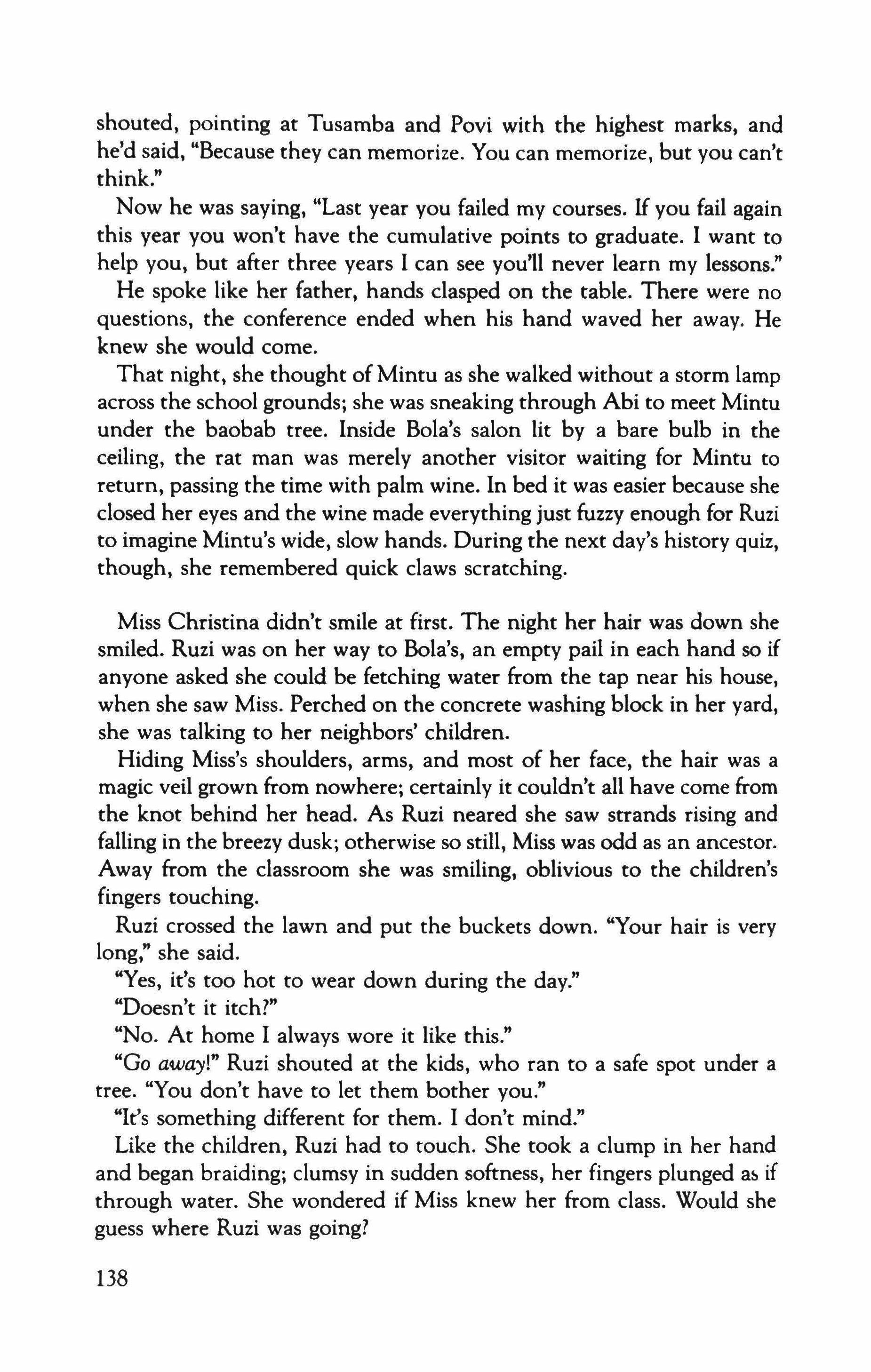
shouted, pointing at Tusamba and Povi with the highest marks, and he'd said, "Because they can memorize. You can memorize, but you can't think."
Now he was saying, "Last year you failed my courses. If you fail again this year you won't have the cumulative points to graduate. I want to help you, but after three years I can see you'll never learn my lessons."
He spoke like her father, hands clasped on the table. There were no questions, the conference ended when his hand waved her away. He knew she would come.
That night, she thought of Mintu as she walked without a storm lamp across the school grounds; she was sneaking through Abi to meet Mintu under the baobab tree. Inside Bola's salon lit by a bare bulb in the ceiling, the rat man was merely another visitor waiting for Mintu to return, passing the time with palm wine. In bed it was easier because she closed her eyes and the wine made everything just fuzzy enough for Ruzi to imagine Mintu's wide, slow hands. During the next day's history quiz, though, she remembered quick claws scratching.
Miss Christina didn't smile at first. The night her hair was down she smiled. Ruzi was on her way to Bola's, an empty pail in each hand so if anyone asked she could be fetching water from the tap near his house, when she saw Miss. Perched on the concrete washing block in her yard, she was talking to her neighbors' children.
Hiding Miss's shoulders, arms, and most of her face, the hair was a magic veil grown from nowhere; certainly it couldn't all have come from the knot behind her head. As Ruzi neared she saw strands rising and falling in the breezy dusk; otherwise so still, Miss was odd as an ancestor. Away from the classroom she was smiling, oblivious to the children's fingers touching.
Ruzi crossed the lawn and put the buckets down. "Your hair is very long," she said.
"Yes, it's too hot to wear down during the day."
"Doesn't it itch?"
"No. At home I always wore it like this."
"Go away!" Ruzi shouted at the kids, who ran to a safe spot under a tree. "You don't have to let them bother you."
"It's something different for them. I don't mind."
Like the children, Ruzi had to touch. She took a clump in her hand and began braiding; clumsy in sudden softness, her fingers plunged as if through water. She wondered if Miss knew her from class. Would she guess where Ruzi was going?
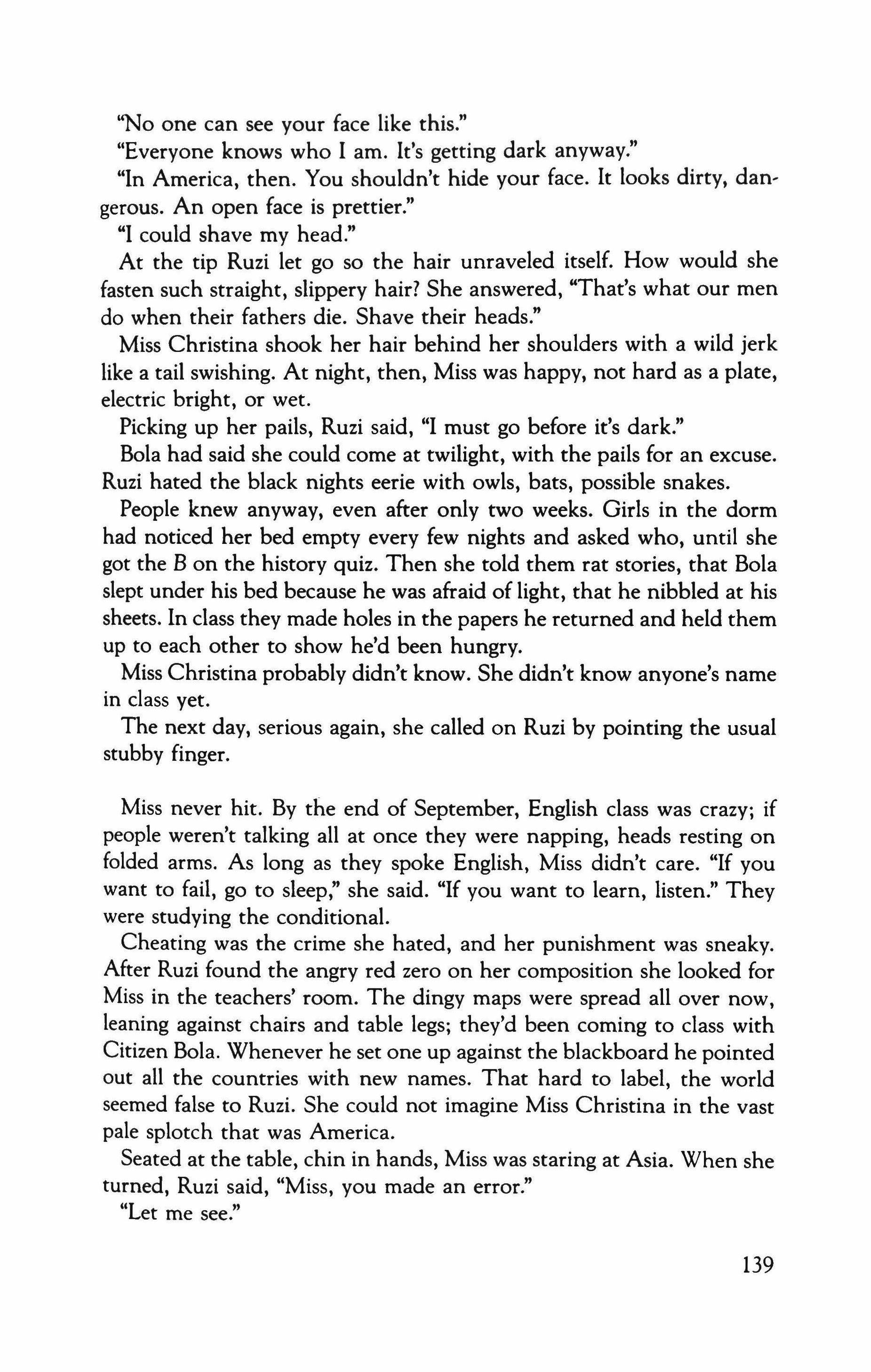
"No one can see your face like this."
"Everyone knows who I am. It's getting dark anyway."
"In America, then. You shouldn't hide your face. It looks dirty, dan, gerous. An open face is prettier."
"I could shave my head."
At the tip Ruzi let go so the hair unraveled itself. How would she fasten such straight, slippery hair? She answered, "That's what our men do when their fathers die. Shave their heads."
Miss Christina shook her hair behind her shoulders with a wild jerk like a tail swishing. At night, then, Miss was happy, not hard as a plate, electric bright, or wet.
Picking up her pails, Ruzi said, "I must go before it's dark."
Bola had said she could come at twilight, with the pails for an excuse. Ruzi hated the black nights eerie with owls, bats, possible snakes.
People knew anyway, even after only two weeks. Girls in the dorm had noticed her bed empty every few nights and asked who, until she got the B on the history quiz. Then she told them rat stories, that Bola slept under his bed because he was afraid of light, that he nibbled at his sheets. In class they made holes in the papers he returned and held them up to each other to show he'd been hungry.
Miss Christina probably didn't know. She didn't know anyone's name in class yet.
The next day, serious again, she called on Ruzi by pointing the usual stubby finger.
Miss never hit. By the end of September, English class was crazy; if people weren't talking all at once they were napping, heads resting on folded arms. As long as they spoke English, Miss didn't care. "If you want to fail, go to sleep," she said. "If you want to learn, listen." They were studying the conditional.
Cheating was the crime she hated, and her punishment was sneaky. After Ruzi found the angry red zero on her composition she looked for Miss in the teachers' room. The dingy maps were spread all over now, leaning against chairs and table legs; they'd been coming to class with Citizen Bola. Whenever he set one up against the blackboard he pointed out all the countries with new names. That hard to label, the world seemed false to Ruzi. She could not imagine Miss Christina in the vast pale splotch that was America.
Seated at the table, chin in hands, Miss was staring at Asia. When she turned, Ruzi said, "Miss, you made an error."
"Let me see."
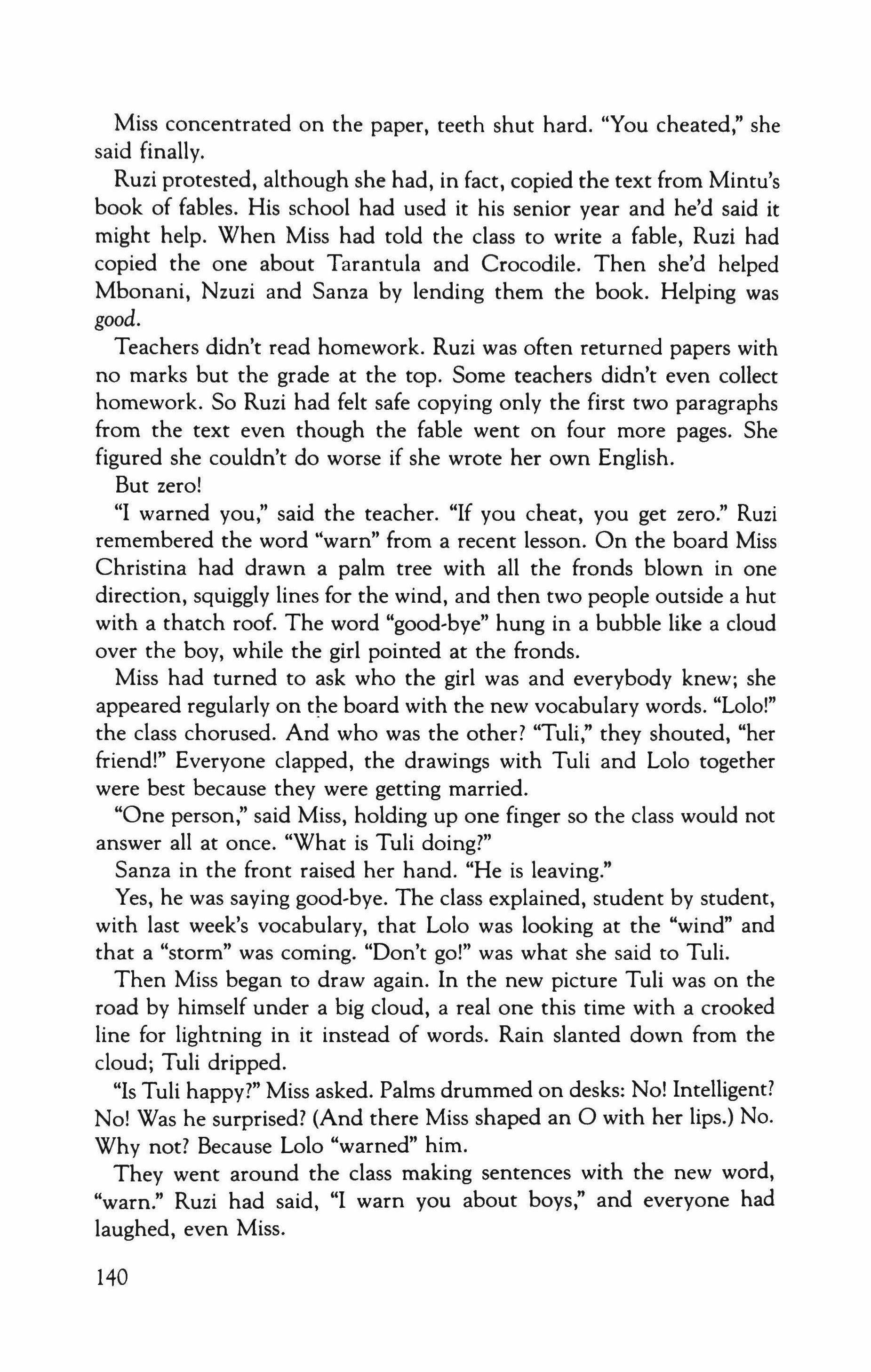
Miss concentrated on the paper, teeth shut hard. "You cheated," she said finally.
Ruzi protested, although she had, in fact, copied the text from Mintu's book of fables. His school had used it his senior year and he'd said it might help. When Miss had told the class to write a fable, Ruzi had copied the one about Tarantula and Crocodile. Then she'd helped Mbonani, Nzuzi and Sanza by lending them the book. Helping was good.
Teachers didn't read homework. Ruzi was often returned papers with no marks but the grade at the top. Some teachers didn't even collect homework. So Ruzi had felt safe copying only the first two paragraphs from the text even though the fable went on four more pages. She figured she couldn't do worse if she wrote her own English.
But zero!
"I warned you," said the teacher. "If you cheat, you get zero." Ruzi remembered the word "warn" from a recent lesson. On the board Miss Christina had drawn a palm tree with all the fronds blown in one direction, squiggly lines for the wind, and then two people outside a hut with a thatch roof. The word "good-bye" hung in a bubble like a cloud over the boy, while the girl pointed at the fronds.
Miss had turned to ask who the girl was and everybody knew; she appeared regularly on the board with the new vocabulary words. "Lolo!" the class chorused. And who was the other? "Tuli," they shouted, "her friend!" Everyone clapped, the drawings with Tuli and Lolo together were best because they were getting married.
"One person," said Miss, holding up one finger so the class would not answer all at once. "What is Tuli doing?"
Sanza in the front raised her hand. "He is leaving."
Yes, he was saying good-bye. The class explained, student by student, with last week's vocabulary, that Lolo was looking at the "wind" and that a "storm" was coming. "Don't go!" was what she said to Tuli.
Then Miss began to draw again. In the new picture Tuli was on the road by himself under a big cloud, a real one this time with a crooked line for lightning in it instead of words. Rain slanted down from the cloud; Tuli dripped.
"Is Tuli happy?" Miss asked. Palms drummed on desks: No! Intelligent? No! Was he surprised? (And there Miss shaped an 0 with her lips.) No. Why not? Because Lolo "warned" him.
They went around the class making sentences with the new word, "warn." Ruzi had said, "I warn you about boys," and everyone had laughed, even Miss.
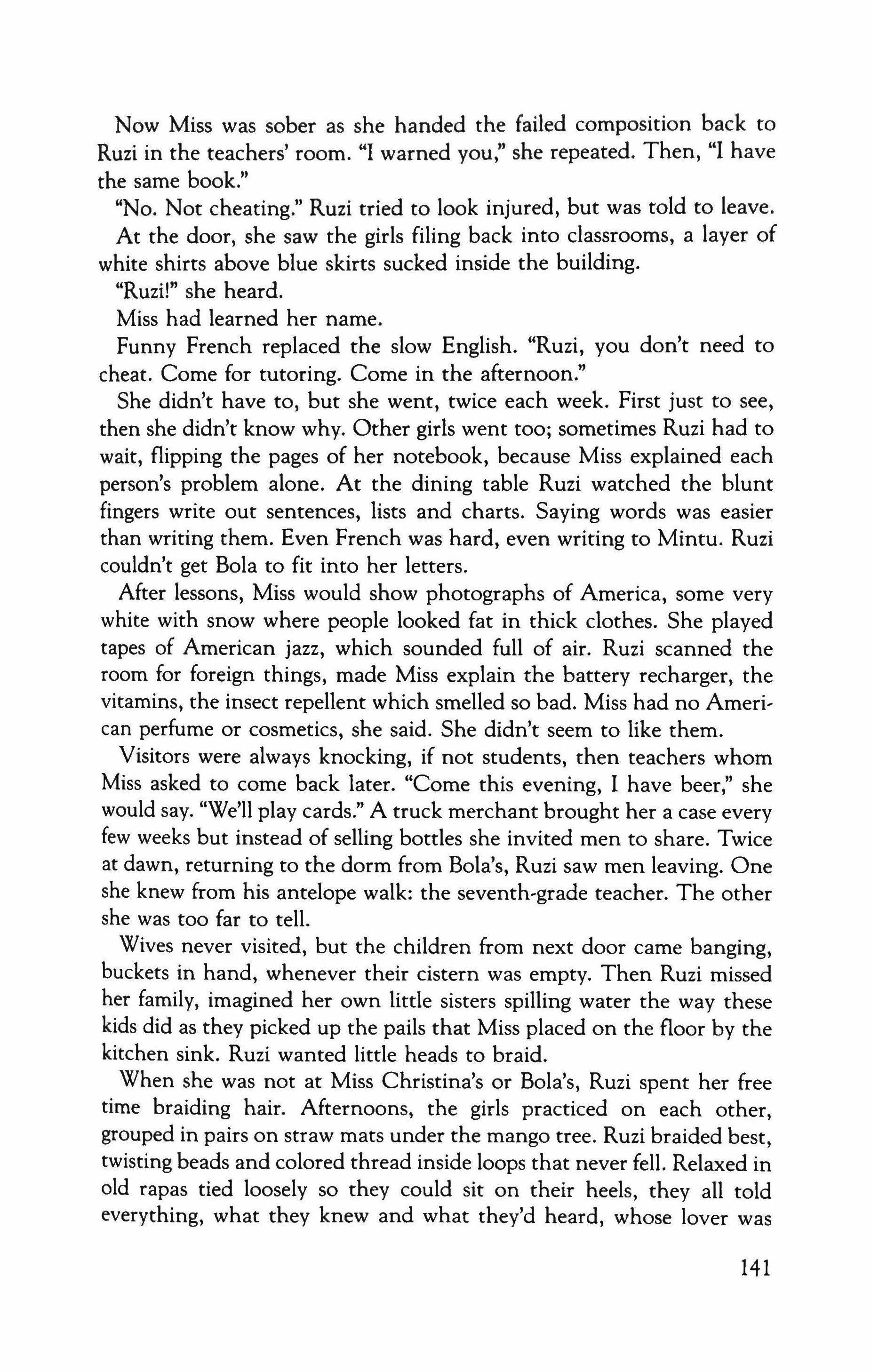
Now Miss was sober as she handed the failed composition back to Ruzi in the teachers' room. "I warned you," she repeated. Then, "I have the same book."
"No. Not cheating." Ruzi tried to look injured, but was told to leave. At the door, she saw the girls filing back into classrooms, a layer of white shirts above blue skirts sucked inside the building. "Ruzi!" she heard.
Miss had learned her name.
Funny French replaced the slow English. "Ruzi, you don't need to cheat. Come for tutoring. Come in the afternoon."
She didn't have to, but she went, twice each week. First just to see, then she didn't know why. Other girls went too; sometimes Ruzi had to wait, flipping the pages of her notebook, because Miss explained each person's problem alone. At the dining table Ruzi watched the blunt fingers write out sentences, lists and charts. Saying words was easier than writing them. Even French was hard, even writing to Mintu. Ruzi couldn't get Bola to fit into her letters.
After lessons, Miss would show photographs of America, some very white with snow where people looked fat in thick clothes. She played tapes of American jazz, which sounded full of air. Ruzi scanned the room for foreign things, made Miss explain the battery recharger, the vitamins, the insect repellent which smelled so bad. Miss had no American perfume or cosmetics, she said. She didn't seem to like them.
Visitors were always knocking, if not students, then teachers whom Miss asked to come back later. "Come this evening, I have beer," she would say. "We'll play cards." A truck merchant brought her a case every few weeks but instead of selling bottles she invited men to share. Twice at dawn, returning to the dorm from Bola's, Ruzi saw men leaving. One she knew from his antelope walk: the seventh-grade teacher. The other she was too far to tell.
Wives never visited, but the children from next door came banging, buckets in hand, whenever their cistern was empty. Then Ruzi missed her family, imagined her own little sisters spilling water the way these kids did as they picked up the pails that Miss placed on the floor by the kitchen sink. Ruzi wanted little heads to braid.
When she was not at Miss Christina's or Bola's, Ruzi spent her free time braiding hair. Afternoons, the girls practiced on each other, grouped in pairs on straw mats under the mango tree. Ruzi braided best, twisting beads and colored thread inside loops that never fell. Relaxed in old rapas tied loosely so they could sit on their heels, they all told everything, what they knew and what they'd heard, whose lover was
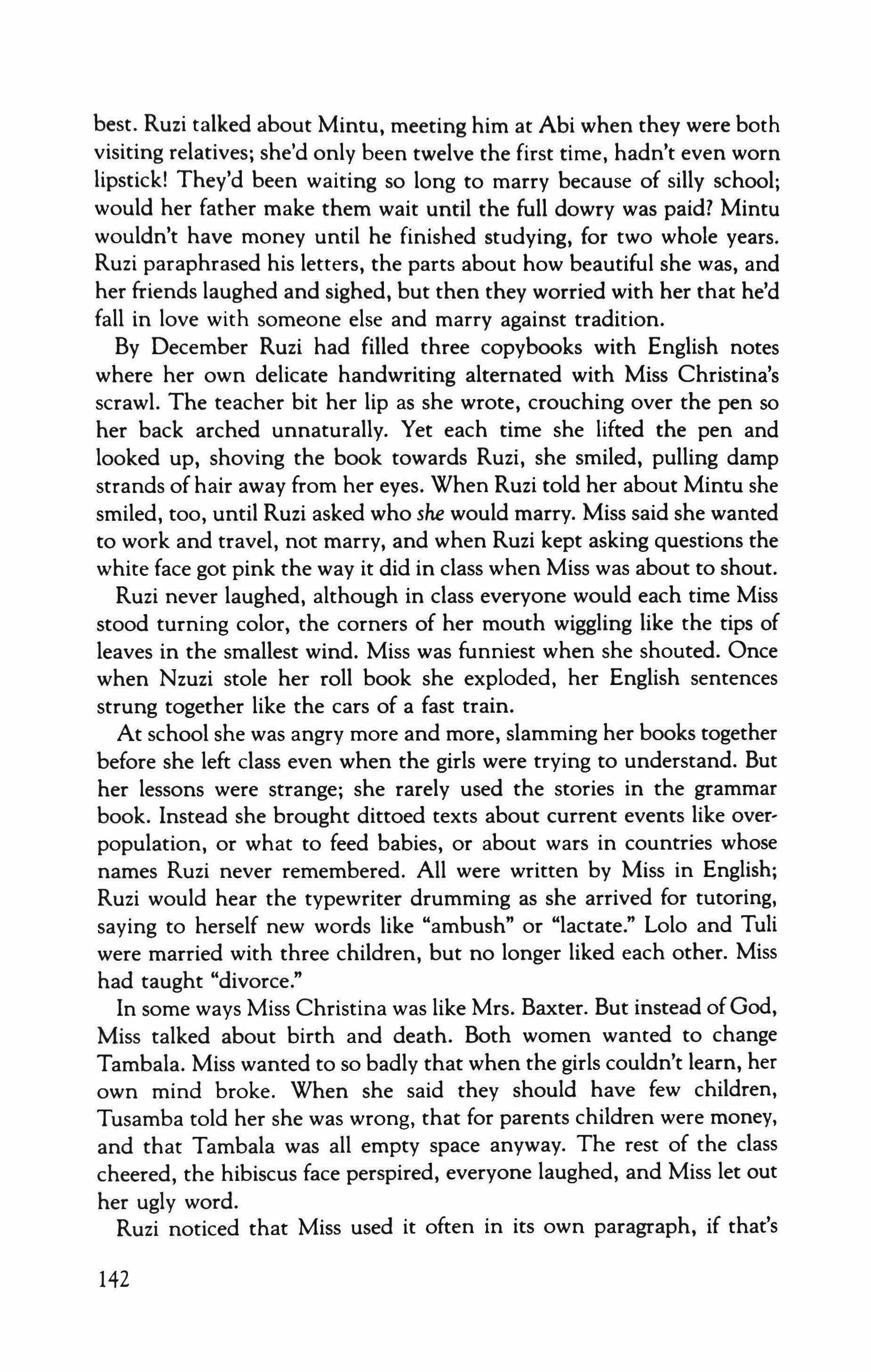
best. Ruzi talked about Mintu, meeting him at Abi when they were both visiting relatives; she'd only been twelve the first time, hadn't even worn lipstick! They'd been waiting so long to marry because of silly school; would her father make them wait until the full dowry was paid? Mintu wouldn't have money until he finished studying, for two whole years. Ruzi paraphrased his letters, the parts about how beautiful she was, and her friends laughed and sighed, but then they worried with her that he'd fall in love with someone else and marry against tradition.
By December Ruzi had filled three copybooks with English notes where her own delicate handwriting alternated with Miss Christina's scrawl. The teacher bit her lip as she wrote, crouching over the pen so her back arched unnaturally. Yet each time she lifted the pen and looked up, shoving the book towards Ruzi, she smiled, pulling damp strands of hair away from her eyes. When Ruzi told her about Mintu she smiled, too, until Ruzi asked who she would marry. Miss said she wanted to work and travel, not marry, and when Ruzi kept asking questions the white face got pink the way it did in class when Miss was about to shout.
Ruzi never laughed, although in class everyone would each time Miss stood turning color, the corners of her mouth wiggling like the tips of leaves in the smallest wind. Miss was funniest when she shouted. Once when Nzuzi stole her roll book she exploded, her English sentences strung together like the cars of a fast train.
At school she was angry more and more, slamming her books together before she left class even when the girls were trying to understand. But her lessons were strange; she rarely used the stories in the grammar book. Instead she brought dittoed texts about current events like overpopulation, or what to feed babies, or about wars in countries whose names Ruzi never remembered. All were written by Miss in English; Ruzi would hear the typewriter drumming as she arrived for tutoring, saying to herself new words like "ambush" or "lactate." Lola and Tuli were married with three children, but no longer liked each other. Miss had taught "divorce."
In some ways Miss Christina was like Mrs. Baxter. But instead ofGod, Miss talked about birth and death. Both women wanted to change Tambala. Miss wanted to so badly that when the girls couldn't learn, her own mind broke. When she said they should have few children, Tusamba told her she was wrong, that for parents children were money, and that Tambala was all empty space anyway. The rest of the class cheered, the hibiscus face perspired, everyone laughed, and Miss let out her ugly word.
Ruzi noticed that Miss used it often in its own paragraph, if that's
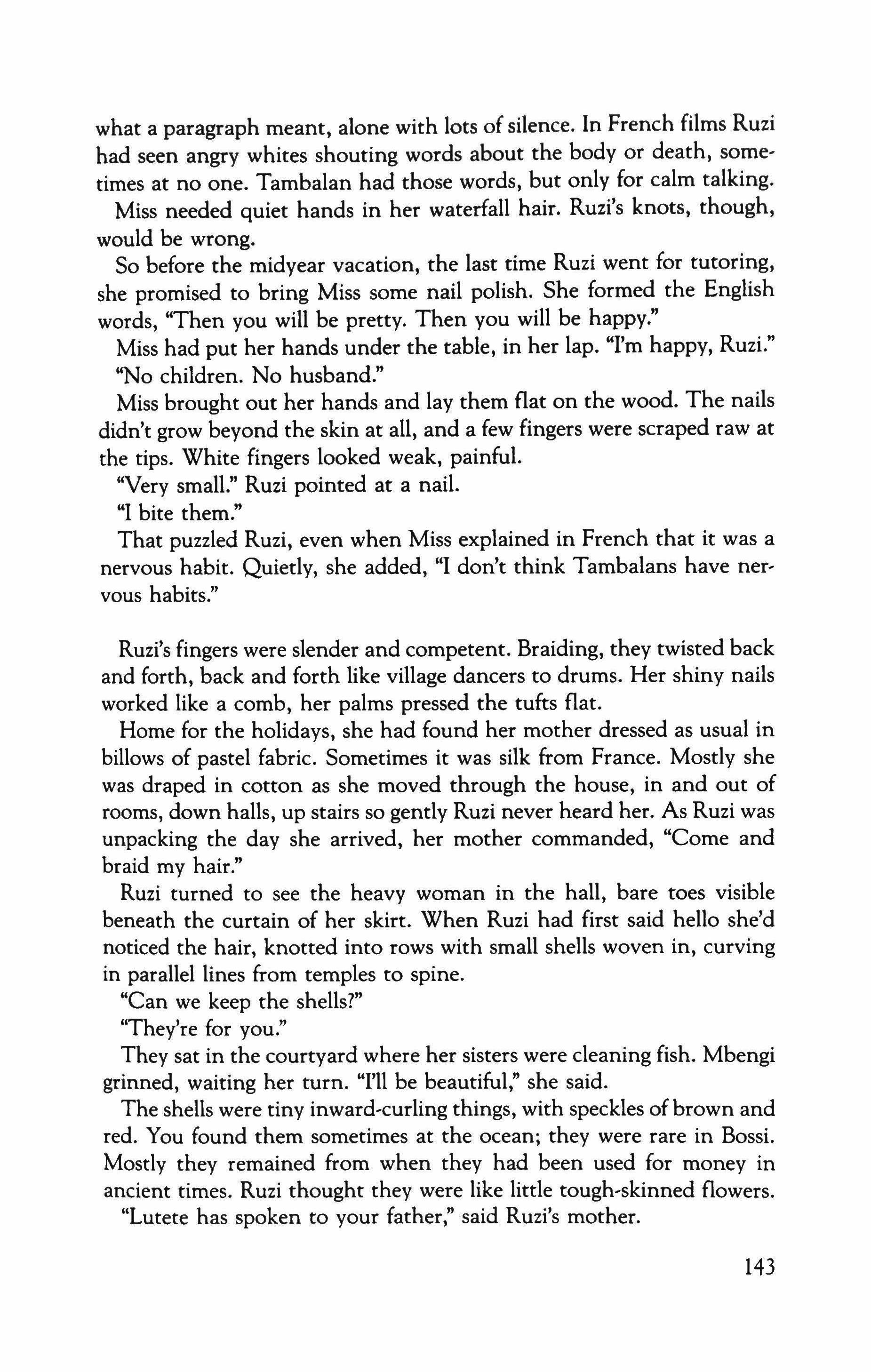
what a paragraph meant, alone with lots of silence. In French films Ruzi had seen angry whites shouting words about the body or death, sometimes at no one. Tambalan had those words, but only for calm talking.
Miss needed quiet hands in her waterfall hair. Ruzi's knots, though, would be wrong.
So before the midyear vacation, the last time Ruzi went for tutoring, she promised to bring Miss some nail polish. She formed the English words, "Then you will be pretty. Then you will be happy."
Miss had put her hands under the table, in her lap. "I'm happy, Ruzi."
"No children. No husband."
Miss brought out her hands and lay them flat on the wood. The nails didn't grow beyond the skin at all, and a few fingers were scraped raw at the tips. White fingers looked weak, painful.
"Very small." Ruzi pointed at a nail.
"I bite them."
That puzzled Ruzi, even when Miss explained in French that it was a nervous habit. Quietly, she added, "I don't think Tambalans have nervous habits."
Ruzi's fingers were slender and competent. Braiding, they twisted back and forth, back and forth like village dancers to drums. Her shiny nails worked like a comb, her palms pressed the tufts flat.
Home for the holidays, she had found her mother dressed as usual in billows of pastel fabric. Sometimes it was silk from France. Mostly she was draped in cotton as she moved through the house, in and out of rooms, down halls, up stairs so gently Ruzi never heard her. As Ruzi was unpacking the day she arrived, her mother commanded, "Come and braid my hair."
Ruzi turned to see the heavy woman in the hall, bare toes visible beneath the curtain of her skirt. When Ruzi had first said hello she'd noticed the hair, knotted into rows with small shells woven in, curving in parallel lines from temples to spine.
"Can we keep the shells?"
"They're for you."
They sat in the courtyard where her sisters were cleaning fish. Mbengi grinned, waiting her turn. "I'll be beautiful," she said.
The shells were tiny inward-curling things, with speckles of brown and red. You found them sometimes at the ocean; they were rare in Bossi. Mostly they remained from when they had been used for money in ancient times. Ruzi thought they were like little tough-skinned flowers.
"Lutete has spoken to your father," said Ruzi's mother.
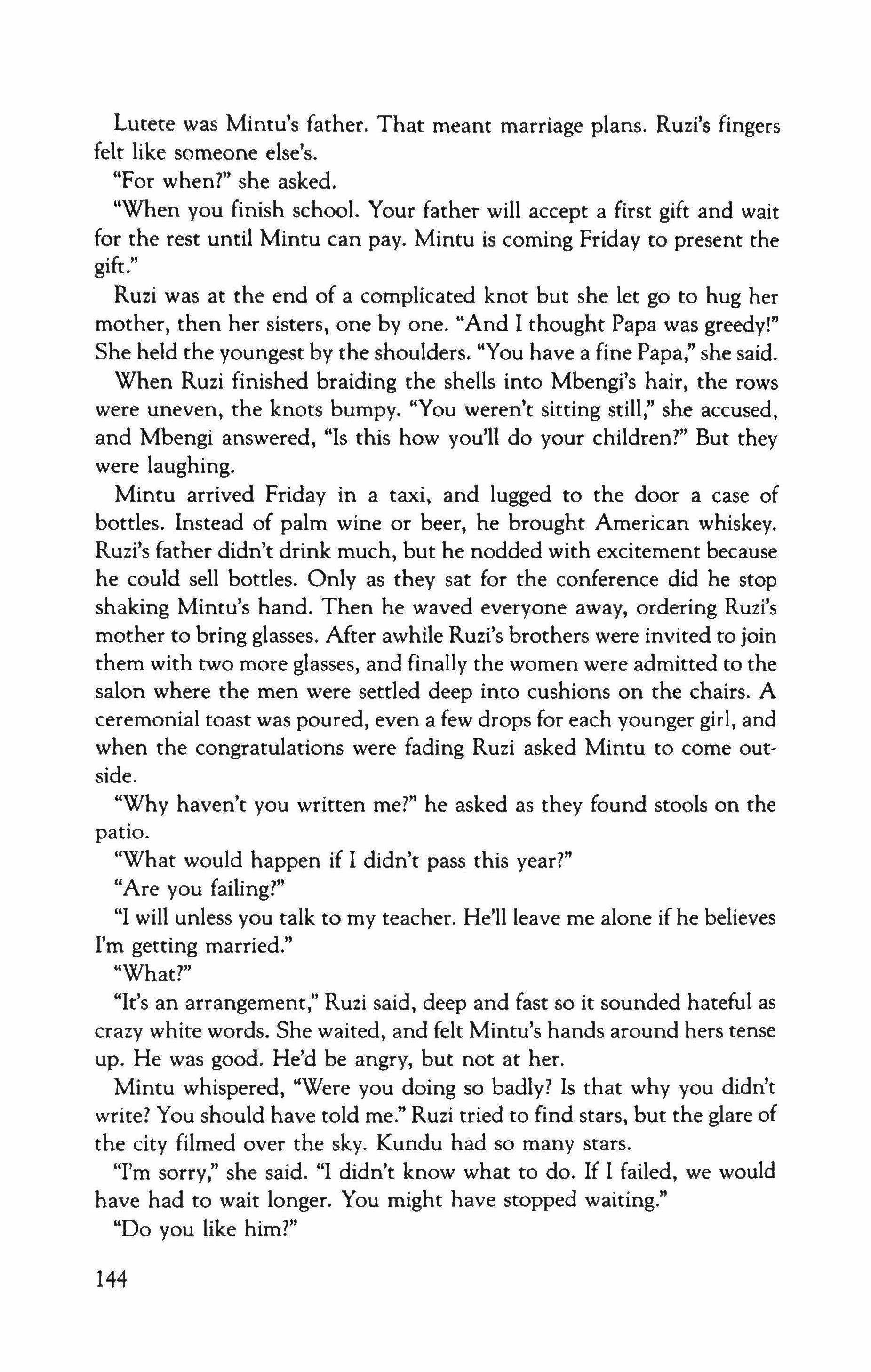
Lutete was Mintu's father. That meant marriage plans. Ruzi's fingers felt like someone else's.
"For when?" she asked.
"When you finish school. Your father will accept a first gift and wait for the rest until Mintu can pay. Mintu is coming Friday to present the gift."
Ruzi was at the end of a complicated knot but she let go to hug her mother, then her sisters, one by one. "And I thought Papa was greedy!" She held the youngest by the shoulders. "You have a fine Papa," she said.
When Ruzi finished braiding the shells into Mbengi's hair, the rows were uneven, the knots bumpy. "You weren't sitting still," she accused, and Mbengi answered, "Is this how you'll do your children?" But they were laughing.
Mintu arrived Friday in a taxi, and lugged to the door a case of bottles. Instead of palm wine or beer, he brought American whiskey. Ruzi's father didn't drink much, but he nodded with excitement because he could sell bottles. Only as they sat for the conference did he stop shaking Mintu's hand. Then he waved everyone away, ordering Ruzi's mother to bring glasses. After awhile Ruzi's brothers were invited to join them with two more glasses, and finally the women were admitted to the salon where the men were settled deep into cushions on the chairs. A ceremonial toast was poured, even a few drops for each younger girl, and when the congratulations were fading Ruzi asked Mintu to come outside.
"Why haven't you written me?" he asked as they found stools on the patio.
"What would happen if I didn't pass this year?"
"Are you failing?"
"I will unless you talk to my teacher. He'll leave me alone if he believes I'm getting married."
"What?"
"It's an arrangement," Ruzi said, deep and fast so it sounded hateful as crazy white words. She waited, and felt Mintu's hands around hers tense up. He was good. He'd be angry, but not at her.
Mintu whispered, "Were you doing so badly? Is that why you didn't write? You should have told me." Ruzi tried to find stars, but the glare of the city filmed over the sky. Kundu had so many stars.
"I'm sorry," she said. "I didn't know what to do. If I failed, we would have had to wait longer. You might have stopped waiting."
"Do you like him?"

"He's a rat," she said, and started to cry. His arms went around her, the solid night arms she'd created out of Bola time after time.
"I'm going to Kundu tomorrow. He won't bother you again."
She wiped her nose on the hem of her rapa; she'd change it when she went inside. Mintu leaned away, she felt him trying to see her. Of him she saw only outlines: hair, nose, jaw. Hard, broad jaw.
Ruzi returned to school with the nail polish. When she asked Miss Christina the first day back if she could come that afternoon, Miss laughed, holding up her stubby nails, but said yes anyway. Miss laughed all through her lesson as students made sentences about Christmas and New Year's. Miss was happy. With blue chalk she drew water, where she'd gone. Copying down the word "ocean," Ruzi wondered if Miss was happy to be back at Kundu, or to have left. Maybe she'd been with a man. Maybe she was getting married, too.
They sat outside on Ruzi's straw mat that she had brought rolled and balanced on one shoulder. No English books today; this visit was special. As they settled, Miss crosslegged and Ruzi sitting on ankles, Ruzi told the news. She punctuated her French with the percussion of tiny balls inside as she shook the bottle of polish. Like a calabash.
"Congratulations," Miss nodded, looking pleased as her nail turned red as a tomato. Her skin, too, was dabbed red at the tip.
"My fiance studies agriculture, he's going to work for the state."
"And what will you do?"
"Children, Miss. And I can braid hair for extra money, while Mintu is in school,"
Miss swallowed.
Ruzi started on the third nail. She wanted to ask about Miss's men, and began with "You need a husband, Miss."
"You're wrong."
Ruzi tried to explain. Married, women mattered.
"Your English is so good now. Doesn't school matter?"
Ruzi's brush hovered over the pinkie. Now she was angry. If she were white, she thought, she'd be red as the polish. "I'll tell you about school. Girls go to school so bachelor teachers don't have to get married! We go to school so our dowries will be high, so our fathers will be rich. And since we can't marry until we finish, there's nothing to stop teachers like Bola!"
"Bola?"
Ruzi realized that Miss hadn't known. After smearing polish on the

pinkie, she dropped the hand. What could this stranger understand about happiness? Miss was not intelligent enough to be a teacher.
Ruzi told her about the arrangement and Miss went hibiscus color, spitting out the ugly word.
Ruzi said, "Give me your other hand, I will finish."
However, Miss was unfolding, rising, slipping her feet into thongs.
"Miss, you can't leave, we've only done one hand. Come sit down, it won't take long." One hand of red nails and one of white was grotesque, like a cripple.
"If you were less worried about nails you wouldn't have this problem with Bola."
"But it's over, it's fixed!"
Miss Christina didn't hear, she'd already slammed her door. Ruzi thought of the hollow rattle of hinges that echoed at school each time Miss ran home, angry at everyone laughing, mid-lesson. They would crowd the classroom windows, listening. They wondered if she cried.
The next day everyone whispered about the five red nails; what did they mean? Muslims grew the nails on their little fingers long enough to curl like horns. Maybe in America people without churches painted their nails like Miss.
Ruzi didn't tell.
When Miss called on her, the pale eyes saw something secret, like when she'd looked at Asia. Although Ruzi's answers were correct, Miss didn't smile. No smile, no red. A ghost face.
That afternoon was Tuesday, Ruzi's tutoring day, but when she knocked at Miss Christina's door no one answered. As Ruzi returned to the dormitory, avoiding mangos fallen from the trees, she saw Miss striding fast at the end of the avenue, skirt swishing. The principal lived over there.
Ruzi joined the girls braiding and offered the shells from her mother's hair. Tusamba wanted them, so Ruzi sat behind her, combing out the old braids. She told the story of Mintu's visit to Kundu. He'd spoken only to Bola. Mintu was tall with muscles tough from working outside; all he'd had to do was warn the little rat, and Bola had promised to give Ruzi B's at the end of the year. That morning in the hall, Bola had actually congratulated her.
Ruzi was beginning to braid when Miss came thudding up the road. She was redder than ever, "like the sun before it disappears," said Tusamba.
The road was sticky from the morning rain, and a thick layer of mud
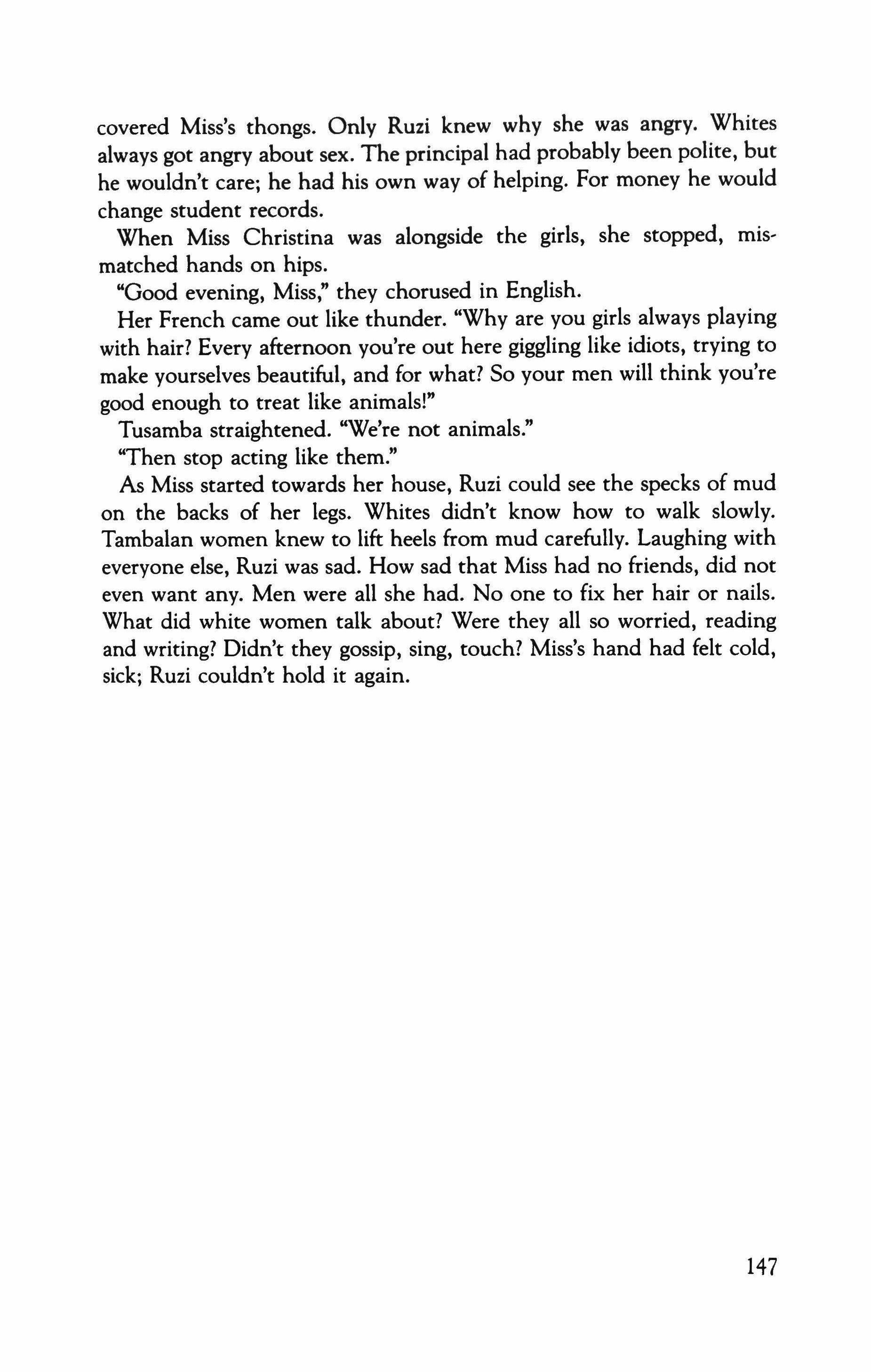
covered Miss's thongs. Only Ruzi knew why she was angry. Whites always got angry about sex. The principal had probably been polite, but he wouldn't care; he had his own way of helping. For money he would change student records.
When Miss Christina was alongside the girls, she stopped, mismatched hands on hips.
"Good evening, Miss," they chorused in English. Her French came out like thunder. "Why are you girls always playing with hair? Every afternoon you're out here giggling like idiots, trying to make yourselves beautiful, and for what? So your men will think you're good enough to treat like animals!"
Tusamba straightened. "We're not animals."
"Then stop acting like them."
As Miss started towards her house, Ruzi could see the specks of mud on the backs of her legs. Whites didn't know how to walk slowly. Tambalan women knew to lift heels from mud carefully. Laughing with everyone else, Ruzi was sad. How sad that Miss had no friends, did not even want any. Men were all she had. No one to fix her hair or nails. What did white women talk about? Were they all so worried, reading and writing? Didn't they gossip, sing, touch? Miss's hand had felt cold, sick; Ruzi couldn't hold it again.

"Bob Marley dead," Eugene said, hand at his dick as he walked in the door, brown face yellowed from heroin, eyes puffy like a boxer's. He stared hard at me, leaned against a barstool. His shoulders made a big spread, but he was junk skinny, that all-sucked-out look. "Bob Marley dead," he said again, like 1 couldn't hear.
1 wanted to call him a lemon-faced nigger, but I didn't like that ugly side and kept it quiet, even with Eugene. I got straight to the point. "You seen Dee?"
"Didn't you hear me?" He gripped at the air, making two large fists, his voice full of anger and familiarity, as if 1 hadn't been gone for months. "I already heard," I said. My best friend, Lonnie, had picked me up at the bus station and given me the news. "It's all over the radio," he said. "The industrialists killed him." I felt weak, twenty hours on a Greyhound, then I hear Marley is gone. 1 asked Lonnie how they killed him. "Cancer," he said, "white man's disease." It had sounded like an accusation.
"Shit," Eugene said, bending close to study my face for signs of anguish. He crossed his arms to make himself bigger. "Go listen at your fucking Elton John."
1 felt accused again, as if my white skin had contributed to Marley's death. I would not apologize for being white, especially not to a bonehollow junkie like Eugene. I stood and threw what was left of my beer in his face. "Where's Dee?"
For a moment his eyes sparked, but they clouded quickly. He seemed to shrink. "Shit, Freddie, why you always got a hard-on?" He wiped at his face, eyebrows. Beer ran down his fingers and dripped onto the concrete floor. "I don't know where she is. We ain't in no club."
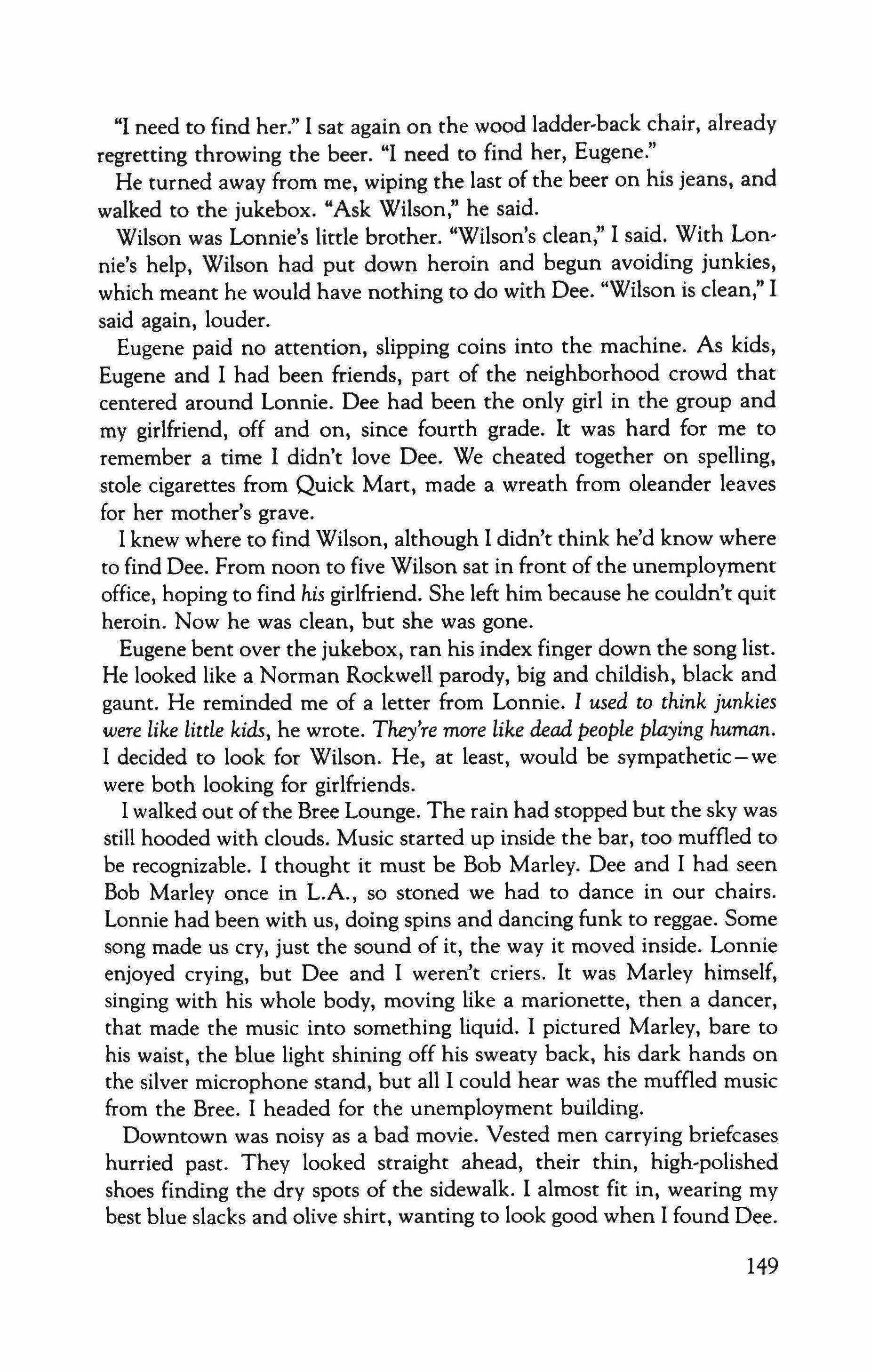
"I need to find her." 1 sat again on the wood ladder-back chair, already regretting throwing the beer. "I need to find her, Eugene."
He turned away from me, wiping the last of the beer on his jeans, and walked to the jukebox. "Ask Wilson," he said.
Wilson was Lonnie's little brother. "Wilson's clean," I said. With Lon, nie's help, Wilson had put down heroin and begun avoiding junkies, which meant he would have nothing to do with Dee. "Wilson is clean," I said again, louder.
Eugene paid no attention, slipping coins into the machine. As kids, Eugene and I had been friends, part of the neighborhood crowd that centered around Lonnie. Dee had been the only girl in the group and my girlfriend, off and on, since fourth grade. It was hard for me to remember a time I didn't love Dee. We cheated together on spelling, stole cigarettes from Quick Mart, made a wreath from oleander leaves for her mother's grave.
I knew where to find Wilson, although I didn't think he'd know where to find Dee. From noon to five Wilson sat in front of the unemployment office, hoping to find his girlfriend. She left him because he couldn't quit heroin. Now he was clean, but she was gone.
Eugene bent over the jukebox, ran his index finger down the song list. He looked like a Norman Rockwell parody, big and childish, black and gaunt. He reminded me of a letter from Lonnie. I used to think junkies were like little kids, he wrote. They're more like dead people playing human. I decided to look for Wilson. He, at least, would be sympathetic-we were both looking for girlfriends.
I walked out ofthe Bree Lounge. The rain had stopped but the sky was still hooded with clouds. Music started up inside the bar, too muffled to be recognizable. 1 thought it must be Bob Marley. Dee and I had seen Bob Marley once in L.A., so stoned we had to dance in our chairs. Lonnie had been with us, doing spins and dancing funk to reggae. Some song made us cry, just the sound of it, the way it moved inside. Lonnie enjoyed crying, but Dee and I weren't criers. It was Marley himself, singing with his whole body, moving like a marionette, then a dancer, that made the music into something liquid. I pictured Marley, bare to his waist, the blue light shining off his sweaty back, his dark hands on the silver microphone stand, but all I could hear was the muffled music from the Bree. I headed for the unemployment building. Downtown was noisy as a bad movie. Vested men carrying briefcases hurried past. They looked straight ahead, their thin, high-polished shoes finding the dry spots of the sidewalk. I almost fit in, wearing my best blue slacks and olive shirt, wanting to look good when I found Dee.
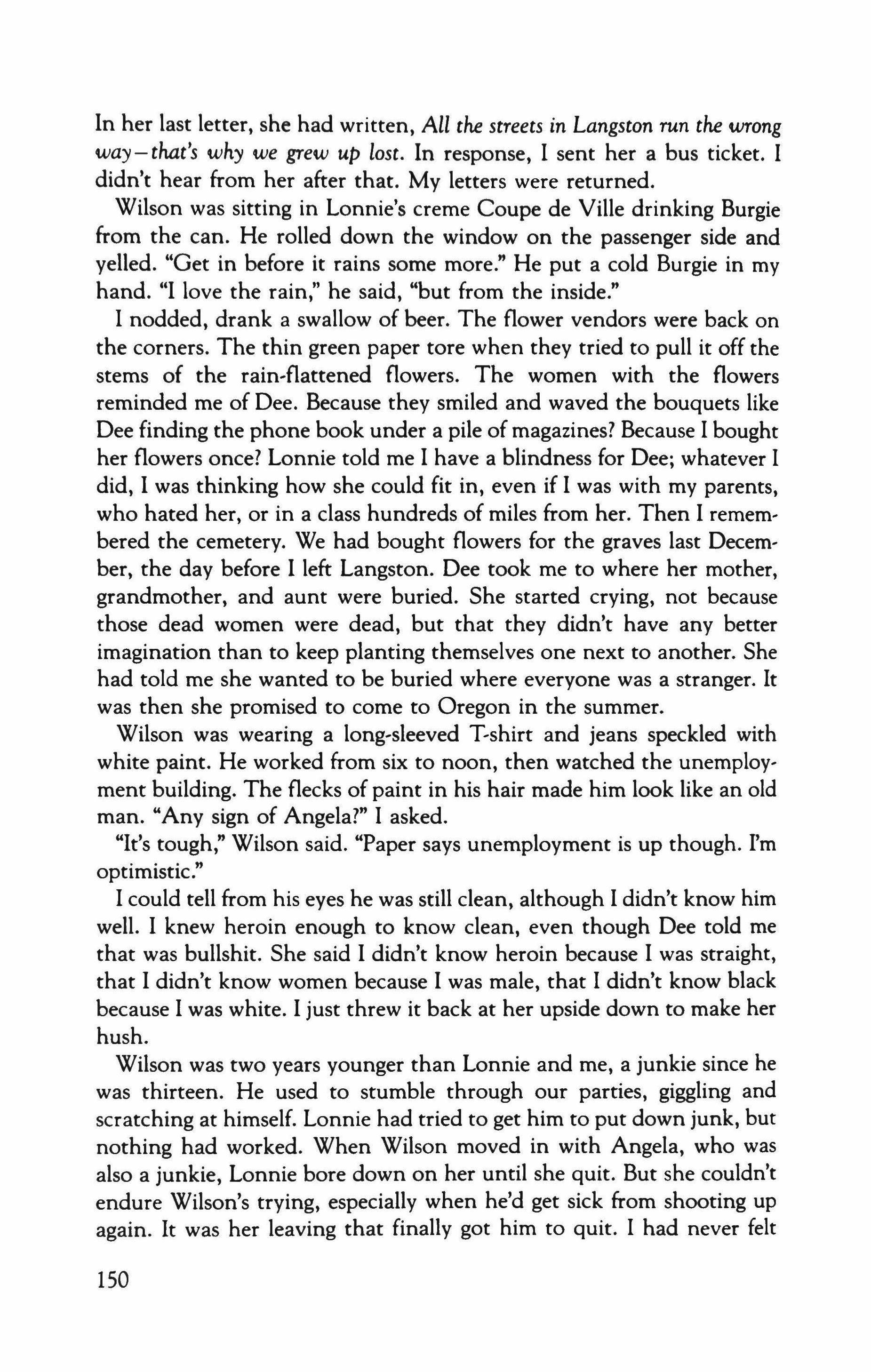
In her last letter, she had written, All the streets in Langston run the wrong way - that's why we grew up lost. In response, I sent her a bus ticket. I didn't hear from her after that. My letters were returned.
Wilson was sitting in Lonnie's creme Coupe de Ville drinking Burgie from the can. He rolled down the window on the passenger side and yelled. "Get in before it rains some more." He put a cold Burgie in my hand. "I love the rain," he said, "but from the inside."
I nodded, drank a swallow of beer. The flower vendors were back on the corners. The thin green paper tore when they tried to pull it off the stems of the rain-flattened flowers. The women with the flowers reminded me of Dee. Because they smiled and waved the bouquets like Dee finding the phone book under a pile of magazines? Because I bought her flowers once? Lonnie told me I have a blindness for Dee; whatever I did, I was thinking how she could fit in, even if I was with my parents, who hated her, or in a class hundreds of miles from her. Then I rernernbered the cemetery. We had bought flowers for the graves last December, the day before I left Langston. Dee took me to where her mother, grandmother, and aunt were buried. She started crying, not because those dead women were dead, but that they didn't have any better imagination than to keep planting themselves one next to another. She had told me she wanted to be buried where everyone was a stranger. It was then she promised to come to Oregon in the summer.
Wilson was wearing a long-sleeved Tshirt and jeans speckled with white paint. He worked from six to noon, then watched the unernployment building. The flecks of paint in his hair made him look like an old man. "Any sign of Angela?" I asked.
"It's tough," Wilson said. "Paper says unemployment is up though. l'm optimistic."
I could tell from his eyes he was still clean, although I didn't know him well. I knew heroin enough to know clean, even though Dee told me that was bullshit. She said I didn't know heroin because I was straight, that I didn't know women because I was male, that I didn't know black because I was white. I just threw it back at her upside down to make her hush.
Wilson was two years younger than Lonnie and me, a junkie since he was thirteen. He used to stumble through our parties, giggling and scratching at himself. Lonnie had tried to get him to put down junk, but nothing had worked. When Wilson moved in with Angela, who was also a junkie, Lonnie bore down on her until she quit. But she couldn't endure Wilson's trying, especially when he'd get sick from shooting up again. It was her leaving that finally got him to quit. I had never felt

close to Wilson before then, sharing the front seat of Lonnie's car, each of us looking for a woman who probably didn't want to be found. And something more- Wilson had been a junkie for years and quit. It gave me hope for Dee.
A Mexican woman with a sour-looking kid walked out of the unemployment building. "You think of Welfare?" I asked. The first drop of rain hit center like a huge bug splat just below the rearview mirror.
"Starting again," Wilson said. He leaned forward, looked up to the dark sky. "Welfare's a waste of time. She's too proud. Too crazy. Too stupid."
I looked at the way his long neck curved as he stared at the sky. I pictured Angela walking by, seeing Wilson craning his head up and knowing instantly that he was clean. Thinking about it reminded me of my own problems. "You know where Dee is?"
Wilson gave a short laugh. "I can't find my own woman."
"Eugene said you might know."
"Fuck Eugene." Another drop hit right above his face. "They look like stars exploding," he said, then straightened. "Why don't you just get another woman?"
I shook my head, thinking that was what Eugene wanted to say in the bar, only he would have come out and said, "Why don't you get a white woman?" I didn't get angry with Wilson. We both had our ugly sides. "I love Dee," I said.
"Yeah," he said, looked at the unemployment door as a man in a tie walked out. ''They closing up. You need a ride somewhere?"
Wilson dropped me off at Lonnie's apartment, saying only that Dee got junk from Eugene. If I stayed close to Eugene, she would show.
Lonnie was smoking a joint. I didn't want any, even though he acted hurt and told me how wonderful it was with that effeminate twist in his voice. Everyone thought he was queer, but Lonnie was always after women and women were always after him.
"Maybe you should forget about Dee," Lonnie said, sitting with his legs crossed under him at one end of his record collection, flipping through the albums. He wore a smoke-colored shirt with a short collar and pleated beige pants, though he wasn't going anywhere and expect, ing no one but me.
"I love Dee." I squatted at the other end of the records. We looked for Bob Marley, moving crab-like across the floor, checking each of the albums that lined the wall. Lonnie decided he must have lent the albums out. We settled for Peter Tosh, Equal Rights.
The five months 1 had been at college, Lonnie and Dee were the only
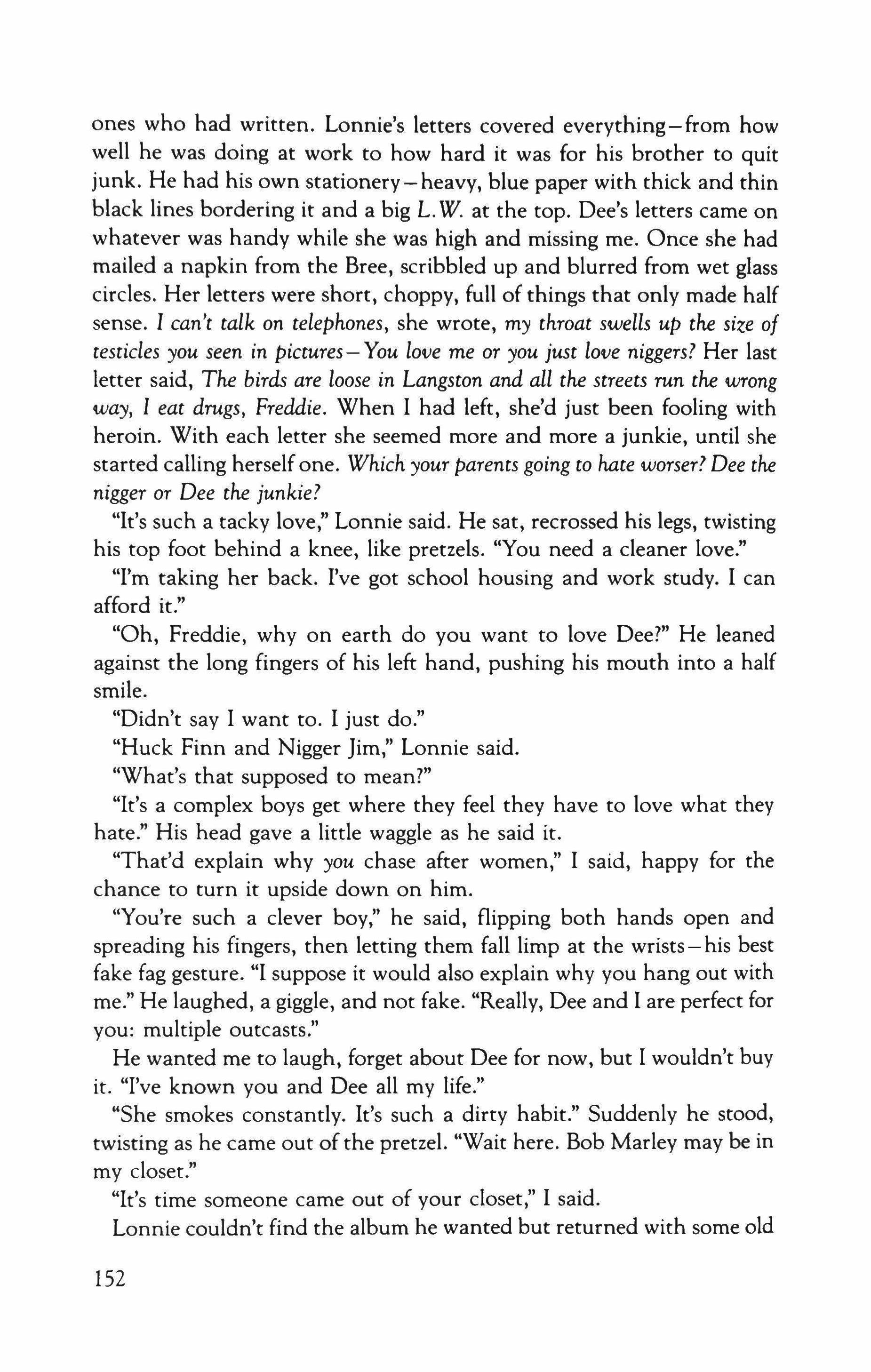
ones who had written. Lonnie's letters covered everything - from how well he was doing at work to how hard it was for his brother to quit junk. He had his own stationery - heavy, blue paper with thick and thin black lines bordering it and a big L. W. at the top. Dee's letters came on whatever was handy while she was high and missing me. Once she had mailed a napkin from the Bree, scribbled up and blurred from wet glass circles. Her letters were short, choppy, full of things that only made half sense. I can't talk on telephones, she wrote, my throat swells up the size of testicles you seen in pictures- You love me or you just love niggers? Her last letter said, The birds are loose in Langston and all the streets run the wrong way, I eat drugs, Freddie. When I had left, she'd just been fooling with heroin. With each letter she seemed more and more a junkie, until she started calling herself one. Which your parents going to hate worser? Dee the nigger or Dee the junkie?
"It's such a tacky love," Lonnie said. He sat, recrossed his legs, twisting his top foot behind a knee, like pretzels. "You need a cleaner love."
"I'm taking her back. I've got school housing and work study. I can afford it."
"Oh, Freddie, why on earth do you want to love Dee?" He leaned against the long fingers of his left hand, pushing his mouth into a half smile.
"Didn't say I want to. I just do."
"Huck Finn and Nigger Jim," Lonnie said.
"What's that supposed to mean?"
"It's a complex boys get where they feel they have to love what they hate." His head gave a little waggle as he said it.
"That'd explain why you chase after women," I said, happy for the chance to turn it upside down on him.
"You're such a clever boy," he said, flipping both hands open and spreading his fingers, then letting them fall limp at the wrists - his best fake fag gesture. "I suppose it would also explain why you hang out with me." He laughed, a giggle, and not fake. "Really, Dee and I are perfect for you: multiple outcasts."
He wanted me to laugh, forget about Dee for now, but I wouldn't buy it. "I've known you and Dee all my life."
"She smokes constantly. It's such a dirty habit." Suddenly he stood, twisting as he came out of the pretzel. "Wait here. Bob Marley may be in my closet."
"It's time someone came out of your closet," I said.
Lonnie couldn't find the album he wanted but returned with some old
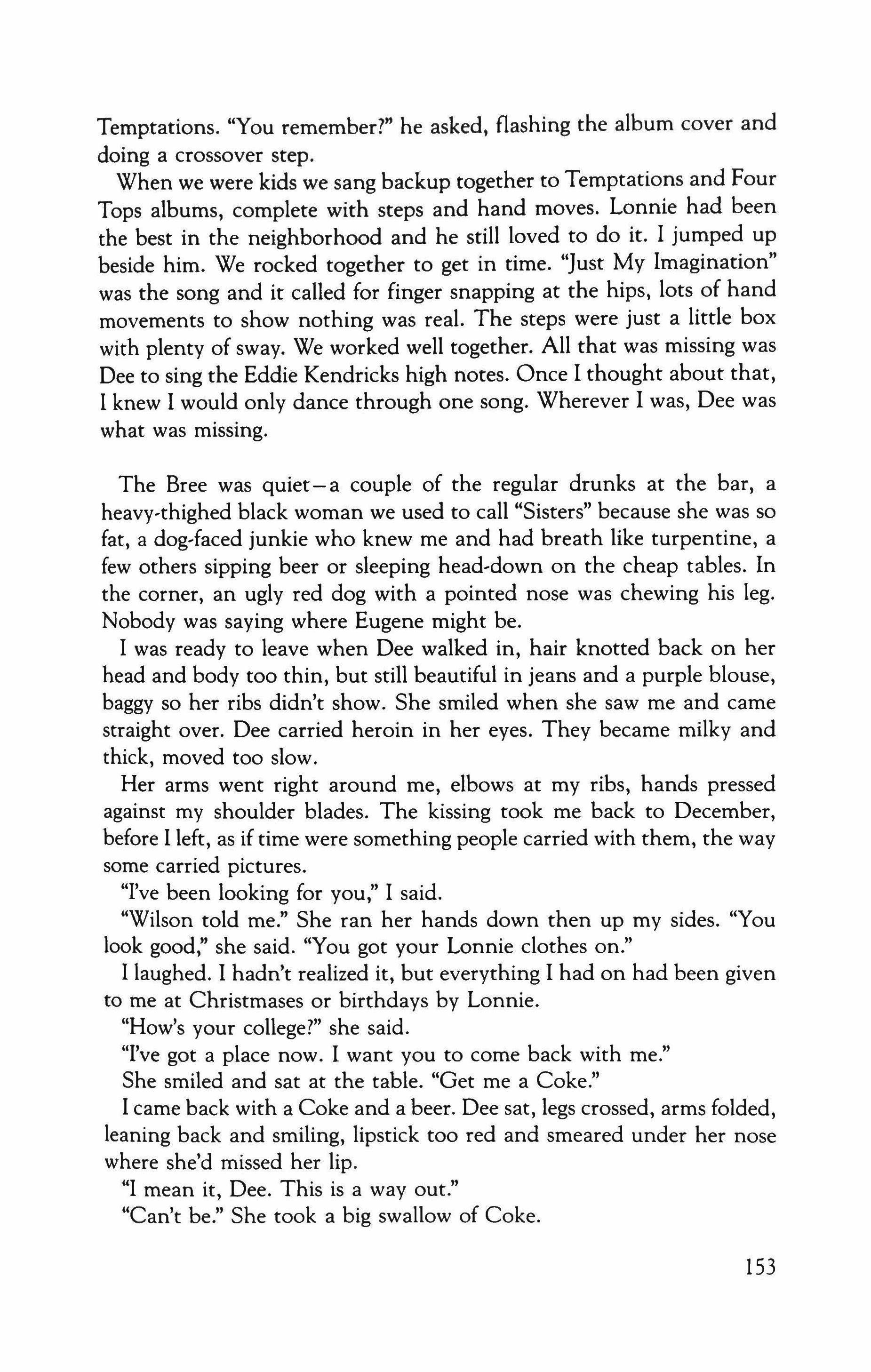
Temptations. "You remember?" he asked, flashing the album cover and doing a crossover step.
When we were kids we sang backup together to Temptations and Four Tops albums, complete with steps and hand moves. Lonnie had been the best in the neighborhood and he still loved to do it. I jumped up beside him. We rocked together to get in time. "Just My Imagination" was the song and it called for finger snapping at the hips, lots of hand movements to show nothing was real. The steps were just a little box with plenty of sway. We worked well together. All that was missing was Dee to sing the Eddie Kendricks high notes. Once I thought about that, 1 knew 1 would only dance through one song. Wherever 1 was, Dee was what was missing.
The Bree was quiet-a couple of the regular drunks at the bar, a heavy-thighed black woman we used to call "Sisters" because she was so fat, a dog-faced junkie who knew me and had breath like turpentine, a few others sipping beer or sleeping head-down on the cheap tables. In the corner, an ugly red dog with a pointed nose was chewing his leg. Nobody was saying where Eugene might be.
I was ready to leave when Dee walked in, hair knotted back on her head and body too thin, but still beautiful in jeans and a purple blouse, baggy so her ribs didn't show. She smiled when she saw me and came straight over. Dee carried heroin in her eyes. They became milky and thick, moved too slow.
Her arms went right around me, elbows at my ribs, hands pressed against my shoulder blades. The kissing took me back to December, before 1 left, as if time were something people carried with them, the way some carried pictures.
"I've been looking for you," I said.
"Wilson told me." She ran her hands down then up my sides. "You look good," she said. "You got your Lonnie clothes on."
1 laughed. I hadn't realized it, but everything I had on had been given to me at Christmases or birthdays by Lonnie.
"How's your college?" she said.
"I've got a place now. I want you to come back with me."
She smiled and sat at the table. "Get me a Coke."
1 came back with a Coke and a beer. Dee sat, legs crossed, arms folded, leaning back and smiling, lipstick too red and smeared under her nose where she'd missed her lip.
"I mean it, Dee. This is a way out."
"Can't be." She took a big swallow of Coke.

"Why not?"
"If it was, we wouldn't know about it." Her upper lip glistened with Coke. She took another big drink, wiped her mouth with her hand. "Anyway, I don't like mixed marriages." "Fuck that."
"They don't work, junkies and straights." She reached over and twisted one of my shirt buttons. "You'd have to take to junk." I leaned back. The chair squeaked. Her milky eyes caught up with me. "I was thinking you could quit," I said.
Her hand moved up and down the Coke glass. "You want to consume me." She wiped the cold sweat from the glass onto her forehead, the bridge of her nose, her eyelids.
"Wilson quit."
Her hand dropped to her lap. "That's what got you all excited, ain't it?"
"Lonnie got him through it."
She glared at me, only it's her fake mean look, like Lonnie's fake fag moves, meaning just the opposite. I tilted my head to show her I knew what she was doing. It must have reminded her how long I had loved her because she went soft, showed her tongue as she smiled. Then she moved in another direction. Something came to her and her eyes flitted down to the table. "I'm one up on you," she said. "You go to college to figure out what it is worth getting up for." She looked up at me, thick eyes set hard against mine. "I got my reason to live."
She made me feel small, like junkies were the only full-grown people. "I tried the shit," I said, feeling stupid as soon as 1 said it because she knew 1 only snorted it. It's the needles 1 couldn't stand. 1 couldn't even look at them. But it was more than that. Junkies made me angry, especially gone junkies like Eugene, but even the clever ones, the pretty ones, the ones who could be anybody.
Dee's laugh was like a gurgle, but low enough to be a moan. "Snorting junk is like jacking off, a waste of good stuff."
1 couldn't get mad at Dee. Every expression on her face was one I'd seen before, like old songs 1 never got tired of. "I love you, Dee."
"Love is the spike." Someone said this to her or she read it, because she just spat it out the way some people say Dig it, as if rehearsed. She couldn't even look at me, but I didn't know what to say or how to explain. 1 said what she already knew.
"I'm scared of needles."
"I'm scared of white college boys in short sleeves." She looked at me, started to look away, but 1 took her chin and turned her toward me.
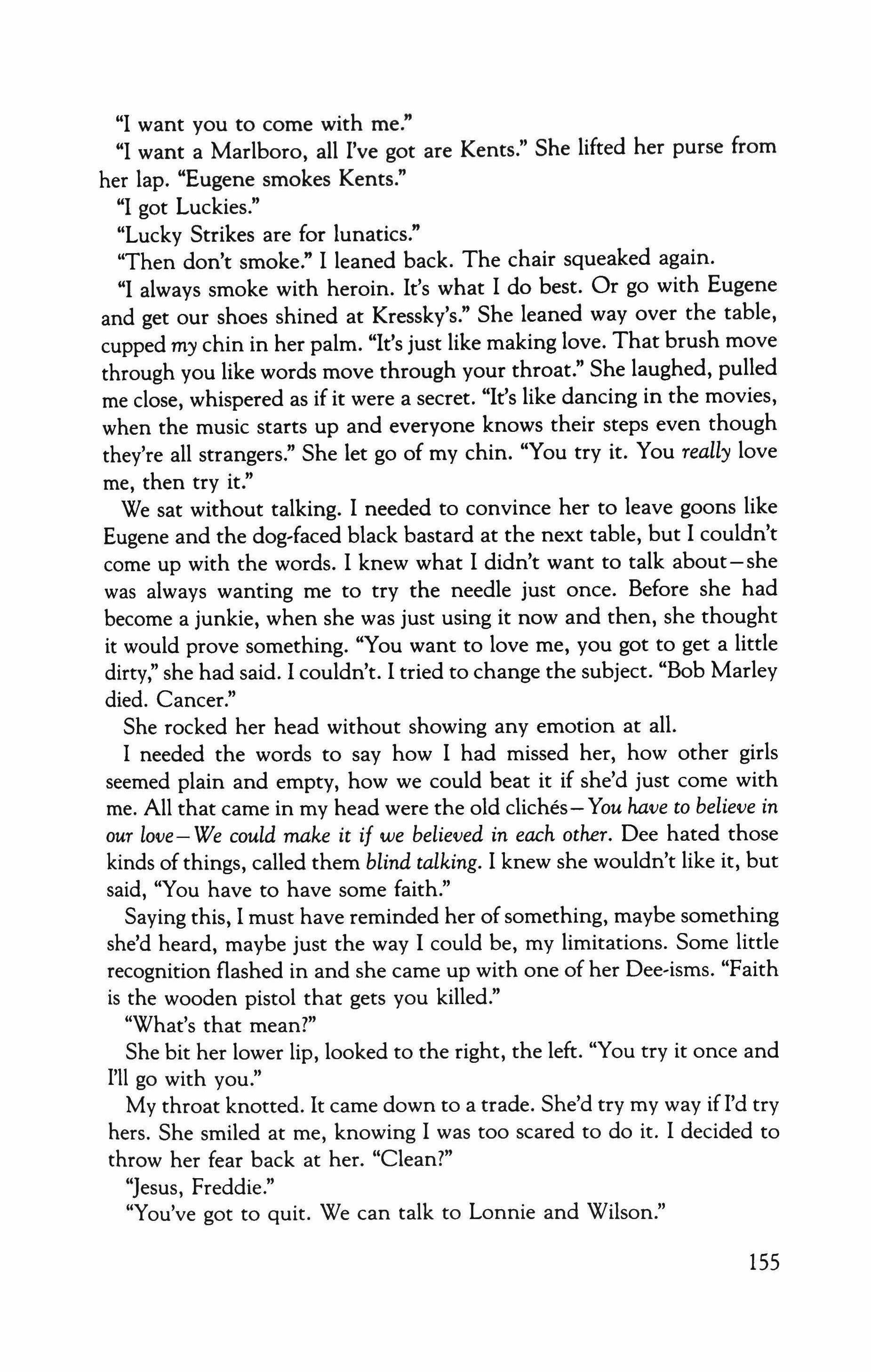
"I want you to come with me."
"I want a Marlboro, all I've got are Kents." She lifted her purse from her lap. "Eugene smokes Kents."
"I got Luckies."
"Lucky Strikes are for lunatics."
"Then don't smoke." I leaned back. The chair squeaked again. "I always smoke with heroin. It's what I do best. Or go with Eugene and get our shoes shined at Kresskv's," She leaned way over the table, cupped my chin in her palm. "It's just like making love. That brush move through you like words move through your throat." She laughed, pulled me close, whispered as if it were a secret. "It's like dancing in the movies, when the music starts up and everyone knows their steps even though they're all strangers." She let go of my chin. "You try it. You really love me, then try it."
We sat without talking. I needed to convince her to leave goons like Eugene and the dog-faced black bastard at the next table, but I couldn't come up with the words. I knew what I didn't want to talk about - she was always wanting me to try the needle just once. Before she had become a junkie, when she was just using it now and then, she thought it would prove something. "You want to love me, you got to get a little dirty," she had said. I couldn't. I tried to change the subject. "Bob Marley died. Cancer."
She rocked her head without showing any emotion at all.
I needed the words to say how I had missed her, how other girls seemed plain and empty, how we could beat it if she'd just come with me. All that came in my head were the old cliches- You have to believe in our love- We could make it if we believed in each other. Dee hated those kinds of things, called them blind talking. I knew she wouldn't like it, but said, "You have to have some faith."
Saying this, I must have reminded her of something, maybe something she'd heard, maybe just the way I could be, my limitations. Some little recognition flashed in and she came up with one of her Dee-isms. "Faith is the wooden pistol that gets you killed."
"What's that mean?"
She bit her lower lip, looked to the right, the left. "You try it once and I'll go with you."
My throat knotted. It came down to a trade. She'd try my way if I'd try hers. She smiled at me, knowing I was too scared to do it. I decided to throw her fear back at her. "Clean?"
"Jesus, Freddie."
"You've got to quit. We can talk to Lonnie and Wilson."
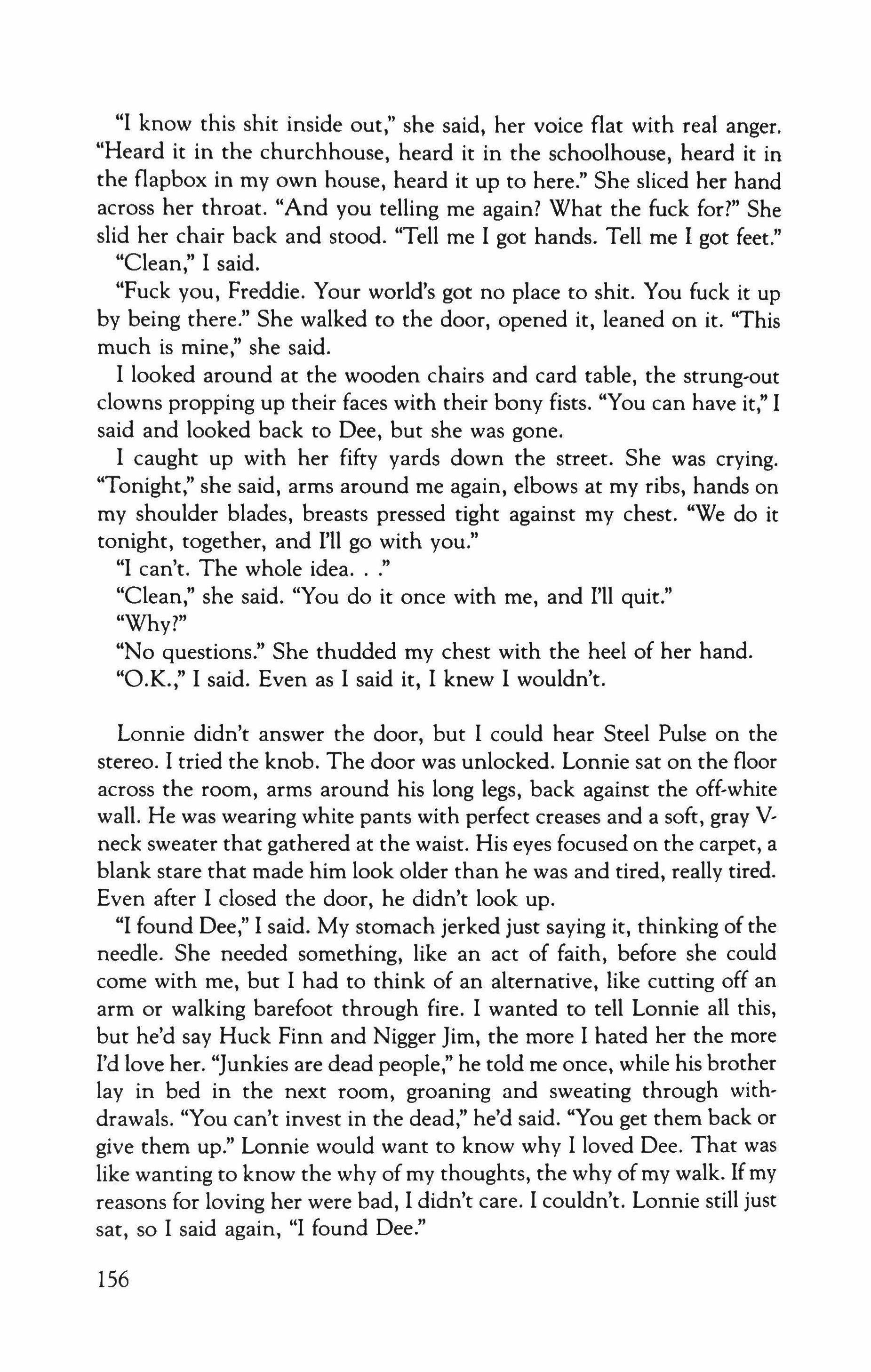
"I know this shit inside out," she said, her voice flat with real anger. "Heard it in the churchhouse, heard it in the schoolhouse, heard it in the flapbox in my own house, heard it up to here." She sliced her hand across her throat. "And you telling me again? What the fuck for?" She slid her chair back and stood. "Tell me I got hands. Tell me I got feet."
"Clean," I said.
"Fuck you, Freddie. Your world's got no place to shit. You fuck it up by being there." She walked to the door, opened it, leaned on it. "This much is mine," she said.
I looked around at the wooden chairs and card table, the strung-out clowns propping up their faces with their bony fists. "You can have it," I said and looked back to Dee, but she was gone.
I caught up with her fifty yards down the street. She was crying. "Tonight," she said, arms around me again, elbows at my ribs, hands on my shoulder blades, breasts pressed tight against my chest. "We do it tonight, together, and I'll go with you."
"I can't. The whole idea. ."
"Clean," she said. "You do it once with me, and I'll quit."
"Why?"
"No questions." She thudded my chest with the heel of her hand. "O.K.," I said. Even as I said it, I knew I wouldn't.
Lonnie didn't answer the door, but I could hear Steel Pulse on the stereo. I tried the knob. The door was unlocked. Lonnie sat on the floor across the room, arms around his long legs, back against the off-white wall. He was wearing white pants with perfect creases and a soft, gray Vneck sweater that gathered at the waist. His eyes focused on the carpet, a blank stare that made him look older than he was and tired, really tired. Even after I closed the door, he didn't look up.
"I found Dee," I said. My stomach jerked just saying it, thinking of the needle. She needed something, like an act of faith, before she could corne with me, but I had to think of an alternative, like cutting off an arm or walking barefoot through fire. I wanted to tell Lonnie all this, but he'd say Huck Finn and Nigger Jim, the more I hated her the more I'd love her. "Junkies are dead people," he told me once, while his brother lay in bed in the next room, groaning and sweating through withdrawals. "You can't invest in the dead," he'd said. "You get them back or give them up." Lonnie would want to know why I loved Dee. That was like wanting to know the why of my thoughts, the why of my walk. If my reasons for loving her were bad, I didn't care. I couldn't. Lonnie still just sat, so I said again, "I found Dee."
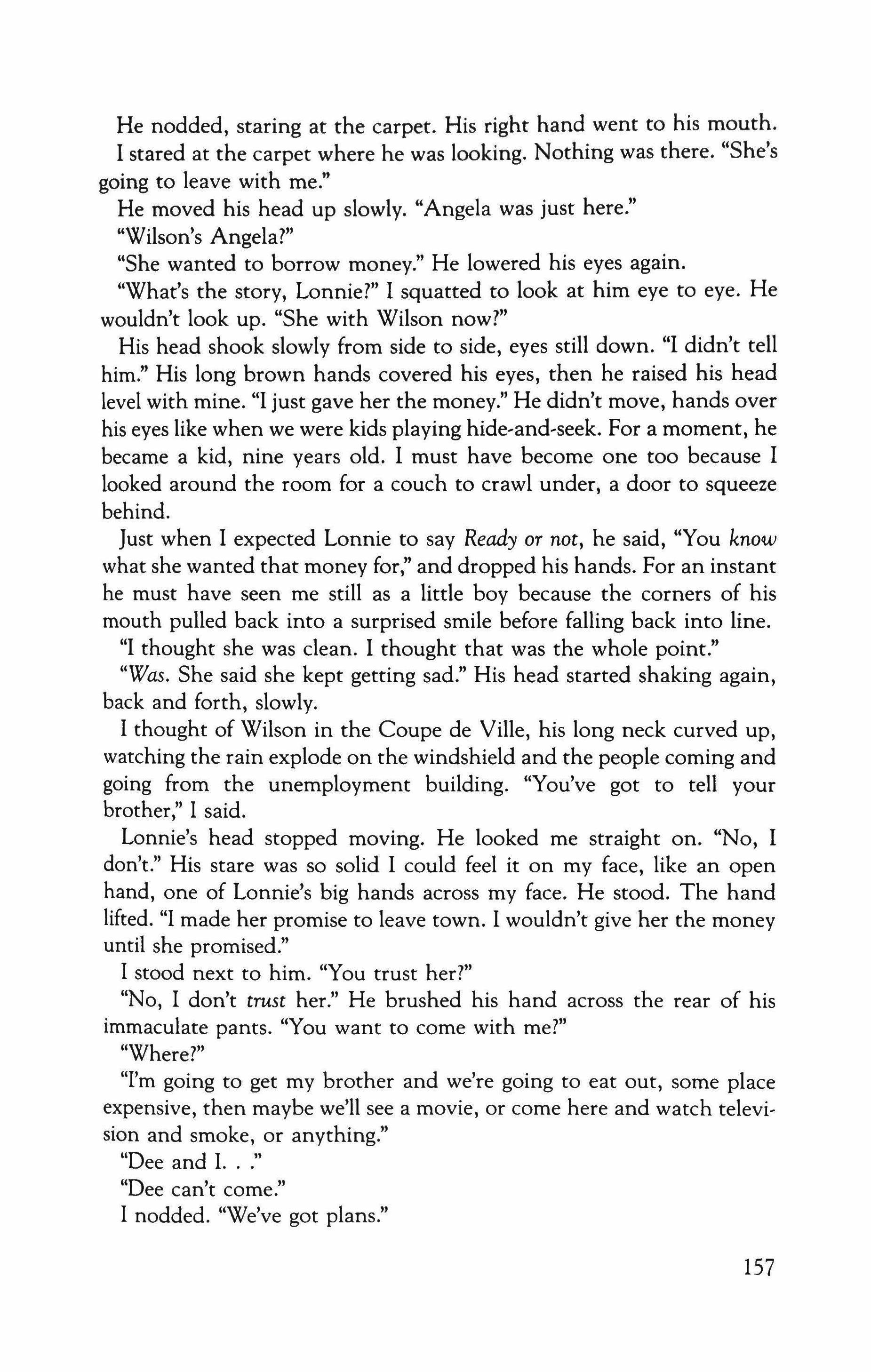
He nodded, staring at the carpet. His right hand went to his mouth. I stared at the carpet where he was looking. Nothing was there. "She's going to leave with me."
He moved his head up slowly. "Angela was just here."
"Wilson's Angela?"
"She wanted to borrow money." He lowered his eyes again. "What's the story, Lonnie?" I squatted to look at him eye to eye. He wouldn't look up. "She with Wilson now?"
His head shook slowly from side to side, eyes still down. "I didn't tell him." His long brown hands covered his eyes, then he raised his head level with mine. "I just gave her the money." He didn't move, hands over his eyes like when we were kids playing hide-and-seek. For a moment, he became a kid, nine years old. I must have become one too because I looked around the room for a couch to crawl under, a door to squeeze behind.
Just when I expected Lonnie to say Ready or not, he said, "You know what she wanted that money for," and dropped his hands. For an instant he must have seen me still as a little boy because the corners of his mouth pulled back into a surprised smile before falling back into line.
"I thought she was clean. I thought that was the whole point."
"Was. She said she kept getting sad." His head started shaking again, back and forth, slowly.
I thought of Wilson in the Coupe de Ville, his long neck curved up, watching the rain explode on the windshield and the people coming and going from the unemployment building. "You've got to tell your brother," I said.
Lonnie's head stopped moving. He looked me straight on. "No, I don't." His stare was so solid I could feel it on my face, like an open hand, one of Lonnie's big hands across my face. He stood. The hand lifted. "I made her promise to leave town. I wouldn't give her the money until she promised."
I stood next to him. "You trust her?"
"No, I don't trust her." He brushed his hand across the rear of his immaculate pants. "You want to come with me?"
"Where?"
"I'm going to get my brother and we're going to eat out, some place expensive, then maybe we'll see a movie, or come here and watch television and smoke, or anything."
"Dee and I.
"Dee can't come."
I nodded. "We've got plans."
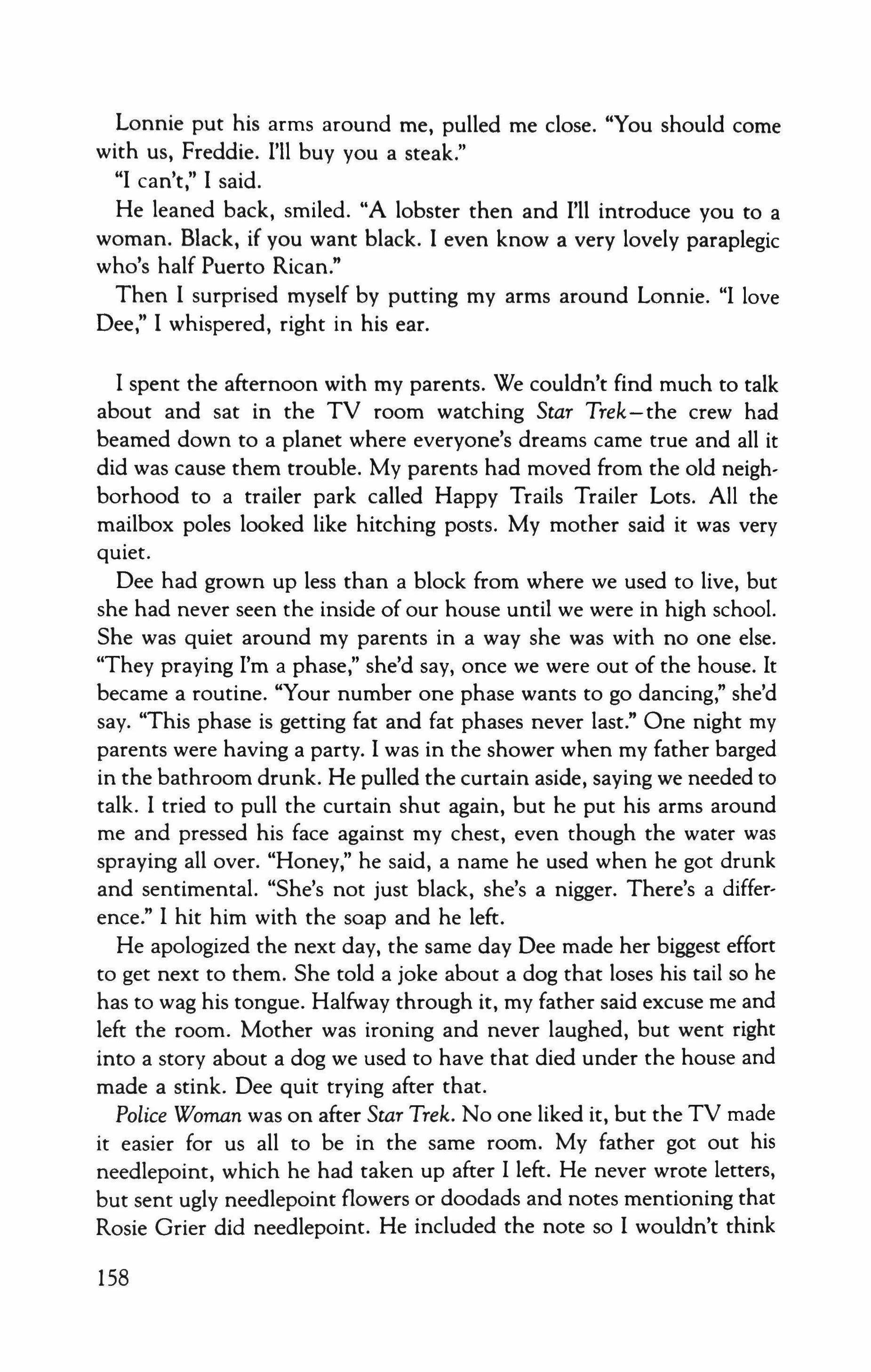
Lonnie put his arms around me, pulled me close. "You should come with us, Freddie. I'll buy you a steak."
"I can't," I said.
He leaned back, smiled. "A lobster then and I'll introduce you to a woman. Black, if you want black. I even know a very lovely paraplegic who's half Puerto Rican."
Then I surprised myself by putting my arms around Lonnie. "I love Dee," I whispered, right in his ear.
I spent the afternoon with my parents. We couldn't find much to talk about and sat in the TV room watching Star Trek-the crew had beamed down to a planet where everyone's dreams came true and all it did was cause them trouble. My parents had moved from the old neighborhood to a trailer park called Happy Trails Trailer Lots. All the mailbox poles looked like hitching posts. My mother said it was very quiet.
Dee had grown up less than a block from where we used to live, but she had never seen the inside of our house until we were in high school. She was quiet around my parents in a way she was with no one else. "They praying I'm a phase," she'd say, once we were out of the house. It became a routine. "Your number one phase wants to go dancing," she'd say. "This phase is getting fat and fat phases never last." One night my parents were having a party. I was in the shower when my father barged in the bathroom drunk. He pulled the curtain aside, saying we needed to talk. I tried to pull the curtain shut again, but he put his arms around me and pressed his face against my chest, even though the water was spraying all over. "Honey," he said, a name he used when he got drunk and sentimental. "She's not just black, she's a nigger. There's a difference." I hit him with the soap and he left.
He apologized the next day, the same day Dee made her biggest effort to get next to them. She told a joke about a dog that loses his tail so he has to wag his tongue. Halfway through it, my father said excuse me and left the room. Mother was ironing and never laughed, but went right into a story about a dog we used to have that died under the house and made a stink. Dee quit trying after that.
Police Woman was on after Star Trek. No one liked it, but the TV made it easier for us all to be in the same room. My father got out his needlepoint, which he had taken up after I left. He never wrote letters, but sent ugly needlepoint flowers or doodads and notes mentioning that Rosie Grier did needlepoint. He included the note so I wouldn't think
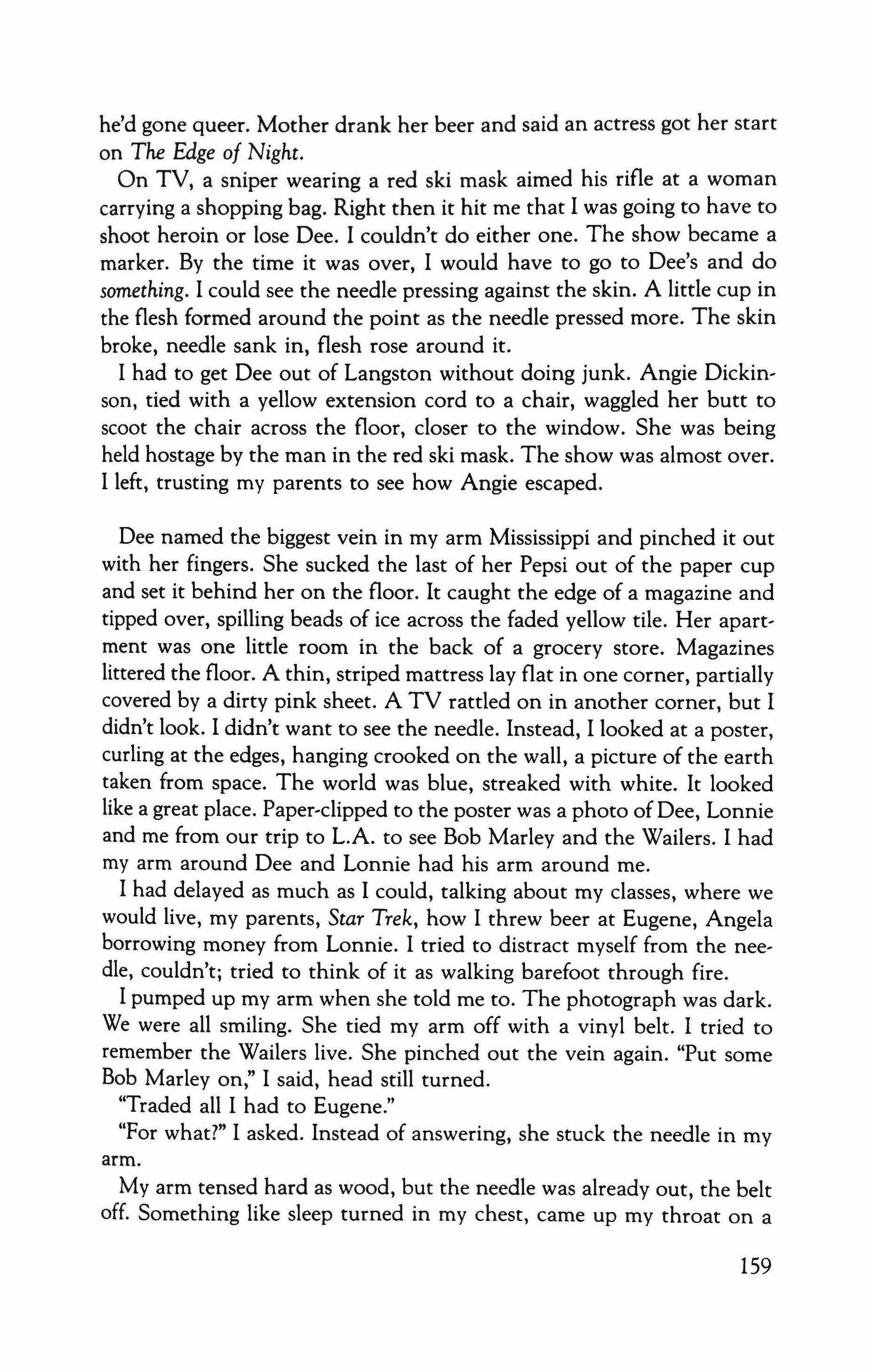
he'd gone queer. Mother drank her beer and said an actress got her start on The Edge of Night.
On TV, a sniper wearing a red ski mask aimed his rifle at a woman carrying a shopping bag. Right then it hit me that I was going to have to shoot heroin or lose Dee. I couldn't do either one. The show became a marker. By the time it was over, I would have to go to Dee's and do something. I could see the needle pressing against the skin. A little cup in the flesh formed around the point as the needle pressed more. The skin broke, needle sank in, flesh rose around it.
I had to get Dee out of Langston without doing junk. Angie Dickinson, tied with a yellow extension cord to a chair, waggled her butt to scoot the chair across the floor, closer to the window. She was being held hostage by the man in the red ski mask. The show was almost over. I left, trusting my parents to see how Angie escaped.
Dee named the biggest vein in my arm Mississippi and pinched it out with her fingers. She sucked the last of her Pepsi out of the paper cup and set it behind her on the floor. It caught the edge of a magazine and tipped over, spilling beads of ice across the faded yellow tile. Her apartment was one little room in the back of a grocery store. Magazines littered the floor. A thin, striped mattress lay flat in one corner, partially covered by a dirty pink sheet. A TV rattled on in another corner, but I didn't look. I didn't want to see the needle. Instead, I looked at a poster, curling at the edges, hanging crooked on the wall, a picture of the earth taken from space. The world was blue, streaked with white. It looked like a great place. Paper-clipped to the poster was a photo of Dee, Lonnie and me from our trip to L.A. to see Bob Marley and the Wailers. I had my arm around Dee and Lonnie had his arm around me.
I had delayed as much as I could, talking about my classes, where we would live, my parents, Star Trek, how I threw beer at Eugene, Angela borrowing money from Lonnie. I tried to distract myself from the needle, couldn't; tried to think of it as walking barefoot through fire.
I pumped up my arm when she told me to. The photograph was dark. We were all smiling. She tied my arm off with a vinyl belt. I tried to remember the Wailers live. She pinched out the vein again. "Put some Bob Marley on," I said, head still turned.
"Traded all I had to Eugene."
"For what?" I asked. Instead of answering, she stuck the needle in my arm.
My arm tensed hard as wood, but the needle was already out, the belt off. Something like sleep turned in my chest, came up my throat on a
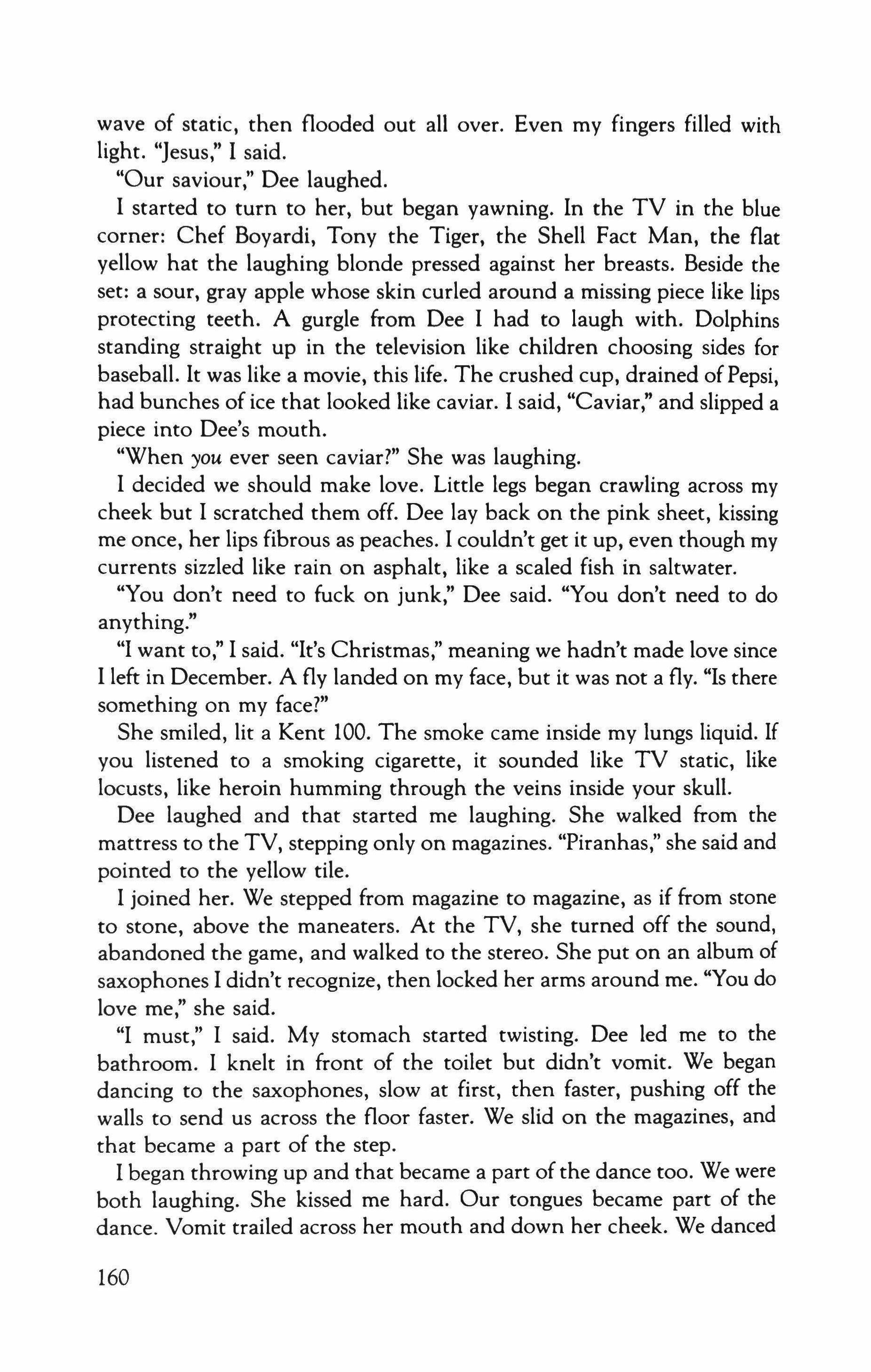
wave of static, then flooded out all over. Even my fingers filled with light. "Jesus," I said.
"Our saviour," Dee laughed.
I started to turn to her, but began yawning. In the TV in the blue corner: Chef Boyardi, Tony the Tiger, the Shell Fact Man, the flat yellow hat the laughing blonde pressed against her breasts. Beside the set: a sour, gray apple whose skin curled around a missing piece like lips protecting teeth. A gurgle from Dee I had to laugh with. Dolphins standing straight up in the television like children choosing sides for baseball. It was like a movie, this life. The crushed cup, drained ofPepsi, had bunches of ice that looked like caviar. I said, "Caviar," and slipped a piece into Dee's mouth.
"When you ever seen caviar?" She was laughing. I decided we should make love. Little legs began crawling across my cheek but I scratched them off. Dee lay back on the pink sheet, kissing me once, her lips fibrous as peaches. I couldn't get it up, even though my currents sizzled like rain on asphalt, like a scaled fish in saltwater.
"You don't need to fuck on junk," Dee said. "You don't need to do anything."
"I want to," I said. "It's Christmas," meaning we hadn't made love since I left in December. A fly landed on my face, but it was not a fly. "Is there something on my face?"
She smiled, lit a Kent 100. The smoke came inside my lungs liquid. If you listened to a smoking cigarette, it sounded like TV static, like locusts, like heroin humming through the veins inside your skull. Dee laughed and that started me laughing. She walked from the mattress to the TV, stepping only on magazines. "Piranhas," she said and pointed to the yellow tile.
I joined her. We stepped from magazine to magazine, as if from stone to stone, above the maneaters. At the TV, she turned off the sound, abandoned the game, and walked to the stereo. She put on an album of saxophones I didn't recognize, then locked her arms around me. "You do love me," she said.
"I must," I said. My stomach started twisting. Dee led me to the bathroom. I knelt in front of the toilet but didn't vomit. We began dancing to the saxophones, slow at first, then faster, pushing off the walls to send us across the floor faster. We slid on the magazines, and that became a part of the step.
I began throwing up and that became a part of the dance too. We were both laughing. She kissed me hard. Our tongues became part of the dance. Vomit trailed across her mouth and down her cheek. We danced

back to the mattress and pulled at each other's clothes. The music was over, maybe for a long time.
I kissed her breasts, bit her ribs. My fingers sank into the soft of her butt. "Freddie," she said, and I raised my head. "We can really get out?" I kissed her again, wiped the vomit from her face. "Freddie," she said again.
"We can get out," I said. "Eight hundred miles." I entered her. We made love for what may have been a long while. And all the time, inside the frenzy was the calm. Memory hovered about my head, becoming visible at intervals, like particles of dust in twilight-the alley behind the Bree where we bought pot, beneath the slide in the Woodard schoolyard where Dee and I first made love, the corner of Fifth and Main where the knobby prostitutes hawked, the vacant lot behind Mesa Drive-In where we made up dialogue for the huge silent screen, all the places we grew up lost-the men in suits and vests with high-polish shoes, the bearded transvestite who collected bottles in the basket of his bicycle, the black butcher with red slabs of meat, the abandoned Sinclair station covered with names, my name, Dee's, Lonnie's, Wilson's, Eugene's-the curtains of my parents' house drawn closed, the liquor store on Forty-ninth with the neon dinosaur, the all-night diner on Fourth Avenue, Lonnie's Coupe de Ville, the asphalt bedrooms, the unemployment building, my mother, who told me the last people who lived here didn't know how to behave.
"It's like dancing in the movies," Dee said, her hand on my chest. She laughed, looked confused. "Did I already say that?" She pulled gently at my dick. "I love you, Freddie. A lot. A very lot."
We slept.
"She just wasn't there," I said to Lonnie. The windows were starting to go dark and no sign of Dee all day. My head was clear, arm a little sore, and that grown-up feeling, age that just fell into me like a brick into a pond. Not that I liked needles or wanted junk, but I knew I couldn't tell Lonnie about heroin ever, and knowing that put a distance between us, made me feel older. "I slept late and she was just gone."
"You know where she is." He was on the floor, propping himself up with his elbows. Lonnie always sat on the floor if he had a choice.
"I know what she's doing. I don't know where she is."
Lonnie let his head drop back. He had the same long neck as his brother. He and Wilson had eaten last night across town, then drank beer at Mesa Drive-In, laughing and watching James Bond. All the tension Lonnie had the night before was gone. His brother was at a local
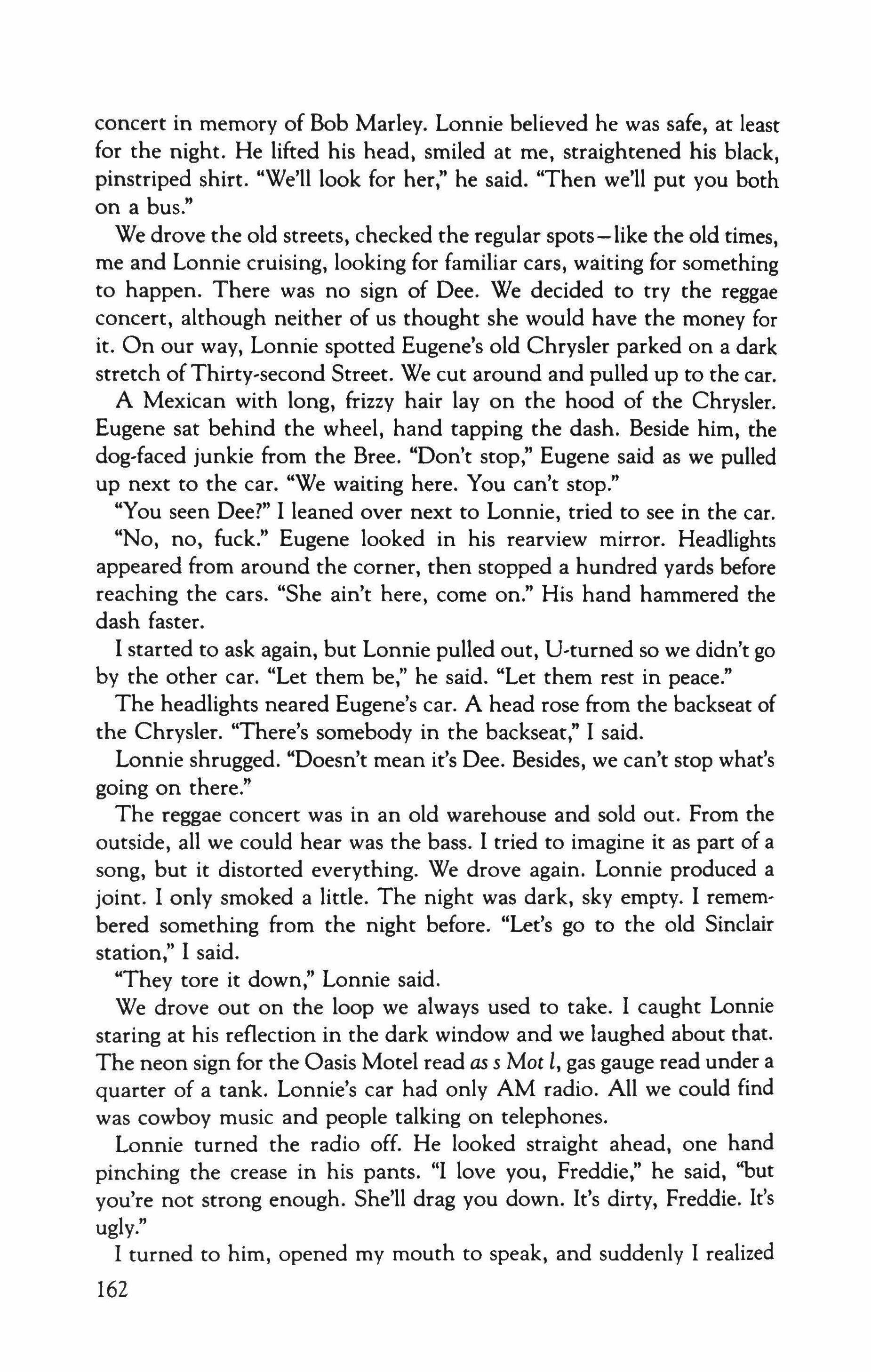
concert in memory of Bob Marley. Lonnie believed he was safe, at least for the night. He lifted his head, smiled at me, straightened his black, pinstriped shirt. "We'll look for her," he said. "Then we'll put you both on a bus."
We drove the old streets, checked the regular spots-like the old times, me and Lonnie cruising, looking for familiar cars, waiting for something to happen. There was no sign of Dee. We decided to try the reggae concert, although neither of us thought she would have the money for it. On our way, Lonnie spotted Eugene's old Chrysler parked on a dark stretch of Thirty-second Street. We cut around and pulled up to the car.
A Mexican with long, frizzy hair lay on the hood of the Chrysler. Eugene sat behind the wheel, hand tapping the dash. Beside him, the dog-faced junkie from the Bree. "Don't stop," Eugene said as we pulled up next to the car. "We waiting here. You can't stop."
"You seen Dee?" I leaned over next to Lonnie, tried to see in the car.
"No, no, fuck." Eugene looked in his rearview mirror. Headlights appeared from around the corner, then stopped a hundred yards before reaching the cars. "She ain't here, come on." His hand hammered the dash faster.
I started to ask again, but Lonnie pulled out, Ueturned so we didn't go by the other car. "Let them be," he said. "Let them rest in peace."
The headlights neared Eugene's car. A head rose from the backseat of the Chrysler. "There's somebody in the backseat," I said.
Lonnie shrugged. "Doesn't mean it's Dee. Besides, we can't stop what's going on there."
The reggae concert was in an old warehouse and sold out. From the outside, all we could hear was the bass. I tried to imagine it as part of a song, but it distorted everything. We drove again. Lonnie produced a joint. I only smoked a little. The night was dark, sky empty. I rernembered something from the night before. "Let's go to the old Sinclair station," I said.
"They tore it down," Lonnie said.
We drove out on the loop we always used to take. I caught Lonnie staring at his reflection in the dark window and we laughed about that. The neon sign for the Oasis Motel read as s Mot i, gas gauge read under a quarter of a tank. Lonnie's car had only AM radio. All we could find was cowboy music and people talking on telephones.
Lonnie turned the radio off. He looked straight ahead, one hand pinching the crease in his pants. "I love you, Freddie," he said, "but you're not strong enough. She'll drag you down. It's dirty, Freddie. It's ugly."
I turned to him, opened my mouth to speak, and suddenly I realized
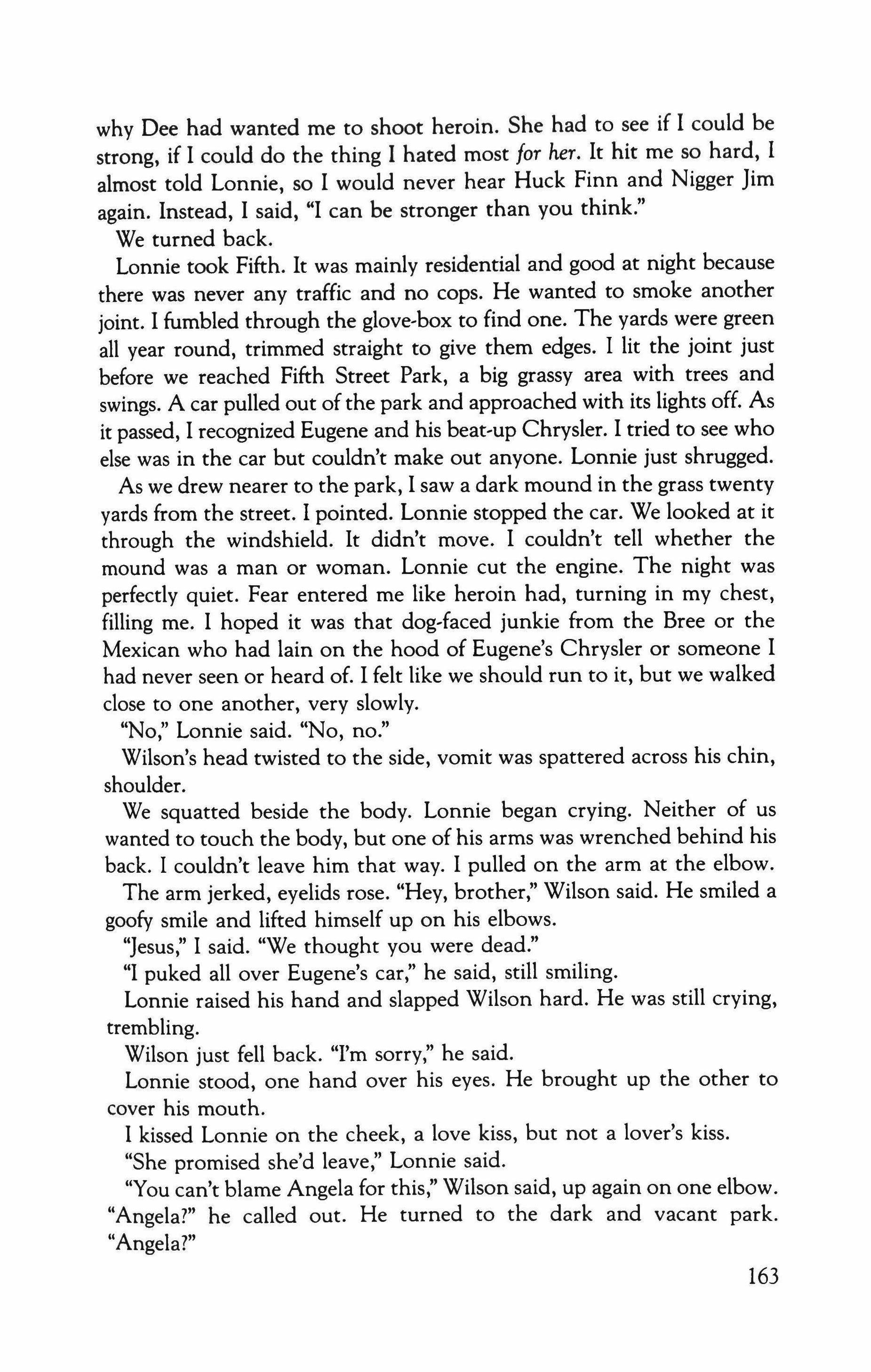
why Dee had wanted me to shoot heroin. She had to see if I could be strong, if I could do the thing I hated most for her. It hit me so hard, I almost told Lonnie, so I would never hear Huck Finn and Nigger Jim again. Instead, I said, "I can be stronger than you think."
We turned back.
Lonnie took Fifth. It was mainly residential and good at night because there was never any traffic and no cops. He wanted to smoke another joint. I fumbled through the glove-box to find one. The yards were green all year round, trimmed straight to give them edges. I lit the joint just before we reached Fifth Street Park, a big grassy area with trees and swings. A car pulled out of the park and approached with its lights off. As it passed, I recognized Eugene and his beat-up Chrysler. I tried to see who else was in the car but couldn't make out anyone. Lonnie just shrugged.
As we drew nearer to the park, I saw a dark mound in the grass twenty yards from the street. I pointed. Lonnie stopped the car. We looked at it through the windshield. It didn't move. I couldn't tell whether the mound was a man or woman. Lonnie cut the engine. The night was perfectly quiet. Fear entered me like heroin had, turning in my chest, filling me. I hoped it was that dog-faced junkie from the Bree or the Mexican who had lain on the hood of Eugene's Chrysler or someone I had never seen or heard of. I felt like we should run to it, but we walked close to one another, very slowly.
"No," Lonnie said. "No, no."
Wilson's head twisted to the side, vomit was spattered across his chin, shoulder.
We squatted beside the body. Lonnie began crying. Neither of us wanted to touch the body, but one of his arms was wrenched behind his back. I couldn't leave him that way. I pulled on the arm at the elbow.
The arm jerked, eyelids rose. "Hey, brother," Wilson said. He smiled a goofy smile and lifted himself up on his elbows.
"Jesus," I said. "We thought you were dead."
"I puked all over Eugene's car," he said, still smiling.
Lonnie raised his hand and slapped Wilson hard. He was still crying, trembling.
Wilson just fell back. "I'm sorry," he said.
Lonnie stood, one hand over his eyes. He brought up the other to cover his mouth.
I kissed Lonnie on the cheek, a love kiss, but not a lover's kiss.
"She promised she'd leave," Lonnie said.
"You can't blame Angela for this," Wilson said, up again on one elbow. "Angela?" he called out. He turned to the dark and vacant park. "Angela?"
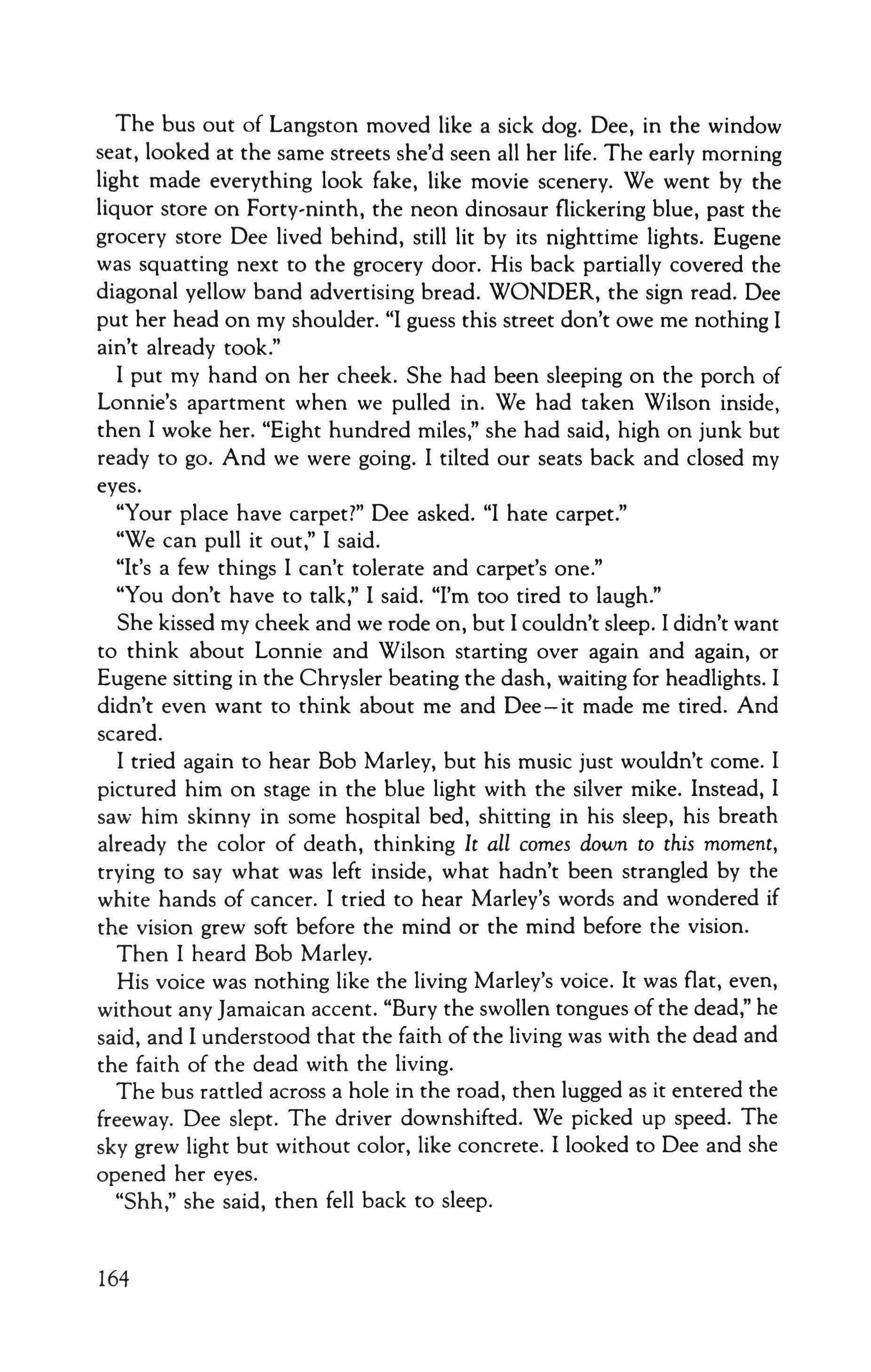
The bus out of Langston moved like a sick dog. Dee, in the window seat, looked at the same streets she'd seen all her life. The early morning light made everything look fake, like movie scenery. We went by the liquor store on Forty-ninth, the neon dinosaur flickering blue, past the grocery store Dee lived behind, still lit by its nighttime lights. Eugene was squatting next to the grocery door. His back partially covered the diagonal yellow band advertising bread. WONDER, the sign read. Dee put her head on my shoulder. "I guess this street don't owe me nothing I ain't already took."
I put my hand on her cheek. She had been sleeping on the porch of Lonnie's apartment when we pulled in. We had taken Wilson inside, then I woke her. "Eight hundred miles," she had said, high on junk but ready to go. And we were going. I tilted our seats back and closed my eyes.
"Your place have carpet!" Dee asked. "I hate carpet."
"We can pull it out," I said.
"It's a few things I can't tolerate and carpet's one."
"You don't have to talk," I said. "I'm too tired to laugh."
She kissed my cheek and we rode on, but I couldn't sleep. I didn't want to think about Lonnie and Wilson starting over again and again, or Eugene sitting in the Chrysler beating the dash, waiting for headlights. I didn't even want to think about me and Dee - it made me tired. And scared.
I tried again to hear Bob Marley, but his music just wouldn't come. I pictured him on stage in the blue light with the silver mike. Instead, I saw him skinny in some hospital bed, shirting in his sleep, his breath already the color of death, thinking It all comes down to this moment, trying to say what was left inside, what hadn't been strangled by the white hands of cancer. I tried to hear Marley's words and wondered if the vision grew soft before the mind or the mind before the vision.
Then I heard Bob Marley.
His voice was nothing like the living Marley's voice. It was flat, even, without any Jamaican accent. "Bury the swollen tongues of the dead," he said, and I understood that the faith of the living was with the dead and the faith of the dead with the living.
The bus rattled across a hole in the road, then lugged as it entered the freeway. Dee slept. The driver downshifted. We picked up speed. The sky grew light but without color, like concrete. I looked to Dee and she opened her eyes.
"Shh," she said, then fell back to sleep.
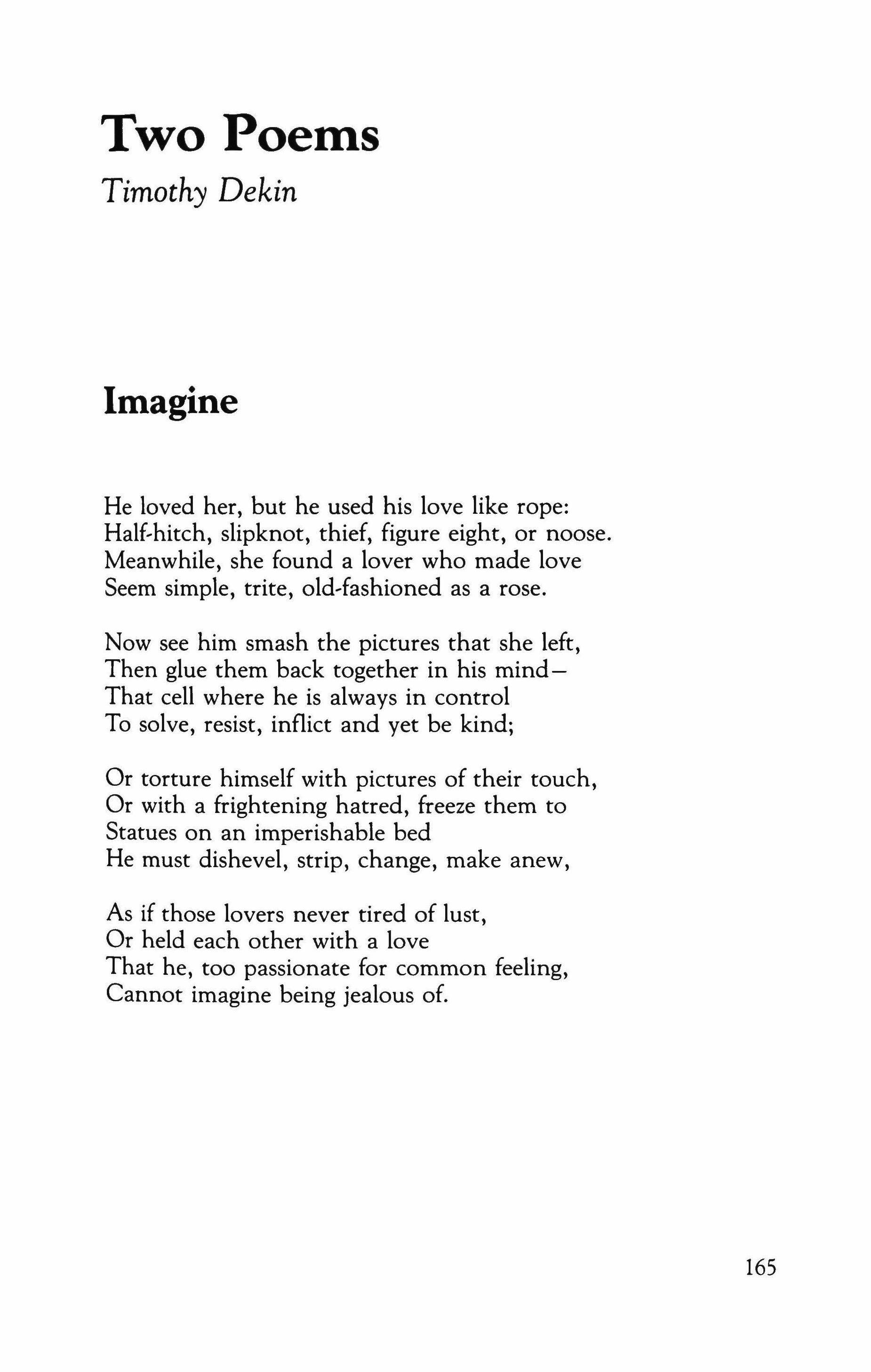
He loved her, but he used his love like rope: Half-hitch, slipknot, thief, figure eight, or noose. Meanwhile, she found a lover who made love Seem simple, trite, old-fashioned as a rose.
Now see him smash the pictures that she left, Then glue them back together in his mindThat cell where he is always in control To solve, resist, inflict and yet be kind;
Or torture himself with pictures of their touch, Or with a frightening hatred, freeze them to Statues on an imperishable bed He must dishevel, strip, change, make anew,
As if those lovers never tired of lust, Or held each other with a love
That he, too passionate for common feeling, Cannot imagine being jealous of.

for Ken
Sometimes her suffering seems beautiful. That old black magic has her in its spell
Until its wand is broken by her hands
Trembling a silver lighter, or the glands
She counters at the faint, perfumed pulse place Behind her ear, but shares with the disgraced.
For her, in Gres perfume, the correct shoes, Some church has lent the basement it can't use-
Tables with pamphlets, clean cement decor, The couches, lamps, and people, pure Thrift store.
She hopes the couches have been sterilized. She is afraid she will be recognized,
But terrified of blending in. God knows The shattered alcoholics propped in rows
Deserve one's pity.
One man stands and jokes Away the guilt the last rites couldn't coax;
He wears the world like a loose garment-just Her size, but she's not buying, not on trust.
She won't fall backwards into someone's arms. Except in the most elegant of bars.
Was it her parents who made her this way? She hated being beautiful when they
Talked about her as if she were not there, But when they changed the subject, what despair

She left, to show them, on her untouched plate, Which now she eats for breakfast, cold as hate.
Her doctor/lover still lectures when they meet. She hasn't changed the cat-box dirt for weeks,
Just put on more perfume, and it's too much. The cat has bolted and she drinks her lunch.
The doctor has at last repressed the lover. He says now that her problem was her father,
Which their affair brought out. She searches her purse
For his new cuff links, gives until it hurts.
The waiter wonders what her problem is, But how would she know? It's like a flaming dish,
Crepes aux peche flambeaux, blue alcohol
She spoons through flaming tears she can't let fall
For preciousness. They catch her auburn hair, The doctor's suit on fire, until the glare
Consumes this hall, the awful people. She's
Holly, who always tries so hard to please,
To live up to the perfect self she sought, Or else get even with herself for not,
Sometimes in church, sometimes beneath a table, On the floor, in the dirt, among the rabble
Who listen now as she stands up, undressed, And tells the story no one has ever guessed:
Of old black magic that they know so well, Almost too dark to tell, now laughable.
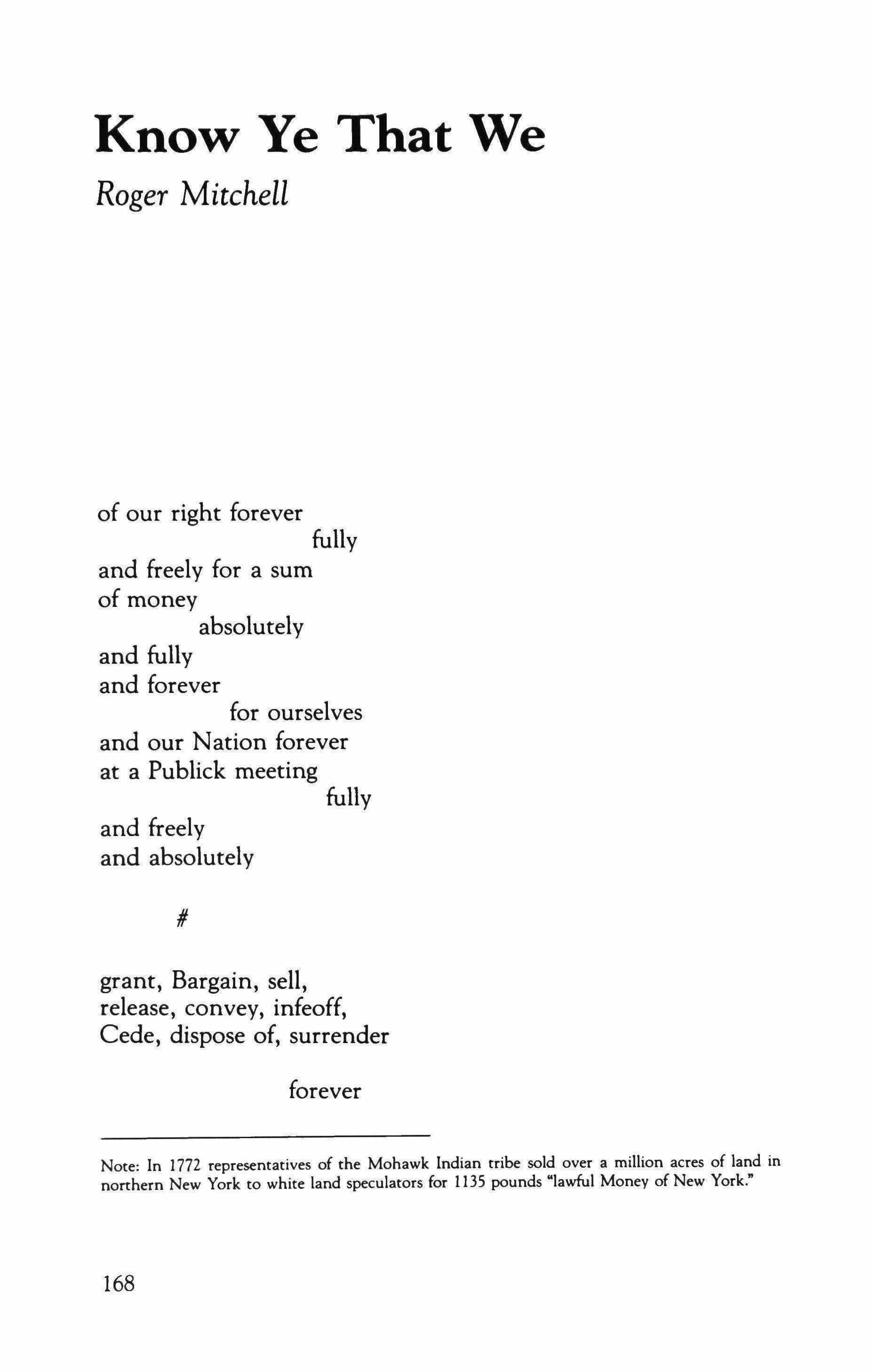
of our right forever fully and freely for a sum of money absolutely and fully and forever for ourselves and our Nation forever at a Publick meeting fully and freely and absolutely # grant, Bargain, sell, release, convey, infeoff, Cede, dispose of, surrender forever
Note: In 1772 representatives of the Mohawk Indian tribe sold over a million acres of land in northern New York to white land speculators for 1135 pounds "lawful Money of New York."
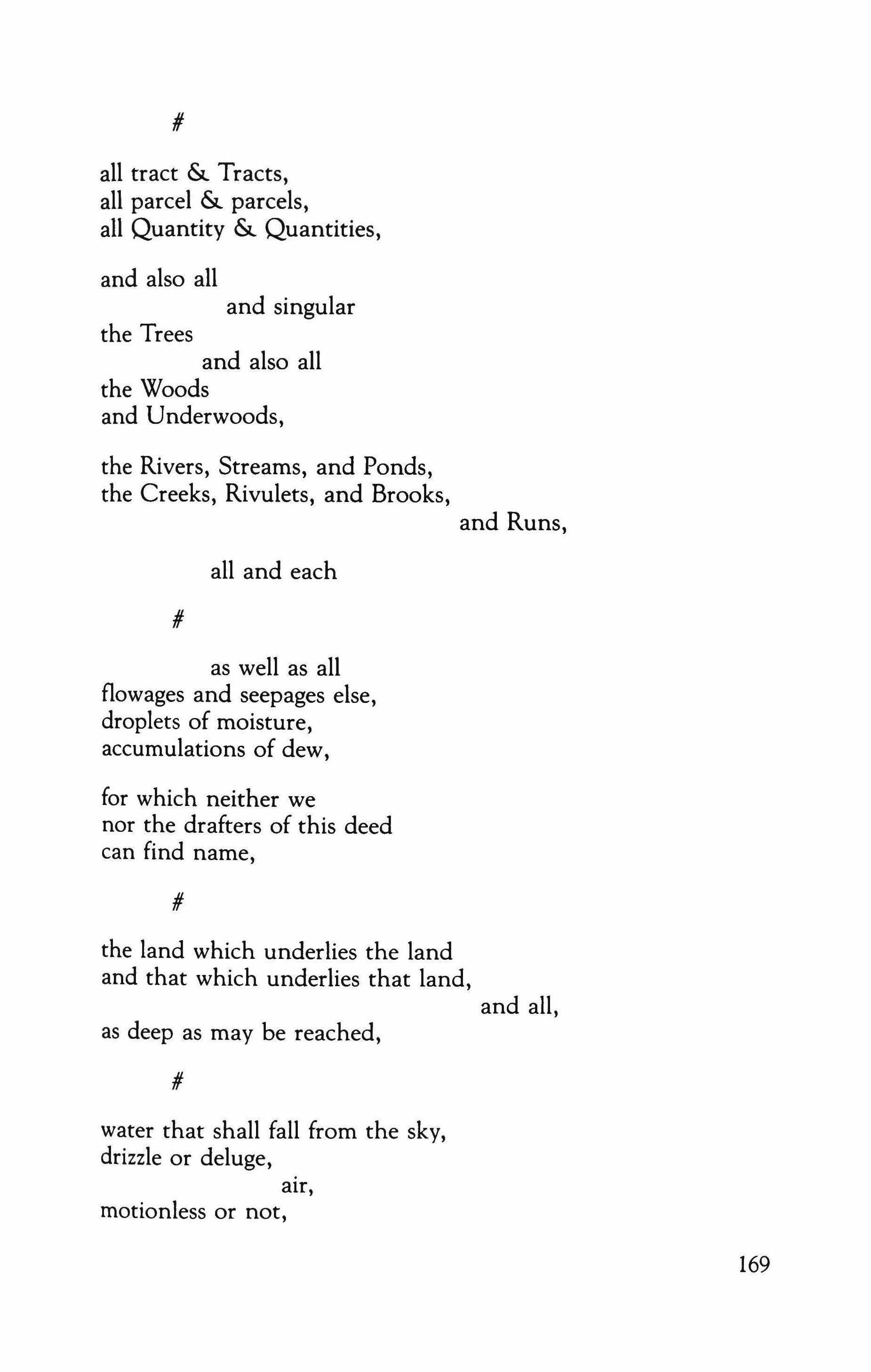
#
all tract & Tracts, all parcel & parcels, all Quantity & Quantities, and also all and singular the Trees and also all the Woods and Underwoods, the Rivers, Streams, and Ponds, the Creeks, Rivulets, and Brooks, and Runs, all and each # as well as all flowages and seepages else, droplets of moisture, accumulations of dew, for which neither we nor the drafters of this deed can find name,
# the land which underlies the land and that which underlies that land, and all, as deep as may be reached, # water that shall fall from the sky, drizzle or deluge, air, motionless or not,
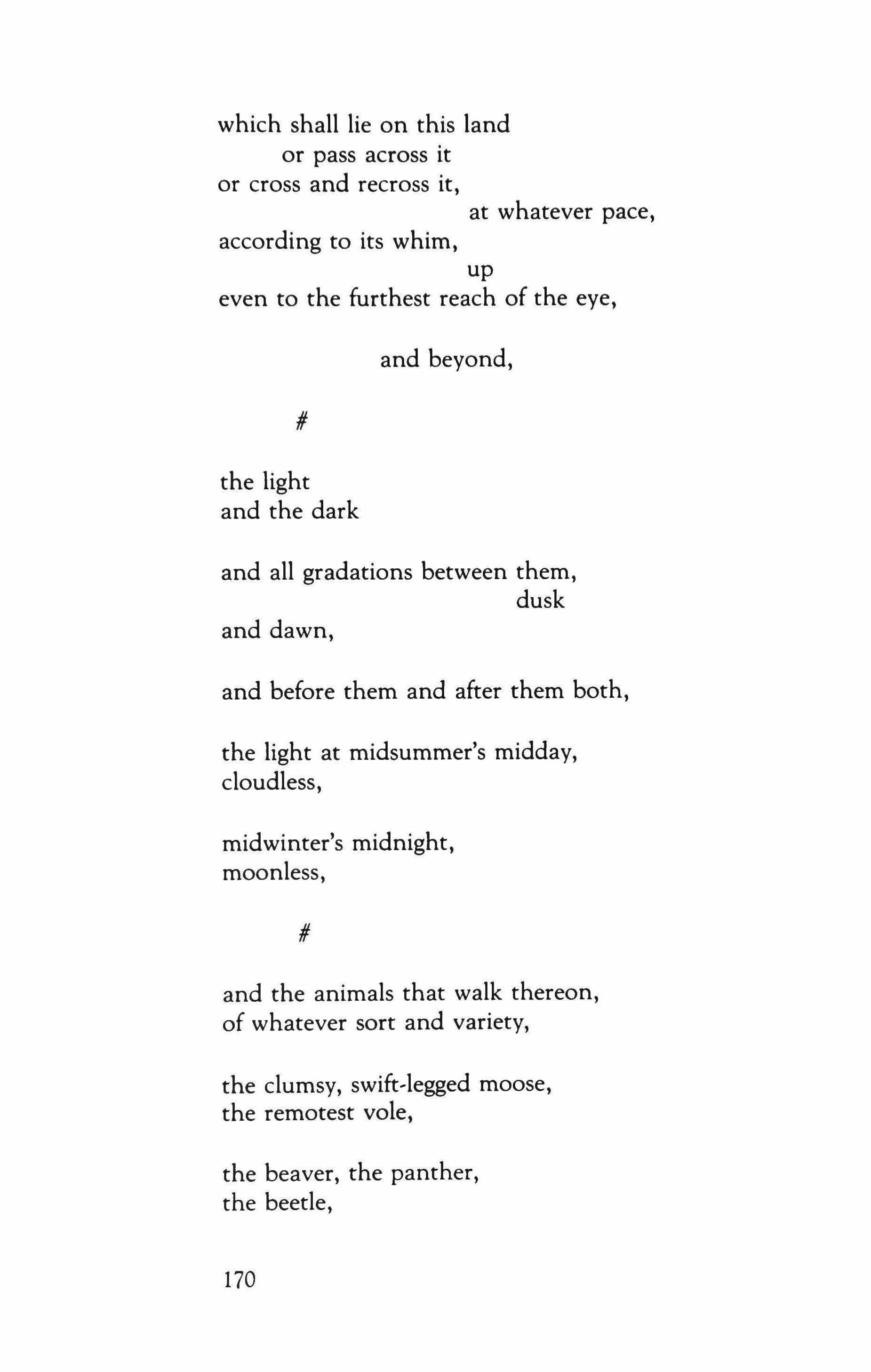
which shall lie on this land or pass across it or cross and recross it, at whatever pace, according to its whim, up even to the furthest reach of the eye, and beyond, # the light and the dark and all gradations between them, dusk and dawn, and before them and after them both, the light at midsummer's midday, cloudless, midwinter's midnight, moonless, # and the animals that walk thereon, of whatever sort and variety, the clumsy, swift-legged moose, the remotest vole, the beaver, the panther, the beetle,
those that burrow, however deep, those that fly, however high, or far, so long as they shall return,
# all manner of thing forever, all aspect or quality, all attribute or way, fully and freely,
# so that in time to come when we are asked for, they will not know what word to use.
# Hendricks, alias Tayahansara Lourance, alias Agwiraeghje Hans, alias Canadajaure [ohans Crim, alias Onagoodhoge, we of the Mohock Castle
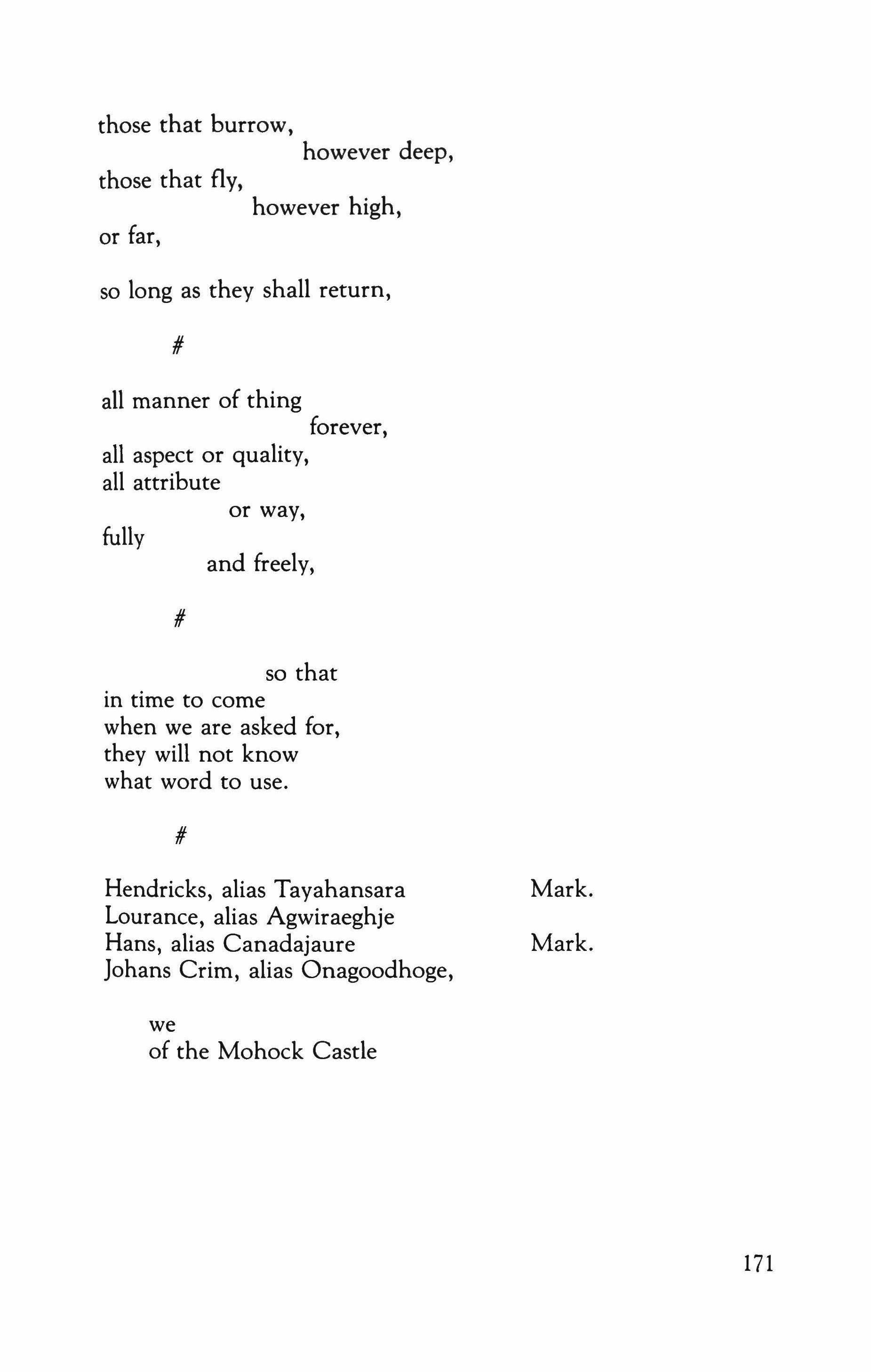
Mark.
Mark.
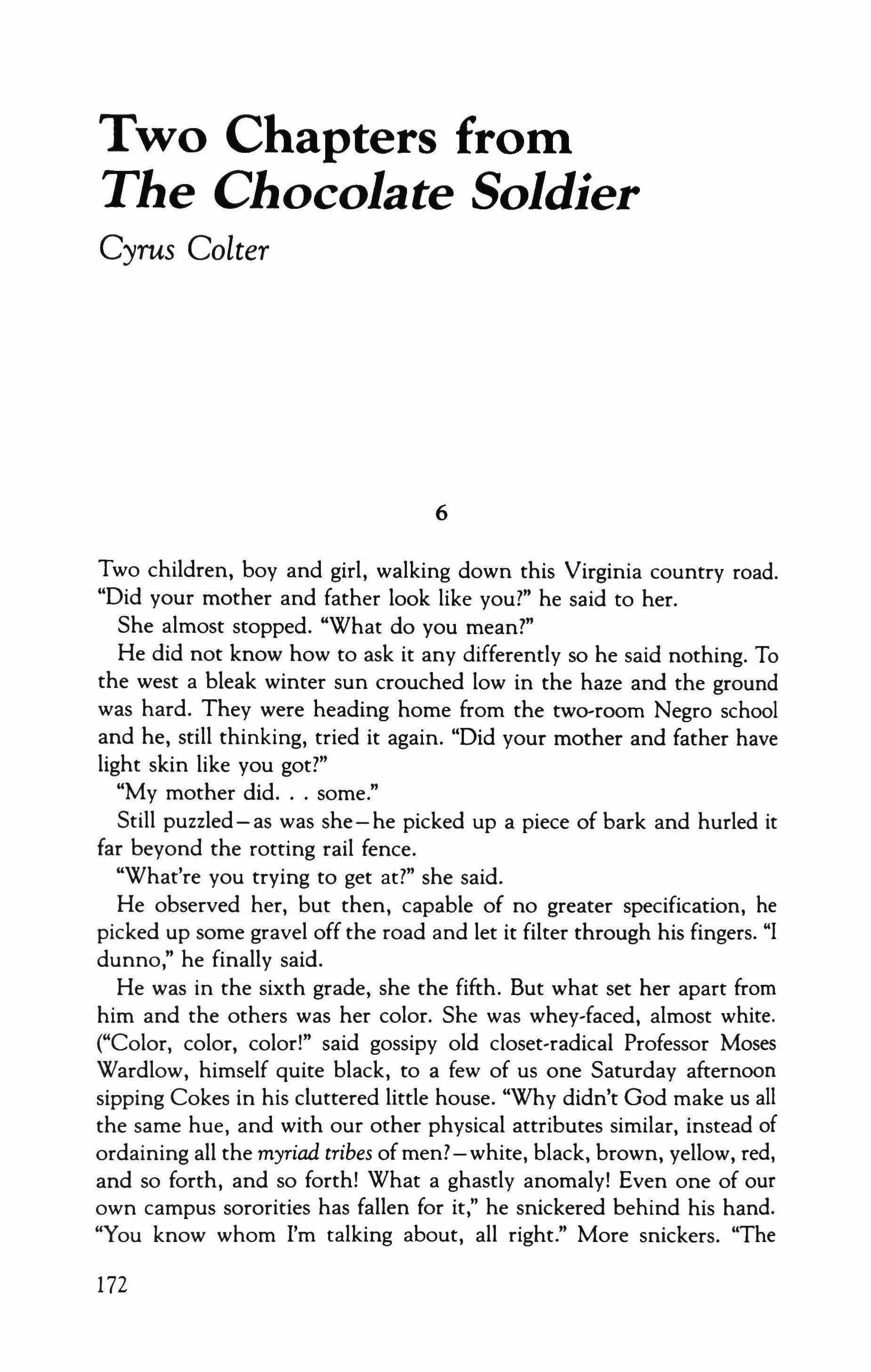
6
Two children, boy and girl, walking down this Virginia country road. "Did your mother and father look like you?" he said to her.
She almost stopped. "What do you mean?"
He did not know how to ask it any differently so he said nothing. To the west a bleak winter sun crouched low in the haze and the ground was hard. They were heading home from the two-room Negro school and he, still thinking, tried it again. "Did your mother and father have light skin like you got?"
"My mother did some."
Still puzzled-as was she-he picked up a piece of bark and hurled it far beyond the rotting rail fence.
"What're you trying to get at?" she said.
He observed her, but then, capable of no greater specification, he picked up some gravel off the road and let it filter through his fingers. "1 dunno," he finally said.
He was in the sixth grade, she the fifth. But what set her apart from him and the others was her color. She was whey-faced, almost white. ("Color, color, color!" said gossipy old closet-radical Professor Moses Wardlow, himself quite black, to a few of us one Saturday afternoon sipping Cokes in his cluttered little house. "Why didn't God make us all the same hue, and with our other physical attributes similar, instead of ordaining all the myriad tribes of men? - white, black, brown, yellow, red, and so forth, and so forth! What a ghastly anomaly! Even one of our own campus sororities has fallen for it," he snickered behind his hand. "You know whom I'm talking about, all right." More snickers. "The

Betas, of course. Of the twenty-or-so girls making up the roster of Beta Epsilon, only three can be said to be of really dark skin-ha, like my own! But, you see, that trio of sorors has other 'advantages' that offsetto a degree, that is-their unfortunate 'disability.' The father of Alene Farmer is a Memphis physician. Zoe Campbell is a straight-A student, bless her heart, but, besides," [snickers] "has pretty legs and 'nice' hair! Little Coralee Hines, of course, is none other than President Groomes' niece from Shreveport! Awake, Black-and I don't mean High YellowAmerica! You have nothing to lose but your pigment complexes!") Now the two children were passing the shack of Muncie Henry who sharecropped for Judge Timothy Carr.
"Look!" she suddenly gasped. Behind the house they saw standing in Muncie's lopsided barn door his gaunt old white mule. It gawked at them, then, still gazing curiously but now woebegone, moved its long ears up and down, forward and back, as if somehow plaintively beckoning to them. "What is it?" she said. "It's scary!" The ghostlike critter, still propelling its ears, now emitted a feeble bray and started ambling toward them. "Let's go, Rollo!" she said, recoiling. "It looks like a hant! It makes me feel bad, like when they slid Mama's coffin into the hearse!"
He grinned. "It ain't no hant. Ain't nothing but a mule. Lord, you city folks."
"Can a mule be white?" She was aghast.
He thought for a moment. "This one is, ain't it? But looks like it's going to the glue factory before long. Won't be white then."
Shuddering, Alma hurried on.
She was not a pretty child but her ways were feminine and shy most of the time and he liked that. It made him feel strong and protective. He also felt sorry for her. She had come all the way from Gadsden, Alabama, to the Virginia tidewater to live with an uncle and aunt because her mother had recently died. But the children at school, including himself, were mystified by her whiteness. Never had they seen a Negro person like her. It caused whisperings, even among some parents, who, though, knew better, knew the answer. Although he understood none of it he was angered by the whispers. They made him actually want to fight those at school who engaged in them.
He finally took the matter to his grandmother-"Granny" - his father's mother, who lived with them. Granny gave her dry, sardonic cackle, saying, "Lord, boy, don't you know all colored folks ain't colored? Sorne're black, some're white, sorne're in between. But we was all black when they brought us here from Aficka." For a long time he thought about this; still he did not understand. But his affecting friendship with
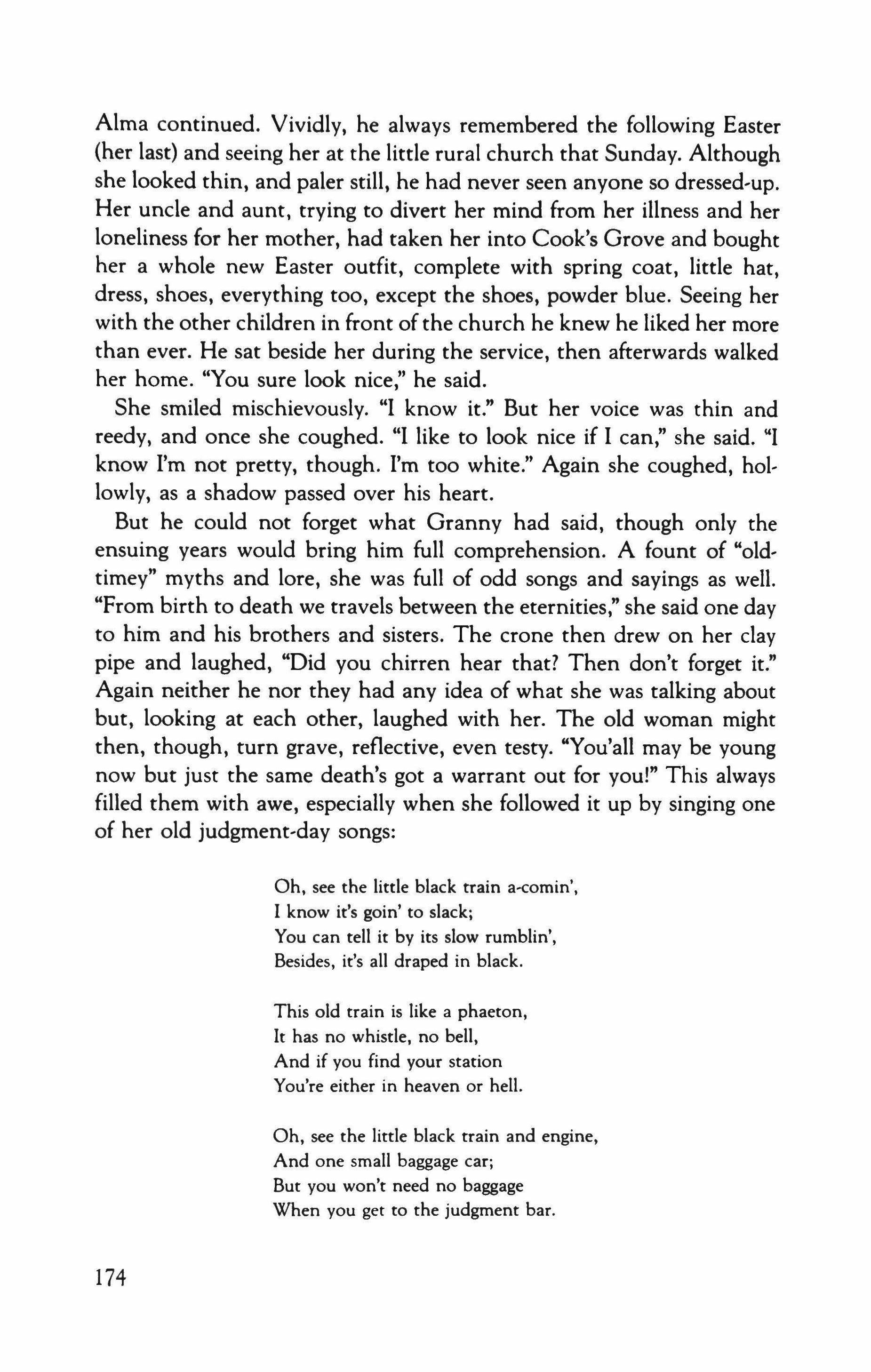
Alma continued. Vividly, he always remembered the following Easter (her last) and seeing her at the little rural church that Sunday. Although she looked thin, and paler still, he had never seen anyone so dressed-up. Her uncle and aunt, trying to divert her mind from her illness and her loneliness for her mother, had taken her into Cook's Grove and bought her a whole new Easter outfit, complete with spring coat, little hat, dress, shoes, everything too, except the shoes, powder blue. Seeing her with the other children in front of the church he knew he liked her more than ever. He sat beside her during the service, then afterwards walked her home. "You sure look nice," he said.
She smiled mischievously. "I know it." But her voice was thin and reedy, and once she coughed. "I like to look nice if I can," she said. "I know I'm not pretty, though. I'm too white." Again she coughed, hollowly, as a shadow passed over his heart.
But he could not forget what Granny had said, though only the ensuing years would bring him full comprehension. A fount of "oldtimey" myths and lore, she was full of odd songs and sayings as well. "From birth to death we travels between the eternities," she said one day to him and his brothers and sisters. The crone then drew on her clay pipe and laughed, "Did you chirren hear that? Then don't forget it." Again neither he nor they had any idea of what she was talking about but, looking at each other, laughed with her. The old woman might then, though, turn grave, reflective, even testy. "You'all may be young now but just the same dearh's got a warrant out for you!" This always filled them with awe, especially when she followed it up by singing one of her old judgment-day songs:
Oh, see the little black train a-comin', I know it's goin' to slack; You can tell it by its slow rumblin', Besides, it's all draped in black.
This old train is like a phaeton, It has no whistle, no bell, And if you find your station You're either in heaven or hell.
Oh, see the little black train and engine, And one small baggage car; But you won't need no baggage When you get to the judgment bar.

Rollo asked his father what Granny meant by all this queer talk and singing, but Amos Lee, limp in his chair before supper, bone-weary from his long day in the fields, only went on nodding until he had fallen asleep as the boy talked.
The family lived on a forty-five-acre piece of land that Amos sharecropped for Nathan Blatchford. Although he was not, Blatchford seemed as poor as his tenants, if one noticed only his ragged overalls, worn-out brogans, or the hole in his hat. But the tenants knew better and said he could also be mean and unreasonable, even for a white man. Yet he was confounding too, his behavior beyond predicting. His children, the boys and girls, sometimes visited and played with the Negro children, and Blatchford, but never his wife, liked attending the Negroes' little church almost as much as his own. One Sunday morning he became so aroused by the visiting preacher's loud sermon, the praying, moaning, humming and singing, that he jumped up and began outshouting everybody-no mean feat, for Rollo's Granny, although a tiny woman, was herself a great shouter, and huge Emmy Beecher, a childless widow, was known far and wide for the uproar, fist-swinging and violence of her own shouting.
But that day Blatchford, a big man, outdid everybody. He was a spectacle. Members of the congregation ducked and dodged his rushing, stampeding and bellowing more than they ever had Granny's or Emmy's. It was pandemonium and took five minutes to bring under control, leaving Blatchford panting and drenched in sweat but sated and momentarily humbled. Yet, a few days later, in a fit of arbitrary rage, he knocked one of his tenants down with his fists for a trifling infraction amounting to nothing. The following Sunday, however, he was back at the church as if nothing had happened.
"Sure, sure, wouldn't you know it?" someone in the congregation whispered.
Things got quiet. More whispering began then and soon everyone was looking up at the pulpit to the regular pastor, Reverend Minnifield, to see what, if anything, he would do, for as the minutes passed and the little church filled up they thought Minnifield might do what they themselves were afraid to do, viz., ask Blatchford to leave. Rollo, a teenager, recalled years later how the beefy, red-faced landlord had sat there midway the church, but off to himself, and stared up at the pulpit where uneasy Minnifield, himself a Blatchford tenant, was waiting to begin the service. But as time ticked on everyone was getting as upset at the pastor as at Blatchford. Then before anyone knew what was happening big Emmy Beecher was on her feet. She was frowning hard and,
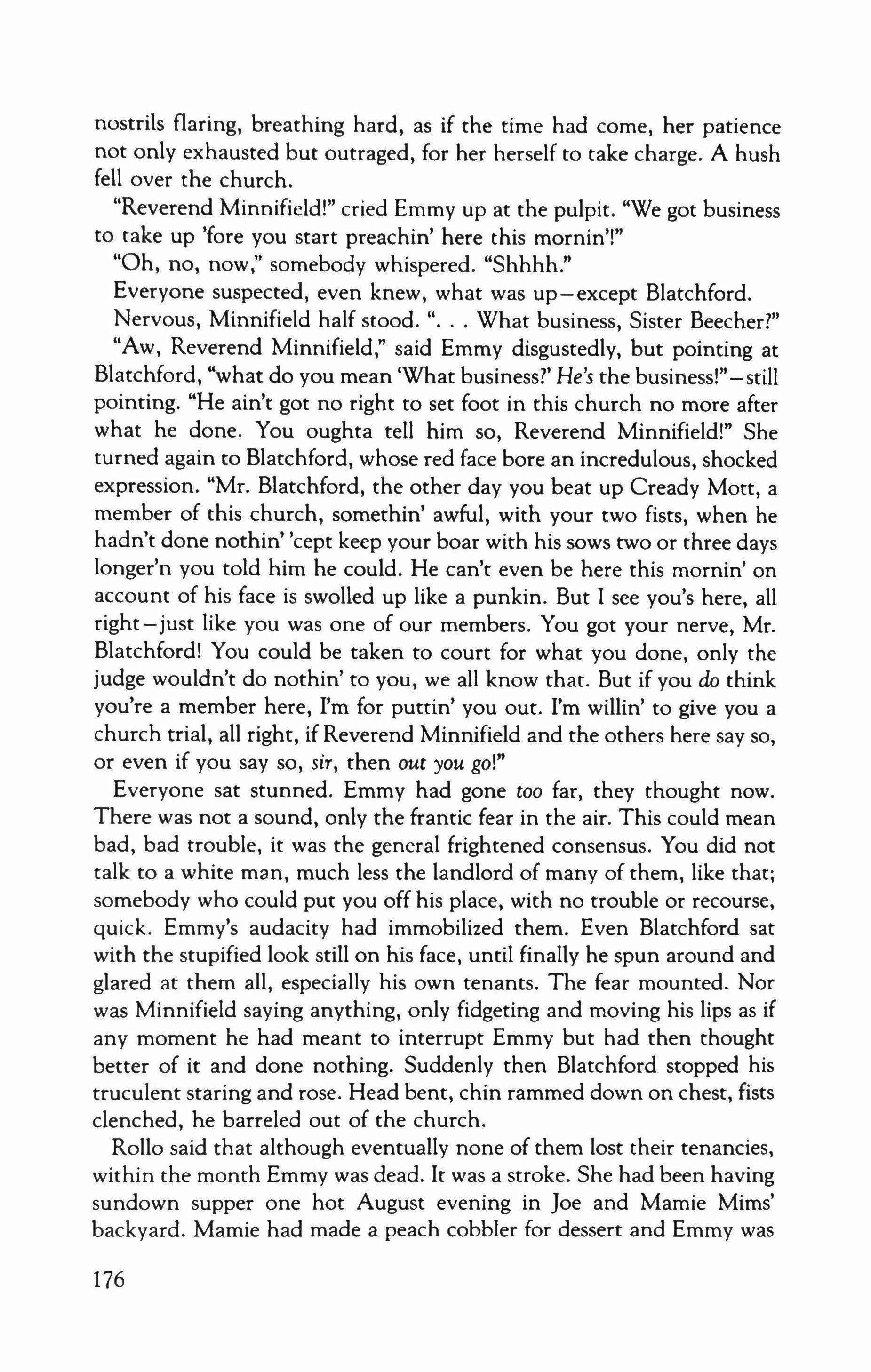
nostrils flaring, breathing hard, as if the time had come, her patience not only exhausted but outraged, for her herself to take charge. A hush fell over the church.
"Reverend Minnifield!" cried Emmy up at the pulpit. "We got business to take up 'fore you start preachin' here this mornin'!"
"Oh, no, now," somebody whispered. "Shhhh."
Everyone suspected, even knew, what was up-except Blatchford. Nervous, Minnifield half stood. What business, Sister Beecher?"
"Aw, Reverend Minnifield," said Emmy disgustedly, but pointing at Blatchford, "what do you mean 'What business?' He's the business!"-still pointing. "He ain't got no right to set foot in this church no more after what he done. You oughta tell him so, Reverend Minnifield!" She turned again to Blatchford, whose red face bore an incredulous, shocked expression. "Mr. Blatchford, the other day you beat up Creadv Mort, a member of this church, somethin' awful, with your two fists, when he hadn't done nothin' 'cept keep your boar with his sows two or three days longer'n you told him he could. He can't even be here this mornin' on account of his face is swolled up like a punkin. But I see you's here, all right - just like you was one of our members. You got your nerve, Mr. Blatchford! You could be taken to court for what you done, only the judge wouldn't do nothin' to you, we all know that. But if you do think you're a member here, I'm for puttin' you out. I'm willin' to give you a church trial, all right, if Reverend Minnifield and the others here say so, or even if you say so, sir, then out you go!"
Everyone sat stunned. Emmy had gone too far, they thought now. There was not a sound, only the frantic fear in the air. This could mean bad, bad trouble, it was the general frightened consensus. You did not talk to a white man, much less the landlord of many of them, like that; somebody who could put you off his place, with no trouble or recourse, quick. Emmy's audacity had immobilized them. Even Blatchford sat with the stupified look still on his face, until finally he spun around and glared at them all, especially his own tenants. The fear mounted. Nor was Minnifield saying anything, only fidgeting and moving his lips as if any moment he had meant to interrupt Emmy but had then thought better of it and done nothing. Suddenly then Blatchford stopped his truculent staring and rose. Head bent, chin rammed down on chest, fists clenched, he barreled out of the church.
Rollo said that although eventually none of them lost their tenancies, within the month Emmy was dead. It was a stroke. She had been having sundown supper one hot August evening in Joe and Mamie Mims' backyard. Mamie had made a peach cobbler for dessert and Emmy was
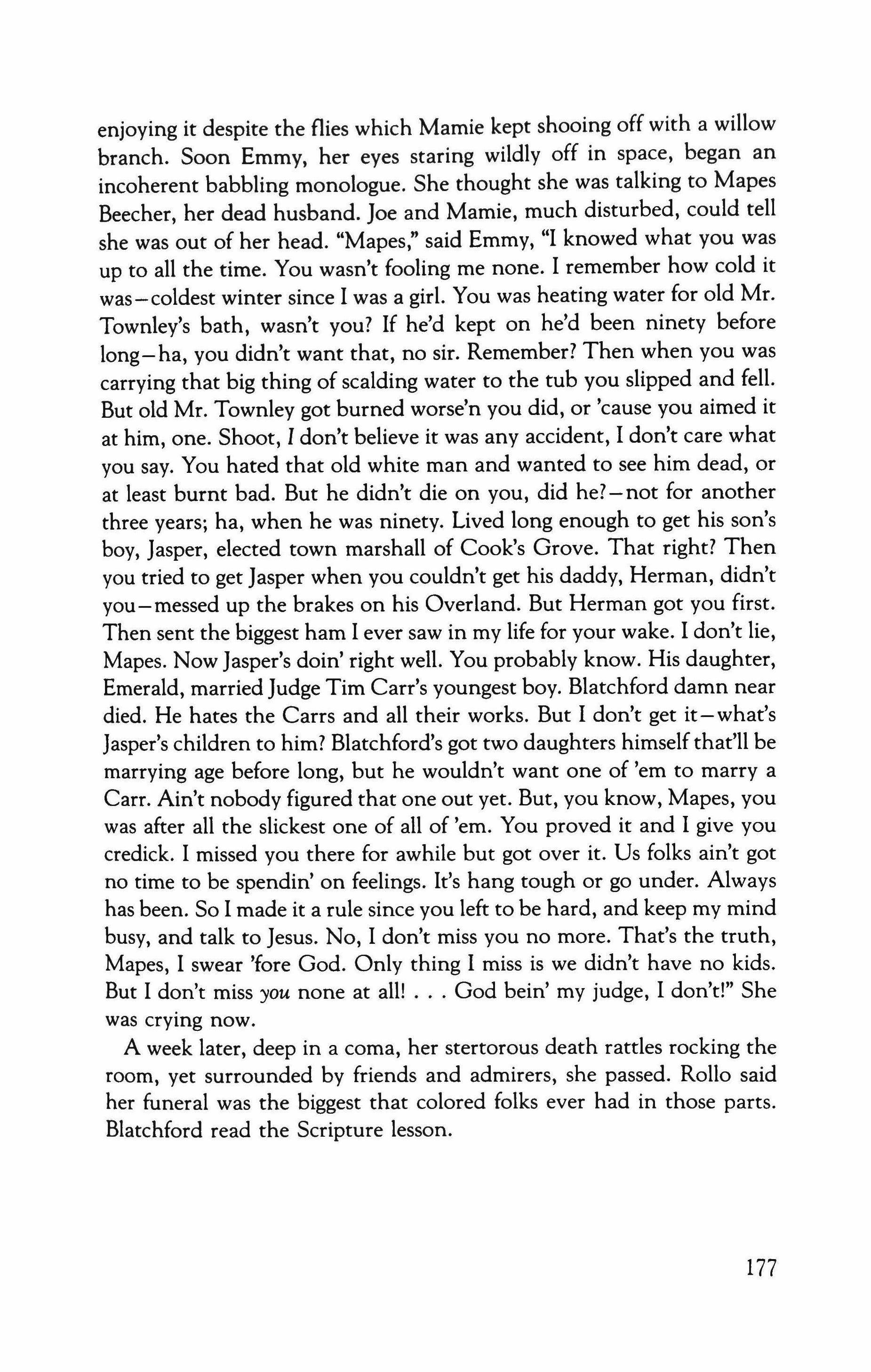
enjoying it despite the flies which Mamie kept shooing off with a willow branch. Soon Emmy, her eyes staring wildly off in space, began an incoherent babbling monologue. She thought she was talking to Mapes Beecher, her dead husband. Joe and Mamie, much disturbed, could tell she was out of her head. "Mapes," said Emmy, "I knowed what you was up to all the time. You wasn't fooling me none. I remember how cold it was-coldest winter since I was a girl. You was heating water for old Mr. Townley's bath, wasn't you? If he'd kept on he'd been ninety before long-ha, you didn't want that, no sir. Remember? Then when you was carrying that big thing of scalding water to the tub you slipped and fell. But old Mr. Townley got burned worse'n you did, or 'cause you aimed it at him, one. Shoot, I don't believe it was any accident, I don't care what you say. You hated that old white man and wanted to see him dead, or at least burnt bad. But he didn't die on you, did he? - not for another three years; ha, when he was ninety. Lived long enough to get his son's boy, Jasper, elected town marshall of Cook's Grove. That right? Then you tried to get Jasper when you couldn't get his daddy, Herman, didn't you-messed up the brakes on his Overland. But Herman got you first. Then sent the biggest ham I ever saw in my life for your wake. I don't lie, Mapes. Now Jasper's doin' right well. You probably know. His daughter, Emerald, married Judge Tim Carr's youngest boy. Blatchford damn near died. He hates the Carrs and all their works. But I don't get it-what's Jasper's children to him? Blatchford's got two daughters himselfthat'll be marrying age before long, but he wouldn't want one of 'em to marry a Carr. Ain't nobody figured that one out yet. But, you know, Mapes, you was after all the slickest one of all of 'em. You proved it and I give you credick. I missed you there for awhile but got over it. Us folks ain't got no time to be spendin' on feelings. It's hang tough or go under. Always has been. So I made it a rule since you left to be hard, and keep my mind busy, and talk to Jesus. No, I don't miss you no more. That's the truth, Mapes, I swear 'fore God. Only thing I miss is we didn't have no kids. But I don't miss you none at all! God bein' my judge, I don'tl" She was crying now.
A week later, deep in a coma, her stertorous death rattles rocking the room, yet surrounded by friends and admirers, she passed. Rollo said her funeral was the biggest that colored folks ever had in those parts. Blatchford read the Scripture lesson.
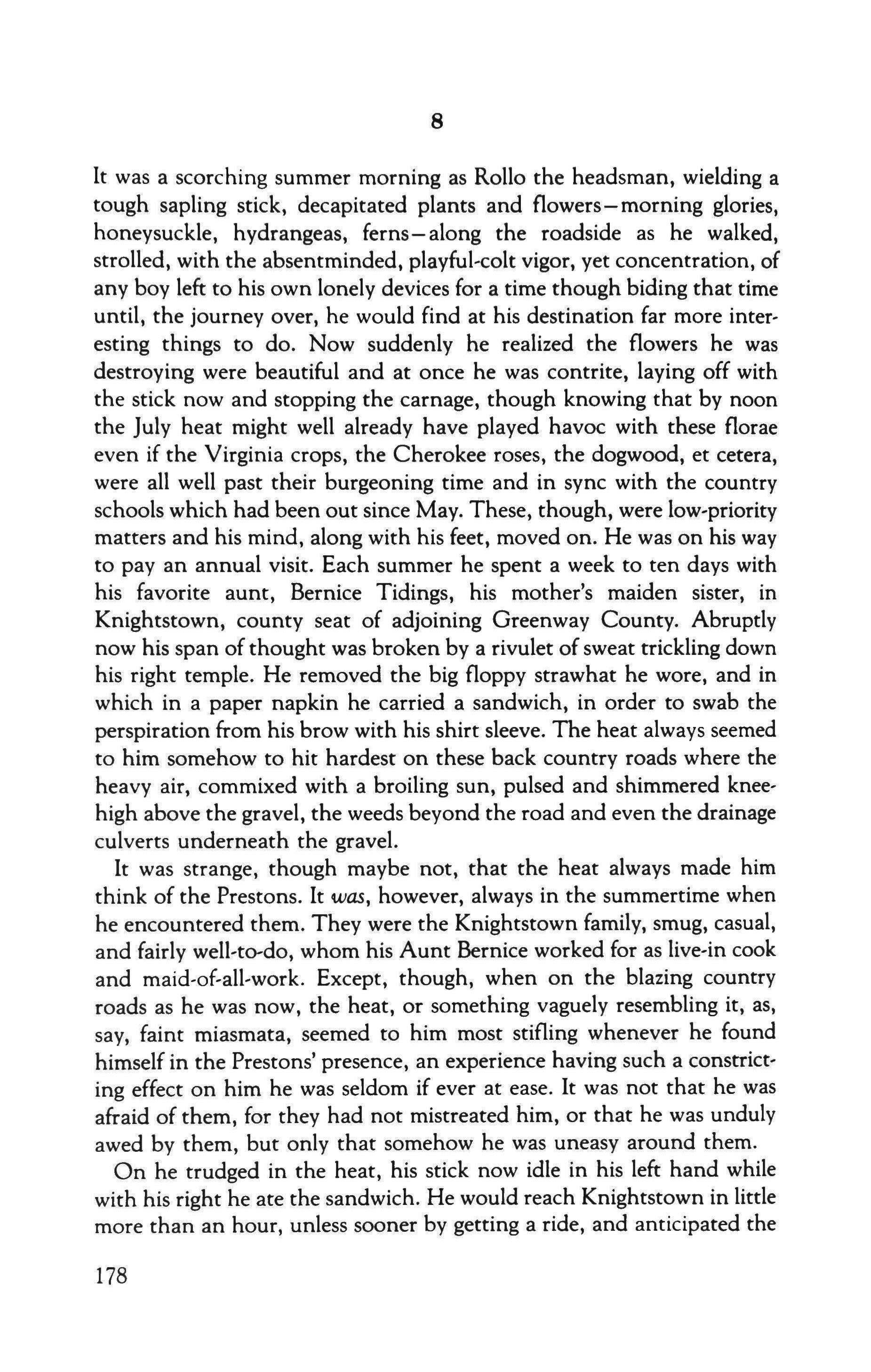
It was a scorching summer morning as Rollo the headsman, wielding a tough sapling stick, decapitated plants and flowers-morning glories, honeysuckle, hydrangeas, ferns-along the roadside as he walked, strolled, with the absentminded, playful-colt vigor, yet concentration, of any boy left to his own lonely devices for a time though biding that time until, the journey over, he would find at his destination far more interesting things to do. Now suddenly he realized the flowers he was destroying were beautiful and at once he was contrite, laying off with the stick now and stopping the carnage, though knowing that by noon the July heat might well already have played havoc with these florae even if the Virginia crops, the Cherokee roses, the dogwood, et cetera, were all well past their burgeoning time and in sync with the country schools which had been out since May. These, though, were low-priority matters and his mind, along with his feet, moved on. He was on his way to pay an annual visit. Each summer he spent a week to ten days with his favorite aunt, Bernice Tidings, his mother's maiden sister, in Knightstown, county seat of adjoining Greenway County. Abruptly now his span of thought was broken by a rivulet of sweat trickling down his right temple. He removed the big floppy strawhat he wore, and in which in a paper napkin he carried a sandwich, in order to swab the perspiration from his brow with his shirt sleeve. The heat always seemed to him somehow to hit hardest on these back country roads where the heavy air, commixed with a broiling sun, pulsed and shimmered kneehigh above the gravel, the weeds beyond the road and even the drainage culverts underneath the gravel.
It was strange, though maybe not, that the heat always made him think of the Prestons. It was, however, always in the summertime when he encountered them. They were the Knightstown family, smug, casual, and fairly well-to-do, whom his Aunt Bernice worked for as live-in cook and maid-of-all-work. Except, though, when on the blazing country roads as he was now, the heat, or something vaguely resembling it, as, say, faint miasmata, seemed to him most stifling whenever he found himself in the Prestons' presence, an experience having such a constricting effect on him he was seldom if ever at ease. It was not that he was afraid of them, for they had not mistreated him, or that he was unduly awed by them, but only that somehow he was uneasy around them.
On he trudged in the heat, his stick now idle in his left hand while with his right he ate the sandwich. He would reach Knightstown in little more than an hour, unless sooner by getting a ride, and anticipated the

happy prospect of seeing his aunt again though wondering what tomorrow, or even today, might bring with the Prestons, for suddenly again he had that strange feeling-a vague caution, a slight breathlessness, even a trace of awkwardness, though never quite fear. No matter, as always he rather sensed something in the air; did not understand it necessarily, but knew it was there. On arrival he was told by his happy Aunt Bernice that tomorrow they were all going to the fair-the Greenway County Fair! He wanted to be glad-he was glad-especially when Bernice described it so vividly and with such enthusiasm.
Next day, therefore, they were both up early and he helped her with her work. It was Saturday, and another sweltering day, when slightly past noontime the Preston family made ready to descend on this annual county extravaganza sprawled on the outskirts of town, there to see and hear the gaudy, outlandish sights, raucous sounds, all the color, activity, and hoopla, and then later attend a "speaking" in the big forum tent. The clan comprised Langhorne Preston, one of Knightstown's leading lawyers, his wife Isabella, the three Preston children, Matt, Dillie and Warner-all the children except Warner slightly older than Rollo-then Bernice, obese, excitable, naive, also a worrier, and (his first time ever at a fair) Rollo. At twelve-thirty, as he and Bernice waited out on the big back porch, which faced onto the garage, for the Prestons to emerge from the house, he, who had been so high-spirited and talkative with his aunt all morning, had now retreated into a silent, moody brown study. Mere thought of the Prestons skewed his mind. Suddenly then they all appeared, as if on stage cue and in full pomp and pageantry, while he lowered his gaze and tried to keep his mind away. Finally he summoned the resolve to observe them-once.
Soon now the party, numbering seven, all piled into the lumbering old Packard and prepared to leave. Preston, a large man with a profuse head of russet hair and a cavalryman's handlebar mustaches, bent over the steering wheel and first peered down hard at the fuel gauge before starting the motor and driving off with his "family." The car, in the oppressive sun-glare and heat, soon moved over the asphalt and scalding tar of Belmont Street and on out toward the fairground. Rollo and Bernice, she in the mandatory white uniform of the domestic, occupied the two jump seats in front of the Preston children and sat silently listening to Dillie's and Matt's aggressive prattle. But Warner sat, even as Rollo, stiff and glum.
Dillie, in age the middle Preston child, thirteen, blonde, captious, headstrong, said to her brothers: "First I'm going on the Ferris wheel."

Matt, the oldest, responded, "O.K., but my money's going for baseballs."
Dillie laughed. "I know what for, too, Matt!"
Warner looked as confused as Rollo. "We've got baseballs at home," he said. "Why do you want to buy more out here?"
"Oh, stupid!" Dillie said. "That's not what he means. He's not buying them. You weren't with us here last year, were you? You pay to use the balls to throw at the nigra man in the sideshow tent. He sticks his head out through the hole in the canvas curtain. It's a game but you can win real money. They call it 'Beaning the Blackie.'''
Rollo had frozen stiff as ice.
Warner gravely thought over what he had heard. "What if you hit him?" he finally said. "A baseball could kill him."
"Nobodv's ever hit one of them yet," laughed Matt. "They're too good at ducking. Wow! - wait'll you see."
Warner pondered this, as Rollo, rigid, throat dry, heart pounding, sat staring straight ahead through the windshield.
Suddenly Langhorne Preston slammed on the brakes. They had just passed a farmer's makeshift Saturday fruit and vegetable stand and, on second thought, he backed up and stopped in front of it. "Those are some good-looking peaches," he said to his wife. "Let's get some, maybe a crate, and put them in the trunk." He turned around - "Bernice, you can make some preserves."
"Sure thing, Mr. Preston," said Bernice.
Impatient Dillie made a face as her father got out and went over to the farmer. Bernice too climbed out and followed him and as he paid for a crate of the peaches she called to Rollo to come help her put them in the trunk of the car. He came readily enough and as Preston went and unlocked the trunk Rollo and Bernice picked up the crate and started to the car. They were not halfway there when Rollo saw it-a huge black and bronze hairy tarantula, twice the size of a silver dollar, that had emerged from the peaches and was crawling up his bare arm. Grinding his teeth, he stared at it as he walked - just as Dillie saw it too.
"Look!" she whispered to Matt. "There's a great big spider on his arm!"
Rollo, now sweating from more than the heat, steeled himself with all the discipline of which he was capable and continued walking. The tarantula, now on the inside of his arm just below the elbow, stopped crawling.
Matt yelled, "Bernice, knock that spider off his arm!"
Bernice looked and, nearly fainting, dropped her end of the crate,
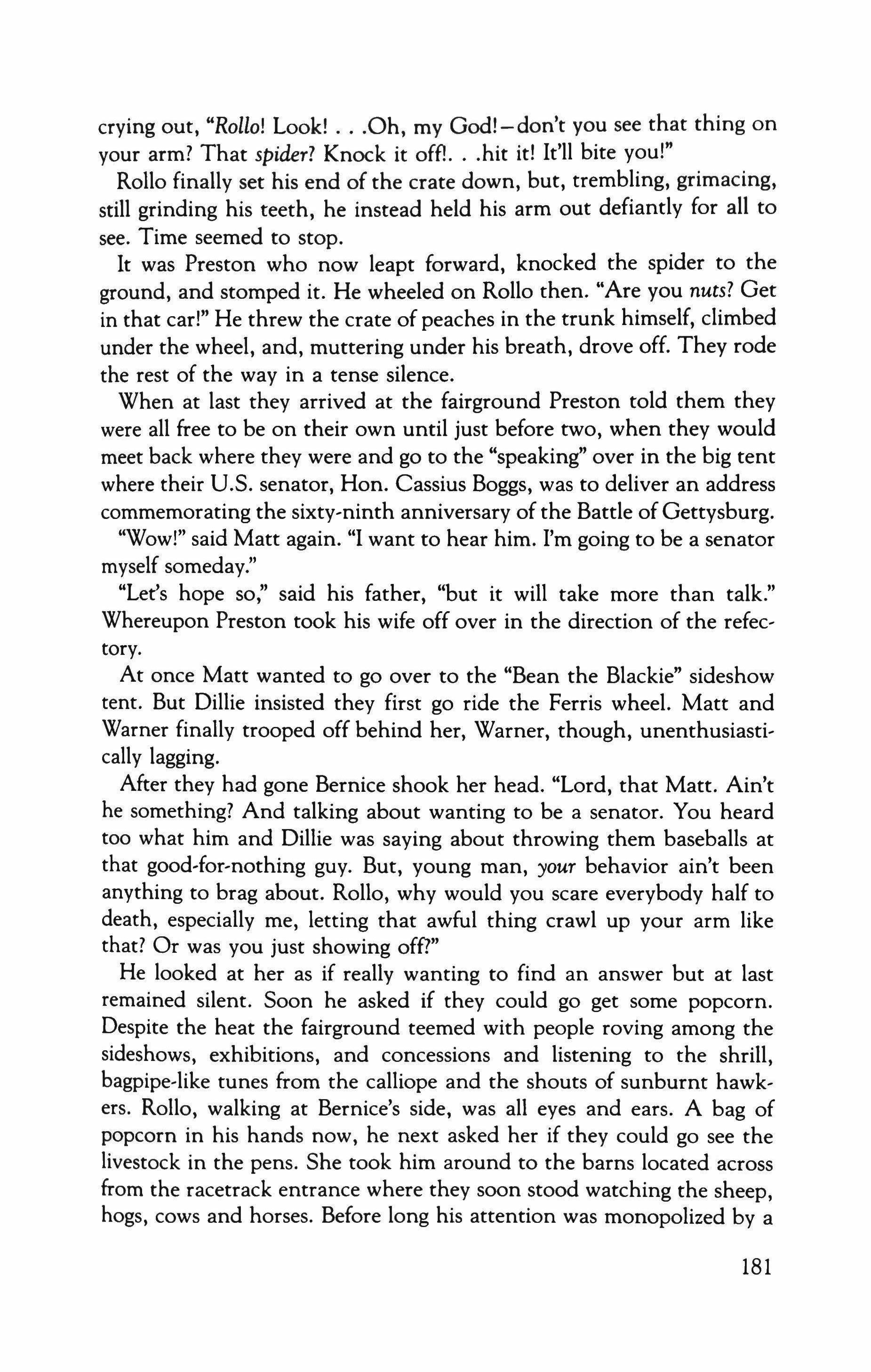
crying out, "Rollo! Look! Oh, my God!-don't you see that thing on your arm? That spider? Knock it offl hit it! It'll bite you!"
Rollo finally set his end of the crate down, but, trembling, grimacing, still grinding his teeth, he instead held his arm out defiantly for all to see. Time seemed to stop.
It was Preston who now leapt forward, knocked the spider to the ground, and stomped it. He wheeled on Rollo then. "Are you nuts? Get in that car!" He threw the crate of peaches in the trunk himself, climbed under the wheel, and, muttering under his breath, drove off. They rode the rest of the way in a tense silence.
When at last they arrived at the fairground Preston told them they were all free to be on their own until just before two, when they would meet back where they were and go to the "speaking" over in the big tent where their U.S. senator, Hon. Cassius Boggs, was to deliver an address commemorating the sixty-ninth anniversary of the Battle ofGettysburg. "Wow!" said Matt again. "1 want to hear him. I'm going to be a senator myself someday."
"Let's hope so:' said his father, "but it will take more than talk." Whereupon Preston took his wife off over in the direction of the refectory.
At once Matt wanted to go over to the "Bean the Blackie" sideshow tent. But Dillie insisted they first go ride the Ferris wheel. Matt and Warner finally trooped off behind her, Warner, though, unenthusiastically lagging.
After they had gone Bernice shook her head. "Lord, that Matt. Ain't he something? And talking about wanting to be a senator. You heard too what him and Dillie was saying about throwing them baseballs at that good-for-nothing guy. But, young man, your behavior ain't been anything to brag about. Rollo, why would you scare everybody half to death, especially me, letting that awful thing crawl up your arm like that? Or was you just showing off?"
He looked at her as if really wanting to find an answer but at last remained silent. Soon he asked if they could go get some popcorn. Despite the heat the fairground teemed with people roving among the sideshows, exhibitions, and concessions and listening to the shrill, bagpipe-like tunes from the calliope and the shouts of sunburnt hawkers. Rollo, walking at Bernice's side, was all eyes and ears. A bag of popcorn in his hands now, he next asked her if they could go see the livestock in the pens. She took him around to the barns located across from the racetrack entrance where they soon stood watching the sheep, hogs, cows and horses. Before long his attention was monopolized by a
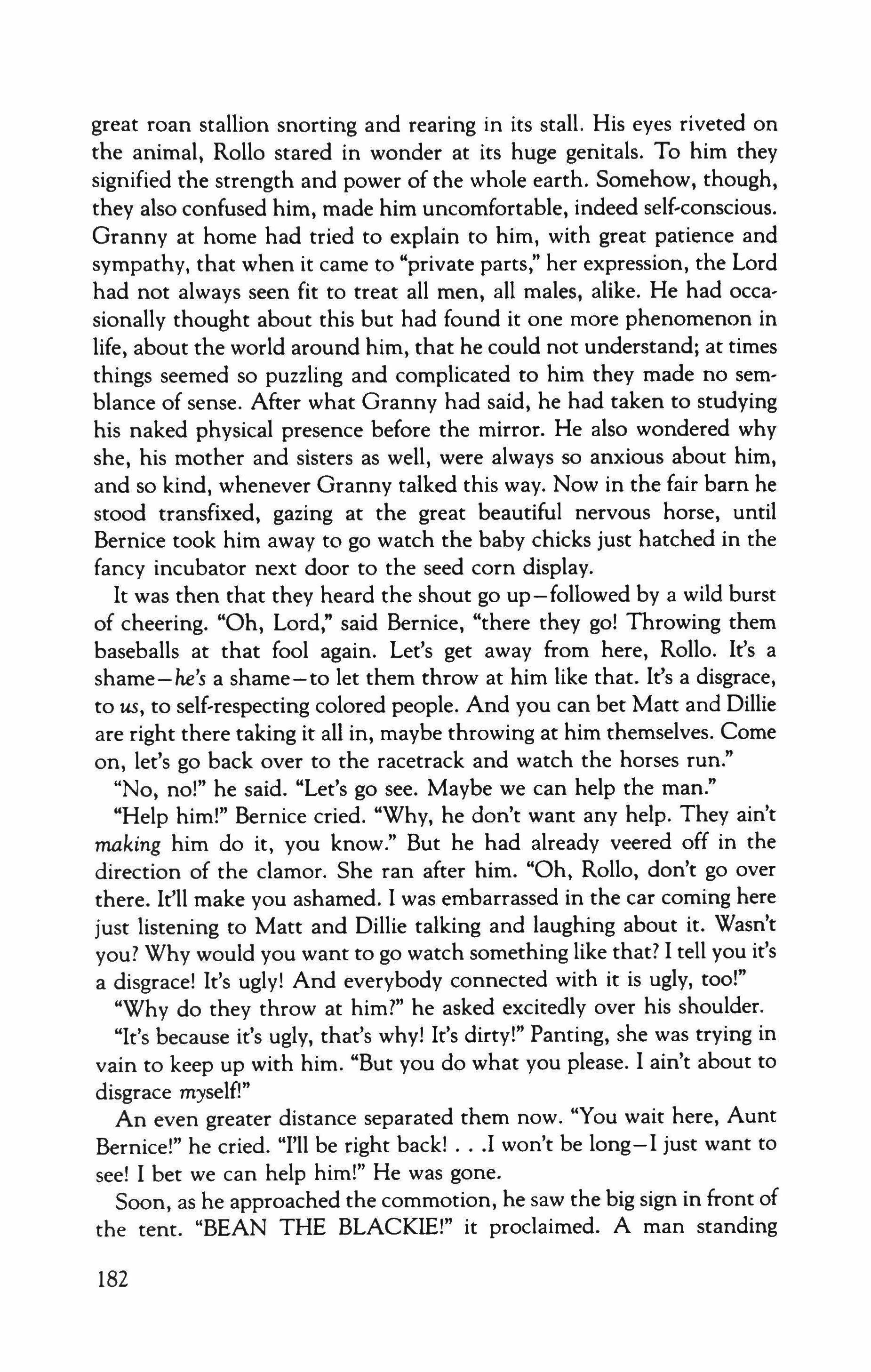
great roan stallion snorting and rearing in its stall. His eyes riveted on the animal, Rollo stared in wonder at its huge genitals. To him they signified the strength and power of the whole earth. Somehow, though, they also confused him, made him uncomfortable, indeed self-conscious, Granny at home had tried to explain to him, with great patience and sympathy, that when it came to "private parts," her expression, the Lord had not always seen fit to treat all men, all males, alike. He had occasionally thought about this but had found it one more phenomenon in life, about the world around him, that he could not understand; at times things seemed so puzzling and complicated to him they made no semblance of sense. After what Granny had said, he had taken to studying his naked physical presence before the mirror. He also wondered why she, his mother and sisters as well, were always so anxious about him, and so kind, whenever Granny talked this way. Now in the fair barn he stood transfixed, gazing at the great beautiful nervous horse, until Bernice took him away to go watch the baby chicks just hatched in the fancy incubator next door to the seed corn display.
It was then that they heard the shout go up-followed by a wild burst of cheering. "Oh, Lord," said Bernice, "there they go! Throwing them baseballs at that fool again. Let's get away from here, Rollo. It's a shame-he's a shame-to let them throw at him like that. It's a disgrace, to us, to self-respecting colored people. And you can bet Matt and Dillie are right there taking it all in, maybe throwing at him themselves. Come on, let's go back over to the racetrack and watch the horses run."
"No, no!" he said. "Let's go see. Maybe we can help the man."
"Help him!" Bernice cried. "Why, he don't want any help. They ain't making him do it, you know." But he had already veered off in the direction of the clamor. She ran after him. "Oh, Rollo, don't go over there. It'll make you ashamed. I was embarrassed in the car coming here just listening to Matt and Dillie talking and laughing about it. Wasn't you? Why would you want to go watch something like that? I tell you it's a disgrace! It's ugly! And everybody connected with it is ugly, too!"
"Why do they throw at him?" he asked excitedly over his shoulder. "It's because it's ugly, that's why! It's dirty!" Panting, she was trying in vain to keep up with him. "But you do what you please. I ain't about to disgrace myselfl"
An even greater distance separated them now. "You wait here, Aunt Bernice!" he cried. "I'll be right back! .1 won't be long-I just want to see! I bet we can help him!" He was gone.
Soon, as he approached the commotion, he saw the big sign in front of the tent. "BEAN THE BLACKlE!" it proclaimed. A man standing
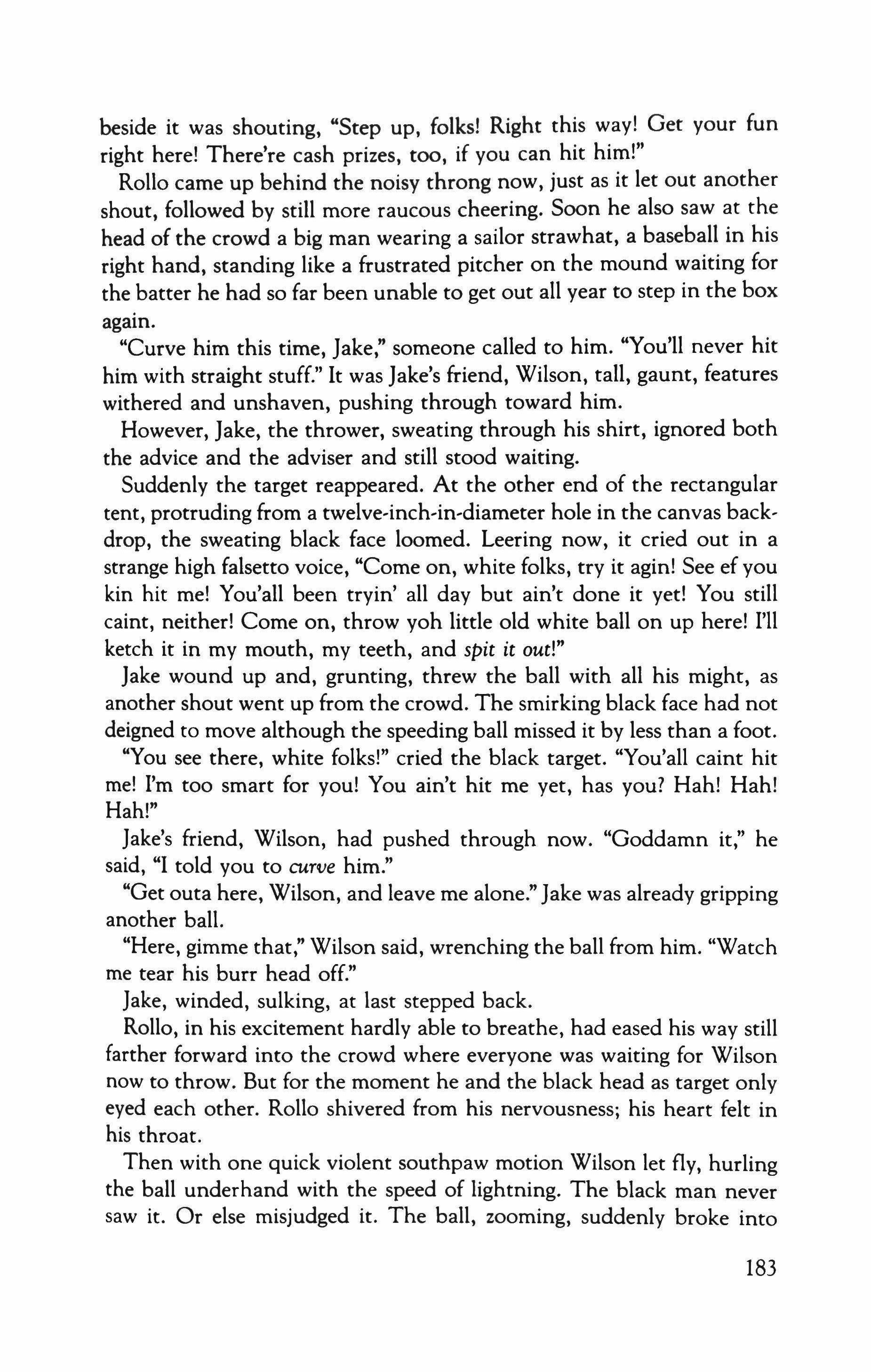
beside it was shouting, "Step up, folks! Right this way! Get your fun right here! There're cash prizes, too, if you can hit him!"
Rollo came up behind the noisy throng now, just as it let out another shout, followed by still more raucous cheering. Soon he also saw at the head of the crowd a big man wearing a sailor strawhat, a baseball in his right hand, standing like a frustrated pitcher on the mound waiting for the batter he had so far been unable to get out all year to step in the box again.
"Curve him this time, Jake," someone called to him. "You'll never hit him with straight stuff." It was Jake's friend, Wilson, tall, gaunt, features withered and unshaven, pushing through toward him.
However, Jake, the thrower, sweating through his shirt, ignored both the advice and the adviser and still stood waiting.
Suddenly the target reappeared. At the other end of the rectangular tent, protruding from a twelve-inch-in-diameter hole in the canvas backdrop, the sweating black face loomed. Leering now, it cried out in a strange high falsetto voice, "Come on, white folks, try it agin! See ef you kin hit me! You'all been tryin' all day but ain't done it yet! You still caint, neither! Come on, throw yoh little old white ball on up here! I'll ketch it in my mouth, my teeth, and spit it out!"
Jake wound up and, grunting, threw the ball with all his might, as another shout went up from the crowd. The smirking black face had not deigned to move although the speeding ball missed it by less than a foot.
"You see there, white folks!" cried the black target. "You'all caint hit me! I'm too smart for you! You ain't hit me yet, has you? Hah! Hah! Hah!"
Jake's friend, Wilson, had pushed through now. "Goddamn it," he said, "I told you to curve him."
"Get outa here, Wilson, and leave me alone." Jake was already gripping another ball.
"Here, gimme that," Wilson said, wrenching the ball from him. "Watch me tear his burr head off."
Jake, winded, sulking, at last stepped back.
Rollo, in his excitement hardly able to breathe, had eased his way still farther forward into the crowd where everyone was waiting for Wilson now to throw. But for the moment he and the black head as target only eyed each other. Rollo shivered from his nervousness; his heart felt in his throat.
Then with one quick violent southpaw motion Wilson let fly, hurling the ball underhand with the speed of lightning. The black man never saw it. Or else misjudged it. The ball, zooming, suddenly broke into

him, connecting between the eyes and hurtling him back out of view, as the crowd in unison let out a great shocked gasp. "Good God!" somebody said.
Someone up front screamed then. It was Dillie. Soon she was hysterical and Matt, at her side, was trying with no success to calm her. Warner, on the other side of her, for a moment was speechless. Then he yelled at Matt - "I told you! I told you it could kill somebody!"
The sideshow proprietor and two other men had already run back behind the canvas curtain to the black man. Soon the excited spectators were loudly conferring among themselves, speculating on the extent of the injury, waiting for some word.
A seedy farmer in overalls now laughed to those around him, "Jake and Wilson ere gone already, by golly. Vamoosed in a hurry, didn't they?" Rollo too had seen them hurriedly go- Wilson, with Jake at his heels. The man in overalls then said to the others, "Do you know who they was? No? Jake only pitched in the minors, but, Lord Amighty, Wilson was in the big leagues there for awhile. Clay Wilson. Name ring a bell? He pitched for Connie Mack and the Philadelphia Athletics. Was knowed for his speed and control. That is, till the bottle got him."
The proprietor had reappeared from behind the backdrop now and had told someone to go up to the first-aid station and bring back a medic. Also to have them call for an ambulance. The Preston children were huddled together now, looking subdued and scared, ignoring the garrulous talk of the crowd where everyone had an opinion, dire or optimistic, about the black man's fate.
Suddenly Rollo heard Bernice frantically calling to him from the midst of the milling crowd. When he had finally pushed through to her he found her terrified. "What on earth's happened?" she cried. "Why's everything stopped?" Then she saw the sick expression on his face. "What's the matter with you, Rollo?"
"They hit him." Sorrow weighted his voice.
"Oh, no! .I don't believe it! Oh, my God! But it's good enough for him - he had it coming!"
He bristled, then stared hostilely at her. "He got hit bad! They've sent for help, maybe a doctor." He was in despair.
"Oh, my Lord! I told you not to come over here, Rollo! Now you see, don't you?" He was too shaken to reply.
Soon a man and woman, the woman in a white uniform not unlike Bernice's, arrived from the first-aid station and, the man carrying a stretcher, hurried back behind the canvas curtain. Instead of an ambulance a small pickup truck next arrived and maneuvered around the

crowd, though only partially in behind the tent, as Rollo and Bernice could only stand there looking on. Very shortly the black man was carried out and placed in the rear of the little truck; he was limp and seemed unconscious, a great swollen bloody knot on his forehead between the eyes. But just as the vehicle was about to pull off, the crowd gasped again, as if witnessing a miracle, a resurrection. The black man had somehow aroused himself. Although feeble, reeling, his eyes dazed and wandering, he somehow pulled himself to his knees in the truck and, grasping the tailgate, again leered his insolence and defiance at the crowd. "You white folks think you hurt me, eh?" he cried out in a high tremulous weakened voice. "Well, you's wrong! I'm tough, I am! You throw at me 'cause you want to kill me and all niggers-takin' yoh hate out on me and that way gettin' yoh kinky kicks! But it won't work-I'll still be around, white folks! I'm here to stay! You brought me here, didn't you? I'm the only one that didn't ask, and didn't want, to come! I smelt this wasn't no place for me! You kidnapped me, white folks, and put me on that ship! I'll never let you forget it, neither! So here I amyou see me, don't you? I'm here and I'll be here! - till you caint tell us from the rest of you'all! But you won't be here, either, then-it'll be somebody else, somebody different, and not white! Hah! Hah! Hah! Suffer, then, white folks-oh, suffer! Yeah, I'll be right there in that very tent agin tomorrow!" The high, screechy voice was finally depleted. The crowd was aghast at the insults. And at last furious. Some were soon muttering the direst threats against their defamer. Yet a few were merely surprised, or confused, and others disgruntled though also unsure of themselves. In any event, by the time the little truck had taken him away most of them appeared greatly relieved, some of them even chuckling, or outright laughing, a few collapsing in laughter. It was next morning, then, that Bernice learned from servants up the street, and, her face long, eyes averted, told Rollo (who had hardly slept at all the night before) that the black man, contrary to his heated vows to the crowd yesterday, would not be back at the "Bean-the-Blackie" tent today. Or rather, she would not be back. The hospital examination had revealed that she was not a man but a woman. And that her name was Lizzie, Lizzie something-Bernice could not remember. But that now Lizzie was dead.
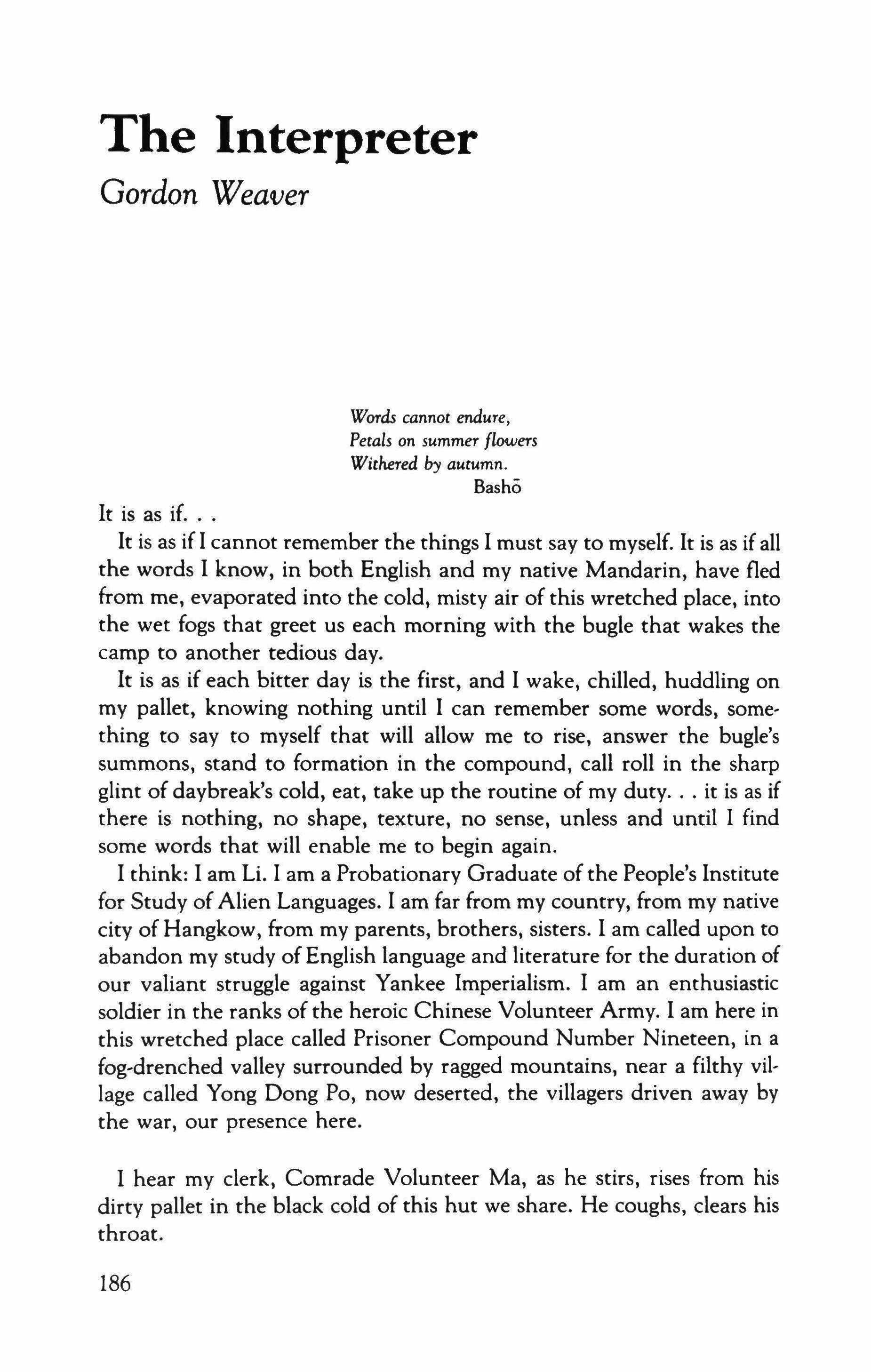
Words cannot endure, Petals on summer flowers
Withered by autumn.
Basho
It is as if
It is as if I cannot remember the things I must say to myself. It is as if all the words I know, in both English and my native Mandarin, have fled from me, evaporated into the cold, misty air of this wretched place, into the wet fogs that greet us each morning with the bugle that wakes the camp to another tedious day.
It is as if each bitter day is the first, and I wake, chilled, huddling on my pallet, knowing nothing until I can remember some words, something to say to myself that will allow me to rise, answer the bugle's summons, stand to formation in the compound, call roll in the sharp glint of daybreak's cold, eat, take up the routine of my duty it is as if there is nothing, no shape, texture, no sense, unless and until I find some words that will enable me to begin again.
I think: I am Li. I am a Probationary Graduate of the People's Institute for Study of Alien Languages. I am far from my country, from my native city of Hangkow, from my parents, brothers, sisters. I am called upon to abandon my study of English language and literature for the duration of our valiant struggle against Yankee Imperialism. I am an enthusiastic soldier in the ranks of the heroic Chinese Volunteer Army. I am here in this wretched place called Prisoner Compound Number Nineteen, in a fog-drenched valley surrounded by ragged mountains, near a filthy village called Yong Dong Po, now deserted, the villagers driven away by the war, our presence here.
I hear my clerk, Comrade Volunteer Ma, as he stirs, rises from his dirty pallet in the black cold of this hut we share. He coughs, clears his throat.

"The bugle," mumbles Comrade Volunteer Ma, and coughs.
"I hear the bugle, Comrade Ma," I say, and, "Do not dare to spit on the floor. If you spit on the floor, ever again, I shall report you to the camp commandant, and you will be punished and returned to the ranks of those who escort the prisoners to work in the fields! Another man who can read and write will be found to take your place if you do not learn to refrain from spitting on the floor, Ma!"
The bugle ceases, and there is silence for a moment-only the darkness and the unceasing cold. And then Comrade Volunteer Ma, my clerk, says, "I try to remember not to spit, Comrade Interpreter."
"Light the candle, Ma," I say to him, "another day begins."
Comrade Guard-Escort Hong trembles. It is necessary to say something to put him at his ease if we are to resolve this. 1 say to him, "Comrade Guard Hong, relax your belly, and then we may speak to some point here."
"My belly is not nervous, Comrade Interpreter," Hong says. This is an impudence, but I choose to ignore that; I am accustomed to the impudence of ignorant men - it is, I have concluded, only the expression of their fear and awe of the educated - and so try never to respond in anger.
"Then if your belly is not nervous, you are able to stand at attention, are you not, Comrade Guard-Escort Hong? We may not behave casually in this, as I have told you so often before." Hong ceases to tremble.
Prisoner Lester Boggs also trembles, shudders and twitches, picks at his trouser legs with his grimy nail-bitten fingers, shuffles his feet. He, of course, fears punishment, the wheel and the pit.
When it is time to speak in English, as it is now, 1 remind myself to speak slowly, to exaggerate my pronunciation, to watch the prisoner's face closely for any slightest expression of mockery or silent contempt.
I say to Prisoner Lester Boggs, Private, Army of the United States, "Prisoner Boggs, does heart flutters prevent to stand at correct postures of attention whilst conduct of official procedures proceeds?"
It is a thing I alone in this wretched place, the sole Chinese speaker of English here, know: in our Mandarin, we speak of the stomach as the center of one's being, where reside both the base emotions and nobler sentiments; in English-this I know from my incompleted studies at the People's Institute for Study of Alien Languages-we speak of course of the heart. Witness ]. Conrad's Heart of Darkness, or Mr. Hawthorne's marble heart, or the folk song entitled "My Heart's in the Highlands:' which emanates from the decadent royalist United Kingdom-examples
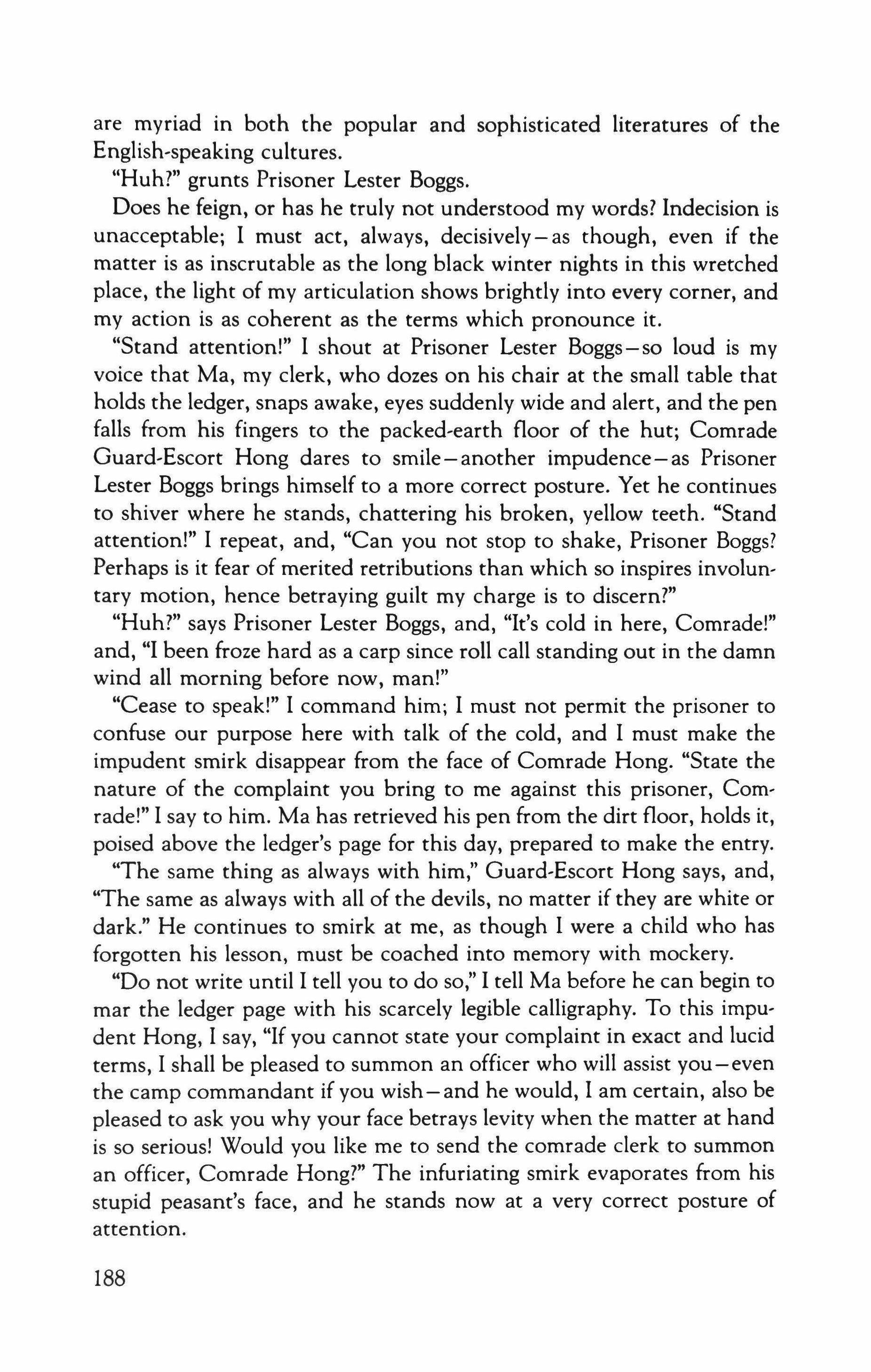
are myriad in both the popular and sophisticated literatures of the English-speaking cultures.
"Huh?" grunts Prisoner Lester Boggs.
Does he feign, or has he truly not understood my words? Indecision is unacceptable; I must act, always, decisively - as though, even if the matter is as inscrutable as the long black winter nights in this wretched place, the light of my articulation shows brightly into every corner, and my action is as coherent as the terms which pronounce it.
"Stand attention!" I shout at Prisoner Lester Boggs - so loud is my voice that Ma, my clerk, who dozes on his chair at the small table that holds the ledger, snaps awake, eyes suddenly wide and alert, and the pen falls from his fingers to the packed-earth floor of the hut; Comrade Guard-Escort Hong dares to smile-another impudence-as Prisoner Lester Boggs brings himself to a more correct posture. Yet he continues to shiver where he stands, chattering his broken, yellow teeth. "Stand attention!" I repeat, and, "Can you not stop to shake, Prisoner Boggs? Perhaps is it fear of merited retributions than which so inspires involuntary motion, hence betraying guilt my charge is to discern?"
"Huh?" says Prisoner Lester Boggs, and, "It's cold in here, Comrade!" and, "I been froze hard as a carp since roll call standing out in the damn wind all morning before now, man!"
"Cease to speak!" I command him; I must not permit the prisoner to confuse our purpose here with talk of the cold, and I must make the impudent smirk disappear from the face of Comrade Hong. "State the nature of the complaint you bring to me against this prisoner, Cornrade!" I say to him. Ma has retrieved his pen from the dirt floor, holds it, poised above the ledger's page for this day, prepared to make the entry.
"The same thing as always with him," Guard-Escort Hong says, and, "The same as always with all of the devils, no matter if they are white or dark." He continues to smirk at me, as though I were a child who has forgotten his lesson, must be coached into memory with mockery.
"Do not write until I tell you to do so," I tell Ma before he can begin to mar the ledger page with his scarcely legible calligraphy. To this impudent Hong, I say, "If you cannot state your complaint in exact and lucid terms, I shall be pleased to summon an officer who will assist you-even the camp commandant if you wish - and he would, I am certain, also be pleased to ask you why your face betrays levity when the matter at hand is so serious! Would you like me to send the comrade clerk to summon an officer, Comrade Hong?" The infuriating smirk evaporates from his stupid peasant's face, and he stands now at a very correct posture of attention.
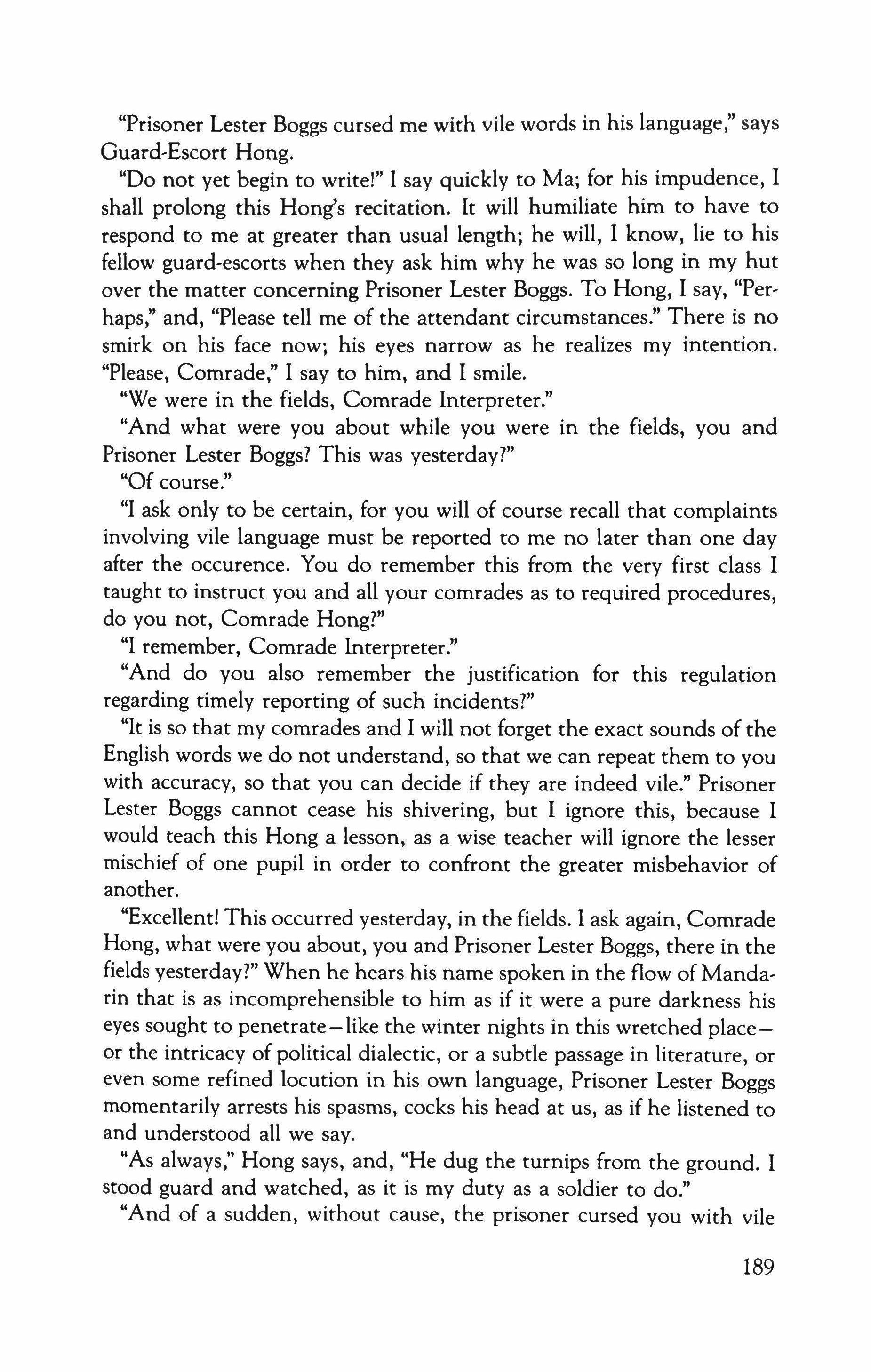
"Prisoner Lester Boggs cursed me with vile words in his language," says Guard-Escort Hong.
"Do not yet begin to write!" I say quickly to Ma; for his impudence, I shall prolong this Hong's recitation. It will humiliate him to have to respond to me at greater than usual length; he will, I know, lie to his fellow guard-escorts when they ask him why he was so long in my hut over the matter concerning Prisoner Lester Boggs. To Hong, I say, "Perhaps," and, "Please tell me of the attendant circumstances." There is no smirk on his face now; his eyes narrow as he realizes my intention. "Please, Comrade," I say to him, and I smile.
"We were in the fields, Comrade Interpreter."
"And what were you about while you were in the fields, you and Prisoner Lester Boggs? This was yesterday?"
"Of course."
"I ask only to be certain, for you will of course recall that complaints involving vile language must be reported to me no later than one day after the occurence. You do remember this from the very first class I taught to instruct you and all your comrades as to required procedures, do you not, Comrade Hong?"
"I remember, Comrade Interpreter."
"And do you also remember the justification for this regulation regarding timely reporting of such incidents?"
"It is so that my comrades and I will not forget the exact sounds of the English words we do not understand, so that we can repeat them to you with accuracy, so that you can decide if they are indeed vile." Prisoner Lester Boggs cannot cease his shivering, but I ignore this, because I would teach this Hong a lesson, as a wise teacher will ignore the lesser mischief of one pupil in order to confront the greater misbehavior of another.
"Excellent! This occurred yesterday, in the fields. I ask again, Comrade Hong, what were you about, you and Prisoner Lester Boggs, there in the fields yesterday?" When he hears his name spoken in the flow of Mandarin that is as incomprehensible to him as if it were a pure darkness his eyes sought to penetrate-like the winter nights in this wretched placeor the intricacy of political dialectic, or a subtle passage in literature, or even some refined locution in his own language, Prisoner Lester Boggs momentarily arrests his spasms, cocks his head at us, as if he listened to and understood all we say.
"As always," Hong says, and, "He dug the turnips from the ground. I stood guard and watched, as it is my duty as a soldier to do."
"And of a sudden, without cause, the prisoner cursed you with vile
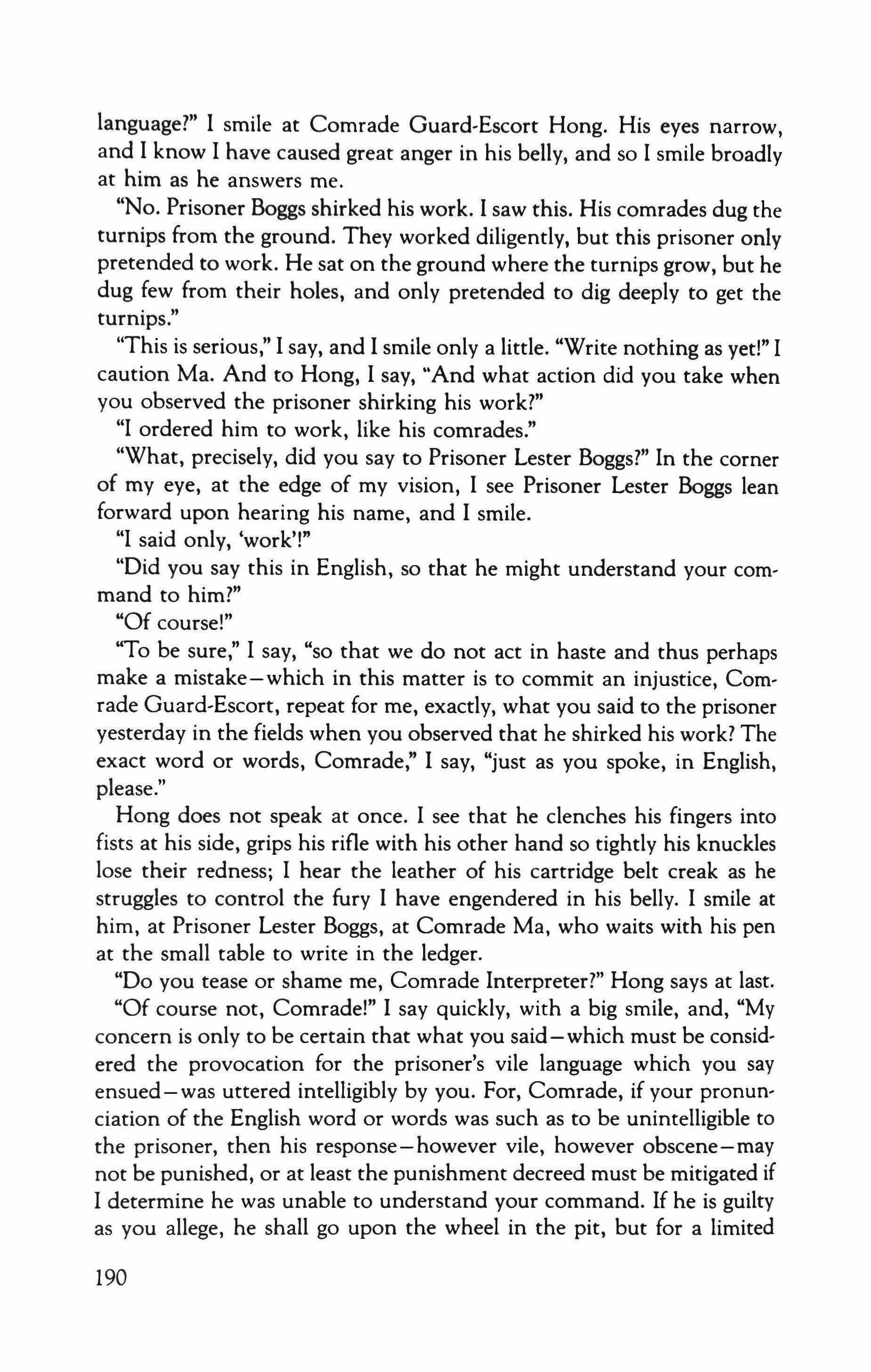
language?" I smile at Comrade Guard-Escort Hong. His eyes narrow, and I know I have caused great anger in his belly, and so I smile broadly at him as he answers me.
"No. Prisoner Boggs shirked his work. I saw this. His comrades dug the turnips from the ground. They worked diligently, but this prisoner only pretended to work. He sat on the ground where the turnips grow, but he dug few from their holes, and only pretended to dig deeply to get the turnips."
"This is serious," I say, and I smile only a little. "Write nothing as yet!" I caution Ma. And to Hong, I say, "And what action did you take when you observed the prisoner shirking his work?"
"I ordered him to work, like his comrades."
"What, precisely, did you say to Prisoner Lester Boggs?" In the corner of my eye, at the edge of my vision, I see Prisoner Lester Boggs lean forward upon hearing his name, and I smile.
"I said only, 'work'!"
"Did you say this in English, so that he might understand your command to him?"
"Of course!"
"To be sure," I say, "so that we do not act in haste and thus perhaps make a mistake-which in this matter is to commit an injustice, Comrade Guard-Escort, repeat for me, exactly, what you said to the prisoner yesterday in the fields when you observed that he shirked his work? The exact word or words, Comrade," I say, "just as you spoke, in English, please."
Hong does not speak at once. I see that he clenches his fingers into fists at his side, grips his rifle with his other hand so tightly his knuckles lose their redness; I hear the leather of his cartridge belt creak as he struggles to control the fury I have engendered in his belly. I smile at him, at Prisoner Lester Boggs, at Comrade Ma, who waits with his pen at the small table to write in the ledger.
"Do you tease or shame me, Comrade Interpreter?" Hong says at last.
"Of course not, Comrade!" I say quickly, with a big smile, and, "My concern is only to be certain that what you said-which must be considered the provocation for the prisoner's vile language which you say ensued-was uttered intelligibly by you. For, Comrade, if your pronunciation of the English word or words was such as to be unintelligible to the prisoner, then his response-however vile, however obscene-may not be punished, or at least the punishment decreed must be mitigated if I determine he was unable to understand your command. If he is guilty as you allege, he shall go upon the wheel in the pit, but for a limited
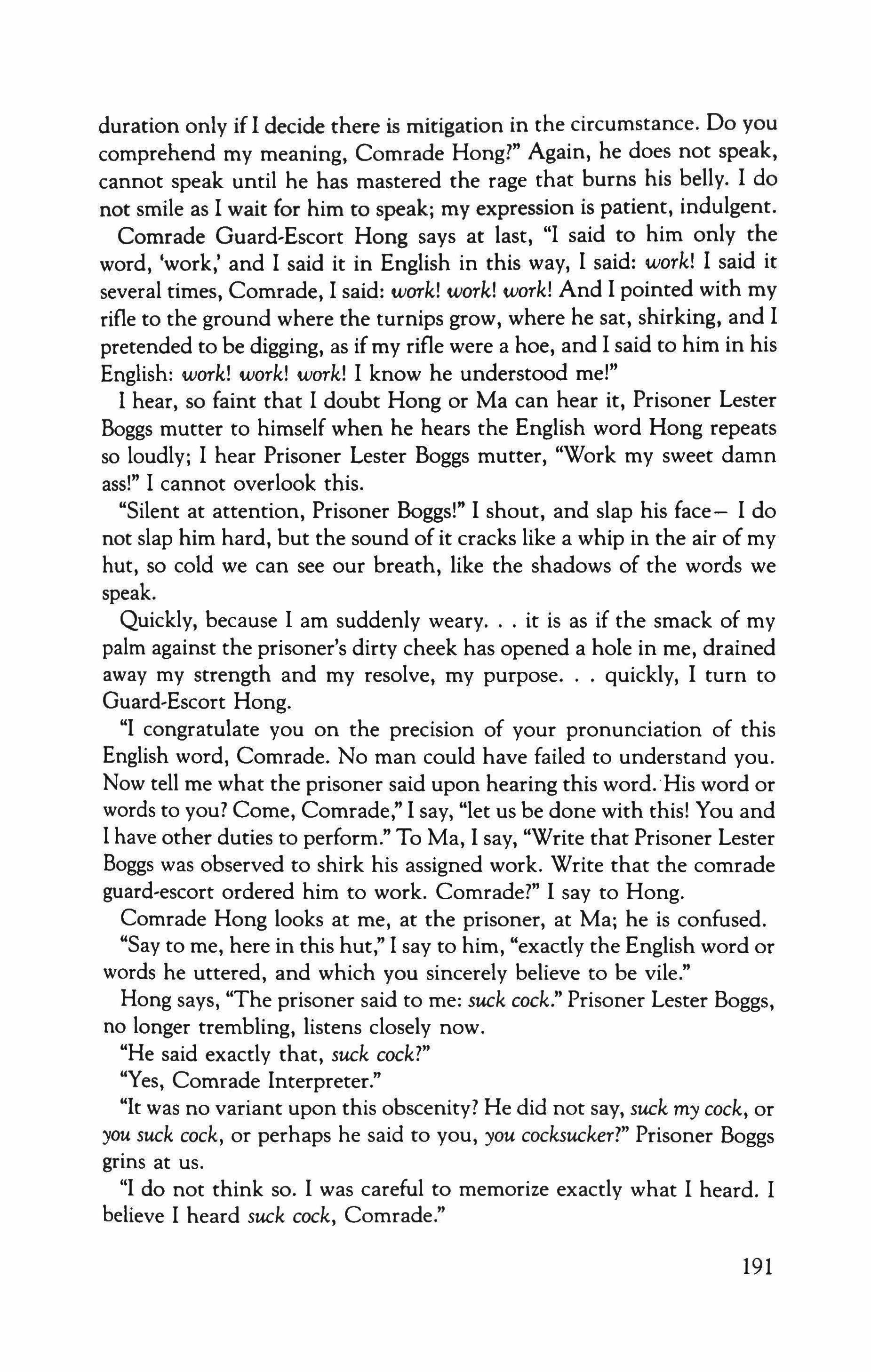
duration only if I decide there is mitigation in the circumstance. Do you comprehend my meaning, Comrade Hong?" Again, he does not speak, cannot speak until he has mastered the rage that burns his belly. I do not smile as I wait for him to speak; my expression is patient, indulgent.
Comrade Guard-Escort Hong says at last, "I said to him only the word, 'work,' and I said it in English in this way, I said: work! I said it several times, Comrade, I said: work! work! work! And I pointed with my rifle to the ground where the turnips grow, where he sat, shirking, and I pretended to be digging, as if my rifle were a hoe, and I said to him in his English: work! work! work! I know he understood me!"
I hear, so faint that I doubt Hong or Ma can hear it, Prisoner Lester Boggs mutter to himself when he hears the English word Hong repeats so loudly; I hear Prisoner Lester Boggs mutter, "Work my sweet damn ass!" I cannot overlook this.
"Silent at attention, Prisoner Boggs!" I shout, and slap his face- I do not slap him hard, but the sound of it cracks like a whip in the air of my hut, so cold we can see our breath, like the shadows of the words we speak.
Quickly, because I am suddenly weary it is as if the smack of my palm against the prisoner's dirty cheek has opened a hole in me, drained away my strength and my resolve, my purpose quickly, I turn to Guard-Escort Hong.
"I congratulate you on the precision of your pronunciation of this English word, Comrade. No man could have failed to understand you. Now tell me what the prisoner said upon hearing this word.·His word or words to you? Come, Comrade," I say, "let us be done with this! You and I have other duties to perform." To Ma, I say, "Write that Prisoner Lester Boggs was observed to shirk his assigned work. Write that the comrade guard-escort ordered him to work. Comrade?" I say to Hong.
Comrade Hong looks at me, at the prisoner, at Ma; he is confused.
"Say to me, here in this hut," I say to him, "exactly the English word or words he uttered, and which you sincerely believe to be vile."
Hong says, "The prisoner said to me: suck cock." Prisoner Lester Boggs, no longer trembling, listens closely now.
"He said exactly that, suck cock?"
"Yes, Comrade Interpreter."
"It was no variant upon this obscenity? He did not say, suck my cock, or you suck cock, or perhaps he said to you, you cocksucker?" Prisoner Boggs grins at us.
"I do not think so. I was careful to memorize exactly what I heard. I believe I heard suck cock, Comrade."

"Write this in the ledger," I command Ma, "that Prisoner Lester Boggs did curse his guard-escort with vile language, in that he did say to him, suck cockyou know the calligraph I devised for this obscenity, write it."
As I turn to address Prisoner Lester Boggs in English, I see Comrade Hong's smile, hear his sigh; he will lie to his comrades when he tells them of this, because he fears they will mock him for all the questions he was required to answer, but he will take satisfaction in the severe punish, ment I mete out-wheel and pit-to the prisoner for his serious infraction of the camp's good order and discipline, as codified in the Geneva Convention.
I speak slowly, taking great care with pronunciation, for this is a matter of much gravity. "Prisoner Lester Boggs," I say, "I discern you have gross fashion violated camp's discipline. You did speak Comrade Guard-Escort Hong that he suck cock, than which is blatant palpable obsceneness disrespect ofduly designated guard-escort in performance of assigned duty. Also you slack work, only fake to dig turnips, thus deprive your comrades of needed nutritious rations. Punishments are merited as I mandate! Has you words of mitigation prior to I pro' nounce?" Prisoner Boggs coughs, sniffs, wipes his runny nose on the crusty sleeve of his tattered coat.
"You saying I done it, ain't you," Prisoner Boggs says, and, "I knowed as soon as I come in here on report you was fixing to stick it to me, the both of you."
"Irrelevance!" I say, and, "Nothing further of mitigations weighty?"
"I never," says Prisoner Boggs, and, "I never said no such a thing to him! He's just out to stick it to me on account of he knows I hate his ass worse'n a damn black nigger's!"
"Silence whilst at postures of attention!" I shout; my words erupt from my mouth in puffs, like smoke, in the cold air of the hut. To Hong, I say in Mandarin, "You are dismissed, Comrade Hong. Your presence is not required for the pronouncement of punishment. Return to your duties, Comrade."
"He deserves the most severe punishment," this impudent Guard, Escort Hong says, and, "They all do, the white devils and the dark ones even more, for they all mock me and my comrades repeatedly with their nasty words! They will not cease to do this unless you decree the most severe punishments!" he says.
"You are dismissed!" I shout at him, and, "You have performed your duty; now I shall perform mine, and this matter is no longer of concern to you!"
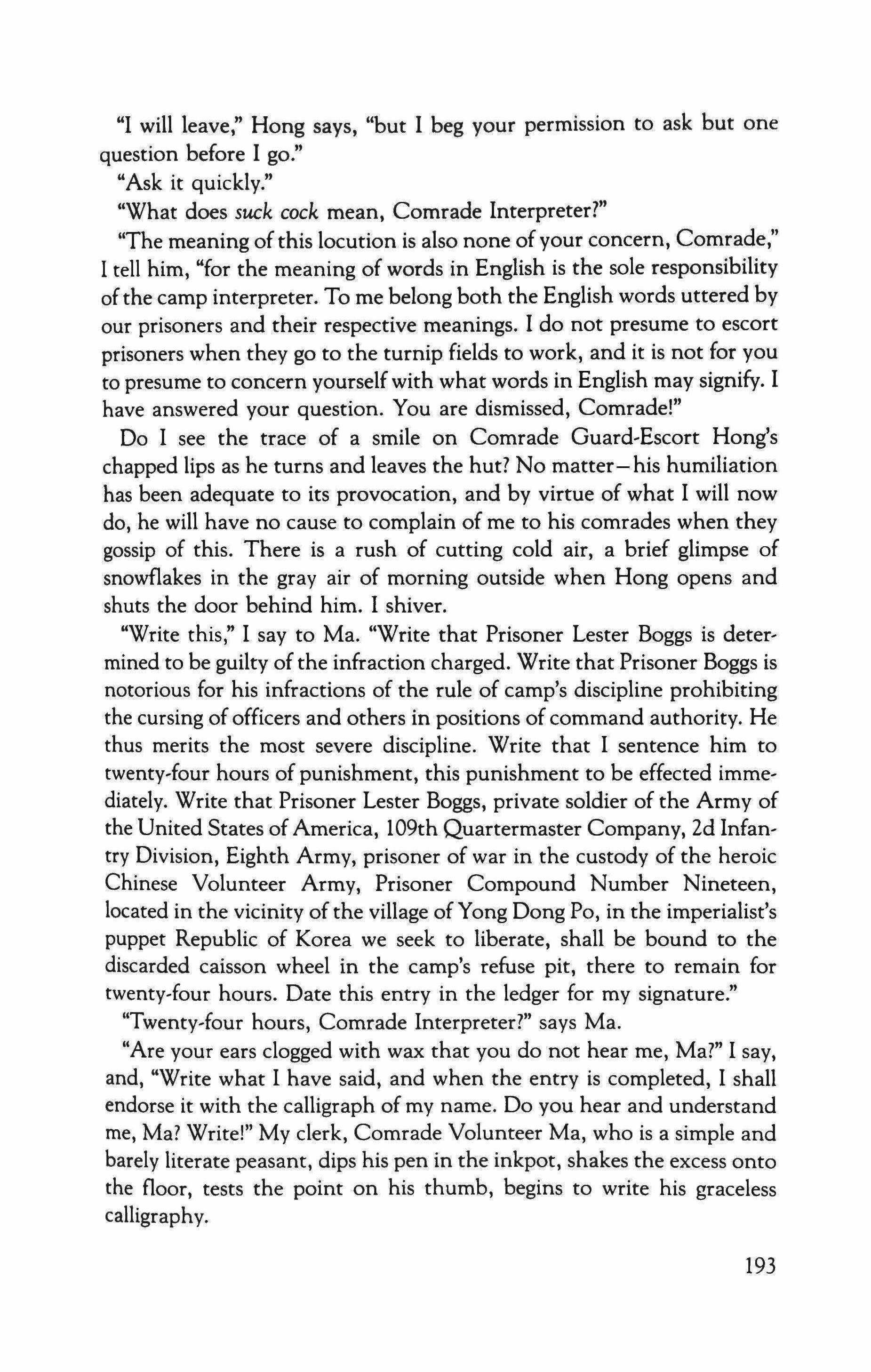
"I will leave," Hong says, "but I beg your permission to ask but one question before I go."
"Ask it quickly."
"What does suck cock mean, Comrade Interpreter?"
"The meaning ofthis locution is also none of your concern, Comrade," I tell him, "for the meaning of words in English is the sole responsibility ofthe camp interpreter. To me belong both the English words uttered by our prisoners and their respective meanings. I do not presume to escort prisoners when they go to the turnip fields to work, and it is not for you to presume to concern yourselfwith what words in English may signify. I have answered your question. You are dismissed, Comrade!"
Do I see the trace of a smile on Comrade Guard-Escort Hong's chapped lips as he turns and leaves the hut? No matter- his humiliation has been adequate to its provocation, and by virtue of what I will now do, he will have no cause to complain of me to his comrades when they gossip of this. There is a rush of cutting cold air, a brief glimpse of snowflakes in the gray air of morning outside when Hong opens and shuts the door behind him. I shiver.
"Write this," I say to Ma. "Write that Prisoner Lester Boggs is deter, mined to be guilty of the infraction charged. Write that Prisoner Boggs is notorious for his infractions of the rule of camp's discipline prohibiting the cursing ofofficers and others in positions of command authority. He thus merits the most severe discipline. Write that I sentence him to twenty-four hours of punishment, this punishment to be effected imrnediately. Write that Prisoner Lester Boggs, private soldier of the Army of the United States of America, 109th Quartermaster Company, 2d Infantry Division, Eighth Army, prisoner of war in the custody of the heroic Chinese Volunteer Army, Prisoner Compound Number Nineteen, located in the vicinity of the village ofYong Dong Po, in the imperialist's puppet Republic of Korea we seek to liberate, shall be bound to the discarded caisson wheel in the camp's refuse pit, there to remain for twenty-four hours. Date this entry in the ledger for my signature."
"Twenty-four hours, Comrade Interpreter?" says Ma.
"Are your ears clogged with wax that you do not hear me, Ma?" I say, and, "Write what I have said, and when the entry is completed, I shall endorse it with the calligraph of my name. Do you hear and understand me, Ma? Write!" My clerk, Comrade Volunteer Ma, who is a simple and barely literate peasant, dips his pen in the inkpot, shakes the excess onto the floor, tests the point on his thumb, begins to write his graceless calligraphy.

"Lester Boggs, you do this swearing of dirty words repeated," 1 say in English.
"I never," Boggs says.
"Repeated!" 1 say. "My toleration is transgressed. This time wheel and pit for twenty-four hours consecutive. No remission. Think in undignified and painful duration of solitary durance of your sins of dirty swearing at peoples, whoever, as you lie full twenty-four hours amongst camp's garbage and smell it coupled with odor of adjacent latrines, Lester Boggs!"
"Twentv-four hours," Prisoner Boggs says, and then he says nothing, and then he says, "I'll freeze to damn death out there in that shit if you tie me to that wheel all night, Comrade."
"Too tardy to reconsider," 1 say, and, "Entry even as we speak enters ledger, official rendition, power of fact and law, Geneva Convention, Lester Boggs. You have the dirty mouth, and 1 strive to maintain maintenance of camp disciplines and good orders whilst arresting your antisocial characteristic. Do you understand and comprehend me, Lester Boggs?"
"Man," is all Prisoner Lester Boggs can say, and then he says, "I'll die if you tie me out there in the garbage that long, man!"
"You will be feeded. Also water. Note 1 do not interdict rations. 1 am humanistic, Lester Boggs. Ma, can you not write faster?" 1 say to my clerk in Mandarin.
"It might could get below zero out there at night," Prisoner Boggs says, and, "It might could snow all night tonight to where I'll be covered up and drownded in snow when they come to turn me loose in the morning. Man, 1 can't stand this cold!" Ma writes as fast as his numbed fingers permit, dipping his pen in the inkpot, shaking drops on the earthen floor, testing it on his thumb, black with ink. "I growed up in Oklahoma!" Prisoner Lester Boggs says, and he begins to cry. His large eyes fill suddenly with tears; they brim, and tears course down his stubbled, dirty cheeks, gather in the corners of his mouth; his nose runs like a child's, and he begins to rock back and forth on the worn heels of his torn boots. 1 try to be precise when 1 speak English!
"Military disciplines!" 1 say, and, "Act the man, Boggs," and, "This is embarrassment mutually," and, "Where now is vaunted Yankee imperialist arrogance?" and, "Please not crying, Boggs!"
"Comrade," he blubbers while Ma writes in the ledger, "I never even should of been here! 1 am just a good old boy shitkicker, man! 1 never wanted to soldier, but they made me! 1 never wanted to leave Stillwater, Oklahoma, Comrade Li! All my life 1 been messed up! 1 had just got me

a job keeping grounds for the A&M college and they right away made me go and soldier! Why you doing me this, Comrade? All my damn life, people to home, the damn army, all these damn niggers I got to live with here, and now you're killing me by freezing me to death if you put me out there in the garbage dump all night long, man!" And then he is crying too hard to continue to speak.
Ma, my clerk, pauses in his writing to look at Boggs, at me, to smile. He says, "Look how the prisoner weeps like an infant, Comrade! How shall our heroic Volunteer Army fail to defeat the imperialist Yankees when their soldiers cannot show courage when they face pain and death?"
"Close your mouth!" I yell at Ma, and, "He has not been sentenced to death! He may well survive the twenty-four hours! You are an ignorant peasant, and if you do not learn soon to write so that others may read your words without hesitation and confusion, I shall recommend you be sent to join our valiant comrades who daily face death at the hands of the Yankees, who, even as we talk here, face their terrible cannons and machine guns and bombs from airplanes! We are locked in struggle to liberate this wretched country! We fight People's War to continue the glorious People's Revolution, and you are a stupid and inept clerk," I tell him, "and know nothing of the true courage that distinguishes a man!"
Comrade Ma writes, slowly, carefully, in the ledger. Prisoner Lester Boggs covers his face with his grimy hands, weeps, shoulders hunched and shaking. His long, knotted red hair quivers, as if a breeze blew here inside my hut.
I think on the virtue of courage, and wonder if I should exhibit it were I to face the Yankee armies in battle, if I were not who and what I amLi, interpreter of English, here in this wretched place. I wonder if I have true courage, and I think upon the fictions of E. Hemingway which I read as a student at the People's Institute for Study of Alien LanguagesI think of grace in the face of adversity, of the ethic which compels the matador to stand fast in the path of the charging bullock, of E. Hemingway's crisp words describing death in wars, and I cannot but conclude that I do not know if I should behave any differently than Prisoner Lester Boggs, who tries to control his weeping.
"Grace under fire, Boggs," I say to him, and, "You will not wish to display before comrade prisoners womanish sentiments, Boggs," and, "Lester, shall you not rather have been example of martial airs for all us who suffer this bad times here? Finish writing!" I say to Ma in Mandarin.
"I know what it is," Lester Boggs says when his tears slow. "You and Hong, all of you is after sticking it to me because I'm white, isn't it!"

"Boggs," I say, "you speak absurd!"
"Sure thing!" he says, and, "All you damn gooks carrying hard-ons for me and us white boys all of us! You don't never get after the niggers like you do us because you think because we're white folks you got to go easy on niggers because they colored like you! Don't tell me I don't know, man, you give us all that race shit in class, you don't never get after any niggers like you do me! If I was a damn black nigger I wouldn't be getting killed freezing to death for something I never even said even if you say I did!"
"Boggs!" I shout. "Boggs, you speak perfidy! I am humanistic! I am of the complected peoples of the world long oppressed like unto your Negro comrades, rascist imperialism victims of decadent West, this we teach in dialectic discussion as Comrade Political Cadre instructs! Do not dare to say I oppress on line of coloration! Marx and Engels prescribe otherwise, Lester Boggs! Do not dare allege I oppress you!"
Prisoner Boggs wipes his eyes and nose and mouth with his hands, wipes his hands on his patched trousers, and now he sneers at me as he speaks. So shocked am I at what he has said, I do not think to order him to resume his stance at attention.
"Bull fucking shit!" Lester Boggs says, and, "I seen it happen!" and, "You let them niggers off when they cuss out the guards, but us white boys gets the purple shaft ever' time, even when we ain't said nothing, no matter what fucking damn Hong lied and said I said!" Ma still writes, slowly, carefully, in the ledger book.
"Prevarication!" I say to Boggs. "Falsehoods! Calumny! Slanders!"
"Smith for one," Boggs says before I can command him to be silent. "How many times that nigger pimp sumbitch been in here and no punishment for calling guards names I ain't never even heard of in Stillwater, Oklahoma, nor no place else I ever been neither? Fucking Smith," Lester Boggs says, "you don't never punish him none, not once, do you, Comrade! Comrade my sweet damn Oklahoma ass!" Boggs says.
"Can you not continue to complete the entry?" I say in Mandarin to Ma while I try to think what to say to Lester Boggs.
"I strive to write legibly, Comrade," Ma says, "but I am distracted by the din of the English you speak with the prisoner."
"Finish!" I say to him, and to Lester Boggs, searching for the correct words and syntax, "Prisoner Boggs, I am but one sole frail human personage. Not unlike you. Hence brotherhood of men we teach when we assemble with Comrade Political Cadre Soo to discuss dialectic. I do not oppress! I love all men regardless of respect for hues of skin color, Boggs!
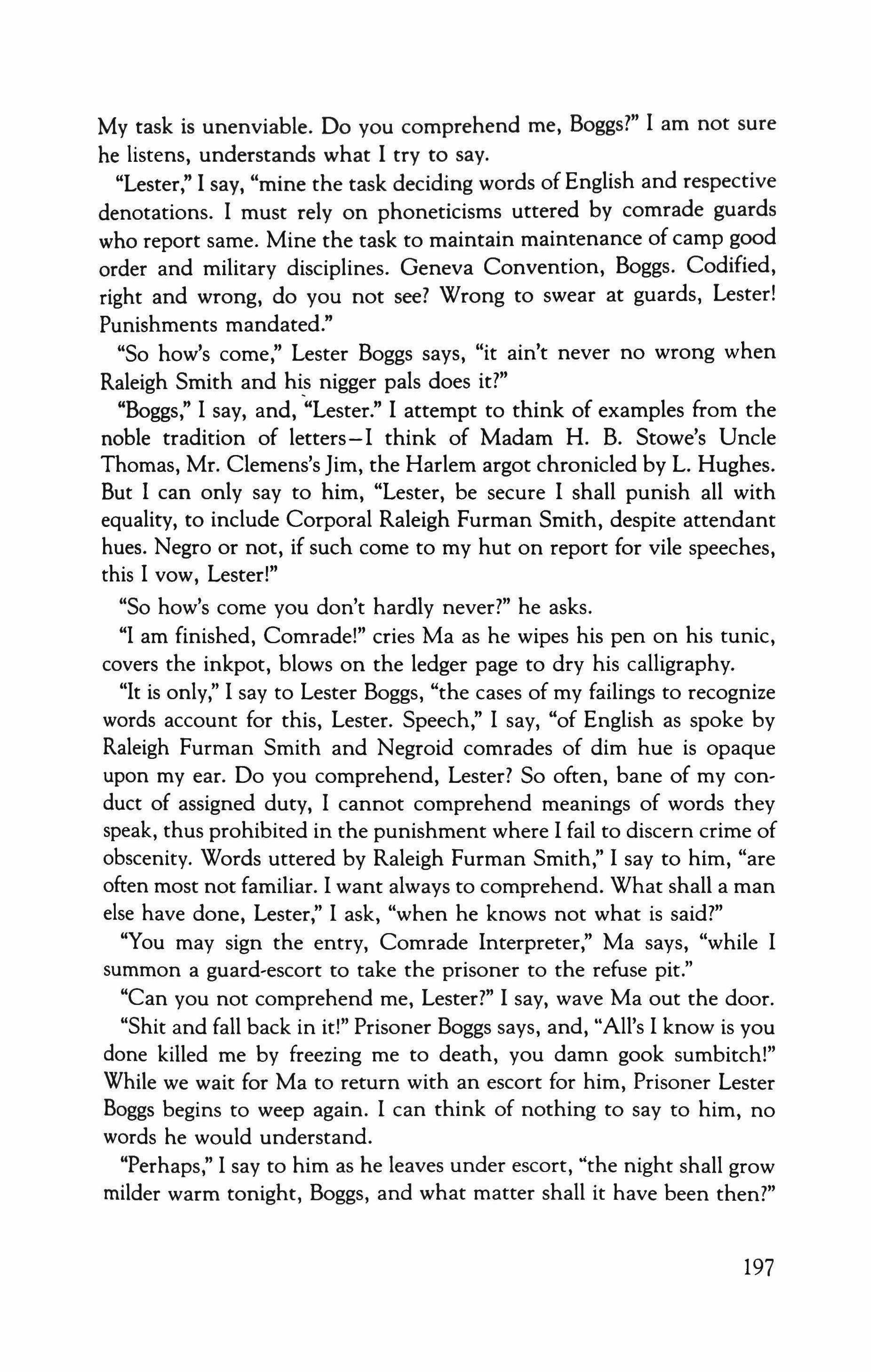
My task is unenviable. Do you comprehend me, Boggs?" I am not sure he listens, understands what I try to say.
"Lester," I say, "mine the task deciding words of English and respective denotations. I must rely on phoneticisms uttered by comrade guards who report same. Mine the task to maintain maintenance of camp good order and military disciplines. Geneva Convention, Boggs. Codified, right and wrong, do you not see? Wrong to swear at guards, Lester! Punishments mandated."
"So how's come," Lester Boggs says, "it ain't never no wrong when Raleigh Smith and his nigger pals does it?"
"Boggs," I say, and, "Lester." I attempt to think of examples from the noble tradition of letters-I think of Madam H. B. Stowe's Uncle Thomas, Mr. Clemens's Jim, the Harlem argot chronicled by L. Hughes. But I can only say to him, "Lester, be secure I shall punish all with equality, to include Corporal Raleigh Furman Smith, despite attendant hues. Negro or not, if such come to my hut on report for vile speeches, this I vow, Lester!"
"So how's come you don't hardly never?" he asks.
"I am finished, Comrade!" cries Ma as he wipes his pen on his tunic, covers the inkpot, blows on the ledger page to dry his calligraphy. lilt is only," I say to Lester Boggs, "the cases of my failings to recognize words account for this, Lester. Speech," I say, "of English as spoke by Raleigh Furman Smith and Negroid comrades of dim hue is opaque upon my ear. Do you comprehend, Lester? So often, bane of my con, duct of assigned duty, I cannot comprehend meanings of words they speak, thus prohibited in the punishment where I fail to discern crime of obscenity. Words uttered by Raleigh Furman Smith," I say to him, "are often most not familiar. I want always to comprehend. What shall a man else have done, Lester," I ask, "when he knows not what is said?"
"You may sign the entry, Comrade Interpreter," Ma says, "while I summon a guard-escort to take the prisoner to the refuse pit."
"Can you not comprehend me, Lester?" I say, wave Ma out the door. "Shit and fall back in it!" Prisoner Boggs says, and, "All's I know is you done killed me by freezing me to death, you damn gook sumbitch!" While we wait for Ma to return with an escort for him, Prisoner Lester Boggs begins to weep again. I can think of nothing to say to him, no words he would understand.
"Perhaps," I say to him as he leaves under escort, "the night shall grow milder warm tonight, Boggs, and what matter shall it have been then?"
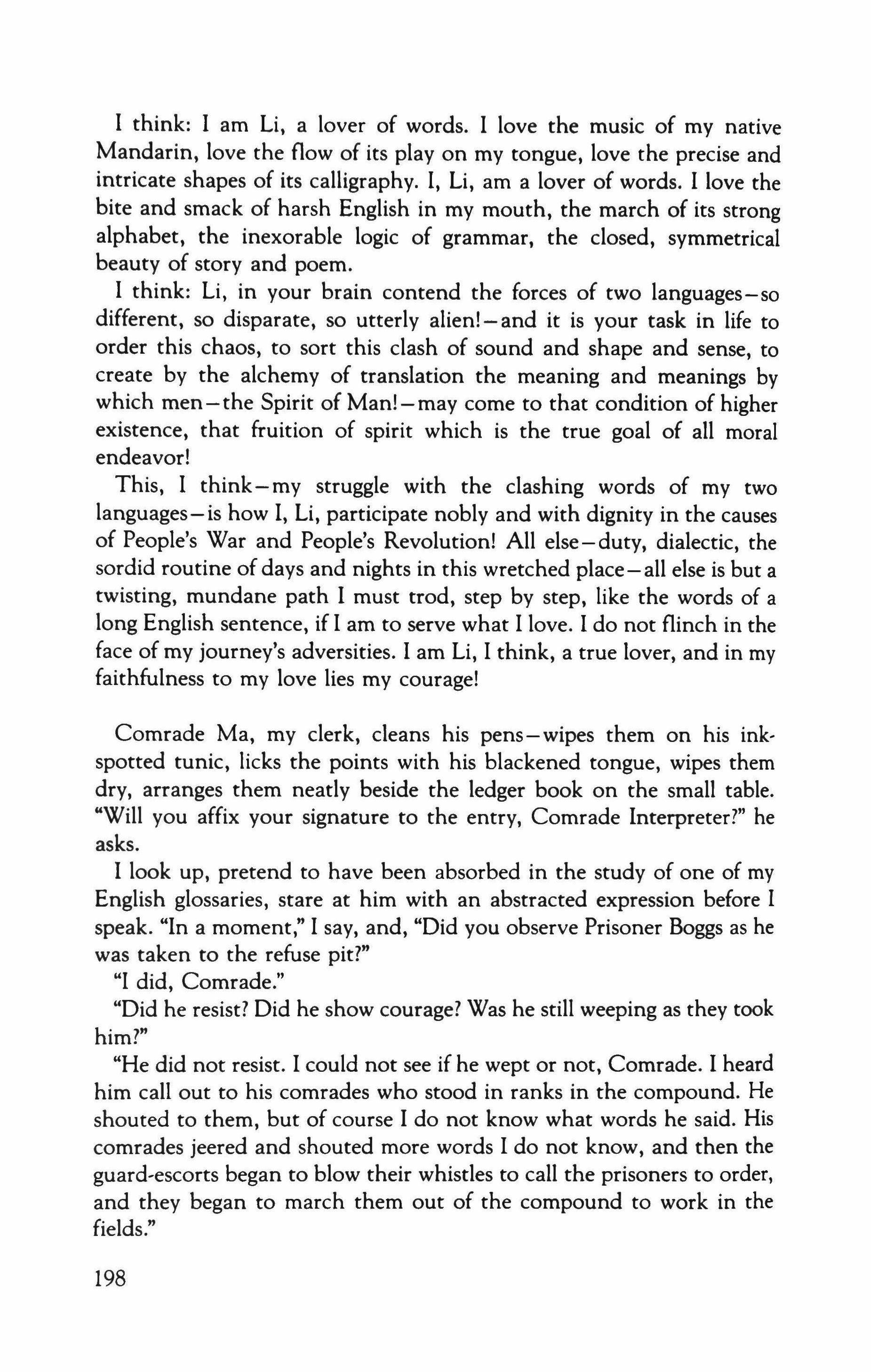
I think: I am Li, a lover of words. I love the music of my native Mandarin, love the flow of its play on my tongue, love the precise and intricate shapes of its calligraphy. I, Li, am a lover of words. I love the bite and smack of harsh English in my mouth, the march of its strong alphabet, the inexorable logic of grammar, the closed, symmetrical beauty of story and poem.
I think: Li, in your brain contend the forces of two languages-so different, so disparate, so utterly alien! - and it is your task in life to order this chaos, to sort this clash of sound and shape and sense, to create by the alchemy of translation the meaning and meanings by which men-the Spirit of Man!-may come to that condition of higher existence, that fruition of spirit which is the true goal of all moral endeavor!
This, I thinkmy struggle with the clashing words of my two languages-is how I, Li, participate nobly and with dignity in the causes of People's War and People's Revolution! All else-duty, dialectic, the sordid routine of days and nights in this wretched place - all else is but a twisting, mundane path I must trod, step by step, like the words of a long English sentence, if I am to serve what I love. I do not flinch in the face of my journey's adversities. I am Li, I think, a true lover, and in my faithfulness to my love lies my courage!
Comrade Ma, my clerk, cleans his pens-wipes them on his inkspotted tunic, licks the points with his blackened tongue, wipes them dry, arranges them neatly beside the ledger book on the small table. "Will you affix your signature to the entry, Comrade Interpreter?" he asks.
I look up, pretend to have been absorbed in the study of one of my English glossaries, stare at him with an abstracted expression before 1 speak. "In a moment," 1 say, and, "Did you observe Prisoner Boggs as he was taken to the refuse pit?"
"I did, Comrade."
"Did he resist? Did he show courage? Was he still weeping as they took him?"
"He did not resist. I could not see if he wept or not, Comrade. I heard him call out to his comrades who stood in ranks in the compound. He shouted to them, but of course I do not know what words he said. His comrades jeered and shouted more words I do not know, and then the guard-escorts began to blow their whistles to call the prisoners to order, and they began to march them out of the compound to work in the fields."
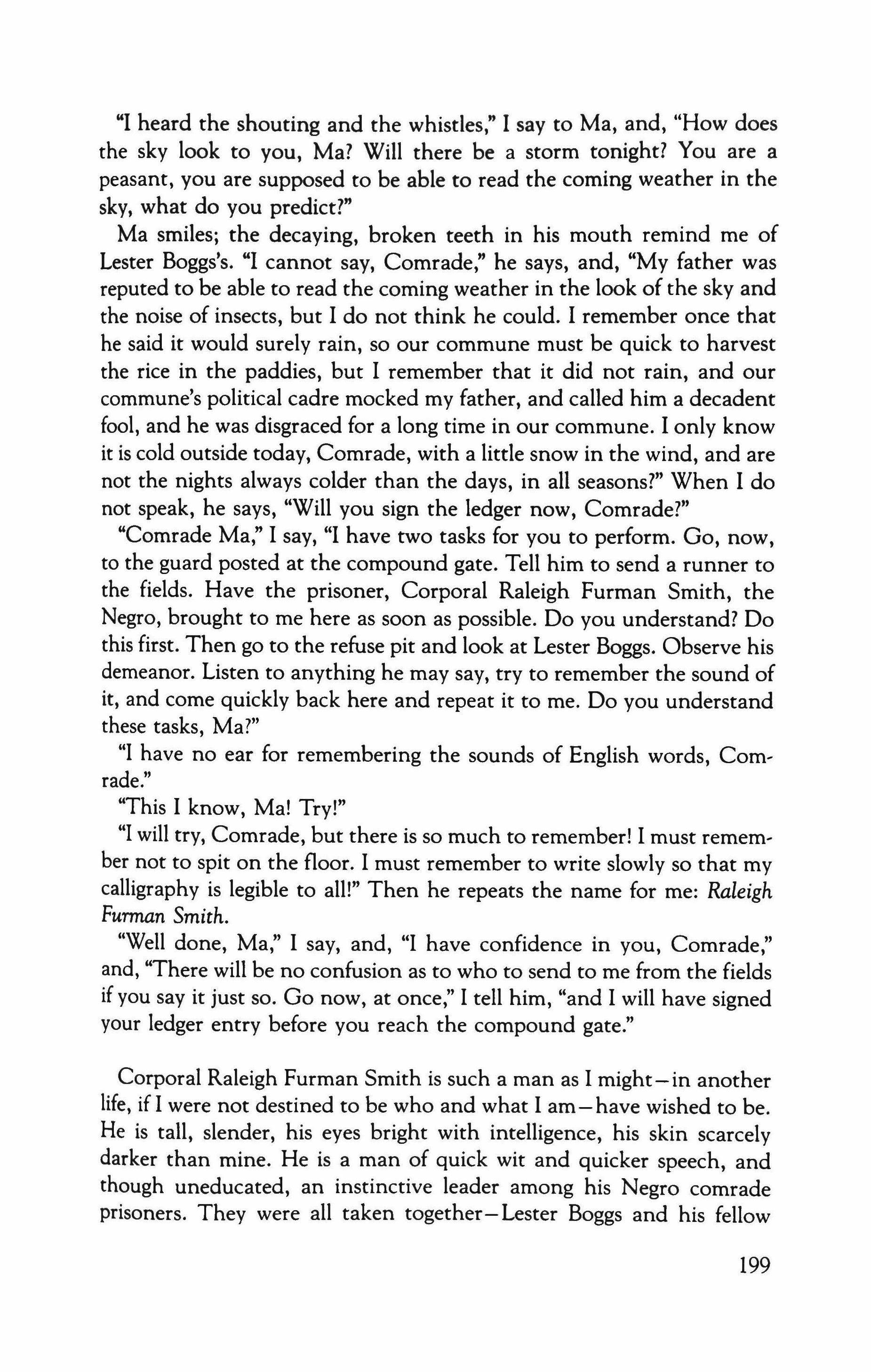
"I heard the shouting and the whistles," 1 say to Ma, and, "How does the sky look to you, Ma? Will there be a storm tonight? You are a peasant, you are supposed to be able to read the coming weather in the sky, what do you predict?"
Ma smiles; the decaying, broken teeth in his mouth remind me of Lester Boggs's. "I cannot say, Comrade," he says, and, "My father was reputed to be able to read the coming weather in the look of the sky and the noise of insects, but I do not think he could. I remember once that he said it would surely rain, so our commune must be quick to harvest the rice in the paddies, but I remember that it did not rain, and our commune's political cadre mocked my father, and called him a decadent fool, and he was disgraced for a long time in our commune. 1 only know it is cold outside today, Comrade, with a little snow in the wind, and are not the nights always colder than the days, in all seasons?" When I do not speak, he says, "Will you sign the ledger now, Comrade?"
"Comrade Ma," I say, "I have two tasks for you to perform. Go, now, to the guard posted at the compound gate. Tell him to send a runner to the fields. Have the prisoner, Corporal Raleigh Furman Smith, the Negro, brought to me here as soon as possible. Do you understand? Do this first. Then go to the refuse pit and look at Lester Boggs. Observe his demeanor. Listen to anything he may say, try to remember the sound of it, and come quickly back here and repeat it to me. Do you understand these tasks, Ma?"
"I have no ear for remembering the sounds of English words, Cornrade."
"This I know, Ma! Try!"
"I will try, Comrade, but there is so much to remember! I must rernernber not to spit on the floor. I must remember to write slowly so that my calligraphy is legible to all!" Then he repeats the name for me: Raleigh Furman Smith.
"Well done, Ma," I say, and, "I have confidence in you, Comrade," and, "There will be no confusion as to who to send to me from the fields if you say it just so. Go now, at once," I tell him, "and I will have signed your ledger entry before you reach the compound gate."
Corporal Raleigh Furman Smith is such a man as I might - in another life, if I were not destined to be who and what I am - have wished to be. He is tall. slender, his eyes bright with intelligence, his skin scarcely darker than mine. He is a man of quick wit and quicker speech, and though uneducated, an instinctive leader among his Negro comrade prisoners. They were all taken together- Lester Boggs and his fellow
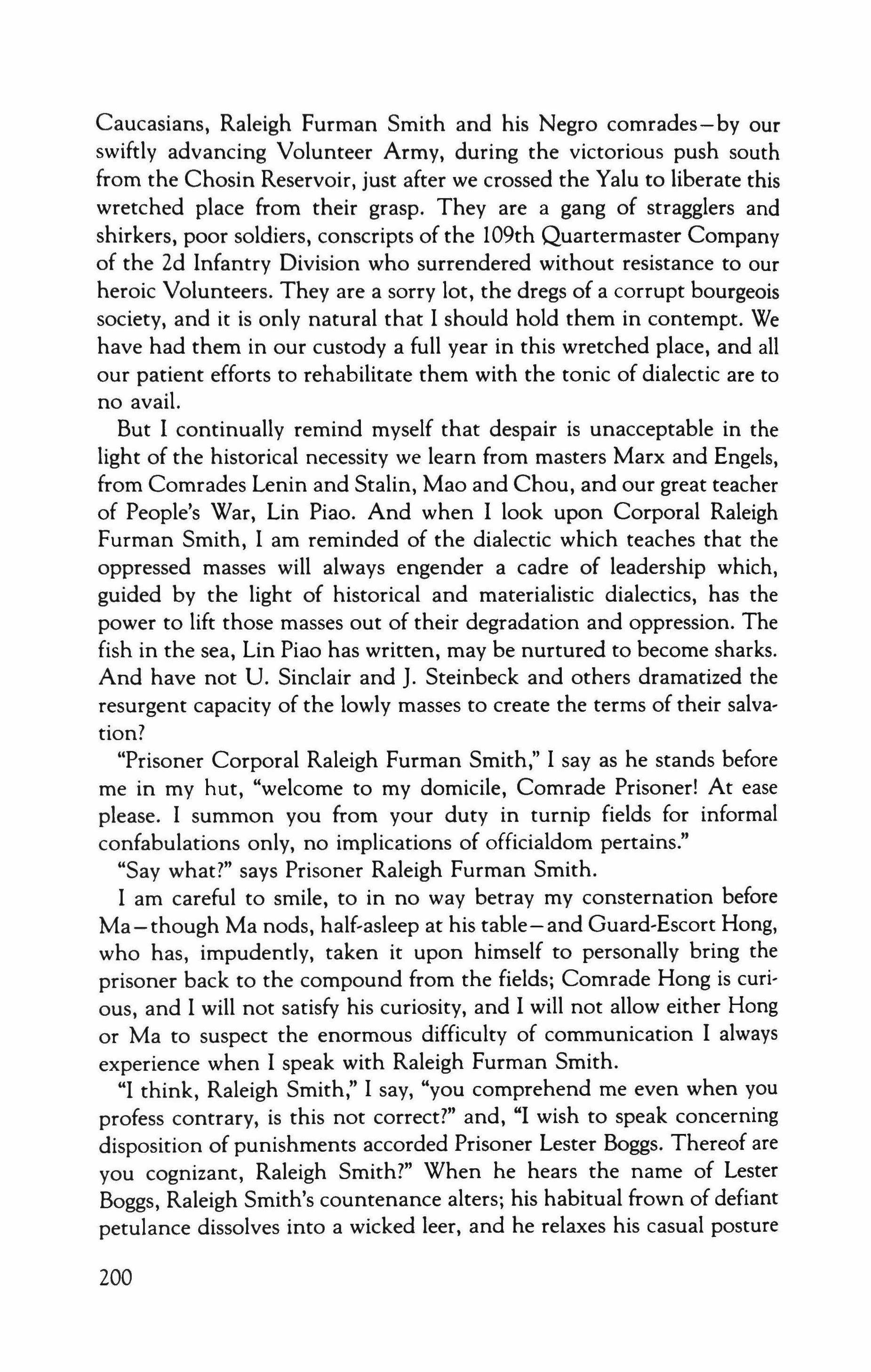
Caucasians, Raleigh Furman Smith and his Negro comrades-by our swiftly advancing Volunteer Army, during the victorious push south from the Chosin Reservoir, just after we crossed the Yalu to liberate this wretched place from their grasp. They are a gang of stragglers and shirkers, poor soldiers, conscripts of the 109th Quartermaster Company of the 2d Infantry Division who surrendered without resistance to our heroic Volunteers. They are a sorry lot, the dregs of a corrupt bourgeois society, and it is only natural that I should hold them in contempt. We have had them in our custody a full year in this wretched place, and all our patient efforts to rehabilitate them with the tonic of dialectic are to no avail.
But I continually remind myself that despair is unacceptable in the light of the historical necessity we learn from masters Marx and Engels, from Comrades Lenin and Stalin, Mao and Chou, and our great teacher of People's War, Lin Piao. And when I look upon Corporal Raleigh Furman Smith, I am reminded of the dialectic which teaches that the oppressed masses will always engender a cadre of leadership which, guided by the light of historical and materialistic dialectics, has the power to lift those masses out of their degradation and oppression. The fish in the sea, Lin Piao has written, may be nurtured to become sharks. And have not U. Sinclair and ]. Steinbeck and others dramatized the resurgent capacity of the lowly masses to create the terms of their salvation?
"Prisoner Corporal Raleigh Furman Smith," I say as he stands before me in my hut, "welcome to my domicile, Comrade Prisoner! At ease please. I summon you from your duty in turnip fields for informal confabulations only, no implications of officialdom pertains."
"Say what?" says Prisoner Raleigh Furman Smith.
I am careful to smile, to in no way betray my consternation before Ma-though Ma nods, half-asleep at his table-and Guard-Escort Hong, who has, impudently, taken it upon himself to personally bring the prisoner back to the compound from the fields; Comrade Hong is curious, and I will not satisfy his curiosity, and I will not allow either Hong or Ma to suspect the enormous difficulty of communication 1 always experience when 1 speak with Raleigh Furman Smith.
"I think, Raleigh Smith," 1 say, "you comprehend me even when you profess contrary, is this not correct?" and, "I wish to speak concerning disposition of punishments accorded Prisoner Lester Boggs. Thereof are you cognizant, Raleigh Smith?" When he hears the name of Lester Boggs, Raleigh Smith's countenance alters; his habitual frown of defiant petulance dissolves into a wicked leer, and he relaxes his casual posture

of attention, places his hands on his hips, leans back, one booted foot thrust forward.
"Ain't this a bitch!" says Corporal Raleigh Furman Smith, and, "I hear talk as how you done fixed his cracker ass to that wheel for all day and night, freeze the mother's ass solid, Jim! It's time somebody killed the little mother, save me or somebody the doing," said Prisoner Smith.
I say in Mandarin to Hong, "You have done as I requested, Comrade. I prefer that you wait elsewhere while I speak with the prisoner."
"It is very cold outside in the wind, Comrade Interpreter," Hong says, and, "What does it matter if I wait in the shelter of your hut when I cannot understand what you say to him, or he to your'
"Nevertheless," I say to him, "you are dismissed!"
"It is irregular to summon a prisoner from work when there has been no report of his misconduct made to you. I am justified in bringing this to the attention of the Comrade Camp Commandant," he says.
"Dismissed!" I order him, and he leaves, smiling impudently at me before he closes the door.
"Gabble gabble, people steady talking shit about me I can't understand no more than if it was some damn animal noises," Raleigh Smith says.
"If you are persisting in vulgarisms," I say to him, "we shall fail communications. Prisoner Smith, please not to pollute discourse with such as 'shit' and 'ass,' please! Such words are forbidden by Geneva Convention and also offensive to ears of all parties."
"Not his it ain't," Smith says, turns to look at dozing Ma. "That ugly cat don't dig no more what I say than I do that turkey-gabble you steady talking around me, Jim."
"Ma, either rouse yourself to a semblance of consciousness or join Comrade Hong outside in the wind and snow!"
"Forgive me, Comrade," Ma says, "but I think the cold weather makes me sleepy. Can we not make a fire in the stove, if only for an hour, to warm the hut?"
"And how shall the prisoners respect us if we do not share their privations, Comrade? Is it not the policy of our Comrade Political Cadre that we suffer the weather with them, and so dramatize a solidarity that may transcend our distinction in status? We thus take steps to effect their political rehabilitation, do we not? And do we not also meet the challenge presented by a shortage of firewood and coal in this wretched place by this measure of revolutionary discipline? Rouse yourself, Ma, or I shall send you outside!" Ma tries to sit up straight at his small table; he blows into his cupped hands, tucks them under his armpits.

"What I said," says Raleigh Furman Smith, "gabble-talking steady. Don't mean a thing to me, Jim!"
"Raleigh Smith," I say, and pause to choose and arrange my English words before I continue. "I request also you cease reference of address to me as Jim. I am Comrade Interpreter Li. I do not mock you with names of slangs or other vulgarism, can you not reciprocate? Also please no more 'shit' and 'ass' and 'mother,' than which latter I comprehend as diminutive of specific foul obscenity. And also please not to characterize my language as cluckings of fowl! Do I mock your argot? We must communicate, Raleigh Furman Smith!"
"You jive is all you doing, Comrade," he says, and, "What you bring me all the way in here out of my work for, man? What I got to do with damn Boggs fixed out on the wheel with all the garbage and toilet stink?"
"Whilst you progressed here from hence," I say to him, "Comrade Ma undertook for me a service at my order. He did went and gaze upon Lester Boggs suffer his just punishments. Can you guess, Prisoner Smith, as to his report of your comrade's disposition in extreme durance?"
"Lester Boggs?" Smith says, and, "If I know him his butthole be sucking blue pond water! You tell me, Comrade. Saying maybe how he appreciates all of a sudden like the wisdom of Marx and all that dialect hoo-ha if you'll just untie him? Calling out for his mama to come all the way over here to damn Korea and save his Okie behind from that wheel before it gets dark and freezes to him?"
"You are perceptive, Raleigh Smith!" I say, and, in Mandarin to Ma, "Say again to me what you observed of the prisoner in the refuse pit, Ma."
Ma blinks, straightens up to show that he is awake, alert before he speaks. "Prisoner Boggs wept and shouted many words I could not understand, Comrade Interpreter."
"Yet there was one word you repeated to me. Repeat it again, please, Ma."
"The prisoner cried out Mama. Again and again he cried out this word, Mama, Comrade. This I heard clearly, and committed it to memory so that I might tell you."
"When you people going to learn I don't speak no Chink, never will!" Raleigh Furman Smith says.
"'Chink' is pejorative vulgarism!" I say, and, quickly, before he can retort with further insolence, "Did you not hear what Comrade Ma said? 'Mama'! 'Mama' is the word Lester Boggs says upon the wheel whereto he is affixed in punishments! As you perceived, Raleigh Smith, Com202
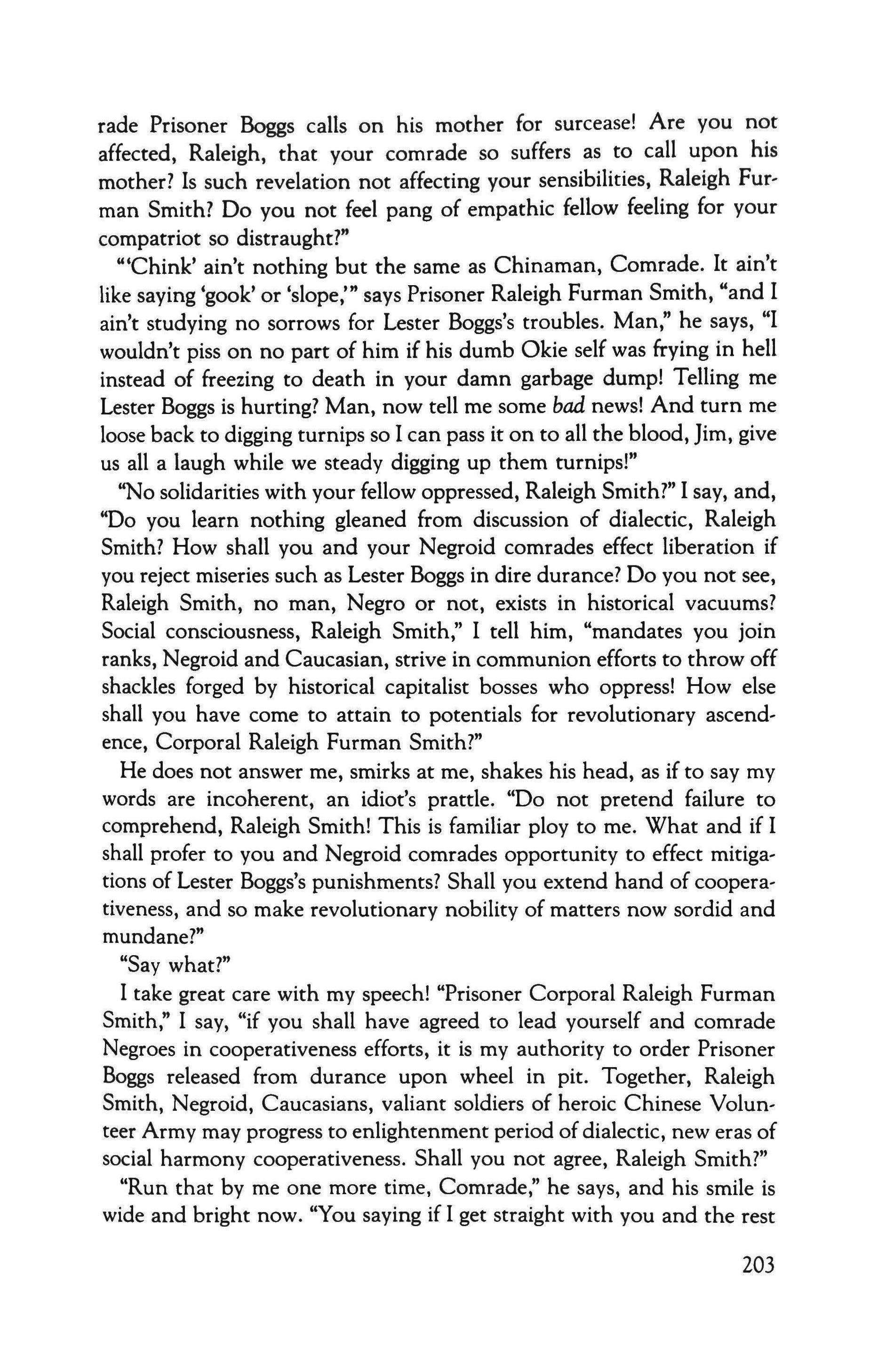
rade Prisoner Boggs calls on his mother for surcease! Are you not affected, Raleigh, that your comrade so suffers as to call upon his mother? Is such revelation not affecting your sensibilities, Raleigh Fur, man Smith? Do you not feel pang of empathic fellow feeling for your compatriot so distraught?"
"'Chink' ain't nothing but the same as Chinaman, Comrade. It ain't like saying 'gook' or 'slope,'" says Prisoner Raleigh Furman Smith, "and I ain't studying no sorrows for Lester Boggs's troubles. Man," he says, "1 wouldn't piss on no part of him if his dumb Okie self was frying in hell instead of freezing to death in your damn garbage dump! Telling me
Lester Boggs is hurting? Man, now tell me some bad news! And turn me loose back to digging turnips so 1 can pass it on to all the blood, Jim, give us all a laugh while we steady digging up them turnips!"
"No solidarities with your fellow oppressed, Raleigh Smith?" I say, and, "Do you learn nothing gleaned from discussion of dialectic, Raleigh Smith? How shall you and your Negroid comrades effect liberation if you reject miseries such as Lester Boggs in dire durance? Do you not see, Raleigh Smith, no man, Negro or not, exists in historical vacuums? Social consciousness, Raleigh Smith," I tell him, "mandates you join ranks, Negroid and Caucasian, strive in communion efforts to throw off shackles forged by historical capitalist bosses who oppress! How else shall you have come to attain to potentials for revolutionary ascend, ence, Corporal Raleigh Furman Smith?"
He does not answer me, smirks at me, shakes his head, as if to say my words are incoherent, an idiot's prattle. "Do not pretend failure to comprehend, Raleigh Smith! This is familiar ploy to me. What and if I shall profer to you and Negroid comrades opportunity to effect mitigations of Lester Boggs's punishments? Shall you extend hand of coopera' tiveness, and so make revolutionary nobility of matters now sordid and mundane?"
"Say what?"
I take great care with my speech! "Prisoner Corporal Raleigh Furman Smith," I say, "if you shall have agreed to lead yourself and comrade Negroes in cooperativeness efforts, it is my authority to order Prisoner Boggs released from durance upon wheel in pit. Together, Raleigh Smith, Negroid, Caucasians, valiant soldiers of heroic Chinese Volunteer Army may progress to enlightenment period of dialectic, new eras of social harmony cooperativeness. Shall you not agree, Raleigh Smith?"
"Run that by me one more time, Comrade," he says, and his smile is wide and bright now. "You saying if I get straight with you and the rest

of the Chinks here, you going to cut Boggs loose of that wheel before he freezes through?"
"You are perceptive, Prisoner Smith."
"And you the same folks feeds me on turnips make everyone crap like a damn elephant?"
"We share stringent rations, do we not? Also noodles and rice, beans and turnips for roughage bulks. Diet of revolution is not luxury, Raleigh Smith!"
"And you the cat steady threatening me with time in the garbage dump for talking back to them dumb-ass guards?"
"Geneva Convention," I tell him, "cursing forbidden, contrary to good orders and disciplines."
"And, like, for instance, what you want from me, Comrade? What I mean is, lay it out, Jim! Say what it is I gots to do before you going to make it all sweet for us?"
"As follows," I say, and, "Cooperativeness spirit of constructive fervor overall. Sharing of goals and ideals in good faiths, like unto rations we share in this bad place, Raleigh Smith. To wit, specifics: cease cursing of comrade guards in your exotic argot. Enthusiasms of participation in prescribed discussion of dialectic, this only so that revolutionary political education enlightenment may emerge, engendering true exchanges of cultural and political nexus, and most important, ceasing historical antagonisms betwixt Caucasians and Negroids. Latter, I have confidence, shall have resulted if you lead to liberate said Boggs through agreed cooperativeness. I envision revolutionary spirit of understandings mutual, glorious time of union community here in this bad place whilst we throw back revisionist forces of imperialists! Do you comprehend me, Raleigh Smith?"
"Ain't this a bitch?" says Raleigh Furman Smith, and, "Man, you are so dim! What the hell I care about damn Lester Boggs! Boggs? Man, I catch his ofay bootie walking my street in Detroit ever, I stick a shank in him fast as spit on him! And your dialect shit you and that political cadre cat Soo steady talking ain't nothing but some bullshit, Jim! Man, turn me loose to go dig them turnips!"
"Comrade," Ma says, stands up at his small table, "does the prisoner grow belligerent? Shall I summon a guard?"
"Sit and be silent!" I command him in Mandarin. To Raleigh Furman Smith, I say, "Rejection? You doubt sincerities perhaps of my heartfelt innermost proposals? Think you I am not honest, Raleigh Smith?"
"Honest?" he says, and, "Man, don't do me no damn favors! Don't you know I ain't no soldier? In real life, man, back in Detroit, I'm the best

pimp you ever seen! You honest? You a liar and a ee-lapper, a four-day creeper and a turd-snapper! Jim, if I had you in Detroit, I would cut your stones in a minute!"
Ma says, "Comrade, I will go outside and summon a guard!"
"Sit!" I command him. I say to Raleigh Smith, "You curse me, I think, Prisoner Smith! You iterate 'ass' and say also 'turd' of me, than which is I think synonym of English 'shit'! Shall you wish to join Boggs upon said wheel, Raleigh Smith?"
"I give a rat's ass, Jim," he says, and, "You done called me in here from my work and give out all this gabble, I don't know nothing from what you saying, man!"
"It is my authority to decree punishments, Raleigh Smith!" I say, and, "You transcend camp good order and disciplines! Yet I shall not provoke, yet caution you to consider my words! Think if Lester Boggs succumbs to cold weathers, you also assume responsibility now! You kill your comrade Lester Boggs if you refuse cooperativeness, Prisoner Smith! I do not oppress," I tell him, "only maintain maintenance of orders and disciplines and participate in heroic struggle of People's War!"
"You a liar and a penny-wink," he says, "you eat cat shit and your breath stinks!"
"Summon a guard, Ma!" I command. "This prisoner's attitude is counter-revolutionary! Return him to his work in the fields, and instruct the comrade guard-escorts to listen closely to anything he may say to them, for if he utters even the least vile word I am able to recognize, I will sentence him to join his Caucasian comrade upon the wheel in the refuse pit!"
"You a liar," says Raleigh Furman Smith, "and a pee-weight. Your backbone's crooked and you can't shit straight!"
"You mistake my benevolence!" I shout after him as he is taken away by Comrade Guard-Escort Hong to return to the turnip fields.
"This is the one," Hong says as he leaves, "who deserves severe punishment! This is the one you always fail to punish for his dirty speech!"
"Are you ill, Comrade Interpreter?" Ma asks when we are alone. "Your hands tremble, Comrade. Your eyelid twitches, and your lips quiver. Do you have a fever, or is it only the cold?"
"Please do not speak, Comrade Ma," I say to him. "I must think, and to think clearly, one must choose words with care, and I cannot bring words to bear upon this problem if you constantly interrupt me."
I say to myself: Li, there is no problem so great that it will not yield to the instrument of dialectical analysis; there is no problem so great that it

will not yield to the force of human reason; there is no problem so great that it will not yield to the wondrous order of language!
But it is as if I had no words.
I think: Li, you must search the wisdom of masters Marx and Engels, Comrades Lenin and Stalin, Mao and Chou, the strategies and tactics of People's War as pronounced by Comrade Lin Piao-surely they will show the way!
I think: Li, consider the truths contained in that exquisite tradition of literature you have studied - is there no insight to be discovered in the proletarian fictions of T. Dreiser or J. Farrell, the voices of the masses who sing in the poems of W. Whitman, the dramatized dialectics of H. Fast or M. Gold?
It is as if I know nothing.
There is only Lester Boggs, a rude peasant of Stillwater, Oklahoma-a keeper of grounds at an obscure agricultural college-bound fast with ropes to a discarded caisson wheel in the camp's refuse pit, where he will die if tonight's weather is very cold. I think to myself: Li, were you not such a one, once, as Prisoner Lester Boggs? Ignorant, vulgar, festering with prejudice and hostility? Benighted, a victim of historical oppression, a creature tortured by the press of social brutality and vicious, exploitive economics, twisted into a monstrous shape scarcely distinct from that of a dumb beast, gifted by nature only with the redeeming possibilities of his faculty of speech?
Yet, I, Li, have been raised to dignity, liberated by People's Revolution, made noble by the cultivation of that same faculty-my words!-so that I might lend my strength to our global struggle of People's War, that I might pledge myself to the liberation of such as Lester Boggs of Stillwater, Oklahoma!
And it is I, Li, who has decreed that Lester Boggs shall remain for twenty-four hours upon the caisson wheel in the refuse pit, where he will surely die.
There is only Corporal Raleigh Furman Smith, a cunning and insolent Negro from the city of Detroit, a procurer of whores! I think to myself: Li, were you not, once, such a one such as Raleigh Furman Smith? Plagued by your intelligence, bitterly angry at the injustice of a racist, fascist world that refused you the natural dignity your talents should have earned? And, so, contemptuous of those who would hold out the hand of opportunity, enable you to lift yourself up to the potential of your nature? Blinded by the pain of your frustration to the path of deliverance that lay before you?
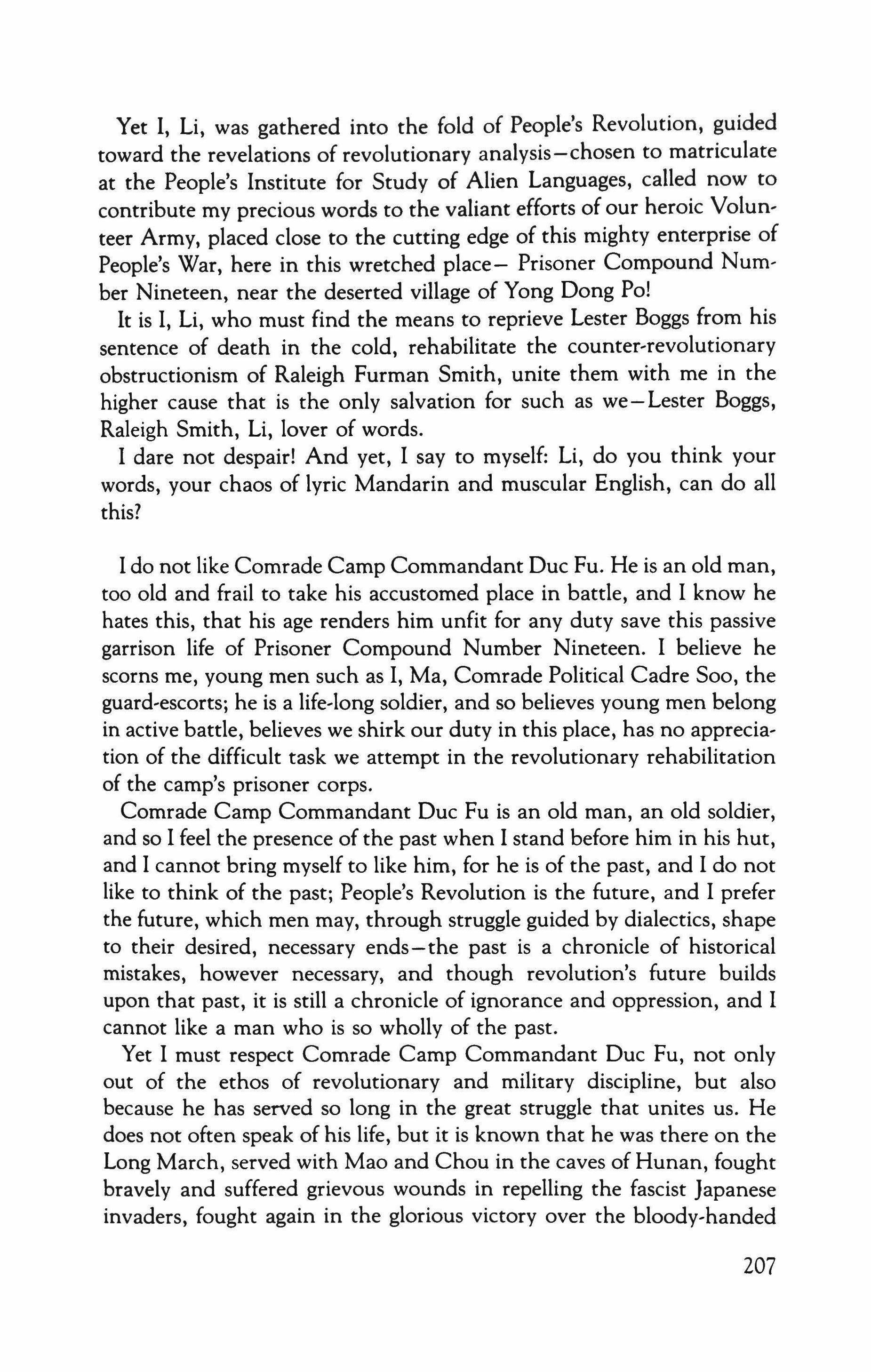
Yet I, Li, was gathered into the fold of People's Revolution, guided toward the revelations of revolutionary analysis-chosen to matriculate at the People's Institute for Study of Alien Languages, called now to contribute my precious words to the valiant efforts of our heroic Volunteer Army, placed close to the cutting edge of this mighty enterprise of People's War, here in this wretched place- Prisoner Compound Number Nineteen, near the deserted village of Yong Dong Po!
It is I, Li, who must find the means to reprieve Lester Boggs from his sentence of death in the cold, rehabilitate the counter-revolutionary obstructionism of Raleigh Furman Smith, unite them with me in the higher cause that is the only salvation for such as we- Lester Boggs, Raleigh Smith, Li, lover of words.
I dare not despair! And yet, 1 say to myself: Li, do you think your words, your chaos of lyric Mandarin and muscular English, can do all this?
I do not like Comrade Camp Commandant Duc Fu. He is an old man, too old and frail to take his accustomed place in battle, and I know he hates this, that his age renders him unfit for any duty save this passive garrison life of Prisoner Compound Number Nineteen. 1 believe he scorns me, young men such as I, Ma, Comrade Political Cadre Soo, the guard-escorts; he is a life-long soldier, and so believes young men belong in active battle, believes we shirk our duty in this place, has no appreciation of the difficult task we attempt in the revolutionary rehabilitation of the camp's prisoner corps.
Comrade Camp Commandant Due Fu is an old man, an old soldier, and so I feel the presence of the past when I stand before him in his hut, and I cannot bring myself to like him, for he is of the past, and I do not like to think of the past; People's Revolution is the future, and I prefer the future, which men may, through struggle guided by dialectics, shape to their desired, necessary ends-the past is a chronicle of historical mistakes, however necessary, and though revolution's future builds upon that past, it is still a chronicle of ignorance and oppression, and I cannot like a man who is so wholly of the past.
Yet I must respect Comrade Camp Commandant Duc Fu, not only out of the ethos of revolutionary and military discipline, but also because he has served so long in the great struggle that unites us. He does not often speak of his life, but it is known that he was there on the Long March, served with Mao and Chou in the caves of Hunan, fought bravely and suffered grievous wounds in repelling the fascist Japanese invaders, fought again in the glorious victory over the bloody-handed

Kuomintang. He is too old now, too frail from his many wounds to fight in battle against Yankee Imperialism and the running dogs of the puppet Republic of Korea, and I think fervor and idealism have faded in him. I do not like this man, but will respect him.
"You have summoned me here, Comrade Camp Commandant," I say. "Please stand at ease, Comrade Interpreter," says Comrade Due Fu, and, "While the occasion of my summons is official, I would conduct our interview as informally as possible. Tell me, Comrade Li, has it grown colder outside during the last hour? I have not been outside since the calling of roll, and you see how warm my stove makes my hut. Will you have tea? Is it colder than when this day began?"
"I cannot say," I tell him. "Perhaps it is not so cold today, but to stand out in the wind makes it feel very cold. The weather is always severe in this wretched place," I say, "terrible cold and snow in winter, hot and dry in summer, and there is always the wind that blows off the mountains." Comrade Duc Fu smiles.
"People's War requires sacrifice," he says, and, "I think I feel the cold more than when I was a young man. I could tell you of the winters we suffered in the caves of Hunan, and on campaign against the fascist Japanese and the Kuomintang."
"I know your sacrifices were great, Comrade Camp Commandant. They have earned you and your heroic comrades the undying respect of all true revolutionaries." Comrade Duc Fu smiles again.
"I take comfort in your generous words, Li," he says, and, "An old soldier takes such comfort as he can find. Are you not too warm in your coat, Comrade? You see that the fire burns nicely in my stove, remove your coat and enjoy the warmth while we talk."
"I do not feel free to enjoy your fire," I say to him. "I am surprised you make a fire in your stove. Comrade Political Cadre Soo has said that we should set revolutionary examples for the prisoner corps by sharing their necessary privations. Comrade Soo says that if the prisoners see us eat their meager rations and suffer the cold with them, it will gain their confidence, and we may hope to lead them to correct attitudes the more easily, overcoming their hostility." Comrade Camp Commandant Due Fu closes his eyes, sighs loudly, opens his eyes to look at me.
"Do you presume to instruct me in my duty, Li?" he asks.
"Of course not, Comrade. I only say what I believe." He smiles at me.
"Comrade Soo is an ideologue. That is his duty. I am a soldier. I am also an old man, and so understand things a young man like Sao cannot. He is liable to mistakes due to his inexperience. And you are also a young man, Comrade Li." 208

"Have I made a mistake, Comrade Camp Commandant? Is this why you summon me to your hut?" Comrade Due Fu smiles and shakes his head.
"There has been a complaint," he says.
"Lodged by Comrade Guard-Escort Hong?" I say. Comrade Due Fu nods, still smiling; I know that he means me to understand that he is not angry, that he likes me, and yet, though I must and will respect him, I cannot like this man - it is wrong of him to make a fire in his hut's stove when Comrade Soo has said we must share the prisoners' discomfort if we are to rehabilitate them. "He complains of the punishment I decreed for Prisoner Lester Boggs? I assure you, Comrade Due Fu, the severity of the punishment was merited! Lester Boggs has repeatedly violated the rule of camp good order and discipline that forbids cursing the guards who supervise his work in the turnip fields. I have a ledgerbook, Comrade, which records in precise detail-"
Comrade Duc Fu raises his hand to interrupt me, still smiling. "Comrade Hong does not complain of the punishment you mete out to this Lester Boggs. Nor do I question your authority in this matter, Comrade Interpreter. Comrade Hong complains to me that you abused him by humiliating him in the presence of this prisoner named Boggs, and, further, that you exceeded your authority by summoning yet another prisoner, one Smith, a Negro, to your hut when there had been no report to you of his having uttered vile language."
"Comrade Hong was insolent," I say, and, "If I humiliated him, it was to enforce revolutionary and military discipline."
"Perhaps," says Comrade Duc Fu. "And what of this Smith you ordered brought to your hut?"
"Prisoner Lester Boggs accused me of ignoring the violations of the Negro prisoners, Comrade," I say. "I summoned Raleigh Furman Smith to my hut to demonstrate to all that I exhibit no favoritism. Raleigh Smith is, I am certain, also repeatedly guilty of cursing his guard-escorts, but I am unable to establish this due to the exotic argot spoken by him and his Negro comrades. I also seek to use the occasion of Lester Boggs' punishment to effect a solution to the racist factionalism that divides the prisoner corps. I seek to advance toward the goal of prisoner rehabilitation pronounced for us by Comrade Political Cadre Soo. I do not think I have exceeded my authority, Comrade Camp Commandant. I have only sought to bring my skill as an interpreter of English to bear upon the ongoing struggles of People's War and People's Revolution." Comrade Due Fu covers his mouth with his hand to conceal his smile. I am

uncomfortable in the heat of his hut, begin to perspire in my padded coat.
"And how, Comrade Li, shall punishing this prisoner Boggs with death by freezing this night in the refuse pit effect such a miraculous rehabilitation of the prisoner corps?" Comrade Due Fu mocks me-it is easy for the old to mock the young, for one who heats his hut to mock one who suffers cold for a higher purpose, for an old man who has known only the soldier's life to mock one who seeks a subtler solution to a problem of dialectics-and yet, I will respect Comrade Due Fu!
"I have offered to release Prisoner Lester Boggs from the wheel in the refuse pit if Raleigh Furman Smith will pledge to lead his Negro comrades in cooperation, to cease cursing the comrade guard-escorts in their argot, to show enthusiasm for the discussions of dialectics led by Comrade Soo, to cease their counter-revolutionary hostility to the Caucasian prisoners such as Lester Boggs."
"And does this Smith accept your offer, Comrade?"
"Not as yet, Comrade, but I am not discouraged. Dialectics teaches us that despair is not permitted." Comrade Duc Fu is silent for a moment; he closes his eyes, folds his hands before him on the surface of his desk, bows his head, as if deep in thought. I stand at ease before him, listen to the pop and crackle of the fire in his stove, perspire in my padded coat.
"Li," he says, lifts his head, opens his eyes, "does your dialectics tell you what shall become of the prisoner Lester Boggs if his Negro comrade persists in his defiance? What of Lester Boggs, Comrade Li, when night falls in this place?"
"I will hope to effect my solution well before the hour when night falls, Comrade."
"But if you fail? Tell me, Li, what then of Lester Boggs? Can you not speak the words to me, Li?"
I stand at attention before I speak. "He may die, Comrade Camp Commandant. Unless," I add quickly, "there should be some change in the weather. It is always possible that the wind may shift, that it will not be so cold tonight as to cause his death by freezing. I hope to succeed, Comrade."
Comrade Duc Fu smiles again, shakes his head. "Li," he says, "you are a very young man. Let me speak to you as an old man of much experience. Will you listen to my words, Comrade Li?"
"It is my duty to be instructed by you, Comrade Camp Commandant."
"Then attend my words, Li. As we talk here in the warm comfort of my hut, a man lies, tied to a caisson wheel, in the refuse pit. The wind
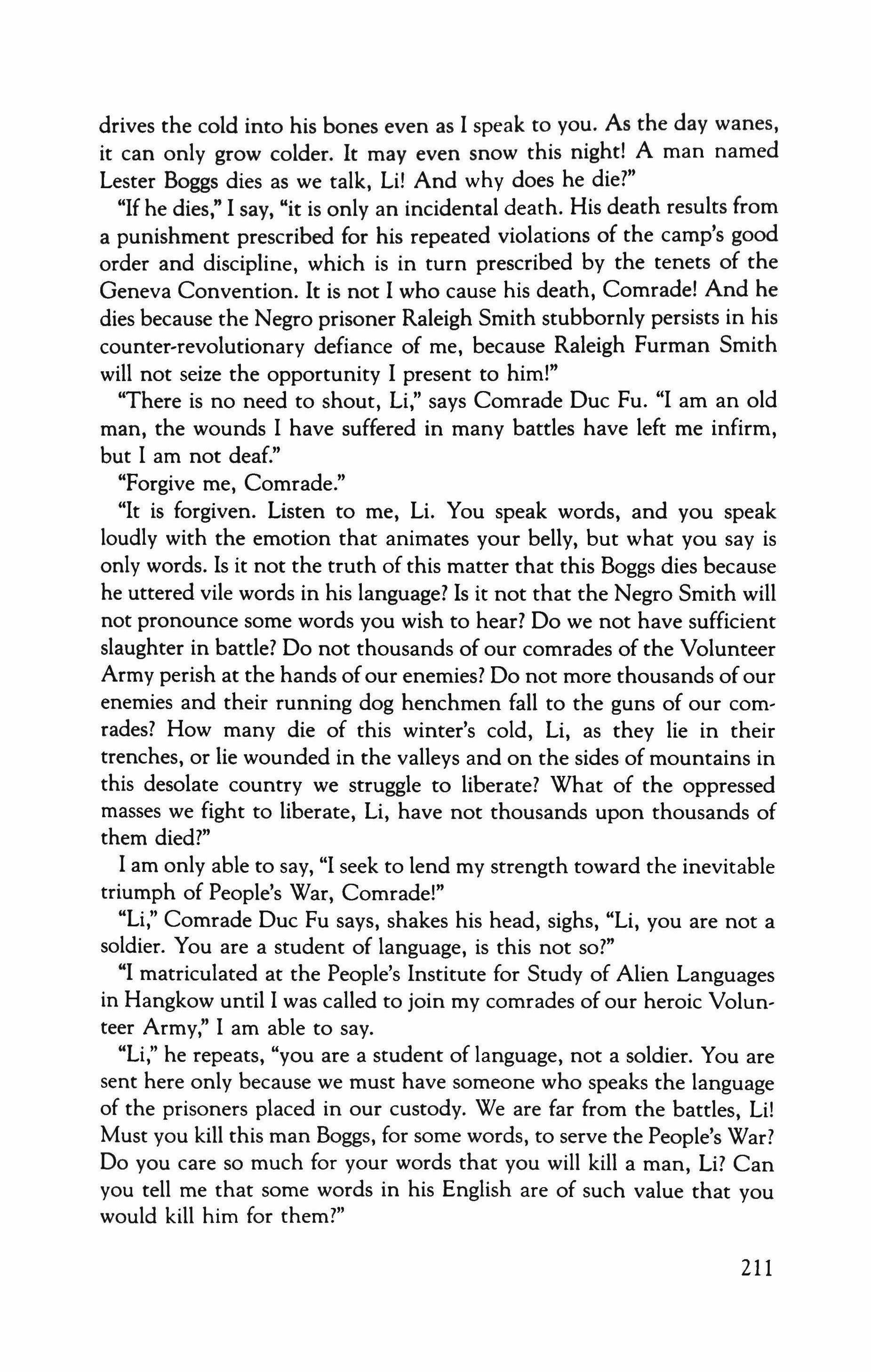
drives the cold into his bones even as I speak to you. As the day wanes, it can only grow colder. It may even snow this night! A man named Lester Boggs dies as we talk, Li! And why does he die?"
"If he dies," I say, "it is only an incidental death. His death results from a punishment prescribed for his repeated violations of the camp's good order and discipline, which is in turn prescribed by the tenets of the Geneva Convention. It is not I who cause his death, Comrade! And he dies because the Negro prisoner Raleigh Smith stubbornly persists in his counter-revolutionary defiance of me, because Raleigh Furman Smith will not seize the opportunity I present to him!"
"There is no need to shout, Li," says Comrade Due Fu. "I am an old man, the wounds I have suffered in many battles have left me infirm, but I am not deaf."
"Forgive me, Comrade."
"It is forgiven. Listen to me, Li. You speak words, and you speak loudly with the emotion that animates your belly, but what you say is only words. Is it not the truth of this matter that this Boggs dies because he uttered vile words in his language? Is it not that the Negro Smith will not pronounce some words you wish to hear? Do we not have sufficient slaughter in battle? Do not thousands of our comrades of the Volunteer Army perish at the hands of our enemies? Do not more thousands of our enemies and their running dog henchmen fall to the guns of our comrades? How many die of this winter's cold, Li, as they lie in their trenches, or lie wounded in the valleys and on the sides of mountains in this desolate country we struggle to liberate? What of the oppressed masses we fight to liberate, Li, have not thousands upon thousands of them died?"
I am only able to say, "I seek to lend my strength toward the inevitable triumph of People's War, Comrade!"
"Li," Comrade Duc Fu says, shakes his head, sighs, "Li, you are not a soldier. You are a student of language, is this not so?"
"I matriculated at the People's Institute for Study of Alien Languages in Hangkow until I was called to join my comrades of our heroic Volunteer Army," I am able to say.
"Li," he repeats, "you are a student of language, not a soldier. You are sent here only because we must have someone who speaks the language of the prisoners placed in our custody. We are far from the battles, Li! Must you kill this man Boggs, for some words, to serve the People's War? Do you care so much for your words that you will kill a man, Li? Can you tell me that some words in his English are of such value that you would kill him for them?"
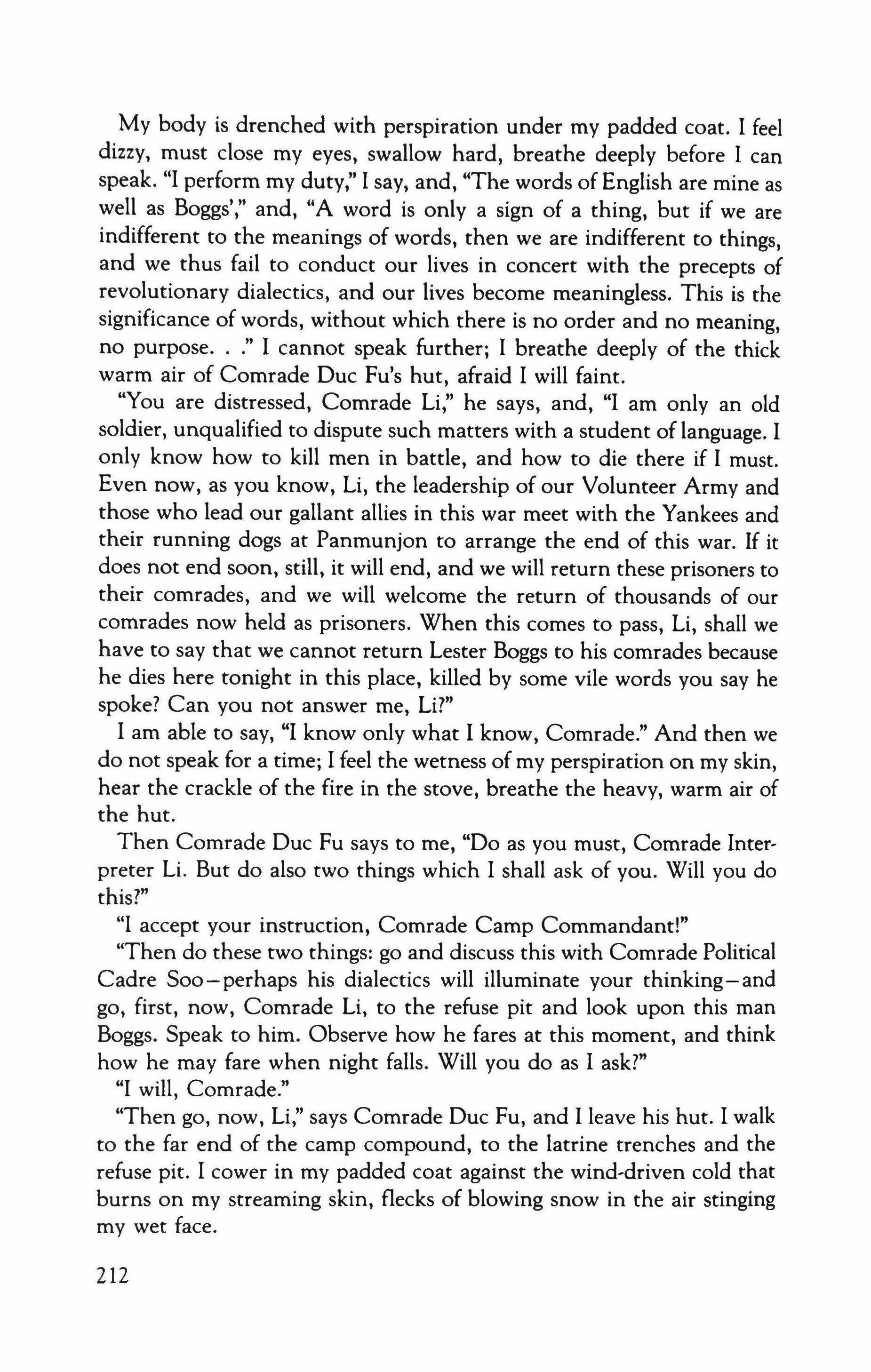
My body is drenched with perspiration under my padded coat. I feel dizzy, must close my eyes, swallow hard, breathe deeply before I can speak. "I perform my duty," I say, and, "The words of English are mine as well as Boggs'," and, "A word is only a sign of a thing, but if we are indifferent to the meanings of words, then we are indifferent to things, and we thus fail to conduct our lives in concert with the precepts of revolutionary dialectics, and our lives become meaningless. This is the significance of words, without which there is no order and no meaning, no purpose I cannot speak further; I breathe deeply of the thick warm air of Comrade Due Fu's hut, afraid I will faint.
"You are distressed, Comrade Li," he says, and, "I am only an old soldier, unqualified to dispute such matters with a student of language. I only know how to kill men in battle, and how to die there if I must. Even now, as you know, Li, the leadership of our Volunteer Army and those who lead our gallant allies in this war meet with the Yankees and their running dogs at Panmunjon to arrange the end of this war. If it does not end soon, still, it will end, and we will return these prisoners to their comrades, and we will welcome the return of thousands of our comrades now held as prisoners. When this comes to pass, Li, shall we have to say that we cannot return Lester Boggs to his comrades because he dies here tonight in this place, killed by some vile words you say he spoke? Can you not answer me, Li?"
I am able to say, "I know only what I know, Comrade." And then we do not speak for a time; I feel the wetness of my perspiration on my skin, hear the crackle of the fire in the stove, breathe the heavy, warm air of the hut.
Then Comrade Due Fu says to me, "Do as you must, Comrade Interpreter Li. But do also two things which I shall ask of you. Will you do this?"
"I accept your instruction, Comrade Camp Commandant!"
"Then do these two things: go and discuss this with Comrade Political Cadre Soo-perhaps his dialectics will illuminate your thinking-and go, first, now, Comrade Li, to the refuse pit and look upon this man Boggs. Speak to him. Observe how he fares at this moment, and think how he may fare when night falls. Will you do as I ask?"
"I will, Comrade."
"Then go, now, Li," says Comrade Duc Fu, and I leave his hut. I walk to the far end of the camp compound, to the latrine trenches and the refuse pit. I cower in my padded coat against the wind-driven cold that burns on my streaming skin, flecks of blowing snow in the air stinging my wet face.
212

I say to myself: Li, a man can survive in this cold; it is not so cold that a man will, of necessity, die!
I only feel the cold so because I have just come from the warmth of Comrade Due Fu's hut stove, and because my skin is wet with perspiration, and because I walk across the prison compound, where the wind rushes freely down from the distant mountains-in the camp's refuse pit, bound to the caisson wheel, there will be shelter from the wind. There, it is almost as if a man were in his hut, cold, but not so cold that he will, of necessity, freeze to death.
I say to myself: men survive cold. I think of the fictions ofJ. London, of the story of the man who walked across frozen wastes much colder than this wretched place, so cold the man's spittle froze solid before it hit the hard crust of snow he walked upon, and his breath frosted his beard, and large trees split open with a sound like gunfire in the cold.
I remember the story, that the man would have survived had he not stepped through thin ice over a stream, wet his feet - and still he would have survived, had he been able to build a fire to dry and warm his feet
"Boggs," I say, and, "Comrade Prisoner Boggs, it is I, Comrade Inter, preter Li. Open eyes and look at me, Boggs, I come to speak to you. How fare you, Boggs?"
"You damn sumbitch!" Boggs says, but he does not open his eyes, does not look at me.
The wind does not blow so hard down here in the refuse pit; the pit itself, and the heaped mounds of camp garbage do give shelter from the hard wind; the tiny snowflakes only drift down in the air, lightly dust the garbage mounds white, dust white the caisson wheel that is propped against a solid pile of camp garbage, dust white the form of Prisoner Lester Boggs, tied by both arms to the wheel, his legs stretched out on the littered ground that is dusted white by the tiny snowflakes that drift down out of the wind, into the refuse pit.
"Lester," I say, "it is I, Li. I inquire of your welfare. Will you not speak to me, Lester Boggs?" The stench of the nearby latrine trenches lies like a foul blanket over the refuse pit, pierces the antiseptic cold to clog my nostrils, clutch at my throat. "It is not so bad, I think, Lester," I say, "save that stink of excrement pervades, is it not so?" Lester Boggs opens his eyes.
"Why you killing me, man?" he says.
"Prescribed punishments, Lester," I say, and, "Geneva Convention," and, "Camp good orders and disciplines," and, "Are you in hurt, Lester?"
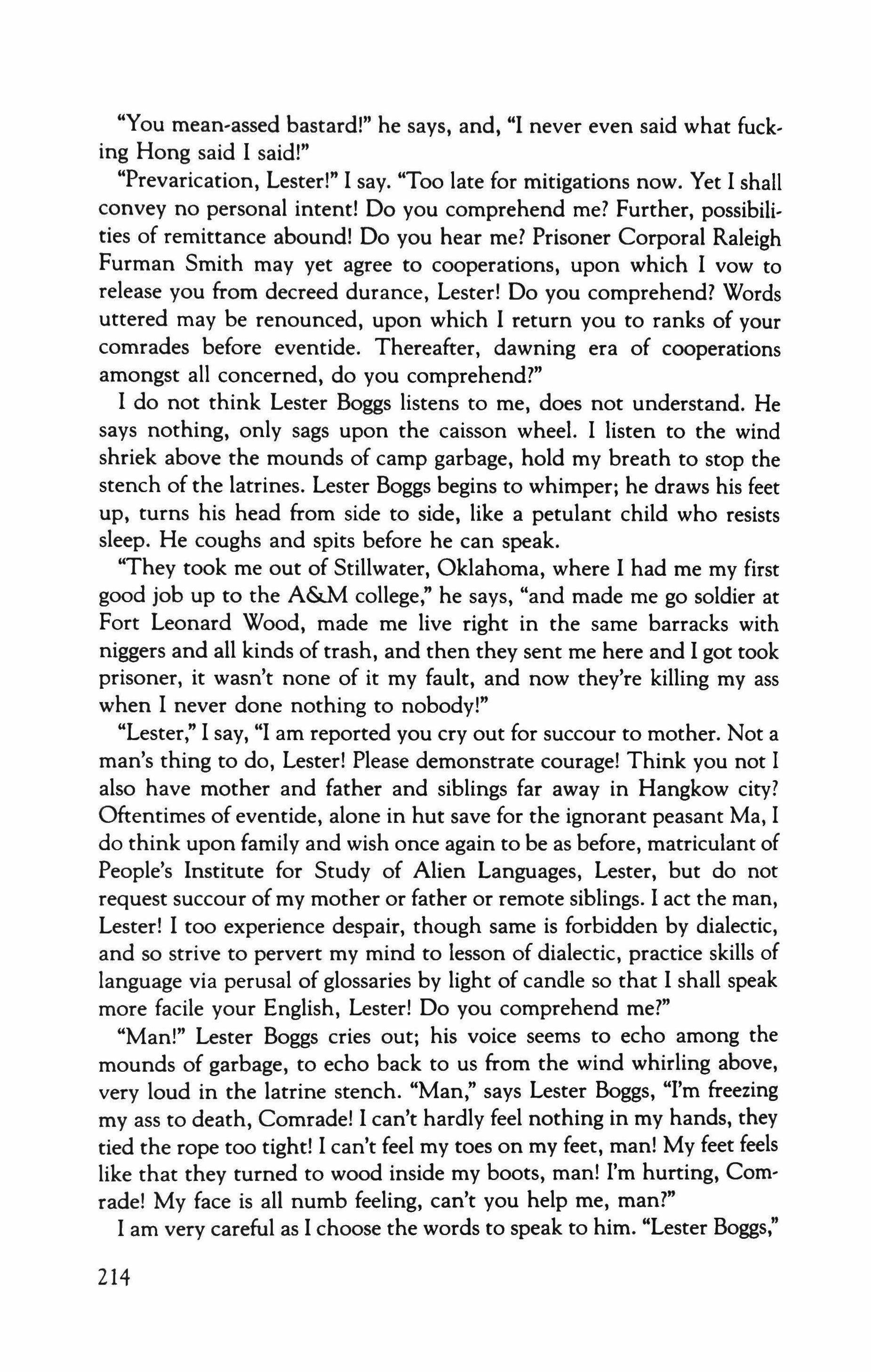
"You mean-assed bastard!" he says, and, "I never even said what fucking Hong said 1 said!"
"Prevarication, Lester!" 1 say. "Too late for mitigations now. Yet 1 shall convey no personal intent! Do you comprehend me? Further, possibilities of remittance abound! Do you hear me? Prisoner Corporal Raleigh Furman Smith may yet agree to cooperations, upon which 1 vow to release you from decreed durance, Lester! Do you comprehend? Words uttered may be renounced, upon which 1 return you to ranks of your comrades before eventide. Thereafter, dawning era of cooperations amongst all concerned, do you comprehend?"
1 do not think Lester Boggs listens to me, does not understand. He says nothing, only sags upon the caisson wheel. 1 listen to the wind shriek above the mounds of camp garbage, hold my breath to stop the stench of the latrines. Lester Boggs begins to whimper; he draws his feet up, turns his head from side to side, like a petulant child who resists sleep. He coughs and spits before he can speak.
"They took me out of Stillwater, Oklahoma, where 1 had me my first good job up to the A&M college," he says, "and made me go soldier at Fort Leonard Wood, made me live right in the same barracks with niggers and all kinds of trash, and then they sent me here and 1 got took prisoner, it wasn't none of it my fault, and now they're killing my ass when 1 never done nothing to nobody!"
"Lester," 1 say, "I am reported you cry out for succour to mother. Not a man's thing to do, Lester! Please demonstrate courage! Think you not I also have mother and father and siblings far away in Hangkow city? Oftentimes of eventide, alone in hut save for the ignorant peasant Ma, I do think upon family and wish once again to be as before, matriculant of People's Institute for Study of Alien Languages, Lester, but do not request succour of my mother or father or remote siblings. I act the man, Lester! 1 too experience despair, though same is forbidden by dialectic, and so strive to pervert my mind to lesson of dialectic, practice skills of language via perusal of glossaries by light of candle so that I shall speak more facile your English, Lester! Do you comprehend me?"
"Man!" Lester Boggs cries out; his voice seems to echo among the mounds of garbage, to echo back to us from the wind whirling above, very loud in the latrine stench. "Man," says Lester Boggs, "I'm freezing my ass to death, Comrade! 1 can't hardly feel nothing in my hands, they tied the rope too tight! I can't feel my toes on my feet, man! My feet feels like that they turned to wood inside my boots, man! I'm hurting, Comrade! My face is all numb feeling, can't you help me, man?"
I am very careful as I choose the words to speak to him. "Lester Boggs,"
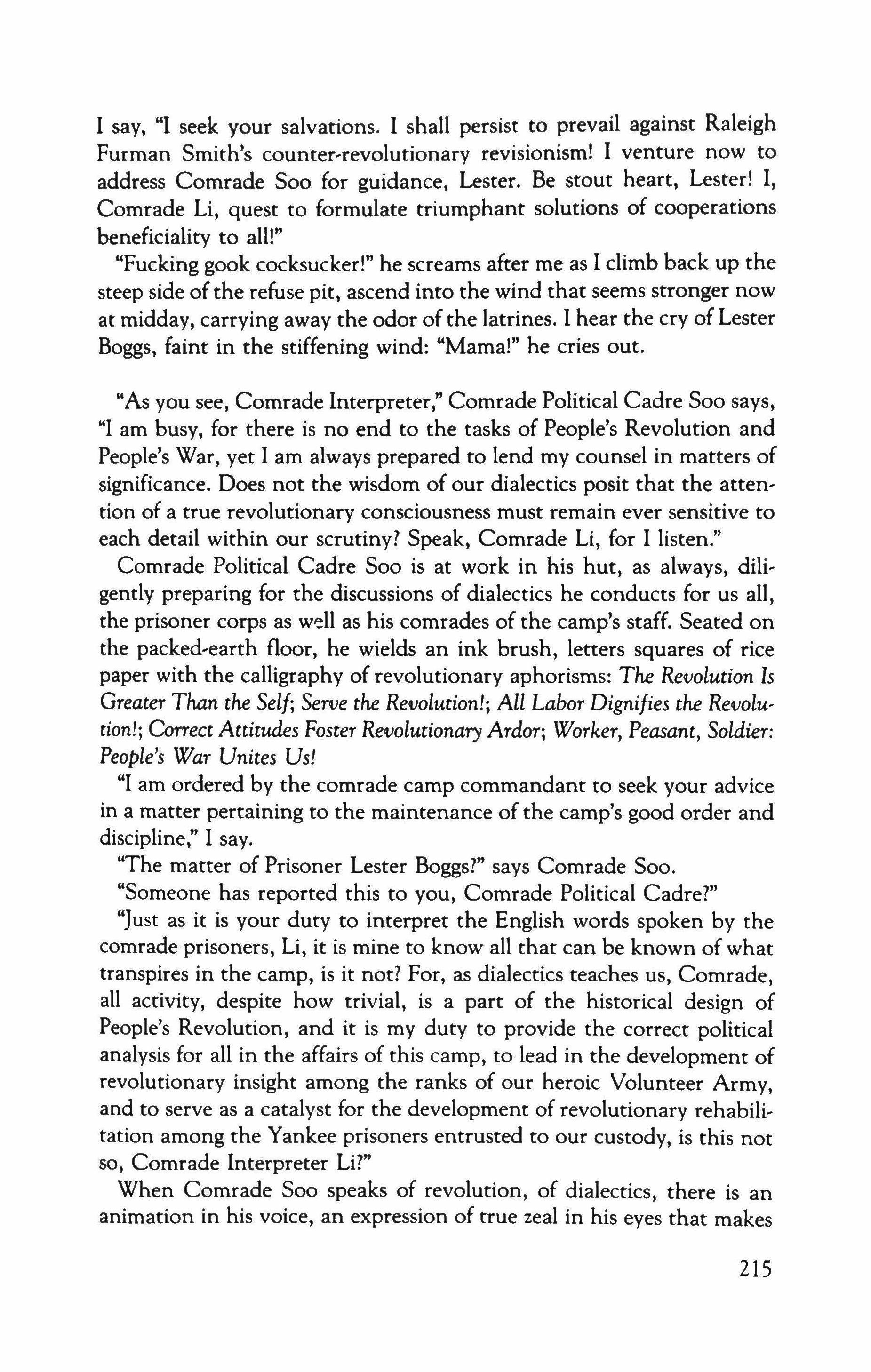
I say, "I seek your salvations. I shall persist to prevail against Raleigh Furman Smith's counter-revolutionary revisionism! I venture now to address Comrade Soo for guidance, Lester. Be stout heart, Lester! I, Comrade Li, quest to formulate triumphant solutions of cooperations beneficiality to all!"
"Fucking gook cocksucker!" he screams after me as I climb back up the steep side ofthe refuse pit, ascend into the wind that seems stronger now at midday, carrying away the odor of the latrines. I hear the cry of Lester Boggs, faint in the stiffening wind: "Mama!" he cries out.
"As you see, Comrade Interpreter," Comrade Political Cadre Soo says, "1 am busy, for there is no end to the tasks of People's Revolution and People's War, yet I am always prepared to lend my counsel in matters of significance. Does not the wisdom of our dialectics posit that the attention of a true revolutionary consciousness must remain ever sensitive to each detail within our scrutiny? Speak, Comrade Li, for I listen."
Comrade Political Cadre Soo is at work in his hut, as always, diligently preparing for the discussions of dialectics he conducts for us all, the prisoner corps as well as his comrades of the camp's staff. Seated on the packed-earth floor, he wields an ink brush, letters squares of rice paper with the calligraphy of revolutionary aphorisms: The Revolution Is Greater Than the Self; Serve the Revolution!; All Labor Dignifies the Revolu, tion!; Correct Attitudes Foster Revolutionary Ardor; Worker, Peasant, Soldier: People's War Unites Us!
"I am ordered by the comrade camp commandant to seek your advice in a matter pertaining to the maintenance of the camp's good order and discipline," 1 say.
"The matter of Prisoner Lester Boggs?" says Comrade Soo.
"Someone has reported this to you, Comrade Political Cadre?"
"Just as it is your duty to interpret the English words spoken by the comrade prisoners, Li, it is mine to know all that can be known of what transpires in the camp, is it not? For, as dialectics teaches us, Comrade, all activity, despite how trivial, is a part of the historical design of People's Revolution, and it is my duty to provide the correct political analysis for all in the affairs of this camp, to lead in the development of revolutionary insight among the ranks of our heroic Volunteer Army, and to serve as a catalyst for the development of revolutionary rehabilitation among the Yankee prisoners entrusted to our custody, is this not so, Comrade Interpreter Li?"
When Comrade Soo speaks of revolution, of dialectics, there is an animation in his voice, an expression of true zeal in his eyes that makes

me forget the cold that grips my flesh; his words obliterate the whistling wind that buffets the thin walls of his hut - the integrity of his vision, the firm conviction of his belief, are like an armor he never ceases to wear, protecting him against the elements of weather, the spectres of doubt and confusion that assail me in this wretched place. I have only the words of English that I love, my Mandarin, the fragile beauty of literature.
I can only wish sometimes that I were such a man as Comrade Soo, or even Comrade Due Fu - the duties of ideologists and soldiers are always clear; the meanings of words, even in my graceful Mandarin, seem sometimes to me so shifting and insubstantial, like powdery snow driven into the fluid shapes of drifts by winter wind.
"I do not think the matter is trivial, Comrade."
"I quite agree, Comrade," he says, "it is not a trivial matter. But you perhaps do not discern the true nature of its import."
"There is the possibility that a man may die of the punishment I decreed, Comrade," I say to him.
"You are mistaken, Comrade Interpreter," he says, and, before I can speak, "It is true that Prisoner Boggs may well perish of the cold in the refuse pit this night. Rather, it is a certainty he will freeze to death, Comrade. But this is as nothing against the threat that exists to the revolutionary solidarity of our ranks! It is regrettable if a prisoner should die, Comrade Li, but it might prove fatal to the cause of People's War if you are set against-or set yourself against-the comrade guard-escorts,"
"Comrade Hong has spoken with you!" I say.
"It was his duty to do so," says Comrade Soo, "and I commended him for reporting this incident to me. It is precisely matters such as this that I am pledged to confront and resolve!"
"Comrade Hong was insolent," I say, and, "He attempts to interfere with my authority," and, "I have already begun to take measures that will resolve the problem!"
"Softly, Li!" says Comrade Soo. "Correct analysis requires a head clear and free of the belly's subjective emotions. Will you listen and be guided by me?" he asks.
"That is my duty."
"Listen, then, Comrade Li, Comrade Hong accuses you of favoritism on behalf of the Negro prisoners-"
"This is a lie!" I interrupt, but Comrade Soo does not stop to hear me.
"-the truth of which complaint is of no consequence. Be silent, please! What is true is that Comrade Hong and his comrades perceive it to be true. Our first imperative is to maintain solidarity with our own

comrades. Thereafter, we may address the rehabilitation of the prisoner corps. Thus, it is clear that you must heal this breach between yourself and Comrade Hong."
"Comrade," I say quickly, "I have already begun to do so!"
"In what fashion, Comrade Interpreter?"
"I have spoken with the prisoner Raleigh Furman Smith, who is esteemed by his Negro comrades as a leader, and whose model they emulate."
"Prisoner Smith is known to me, Comrade," says Comrade Soo, and, "He is a counter-revolutionary influence in this camp, ridden with the disease of fascist racist factionalism, as revisionist as this Boggs who expires in the refuse pit even as we talk here in my hut! Have we not both noted how he resists the discussions of dialectics? Is he not a sullen, obstructionist personality? Is he not the very man Comrade Hong complains you favor by failing to punish his filthy speech?"
"I do not spare him out of favoritism, Comrade Soo," I say, and, "Raleigh Furman Smith and his Negro comrades escape punishment so often only because my English is not adequate to the precise translation of the argot they speak. Though I was called away from my course of study at the People's Institute for Study of Alien Languages, I continue to peruse my English glossaries, and to read in the tradition of their literature, in the hope that my skills will improve, that I will be able to understand their obscure obscenities, and thus render punishments just to all, 1-"
"Bourgeois prattle, Comrade Interpreter!" Comrade Soo says, and he rises from the floor, steps away from his brush and ink pot and squares of rice paper lettered with the calligraphy of revolutionary aphorisms; he faces me to deliver his lecture.
"U," he says, "you are a young man of much promise. And you occupy a position of serious responsibility here. You may perhaps think of yourself only as a student of language-"
"I pledge my skills to the struggle of People's War," I say, but he does not hear me, continues to speak.
"- and though Comrade Hong may think you arrogant and unfit to be entrusted with the discipline of the comrade prisoners, and Camp Commandant Due Fu respects only soldiers, whose struggle takes place in the heat of battle, I, Soo, Political Cadre Officer of Prisoner Cornpound Number Nineteen, say to you that your role as camp interpreter is of equal importance to the function of the comrade guard-escorts, or Comrade Due Fu's, or even to the role of our valiant soldiers of the heroic Volunteer Army who face the enemy on the battlefield!"
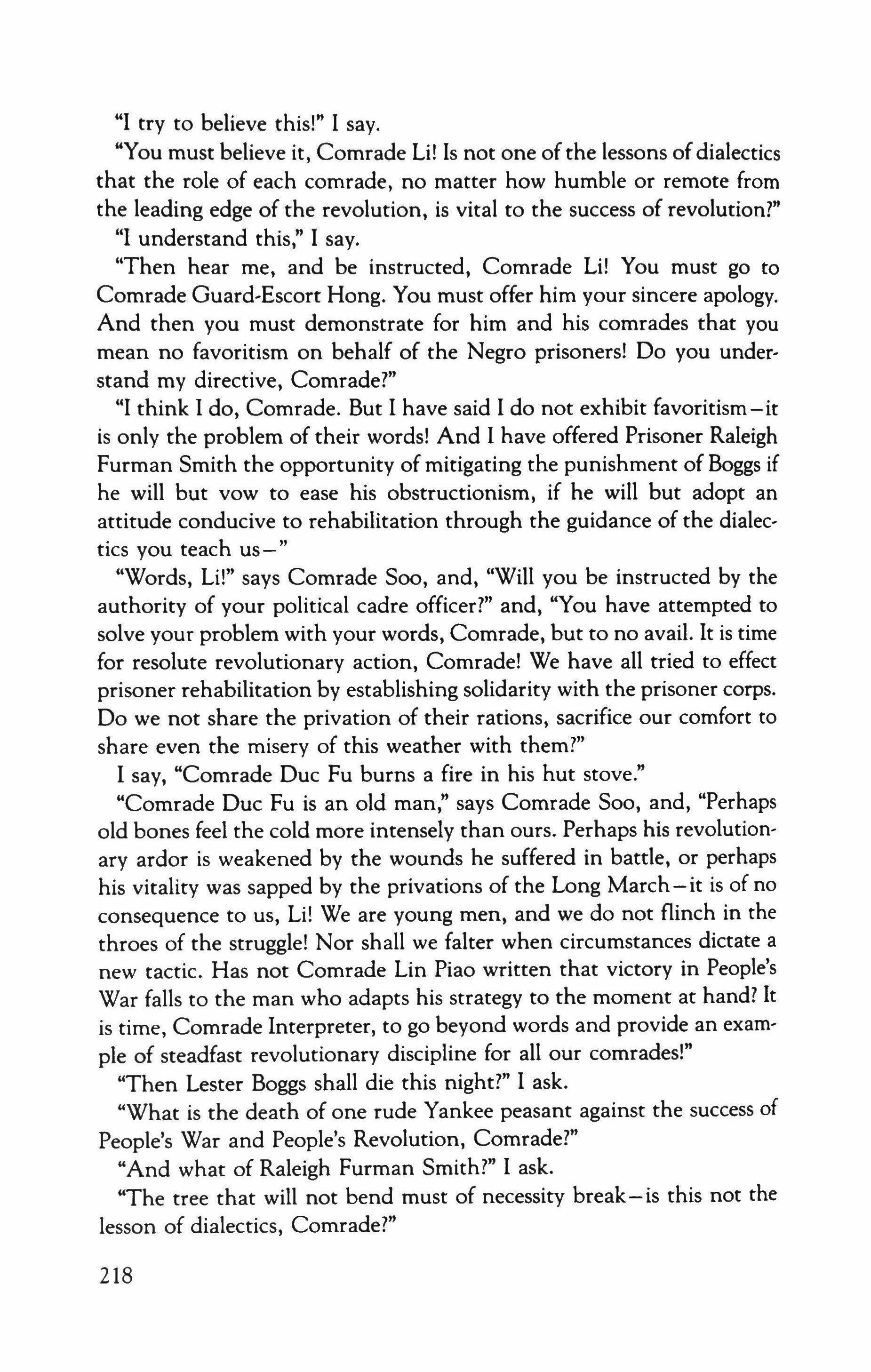
"I try to believe this!" I say.
"You must believe it, Comrade Li! Is not one of the lessons ofdialectics that the role of each comrade, no matter how humble or remote from the leading edge of the revolution, is vital to the success of revolution?"
"I understand this," I say.
"Then hear me, and be instructed, Comrade Li! You must go to Comrade Guard-Escort Hong. You must offer him your sincere apology. And then you must demonstrate for him and his comrades that you mean no favoritism on behalf of the Negro prisoners! Do you under, stand my directive, Comrade?"
"I think I do, Comrade. But I have said I do not exhibit favoritism - it is only the problem of their words! And I have offered Prisoner Raleigh Furman Smith the opportunity of mitigating the punishment of Boggs if he will but vow to ease his obstructionism, if he will but adopt an attitude conducive to rehabilitation through the guidance of the dialectics you teach us-"
"Words, Li!" says Comrade Soo, and, "Will you be instructed by the authority of your political cadre officer?" and, "You have attempted to solve your problem with your words, Comrade, but to no avail. It is time for resolute revolutionary action, Comrade! We have all tried to effect prisoner rehabilitation by establishing solidarity with the prisoner corps. Do we not share the privation of their rations, sacrifice our comfort to share even the misery of this weather with them?"
I say, "Comrade Due Fu burns a fire in his hut stove."
"Comrade Due Fu is an old man," says Comrade Soo, and, "Perhaps old bones feel the cold more intensely than ours. Perhaps his revolution, ary ardor is weakened by the wounds he suffered in battle, or perhaps his vitality was sapped by the privations of the Long March-it is of no consequence to us, Li! We are young men, and we do not flinch in the throes of the struggle! Nor shall we falter when circumstances dictate a new tactic. Has not Comrade Lin Piao written that victory in People's War falls to the man who adapts his strategy to the moment at hand? It is time, Comrade Interpreter, to go beyond words and provide an exam, ple of steadfast revolutionary discipline for all our comrades!"
"Then Lester Boggs shall die this night?" I ask.
"What is the death of one rude Yankee peasant against the success of People's War and People's Revolution, Comrade?"
"And what of Raleigh Furman Smith?" I ask.
"The tree that will not bend must of necessity break - is this not the lesson of dialectics, Comrade?"
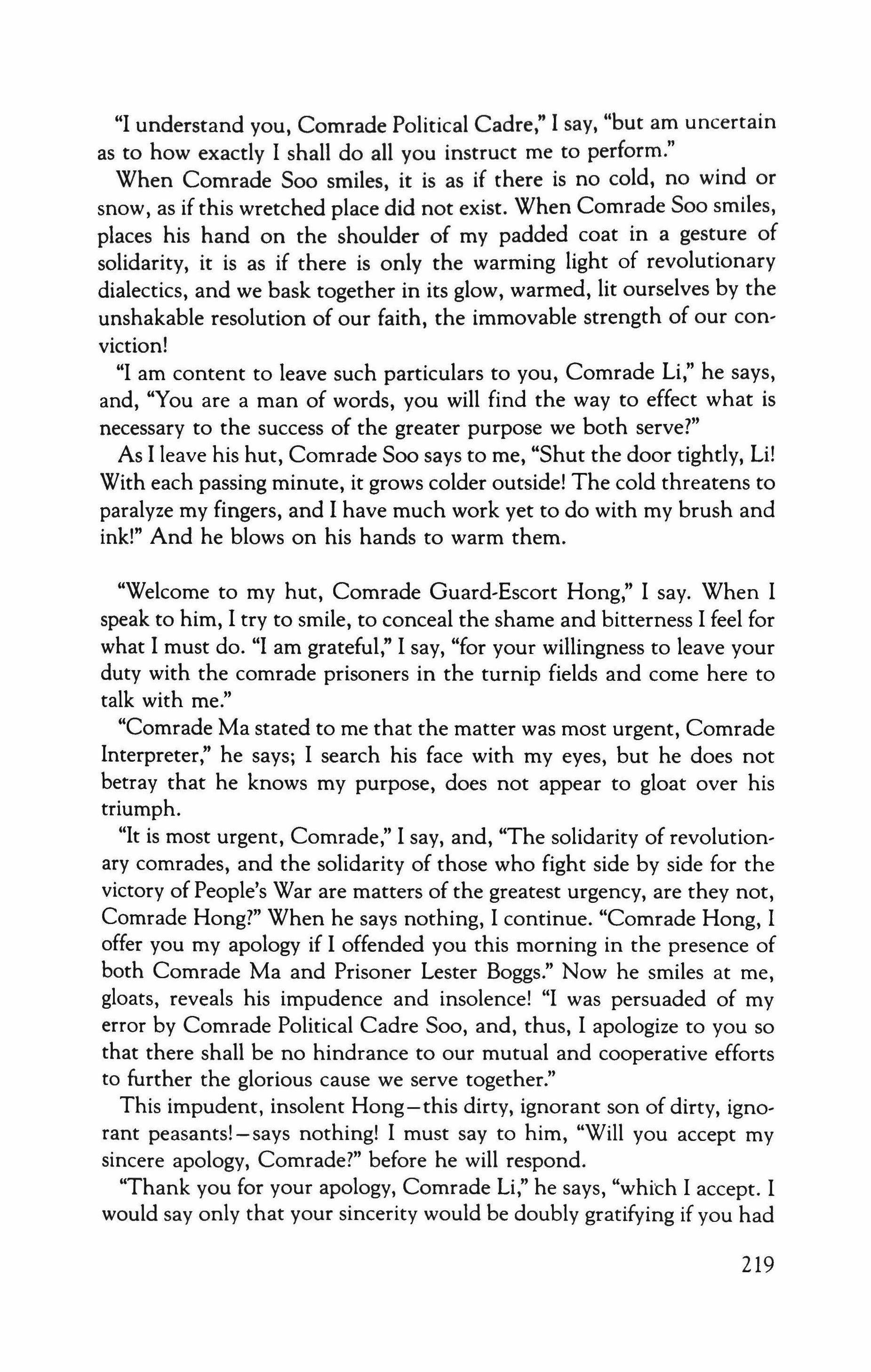
"I understand you, Comrade Political Cadre," I say, "but am uncertain as to how exactly I shall do all you instruct me to perform."
When Comrade Soo smiles, it is as if there is no cold, no wind or snow, as if this wretched place did not exist. When Comrade Soo smiles, places his hand on the shoulder of my padded coat in a gesture of solidarity, it is as if there is only the warming light of revolutionary dialectics, and we bask together in its glow, warmed, lit ourselves by the unshakable resolution of our faith, the immovable strength of our conviction!
"I am content to leave such particulars to you, Comrade Li," he says, and, "You are a man of words, you will find the way to effect what is necessary to the success of the greater purpose we both serve?"
As I leave his hut, Comrade Soo says to me, "Shut the door tightly, Li! With each passing minute, it grows colder outside! The cold threatens to paralyze my fingers, and I have much work yet to do with my brush and ink!" And he blows on his hands to warm them.
"Welcome to my hut, Comrade Guard-Escort Hong," I say. When I speak to him, I try to smile, to conceal the shame and bitterness I feel for what I must do. "I am grateful," I say, "for your willingness to leave your duty with the comrade prisoners in the turnip fields and come here to talk with me."
"Comrade Ma stated to me that the matter was most urgent, Comrade Interpreter," he says; I search his face with my eyes, but he does not betray that he knows my purpose, does not appear to gloat over his triumph.
"It is most urgent, Comrade," I say, and, "The solidarity of revolutionary comrades, and the solidarity of those who fight side by side for the victory of People's War are matters of the greatest urgency, are they not, Comrade Hong?" When he says nothing, I continue. "Comrade Hong, I offer you my apology if I offended you this morning in the presence of both Comrade Ma and Prisoner Lester Boggs." Now he smiles at me, gloats, reveals his impudence and insolence! "I was persuaded of my error by Comrade Political Cadre Soo, and, thus, I apologize to you so that there shall be no hindrance to our mutual and cooperative efforts to further the glorious cause we serve together."
This impudent, insolent Hong-this dirty, ignorant son of dirty, ignorant peasants!-says nothing! I must say to him, "Will you accept my sincere apology, Comrade?" before he will respond.
"Thank you for your apology, Comrade Li," he says, "which I accept. I would say only that your sincerity would be doubly gratifying if you had

allowed Comrade Ma to remain here in the hut with us to witness your words."
I do not allow my face to express what I feel! I shall do what I must, bear such impudent insolence as I must at the hands of this filthy, uncultured peasant! I look without expression into his eyes, swallow: moisten my lips before I can speak.
"I agree," I tell him, "but you must know my purpose in sending him away when he returned with you from the turnip fields, Comrade. If my sincere apology is accepted -" I begin.
"It is accepted, Comrade Interpreter," he says.
- then I would speak to you of another matter, one I wish Ma to remain ignorant of, one pertaining to the duties we perform here in service to the cause of People's War. I request your cooperation in a matter pertaining to one of the comrade prisoners, Hong."
"In the revolutionary spirit of solidarity," says this damnable Hong, "I extend my full cooperation in any matter of duty, Comrade Li!" Oh, he smiles broadly at me now! "Which of the comrade prisoners do you refer to, Comrade?" he says.
"Prisoner Corporal Raleigh Furman Smith, the Negro." Now his smile is all but a disgusting laugh! And he grins at me, waits for me to continue! "Comrade Prisoner Smith," I say, "is a destructive and obstructionist counter-revolutionary influence in this camp, with regard to his Negro comrades, who follow him in resisting the instruction in dialectics offered for their enlightenment by Comrade Soo, and also with regard to the fascist racist factionalism that impedes the creation of revolutionary solidarity between the Caucasian prisoners and the Negroes." My lips are dry, my tongue hot and sore, my throat parched when I finish uttering these words!
"That is as I have always said to you, Comrade," he says, and, "What shall you require of me?" I fear I will be unable to speak the words, but I am able to speak, and my voice is clear and loud in the chill of my hut, as if the matter were of no more than routine significance.
"I would chastise Prisoner Raleigh Furman Smith. For this, I require a pretext to decree his punishment. I ask that you bring him to me here when the prisoner corps is escorted back to the compound from their work in the turnip fields. I ask that you report to me that he has violated the tenets of the Geneva Convention by uttering to you a vile expression in English, contrary to the camp's good order and discipline. I will then punish him for this infraction." When I have said this, I wonder that I was able to do so, that I am not dizzy, that perspiration does not
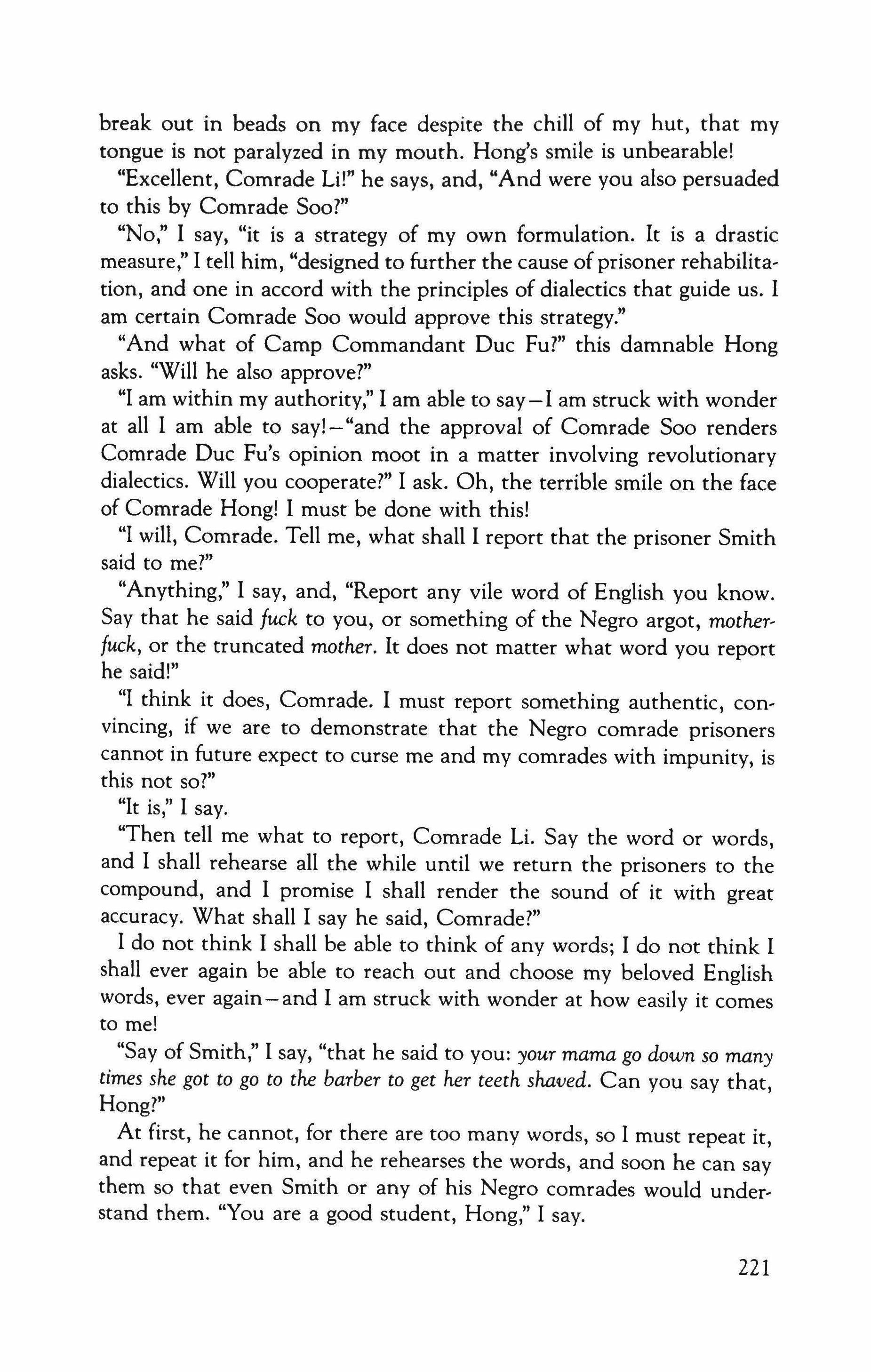
break out in beads on my face despite the chill of my hut, that my tongue is not paralyzed in my mouth. Hong's smile is unbearable!
"Excellent, Comrade Lil" he says, and, "And were you also persuaded to this by Comrade Soo?"
"No," I say, "it is a strategy of my own formulation. It is a drastic measure," I tell him, "designed to further the cause of prisoner rehabilitation, and one in accord with the principles of dialectics that guide us. I am certain Comrade Soo would approve this strategy."
"And what of Camp Commandant Due Fu?" this damnable Hong asks. "Will he also approve?"
"I am within my authority," I am able to say - I am struck with wonder at all I am able to say! - "and the approval of Comrade Soo renders Comrade Due Fu's opinion moot in a matter involving revolutionary dialectics. Will you cooperate?" I ask. Oh, the terrible smile on the face of Comrade Hong! I must be done with this!
"1 will, Comrade. Tell me, what shall I report that the prisoner Smith said to me?"
"Anything," I say, and, "Report any vile word of English you know. Say that he said fuck to you, or something of the Negro argot, motherfuck, or the truncated mother. It does not matter what word you report he said!"
"1 think it does, Comrade. I must report something authentic, convincing, if we are to demonstrate that the Negro comrade prisoners cannot in future expect to curse me and my comrades with impunity, is this not so?"
"It is," I say.
"Then tell me what to report, Comrade Li. Say the word or words, and I shall rehearse all the while until we return the prisoners to the compound, and I promise I shall render the sound of it with great accuracy. What shall I say he said, Comrade?"
I do not think I shall be able to think of any words; I do not think I shall ever again be able to reach out and choose my beloved English words, ever again-and I am struck with wonder at how easily it comes to me!
"Say of Smith," I say, "that he said to you: your mama go down so many times she got to go to the barber to get her teeth shaved. Can you say that, Hong?"
At first, he cannot, for there are too many words, so I must repeat it, and repeat it for him, and he rehearses the words, and soon he can say them so that even Smith or any of his Negro comrades would understand them. "You are a good student, Hong," I say.
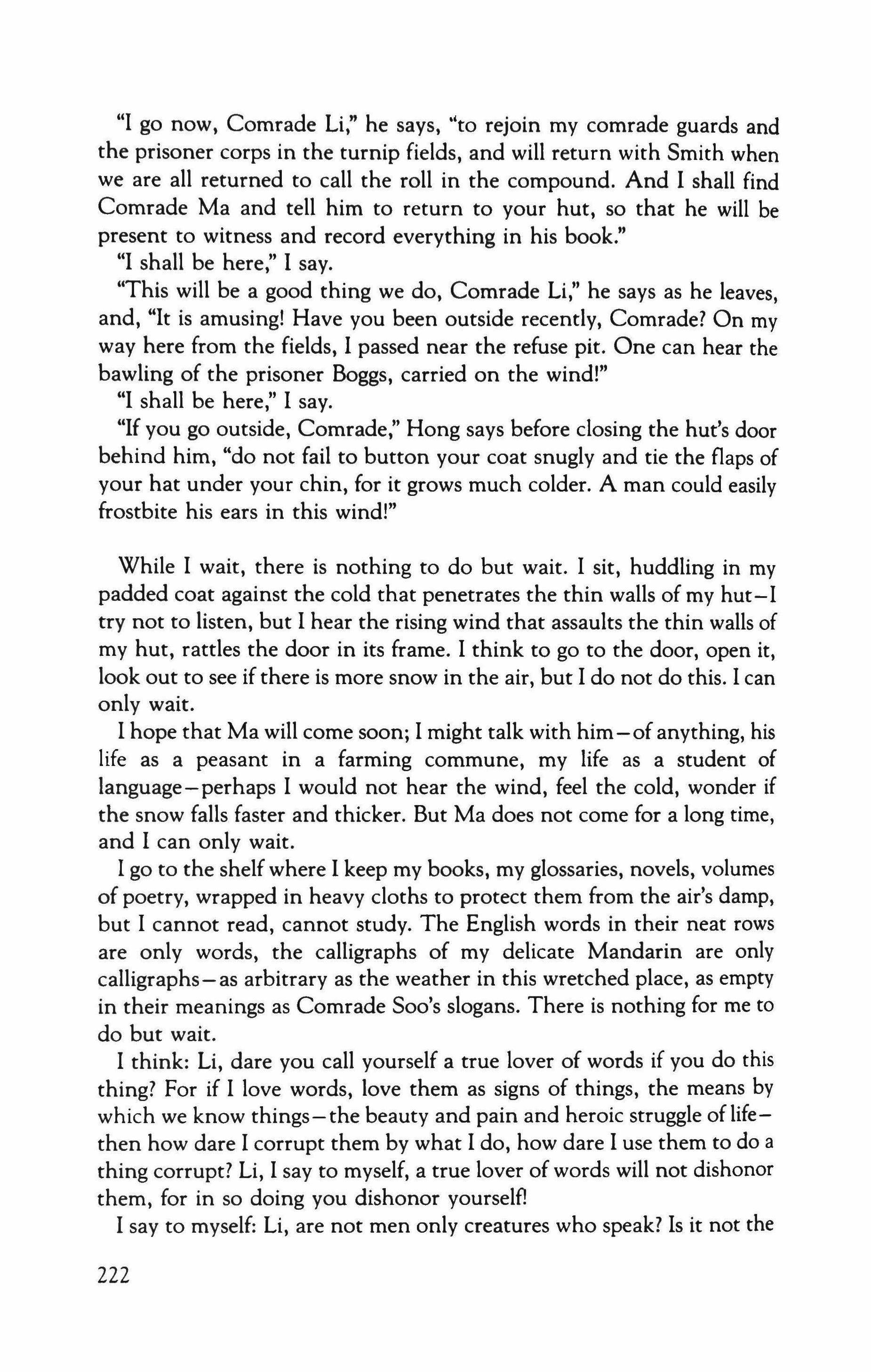
"I go now, Comrade Li," he says, "to rejoin my comrade guards and the prisoner corps in the turnip fields, and will return with Smith when we are all returned to call the roll in the compound. And I shall find Comrade Ma and tell him to return to your hut, so that he will be present to witness and record everything in his book."
"I shall be here," I say.
"This will be a good thing we do, Comrade Li," he says as he leaves, and, "It is amusing! Have you been outside recently, Comrade? On my way here from the fields, I passed near the refuse pit. One can hear the bawling of the prisoner Boggs, carried on the wind!"
"I shall be here," I say.
"If you go outside, Comrade," Hong says before closing the hut's door behind him, "do not fail to button your coat snugly and tie the flaps of your hat under your chin, for it grows much colder. A man could easily frostbite his ears in this wind!"
While I wait, there is nothing to do but wait. I sit, huddling in my padded coat against the cold that penetrates the thin walls of my hut-I try not to listen, but I hear the rising wind that assaults the thin walls of my hut, rattles the door in its frame. I think to go to the door, open it, look out to see if there is more snow in the air, but I do not do this. I can only wait.
I hope that Ma will come soon; I might talk with him-of anything, his life as a peasant in a farming commune, my life as a student of language-perhaps I would not hear the wind, feel the cold, wonder if the snow falls faster and thicker. But Ma does not come for a long time, and I can only wait.
I go to the shelf where I keep my books, my glossaries, novels, volumes of poetry, wrapped in heavy cloths to protect them from the air's damp, but I cannot read, cannot study. The English words in their neat rows are only words, the calligraphs of my delicate Mandarin are only calligraphs-as arbitrary as the weather in this wretched place, as empty in their meanings as Comrade Soo's slogans. There is nothing for me to do but wait.
I think: Li, dare you call yourself a true lover of words if you do this thing? For if I love words, love them as signs of things, the means by which we know things-the beauty and pain and heroic struggle of lifethen how dare I corrupt them by what I do, how dare I use them to do a thing corrupt? Li, I say to myself, a true lover of words will not dishonor them, for in so doing you dishonor yourself
I say to myself: Li, are not men only creatures who speak? Is it not the
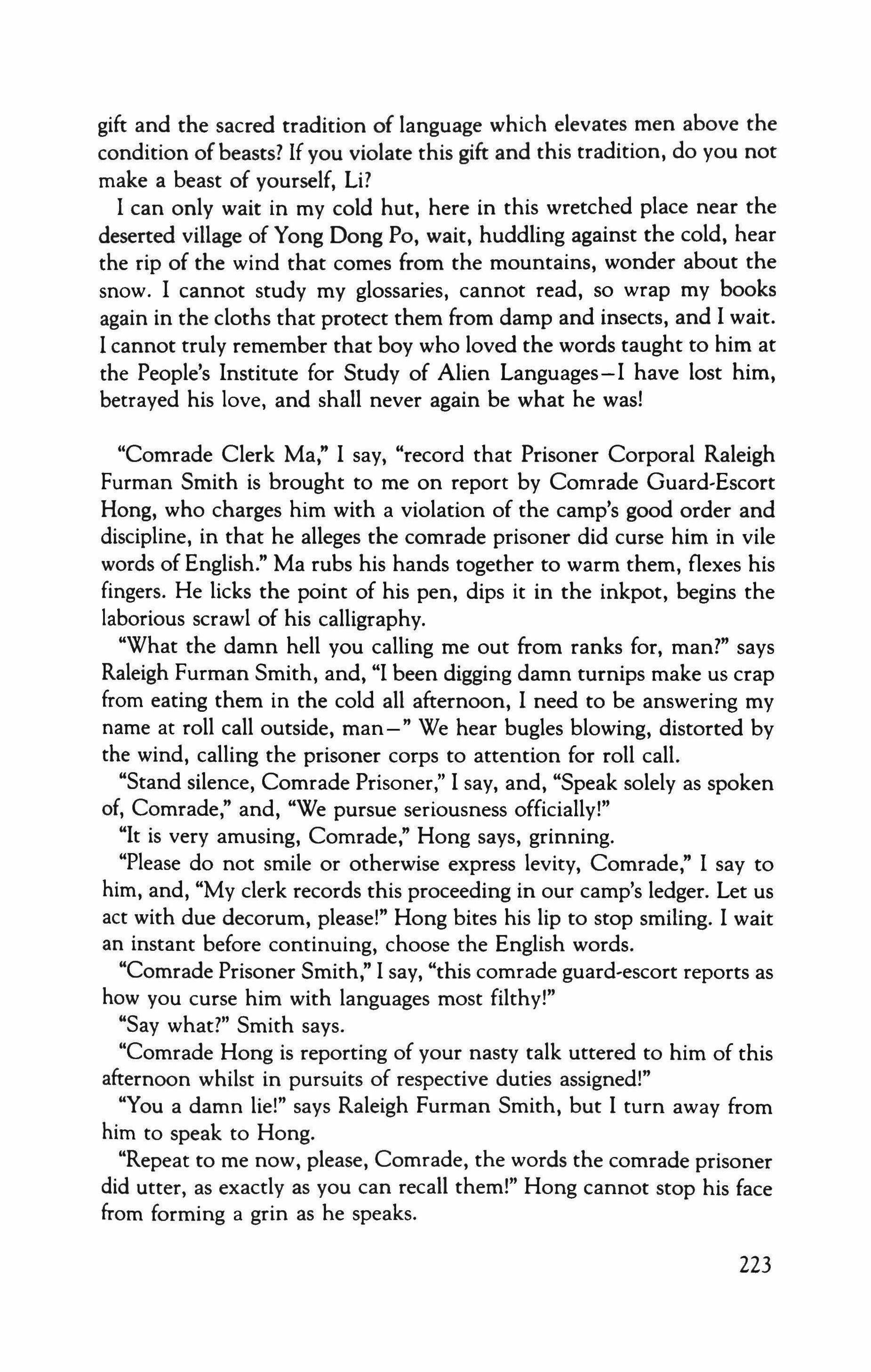
gift and the sacred tradition of language which elevates men above the condition ofbeasts? If you violate this gift and this tradition, do you not make a beast of yourself, Li?
I can only wait in my cold hut, here in this wretched place near the deserted village of Yong Dong Po, wait, huddling against the cold, hear the rip of the wind that comes from the mountains, wonder about the snow. I cannot study my glossaries, cannot read, so wrap my books again in the cloths that protect them from damp and insects, and I wait. I cannot truly remember that boy who loved the words taught to him at the People's Institute for Study of Alien Languages-I have lost him, betrayed his love, and shall never again be what he was!
"Comrade Clerk Ma," I say, "record that Prisoner Corporal Raleigh Furman Smith is brought to me on report by Comrade Guard-Escort Hong, who charges him with a violation of the camp's good order and discipline, in that he alleges the comrade prisoner did curse him in vile words of English." Ma rubs his hands together to warm them, flexes his fingers. He licks the point of his pen, dips it in the inkpot, begins the laborious scrawl of his calligraphy.
"What the damn hell you calling me out from ranks for, man?" says Raleigh Furman Smith, and, "I been digging damn turnips make us crap from eating them in the cold all afternoon, I need to be answering my name at roll call outside, man -" We hear bugles blowing, distorted by the wind, calling the prisoner corps to attention for roll call.
"Stand silence, Comrade Prisoner," I say, and, "Speak solely as spoken of, Comrade," and, "We pursue seriousness officially!"
"It is very amusing, Comrade," Hong says, grinning.
"Please do not smile or otherwise express levity, Comrade," I say to him, and, "My clerk records this proceeding in our camp's ledger. Let us act with due decorum, please!" Hong bites his lip to stop smiling. I wait an instant before continuing, choose the English words.
"Comrade Prisoner Smith," I say, "this comrade guard-escort reports as how you curse him with languages most filthy!"
"Say what?" Smith says.
"Comrade Hong is reporting of your nasty talk uttered to him of this afternoon whilst in pursuits of respective duties assigned!"
"You a damn lie!" says Raleigh Furman Smith, but I turn away from him to speak to Hong.
"Repeat to me now, please, Comrade, the words the comrade prisoner did utter, as exactly as you can recall them!" Hong cannot stop his face from forming a grin as he speaks.
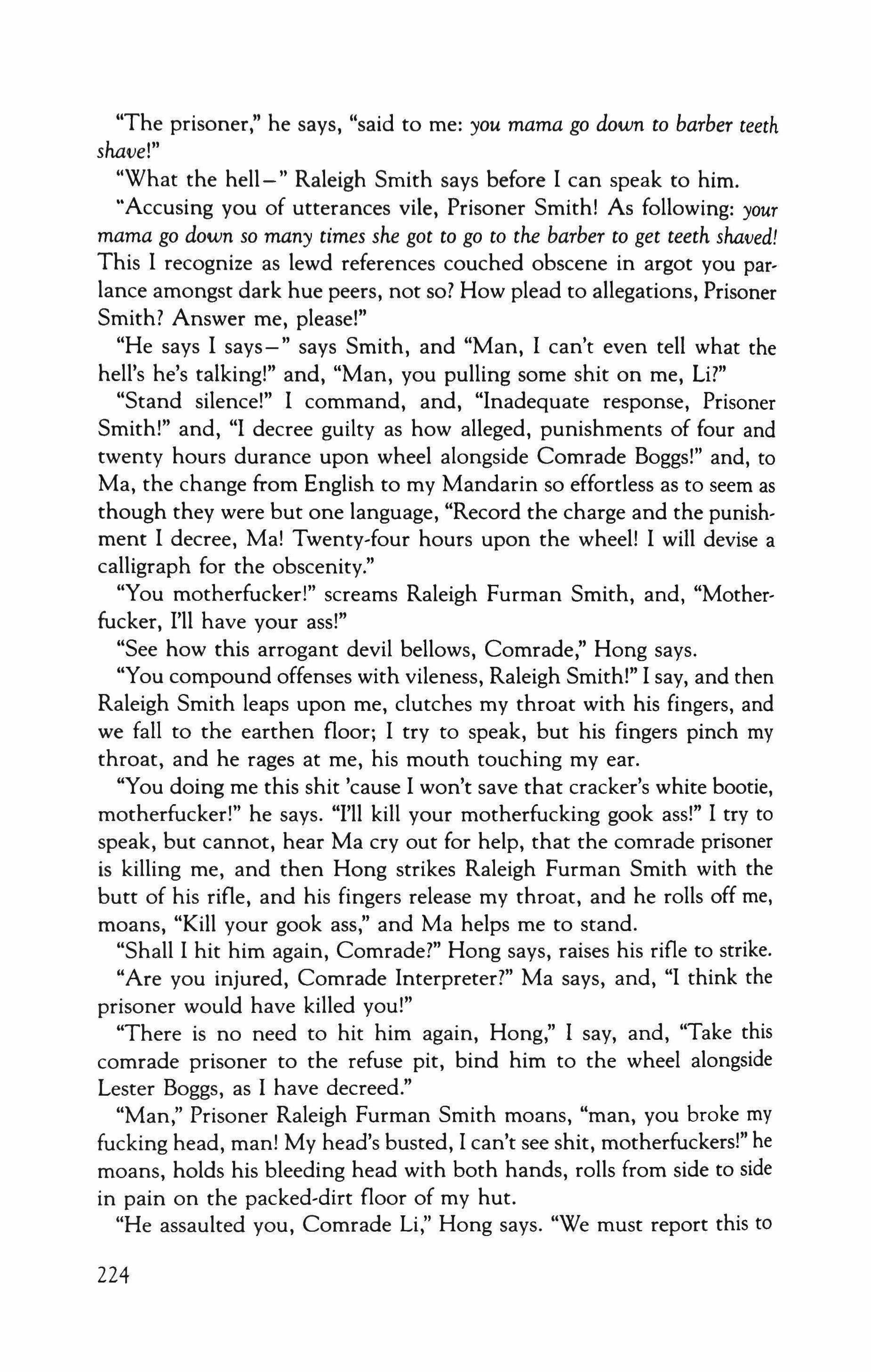
"The prisoner," he says, "said to me: you mama go down to barber teeth shave!"
"What the hell-" Raleigh Smith says before I can speak to him.
"Accusing you of utterances vile, Prisoner Smith! As following: your mama go down so many times she got to go to the barber to get teeth shaved! This I recognize as lewd references couched obscene in argot you parlance amongst dark hue peers, not so? How plead to allegations, Prisoner Smith? Answer me, please!"
"He says I says-" says Smith, and "Man, I can't even tell what the hell's he's talking!" and, "Man, you pulling some shit on me, Li?"
"Stand silence!" I command, and, "Inadequate response, Prisoner Smith!" and, "I decree guilty as how alleged, punishments of four and twenty hours durance upon wheel alongside Comrade Boggs!" and, to Ma, the change from English to my Mandarin so effortless as to seem as though they were but one language, "Record the charge and the punishment I decree, Ma! Twenty-four hours upon the wheel! I will devise a calligraph for the obscenity."
"You motherfucker!" screams Raleigh Furman Smith, and, "Motherfucker, I'll have your ass!"
"See how this arrogant devil bellows, Comrade," Hong says.
"You compound offenses with vileness, Raleigh Smith!" I say, and then Raleigh Smith leaps upon me, clutches my throat with his fingers, and we fall to the earthen floor; I try to speak, but his fingers pinch my throat, and he rages at me, his mouth touching my ear.
"You doing me this shit 'cause I won't save that cracker's white bootie, motherfucker!" he says. "I'll kill your motherfucking gook ass!" I try to speak, but cannot, hear Ma cry out for help, that the comrade prisoner is killing me, and then Hong strikes Raleigh Furman Smith with the butt of his rifle, and his fingers release my throat, and he rolls off me, moans, "Kill your gook ass," and Ma helps me to stand.
"Shall I hit him again, Comrade?" Hong says, raises his rifle to strike.
"Are you injured, Comrade Interpreter?" Ma says, and, "I think the prisoner would have killed you!"
"There is no need to hit him again, Hong," I say, and, "Take this comrade prisoner to the refuse pit, bind him to the wheel alongside Lester Boggs, as I have decreed."
"Man," Prisoner Raleigh Furman Smith moans, "man, you broke my fucking head, man! My head's busted, I can't see shit, motherfuckers!" he moans, holds his bleeding head with both hands, rolls from side to side in pain on the packed-dirt floor of my hut.
"He assaulted you, Comrade Li," Hong says. "We must report this to

the comrade camp commandant. We shall have him beaten for this! He should be executed for this!"
"Are you not hurt, Comrade Interpreter?" Ma is saying.
"There is no need," I tell Hong. "He will die there in the refuse pit with Lester Boggs. Help the prisoner to his feet, Comrade Hong. Escort him now to the refuse pit. Do as I ask, please. We have done what we said we would do."
"Stand up, Yankee devil!" Hong shouts, jerks Raleigh Furman Smith to his feet. Raleigh Smith cannot stand straight, holds his bleeding head with both hands. "I shall take him to the refuse pit, Comrade," Hong says. "I shall escort him past the ranks of the prisoners gathered for roll call, and they will see his bloody face and hear him cry with pain, and there will be no more cursing of me and my comrades by the Yankee prisoners, not the dark devils or the light shall dare curse us in their stupid language when they know both he and Boggs freeze together on the wheel-oh, it is amusing, Comrade!"
"Go, please, Comrade. Ma," I say, "write in the ledger as I instructed."
"Shall I write that the prisoner assaulted you, Comrade Li?"
"Write," I tell him, "only what I have said to write!"
"You a damn lie, Li!" Raleigh Furman Smith is able to say when he reaches the hut's door, dragged by Hong. "You putting your lying shit on my ass, man."
"You refuse cooperations efforts," I say to him, and, "What now of Lester Boggs? You suffer suffering in solidarities now, Raleigh Smith!" and, "What of words spoken nor not when lofty idealisms goals effected, Raleigh Furman Smith?" and, "Dialectic dictate strategies in service of People's Revolution and People's War, Raleigh Furman Smith!"
"Do not waste your words on this arrogant Yankee devil, Comrade," Hong says as he pulls Smith out the door, and, "He will speak more gently to those in authority if by a miracle he survives this night!"
"Lie, man!" Smith shouts, unsteady, stumbling, holding his head, blood on his hands and face and the sleeves of his coat. "You all a damn lie and that's all it is, motherfucking gook motherfuckers!"
"Stick and stone, Raleigh Smith!" I shout after him, and, "Words avail naught versus historic necessaries!"
"Comrade," Ma says when they have gone, "are you well? I do not think you appear well. Shall I prepare tea for you to drink? Shall I make a fire in the stove to restore you?"
"I am well, Ma," I say to him. "Write what I have told you in the ledger. We are done with this."
From outside, I hear the icy sound of the bugles as they make the final
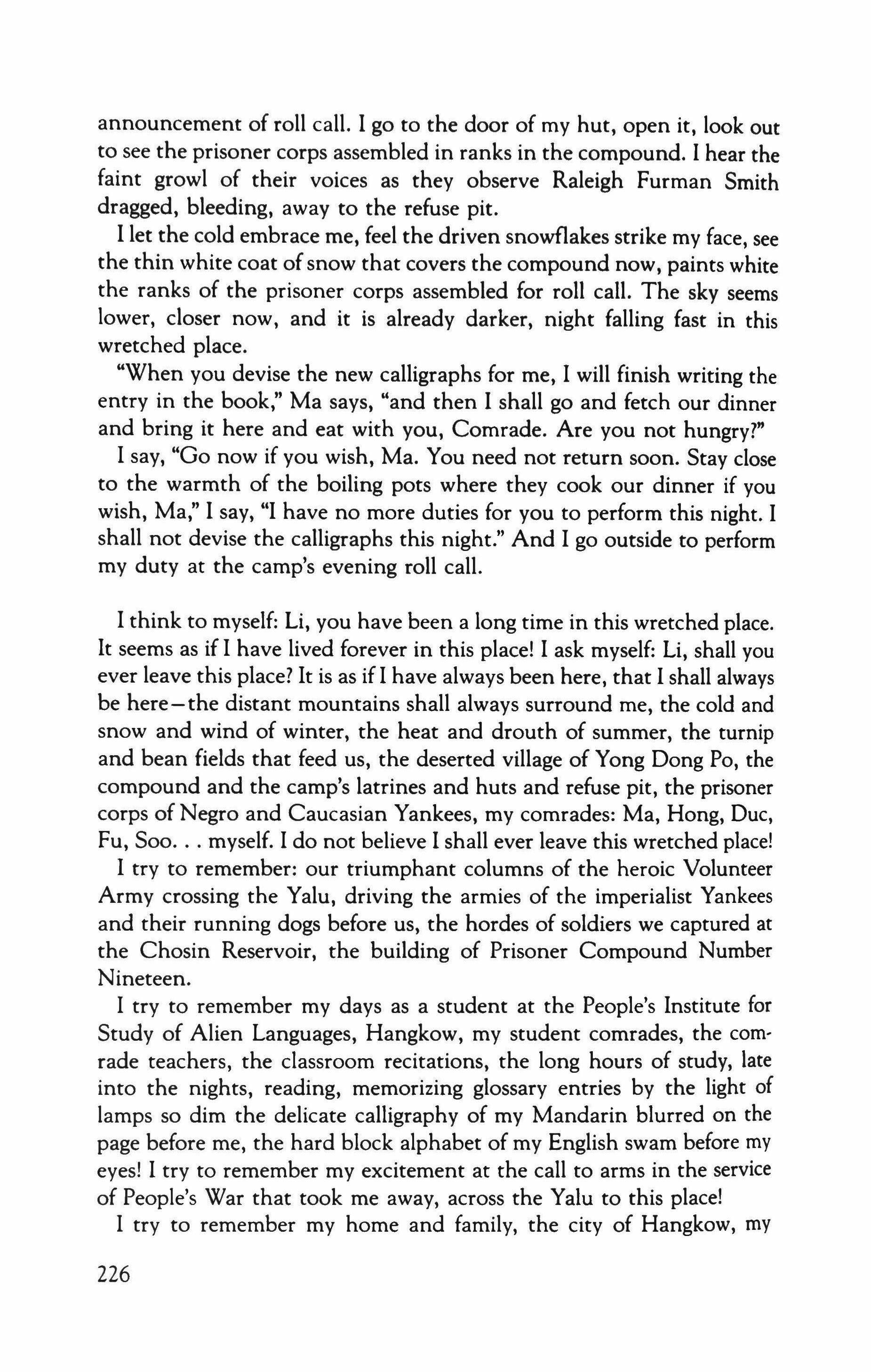
announcement of roll call. 1 go to the door of my hut, open it, look out to see the prisoner corps assembled in ranks in the compound. 1 hear the faint growl of their voices as they observe Raleigh Furman Smith dragged, bleeding, away to the refuse pit.
1 let the cold embrace me, feel the driven snowflakes strike my face, see the thin white coat of snow that covers the compound now, paints white the ranks of the prisoner corps assembled for roll call. The sky seems lower, closer now, and it is already darker, night falling fast in this wretched place.
"When you devise the new calligraphs for me, 1 will finish writing the entry in the book," Ma says, "and then 1 shall go and fetch our dinner and bring it here and eat with you, Comrade. Are you not hungry?"
1 say, "Go now if you wish, Ma. You need not return soon. Stay close to the warmth of the boiling pots where they cook our dinner if you wish, Ma," 1 say, "1 have no more duties for you to perform this night. 1 shall not devise the calligraphs this night." And I go outside to perform my duty at the camp's evening roll call.
I think to myself: Li, you have been a long time in this wretched place. It seems as if 1 have lived forever in this place! 1 ask myself: Li, shall you ever leave this place? It is as if 1 have always been here, that I shall always be here-the distant mountains shall always surround me, the cold and snow and wind of winter, the heat and drouth of summer, the turnip and bean fields that feed us, the deserted village of Yong Dong Po, the compound and the camp's latrines and huts and refuse pit, the prisoner corps of Negro and Caucasian Yankees, my comrades: Ma, Hong, Due, Fu, Soo myself. I do not believe 1 shall ever leave this wretched place!
I try to remember: our triumphant columns of the heroic Volunteer Army crossing the Yalu, driving the armies of the imperialist Yankees and their running dogs before us, the hordes of soldiers we captured at the Chosin Reservoir, the building of Prisoner Compound Number Nineteen.
I try to remember my days as a student at the People's Institute for Study of Alien Languages, Hangkow, my student comrades, the comrade teachers, the classroom recitations, the long hours of study, late into the nights, reading, memorizing glossary entries by the light of lamps so dim the delicate calligraphy of my Mandarin blurred on the page before me, the hard block alphabet of my English swam before my eyes! I try to remember my excitement at the call to arms in the service of People's War that took me away, across the Yalu to this place!
I try to remember my home and family, the city of Hangkow, my

father and mother, brothers and sisters, their words and laughter, the warmth of our hearth, the steaming bowls of food on our table, the camaraderie of our talk as we discussed the history and glorious future of People's Revolution, how we gave ourselves together to the magnificent struggle, how we glowed like bright lamps with the fervor of our dedication, the truth of our idealism.
And, though I remember these things, remember things we said, the faces of people, it is as if it is only a story, a legend told in a poem, a book, a fiction. It is as if the whole of my life is only a story, as if even People's War is only a story, like the novels of S. Crane and J. DeForest, as if all is only words, without sense or significance. Li, I say to myself, who are you?
The night sky is black, and out of this blackness swirls a heavy snowfall that muffles the sound of my steps as I cross the compound, unseen by the sleepy sentries who stomp their feet, shield their faces from the snow with the upturned collars of their padded coats, sling their rifles across their backs to free their hands, tuck them under their armpits to warm them; the sleepy sentries do not see or hear me cross the cornpound.
I lean forward, trudge into the force of the wind that tears down from the distant mountains, the mountains lost in the blackness of the night, from which come only thick snow and the cutting wind. The sleepy sentries walk their posts, do not see or hear me pick my way past the latrines; it is too cold to smell the stench of the latrines. The sleepy sentries do not see me, do not hear me descend into the refuse pit, the ugly mounds ofcamp garbage concealed now, made white, lovely, by the snowfall.
The sleepy sentries, senses numbed with cold, do not detect me. Cornrade Camp Commandant Due Fu will be asleep, close to the warmth cast by the fire in his hut stove; does he dream of the Long March, of the caves of Hunan, his wounds, even as he sleeps in his warm hut? Comrade Soo will be asleep at this hour; does he dream of the writings of Comrades Marx and Engels, Lenin and Stalin, Mao and Chou and Lin Piao, or slogans brushed on squares of rice paper? Hong sleeps with his comrades in their barracks hut; does he dream of arrogant Yankee devils who torment him with vile words? Ma sleeps soundly, wrapped in the rags of his pallet on the earthen floor of my hut-will he dream of writing legible calligraphs in a ledger?
It is not until I am very close to the discarded caisson wheel that I hear their voices, so loud is the whip ofthe wind above the refuse pit, so thick

the fall of snow in the air that it mutes their voices until I am very close to them.
"Mama," I hear Lester Boggs say.
"Shut to damn hell the fuck up, man!" I hear Raleigh Furman Smith say.
"Mama," says Lester Boggs. They do not seem to hear me, do not know I have come to be with them, even when I am very close, so close I can see their faces even in the snow-filled dark of this night.
Lester Boggs is almost covered by snow; it lies over his feet and legs and torso, a gently curving drift. His arms and hands emerge from the drift, but even the ropes that bind him to the wheel are coated with the white show. His face is veiled by snow that has gathered there, melted against his skin, refrozen to a crystal mask in the bitter temperature of the wind. He does not move, but his eyes blink, and his lips move, and he says only, "Mama."
"Will you fucking shut to fuck up!" says Raleigh Furman Smith. The snow coats him also, but he kicks his feet, twists his shoulders, as if he would snap the strong ropes that bind him to the wheel alongside Lester Boggs. He spits out snowflakes that fall into his open mouth as he strains against the ropes that hold him.
"Lester," I say, and, "Raleigh Furman Smith, I, Li, come to be with you here in this place! Lester, do you comprehend me? Hello, Comrade Prisoner Smith!" I say.
"Mama," Lester Boggs says.
Raleigh Smith sees me now, looks at me; his face distorts, teeth bare, and he spits snowflakes from his lips before he speaks. "What the fuck you doing, man!" he says, and, "Li, man, you so fucking lame! You come to turn me aloose out of this shit, motherfucker? Fuck you doing, Lil"
"Wherefore you curse me?" I say, and, "I, Li, come here to you in this place. Do not villify, Raleigh Smith," I say, "as how I am come to expressing solidarities in durance you suffer. Do you not comprehend?"
"Mama," is all that Lester Boggs can say; he blinks, closes his eyes, as if he would now sleep.
"Motherfuckl" says Raleigh Smith. He thrashes, as if he would kick at me, closes his eyes, clenches his jaw, looks away into the blackness ofthe night, the falling snow that covers us. I kneel in the snow before them, take great care to choose my English words before I speak.
"Comrades," I say, and, "Lester Boggs. Raleigh Smith. I did decree this durance in service of high causes. This I did. You said vile words, contrary to good orders and disciplines, Geneva Convention. This is so, Lester!"
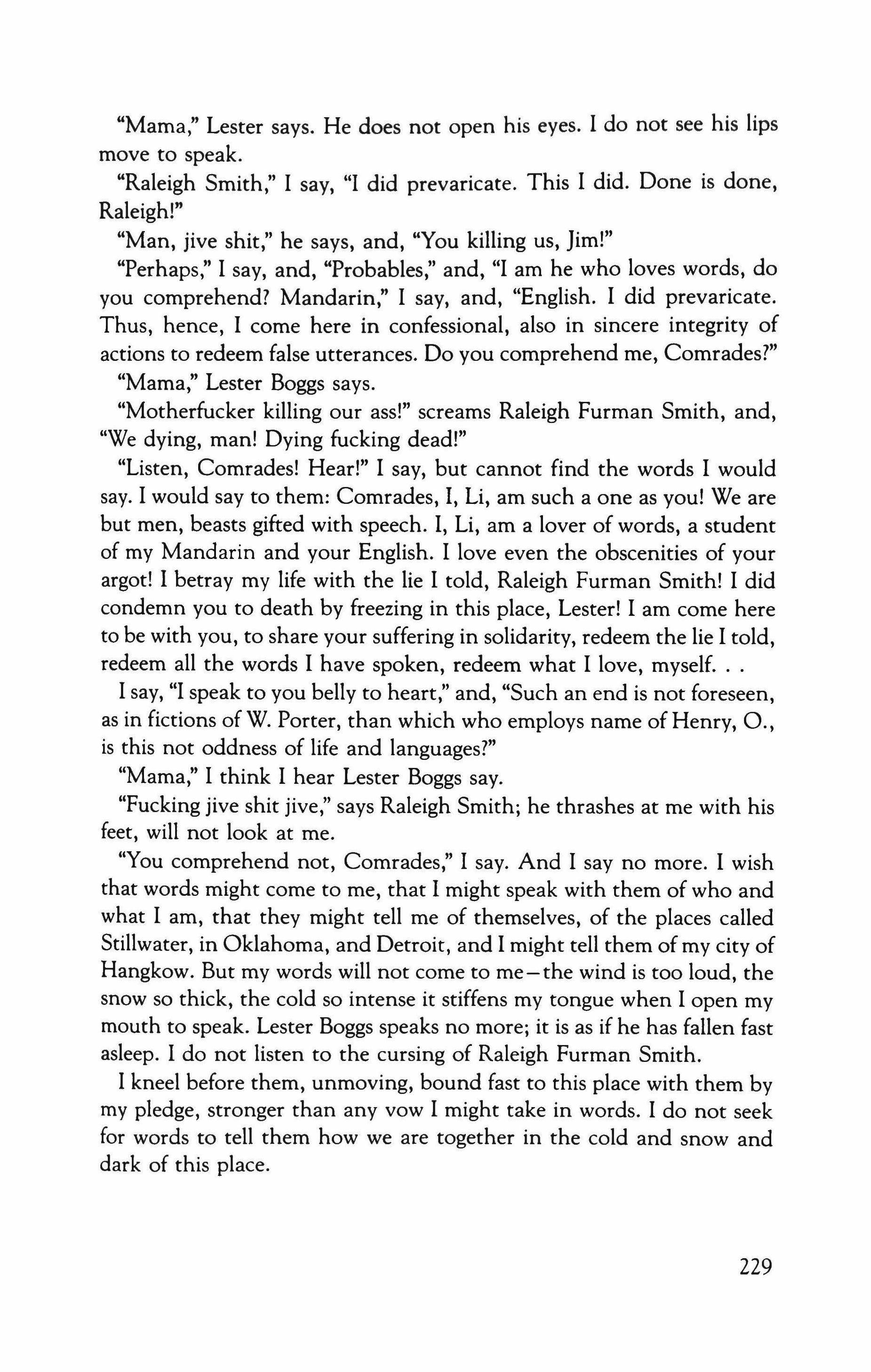
"Mama," Lester says. He does not open his eyes. I do not see his lips move to speak.
"Raleigh Smith," I say, "I did prevaricate. This I did. Done is done, Raleigh!"
"Man, jive shit," he says, and, "You killing us, Jim!"
"Perhaps," I say, and, "Probables," and, "I am he who loves words, do you comprehend? Mandarin," I say, and, "English. I did prevaricate. Thus, hence, I come here in confessional, also in sincere integrity of actions to redeem false utterances. Do you comprehend me, Comrades?"
"Mama," Lester Boggs says.
"Motherfucker killing our ass!" screams Raleigh Furman Smith, and, "We dying, man! Dying fucking dead!"
"Listen, Comrades! Hear!" I say, but cannot find the words I would say. I would say to them: Comrades, I, Li, am such a one as you! We are but men, beasts gifted with speech. I, Li, am a lover of words, a student of my Mandarin and your English. I love even the obscenities of your argot! I betray my life with the lie I told, Raleigh Furman Smith! I did condemn you to death by freezing in this place, Lester! I am come here to be with you, to share your suffering in solidarity, redeem the lie I told, redeem all the words I have spoken, redeem what I love, myself
I say, "I speak to you belly to heart," and, "Such an end is not foreseen, as in fictions ofW. Porter, than which who employs name of Henry, 0., is this not oddness of life and languages?"
"Mama," I think I hear Lester Boggs say.
"Fucking jive shit jive," says Raleigh Smith; he thrashes at me with his feet, will not look at me.
"You comprehend not, Comrades," I say. And I say no more. I wish that words might come to me, that I might speak with them of who and what I am, that they might tell me of themselves, of the places called Stillwater, in Oklahoma, and Detroit, and I might tell them of my city of Hangkow. But my words will not come to me-the wind is too loud, the snow so thick, the cold so intense it stiffens my tongue when I open my mouth to speak. Lester Boggs speaks no more; it is as if he has fallen fast asleep. I do not listen to the cursing of Raleigh Furman Smith.
I kneel before them, unmoving, bound fast to this place with them by my pledge, stronger than any vow I might take in words. I do not seek for words to tell them how we are together in the cold and snow and dark of this place.
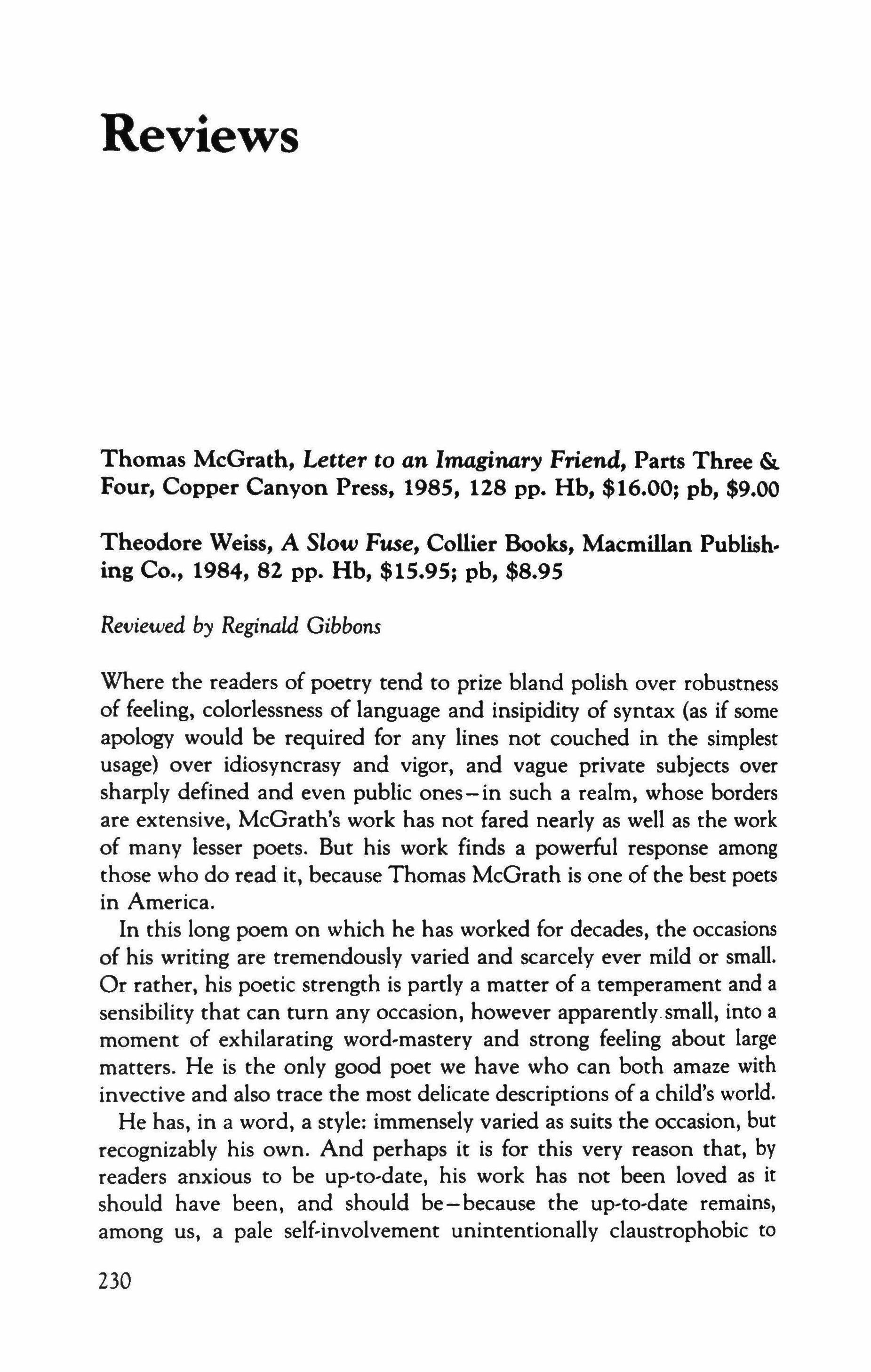
Thomas McGrath, Letter to an lmaginaTY Friend, Parts Three & Four, Copper Canyon Press, 1985, 128 pp. Hb, $16.00; ph, $9.00
Theodore Weiss, A Slow Fuse, Collier Books, Macmillan Publish. ing Co., 1984, 82 pp. Hh, $15.95; ph, $8.95
Reviewed by Reginald
GibbonsWhere the readers of poetry tend to prize bland polish over robustness of feeling, colorlessness of language and insipidity of syntax (as if some apology would be required for any lines not couched in the simplest usage) over idiosyncrasy and vigor, and vague private subjects over sharply defined and even public ones-in such a realm, whose borders are extensive, McGrath's work has not fared nearly as well as the work of many lesser poets. But his work finds a powerful response among those who do read it, because Thomas McGrath is one of the best poets in America.
In this long poem on which he has worked for decades, the occasions of his writing are tremendously varied and scarcely ever mild or small. Or rather, his poetic strength is partly a matter of a temperament and a sensibility that can turn any occasion, however apparently small, into a moment of exhilarating word-mastery and strong feeling about large matters. He is the only good poet we have who can both amaze with invective and also trace the most delicate descriptions of a child's world. He has, in a word, a style: immensely varied as suits the occasion, but recognizably his own. And perhaps it is for this very reason that, by readers anxious to be up-to-date, his work has not been loved as it should have been, and should be-because the up-to-date remains, among us, a pale self-involvement unintentionally claustrophobic to 230
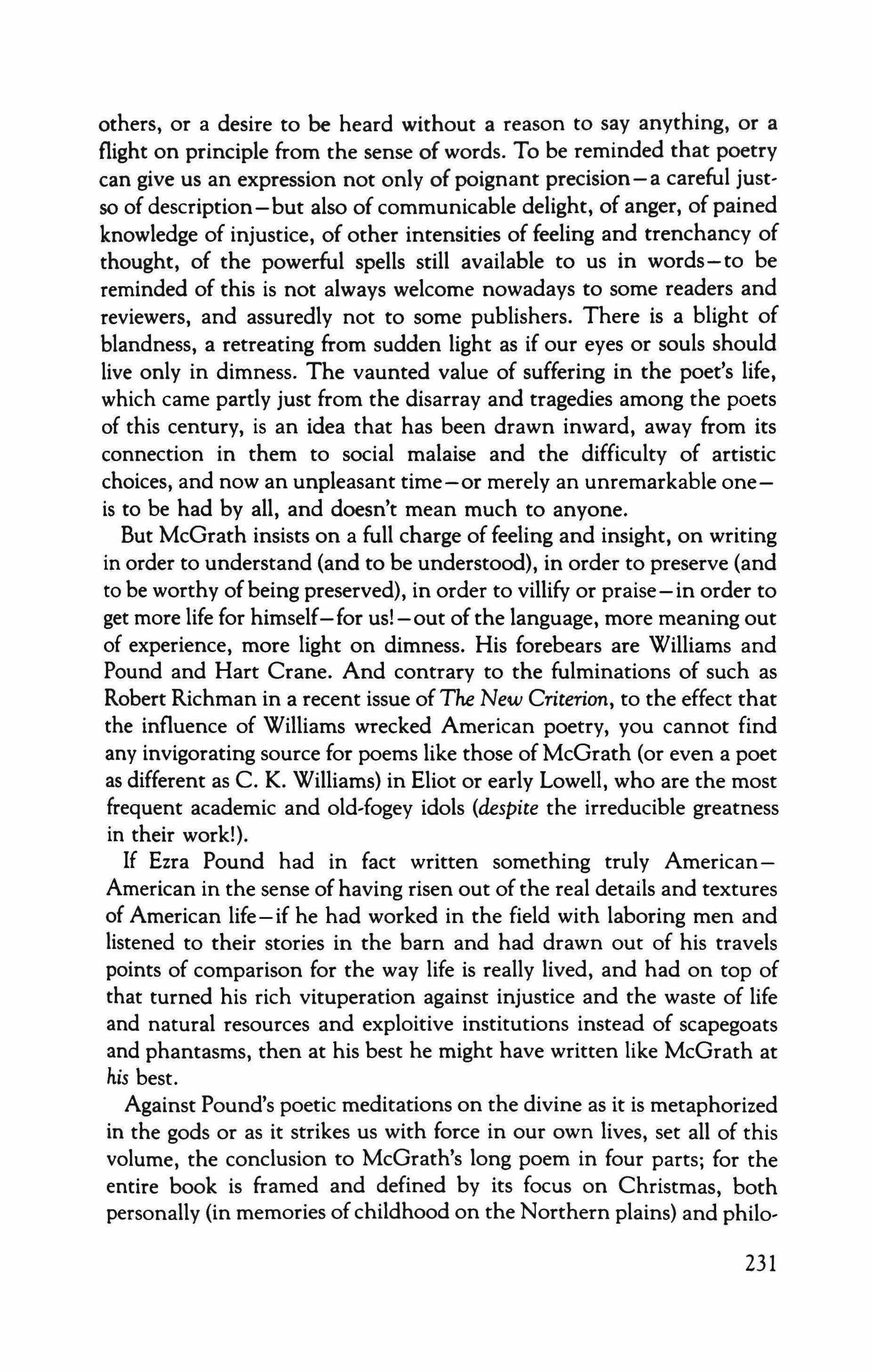
others, or a desire to be heard without a reason to say anything, or a flight on principle from the sense of words. To be reminded that poetry can give us an expression not only of poignant precision-a careful justso of description-but also of communicable delight, of anger, of pained knowledge of injustice, of other intensities of feeling and trenchancy of thought, of the powerful spells still available to us in words-to be reminded of this is not always welcome nowadays to some readers and reviewers, and assuredly not to some publishers. There is a blight of blandness, a retreating from sudden light as if our eyes or souls should live only in dimness. The vaunted value of suffering in the poet's life, which came partly just from the disarray and tragedies among the poets of this century, is an idea that has been drawn inward, away from its connection in them to social malaise and the difficulty of artistic choices, and now an unpleasant time-or merely an unremarkable oneis to be had by all, and doesn't mean much to anyone.
But McGrath insists on a full charge of feeling and insight, on writing in order to understand (and to be understood), in order to preserve (and to be worthy ofbeing preserved), in order to villify or praise-in order to get more life for himself-for us! - out ofthe language, more meaning out of experience, more light on dimness. His forebears are Williams and Pound and Hart Crane. And contrary to the fulminations of such as Robert Richman in a recent issue of The New Criterion, to the effect that the influence of Williams wrecked American poetry, you cannot find any invigorating source for poems like those of McGrath (or even a poet as different as C. K. Williams) in Eliot or early Lowell, who are the most frequent academic and old-fogey idols (despite the irreducible greatness in their work!).
If Ezra Pound had in fact written something truly AmericanAmerican in the sense of having risen out of the real details and textures of American life-if he had worked in the field with laboring men and listened to their stories in the barn and had drawn out of his travels points of comparison for the way life is really lived, and had on top of that turned his rich vituperation against injustice and the waste of life and natural resources and exploitive institutions instead of scapegoats and phantasms, then at his best he might have written like McGrath at his best.
Against Pound's poetic meditations on the divine as it is metaphorized in the gods or as it strikes us with force in our own lives, set all of this volume, the conclusion to McGrath's long poem in four parts; for the entire book is framed and defined by its focus on Christmas, both personally (in memories ofchildhood on the Northern plains) and philo-
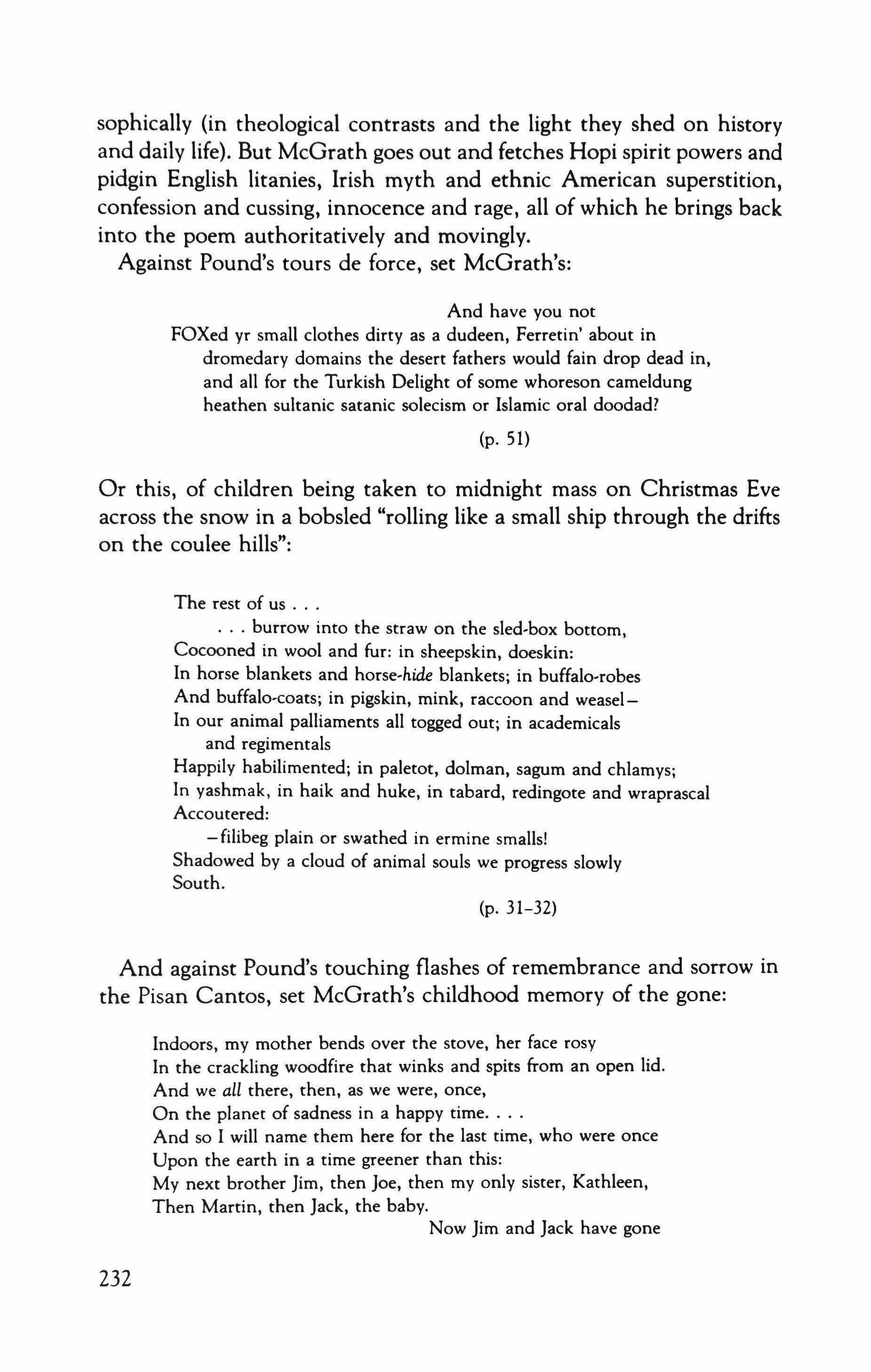
sophieally (in theological contrasts and the light they shed on history and daily life). But McGrath goes out and fetches Hopi spirit powers and pidgin English litanies, Irish myth and ethnic American superstition, confession and cussing, innocence and rage, all of which he brings back into the poem authoritatively and movingly.
Against Pound's tours de force, set McGrath's:
And have you not FOXed yr small clothes dirty as a dudeen, Ferretin' about in dromedary domains the desert fathers would fain drop dead in, and all for the Turkish Delight of some whoreson cameldung heathen sultanic satanic solecism or Islamic oral doodad?
(p. 51)
Or this, of children being taken to midnight mass on Christmas Eve across the snow in a bobsled "rolling like a small ship through the drifts on the coulee hills":
The rest of us burrow into the straw on the sled-box bottom, Cocooned in wool and fur: in sheepskin, doeskin: In horse blankets and horse-hide blankets; in buffalo-robes And buffalo-coats; in pigskin, mink, raccoon and weaselIn our animal palliaments all togged out; in academicals and regimentals
Happily habilimented; in paletot, dolman, sagum and chlamys; In yashmak, in haik and huke, in tabard, redingote and wraprascal
Accoutered:
-filibeg plain or swathed in ermine smalls! Shadowed by a cloud of animal souls we progress slowly South.
(p.31-32)
And against Pound's touching flashes of remembrance and sorrow in the Pisan Cantos, set McGrath's childhood memory of the gone:
Indoors, my mother bends over the stove, her face rosy
In the crackling woodfire that winks and spits from an open lid.
And we all there, then, as we were, once, On the planet of sadness in a happy time
And so I will name them here for the last time, who were once
Upon the earth in a time greener than this:
My next brother Jim, then Joe, then my only sister, Kathleen, Then Martin, then Jack, the baby.
Now Jim and Jack have gone
Into the dark with my mother and father. But thenOh, then!
How bright their faces shone that lamplit Christmas Eve!
And our mother, her whole being a lamp in all times and weather
And our father, the dear flesh-gantry that lifted us all from the dark
(p. 26)
The humbleness of this language should not be dismissed as simple; it is rather an instance of simplicity, which is rather different. Isolated quotation can only suggest how this faith in simply naming the living and dead, and in such common epithets as "rosy," "crackling," "greener than this," and in the exclamation points as a guileless sign of intense feeling, distinguishes the passage partly because in other places the poem's language is violently, even recklessly inventive.
The vitality of these and many other passages comes partly from McGrath's skill as a collector of the vernacular and anthropological rather than from a talent for nonce diction never seen till now. In his words, a "roar'em whore'em cockalorum" pitch of excitement tilts his diction like a lamp spilling light on "the real language of men" (but not men at their dullest!}-in this case, language shaped by a poet of arcana and home fires, and of farming people who lived in an oral American culture, if usually a laconic one. (If their oaths and tall tales probably outrun their ability to express more private feelings, nonetheless, around the figure of the narrator himself there are memorable scenes of love and desire in Parts One and Two of Letter to an Imaginary Friend [Swallow Press, 1970].*
To have invoked Pound is to invite in not only him but the blanket of problems he wrapped about himself, especially questions of belief. McGrath's utilization of pagan god-figures can stand up to Pound's use of Greek gods, and the validity or even sincerety of this use is to my mind as strong in McGrath as it is in Pound, where it is by no means merely a literary device. But another layer of belief is also at issue, less important perhaps but far more readily grasped and debated-political and social theory (although "theory" probably over-dignifies Pound's attitudes). If there are some readers who will look as much askance at McGrath for what they perceive as his "Anarcho-Cornmunist-Wobblv" rumblings as they do at Pound for his economic doctrine and his anti,

*Parts Three and Four may indeed be read with great pleasure without one's having read Parts One and Two beforehand, but the pleasure is considerably deepened when echoes from the first book are discerned in the second.
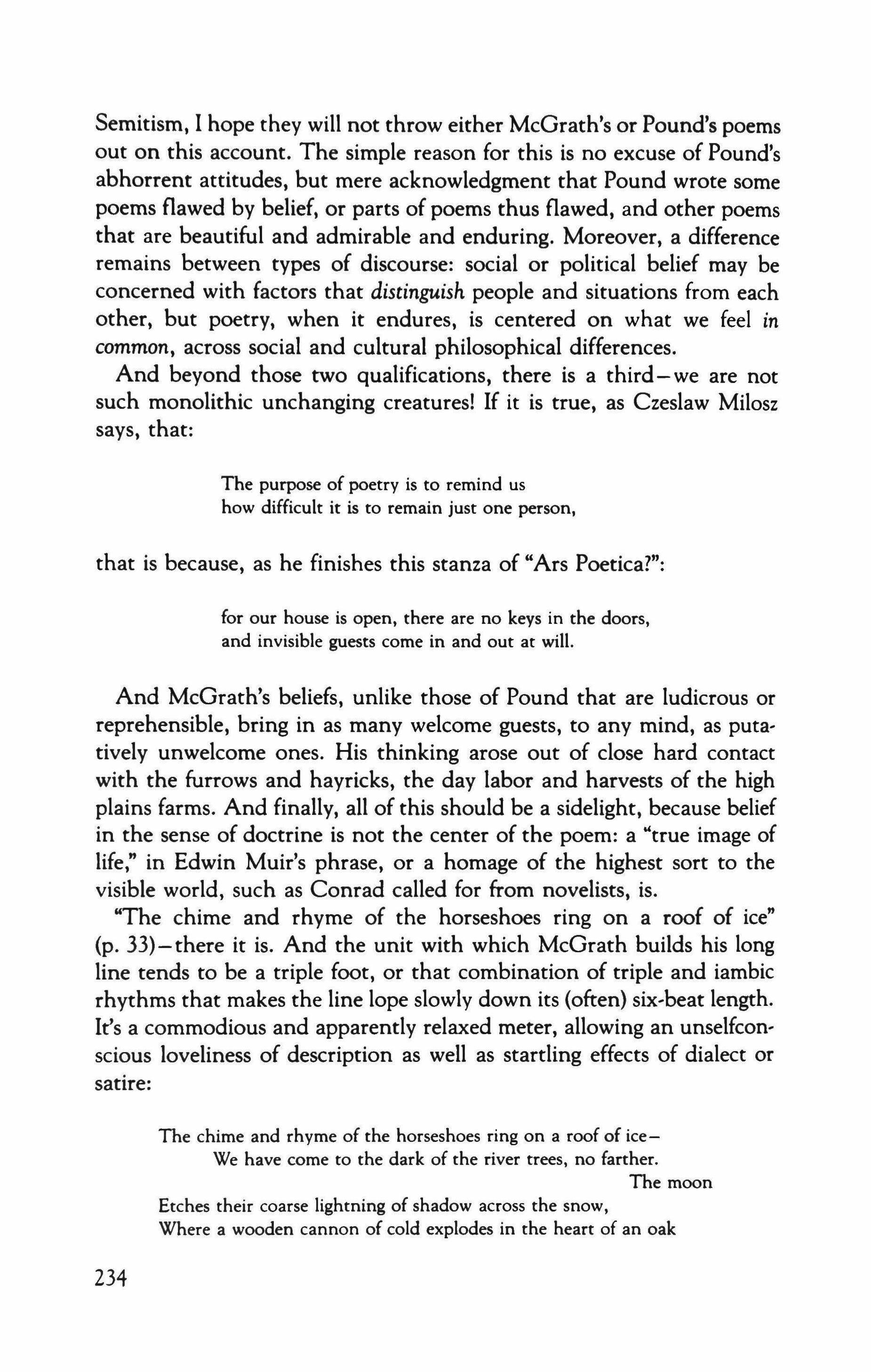
Semitism, I hope they will not throw either McGrath's or Pound's poems out on this account. The simple reason for this is no excuse of Pound's abhorrent attitudes, but mere acknowledgment that Pound wrote some poems flawed by belief, or parts of poems thus flawed, and other poems that are beautiful and admirable and enduring. Moreover, a difference remains between types of discourse: social or political belief may be concerned with factors that distinguish people and situations from each other, but poetry, when it endures, is centered on what we feel in common, across social and cultural philosophical differences.
And beyond those two qualifications, there is a third - we are not such monolithic unchanging creatures! If it is true, as Czeslaw Milosz says, that:
The purpose of poetry is to remind us how difficult it is to remain just one person, that is because, as he finishes this stanza of"Ars Poetical":
for our house is open, there are no keys in the doors, and invisible guests come in and out at will.
And McGrath's beliefs, unlike those of Pound that are ludicrous or reprehensible, bring in as many welcome guests, to any mind, as putatively unwelcome ones. His thinking arose out of close hard contact with the furrows and hayricks, the day labor and harvests of the high plains farms. And finally, all of this should be a sidelight, because belief in the sense of doctrine is not the center of the poem: a "true image of life," in Edwin Muir's phrase, or a homage of the highest sort to the visible world, such as Conrad called for from novelists, is.
"The chime and rhyme of the horseshoes ring on a roof of ice" (p. 33)-there it is. And the unit with which McGrath builds his long line tends to be a triple foot, or that combination of triple and iambic rhythms that makes the line lope slowly down its (often) six-beat length. It's a commodious and apparently relaxed meter, allowing an unselfconscious loveliness of description as well as startling effects of dialect or satire:
The chime and rhyme of the horseshoes ring on a roof of iceWe have come to the dark of the river trees, no farther. The moon
Etches their coarse lightning of shadow across the snow, Where a wooden cannon of cold explodes in the heart of an oak
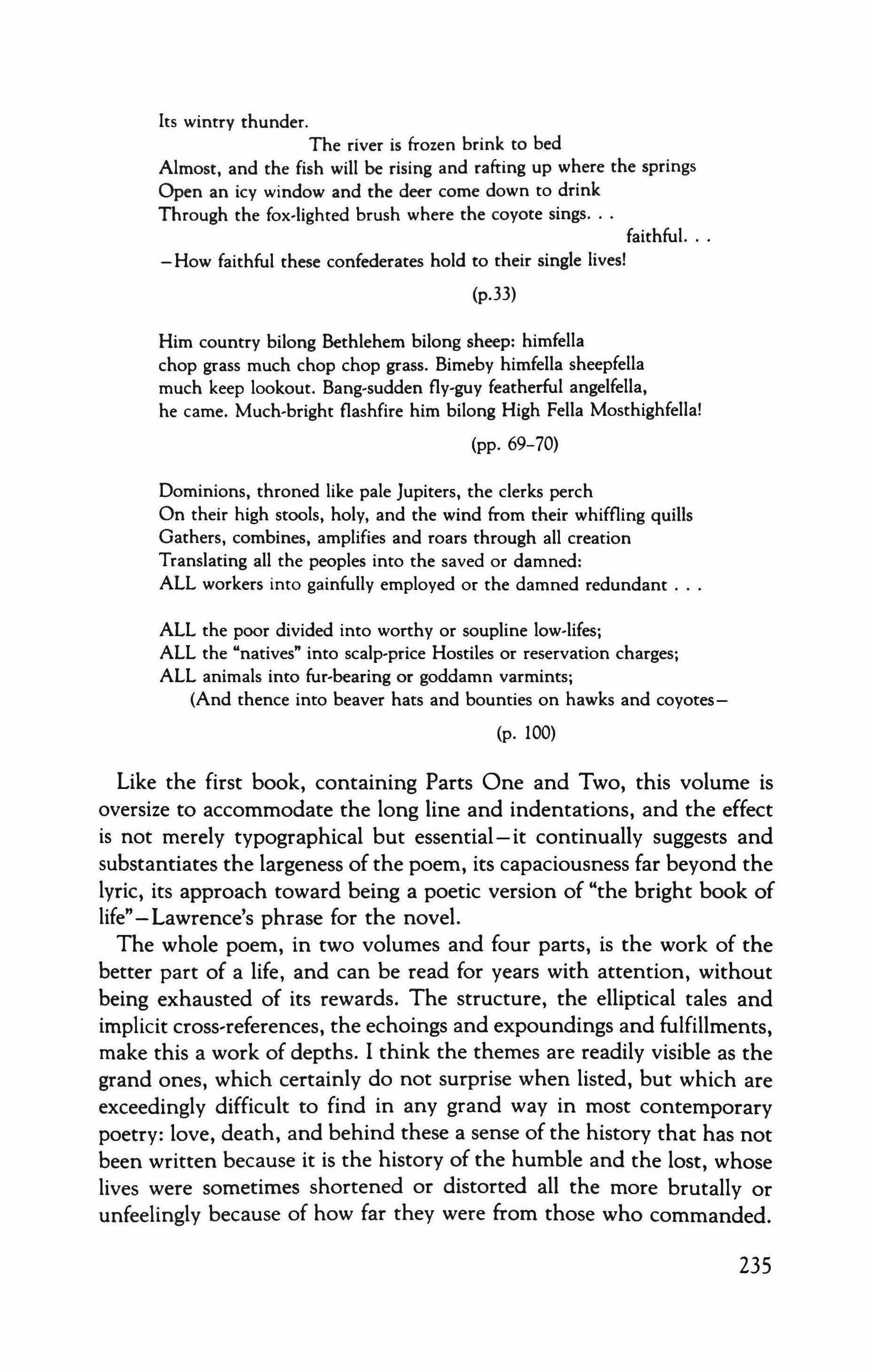
Its wintry thunder.
The river is frozen brink to bed
Almost, and the fish will be rising and rafting up where the springs Open an icy window and the deer come down to drink Through the fox-lighted brush where the coyote sings faithful.
- How faithful these confederates hold to their single lives!
(p.33)
Him country bilong Bethlehem bilong sheep: himfella chop grass much chop chop grass. Bimeby himfella sheepfella much keep lookout. Bang-sudden fly-guy featherful angelfella, he came. Much-bright flashfire him bilong High Fella Mosthighfella!
(pp.69-70)
Dominions, throned like pale jupiters, the clerks perch
On their high stools, holy, and the wind from their whiffling quills
Gathers, combines, amplifies and roars through all creation
Translating all the peoples into the saved or damned: ALL workers into gainfully employed or the damned redundant
ALL the poor divided into worthy or soupline low-lifes; ALL the "natives" into scalp-price Hostiles or reservation charges; ALL animals into fur-bearing or goddamn varmints; (And thence into beaver hats and bounties on hawks and coyotes-
(p. 100)
Like the first book, containing Parts One and Two, this volume is oversize to accommodate the long line and indentations, and the effect is not merely typographical but essential-it continually suggests and substantiates the largeness of the poem, its capaciousness far beyond the lyric, its approach toward being a poetic version of "the bright book of life" - Lawrence's phrase for the novel.
The whole poem, in two volumes and four parts, is the work of the better part of a life, and can be read for years with attention, without being exhausted of its rewards. The structure, the elliptical tales and implicit cross-references, the echoings and expoundings and fulfillments, make this a work of depths. I think the themes are readily visible as the grand ones, which certainly do not surprise when listed, but which are exceedingly difficult to find in any grand way in most contemporary poetry: love, death, and behind these a sense of the history that has not been written because it is the history of the humble and the lost, whose lives were sometimes shortened or distorted all the more brutally or unfeelingly because of how far they were from those who commanded.
In a time and a country of compulsive remaking and forgetting, of images that obliterate the past, "the real reason why history is important" - in Michael S. Harper's words- "is because life is tragic, and American life is particularly tragic because so many possibilities exist and there's been so much waste."
McGrath's poem celebrates both the lost-persons, hopes, places, ways of being, ambitions, defeats-and the powers of memory, creation and re-creation that can restore them to us partly. The poem is both "pseudo-autobiography" and wholly public emblem of American possibilities, of the twentieth-century history of some American ways of life, and of waste. If it is a tragic work, however, that is not because it is American. The losses and triumphs, the exhilaration and sorrow, seem as compelling and universal as any we could get from an American poem. In this age not of prose necessarily, and not of poetry either, but of one hell of a lot of writing, we usually look to prose for our contextsnovels and nonfiction books and articles - and to poems we look for the single apparently self-contained utterance or effusion of feeling that we prize for its very independence. Or isolation. A poem like Letter to an Imaginary Friend is a lesson in how else to regard poetry - as large, unhurried, vigorous and instructive, as well as stirring, moving, delightful.

Theodore Weiss's poetry has, seemingly from the first, been of the sort to resist any hurrying by the reader; in fact, even to resist the hurrying of the nonreader-for it is against a loosey-goosev lack of clarity and intensity that Weiss works, against casualness of speech, against habitual not-seeing and not-hearing. He utilizes every resource of language to accomplish this, and his compression can be as intense as Trakl's {but it's never "surreal"}. This opposing, resisting drive has given all his work an odd quality of artifice, but not of traditional formality so much as of an extreme colloquial syntactic contraction, an intensifying sometimes so urgent that it seems to implode, to collapse into itself not in a stuttering failure to intend but in a centripetal swirl of thorough intending. There is so much that means.
Weiss published Fireweeds, which included the important longer poem "The Polish Question:' in 1976; a volume of "new and selected poems," Views & Spectacles in 1978; then in 1982 both the long poem Recoveries and a volume of his essays and reviews, The Man from Porlock: Engagements 1944-1981. So these new poems mark nearly a decade of intense activity impressive not only for the intrinsic merit of the books but also

because all of this was accomplished at the same time he was editing, with his wife Renee, The Quarterly Review of Literature, and doing so with notable discernment, prescience, and generosity.
I have had many occasions to be moved and impressed by Weiss's work in all these capacities, and especially when thinking of his position in the highly visible and already much studied generation of Lowell, Bishop, and others born around 1910-1920 (McGrath-hardly a studied poet!-and Weiss were both born in 1916). For the resilience of his talent Weiss is a contrast to a number of the better-known poets of his generation whose work may have been no less strong and idiosyncratic, but whose range was in fact smaller, both in poetry and in their larger work as literary artists - if they even pursued anything like editing or the writing of reviews and criticism.
So there is a subsidiary accomplishment to the poems that should not be overlooked in Weiss's case, all the more so when by contrast many younger poets, born after about 1935, have shown so little interest in, or aptitude for, participating in literary culture at least to the extent of examining the work of their contemporaries and trying, for their own sake and for that of readers, to help make some published sense of American poetry. Evaluations thus made conscious (however far they might be from judicious-that's not the issue!) might have strengthened their own work and kept the plough turning new earth deeply instead of sticking or swerving or rising to skim a thin sandy soil. All this is admittedly mere background, but significant nonetheless, each time Weiss (or any poet) publishes a new volume of poems. Knowing that Weiss has both edited a literary review of the first rank and has written about the work of other poets, at the very least reinforces one's sense of the conscious in his work - the deliberateness, the artistic choices, the development (or perhaps acceptance from within?) of a style, a manner, a mode of perceiving and of using language.
"The Death of Fathers," "The Hostage," "Earthrise," the very powerful "A Pair of Shoes," the bizarre and disconcerting "A Building," "A Slow Fuse," and the characteristic longer poem in sections, "A Living Room" ("for Hannah Arendt and Heinrich Blucher"), are among the best poems Weiss has written. (There are others here, too, which, as the lesser poems in Robert Penn Warren's recent books bring us, rather than finished individual works, simply his sensibility, bring us Weiss's sensibility, unmistakably; but is it not a privilege of having come through that the poet may speak his or her mind more at will?) All of the best poems touch on a mood or state of mind that links this book to Fireweeds and perhaps even to Recoveries, and thus offers us a glimpse of a not surpris-
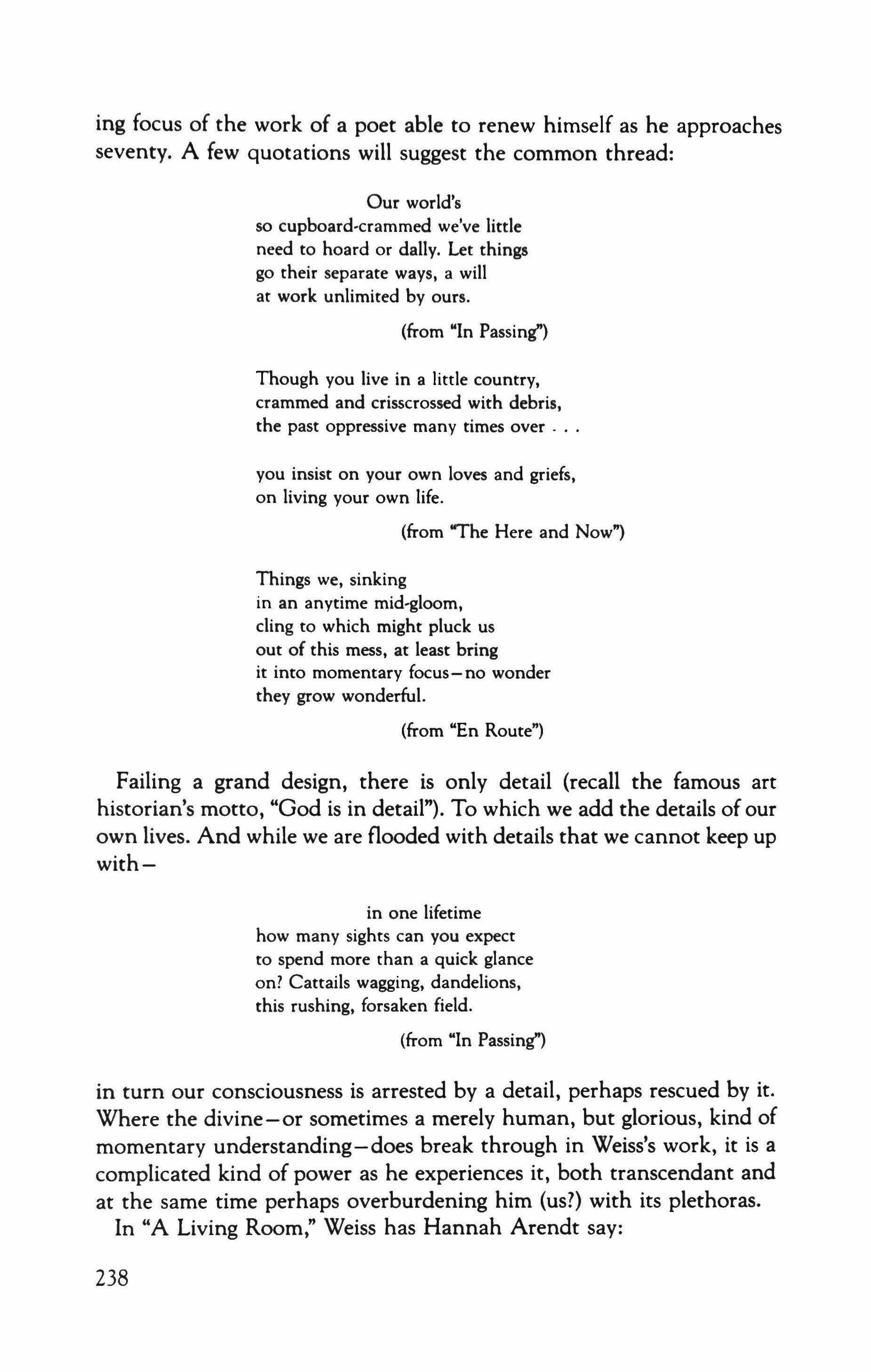
ing focus of the work of a poet able to renew himself as he approaches seventy. A few quotations will suggest the common thread:
Our world's so cupboard-crammed we've little need to hoard or dally. Let things go their separate ways, a will at work unlimited by ours.
(from "In Passing")
Though you live in a little country, crammed and crisscrossed with debris, the past oppressive many times over
you insist on your own loves and griefs, on living your own life.
(from "The Here and Now;
Things we, sinking in an anytime mid-gloom, cling to which might pluck us out of this mess, at least bring it into momentary focus-no wonder they grow wonderful.
(from "En Route")
Failing a grand design, there is only detail (recall the famous art historian's motto, "God is in detail"). To which we add the details of our own lives. And while we are flooded with details that we cannot keep up with-
in one lifetime how many sights can you expect to spend more than a quick glance on? Cattails wagging, dandelions, this rushing, forsaken field.
(from "In Passing;
in turn our consciousness is arrested by a detail, perhaps rescued by it. Where the divine-or sometimes a merely human, but glorious, kind of momentary understanding-does break through in Weiss's work, it is a complicated kind of power as he experiences it, both transcendant and at the same time perhaps overburdening him (us?) with its plethoras. In "A Living Room," Weiss has Hannah Arendt say:
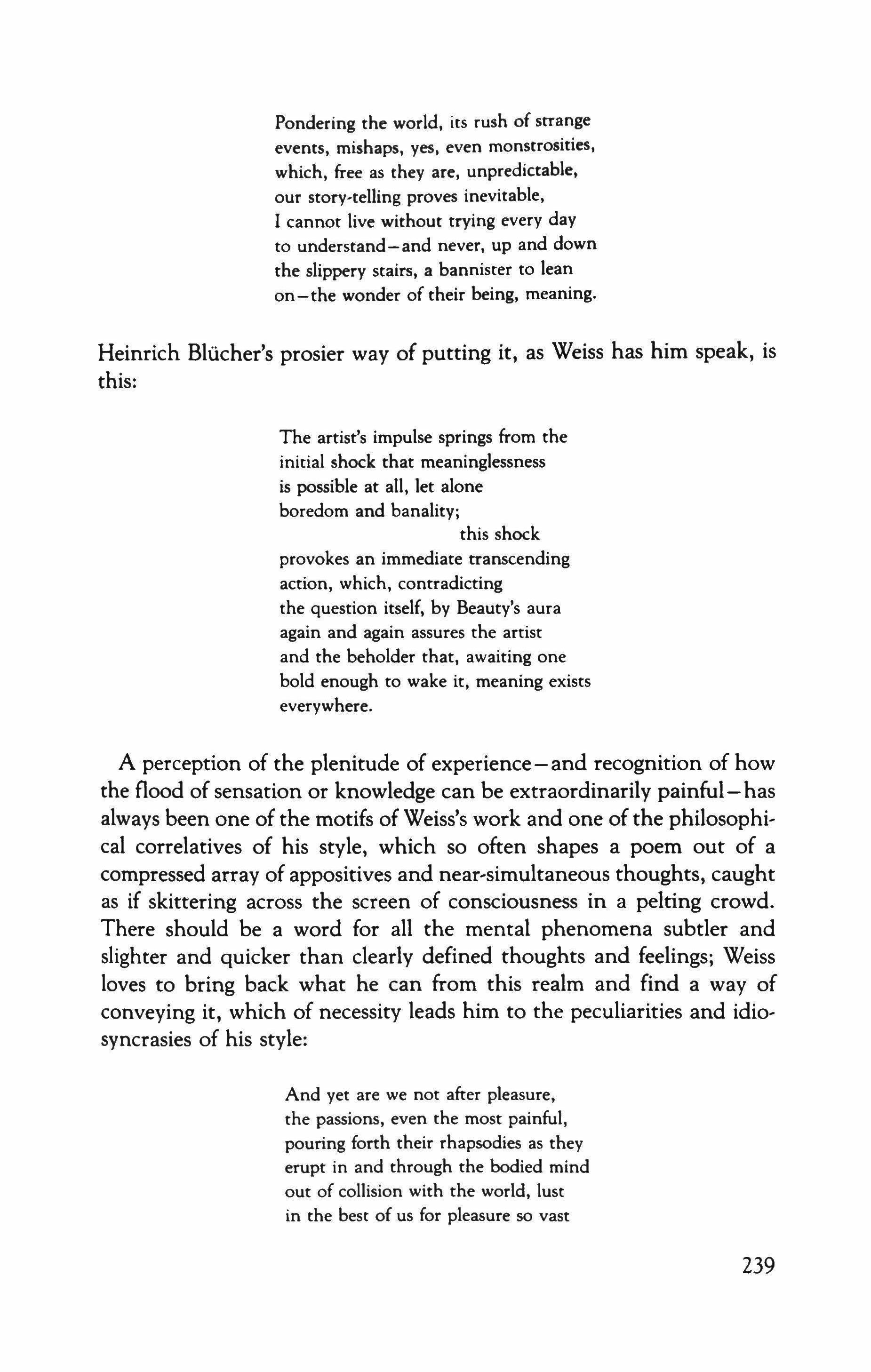
Pondering the world, its rush of strange events, mishaps, yes, even monstrosities, which, free as they are, unpredictable, our story-telling proves inevitable, I cannot live without trying every day to understand-and never, up and down the slippery stairs, a bannister to lean on - the wonder of their being, meaning.
Heinrich Blucher's prosier way of putting it, as Weiss has him speak, is this:
The artist's impulse springs from the initial shock that meaninglessness is possible at all, let alone boredom and banality; this shock provokes an immediate transcending action, which, contradicting the question itself, by Beauty's aura again and again assures the artist and the beholder that, awaiting one bold enough to wake it, meaning exists everywhere.
A perception of the plenitude of experience-and recognition of how the flood of sensation or knowledge can be extraordinarily painful-has always been one of the motifs of Weiss's work and one of the philosophical correlatives of his style, which so often shapes a poem out of a compressed array of appositives and near-simultaneous thoughts, caught as if skittering across the screen of consciousness in a pelting crowd. There should be a word for all the mental phenomena subtler and slighter and quicker than clearly defined thoughts and feelings; Weiss loves to bring back what he can from this realm and find a way of conveying it, which of necessity leads him to the peculiarities and idiosyncrasies of his style:
And yet are we not after pleasure, the passions, even the most painful, pouring forth their rhapsodies as they erupt in and through the bodied mind out of collision with the world, lust in the best of us for pleasure so vast
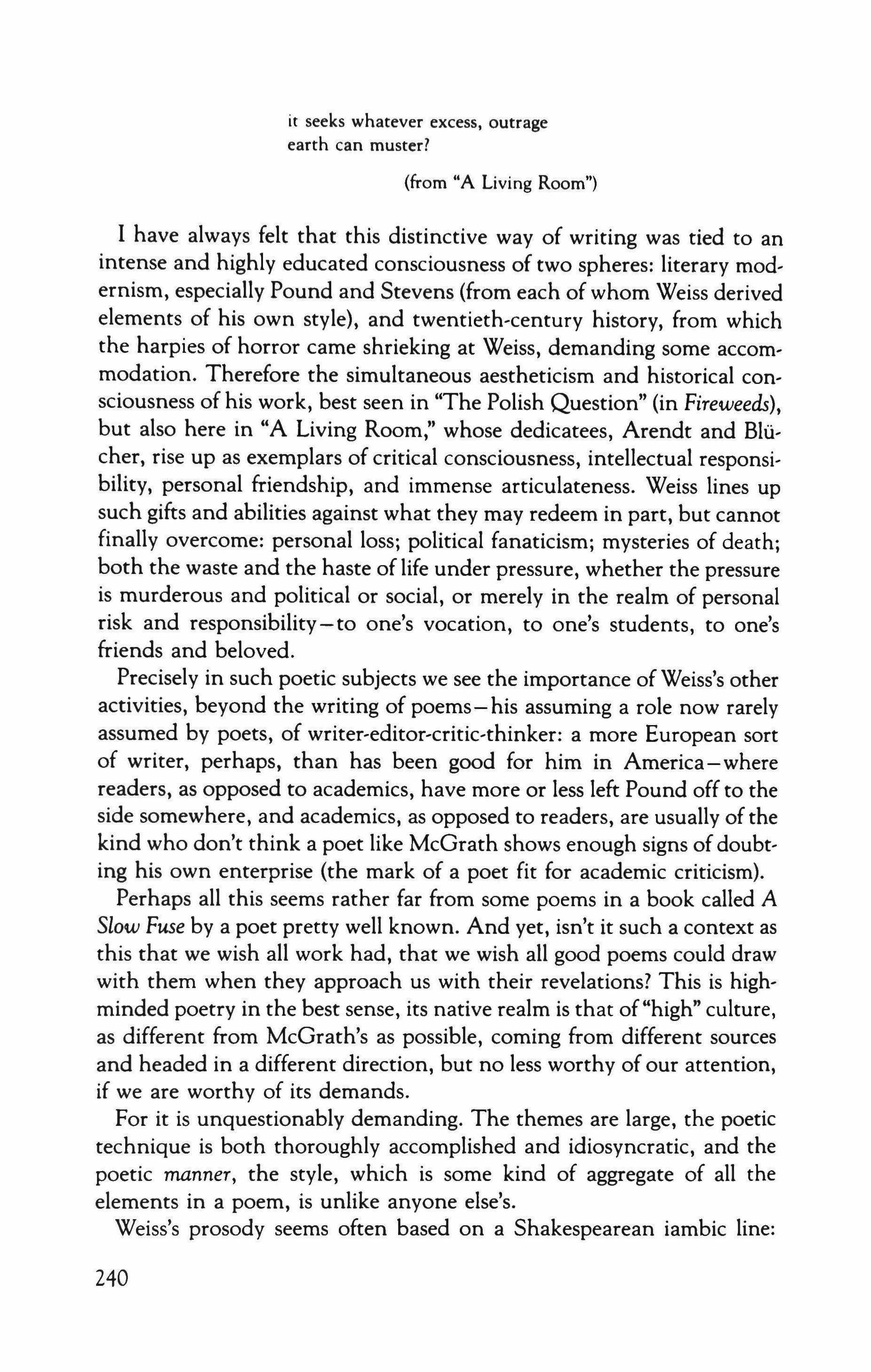
it seeks whatever excess, outrage earth can muster?
(from "A Living Room")
I have always felt that this distinctive way of writing was tied to an intense and highly educated consciousness of two spheres: literary modernism, especially Pound and Stevens (from each of whom Weiss derived elements of his own style), and twentieth-century history, from which the harpies of horror came shrieking at Weiss, demanding some accommodation. Therefore the simultaneous aestheticism and historical consciousness of his work, best seen in "The Polish Question" (in Fireweeds), but also here in "A Living Room," whose dedicatees, Arendt and Blucher, rise up as exemplars of critical consciousness, intellectual responsibility, personal friendship, and immense articulateness. Weiss lines up such gifts and abilities against what they may redeem in part, but cannot finally overcome: personal loss; political fanaticism; mysteries of death; both the waste and the haste of life under pressure, whether the pressure is murderous and political or social, or merely in the realm of personal risk and responsibility-to one's vocation, to one's students, to one's friends and beloved.
Precisely in such poetic subjects we see the importance of Weiss's other activities, beyond the writing of poems- his assuming a role now rarely assumed by poets, of writer-editor-critic-thinker: a more European sort of writer, perhaps, than has been good for him in America-where readers, as opposed to academics, have more or less left Pound off to the side somewhere, and academics, as opposed to readers, are usually of the kind who don't think a poet like McGrath shows enough signs ofdoubting his own enterprise (the mark of a poet fit for academic criticism).
Perhaps all this seems rather far from some poems in a book called A Slow Fuse by a poet pretty well known. And yet, isn't it such a context as this that we wish all work had, that we wish all good poems could draw with them when they approach us with their revelations? This is highminded poetry in the best sense, its native realm is that of"high" culture, as different from McGrath's as possible, coming from different sources and headed in a different direction, but no less worthy of our attention, if we are worthy of its demands.
For it is unquestionably demanding. The themes are large, the poetic technique is both thoroughly accomplished and idiosyncratic, and the poetic manner, the style, which is some kind of aggregate of all the elements in a poem, is unlike anyone else's.
Weiss's prosody seems often based on a Shakespearean iambic line: 240
"easy air of wit and knowingness," "yet spendidly inspiriting this flesh," "in your pronouncings and your waywardnessess," "something more than mere syntactic tangle." But he breaks and disguises this medium, and writes not:
This language bids you utter things. at times unwittingly and far below the levelearly spring invisibly at work in buds, a seed. greedy wren eggs-of hearing.
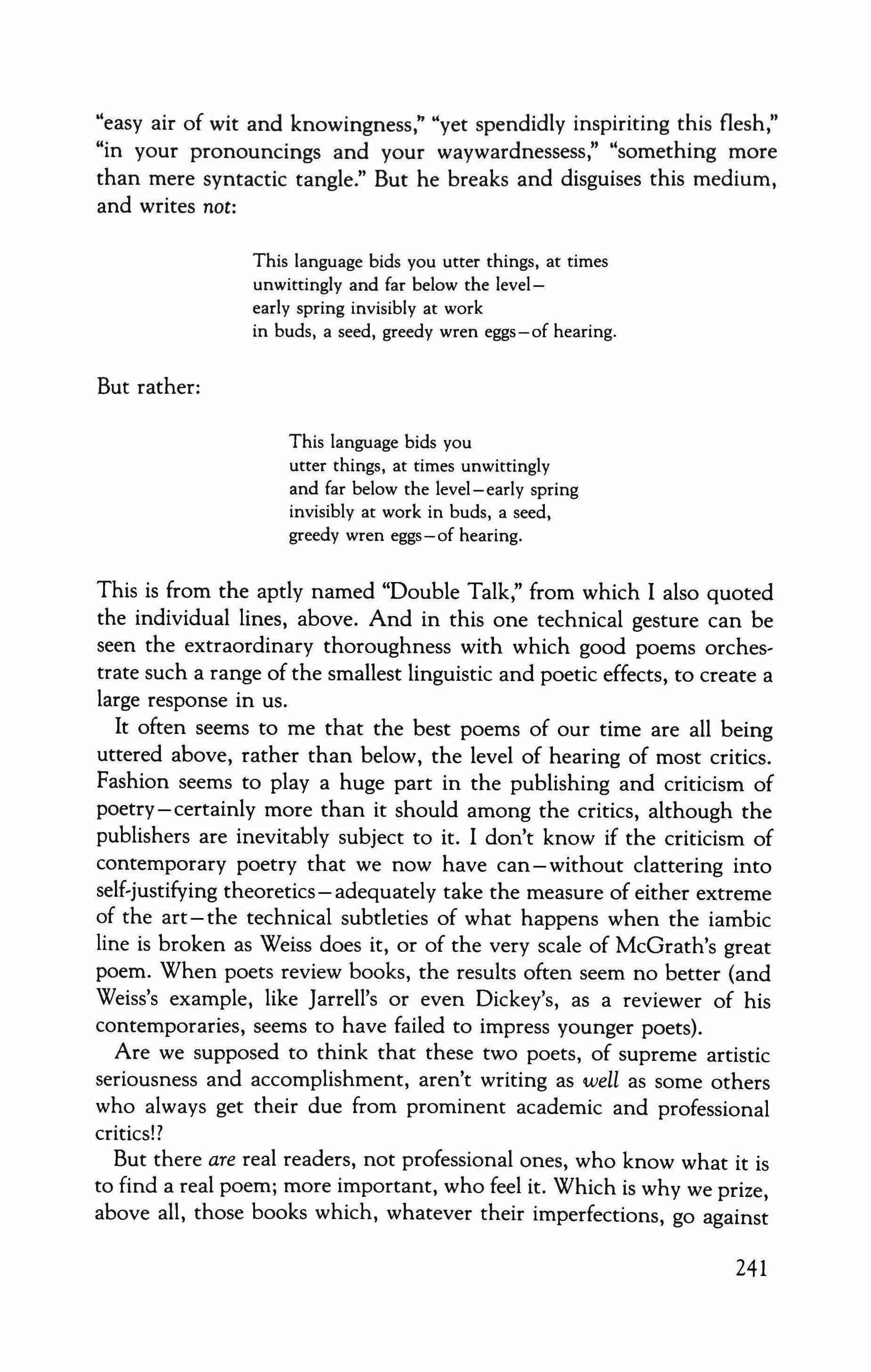
But rather:
This language bids you utter things. at times unwittingly and far below the level-early spring invisibly at work in buds. a seed. greedy wren eggs-of hearing.
This is from the aptly named "Double Talk:' from which I also quoted the individual lines, above. And in this one technical gesture can be seen the extraordinary thoroughness with which good poems orchestrate such a range of the smallest linguistic and poetic effects, to create a large response in us.
It often seems to me that the best poems of our time are all being uttered above, rather than below, the level of hearing of most critics. Fashion seems to play a huge part in the publishing and criticism of poetry-certainly more than it should among the critics, although the publishers are inevitably subject to it. I don't know if the criticism of contemporary poetry that we now have can - without clattering into self-justifying theoretics-adequately take the measure of either extreme of the art-the technical subtleties of what happens when the iambic line is broken as Weiss does it, or of the very scale of McGrath's great poem. When poets review books, the results often seem no better (and Weiss's example, like Jarrell's or even Dickey's, as a reviewer of his contemporaries, seems to have failed to impress younger poets).
Are we supposed to think that these two poets, of supreme artistic seriousness and accomplishment, aren't writing as well as some others who always get their due from prominent academic and professional critics!?
But there are real readers, not professional ones, who know what it is to find a real poem; more important, who feel it. Which is why we prize, above all, those books which, whatever their imperfections, go against
the dull current of the blase and the self-pitving and the arch, and instead, reward our hearts.

Frank O'Connor, The Lonely Voice, Harper & Row, 1984, 240 pp. Pb, $5.95
Reviewed by Fred Shafer
In his essays on the primitive storyteller and modern narratives, Walter Benjamin expresses concern over the changes in the form and content of stories that he feels took place with the introduction of the print medium. He writes compellingly of published fiction in terms of the need to seek out and preserve the formal values of told stories, the "chaste compactness" by which he feels wisdom and counsel are extended to a public audience. The late Irish critic and storywriter Frank O'Connor also recognized the differences between stories in print and those presented orally, but he is less troubled by them. In this book, originally published in 1964, O'Connor accepts the fact that the publica, tion of stories "began, and continues to function, as a private art intended to satisfy the standards of the individual, solitary, critical reader." Through studying the work of ten authors, from Turgenev, Maupassant and Chekhov, to Hemingway and Mary Lavin, he attempts to define the qualities that distinguish the modern short story. He draws on knowledge gained through a lifetime spent writing stories to produce a theory that is insightful and strong and that deserves to be taken seriously by students of short narrative.
In the best short stories, according to O'Connor, the characters are usually eccentric and lonely outcasts, who experience uncertainty, pain and "defeat inflicted by a society that has no signposts, a society that offers no goals and answers." They form what O'Connor calls a "sub, merged population," whose composition may differ from author to author and from one society to another, but whose longings remain constant: "It may be Gogol's officials, Turgenev's serfs, Maupassant's prostitutes, Chekhov's doctors and teachers, Sherwood Anderson's pr0' vincials, always dreaming of escape." O'Connor believes that this help, less submergence beneath the values and procedures of the established community is what separates characters in stories from those in novels, who are often able to challenge the prevailing system and, for better or
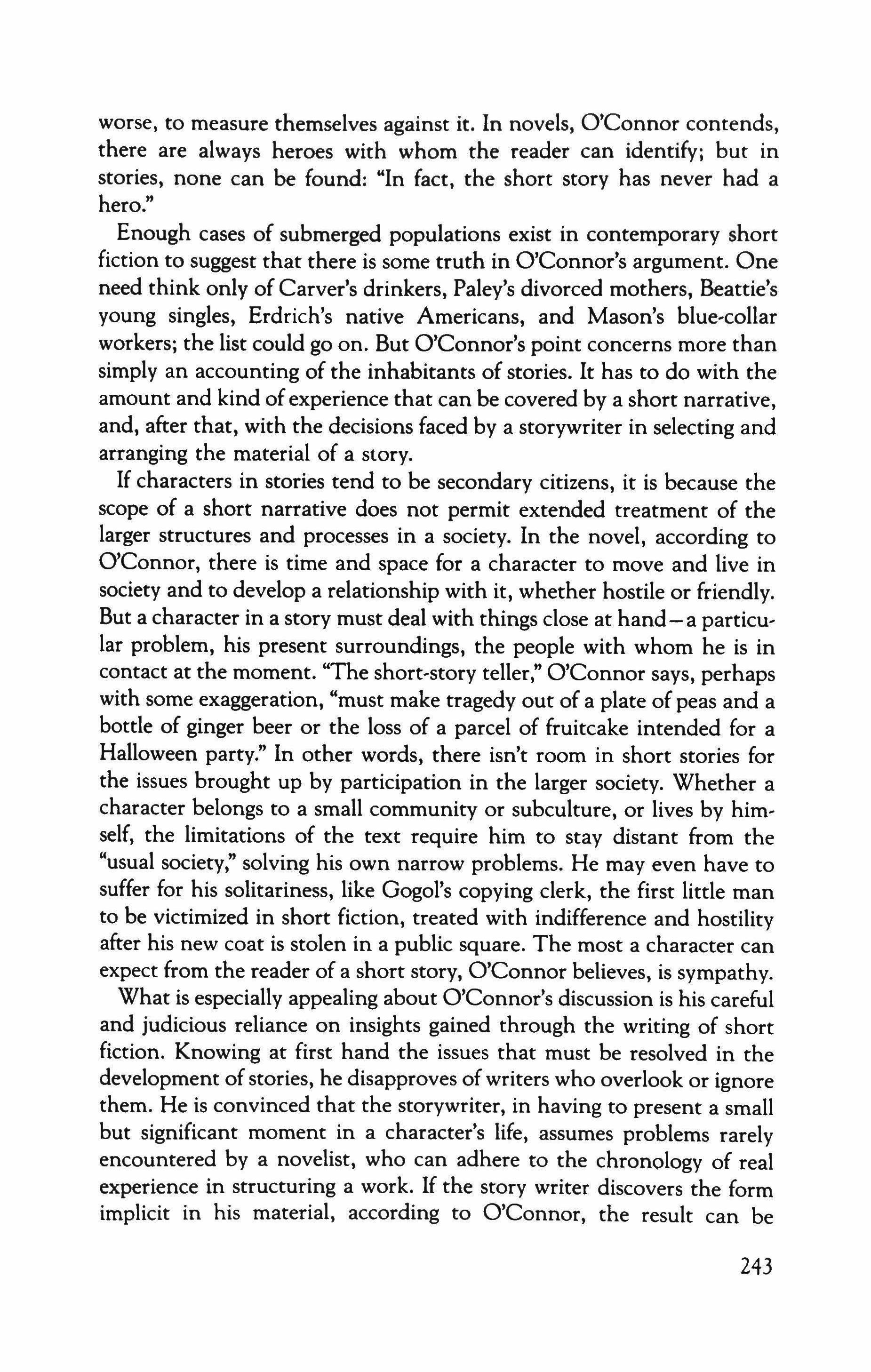
worse, to measure themselves against it. In novels, O'Connor contends, there are always heroes with whom the reader can identify; but in stories, none can be found: "In fact, the short story has never had a hero."
Enough cases of submerged populations exist in contemporary short fiction to suggest that there is some truth in O'Connor's argument. One need think only of Carver's drinkers, Paley's divorced mothers, Beattie's young singles, Erdrich's native Americans, and Mason's blue-collar workers; the list could go on. But O'Connor's point concerns more than simply an accounting of the inhabitants of stories. It has to do with the amount and kind ofexperience that can be covered by a short narrative, and, after that, with the decisions faced by a storywriter in selecting and arranging the material of a story.
If characters in stories tend to be secondary citizens, it is because the scope of a short narrative does not permit extended treatment of the larger structures and processes in a society. In the novel, according to O'Connor, there is time and space for a character to move and live in society and to develop a relationship with it, whether hostile or friendly. But a character in a story must deal with things close at hand - a particular problem, his present surroundings, the people with whom he is in contact at the moment. "The short-story teller," O'Connor says, perhaps with some exaggeration, "must make tragedy out of a plate of peas and a bottle of ginger beer or the loss of a parcel of fruitcake intended for a Halloween party." In other words, there isn't room in short stories for the issues brought up by participation in the larger society. Whether a character belongs to a small community or subculture, or lives by himself, the limitations of the text require him to stay distant from the "usual society," solving his own narrow problems. He may even have to suffer for his solitariness, like Gogol's copying clerk, the first little man to be victimized in short fiction, treated with indifference and hostility after his new coat is stolen in a public square. The most a character can expect from the reader of a short story, O'Connor believes, is sympathy. What is especially appealing about O'Connor's discussion is his careful and judicious reliance on insights gained through the writing of short fiction. Knowing at first hand the issues that must be resolved in the development of stories, he disapproves of writers who overlook or ignore them. He is convinced that the storywriter, in having to present a small but significant moment in a character's life, assumes problems rarely encountered by a novelist, who can adhere to the chronology of real experience in structuring a work. If the story writer discovers the form implicit in his material, according to O'Connor, the result can be
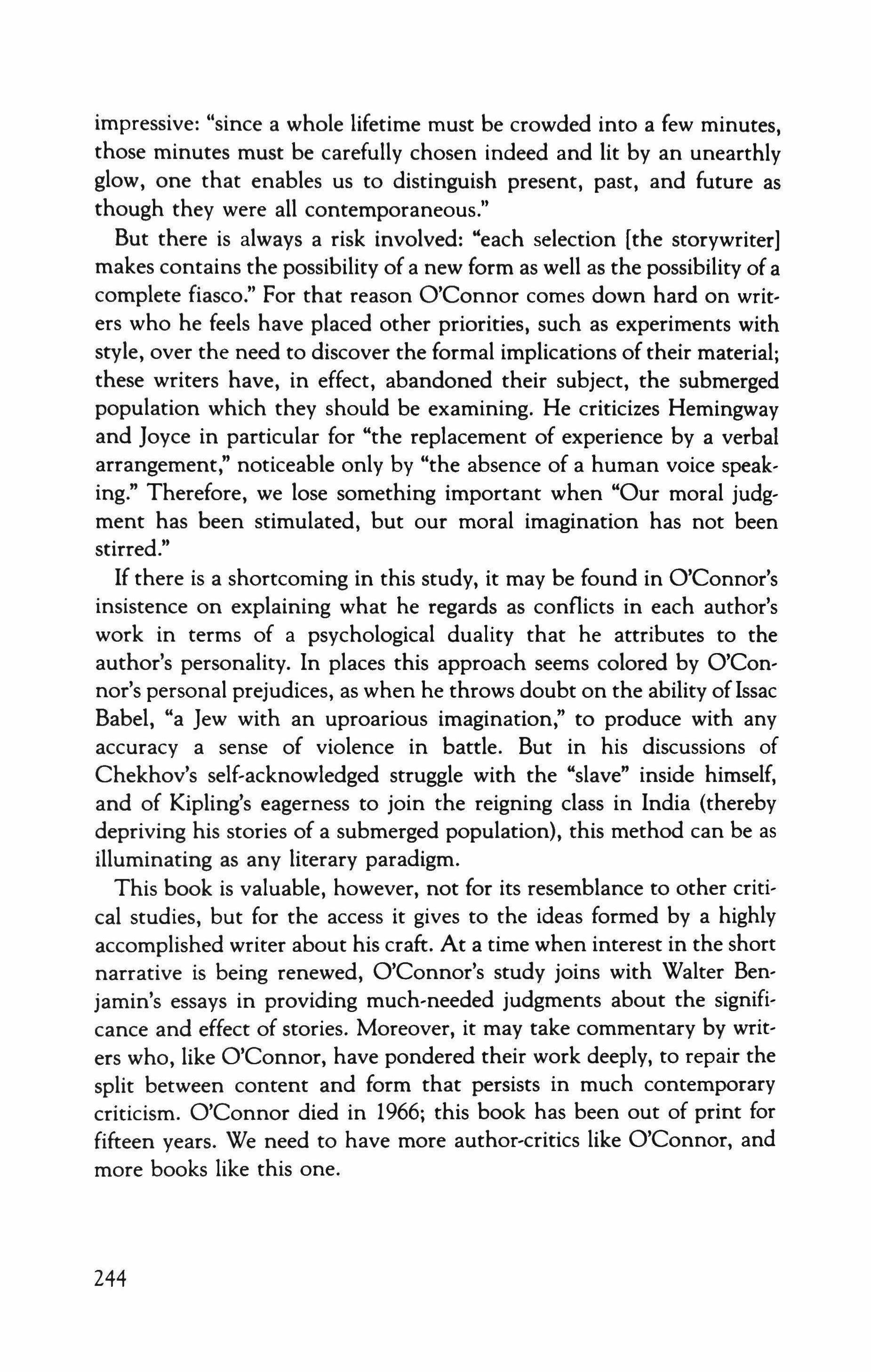
impressive: "since a whole lifetime must be crowded into a few minutes, those minutes must be carefully chosen indeed and lit by an unearthly glow, one that enables us to distinguish present, past, and future as though they were all contemporaneous."
But there is always a risk involved: "each selection [the storywriter] makes contains the possibility of a new form as well as the possibility of a complete fiasco." For that reason O'Connor comes down hard on writers who he feels have placed other priorities, such as experiments with style, over the need to discover the formal implications of their material; these writers have, in effect, abandoned their subject, the submerged population which they should be examining. He criticizes Hemingway and Joyce in particular for "the replacement of experience by a verbal arrangement," noticeable only by "the absence of a human voice speaking." Therefore, we lose something important when "Our moral judgment has been stimulated, but our moral imagination has not been stirred."
If there is a shortcoming in this study, it may be found in O'Connor's insistence on explaining what he regards as conflicts in each author's work in terms of a psychological duality that he attributes to the author's personality. In places this approach seems colored by O'Connor's personal prejudices, as when he throws doubt on the ability ofIssac Babel, "a Jew with an uproarious imagination," to produce with any accuracy a sense of violence in battle. But in his discussions of Chekhov's self-acknowledged struggle with the "slave" inside himself, and of Kipling's eagerness to join the reigning class in India (thereby depriving his stories of a submerged population), this method can be as illuminating as any literary paradigm.
This book is valuable, however, not for its resemblance to other critical studies, but for the access it gives to the ideas formed by a highly accomplished writer about his craft. At a time when interest in the short narrative is being renewed, O'Connor's study joins with Walter Benjamin's essays in providing much-needed judgments about the significance and effect of stories. Moreover, it may take commentary by writers who, like O'Connor, have pondered their work deeply, to repair the split between content and form that persists in much contemporary criticism. O'Connor died in 1966; this book has been out of print for fifteen years. We need to have more author-critics like O'Connor, and more books like this one.
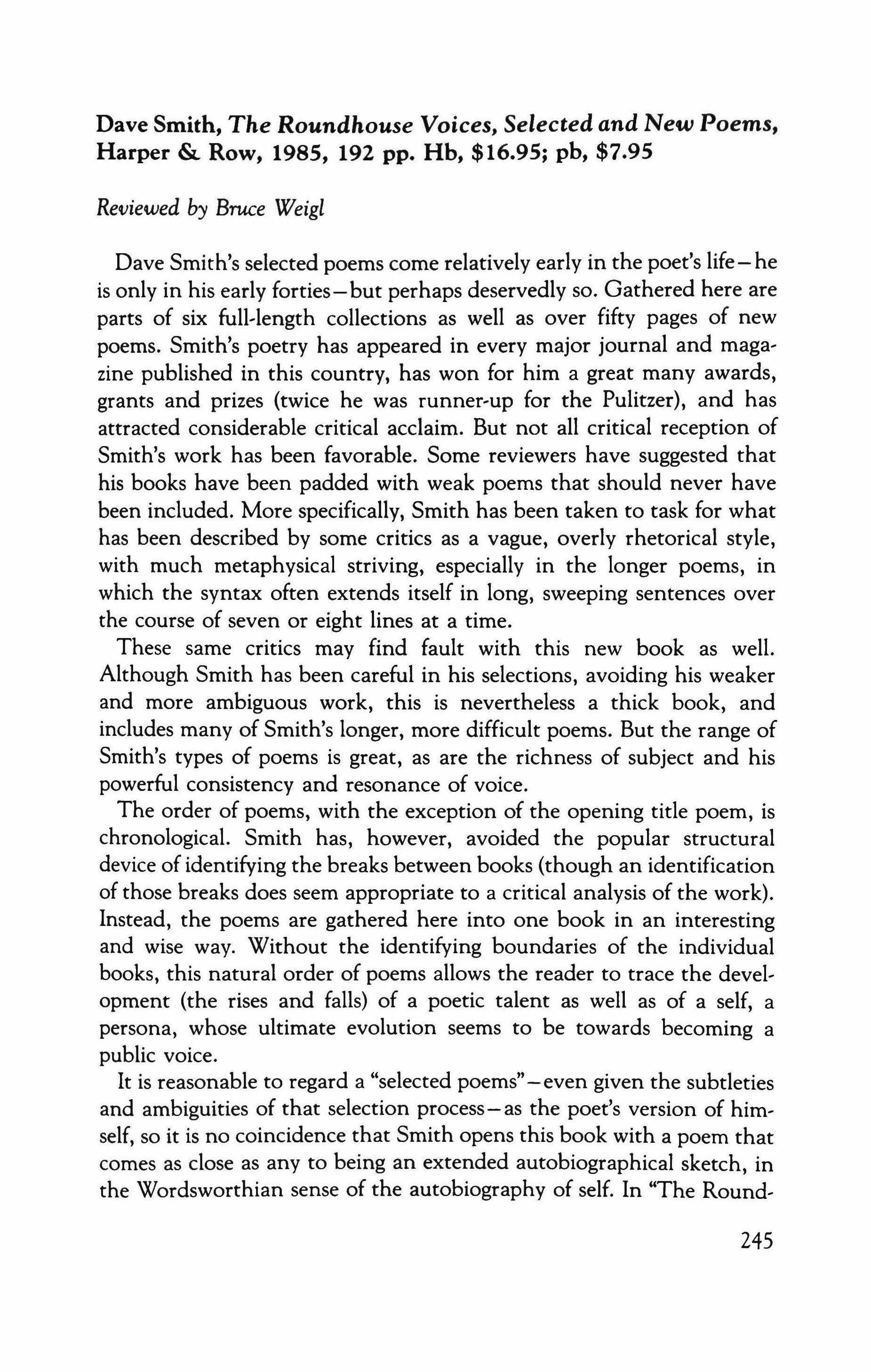
Dave Smith, The Roundhouse Voices, Selected and New Poems, Harper &. Row, 1985, 192 pp. Hb, $16.95; pb, $7.95
Dave Smith's selected poems come relatively early in the poet's life-he is only in his early forties-but perhaps deservedly so. Gathered here are parts of six full-length collections as well as over fifty pages of new poems. Smith's poetry has appeared in every major journal and magazine published in this country, has won for him a great many awards, grants and prizes (twice he was runner-up for the Pulitzer), and has attracted considerable critical acclaim. But not all critical reception of Smith's work has been favorable. Some reviewers have suggested that his books have been padded with weak poems that should never have been included. More specifically, Smith has been taken to task for what has been described by some critics as a vague, overly rhetorical style, with much metaphysical striving, especially in the longer poems, in which the syntax often extends itself in long, sweeping sentences over the course of seven or eight lines at a time.
These same critics may find fault with this new book as well. Although Smith has been careful in his selections, avoiding his weaker and more ambiguous work, this is nevertheless a thick book, and includes many of Smith's longer, more difficult poems. But the range of Smith's types of poems is great, as are the richness of subject and his powerful consistency and resonance of voice.
The order of poems, with the exception of the opening title poem, is chronological. Smith has, however, avoided the popular structural device of identifying the breaks between books (though an identification of those breaks does seem appropriate to a critical analysis of the work). Instead, the poems are gathered here into one book in an interesting and wise way. Without the identifying boundaries of the individual books, this natural order of poems allows the reader to trace the development (the rises and falls) of a poetic talent as well as of a self, a persona, whose ultimate evolution seems to be towards becoming a public voice.
It is reasonable to regard a "selected poems" -even given the subtleties and ambiguities of that selection process-as the poet's version of himself, so it is no coincidence that Smith opens this book with a poem that comes as close as any to being an extended autobiographical sketch, in the Wordsworthian sense of the autobiography of self. In "The Round-
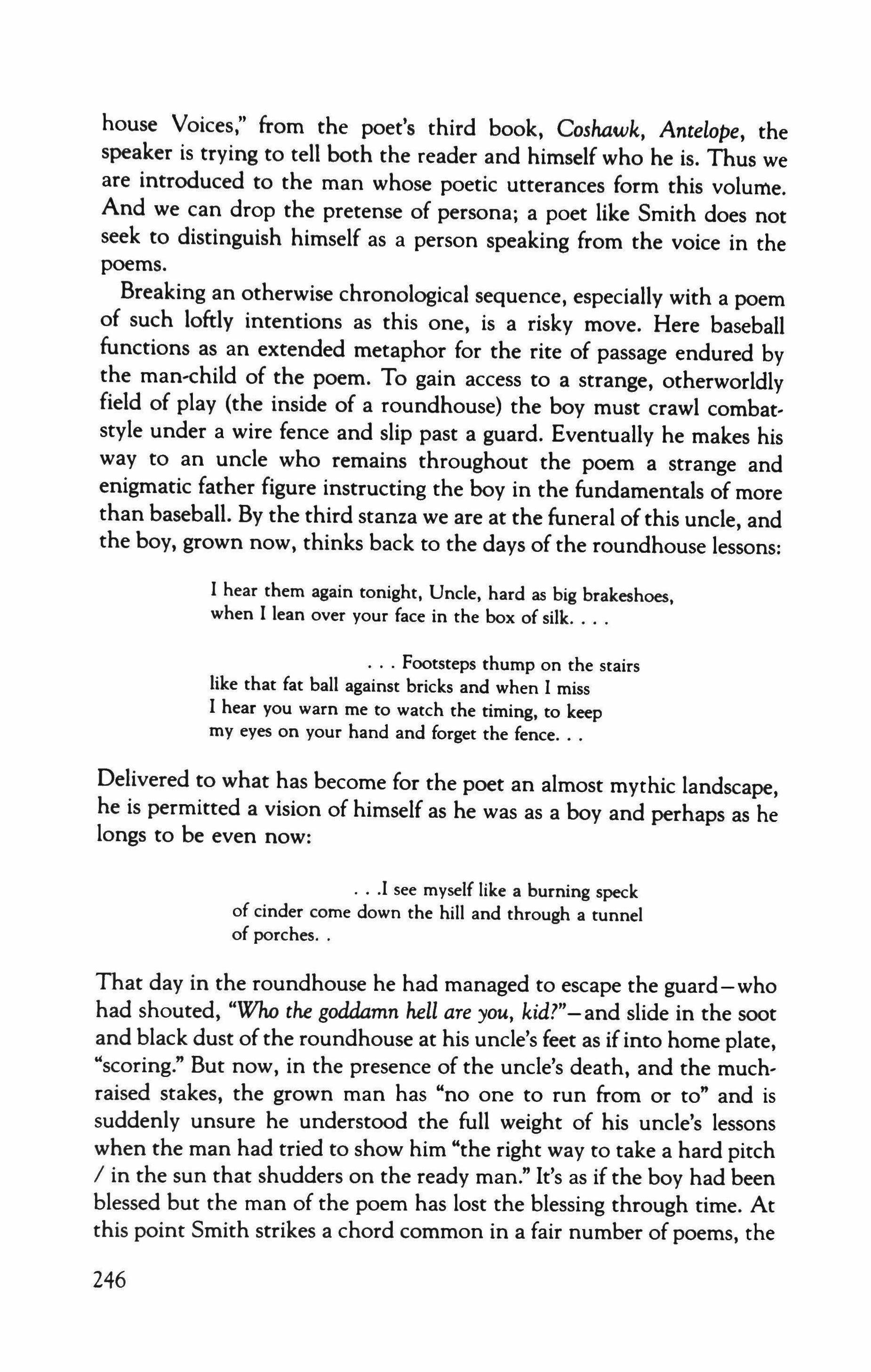
house Voices," from the poet's third book, Coshawk, Antelope, the speaker is trying to tell both the reader and himself who he is. Thus we are introduced to the man whose poetic utterances form this volume. And we can drop the pretense of persona; a poet like Smith does not seek to distinguish himself as a person speaking from the voice in the poems.
Breaking an otherwise chronological sequence, especially with a poem of such loftlv intentions as this one, is a risky move. Here baseball functions as an extended metaphor for the rite of passage endured by the man-child of the poem. To gain access to a strange, otherworldly field of play (the inside of a roundhouse) the boy must crawl combatstyle under a wire fence and slip past a guard. Eventually he makes his way to an uncle who remains throughout the poem a strange and enigmatic father figure instructing the boy in the fundamentals of more than baseball. By the third stanza we are at the funeral ofthis uncle, and the boy, grown now, thinks back to the days of the roundhouse lessons:
I hear them again tonight, Uncle, hard as big brakeshoes, when I lean over your face in the box of silk
Footsteps thump on the stairs like that fat ball against bricks and when I miss I hear you warn me to watch the timing, to keep my eyes on your hand and forget the fence
Delivered to what has become for the poet an almost mythic landscape, he is permitted a vision of himself as he was as a boy and perhaps as he longs to be even now:
.I see myself like a burning speck of cinder come down the hill and through a tunnel of porches
That day in the roundhouse he had managed to escape the guard - who had shouted, "Who the goddamn hell are you, kid?" - and slide in the soot and black dust of the roundhouse at his uncle's feet as if into horne plate, "scoring." But now, in the presence of the uncle's death, and the muchraised stakes, the grown man has "no one to run from or to" and is suddenly unsure he understood the full weight of his uncle's lessons when the man had tried to show him "the right way to take a hard pitch / in the sun that shudders on the ready man." It's as if the boy had been blessed but the man of the poem has lost the blessing through time. At this point Smith strikes a chord common in a fair number of poems, the

notion of the failure of language to sustain us. The poet longs to go back to a simpler time but the footsteps of the guard
come pounding into words and even the finger I give death is words that won't let us be what we wanted, each one chasing and being chased by dreams in the dark. Words are all we ever were and they did us no damn good
Later, in the next stanza, words are "coal-hard and they come in wings / and loops like despair and words are "skinned and numbed by too many bricks," observations which lead the reader into the final four lines of the poem:
I have had enough of them and bring them back here where the tick and creak of everything dies in your tiny starlight and I stand down on my knees to cry, Who the hell are you, kid!
It seems clear that in "The Roundhouse Voices" Smith wished to define the challenge before him. Waking to a day the speaker "did not want to see," he tries to reach back once again to the past for assistance but there is no answer. There is only his inability to connect vitally with a past cut off by death, and the empty cold rooms of the roundhouse where even hope has become an illusion and language a failed promise. It is with this recognition that the poet and-because of the poem's placement in the book-the reader, venture into the subsequent poems. But the poems, as if on their own, prove another conclusion.
From the forty-eight poems of The Fisherman's Whore Smith has selected only five, all from the book's first section, which deals largely with the abiding importance of place, specifically the Virginia coasts. Part of Smith's strategy in defining his poetic self and simultaneously developing his public voice takes the form of an intimate association of place. The poems ofthe ignored second section of The Fisherman's Whore are much more personal than those included in this volume, and in them Smith tries to project meanings outward from highly personal experience into larger, universal truths. But many of these unincluded poems do not rise above the level of forced poetic insight and a rhetoric too indulged to evoke much sympathy in the reader. Conversely, among the poems selected from the first section of The Fisherman's Whore are a few of Smith's finest.

Place has remained an essential element in Smith's work and no place has been a richer reservoir for image-making and mvth-making for him than the coasts of Virginia. Among the watermen of this area the poet found an inspiring ethic in their stubborn insistence upon living respectfully and quietly among natural elements that are often destructive and always ambivalent. In a poet who sees his role as a combatant against the world's chaos, this appropriate metaphor brings out his best. Boats, themselves, the "whores" of the fishermen, are addressed in one of these poems, "Among the Oyster Boats at Plum Tree Cove." There is a gritty quality to the language here and a spareness which reflects the sensibility of the natives. Returning to this place after he had "been away growing old / at the heart of another country / where there are no boats crumbling," Smith confesses that in his absence he had
.loosed the dead from memory but, coming back confused, I find them waiting here at the sea's rattling edge.
It is too much to speak to them, yet to them through you I bow, politely soiled and whiskered, wanting to drink, to stand under the old harsh throats sharing whiskey at Plum Tree, among the booted ones with plaid shirts and large loving hands
Unlike "The Roundhouse Voices," these poems established possibilities of renewal, and in them Smith identified the essential landscape to which he would return again and again for inspiration and for spiritual sustenance.
After the publication of The Fisherman's Whore, Smith caught fire and began a sustained six or seven years of writing that would extend through five full-length collections of poems, hundreds of pages of criticism and a novel. As an artist Smith responded well to his success with readers and editors; the more he published the more he wrote and the more he wrote the better writer he became. In Cumberland Station Smith is more able to heighten the effects of his sometimes exhausting, winding narratives with deft accentual lines. Also, the version Smith gives us here of Cumberland Station is radically different from the book itself. Cumberland Station was longer than his first book (over fifty pages) yet he has chosen to inci.de only eight of its poems here. Again his selec-

tions are advantageous, from the haunting and beautiful "On a Field Trip at Fredericksburg," where the speaker finds himself standing
above Marye's Heights, the bookbred faces of Brady's fifreen-year-old drummers, before battle, rigid as August's dandelions all the way to the Potomac rolling in my skull.
to the surprisingly unabashed celebration of poetry in the sonnet called "The Spring Poem." Also included in Smith's selection from Cumberland Station is "The Perspective & Limits of Snapshots," an intelligent poem about the limitations of art's way of capturing life. After describing in rich detail an Audrey Bodine photograph of "Menchville, I Virginia: a little dream composing a little water," Smith adroitly turns to what "Bodine fails to see," the scene behind the scene where
One oysterman thumped his noisy wife (the window was accidental) because she had a knife and mourned their boy twenty years drowned
The watermen, the poet has learned, have little use for such trivial matters as photography, especially if the subject of the camera happens to be the boats and the water where they play out their daily successes and failures. In the presence of the camera, Smith says, these men "would turn away," claiming that "there are many men I for whom the world is neither oyster nor pearl."
The most ambitious poem of this section, the one that seems most accurately to represent the direction the poet longs to take, is "Night Fishing for Blues." Smith expected much from himself in this difficult poem and in turn expects much from the reader. "Not far from where Jefferson Davis I hunched in a harrowing cell," the speaker has come upon the fishermen's dream, a feeding frenzy in which
the big-jawed Bluefish, ravenous, sleek muscle slamming at rock, at pier legs, drives into Chesapeake shallows, convoys rank after rank, wheeling through flume and flute of blood, something like hunger's throb
While he fishes he is joined suddenly by "three Negroes" who "plump down in lawn chairs, shudder- I casting into the black pod One of the blacks, a mysterious old woman, "a grandmotherly obelisk," fishes 249
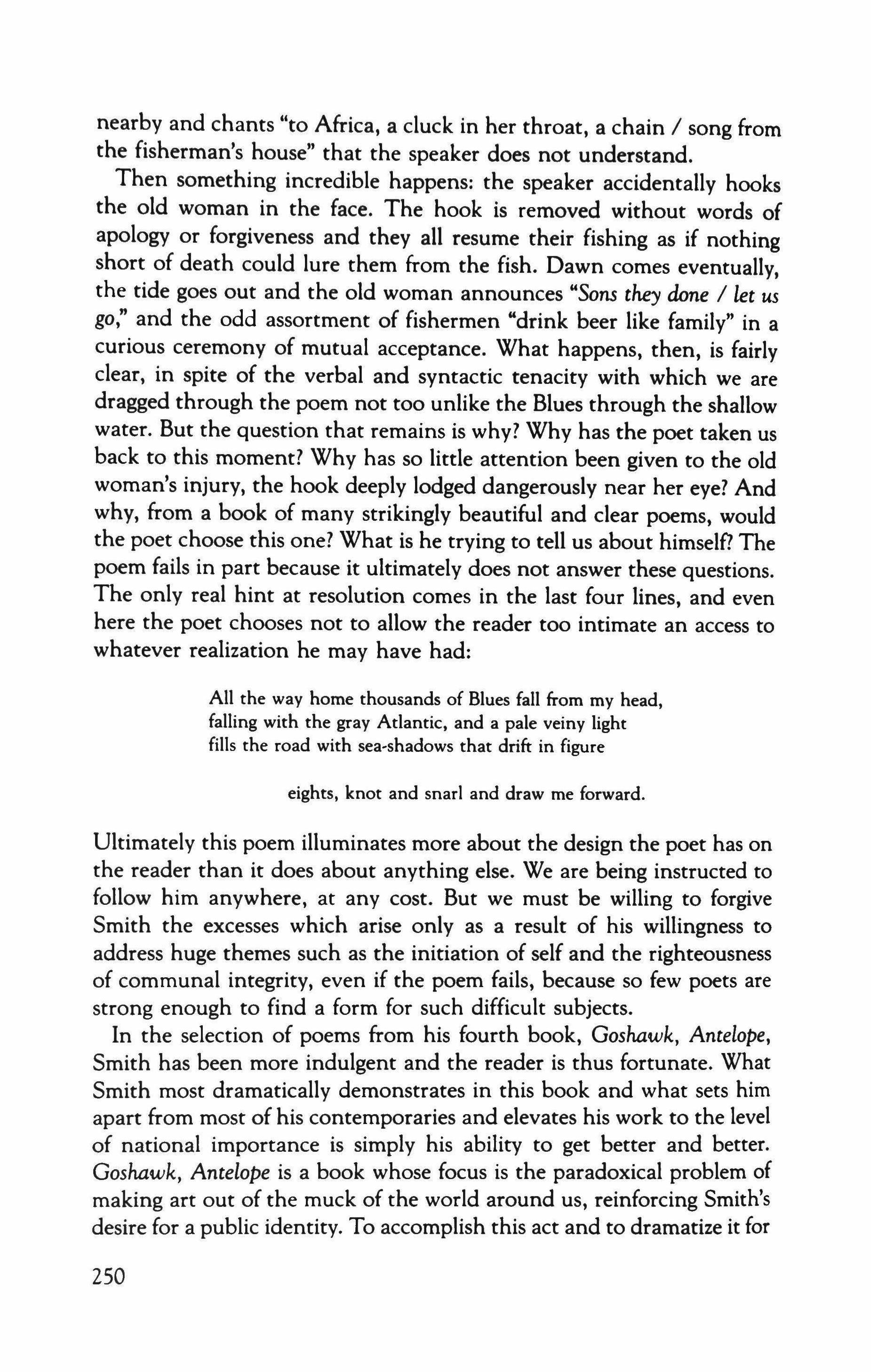
nearby and chants "to Africa, a cluck in her throat, a chain / song from the fisherman's house" that the speaker does not understand. Then something incredible happens: the speaker accidentally hooks the old woman in the face. The hook is removed without words of apology or forgiveness and they all resume their fishing as if nothing short of death could lure them from the fish. Dawn comes eventually, the tide goes out and the old woman announces "Sons they done / let us go," and the odd assortment of fishermen "drink beer like family" in a curious ceremony of mutual acceptance. What happens, then, is fairly clear, in spite of the verbal and syntactic tenacity with which we are dragged through the poem not too unlike the Blues through the shallow water. But the question that remains is why? Why has the poet taken us back to this moment? Why has so little attention been given to the old woman's injury, the hook deeply lodged dangerously near her eye? And why, from a book of many strikingly beautiful and clear poems, would the poet choose this one? What is he trying to tell us about himself? The poem fails in part because it ultimately does not answer these questions. The only real hint at resolution comes in the last four lines, and even here the poet chooses not to allow the reader too intimate an access to whatever realization he may have had:
All the way home thousands of Blues fall from my head, falling with the gray Atlantic, and a pale veiny light fills the road with sea-shadows that drift in figure
eights, knot and snarl and draw me forward.
Ultimately this poem illuminates more about the design the poet has on the reader than it does about anything else. We are being instructed to follow him anywhere, at any cost. But we must be willing to forgive Smith the excesses which arise only as a result of his willingness to address huge themes such as the initiation of self and the righteousness of communal integrity, even if the poem fails, because so few poets are strong enough to find a form for such difficult subjects. In the selection of poems from his fourth book, Goshawk, Antelope, Smith has been more indulgent and the reader is thus fortunate. What Smith most dramatically demonstrates in this book and what sets him apart from most of his contemporaries and elevates his work to the level of national importance is simply his ability to get better and better. Goshawk, Antelope is a book whose focus is the paradoxical problem of making art out of the muck of the world around us, reinforcing Smith's desire for a public identity. To accomplish this act and to dramatize it for

the readers' sake, Smith confronts nature and the irony of man's pres' ence in nature so that each poem represents a struggle, on the page and in the heart, of man "fumbling / for love, for living words / that might be knowledge" ("Messengerj. So he works against the bleaker view of "The Roundhouse Voices."
Each of the four sections of the complete book begins with a long poem of at least three and one'half pages, and each of these four long poems establishes theme, predominant image, tone and voice for the subsequent poems. These elements function as leitmotifs carefully orchestrated through each section and through the book as a whole. One of these long poems was "The Roundhouse Voices," and another, "Messenger," opens this selection from Goshawk, Antelope, and thus echoing the original book's structure. The effect is stunning in the way Smith's growing repertoire as a poet is fitted into such a neat and precise excerpted group of fourteen poems.
Place and the pathology of family are now subdued to larger more universal emotions as the poet gradually assumes his role as public voice. Many of the poems of Goshawk, Antelope are difficult and extremely demanding. Because the poet has so unequivocally given himself to the transforming power oflanguage and imagination, he has trouble sustain, ing the intensity necessary to demonstrate the seriousness of his journey of discovery. But cut back to arguably the best thirty pages of a book of over one hundred pages, the load has been lightened considerably.
All of Smith's themes converge in "Under the Scrub Oak, A Red Shoe," as the poet delivers us "back / along an arroyo twisting and empty as memory" to yet another confrontation with the "black historical facts of life's event" ("Messenger"). We are carried back with the poet to adolescence (the literal adolescence of the boy of the poem and the figurative adolescence of the developing self), and to "one of those nights the breath / aches it is so pleased with itself." As well as the transformation of the poet into "listener" in the world, the poem also reveals the true and unadorned self: the "red-blooded buck" is presented as an unthinking, robot-like figure who sulks through the hazy landscape of the poem, hot for some kind of contact, eventually dramatized through a romanticized sexual encounter with a nameless woman.
However tainted and awkward this contact has been, it is also a striking affirmation of life and a promise of more, of "what waits," the whole of living-in Keatsian terms, Smith wants to suggest-which must include the harsh and unforgiving, but which also always touches us with knowledge. There are more lyrical, less insistent poems from Goshawk, Antelope such as "The Collector of the Sun," "In the Yard, Late
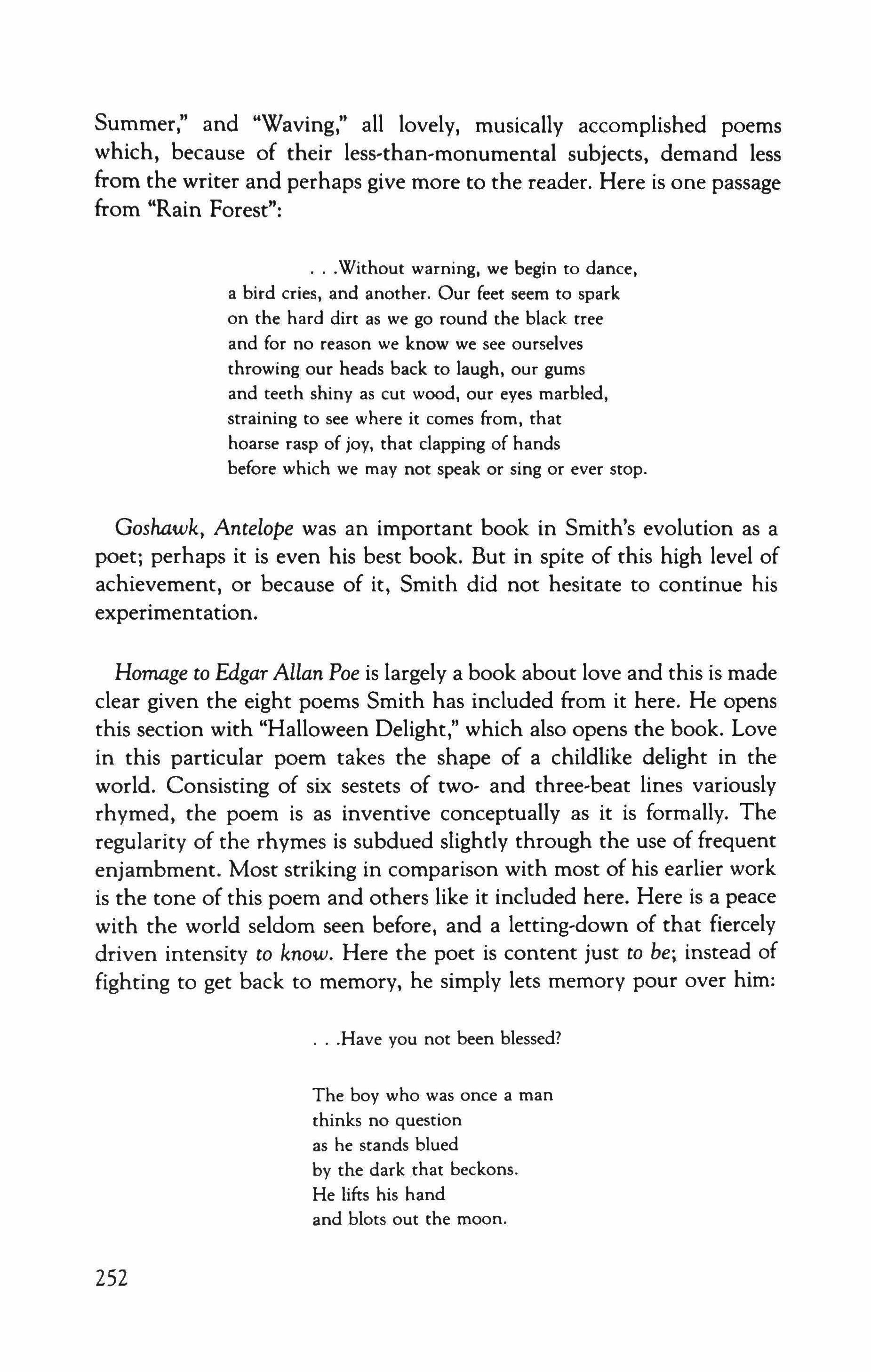
Summer," and "Waving," all lovely, musically accomplished poems which, because of their less-than-monumental subjects, demand less from the writer and perhaps give more to the reader. Here is one passage from "Rain Forest":
Without warning, we begin to dance, a bird cries, and another. Our feet seem to spark on the hard dirt as we go round the black tree and for no reason we know we see ourselves throwing our heads back to laugh, our gums and teeth shiny as cut wood, our eyes marbled, straining to see where it comes from, that hoarse rasp of joy, that clapping of hands before which we may not speak or sing or ever stop.
Goshawk, Antelope was an important book in Smith's evolution as a poet; perhaps it is even his best book. But in spite of this high level of achievement, or because of it, Smith did not hesitate to continue his experimentation.
Homage to Edgar Allan Poe is largely a book about love and this is made clear given the eight poems Smith has included from it here. He opens this section with "Halloween Delight," which also opens the book. Love in this particular poem takes the shape of a childlike delight in the world. Consisting of six sestets of two- and three-beat lines variously rhymed, the poem is as inventive conceptually as it is formally. The regularity of the rhymes is subdued slightly through the use of frequent enjambment. Most striking in comparison with most of his earlier work is the tone of this poem and others like it included here. Here is a peace with the world seldom seen before, and a letting-down of that fiercely driven intensity to know. Here the poet is content just to be; instead of fighting to get back to memory, he simply lets memory pour over him:
Have you not been blessed?
The boy who was once a man thinks no question as he stands blued by the dark that beckons. He lifts his hand and blots out the moon.

You have done this, long ago. Perhaps you remember. And recall that toy now, and a night offfar watching apples as a boy. They danced in the wind-blow.
Similar poems included here are "Reading the Books Our Children Have Written," a touching prose poem about the continuity of family and the easy, unquestionable love among young children and their parents; and "Pond," a poem in celebration of the last time you were in love, the vertigo, the skidding infinite sky, the lily's perfect. opening moves
These lyrics contrast sharply with the thicker, more conceptually ambitious poems which are sometimes unable to bear the weight of their own lush rhetoric, such as "Nekkid: Homage to Edgar Allan Poe." It is difficult to get a fix on the tone of this poem. Because the poet juxtaposes almost whimsical imagery of a young boy's description of his unwanted summer-camp trip with much more serious moments of first, uncorrupted love, it is never quite clear how we are to feel about the characters of the poem. Here our acceptance of Smith's unusual marriage of speaker with dead poet depends largely upon the poem's irony being clear and sharp and direct; unfortunately it is not. "Portrait ofLady" and "Wedding Song" suffer similarly; despite their rich and inventive language and generous emotions, these poems often feel forced, their con, ceptual devices too near the surface of the poem, so that the drama does not unfold as naturally as in Smith's best poems of this kind.
But these difficulties are quickly and easily forgotten as we make our way into the next fifty pages, chosen from Smith's sixth full-length collection, Dream Flights. These are remarkable, linguistically muscular poems whose honesty and aesthetic achievement are unquestionable. Like much of the book from which these poems were selected, these poems return to the poet's Virginia coastal landscapes, where he was first driven to make sense of the world with words. The time and distance away from his native soil have made his appraisal of his home, land and its ghosts less romanticized than earlier, similar versions, and informed by a maturity of vision that allows the poet to wander his physical and imaginative landscapes freely; from these free-flights comes some of Smith's best work, mostly in the form of longer, meditative
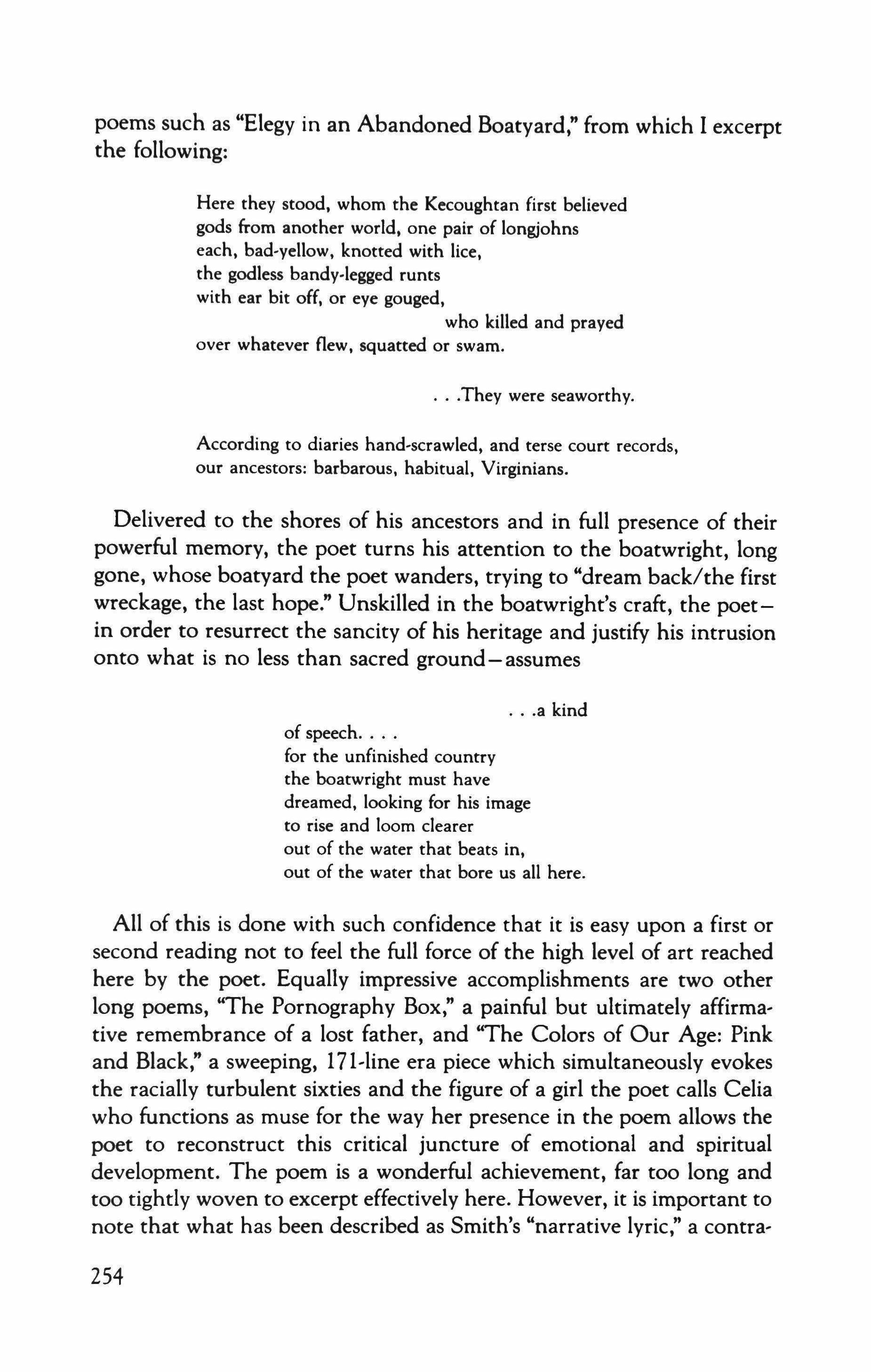
poems such as "Elegy in an Abandoned Boatyard," from which 1 excerpt the following:
Here they stood, whom the Kecoughtan first believed gods from another world, one pair of longjohns each, bad-yellow, knotted with lice, the godless bandy-legged runts with ear bit off, or eye gouged, who killed and prayed over whatever flew, squatted or swam
They were seaworthy.
According to diaries hand-scrawled, and terse court records, our ancestors: barbarous, habitual, Virginians.
Delivered to the shores of his ancestors and in full presence of their powerful memory, the poet turns his attention to the boatwright, long gone, whose boatyard the poet wanders, trying to "dream back/the first wreckage, the last hope." Unskilled in the boatwright's craft, the poetin order to resurrect the sancity of his heritage and justify his intrusion onto what is no less than sacred ground - assumes a kind of speech for the unfinished country the boatwright must have dreamed, looking for his image to rise and loom clearer out of the water that beats in, out of the water that bore us all here.
All of this is done with such confidence that it is easy upon a first or second reading not to feel the full force of the high level of art reached here by the poet. Equally impressive accomplishments are two other long poems, "The Pornography Box," a painful but ultimately affirmative remembrance of a lost father, and "The Colors of Our Age: Pink and Black," a sweeping, I71-line era piece which simultaneously evokes the racially turbulent sixties and the figure of a girl the poet calls Celia who functions as muse for the way her presence in the poem allows the poet to reconstruct this critical juncture of emotional and spiritual development. The poem is a wonderful achievement, far too long and too tightly woven to excerpt effectively here. However, it is important to note that what has been described as Smith's "narrative lyric," a contra-

diction resolved by his ability to marry powerful, driving narrative with richly inventive imagery, comes to full maturity in this poem and in others like it from this section. Only in one poem, "The Traveling Photographer: Circa 1880," is there a slight wavering of intensity, and even here the poem's weaknesses (a strained original conception to which the poet is perhaps too faithful, and a sometimes excessive linguistic virtuosity) are at least equalled by its grand successes-most significandy Smith's ability to sustain the intensity of the speaker's felt reality. With these poems-in which Smith has brought together realism and pathos; the hard, gritty language of his native place; grand and lofty phrases; the music of the language which we speak and imagine and finely controlled accentual rhythms-Smith establishes himself as a poet rigorously devoted to his craft and worthy of our close scrutiny and ultimately our high praise.
In the poems selected from Smith's seventh and most recent full, length collection, In the House of the Judge, the poet most fully and rightfully realizes his role as public voice. The thirteen poems selected for inclusion here have in common a passionate intermingling of Whit, manesque American mysticism with Smith's penchant for capturing epiphanic moments of personal and universal history and compressing them into vivid cadences.
Perhaps more than any other representative selection in this Selected and New Poems, the poems presented here provide the reader with an accurate representation of the book they came from. As is the case throughout this entire selection, what remains essentially consistent here is the quality of voice. And though Smith repeats himself in terms of subject matter, syntactical strategies and allegorical tendencies, he returns to these familiar places physical and metaphysical with such a heightened awareness of his own voice that the poems are never redundant. He is like a trained singer now, feeling his way gracefully through the modulations of his songs, extending himself further into a visionary frame of reference so that those people and places he turns his good eye to are illuminated. That this illumination is especially brilliant when the subject is Smith's native Virginia is no coincidence. The love the speaker feels for this landscape is infectious and the movement of consciousness over the barriers of time graceful and adroit, as in the following passages from "Of Oystermen, Workboats":
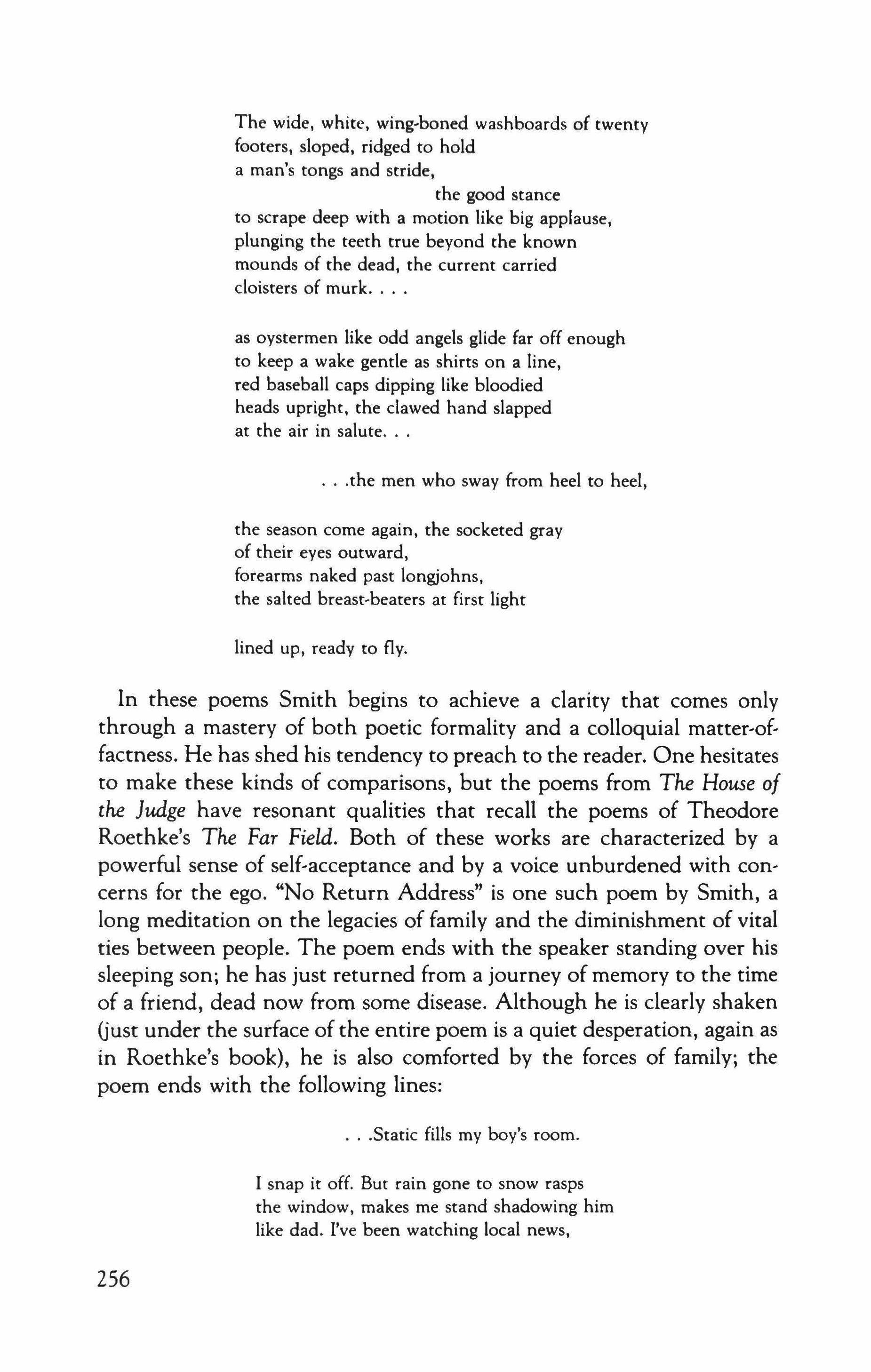
The wide, white, wing-boned washboards of twenty footers, sloped, ridged to hold a man's tongs and stride, the good stance to scrape deep with a motion like big applause, plunging the teeth true beyond the known mounds of the dead, the current carried cloisters of murk as oystermen like odd angels glide far off enough to keep a wake gentle as shirts on a line, red baseball caps dipping like bloodied heads upright, the clawed hand slapped at the air in salute
the men who sway from heel to heel, the season come again, the socketed gray of their eyes outward, forearms naked past longjohns, the salted breast-beaters at first light lined up, ready to fly.
In these poems Smith begins to achieve a clarity that comes only through a mastery of both poetic formality and a colloquial matter-offactness. He has shed his tendency to preach to the reader. One hesitates to make these kinds of comparisons, but the poems from The House of the Judge have resonant qualities that recall the poems of Theodore Roethke's The Far Field. Both of these works are characterized by a powerful sense of self-acceptance and by a voice unburdened with concerns for the ego. "No Return Address" is one such poem by Smith, a long meditation on the legacies of family and the diminishment of vital ties between people. The poem ends with the speaker standing over his sleeping son; he has just returned from a journey of memory to the time of a friend, dead now from some disease. Although he is clearly shaken (just under the surface of the entire poem is a quiet desperation, again as in Roethke's book), he is also comforted by the forces of family; the poem ends with the following lines:
Static fills my boy's room.
I snap it off. But rain gone to snow rasps the window, makes me stand shadowing him like dad. I've been watching local news,
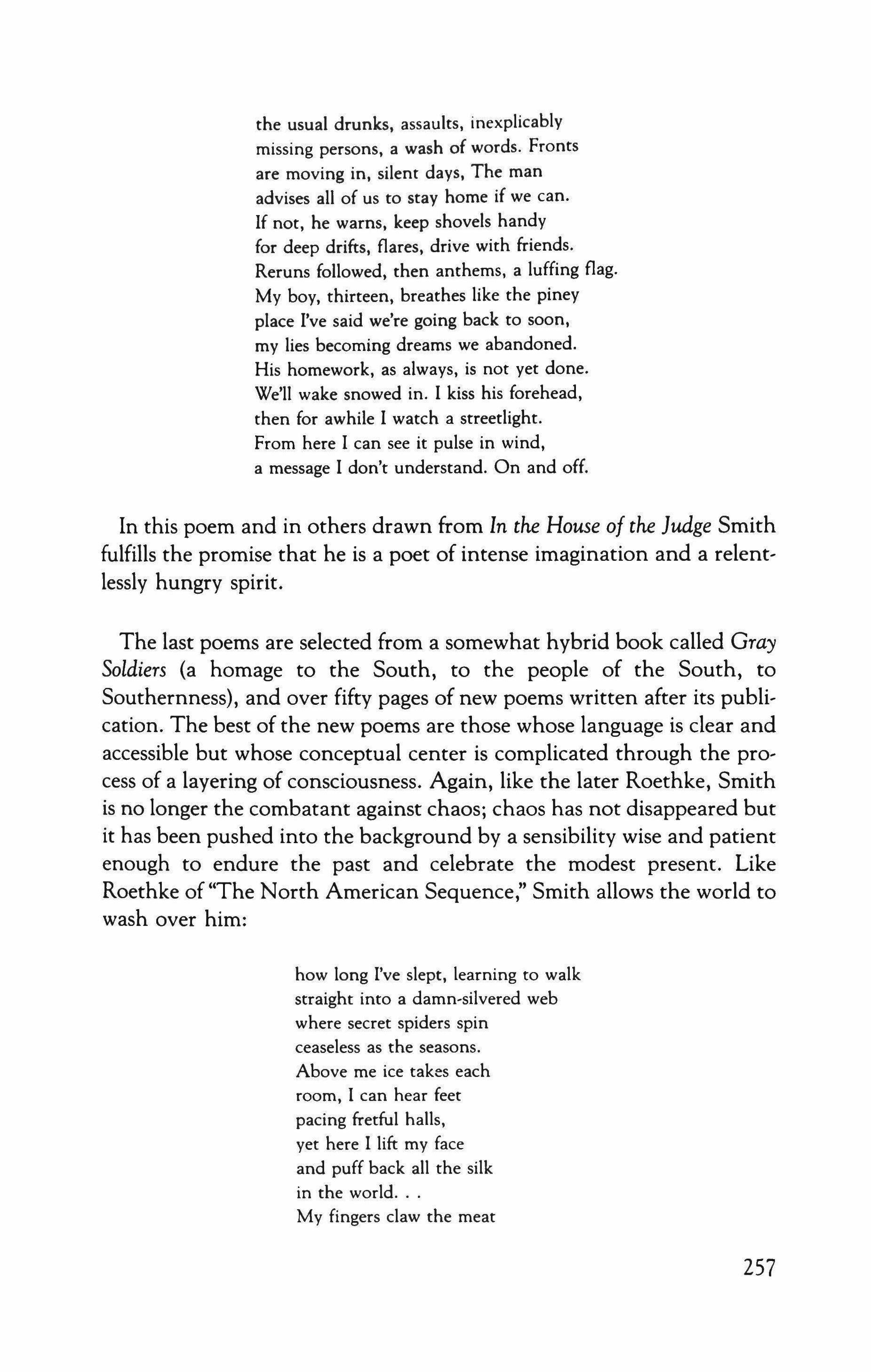
the usual drunks, assaults, inexplicably missing persons, a wash of words. Fronts are moving in, silent days, The man advises all of us to stay home if we can. If not, he warns, keep shovels handy for deep drifts, flares, drive with friends. Reruns followed, then anthems, a luffing flag. My boy, thirteen, breathes like the piney place I've said we're going back to soon, my lies becoming dreams we abandoned. His homework, as always, is not yet done. We'll wake snowed in. I kiss his forehead, then for awhile I watch a streetlight. From here I can see it pulse in wind, a message I don't understand. On and off.
In this poem and in others drawn from In the House of the Judge Smith fulfills the promise that he is a poet of intense imagination and a relentlessly hungry spirit.
The last poems are selected from a somewhat hybrid book called Gray Soldiers (a homage to the South, to the people of the South, to Southernness), and over fifty pages of new poems written after its publication. The best of the new poems are those whose language is clear and accessible but whose conceptual center is complicated through the process of a layering of consciousness. Again, like the later Roethke, Smith is no longer the combatant against chaos; chaos has not disappeared but it has been pushed into the background by a sensibility wise and patient enough to endure the past and celebrate the modest present. Like Roethke of "The North American Sequence," Smith allows the world to wash over him:
how long I've slept, learning to walk straight into a damn-silvered web where secret spiders spin ceaseless as the seasons.
Above me ice takes each room, I can hear feet pacing fretful halls, yet here I lift my face and puff back all the silk in the world.
My fingers claw the meat

of family stillness, parting all the way to seeds.
The selection of new poems also includes a great deal of formal experimentation, sometimes successful, sometimes not, and a point of view that is curiously more distant than before. This distance comes as an inevitable result of Smith's growth and development as a poet. He no longer feels compelled to give the self a starring role in the poems; now all of the poet's energy can be focused on the "other," and the "I" functions mostly as a storyteller, artfully manipulating his tales behind the scenes.The lovely "Guinea Hens" is one such poem:
They wait where the dirt unspools, round and plump as mock oranges, almost invisible in the black pines, their thousands of pinched, hurt faces all turning at once when I come home
The night ought to make me remember things get tricky on a road like this, the river's tongue luffing, the twin red glow of eyes that watch, but the world never helps a bit: it hides each bump and rut, it summons one bird to scream like the down-flung dead in memory where bottles smirk. Lying beside my love, I can see coming home is the same pitched, lucky flight into air the hen keeps. Black, sullen she waits with her grip on this place. Whatever the world says, she's ready to cackle, crow, rage, strut, and be by morning soft in new light, nibbling.
Dave Smith has come so far in search of the right words and has already given us so many daring and memorable poems that he has earned the right to be heard and studied with at least a small portion of the huge passion it took to make these poems.
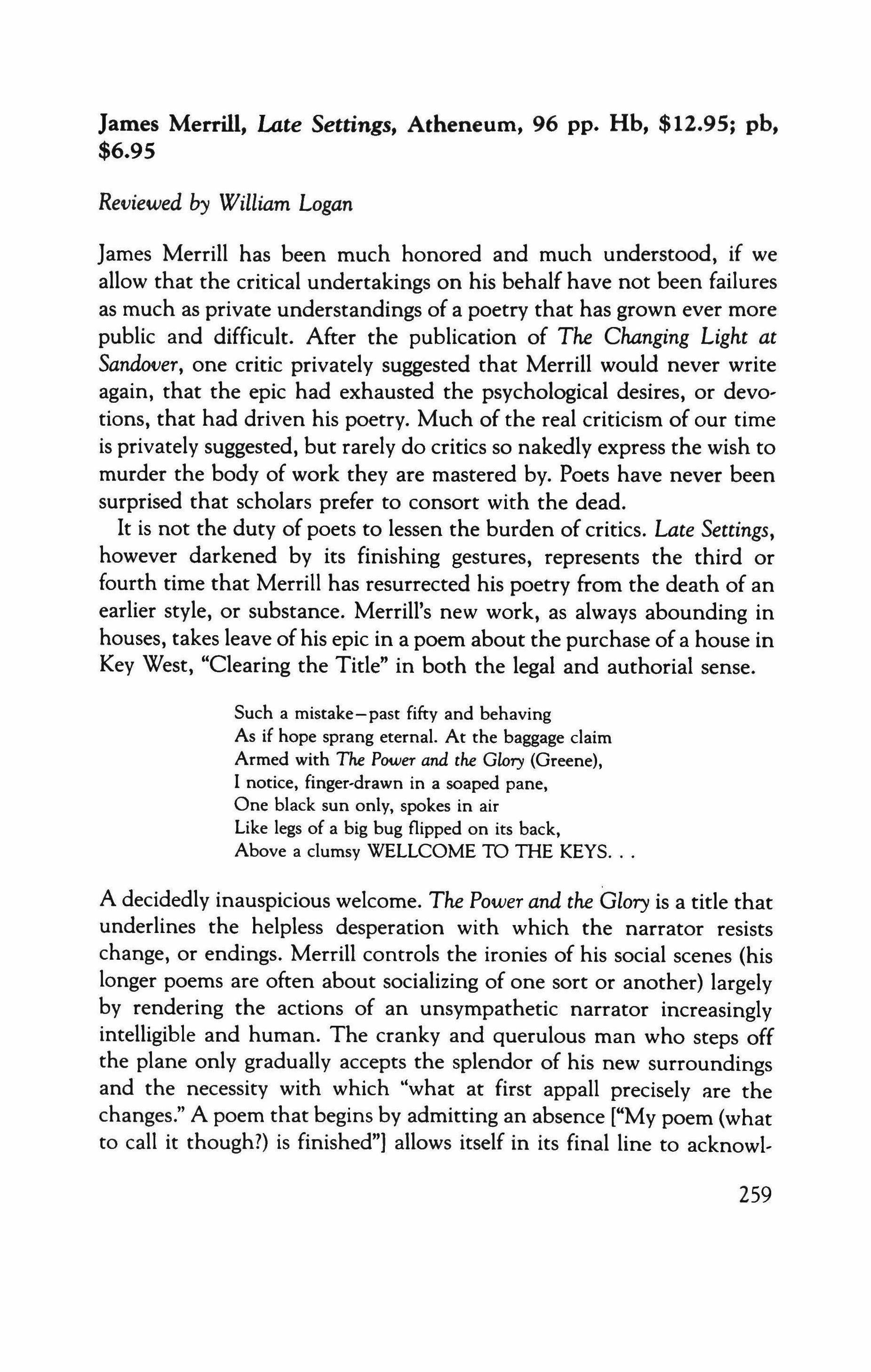
James Merrill, Late Settings, Atheneum, 96 pp, Hb, $12.95; pb, $6.95
James Merrill has been much honored and much understood, if we allow that the critical undertakings on his behalf have not been failures as much as private understandings of a poetry that has grown ever more public and difficult. After the publication of The Changing Light at Sandover, one critic privately suggested that Merrill would never write again, that the epic had exhausted the psychological desires, or devotions, that had driven his poetry. Much of the real criticism of our time is privately suggested, but rarely do critics so nakedly express the wish to murder the body of work they are mastered by. Poets have never been surprised that scholars prefer to consort with the dead. It is not the duty of poets to lessen the burden of critics. Late Settings, however darkened by its finishing gestures, represents the third or fourth time that Merrill has resurrected his poetry from the death of an earlier style, or substance. Merrill's new work, as always abounding in houses, takes leave of his epic in a poem about the purchase of a house in Key West, "Clearing the Title" in both the legal and authorial sense.
Such a mistake-past fifty and behaving As if hope sprang eternal. At the baggage claim Armed with The Power and the Glory (Greene), I notice, finger-drawn in a soaped pane, One black sun only, spokes in air Like legs of a big bug flipped on its back, Above a clumsy WELLCOME TO THE KEYS
A decidedly inauspicious welcome. The Power and the Glory is a title that underlines the helpless desperation with which the narrator resists change, or endings. Merrill controls the ironies of his social scenes (his longer poems are often about socializing of one sort or another) largely by rendering the actions of an unsympathetic narrator increasingly intelligible and human. The cranky and querulous man who steps off the plane only gradually accepts the splendor of his new surroundings and the necessity with which "what at first appall precisely are the changes." A poem that begins by admitting an absence ["My poem (what to call it though?) is finished"] allows itself in its final line to acknowl-
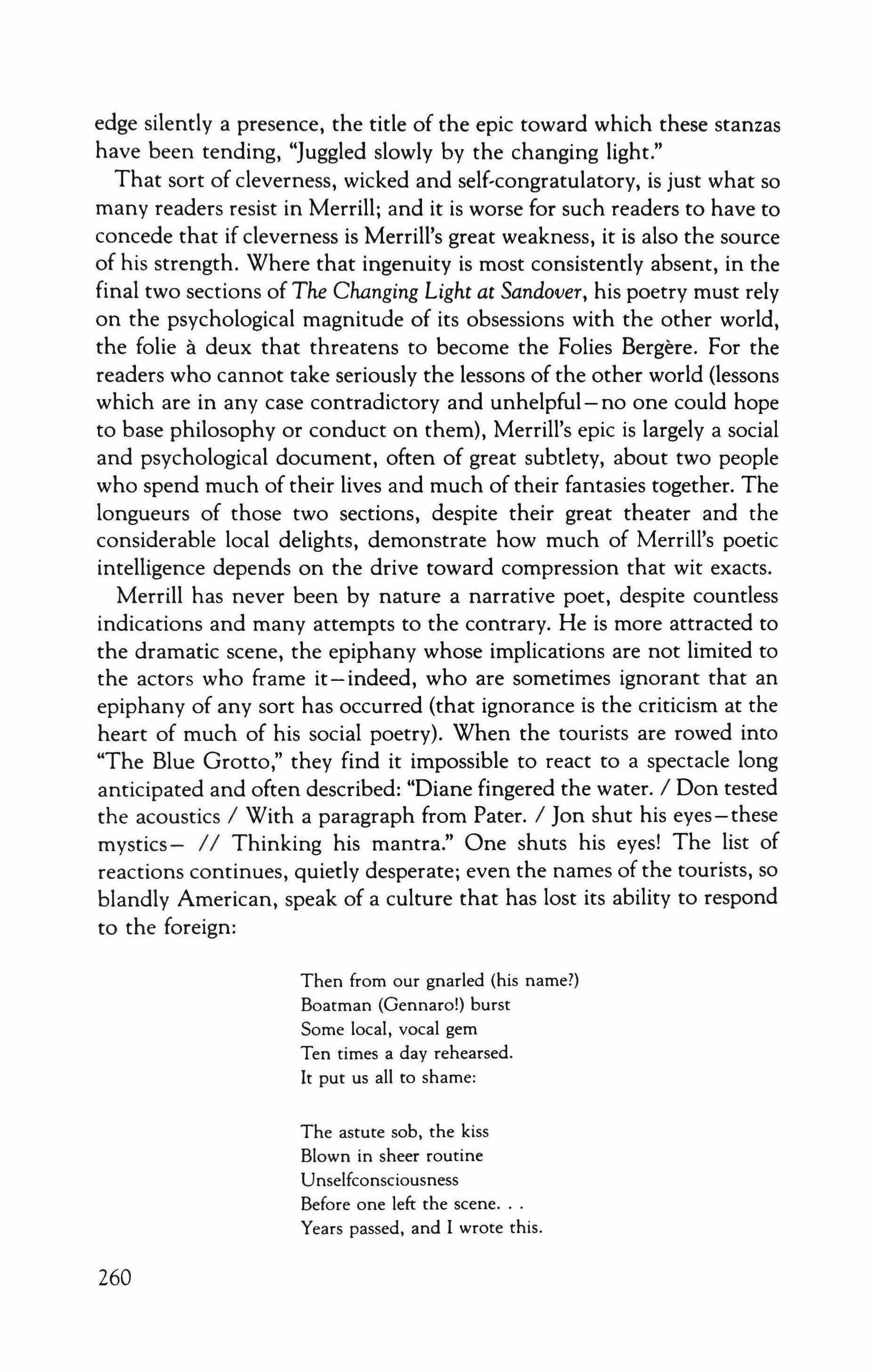
edge silently a presence, the title of the epic toward which these stanzas have been tending, "Juggled slowly by the changing light."
That sort of cleverness, wicked and self-congratulatory, is just what so many readers resist in Merrill; and it is worse for such readers to have to concede that if cleverness is Merrill's great weakness, it is also the source of his strength. Where that ingenuity is most consistently absent, in the final two sections of The Changing Light at Sandover, his poetry must rely on the psychological magnitude of its obsessions with the other world, the folie a deux that threatens to become the Folies Bergere. For the readers who cannot take seriously the lessons of the other world (lessons which are in any case contradictory and unhelpful- no one could hope to base philosophy or conduct on them), Merrill's epic is largely a social and psychological document, often of great subtlety, about two people who spend much of their lives and much of their fantasies together. The longueurs of those two sections, despite their great theater and the considerable local delights, demonstrate how much of Merrill's poetic intelligence depends on the drive toward compression that wit exacts.
Merrill has never been by nature a narrative poet, despite countless indications and many attempts to the contrary. He is more attracted to the dramatic scene, the epiphany whose implications are not limited to the actors who frame it-indeed, who are sometimes ignorant that an epiphany of any sort has occurred (that ignorance is the criticism at the heart of much of his social poetry). When the tourists are rowed into "The Blue Grotto," they find it impossible to react to a spectacle long anticipated and often described: "Diane fingered the water. / Don tested the acoustics / With a paragraph from Pater. / Jon shut his eyes-these mystics - // Thinking his mantra." One shuts his eyes! The list of reactions continues, quietly desperate; even the names of the tourists, so blandly American, speak of a culture that has lost its ability to respond to the foreign:
Then from our gnarled (his name?) Boatman (Gennaro!) burst
Some local, vocal gem
Ten times a day rehearsed. It put us all to shame:
The astute sob, the kiss
Blown in sheer routine
Unselfconsciousness
Before one left the scene
Years passed, and I wrote this.
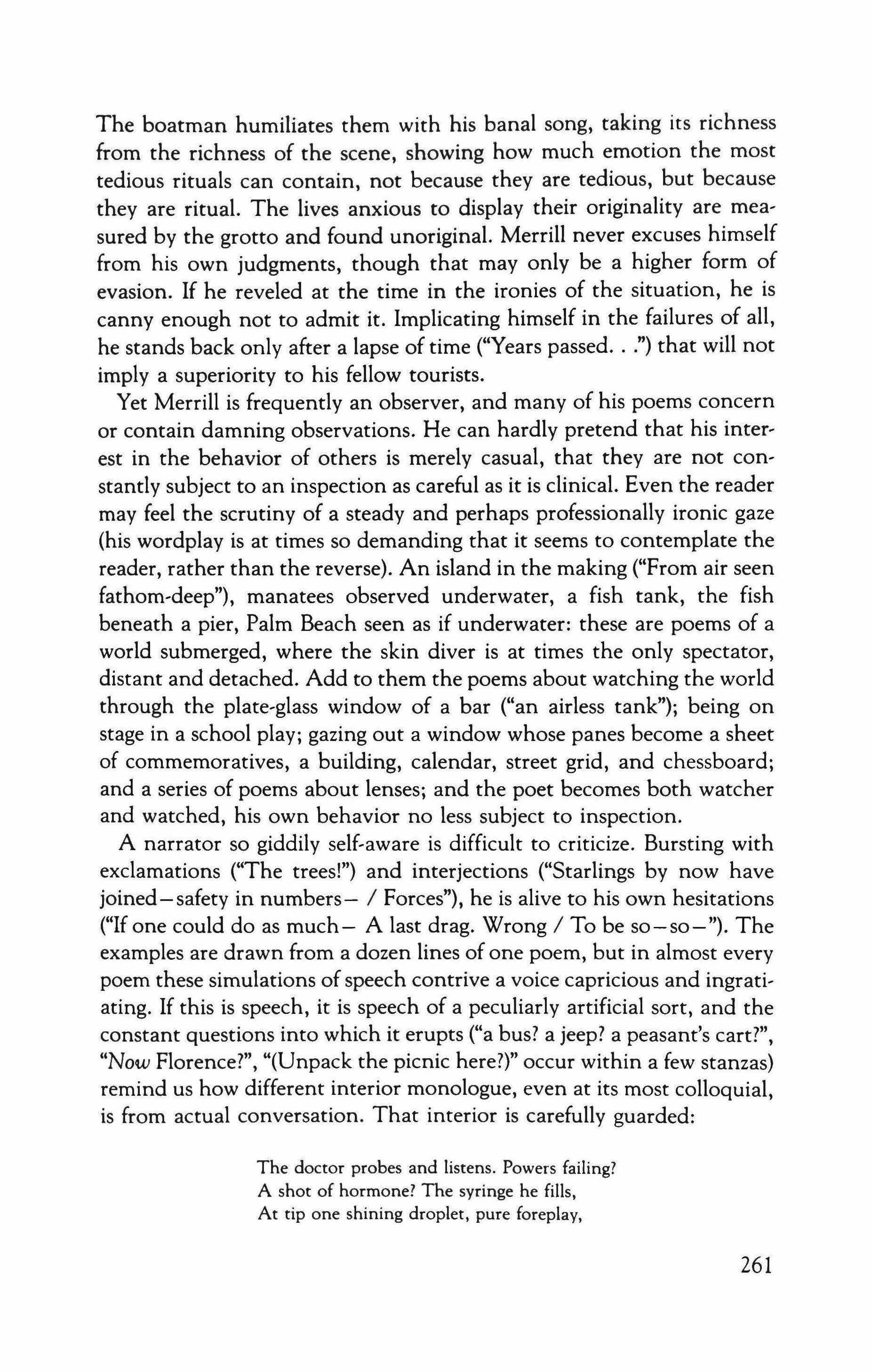
The boatman humiliates them with his banal song, taking its richness from the richness of the scene, showing how much emotion the most tedious rituals can contain, not because they are tedious, but because they are ritual. The lives anxious to display their originality are mea' sured by the grotto and found unoriginal. Merrill never excuses himself from his own judgments, though that may only be a higher form of evasion. If he reveled at the time in the ironies of the situation, he is canny enough not to admit it. Implicating himself in the failures of all, he stands back only after a lapse of time {"Years passed "} that will not imply a superiority to his fellow tourists.
Yet Merrill is frequently an observer, and many of his poems concern or contain damning observations. He can hardly pretend that his inter, est in the behavior of others is merely casual, that they are not con, stantly subject to an inspection as careful as it is clinical. Even the reader may feel the scrutiny of a steady and perhaps professionally ironic gaze (his wordplay is at times so demanding that it seems to contemplate the reader, rather than the reverse). An island in the making ("From air seen fathom-deep"), manatees observed underwater, a fish tank, the fish beneath a pier, Palm Beach seen as if underwater: these are poems of a world submerged, where the skin diver is at times the only spectator, distant and detached. Add to them the poems about watching the world through the plate-glass window of a bar ("an airless tank"); being on stage in a school play; gazing out a window whose panes become a sheet of commemoratives, a building, calendar, street grid, and chessboard; and a series of poems about lenses; and the poet becomes both watcher and watched, his own behavior no less subject to inspection.
A narrator so giddily self, aware is difficult to criticize. Bursting with exclamations ("The trees!") and interjections ("Starlings by now have joined-safety in numbers- / Forces"), he is alive to his own hesitations ("If one could do as much- A last drag. Wrong / To be so-so-"). The examples are drawn from a dozen lines of one poem, but in almost every poem these simulations of speech contrive a voice capricious and ingratiating. If this is speech, it is speech of a peculiarly artificial sort, and the constant questions into which it erupts ("a bus? a jeep? a peasant's cart?", "Now Florence?", "(Unpack the picnic here?)" occur within a few stanzas) remind us how different interior monologue, even at its most colloquial, is from actual conversation. That interior is carefully guarded:
The doctor probes and listens. Powers failing? A shot of hormone? The syringe he fills, At tip one shining droplet, pure foreplay,

Sinks into muscle. And on the third day Desire floods the old red studio. A figure reincarnate, wings outspread, Full quiver, eager lips, from years agoMy Eros to the life-awaits unveiling. Friends, here is salvation! Are you blind? Here, under the dumb layers which unwind I somehow cannot. Tanglingly opaque, They're nothing if not me. The hidden god, Unknelt-to, feels himself to be a fake
(from "Bronze")
No reader could hope to fathom the depths this poet insists on (indeed, his occasional obscurity seems part of this pleasure in concealment), but he insists on them precisely because he fears that they may not exist. Like the Invisible Man, he may vanish when the bandages are removed, the wrappings unwound. Much of Merrill's work has been an elaborate confirmation of identity, yet the character his poems create is more mercurial than that of any of his contemporaries. If he has confounded those early critics who found in his work only surfaces, it has not been by denying the fascination with surfaces which orders his imagination. Part of this book is defined by the-for me, weaker-poems still devoted merely to objects, an arc light, say, or a radiometer. In his best work he takes as his subject the concern with surface or social being, the unease which even elaborate defenses cannot fend off. He has never been a superficial poet, only a poet whose surfaces are meant to defend against his depths.
The atmosphere of Merrill's poems has often been a disadvantage. Cultivated, leisured, privileged with "the mixed blessings of a first-rate / Education exquisitely offset / By an inbred contempt for learning," he can afford to be the tourist, ever at home in the elsewhere. Americans generally distrust the traveler, so insecure are they with the idea of home. They are even more likely to distrust a poet whose contact with the world is not emotional but verbal. Samuel Johnson said, in one of those moods, "A quibble is to Shakespeare, what luminous vapours are to the traveller; he follows it at all adventures; it is sure to lead him out of his way, and sure to engulf him in the mire." Substitute Merrill for Shakespeare, and you have the modern audience's general opinion of his wordplay, though it would not be so well expressed. Merrill is not a serious poet whose wit defeats him; he moves toward seriousness only through his wit. The poets of our century have rarely been funny, and when they have been their humor has often been

childish (the wit of Wallace Stevens is not far removed from that of Ogden Nash). Auden has been as so often our great exception. The young Frost and the Eliot of "The Waste Land" knew more about the seriousness of wit than most of our- contemporaries. Merrill belongs to that tradition, though his wit is more lapidary and feverish. If he shares with the metaphysicals the idea that language is pregnant with its own jokes, he has not scrupled to drag the twentieth century into his work. In this he has learned from Auden. "Days of 1941 and '44," a series of sonnets about a schoolboy tormentor, turns emotionally on the bully's death-"Three more years and you would die, / .in France, at war":
Word reached me one hot twilight. It was raining.
Clay spattering the barracks. I Fell back onto my bunk, parched for decor, With Swann's Way. Basic training
The pun on basic training gives moral dimension to the recruit's passive situation, but its ambiguity is prepared for by the preceding lines. The young man falls back, into a bunk rather than a bunker; the novel, like the death, is French (and part of a culture destroyed by the war); it is the first book of Remembrance of Things Past (a title that might encapsulate the subject of the poem); and, given the English title, it is being read in translation, emphasizing the unworldliness of the narrator. Then a pun to ready the pun, the swan song hidden in Swann's Way. Only wit allows such an infusion of meaning in the last line, an infusion that must be as ambiguous as the reaction it records. Our childhood enemies often know us better than our friends.
Late Settings (a title with its own ambiguities) is a book of death and departure, distances from the future and the past. Even when the poet accepts the inevitability of death ("Turning the loose knob onto berterlate- / Than-never light, we breast its deepening stream / Along with others who've a date / With sunset"-the lines also refer, appropriately, to going to watch a sunset), his language is still the heady vehicle of the profusions of this world, not the other one:
Close-ups: hibiscus broad as garden hats. Large winged but nameless insect excavated By slaves; the abdomen's deep strata Primitive-intricate, like macrame.
(from "Clearing the Title")
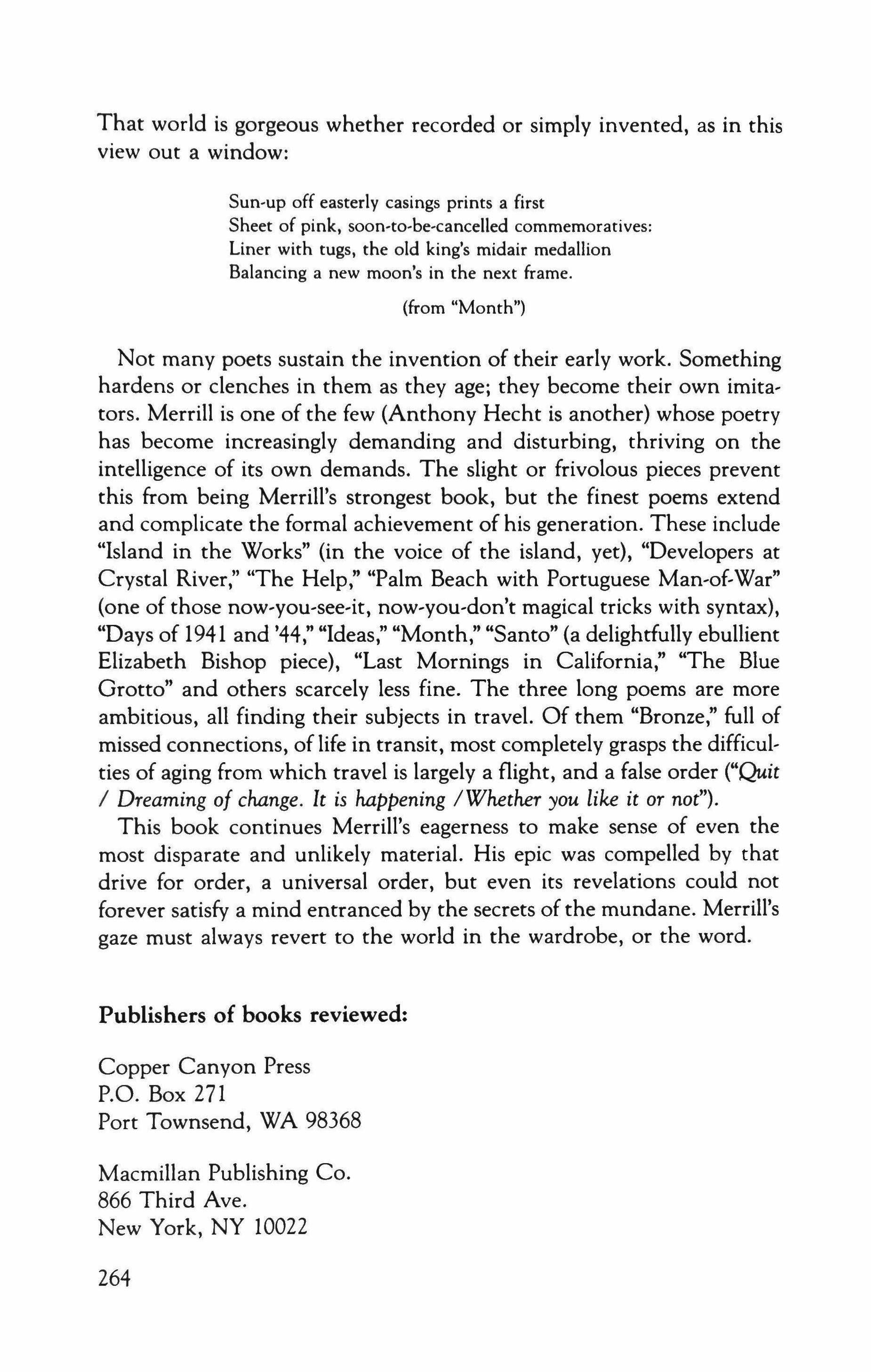
That world is gorgeous whether recorded or simply invented, as in this view out a window:
Sun-up off easterly casings prints a first Sheet of pink, soon-to-be-cancelled commemoratives: Liner with tugs, the old king's midair medallion Balancing a new moon's in the next frame. (from "Month")
Not many poets sustain the invention of their early work. Something hardens or clenches in them as they age; they become their own imitators. Merrill is one of the few (Anthony Hecht is another) whose poetry has become increasingly demanding and disturbing, thriving on the intelligence of its own demands. The slight or frivolous pieces prevent this from being Merrill's strongest book, but the finest poems extend and complicate the formal achievement of his generation. These include "Island in the Works" (in the voice of the island, yet), "Developers at Crystal River," "The Help," "Palm Beach with Portuguese Man-of-War" (one of those now-you-see-it, now-you-don't magical tricks with syntax), "Days of 1941 and '44," "Ideas," "Month," "Santo" (a delightfully ebullient Elizabeth Bishop piece), "Last Mornings in California," "The Blue Grotto" and others scarcely less fine. The three long poems are more ambitious, all finding their subjects in travel. Of them "Bronze," full of missed connections, of life in transit, most completely grasps the difficulties of aging from which travel is largely a flight, and a false order ("Quit / Dreaming of change. It is happening /Whether you like it or not").
This book continues Merrill's eagerness to make sense of even the most disparate and unlikely material. His epic was compelled by that drive for order, a universal order, but even its revelations could not forever satisfy a mind entranced by the secrets of the mundane. Merrill's gaze must always revert to the world in the wardrobe, or the word.
Publishers of books reviewed:
Copper Canyon Press
P.O. Box 271
Port Townsend, WA 98368
Macmillan Publishing Co.
866 Third Ave.
New York, NY 10022
264

10 E. 53rd St.
New York, NY 10022
Atheneum Publishers
597 Fifth Ave.
New York, NY 10017
Harper & Row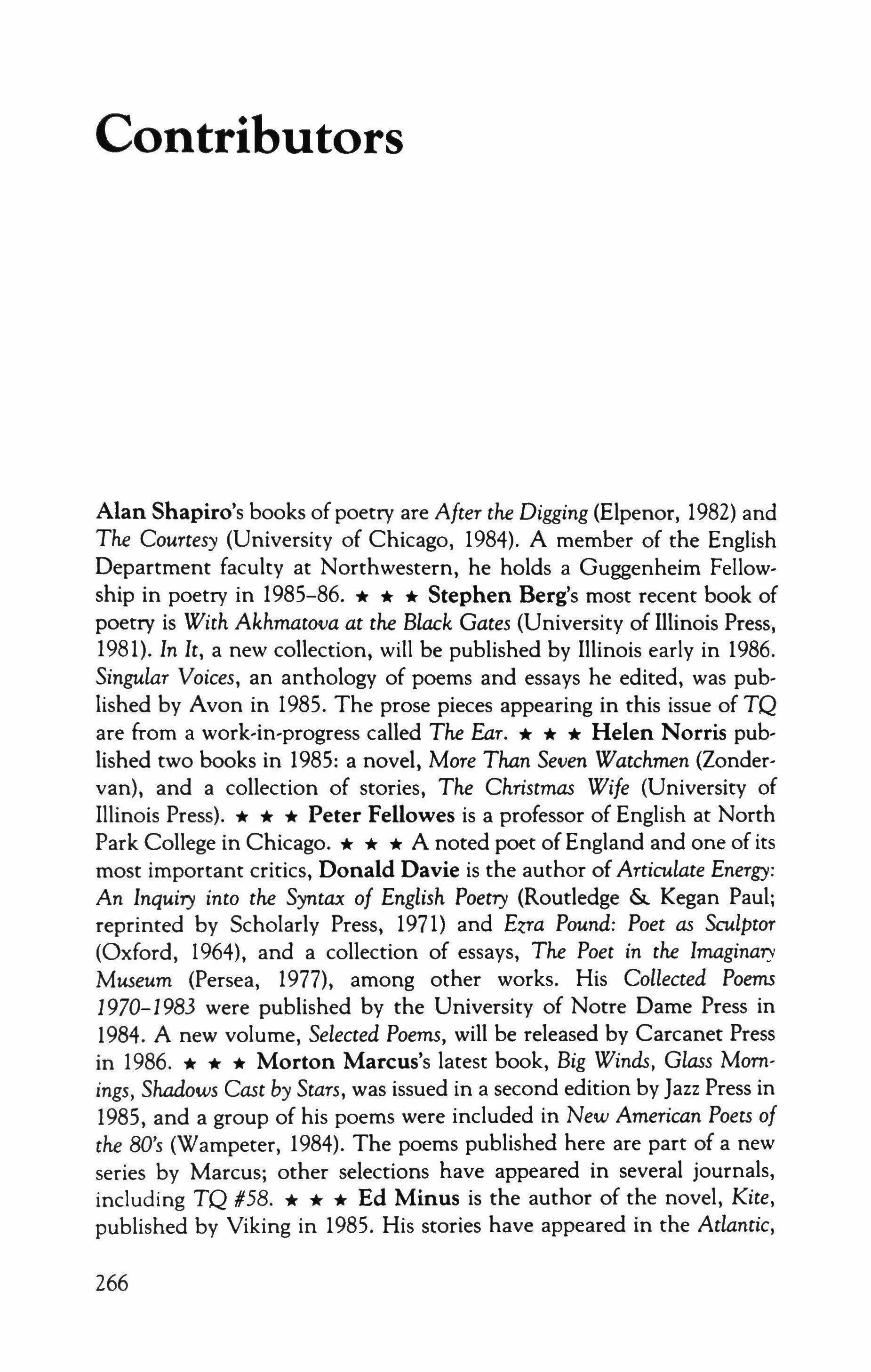
Alan Shapiro's books of poetry are After the Digging (Elpenor, 1982) and The Courtesy (University of Chicago, 1984). A member of the English Department faculty at Northwestern, he holds a Guggenheim Fellow, ship in poetry in 1985-86. * * * Stephen Berg's most recent book of poetry is With Akhmatova at the Black Gates (University of Illinois Press, 1981). In It, a new collection, will be published by Illinois early in 1986. Singular Voices, an anthology of poems and essays he edited, was pub, lished by Avon in 1985. The prose pieces appearing in this issue of TQ are from a work-in-progress called The Ear. * * * Helen Norris pub, lished two books in 1985: a novel, More Than Seven Watchmen (Zendervan), and a collection of stories, The Christmas Wife (University of Illinois Press).
* * * Peter Fellowes is a professor of English at North Park College in Chicago. * * * A noted poet of England and one of its most important critics, Donald Davie is the author of Articulate Energy: An Inquiry into the Syntax of English Poetry (Routledge & Kegan Paul; reprinted by Scholarly Press, 1971) and Ezra Pound: Poet as Sculptor (Oxford, 1964), and a collection of essays, The Poet in the Imaginary Museum (Persea, 1977), among other works. His Collected Poems 1970-1983 were published by the University of Notre Dame Press in 1984. A new volume, Selected Poems, will be released by Carcanet Press in 1986. * * * Morton Marcus's latest book, Big Winds, Glass Mornings, Shadows Cast by Stars, was issued in a second edition by Jazz Press in 1985, and a group of his poems were included in New American Poets of the 80's (Wampeter, 1984). The poems published here are part of a new series by Marcus; other selections have appeared in several journals, including TQ #58. * * * Ed Minus is the author of the novel, Kite, published by Viking in 1985. His stories have appeared in the Atlantic,
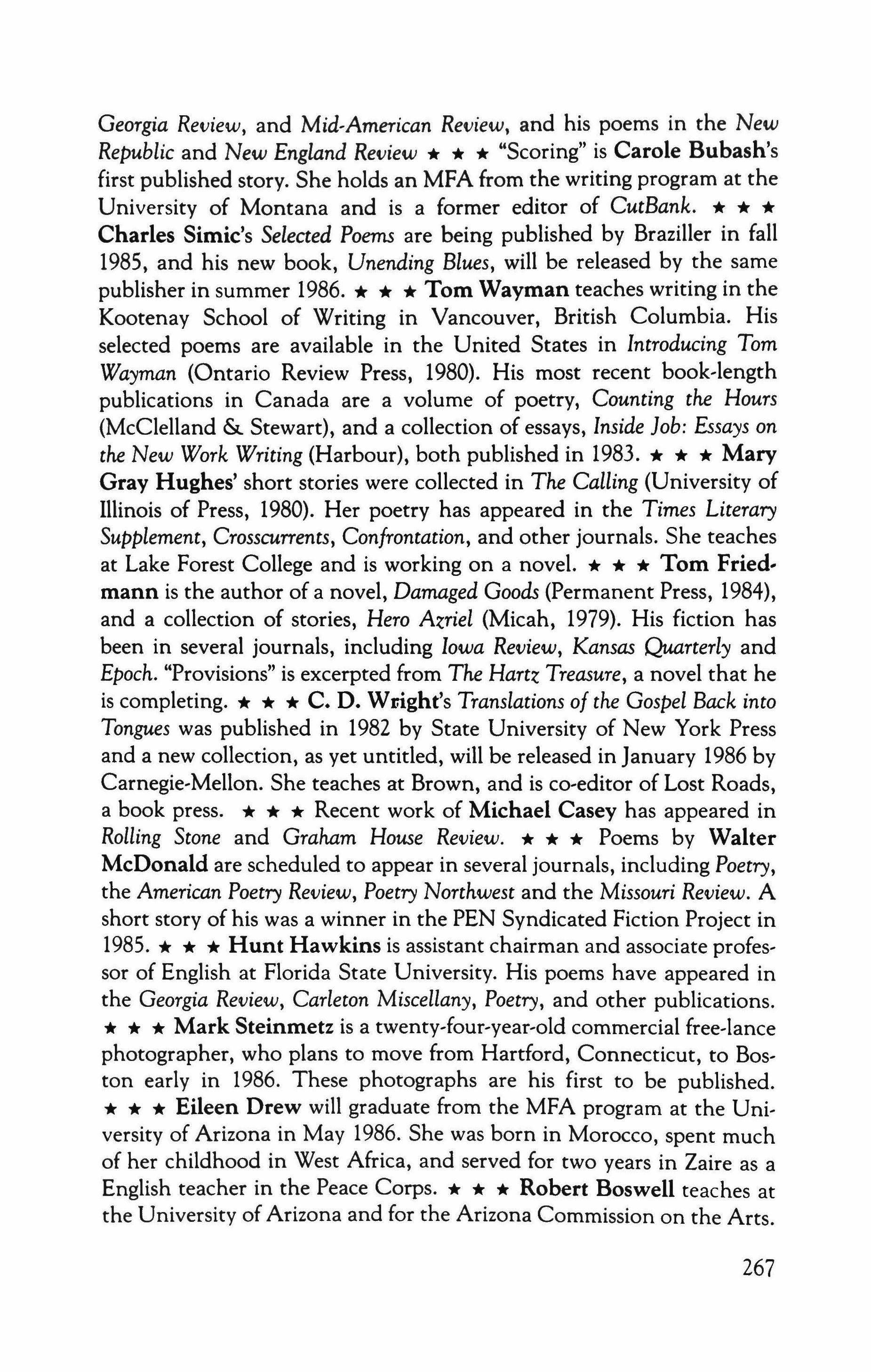
Georgia Review, and Mid-American Review, and his poems in the New Republic and New England Review * * * "Scoring" is Carole Bubash's first published story. She holds an MFA from the writing program at the University of Montana and is a former editor of CutBank. * * * Charles Simic's Selected Poems are being published by Braziller in fall 1985, and his new book, Unending Blues, will be released by the same publisher in summer 1986. * * * Tom Wayman teaches writing in the Kootenay School of Writing in Vancouver, British Columbia. His selected poems are available in the United States in Introducing Tom Wayman (Ontario Review Press, 1980). His most recent book-length publications in Canada are a volume of poetry, Counting the Hours (McClelland & Stewart), and a collection of essays, Inside lob: Essays on the New Work Writing (Harbour), both published in 1983. * * * Mary Gray Hughes' short stories were collected in The Calling (University of Illinois of Press, 1980). Her poetry has appeared in the Times Literary Supplement, Crosscurrents, Confrontation, and other journals. She teaches at Lake Forest College and is working on a novel. * * * Tom Friedmann is the author of a novel, Damaged Goods (Permanent Press, 1984), and a collection of stories, Hero Azriel (Micah, 1979). His fiction has been in several journals, including Iowa Review, Kansas Quarterly and Epoch. "Provisions" is excerpted from The Hartz Treasure, a novel that he is completing.
* * * C. D. Wright's Translations of the Gospel Back into Tongues was published in 1982 by State University of New York Press and a new collection, as yet untitled, will be released in January 1986 by Carnegie-Mellon. She teaches at Brown, and is co-editor of Lost Roads, a book press.
* * * Recent work of Michael Casey has appeared in Rolling Stone and Graham House Review. * * * Poems by Walter McDonald are scheduled to appear in several journals, including Poetry, the American Poetry Review, Poetry Northwest and the Missouri Review. A short story of his was a winner in the PEN Syndicated Fiction Project in 1985. * * * Hunt Hawkins is assistant chairman and associate professor of English at Florida State University. His poems have appeared in the Georgia Review, Carleton Miscellany, Poetry, and other publications.
* * * Mark Steinmetz is a twenty-four-year-old commercial free-lance photographer, who plans to move from Hartford, Connecticut, to Boston early in 1986. These photographs are his first to be published.
* * * Eileen Drew will graduate from the MFA program at the University of Arizona in May 1986. She was born in Morocco, spent much of her childhood in West Africa, and served for two years in Zaire as a English teacher in the Peace Corps. * * * Robert Boswell teaches at the University of Arizona and for the Arizona Commission on the Arts.
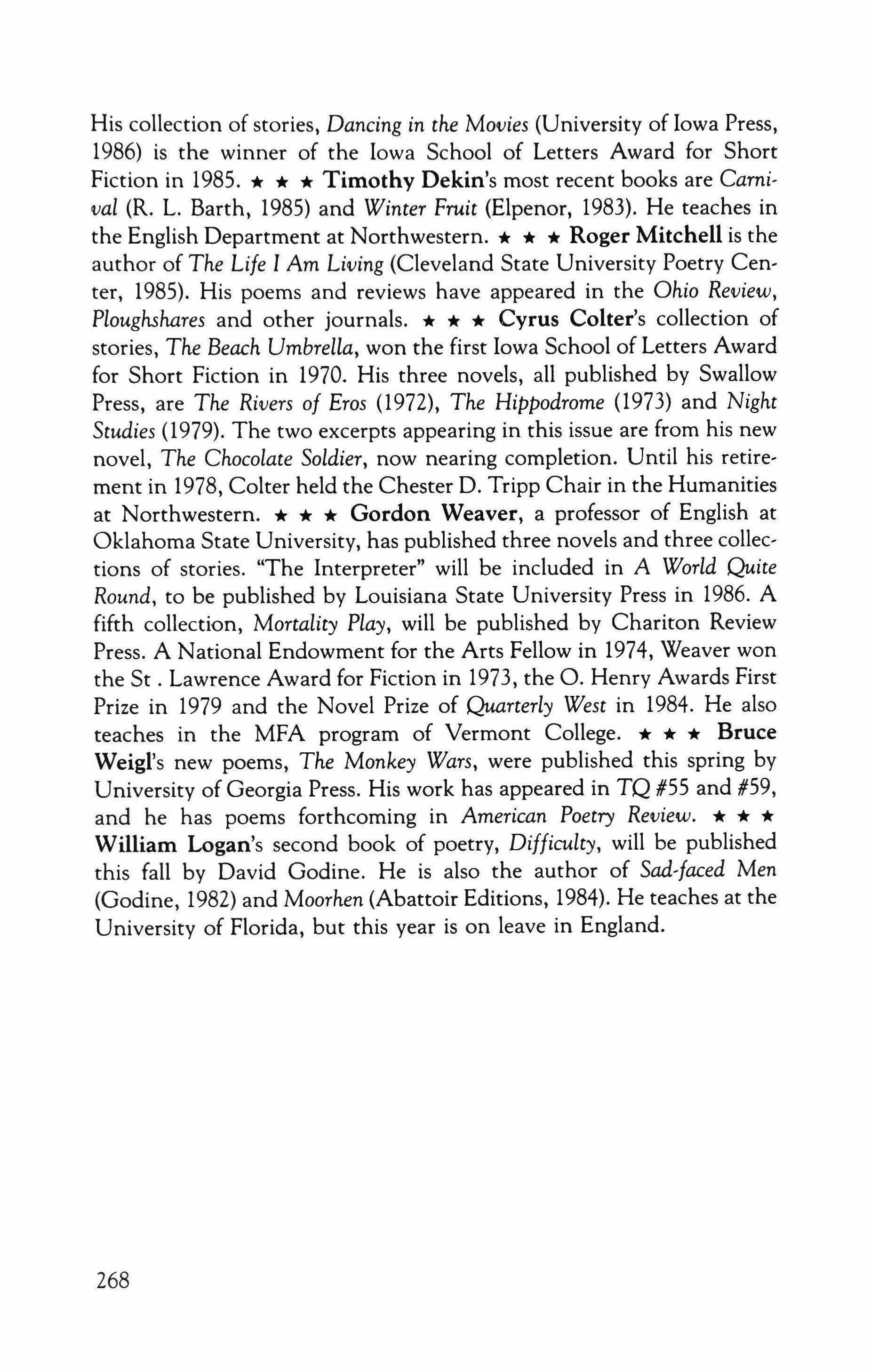
His collection of stories, Dancing in the Movies (University of Iowa Press, 1986) is the winner of the Iowa School of Letters Award for Short Fiction in 1985. * * * Timothy Dekin's most recent books are Carnival (R. L. Barth, 1985) and Winter Fruit (Elpenor, 1983). He teaches in the English Department at Northwestern. * * * Roger Mitchell is the author of The Life I Am Living (Cleveland State University Poetry Center, 1985). His poems and reviews have appeared in the Ohio Review, Ploughshares and other journals. * * * Cyrus Colter's collection of stories, The Beach Umbrella, won the first Iowa School of Letters Award for Short Fiction in 1970. His three novels, all published by Swallow Press, are The Rivers of Eros (1972), The Hippodrome (1973) and Night Studies (1979). The two excerpts appearing in this issue are from his new novel, The Chocolate Soldier, now nearing completion. Until his retirement in 1978, Colter held the Chester D. Tripp Chair in the Humanities at Northwestern. * * * Gordon Weaver, a professor of English at Oklahoma State University, has published three novels and three collections of stories. "The Interpreter" will be included in A World Quite Round, to be published by Louisiana State University Press in 1986. A fifth collection, Mortality Play, will be published by Chariton Review Press. A National Endowment for the Arts Fellow in 1974, Weaver won the St. Lawrence Award for Fiction in 1973, the O. Henry Awards First Prize in 1979 and the Novel Prize of Quarterly West in 1984. He also teaches in the MFA program of Vermont College. * * * Bruce Weigl's new poems, The Monkey Wars, were published this spring by University of Georgia Press. His work has appeared in TQ #55 and #59, and he has poems forthcoming in American Poetry Review. * * * William Logan's second book of poetry, Difficulty, will be published this fall by David Godine. He is also the author of Sad-faced Men (Godine, 1982) and Moorhen (Abattoir Editions, 1984). He teaches at the University of Florida, but this year is on leave in England.
Three times a year
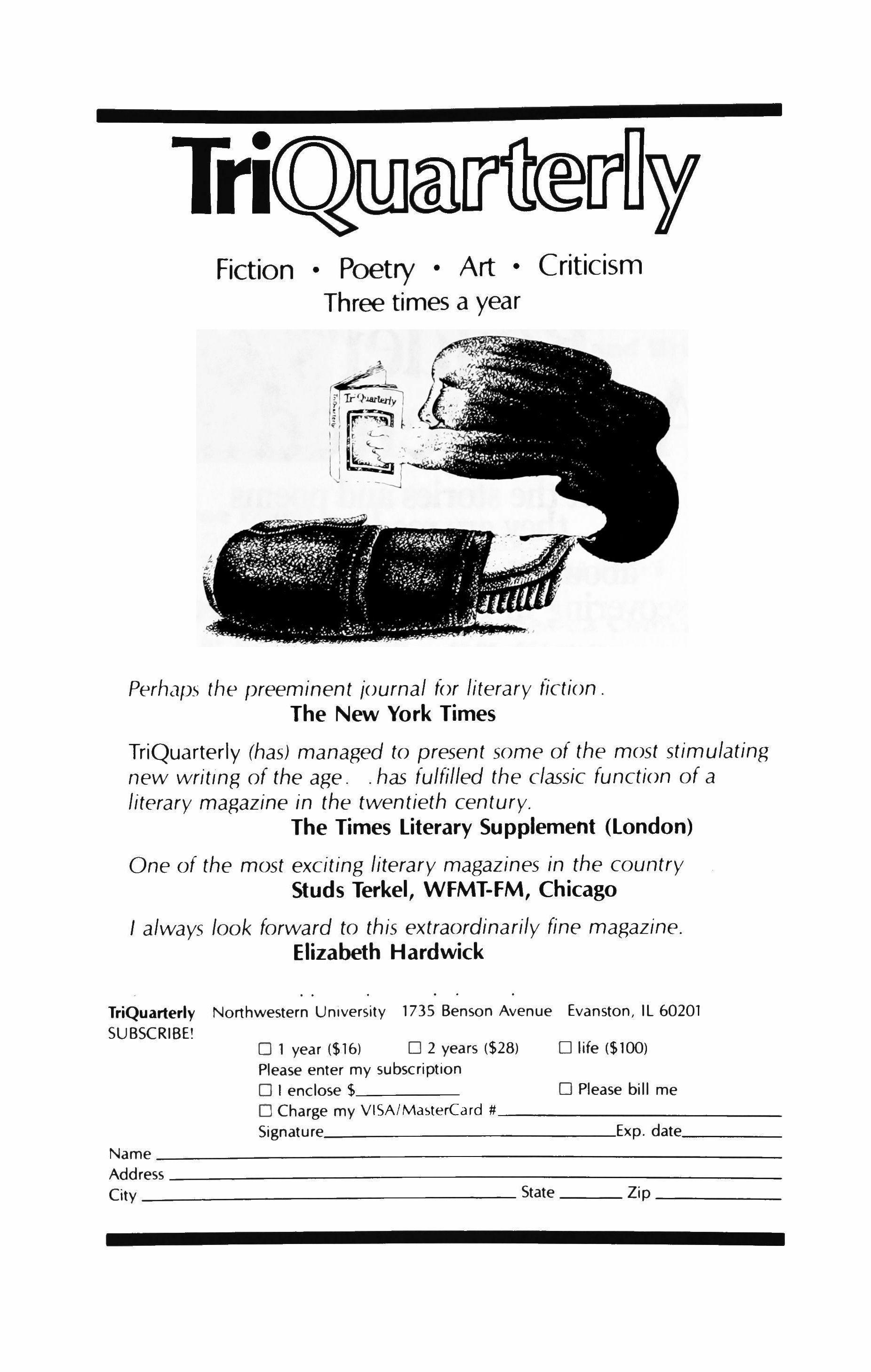
Perhaps the preeminent journal for literary fiction. The New York Times
TriQuarterly (has) managed to present some of the most stimulating new writing of the age. has fulfilled the classic function of a literary magazine in the twentieth century. The Times Literary Supplement (London)
One of the most exciting literary magazines in the country Studs Terkel, WFMT-FM, Chicago
I always look forward to this extraordinarily fine magazine. Elizabeth Hardwick
TriQuarterly Northwestern University 1735 Benson Avenue Evanston, IL 60201 SUBSCRIBE!
01 year ($16) 02 years ($28)
Please enter my subscription
o I enclose $,
Name Address
o life ($100)
o Please bill me
o Charge my VISA/Ma.,terCard # Signature Exp. date.
City State Zip

"Well·known writers combine with their rookie contemporaries, and the result is original; surprising and enlightening?'
Sharon Kubasak Literary Magazine Review
''A must for anyone following American fiction. Among Southern magazines, here is a challenging newcomer with a wide open policy for new writers?'
Bill Katz Library Journal
reprinted in:
Harper's
Best American Short Stories, 1984
Pushcart Prize X: Best of the Small Presses, (1985-86)

$6.95
$6.95 190 pages
$6.95
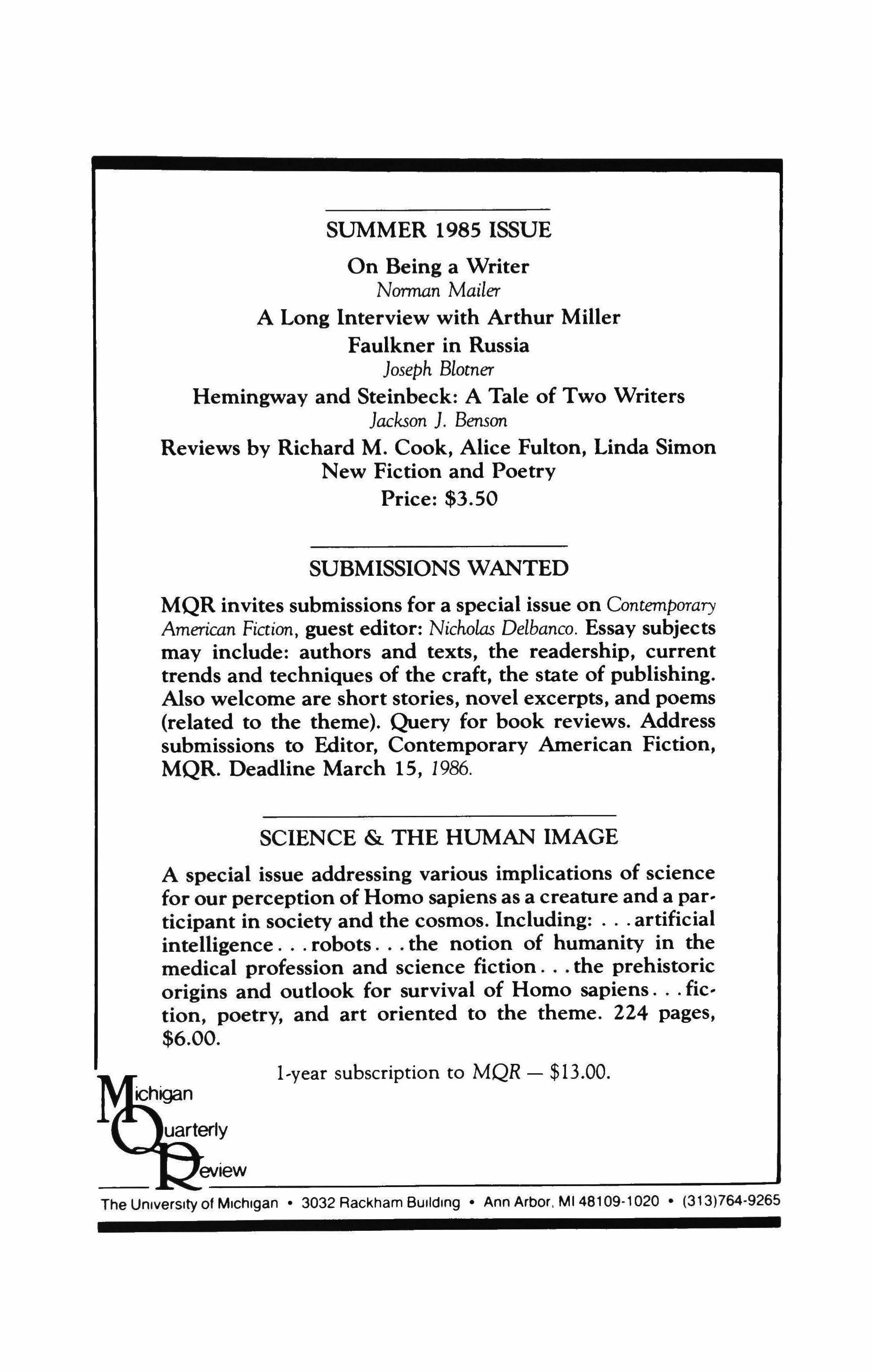
On Being a Writer
Norman Mailer
A Long Interview with Arthur Miller Faulkner in Russia
Joseph Blotner
Hemingway and Steinbeck: A Tale of Two Writers
Jackson J. Benson
Reviews by Richard M. Cook, Alice Fulton, Linda Simon
New Fiction and Poetry
Price: $3.50
MQR invites submissions for a special issue on Contemporary American Fiction, guest editor: Nicholas Delbanco. Essay subjects may include: authors and texts, the readership, current trends and techniques of the craft, the state of publishing. Also welcome are short stories, novel excerpts, and poems (related to the theme). Query for book reviews. Address submissions to Editor, Contemporary American Fiction, MQR. Deadline March 15, 1986.
A special issue addressing various implications of science for our perception of Homo sapiens as a creature and a participant in society and the cosmos. Including: artificial intelligence robots the notion of humanity in the medical profession and science fiction the prehistoric origins and outlook for survival of Homo sapiens fiction, poetry, and art oriented to the theme. 224 pages, $6.00.
l-year subscription to MQR - $13.00.
"A Proustian orchid of a book a brilliant achievement:'-JOHN HAWKES
"A provocative novel that intrigues the reader through its mysterious premise and unorthodox framework a beautifully detailed combination of news clippings, remembrances, pages from a diary, letters, and even a screenplay."-Publishers Weekly
"Rich, moving and satisfying-an exceptional novel!"-HERBERTGOLD
A William Abrahams Book
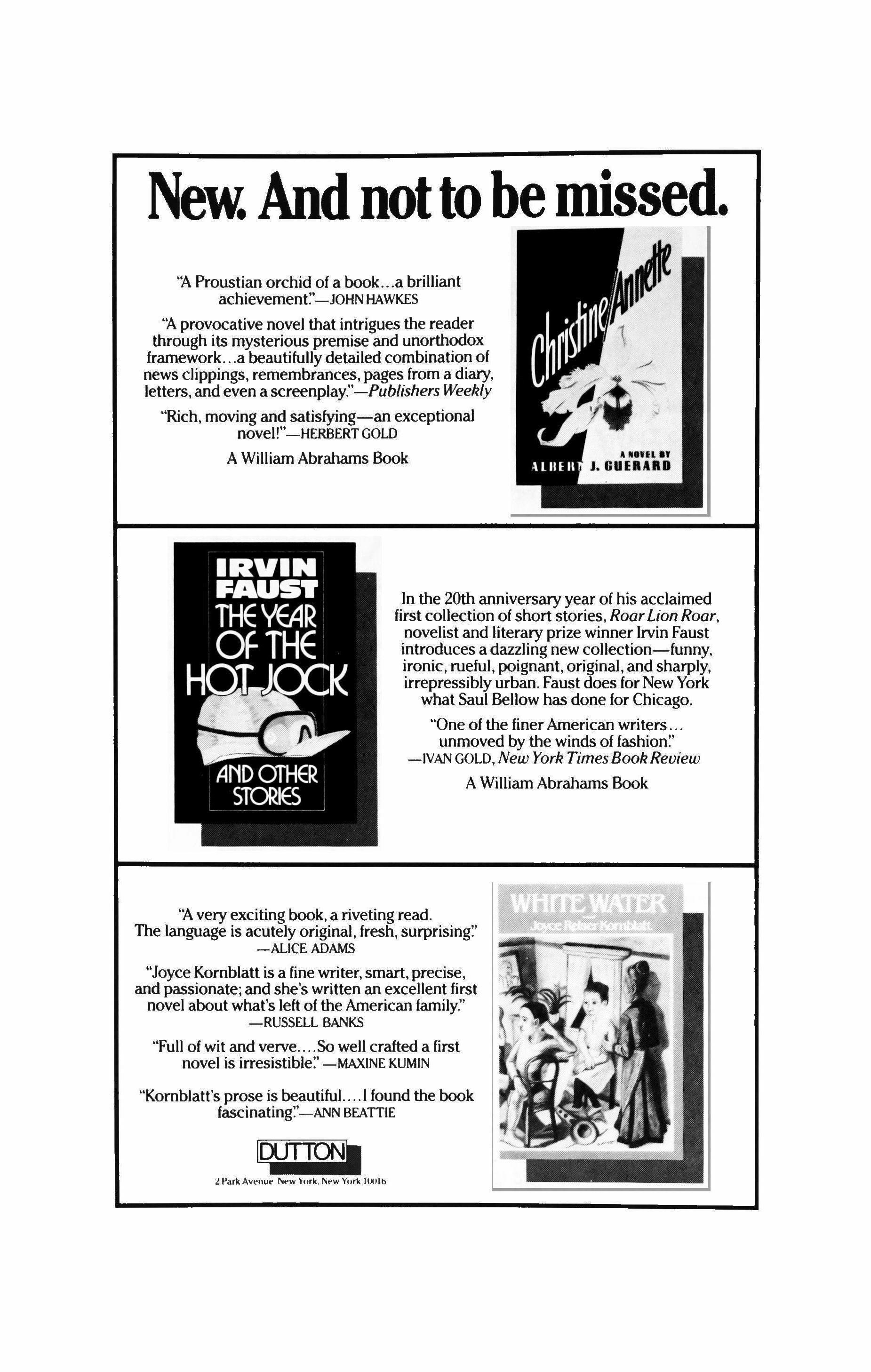
In the 20th anniversary year of his acclaimed first collection of short stories, RoarLion Roar, novelist and literary prize winner Irvin Faust introduces a dazzling new collection-funny, ironic, rueful, poignant, original, and sharply, irrepressibly urban. Faust does for New York what Saul Bellow has done for Chicago.
"One of the finer American writers unmoved by the winds of fashion:'
-IVAN GOLD, New York Times Book Review
A William Abrahams Book
''A very exciting book, a riveting read. The language is acutely original, fresh, surprising:' -ALICE ADAMS
"Joyce Komblatt is a fine writer, smart, precise, and passionate; and she's written an excellent first novel about what's left of the American family."
-RUSSELL BANKS
"Full of wit and verve SO well crafted a first novel is irresistible:' -MAXINE KUMIN
"Kornblatt's prose is beautiful. I found the book fascinating:'-ANN BEATTIE
Yeats, Eliot, Pound, Stevens, Williams, Moore, MacLeish, Auden, Jeffers, Cummings, Shapiro, Schwartz, Jarrell, Lowell, Merrill, Thomas, Nemerov, Ashbery, Hecht, Kunitz, Plath, Hall, Ammons, Bishop, Hollander, Meredith', Berryman, Wagoner, Snyder, Van Duyn, Kumin, Wright, Ignatow, Atwood, Pinsky, Dubie, Raab, and Bottoms have something in common.
Since 1912 America's premiere poetry monthly: -latest poems by today's leading and newly discovered talents - extensive book reviews - monthly book listings - news notes on the poetry scene around the country
POETRY continues to make history. Pass it on.
I enclose $22 for a one-year subscription (plus $5 for postage outside the U.S.A.)
u.s. FUNDS ONLY
Name
Address
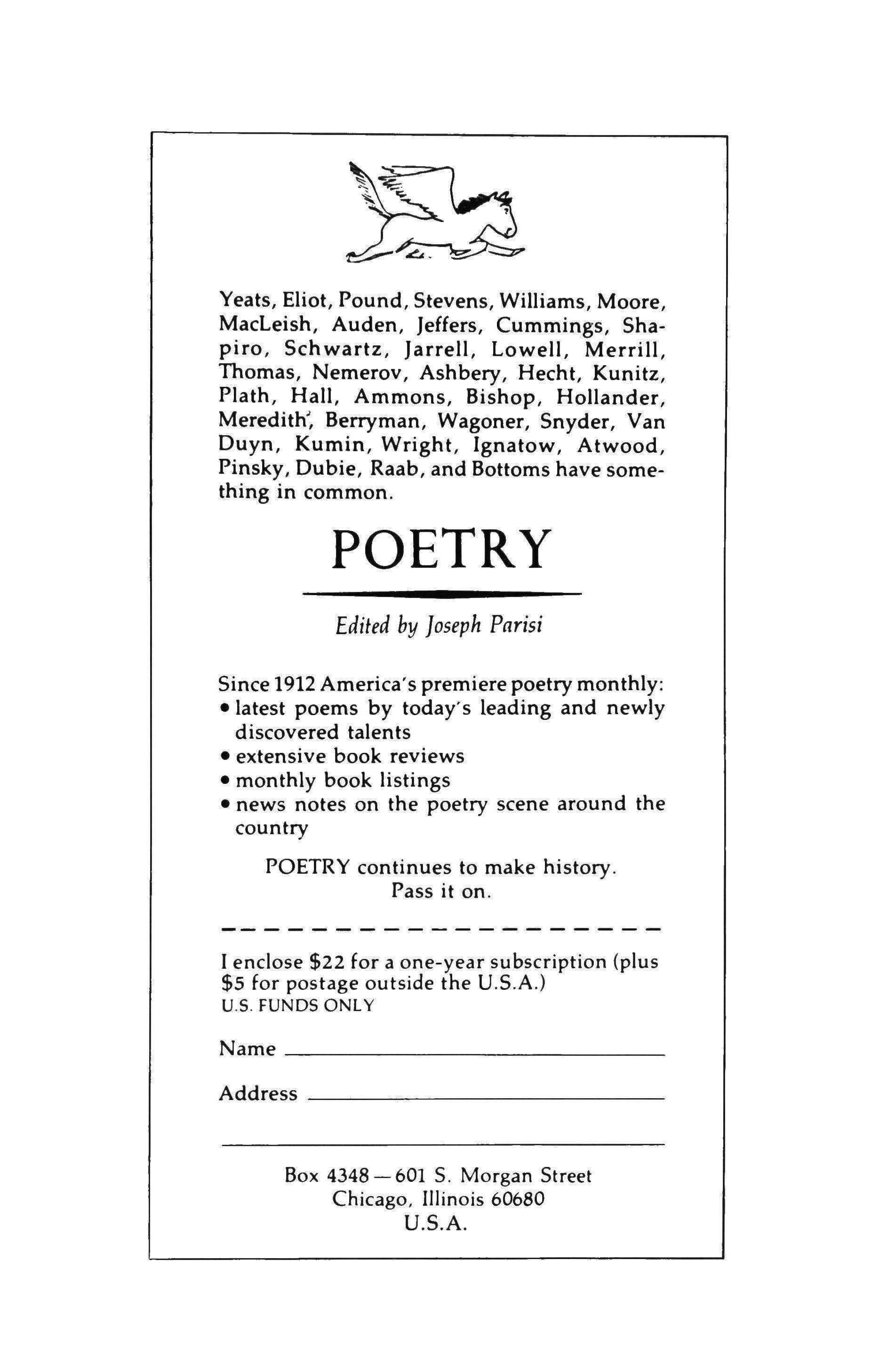
Box 4348 - 601 S. Morgan Street Chicago, Illinois 60680 U.S.A.
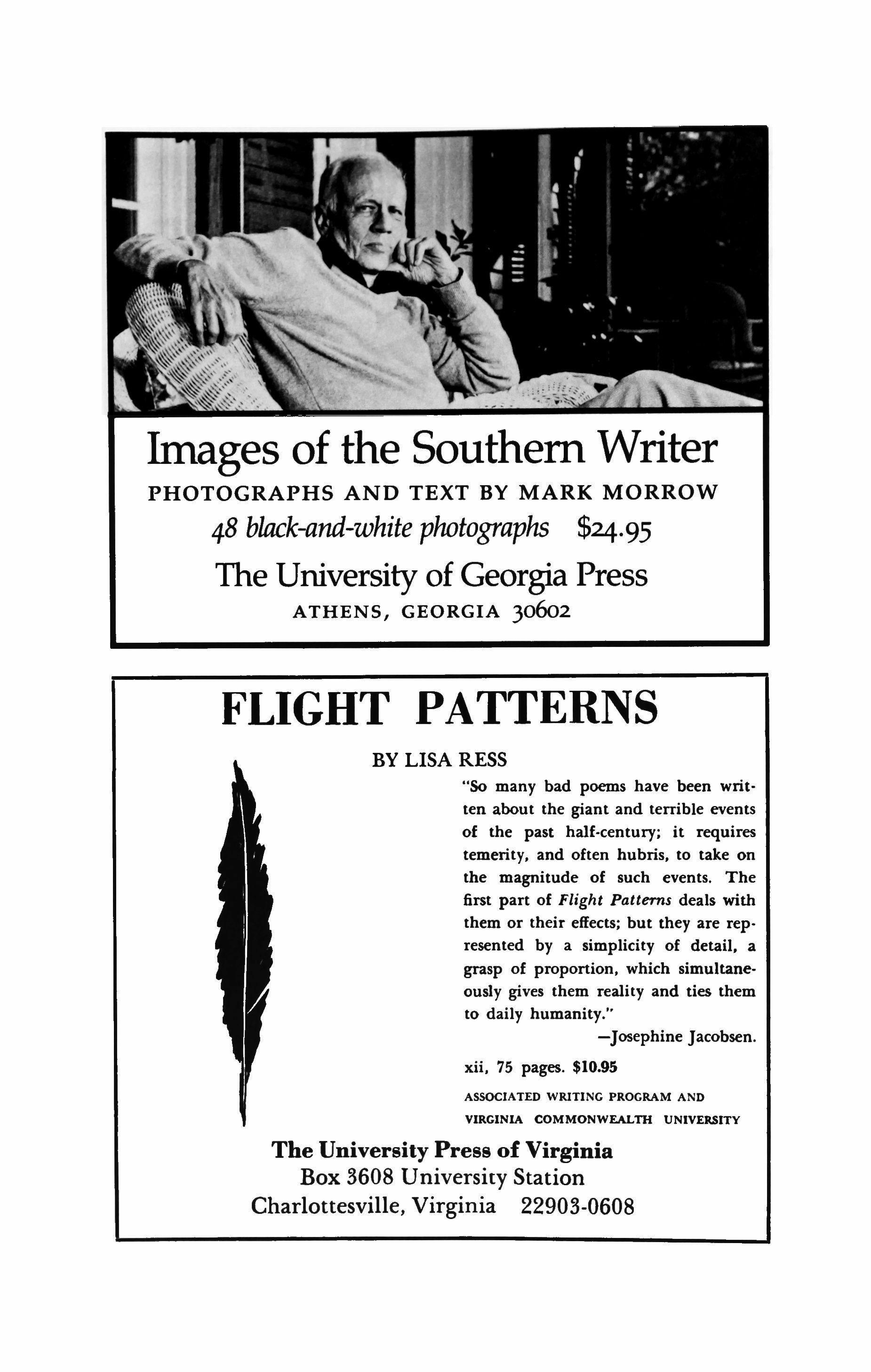
"So many bad poems have been written about the giant and terrible events of the past half-century; it requires temerity. and often hubris. to take on the magnitude of such events. The first part of Flight Patterns deals with them or their effects; but they are represented by a simplicity of detail. a grasp of proportion. which simultaneously gives them reality and ties them to daily humanity."
-Josephine Jacobsen.xii, 75 pages. $10.95
WINNERS 1984
Poetry Short Fiction Novel Nonfiction
Sandra Alcosser Rod Kessler William Holinger Will Baker
A Fish To Feed OffIn Zimbabwe The Fence-Walker Mountain Blood All Hunger
Univ. of Virginia Univ. of Missouri SUNY Albany Univ. of Georgia Press Press Press Press forthcoming, March,1985 May, 1985 forthcoming, spring 1986 fall 1985
judge: judge: judge: judge: James Tate Paul Bowles George Garrett Annie Dillard
In the Novel: Mack Faith judge: Margaret Atwood

1985
In Short Fiction: NO WINNER judge: Ann Beattie
In Creative Nonfiction: In poetry:
Cynthia Huntington
Scott R. Sanders judge: Susan Fromberg Schaeffer (declined; prior to AWP she won Pacific Poetry Series) judge: John Frederick Nims for complete guidelines write: Associated Writing Programs, Old Dominion University, Norfolk, VA 23508
Cultural Critique examines and critiques received values, institutions, practices, and discourses in terms of their economic, political, social, cultural, and aesthetic genealogies, constitutions and effects. The journal encourages and solicits analyses utilizing various methodologies and combining different fields.
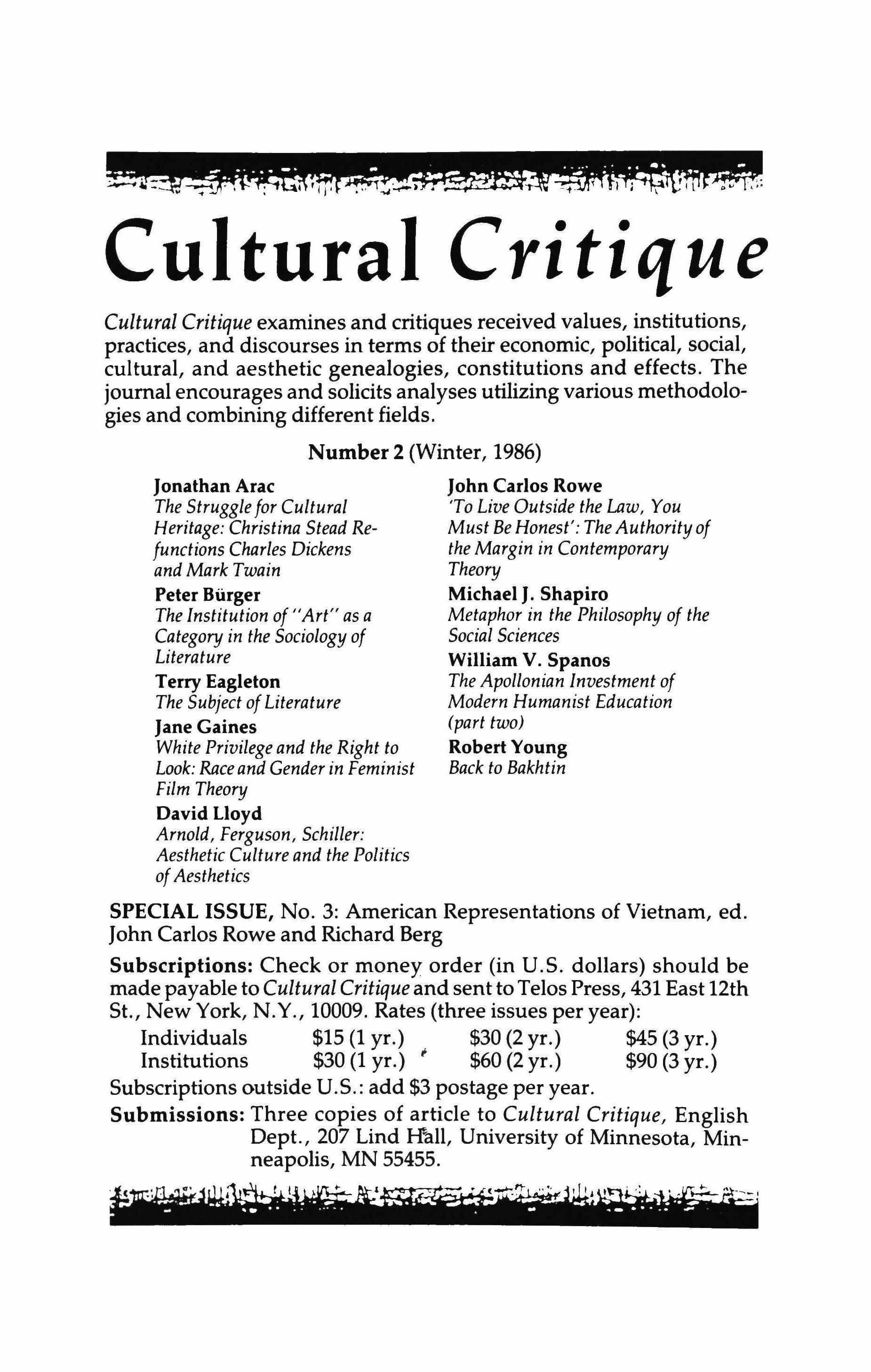
Jonathan Arac
The Strugglefor Cultural Heritage: Christina Stead Refunctions Charles Dickens and Mark Twain
Peter Burger
The Institution of "Art" as a Category in the Sociology of Literature
Terry Eagleton
The Subject of Literature
Jane Gaines
White Privilege and the Right to Look: Race and Gender in Feminist
Film Theory
David Lloyd
Arnold, Ferguson, Schiller: Aesthetic Culture and the Politics ofAesthetics
John Carlos Rowe To Live Outside the Law, You Must Be Honest': The Authorityof the Margin in Contemporary Theory
Michael J. Shapiro Metaphor in the Philosophy of the Social Sciences
William V. Spanos
The Apollonian Investment of Modern Humanist Education (part two)
Robert Young Back to Bakhiin
SPECIAL ISSUE, No.3: American Representations of Vietnam, ed. John Carlos Rowe and Richard Berg
Subscriptions: Check or money order (in U.S. dollars) should be made payable to Cultural Critique and sent to Telos Press, 431 East 12th St., New York, N.Y., 10009. Rates (three issues per year):
Individuals $15 (1 yr.) $30 (2 yr.) $45 (3 yr.)
Institutions $30 (1 yr.) r $60 (2 yr.) $90 (3 yr.)
Subscriptions outside U.S.: add $3 postage per year.
Submissions: Three copies of article to Cultural Critique, English Dept., 207 Lind Hall, University of Minnesota, Minneapolis, MN 55455.
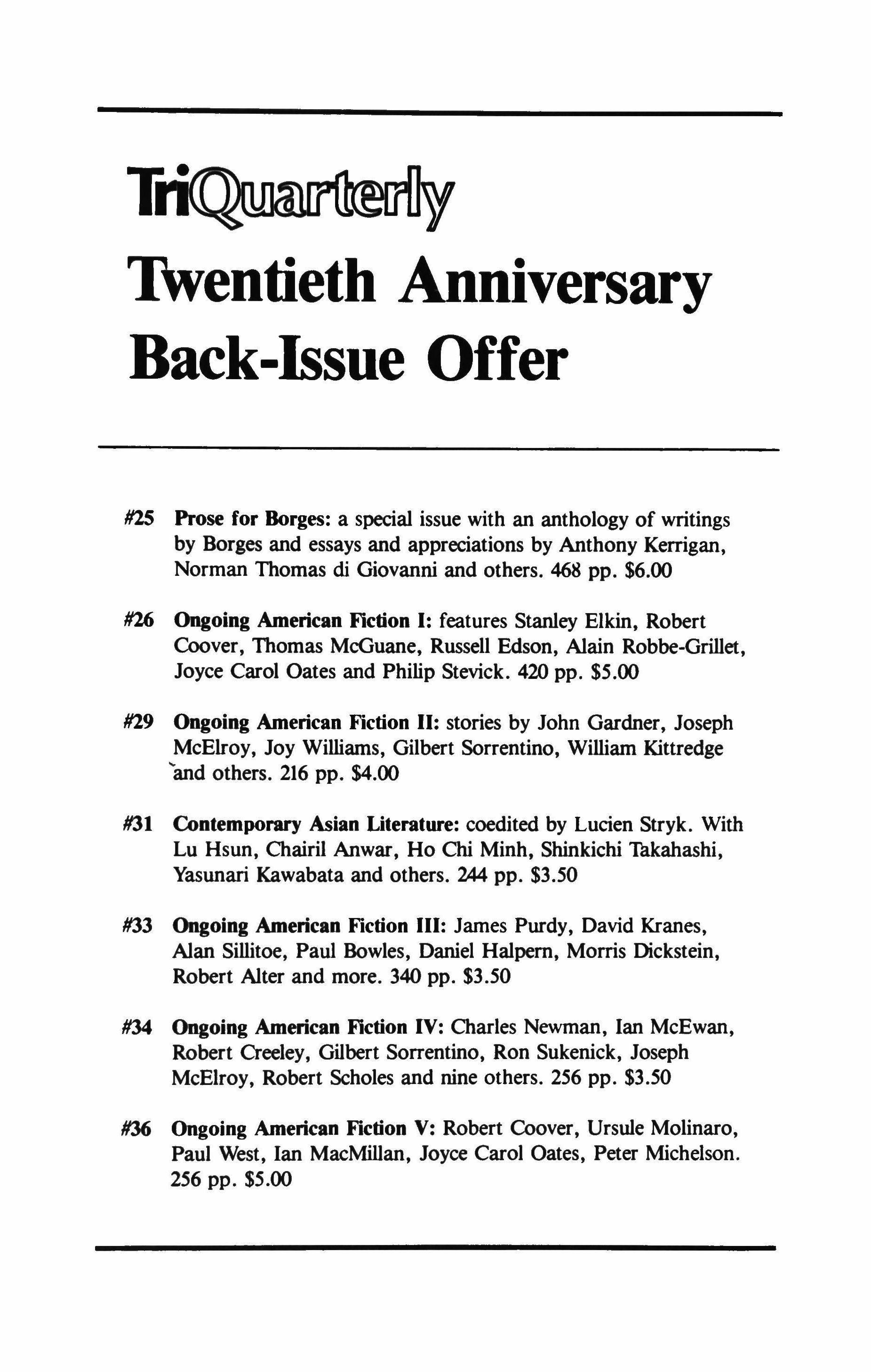
#2S Prose for Borges: a special issue with an anthology of writings by Borges and essays and appreciations by Anthony Kerrigan, Norman Thomas di Giovanni and others. 468 pp. $6.00
#26 Ongoing American Flction I: features Stanley Elkin, Robert Coover, Thomas McGuane, Russell Edson, Alain Robbe-Grillet, Joyce Carol Oates and Philip Stevick. 420 pp. $5.00
#29 Ongoing American Flction II: stories by John Gardner, Joseph McElroy, Joy Williams, Gilbert Sorrentino, William Kittredge and others. 216 pp. $4.00
#31 Contemporary Asian Literature: coedited by Lucien Stryk. With Lu Hsun, Chairil Anwar, Ho Chi Minh, Shinkichi Takahashi, Yasunari Kawabata and others. 244 pp. $3.50
#33 Ongoing American Fiction III: James Purdy, David Kranes, Alan Sillitoe, Paul Bowles, Daniel Halpern, Morris Dickstein, Robert Alter and more. 340 pp. $3.50
#34 Ongoing American Fiction IV: Charles Newman, Ian McEwan, Robert Creeley, Gilbert Sorrentino, Ron Sukenick, Joseph McElroy, Robert Scholes and nine others. 256 pp. $3.50
#36 Ongoing American FICtion V: Robert Coover, Ursule Molinaro, Paul West, Ian MacMillan, Joyce Carol Oates, Peter Michelson. 256 pp. $5.00
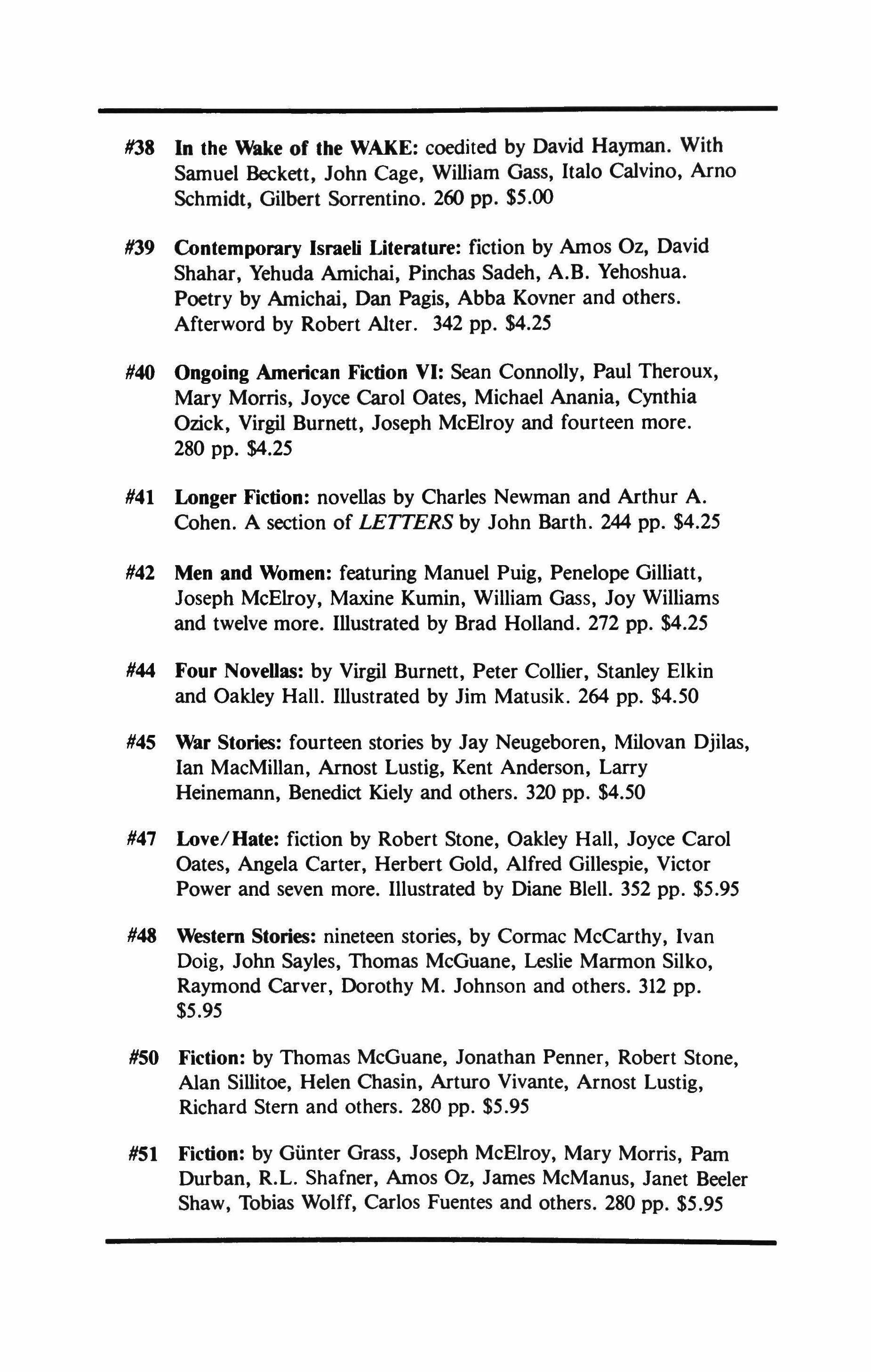
#38 In the Wake of the WAKE: coedited by David Hayman. With Samuel Beckett, John Cage, William Gass, Italo Calvino, Arno Schmidt, Gilbert Sorrentino. 260 pp. $5.00
#39 Contemporary Israeli Literature: fiction by Amos Oz, David Shahar, Yehuda Amichai, Pinchas Sadeh, A.B. Yehoshua. Poetry by Amichai, Dan Pagis, Abba Kovner and others. Afterword by Robert Alter. 342 pp. $4.25
#40 Ongoing American Fiction VI: Sean Connolly, Paul Theroux, Mary Morris, Joyce Carol Oates, Michael Anania, Cynthia Ozick, Virgil Burnett, Joseph McElroy and fourteen more. 280 pp. $4.25
#41 Longer Fiction: novellas by Charles Newman and Arthur A. Cohen. A section of LETTERS by John Barth. 244 pp. $4.25
#42 Men and Women: featuring Manuel Puig, Penelope Gilliatt, Joseph McElroy, Maxine Kumin, William Gass, Joy Williams and twelve more. Illustrated by Brad Holland. 272 pp. $4.25
#44 Four Novellas: by Virgil Burnett, Peter Collier, Stanley Elkin and Oakley Hall. Illustrated by Jim Matusik. 264 pp. $4.50
#45 War Stories: fourteen stories by Jay Neugeboren, Milovan Djilas, Ian MacMillan, Amost Lustig, Kent Anderson, Larry Heinemann, Benedict Kiely and others. 320 pp. $4.50
#47 Love/Hate: fiction by Robert Stone, Oakley Hall, Joyce Carol Oates, Angela Carter, Herbert Gold, Alfred Gillespie, Victor Power and seven more. Illustrated by Diane Bleil. 352 pp. $5.95
#48 Western Stories: nineteen stories, by Cormac McCarthY, Ivan Doig, John Sayles, Thomas McGuane, Leslie Marmon Silko, Raymond Carver, Dorothy M. Johnson and others. 312 pp. $5.95
#50 Fiction: by Thomas McGuane, Jonathan Penner, Robert Stone, Alan Sillitoe, Helen Chasin, Arturo Vivante, Arnost Lustig, Richard Stem and others. 280 pp. $5.95
#51 Fiction: by GUnter Grass, Joseph McElroy, Mary Morris, Pam Durban, R.L. Shafner, Amos Oz, James McManus, Janet Beeler Shaw, Tobias Wolff, Carlos Fuentes and others. 280 pp. $5.95

#52 Freedom in American Art and Culture: Theodore Lidz, Robert Coles, Jonathan Schiller, Richard Schechner, David Hayman, Peter Gena, Greil Marcus and others. 296 pp. $5.95
#53 General issue: fiction by Arnost Lustig, Stanley Elkin, Arturo Vivante, Joseph McElroy and others; interview with Robert Stone; essay by Thomas LeClair. Photographic portfolio of sculpture by Magdalena Abakanowicz. 280 pp. $5.95
#54 A John Cage Reader: color etchings by Cage plus contributions celebrating his 70th birthday from Marjorie Perloff, William Brooks, Merce Cunningham and others; fiction by Ray Reno, Arturo Vivante and others; poetry by Teresa Cader, Jay Wright and Michael Collier. 304 pp. $5.95
#55 General issue: fiction by Paul West, Willis Johnson, David Plante, Joe Taylor and others; poetry by Pamela White Hadas, Roland Flint, Theodore Weiss and others; nonfiction by Janet Lewis, Phyllis Rose and Michael S. Harper; photographs by Steven D. Foster. 240 pp. $5.95
#56 General issue: New work by and an interview with William Goyen plus fiction by Frederick Busch, Amy Hempel, Stephen Dixon, Andrew Fetler and others; poetry by Mairi Macinnes, Marvin Bell, Joyce Carol Oates, W.S. Di Piero, Lucien Stryk and others. A selection of The Small Press Book Club. 288 pp. $5.95
#57 A special two-volume set-Vol. 1, A Window on Poland: featuring essays, fiction and poems written during Solidarity and martial law. Konwicki, Brandys and others, with twenty-two photos and graphic works. 128 pp. Vol. 2, Prose from Spain, featuring recent fiction and essays, plus an interview with Juan Goytisolo and eight color pages of street murals. 112 pp.
$3.95/each vol., $7.90/set
#58 General issue: stories by Fred Chappell, Janet Kauffman, Perry Glasser and others; poetry by George Starbuck, C.K. Williams, Dave Smith and others; essays by William Goyen and Alan Shapiro; illustrations by Stan Washburn and Matthew Owens. 224 pp. $6.95
#59 The American Blues: fiction by Ward Just Gayle Whittier, Rodney Jone Weigl, John Ci others; ncan political figures 1 and Others," a supplement of poet e complementing Prosefrom Spain (#57, Vol. 2).272 pp. $6.95
#60 Chicago: interviews with Saul Bellow and Norman Maclean; fiction by Lorraine Hansberry, Harry Mark Petrakis, Richard Stern and others; memoirs by Karl Shapiro and Gwendolyn Brooks; poetry by Paul Carroll, Lisel Mueller and others; photographs by Stephen Deutch, Arthur Shay and others. 444 pp. $10.95
#61 General issue: fiction by Kobo Abe Dixon and others· Jacobs Pastan 224 pp.
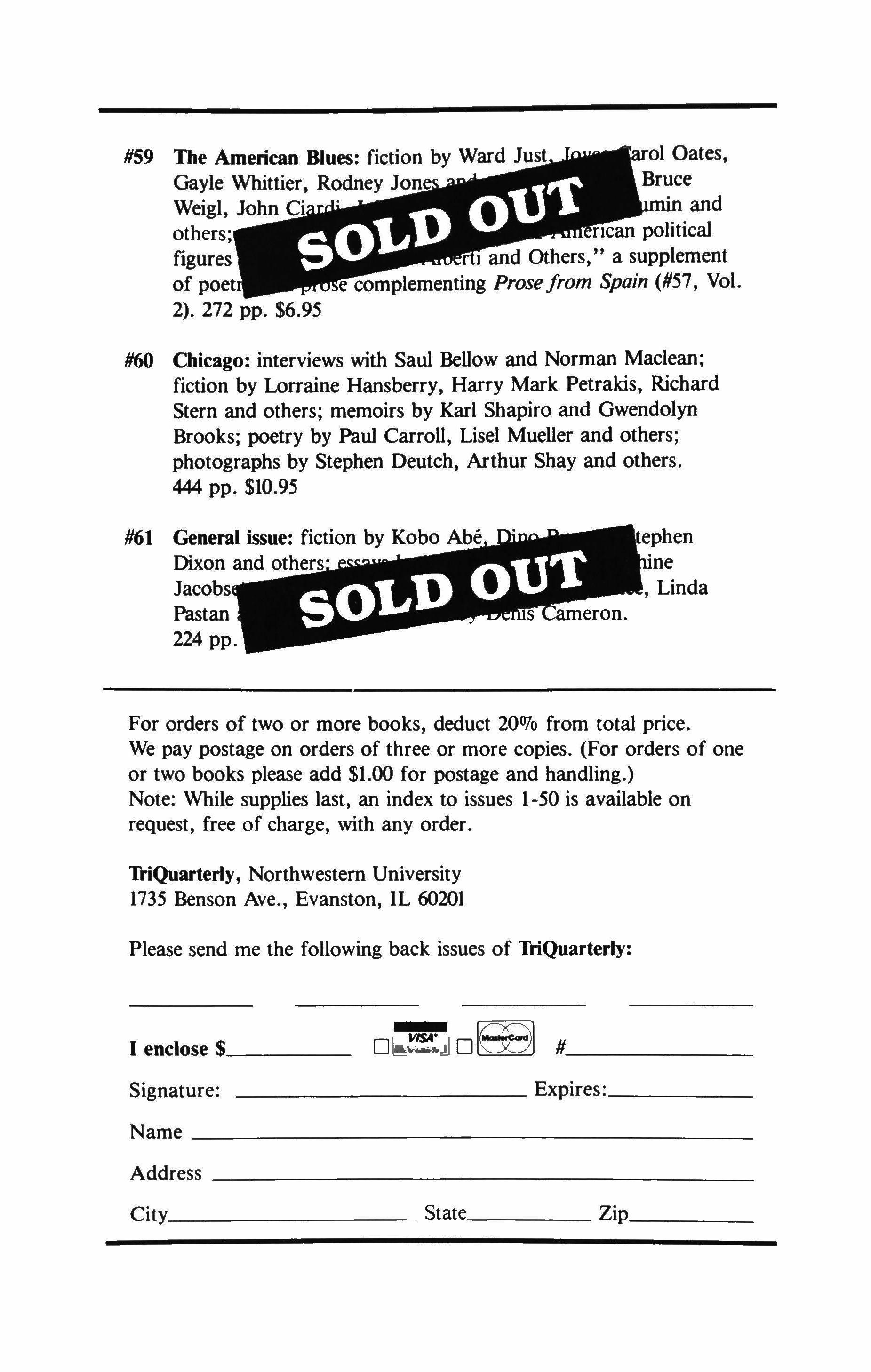
For orders of two or more books, deduct 20070 from total price. We pay postage on orders of three or more copies. (For orders of one or two books please add $1.00 for postage and handling.)
Note: While supplies last, an index to issues 1-50 is available on request, free of charge, with any order.
1HQuarterly, Northwestern University 1735 Benson Ave., Evanston, IL 60201
Please send me the following back issues of 1HQuarterly: I enclose $.
#
Signature: Expires:.
Name Address City State, Zip
by
Bob Perlongo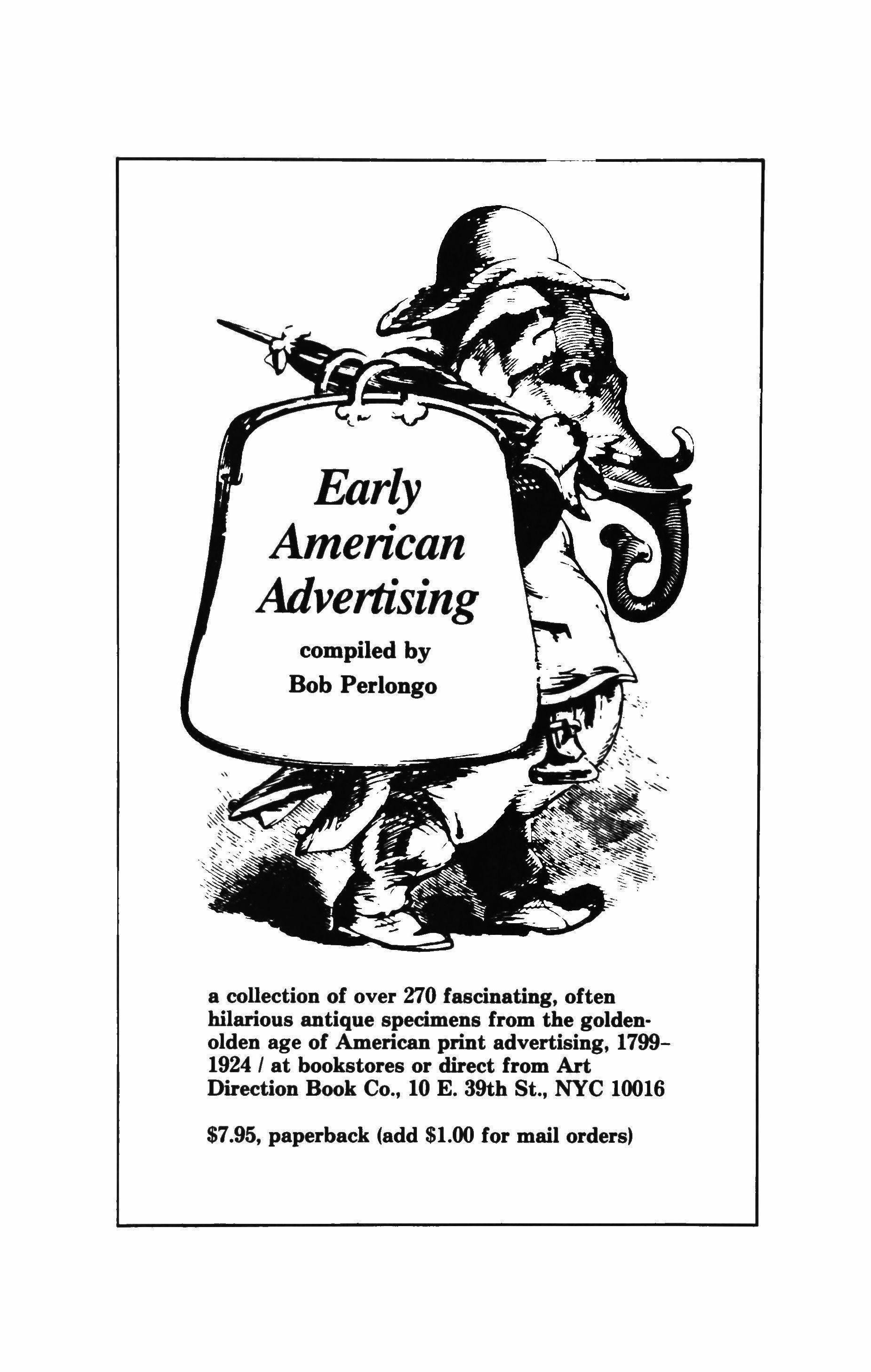
a collection of over 270 fascinating, often hilarious antique specimens from the goldenolden age of American print advertising, 17991924 I at bookstores or direct from Art Direction Book Co., 10 E. 39th St., NYC 10016
$7.95, paperback (add $1.00 for mail orders)

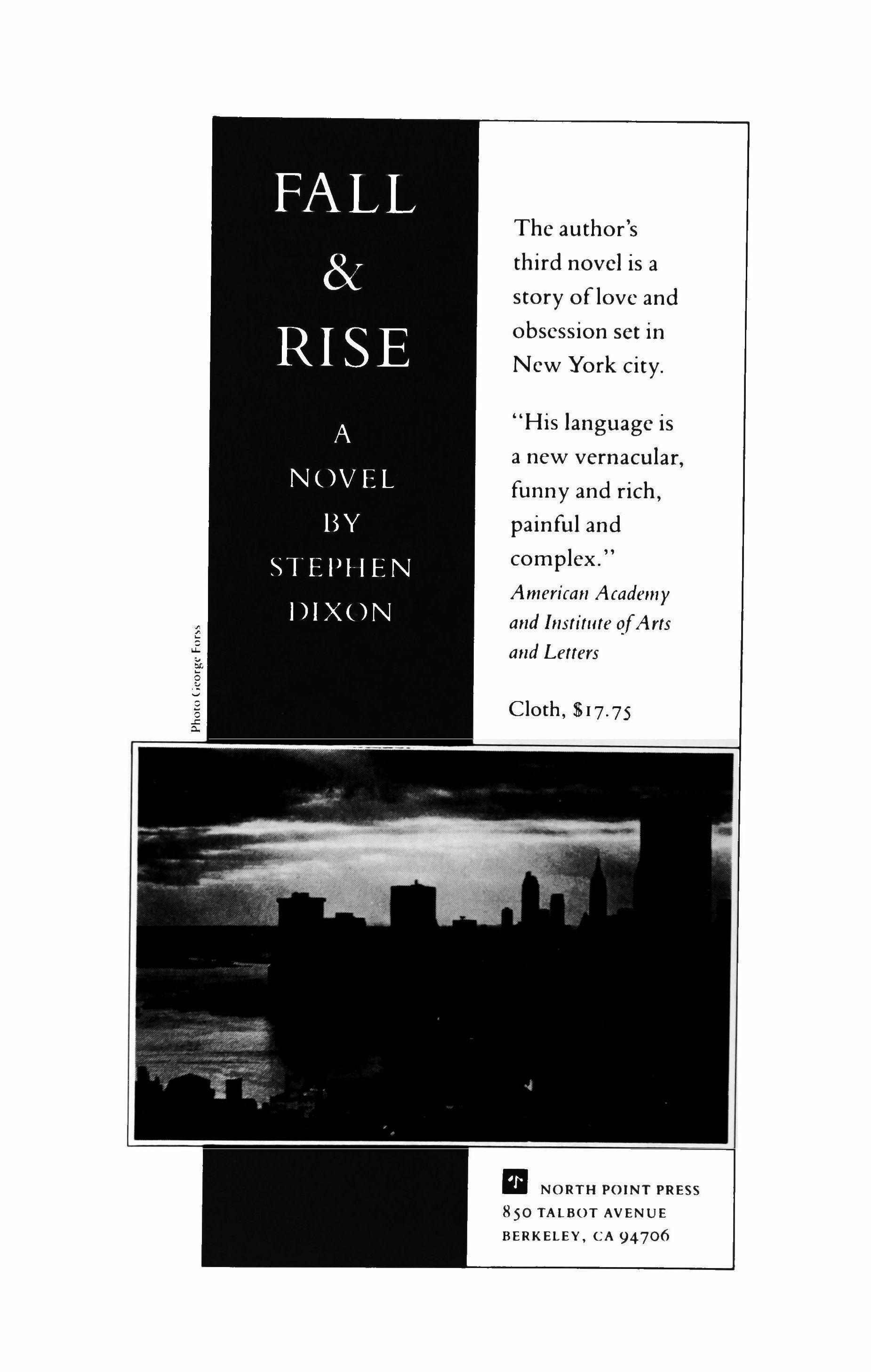
The author's third novel is a story oflove and obsession set in New York city.
"His language is a new vernacular, funny and rich, painful and complex."
American Academy and Institute ofArts and Letters
Cloth, $17.75



Alan Shapiro
Stephen Berg
Helen Norris
Peter Fellowes
Donald Davie
Morton Marcus
Ed Minus
Carole Bubash
Charles Simic
Tom Wayman
Mary Gray Hughes
Tom Friedmann
C.D. Wright
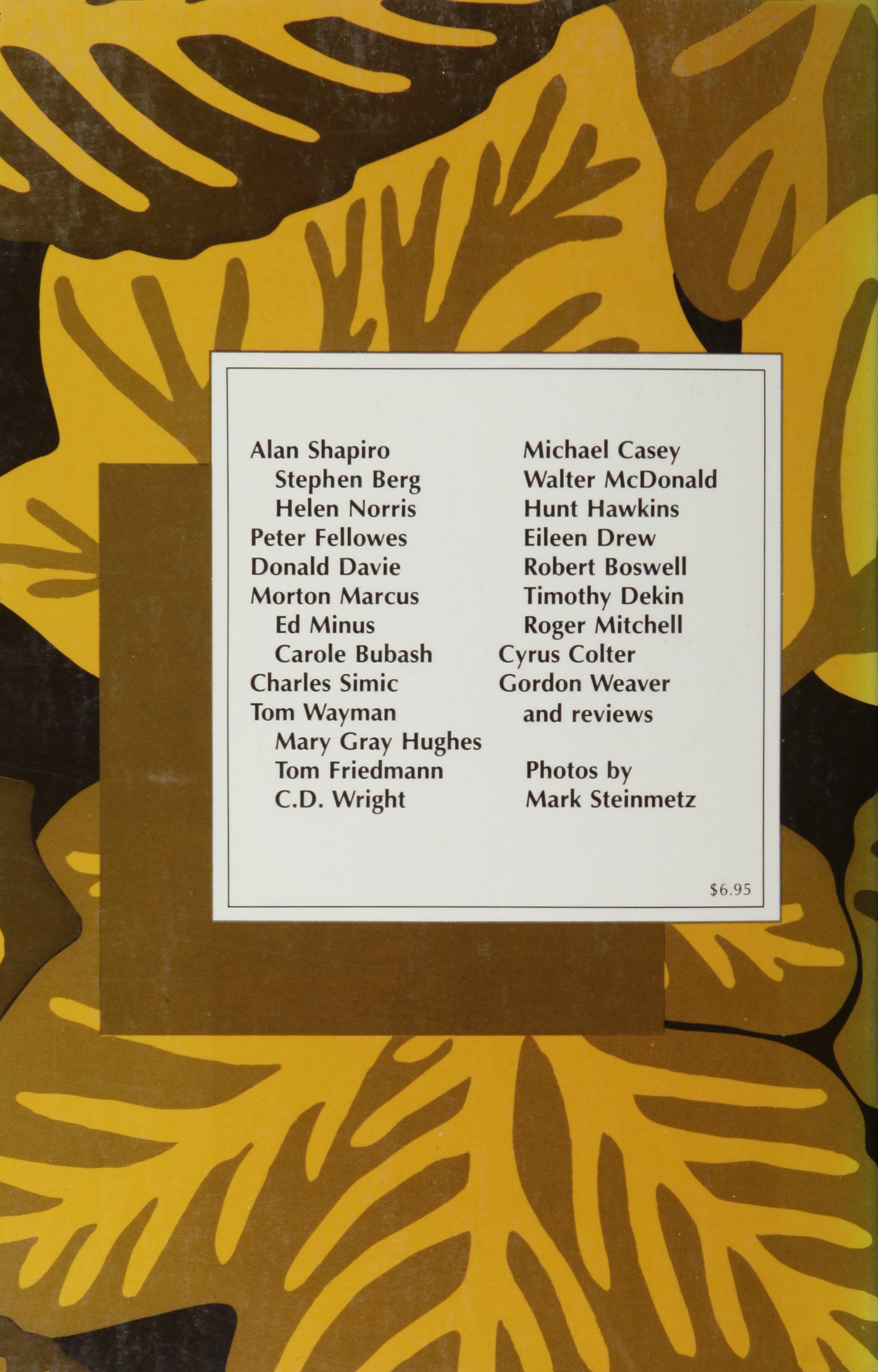
Michael Casey
Walter McDonald
Hunt Hawkins
Eileen Drew
Robert Boswell
Timothy Dekin
Roger Mitchell
Cyrus Colter
Gordon Weaver and reviews